
Winesburg
Sherwood Anderson
Nine short pieces for tenor and string trio
1 And VIOl. � ante � �� t Death, night, the sea, �. � �& �� � tJ � � "t"» .� � c-;;} arco - - � pizz t - �. � �}
Donald Justice
Tenor
Cello � ,---3--, r-. -� � � ,; fear, love - Ii· ness, �t' otzz area f'. � r-. � � tJ -, pizz arr::o �-. ·W s_____., Ir981y � eizz arr::o -"� .,. f! Lit - tIe puffs of dust a - rose in the lamp-light. $11.95 US 43 7 25274 79069
Violin


TriQuarterly is an international journal of writing, art and cultural inquiry published at Northwestern University
TriQuarterly

TriQuarterly
Editor Susan Firestone Hahn
Associate Editor
Ian Morris
Operations Coordinator
Kirstie Felland
Production Manager
Siobhan Drummond
Production Editor
Greta Polo
Cover Design
Gini Kondziolka
Editorial Assistant
Lindsay Meck
Assistant Editor W. Huntting Howell
TriQuarterly Fellow
Sarah Mesle
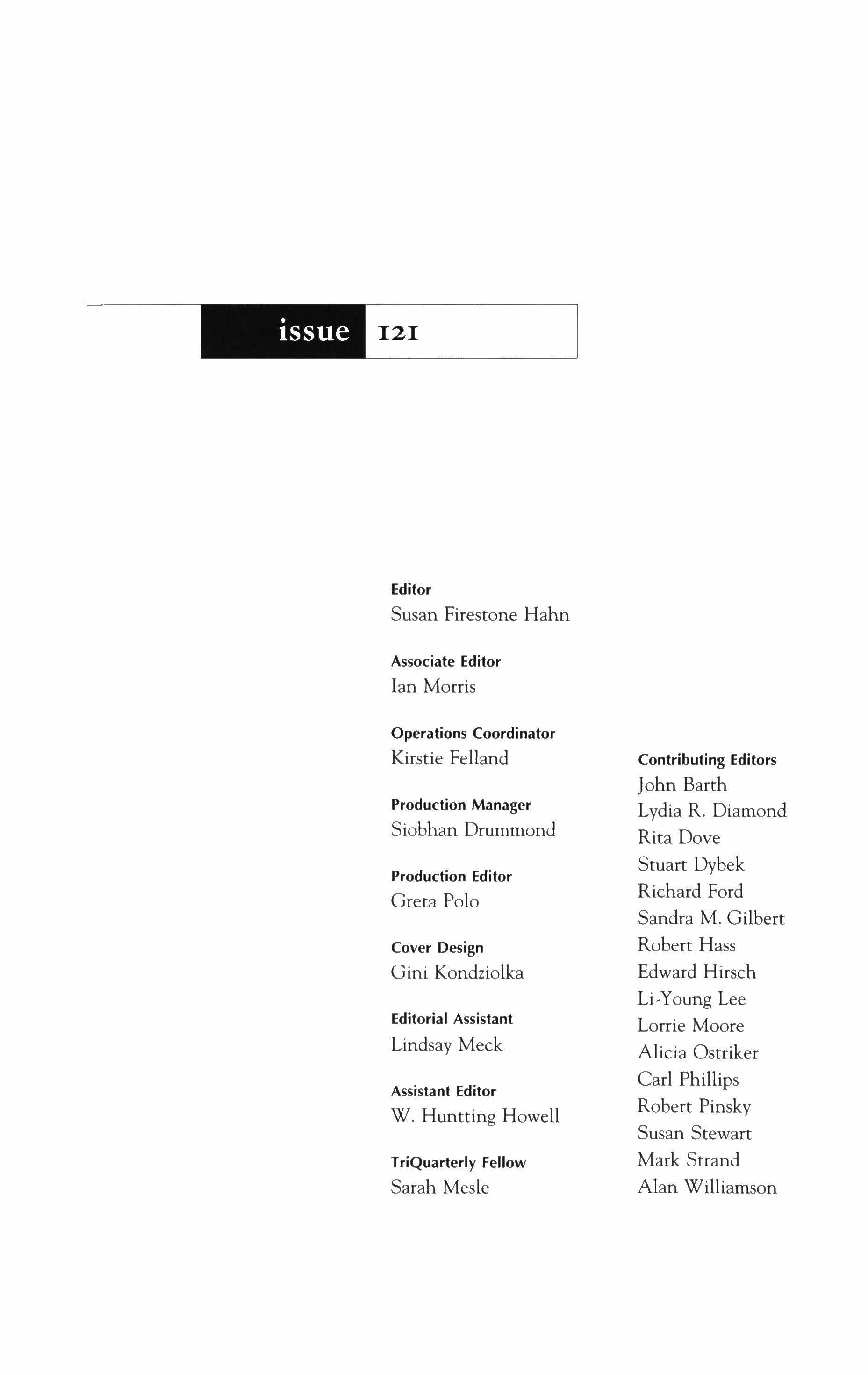
Contributing Editors
John Barth
Lydia R. Diamond
Rita Dove
Stuart Dybek
Richard Ford
Sandra M. Gilbert
Robert Hass
Edward Hirsch
Li-Young Lee
Lorrie Moore
Alicia Ostriker
Carl Phillips
Robert Pinsky
Susan Stewart
Mark Strand
Alan Williamson
121

Editor of This Issue
Stuart Dybek
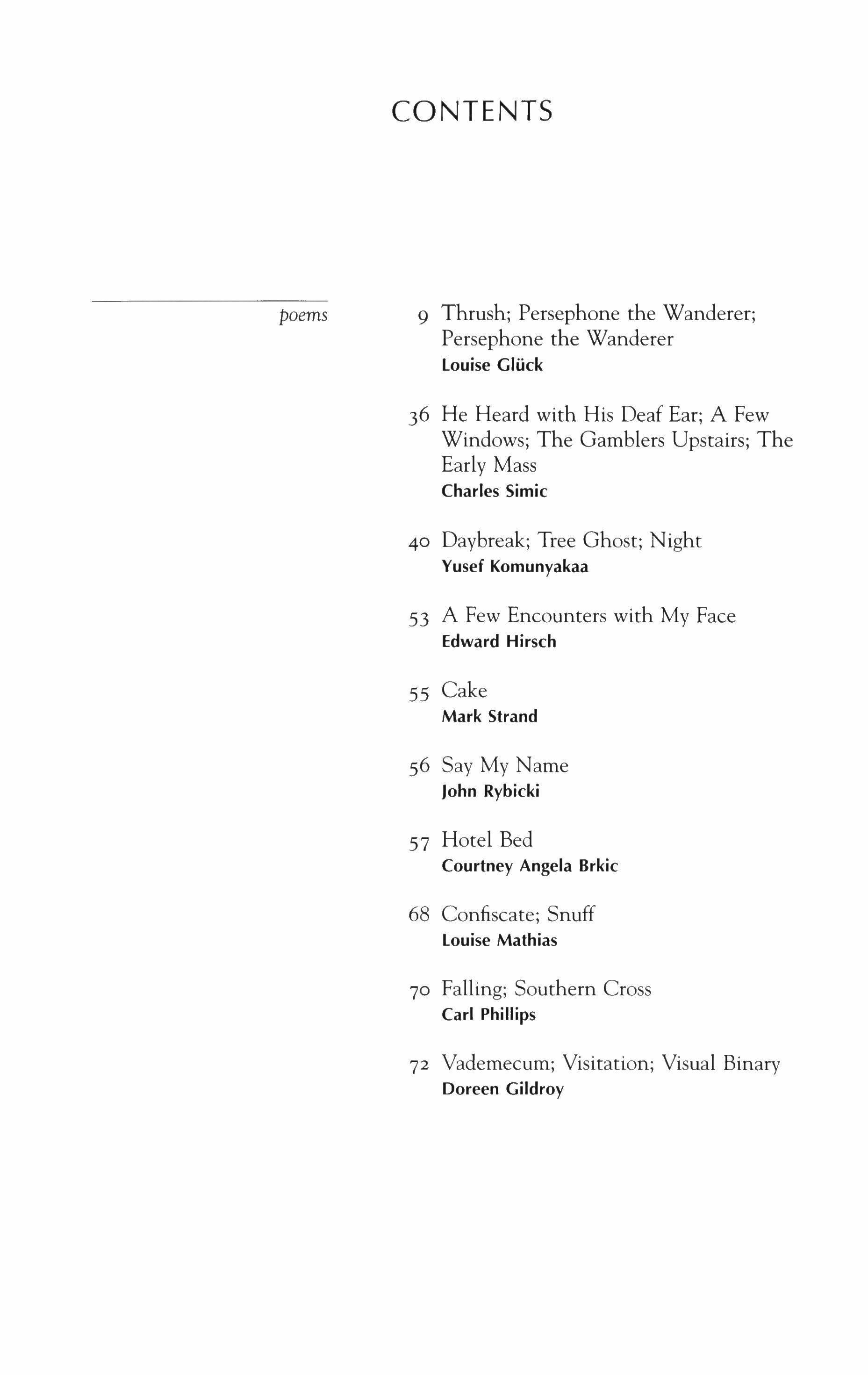
CONTENTS poems 9 Thrush; Persephone the Wanderer; Persephone the Wanderer
Gluck 36 He
His
Ear;
Simic 40 Daybreak; Tree Ghost; Night Yusef
53 A Few Encounters with My Face Edward Hirsch 55 Cake Mark Strand 56 Say My Name John Rybicki 57 Hotel Bed Courtney Angela Brkic 68 Confiscate; Snuff Louise Mathias 70 Falling; Southern Cross Carl Phillips 72 Vademecum; Visitation; Visual Binary Doreen Gildroy
Louise
Heard with
Deaf
A Few Windows; The Gamblers Upstairs; The Early Mass Charles
Komunyakaa
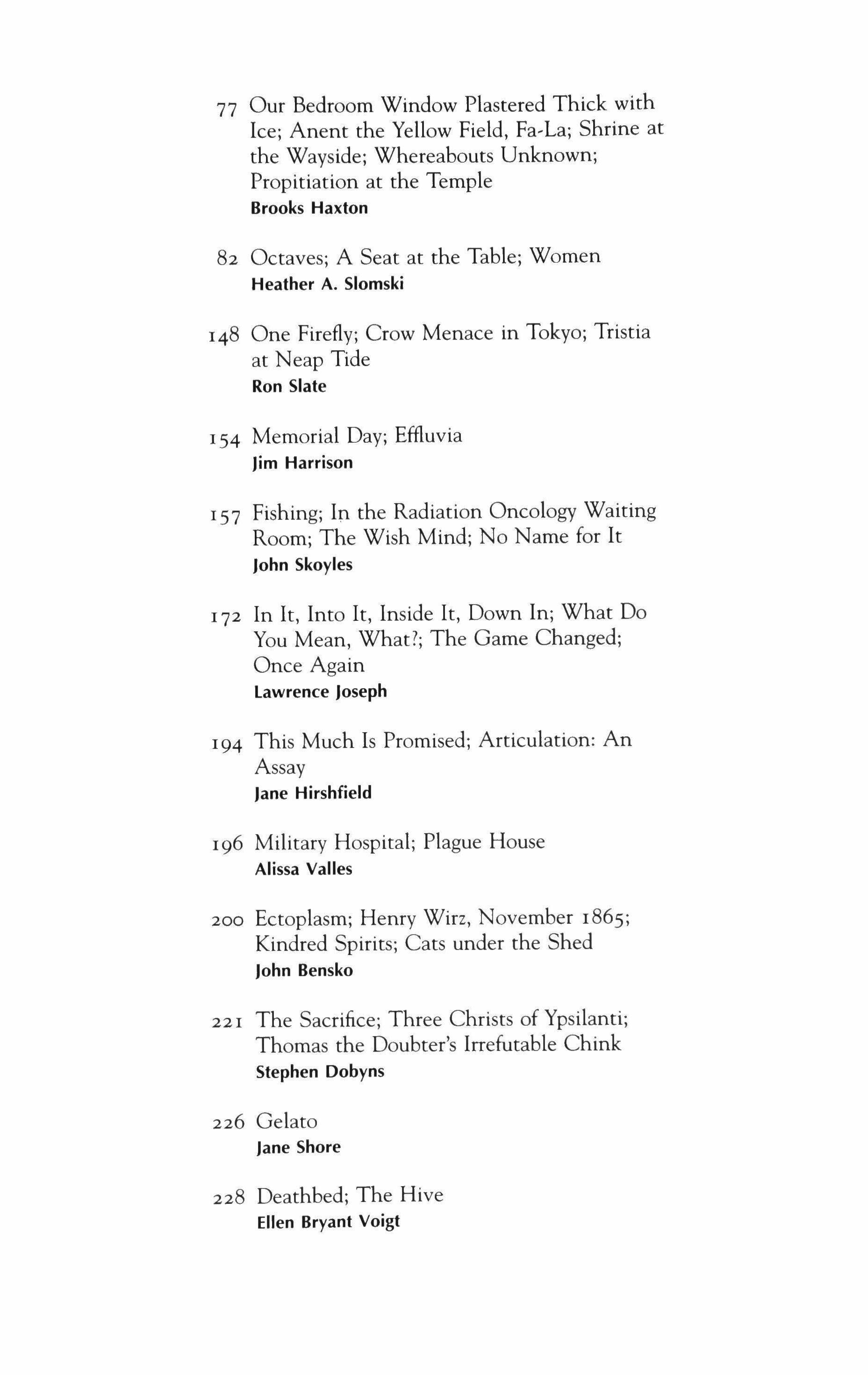
77 Our Bedroom Window Plastered Thick with Ice; Anent the Yellow Field, Fa-La; Shrine at the Wayside; Whereabouts Unknown; Propitiation at the Temple
Brooks Haxton
82 Octaves; A Seat at the Table; Women
Heather A. Slomski
148 One Firefly; Crow Menace in Tokyo; Tristia at Neap Tide
Ron Slate
154 Memorial Day; Effluvia
Jim Harrison
157 Fishing; In the Radiation Oncology Waiting Room; The Wish Mind; No Name for It
John Skoyles
172 In It, Into It, Inside It, Down In; What Do You Mean, What?; The Game Changed; Once Again
Lawrence Joseph
194 This Much Is Promised; Articulation: An Assay
Jane Hirshfield
196 Military Hospital; Plague House
Alissa Valles
200 Ectoplasm; Henry Wirz, November 1865; Kindred Spirits; Cats under the Shed
John Bensko
221 The Sacrifice; Three Christs of Ypsilanti; Thomas the Doubter's Irrefutable Chink
Stephen Dobyns
226 Gelato
Jane Shore
228 Deathbed; The Hive
Ellen Bryant Voigt
translations
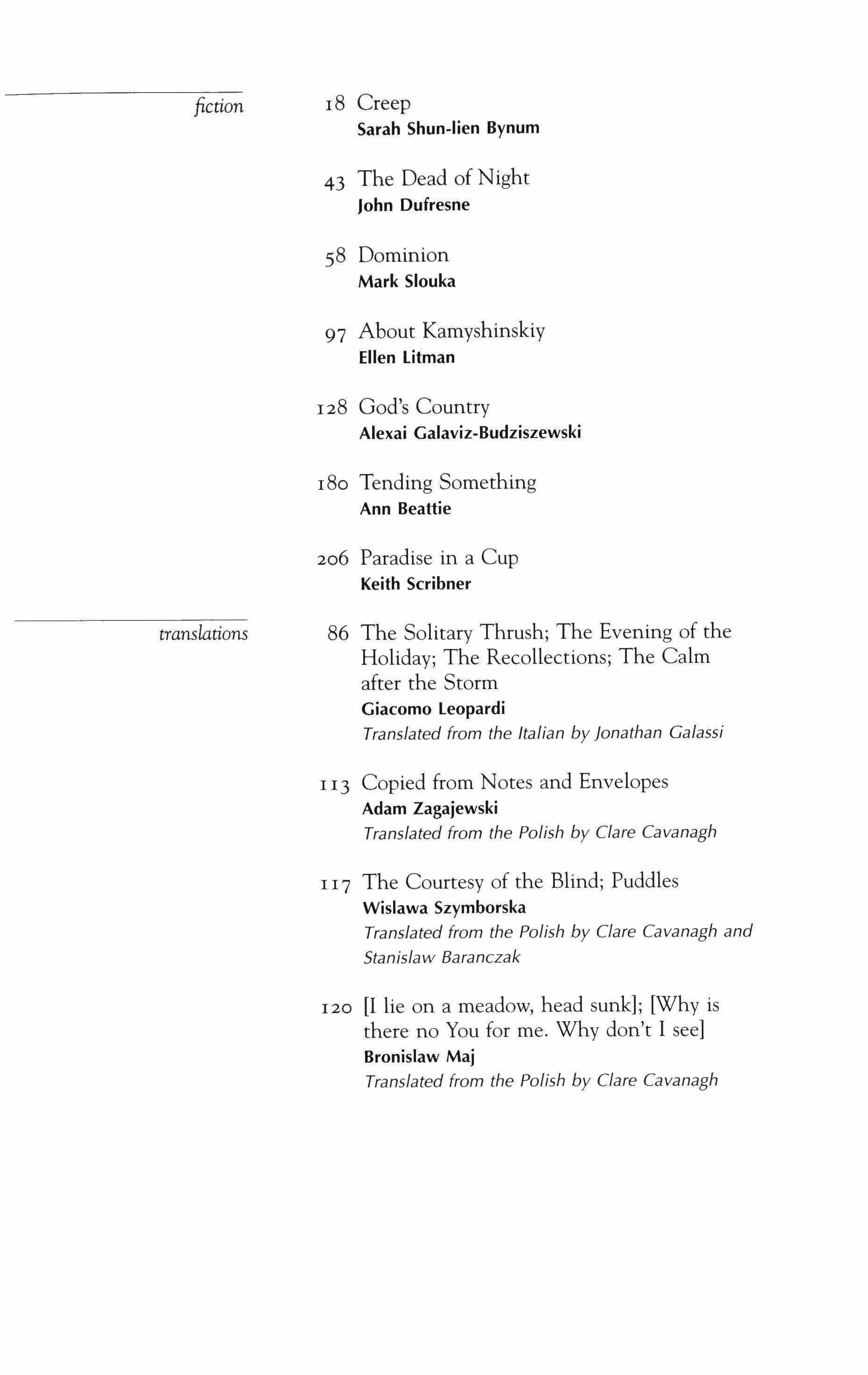
18 Creep
Sarah Shun-lien Bynum
43 The Dead of Night
John Dufresne
58 Dominion
Mark Siouka
97 About Kamyshinskiy
Ellen Litman
I28 God's Country
Alexai Galaviz-Budziszewski
180 Tending Something
Ann Beattie
206 Paradise in a Cup
Keith Scribner
86 The Solitary Thrush; The Evening of the Holiday; The Recollections; The Calm after the Storm
Giacomo Leopardi
Translated from the Italian by Jonathan Galassi
113 Copied from Notes and Envelopes
Adam Zagajewski
Translated from the Polish by Clare Cavanagh
117 The Courtesy of the Blind; Puddles
Wislawa Szymborska
Translated from the Polish by Clare Cavanagh and Stanislaw Baranczak
120 [I lie on a meadow, head sunk]; [Why is there no You for me. Why don't I see]
Bronislaw Maj
Translated from the Polish by Clare Cavanagh
fiction
122 Waste Paper, Scrap; [so let us try once more to play at open]; Not much; Act of Birth
Ryszard Krynicki
Translated from the Polish by Clare Cavanagh
127 What good luck
Ryszard Krynicki translated from the Polish by Alissa Valles
Three Landscapes, With Gamblers
Carlo Rotella 231 Contributors

Cover: The score of "Winesburg" by Donald Justice.
essay
162
Louise Gluck
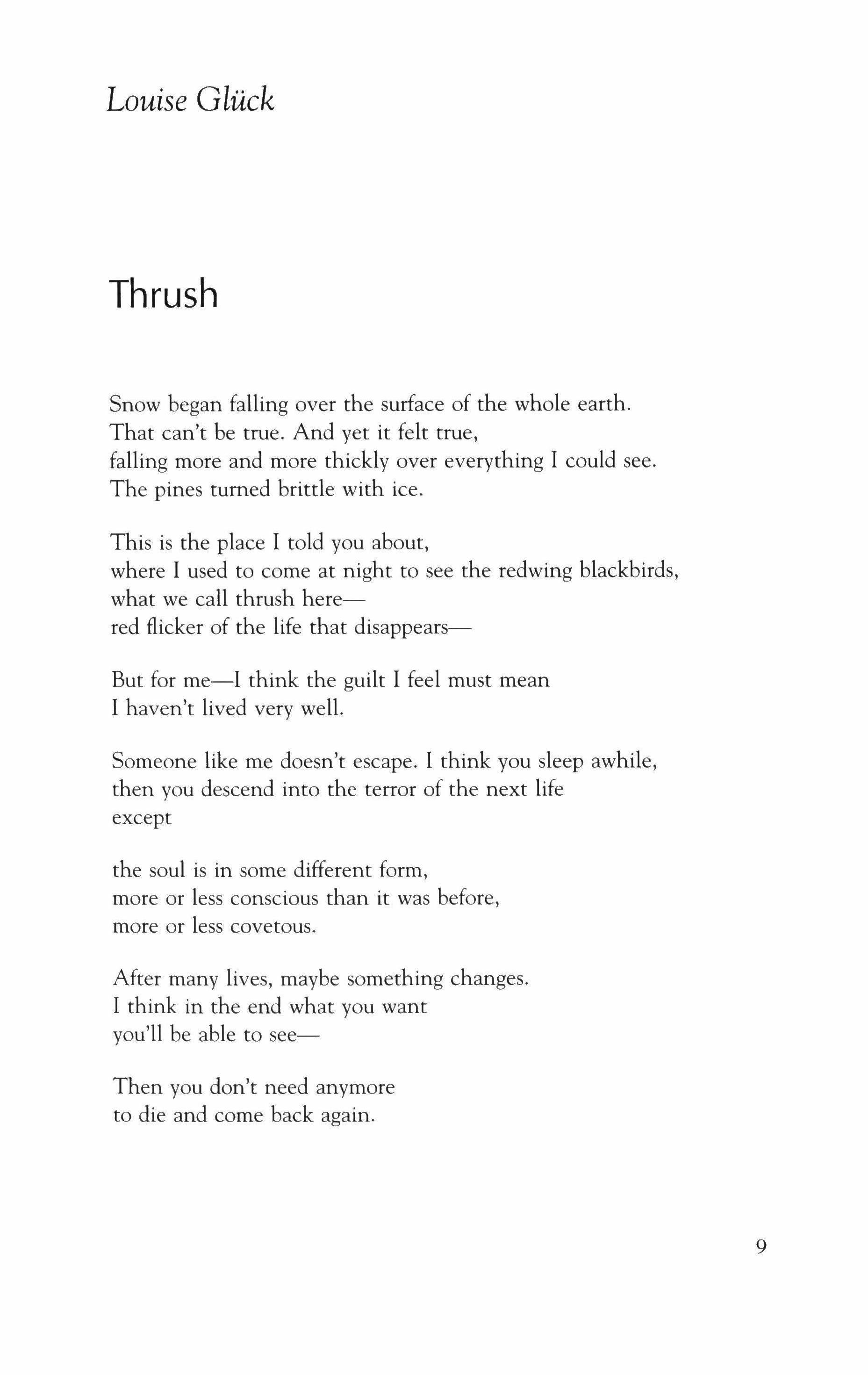
Thrush
Snow began falling over the surface of the whole earth. That can't be true. And yet it felt true, falling more and more thickly over everything I could see. The pines turned brittle with ice.
This is the place I told you about, where I used to come at night to see the redwing blackbirds, what we call thrush herered flicker of the life that disappears-
But for me-I think the guilt I feel must mean I haven't lived very well.
Someone like me doesn't escape. I think you sleep awhile, then you descend into the terror of the next life except
the soul is in some different form, more or less conscious than it was before, more or less covetous.
After many lives, maybe something changes. I think in the end what you want you'll be able to see-
Then you don't need anymore to die and come back again.
9
Persephone the Wanderer
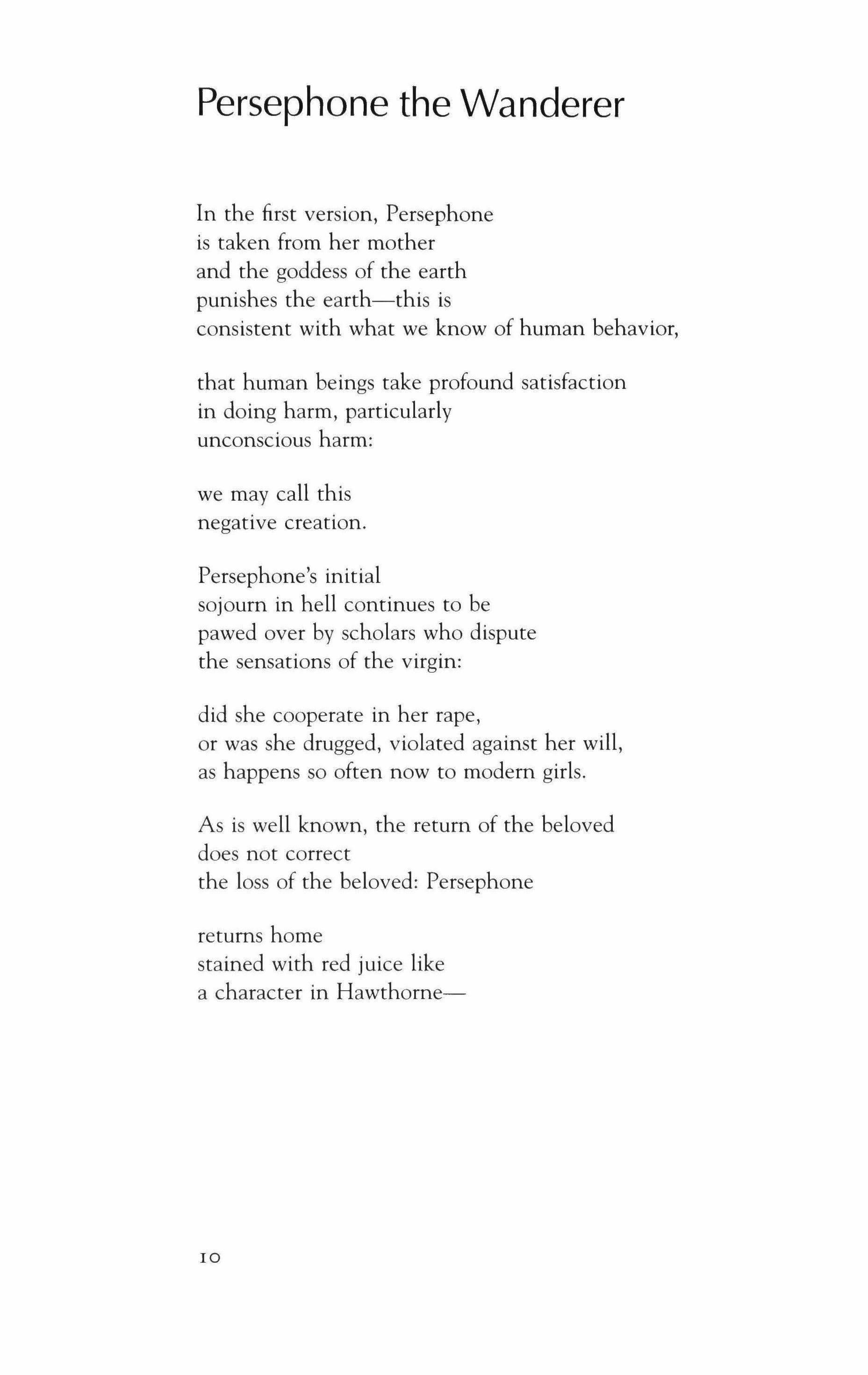
In the first version, Persephone is taken from her mother and the goddess of the earth punishes the earth-this is consistent with what we know of human behavior, that human beings take profound satisfaction in doing harm, particularly unconscious harm: we may call this negative creation.
Persephone's initial sojourn in hell continues to be pawed over by scholars who dispute the sensations of the virgin: did she cooperate in her rape, or was she drugged, violated against her will, as happens so often now to modem girls.
As is well known, the return of the beloved does not correct the loss of the beloved: Persephone returns home stained with red juice like a character in Hawthorne-
10
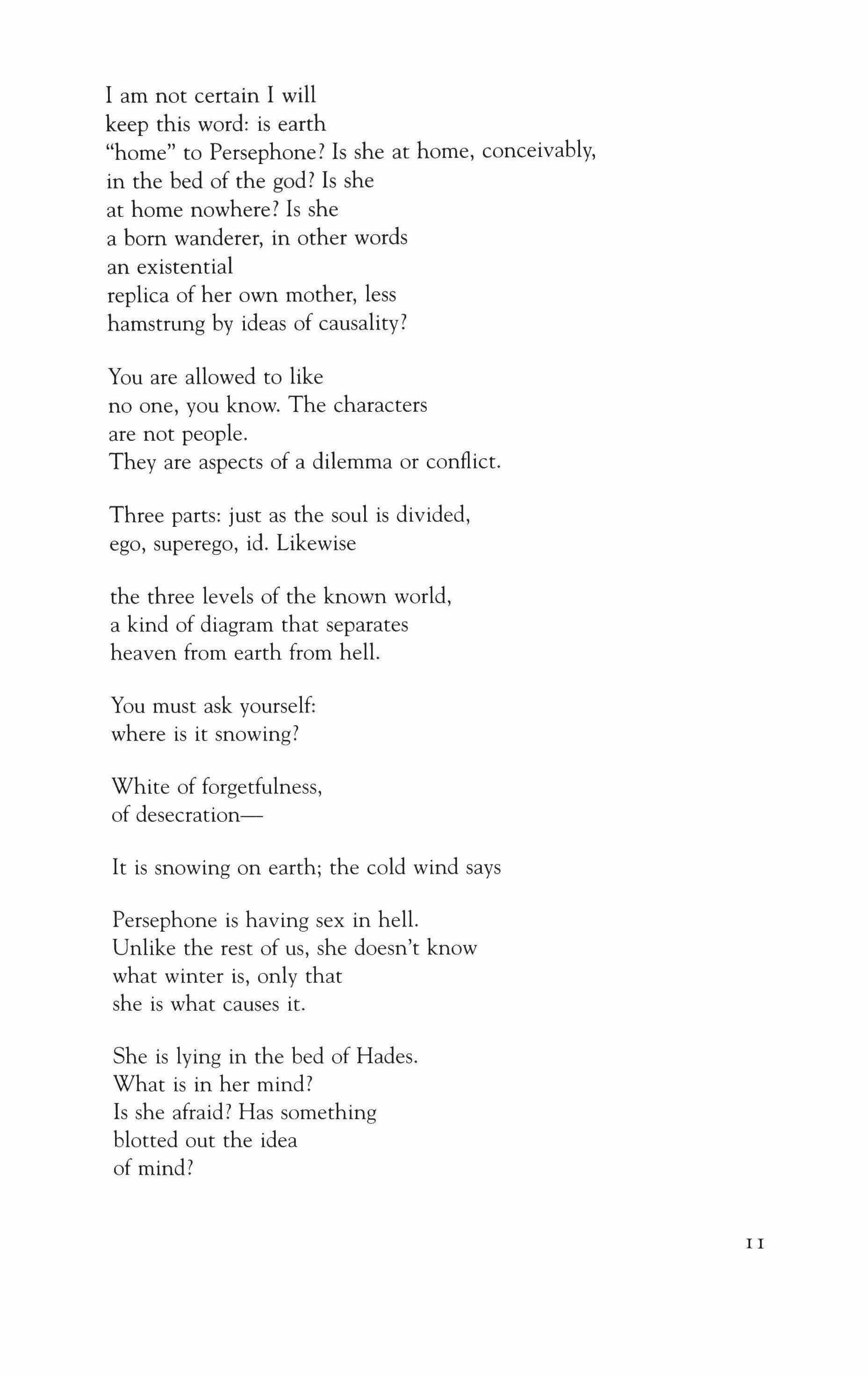
I am not certain I will keep this word: is earth "home" to Persephone? Is she at home, conceivably, in the bed of the god? Is she at home nowhere? Is she a born wanderer, in other words an existential replica of her own mother, less hamstrung by ideas of causality?
You are allowed to like no one, you know. The characters are not people. They are aspects of a dilemma or conflict.
Three parts: just as the soul is divided, ego, superego, id. Likewise the three levels of the known world, a kind of diagram that separates heaven from earth from hell.
You must ask yourself: where is it snowing?
White of forgetfulness, of desecration-
It is snowing on earth; the cold wind says Persephone is having sex in hell. Unlike the rest of us, she doesn't know what winter is, only that she is what causes it.
She is lying in the bed of Hades. What is in her mind? Is she afraid? Has something blotted out the idea of mind?
I I
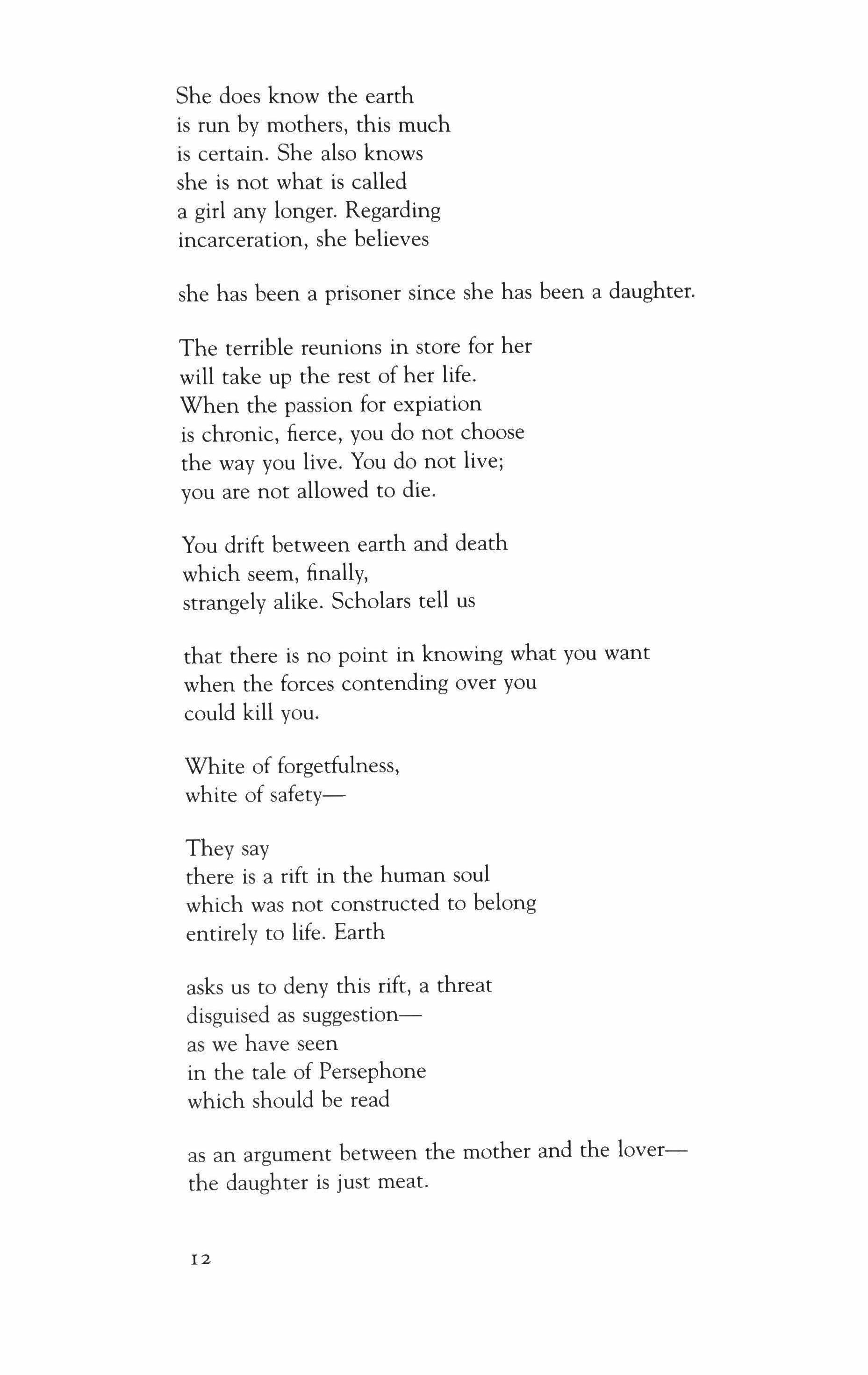
She does know the earth is run by mothers, this much is certain. She also knows she is not what is called a girl any longer. Regarding incarceration, she believes she has been a prisoner since she has been a daughter. The terrible reunions in store for her will take up the rest of her life. When the passion for expiation is chronic, fierce, you do not choose the way you live. You do not live; you are not allowed to die.
You drift between earth and death which seem, finally, strangely alike. Scholars tell us that there is no point in knowing what you want when the forces contending over you could kill you.
White of forgetfulness, white of safety-
They say there is a rift in the human soul which was not constructed to belong entirely to life. Earth asks us to deny this rift, a threat disguised as suggestionas we have seen in the tale of Persephone which should be read as an argument between the mother and the loverthe daughter is just meat.
12
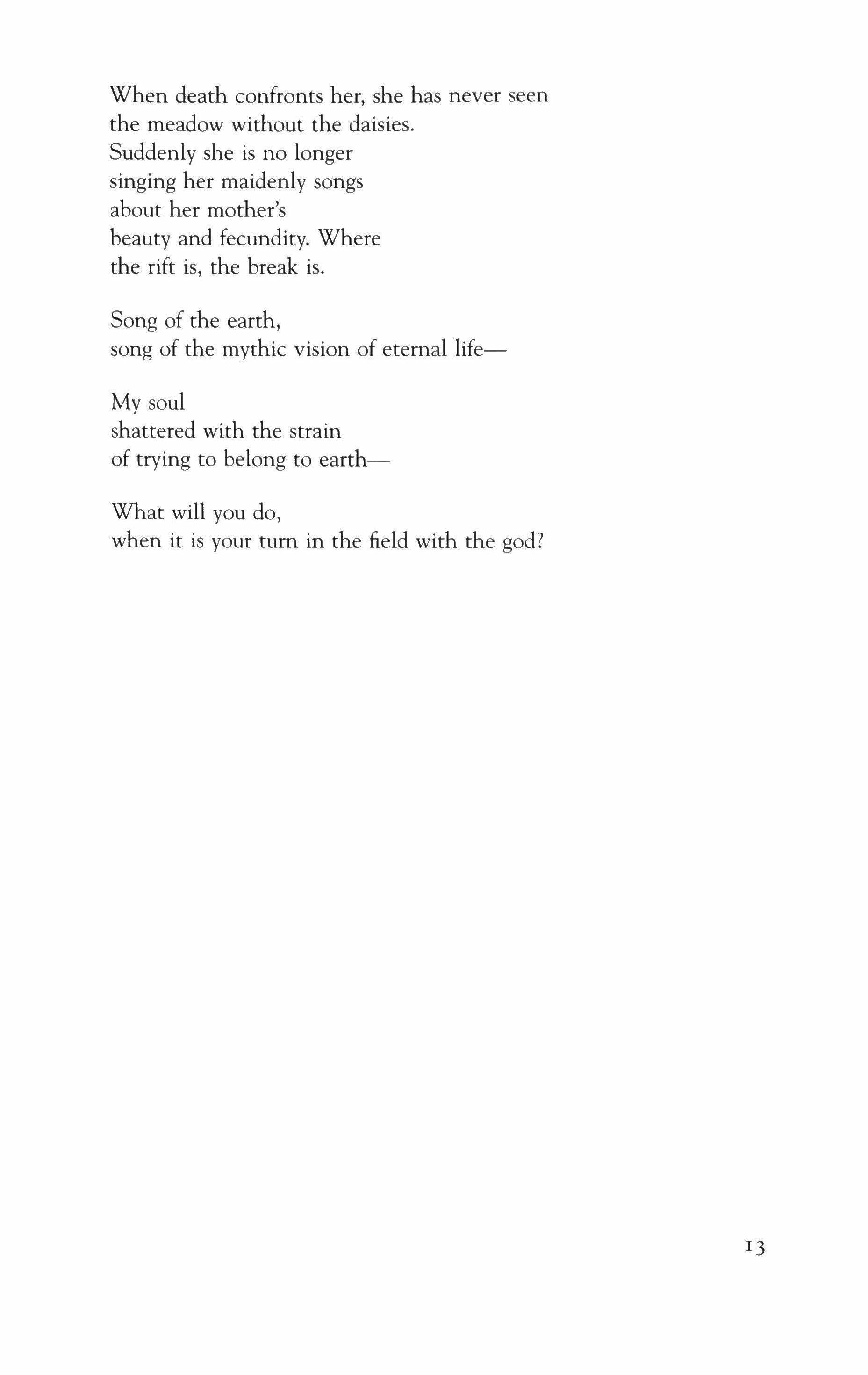
When death confronts her, she has never seen the meadow without the daisies. Suddenly she is no longer singing her maidenly songs about her mother's beauty and fecundity. Where the rift is, the break is.
Song of the earth, song of the mythic vision of eternal life-
My soul shattered with the strain of trying to belong to earth-
What will you do, when it is your tum in the field with the god?
I3
Persephone the Wanderer
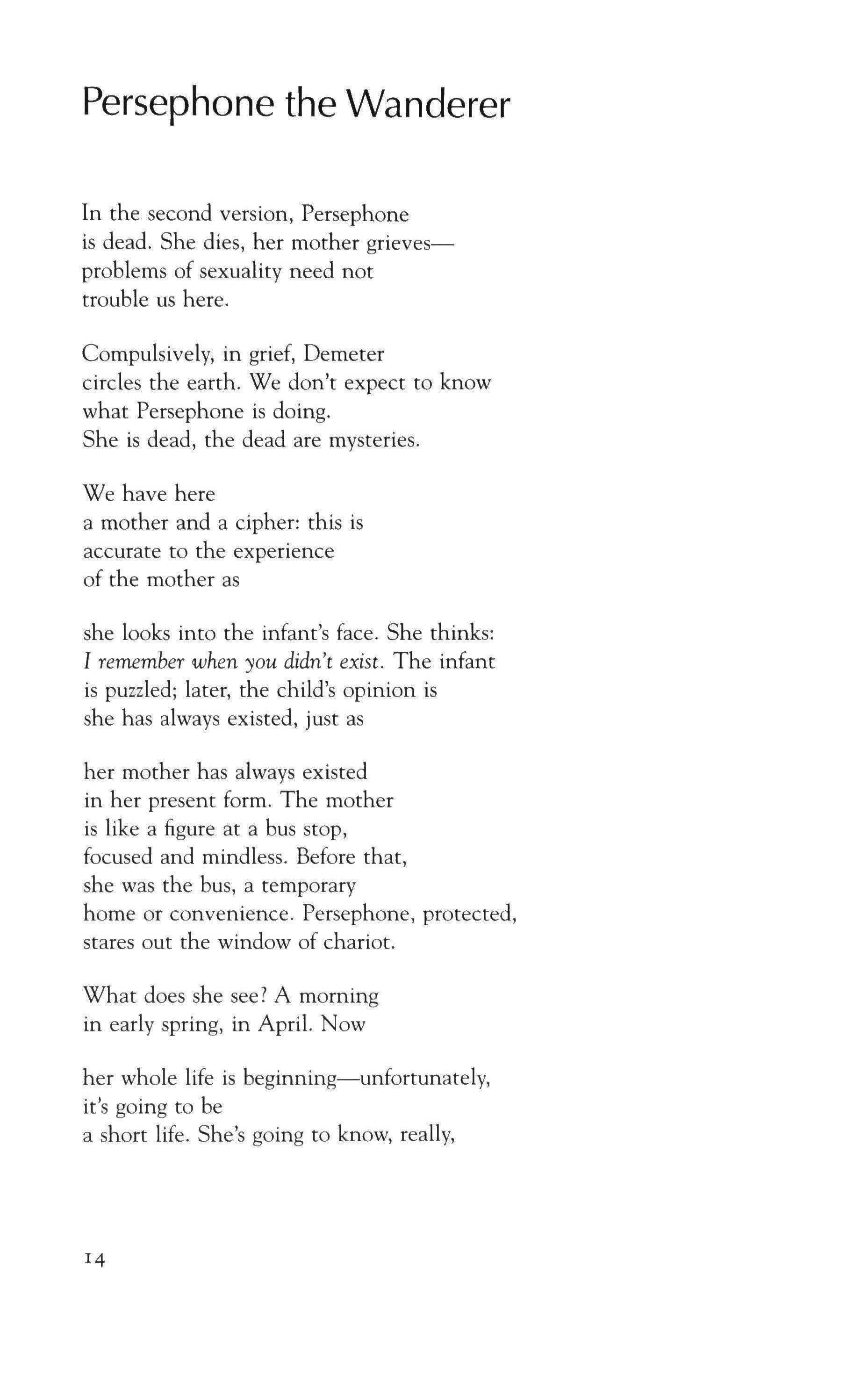
In the second version, Persephone is dead. She dies, her mother grievesproblems of sexuality need not trouble us here.
Compulsively, in grief, Demeter circles the earth. We don't expect to know what Persephone is doing. She is dead, the dead are mysteries. We have here a mother and a cipher: this is accurate to the experience of the mother as she looks into the infant's face. She thinks: I remember when you didn't exist. The infant is puzzled; later, the child's opinion is she has always existed, just as
her mother has always existed in her present form. The mother is like a figure at a bus stop, focused and mindless. Before that, she was the bus, a temporary home or convenience. Persephone, protected, stares out the window of chariot.
What does she see? A morning in early spring, in April. Now
her whole life is beginning-unfortunately, it's going to be a short life. She's going to know, really,
14
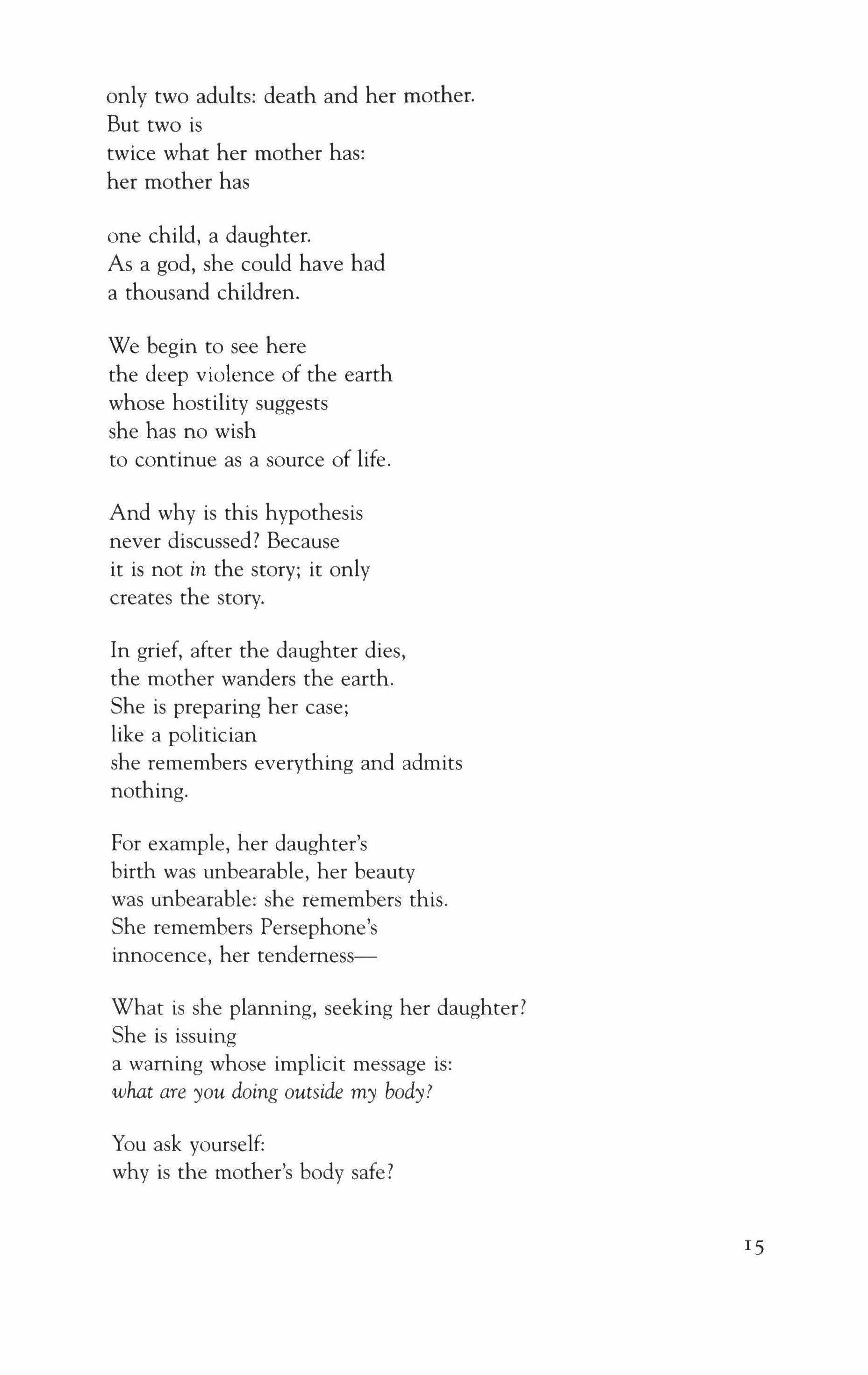
only two adults: death and her mother. But two is twice what her mother has: her mother has one child, a daughter. As a god, she could have had a thousand children.
We begin to see here the deep violence of the earth whose hostility suggests she has no wish to continue as a source of life.
And why is this hypothesis never discussed? Because it is not in the story; it only creates the story.
In grief, after the daughter dies, the mother wanders the earth. She is preparing her case; like a politician she remembers everything and admits nothing.
For example, her daughter's birth was unbearable, her beauty was unbearable: she remembers this. She remembers Persephone's innocence, her tenderness-
What is she planning, seeking her daughter? She is issuing a warning whose implicit message is: what are you doing outside my body?
You ask yourself: why is the mother's body safe?
15
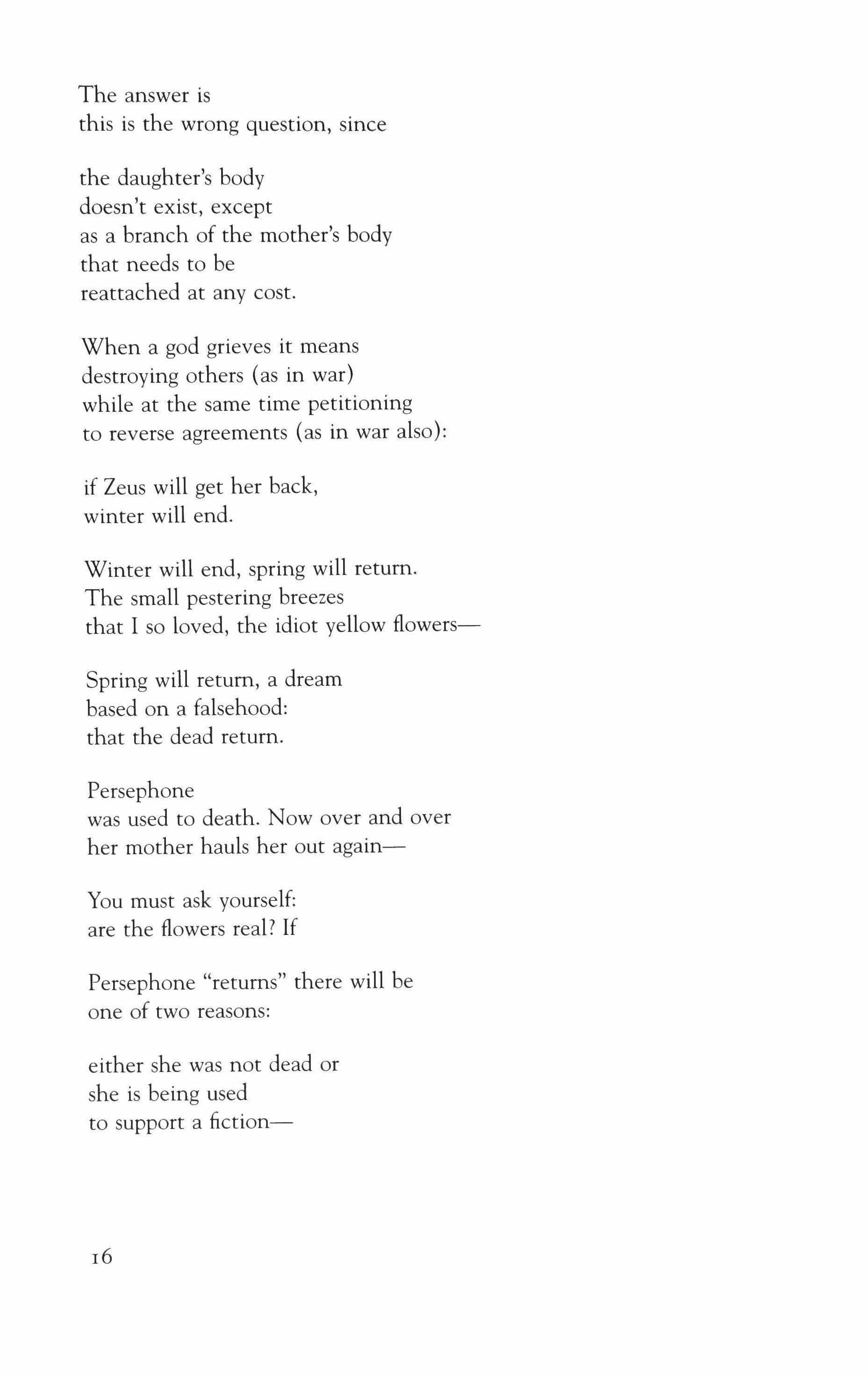
The answer is this is the wrong question, since
the daughter's body doesn't exist, except as a branch of the mother's body that needs to be reattached at any cost.
When a god grieves it means destroying others (as in war) while at the same time petitioning to reverse agreements (as in war also):
if Zeus will get her back, winter will end.
Winter will end, spring will return. The small pestering breezes that I so loved, the idiot yellow flowers-
Spring will return, a dream based on a falsehood: that the dead return.
Persephone was used to death. Now over and over her mother hauls her out again-
You must ask yourself: are the flowers real? If
Persephone "returns" there will be one of two reasons: either she was not dead or she is being used to support a fiction-

I think I can remember being dead. Many times, in winter, I approached Zeus. Tell me, I would ask him, how can I endure the earth?
And he would say, in a short time you will be here again. And in the time between you will forget everything: those fields of ice will be the meadows of Elysium.
Sarah Shun--lien Bynum
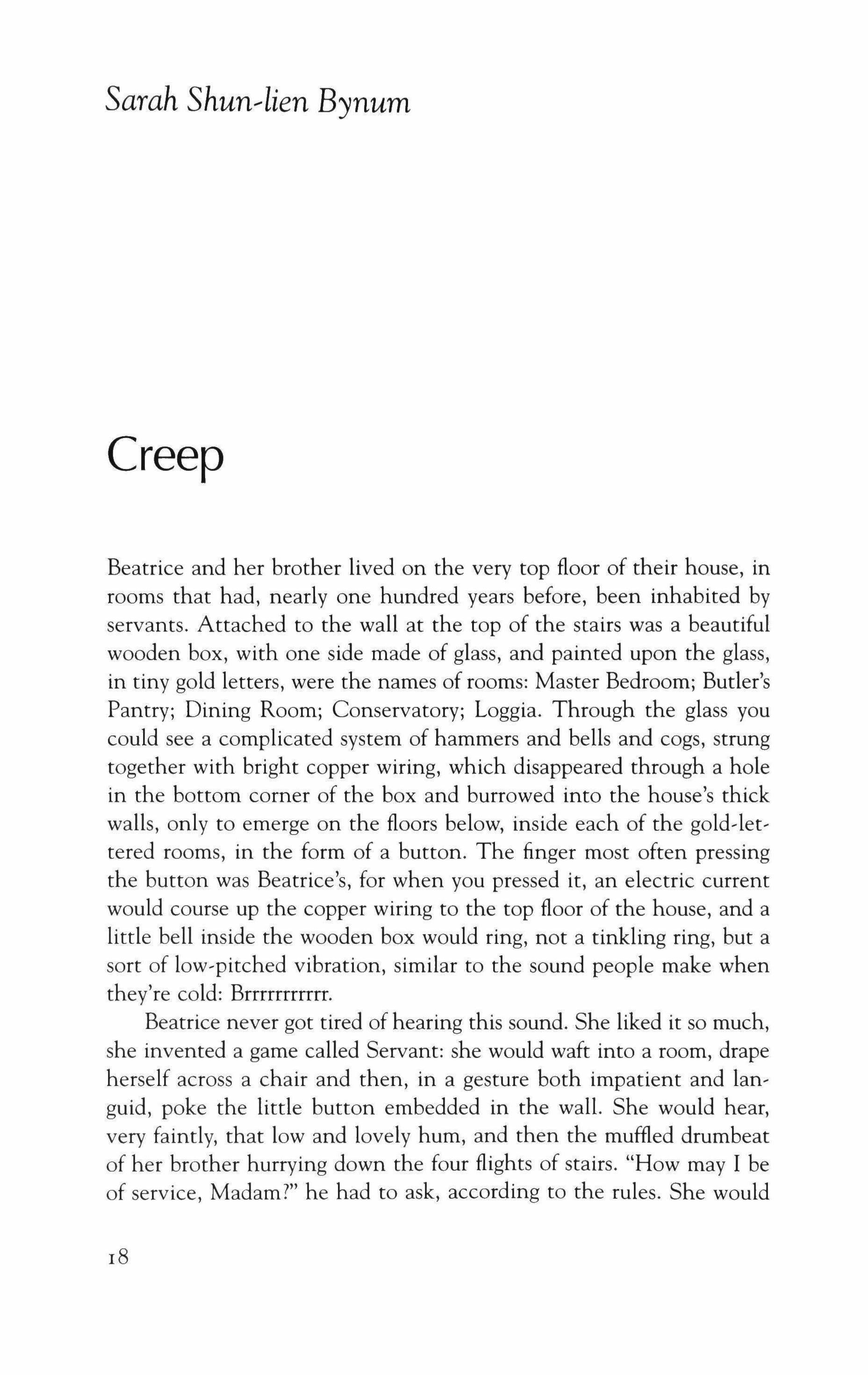
Creep
Beatrice and her brother lived on the very top floor of their house, in rooms that had, nearly one hundred years before, been inhabited by servants. Attached to the wall at the top of the stairs was a beautiful wooden box, with one side made of glass, and painted upon the glass, in tiny gold letters, were the names of rooms: Master Bedroom; Butler's Pantry; Dining Room; Conservatory; Loggia. Through the glass you could see a complicated system of hammers and bells and cogs, strung together with bright copper wiring, which disappeared through a hole in the bottom corner of the box and burrowed into the house's thick walls, only to emerge on the floors below, inside each of the gold-lettered rooms, in the form of a button. The finger most often pressing the button was Beatrice's, for when you pressed it, an electric current would course up the copper wiring to the top floor of the house, and a little bell inside the wooden box would ring, not a tinkling ring, but a sort of low-pitched vibration, similar to the sound people make when they're cold: Brrrrrrrrrrr.
Beatrice never got tired of hearing this sound. She liked it so much, she invented a game called Servant: she would waft into a room, drape herself across a chair and then, in a gesture both impatient and Ianguid, poke the little button embedded in the wall. She would hear, very faintly, that low and lovely hum, and then the muffled drumbeat of her brother hurrying down the four flights of stairs. "How may I be of service, Madam?" he had to ask, according to the rules. She would
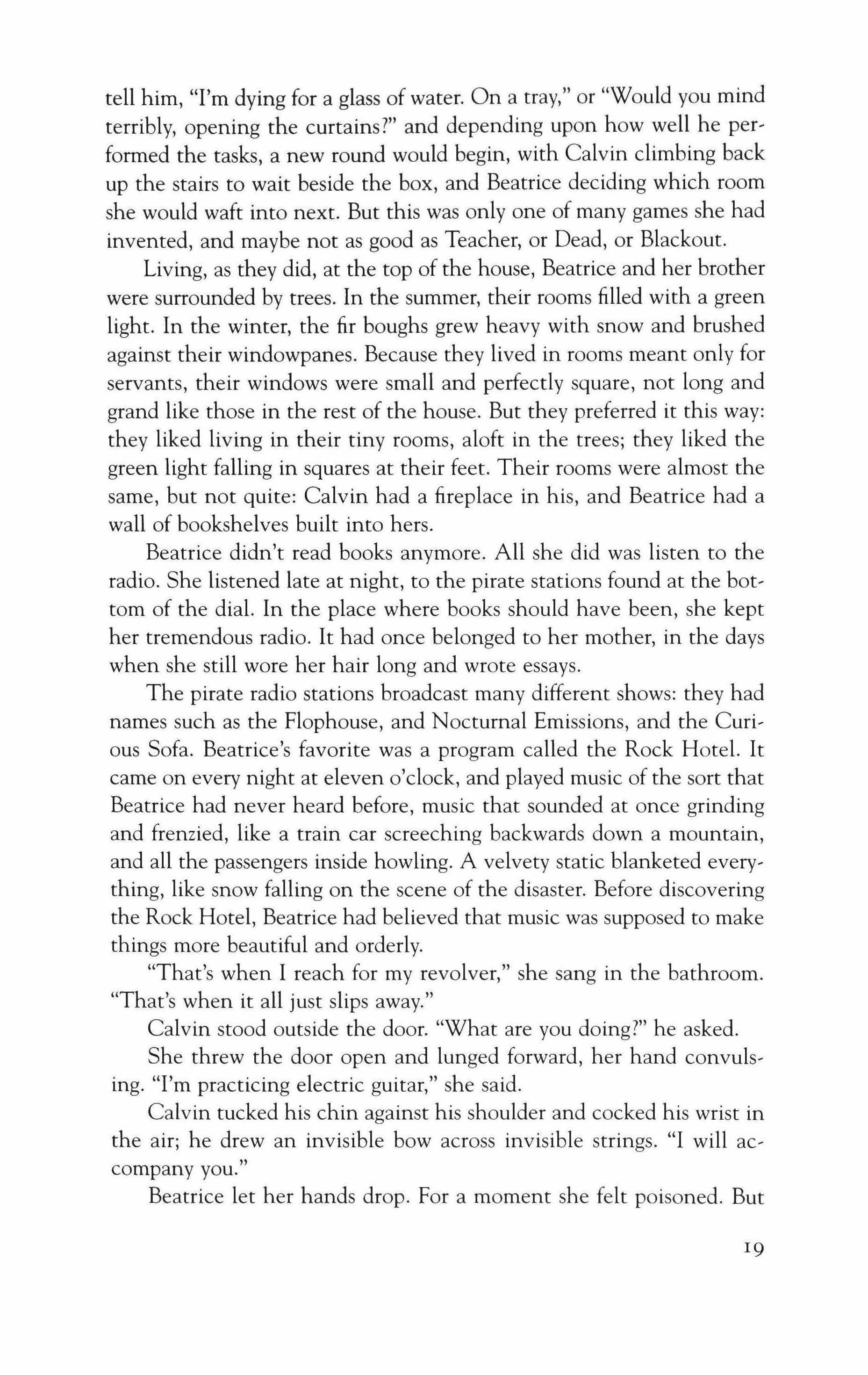
tell him, "I'm dying for a glass of water. On a tray," or "Would you mind terribly, opening the curtains?" and depending upon how well he performed the tasks, a new round would begin, with Calvin climbing back up the stairs to wait beside the box, and Beatrice deciding which room she would waft into next. But this was only one of many games she had invented, and maybe not as good as Teacher, or Dead, or Blackout.
Living, as they did, at the top of the house, Beatrice and her brother were surrounded by trees. In the summer, their rooms filled with a green light. In the winter, the fir boughs grew heavy with snow and brushed against their windowpanes. Because they lived in rooms meant only for servants, their windows were small and perfectly square, not long and grand like those in the rest of the house. But they preferred it this way: they liked living in their tiny rooms, aloft in the trees; they liked the green light falling in squares at their feet. Their rooms were almost the same, but not quite: Calvin had a fireplace in his, and Beatrice had a wall of bookshelves built into hers.
Beatrice didn't read books anymore. All she did was listen to the radio. She listened late at night, to the pirate stations found at the bottom of the dial. In the place where books should have been, she kept her tremendous radio. It had once belonged to her mother, in the days when she still wore her hair long and wrote essays.
The pirate radio stations broadcast many different shows: they had names such as the Flophouse, and Nocturnal Emissions, and the Curious Sofa. Beatrice's favorite was a program called the Rock Hotel. It came on every night at eleven o'clock, and played music of the sort that Beatrice had never heard before, music that sounded at once grinding and frenzied, like a train car screeching backwards down a mountain, and all the passengers inside howling. A velvety static blanketed everything, like snow falling on the scene of the disaster. Before discovering the Rock Hotel, Beatrice had believed that music was supposed to make things more beautiful and orderly.
"That's when I reach for my revolver," she sang in the bathroom. "That's when it all just slips away."
Calvin stood outside the door. "What are you doing?" he asked.
She threw the door open and lunged forward, her hand convulsing. "I'm practicing electric guitar," she said.
Calvin tucked his chin against his shoulder and cocked his wrist in the air; he drew an invisible bow across invisible strings. "I will accompany you."
Beatrice let her hands drop. For a moment she felt poisoned. But
19
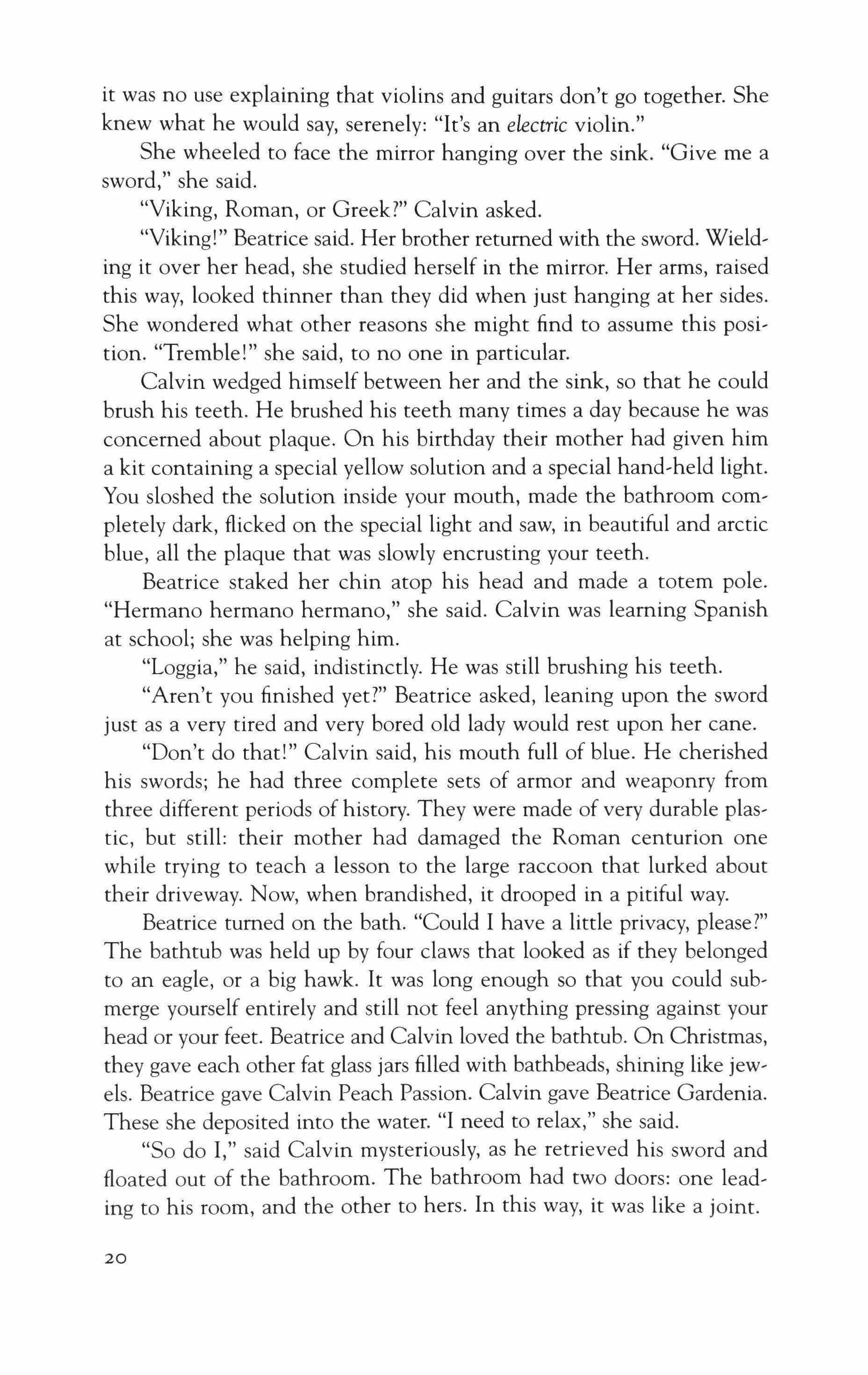
it was no use explaining that violins and guitars don't go together. She knew what he would say, serenely: "It's an electric violin."
She wheeled to face the mirror hanging over the sink. "Give me a sword," she said.
"Viking, Roman, or Greek?" Calvin asked.
"Viking!" Beatrice said. Her brother returned with the sword. Wield� ing it over her head, she studied herself in the mirror. Her arms, raised this way, looked thinner than they did when just hanging at her sides. She wondered what other reasons she might find to assume this position. "Tremble!" she said, to no one in particular.
Calvin wedged himself between her and the sink, so that he could brush his teeth. He brushed his teeth many times a day because he was concerned about plaque. On his birthday their mother had given him a kit containing a special yellow solution and a special hand-held light. You sloshed the solution inside your mouth, made the bathroom completely dark, flicked on the special light and saw, in beautiful and arctic blue, all the plaque that was slowly encrusting your teeth.
Beatrice staked her chin atop his head and made a totem pole. "Herrnano hermano hermano," she said. Calvin was learning Spanish at school; she was helping him.
"Loggia," he said, indistinctly. He was still brushing his teeth.
"Aren't you finished yet?" Beatrice asked, leaning upon the sword just as a very tired and very bored old lady would rest upon her cane.
"Don't do that!" Calvin said, his mouth full of blue. He cherished his swords; he had three complete sets of armor and weaponry from three different periods of history. They were made of very durable plastic, but still: their mother had damaged the Roman centurion one while trying to teach a lesson to the large raccoon that lurked about their driveway. Now, when brandished, it drooped in a pitiful way.
Beatrice turned on the bath. "Could I have a little privacy, please?" The bathtub was held up by four claws that looked as if they belonged to an eagle, or a big hawk. It was long enough so that you could submerge yourself entirely and still not feel anything pressing against your head or your feet. Beatrice and Calvin loved the bathtub. On Christmas, they gave each other fat glass jars filled with bathbeads, shining like jewels. Beatrice gave Calvin Peach Passion. Calvin gave Beatrice Gardenia. These she deposited into the water. "I need to relax," she said.
"So do I," said Calvin mysteriously, as he retrieved his sword and floated out of the bathroom. The bathroom had two doors: one leading to his room, and the other to hers. In this way, it was like a joint.
20
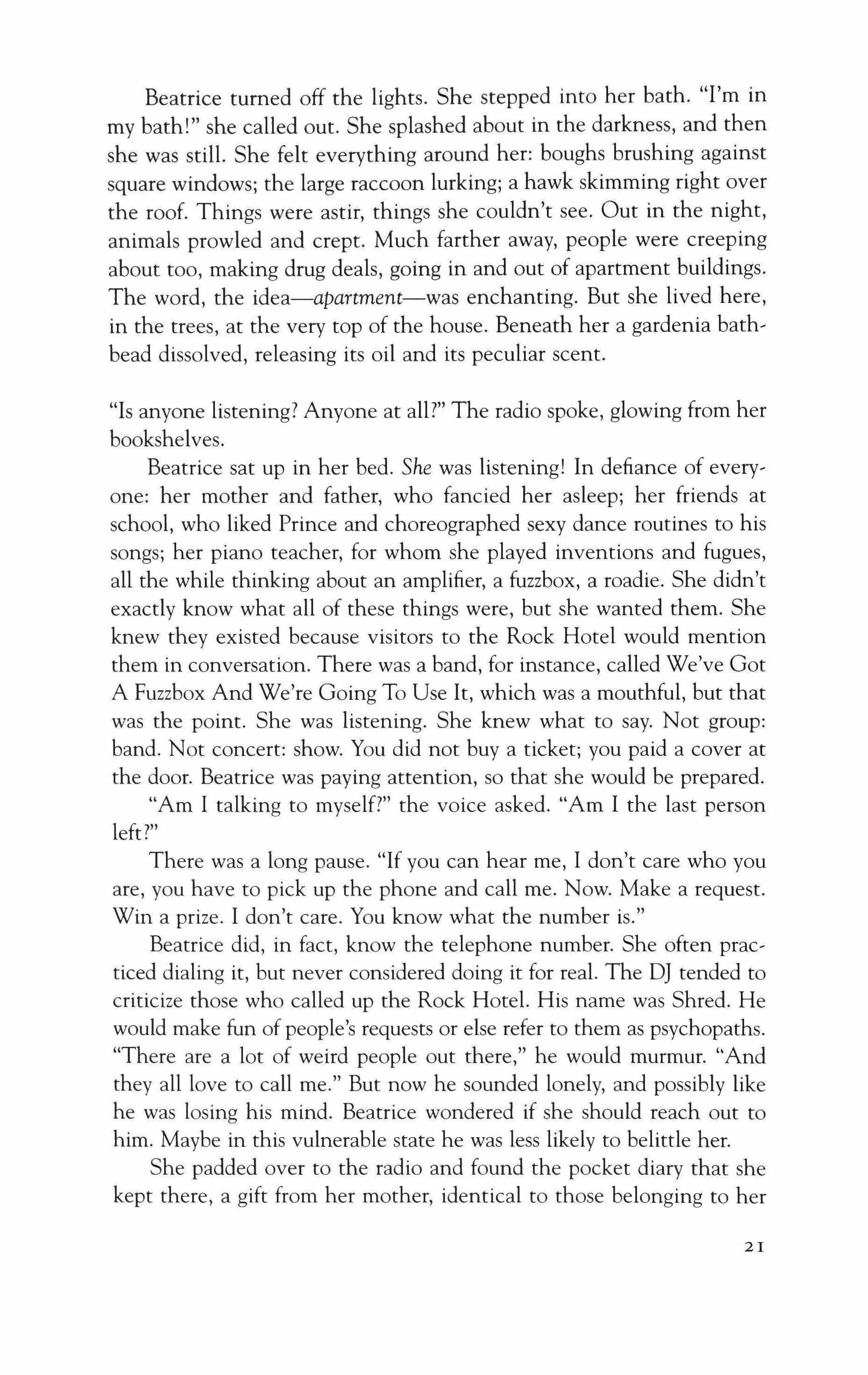
Beatrice turned off the lights. She stepped into her bath. "I'm in my bath!" she called out. She splashed about in the darkness, and then she was still. She felt everything around her: boughs brushing against square windows; the large raccoon lurking; a hawk skimming right over the roof. Things were astir, things she couldn't see. Out in the night, animals prowled and crept. Much farther away, people were creeping about too, making drug deals, going in and out of apartment buildings. The word, the idea-apartment-was enchanting. But she lived here, in the trees, at the very top of the house. Beneath her a gardenia bathbead dissolved, releasing its oil and its peculiar scent.
"Is anyone listening? Anyone at all?" The radio spoke, glowing from her bookshelves.
Beatrice sat up in her bed. She was listening! In defiance of everyone: her mother and father, who fancied her asleep; her friends at school, who liked Prince and choreographed sexy dance routines to his songs; her piano teacher, for whom she played inventions and fugues, all the while thinking about an amplifier, a fuzzbox, a roadie. She didn't exactly know what all of these things were, but she wanted them. She knew they existed because visitors to the Rock Hotel would mention them in conversation. There was a band, for instance, called We've Got A Fuzzbox And We're Going To Use It, which was a mouthful, but that was the point. She was listening. She knew what to say. Not group: band. Not concert: show. You did not buy a ticket; you paid a cover at the door. Beatrice was paying attention, so that she would be prepared. "Am I talking to myself?" the voice asked. "Am I the last person left?"
There was a long pause. "If you can hear me, I don't care who you are, you have to pick up the phone and call me. Now. Make a request. Win a prize. I don't care. You know what the number is."
Beatrice did, in fact, know the telephone number. She often practiced dialing it, but never considered doing it for real. The OJ tended to criticize those who called up the Rock Hotel. His name was Shred. He would make fun of people's requests or else refer to them as psychopaths. "There are a lot of weird people out there," he would murmur. "And they all love to call me." But now he sounded lonely, and possibly like he was losing his mind. Beatrice wondered if she should reach out to him. Maybe in this vulnerable state he was less likely to belittle her.
She padded over to the radio and found the pocket diary that she kept there, a gift from her mother, identical to those belonging to her
21
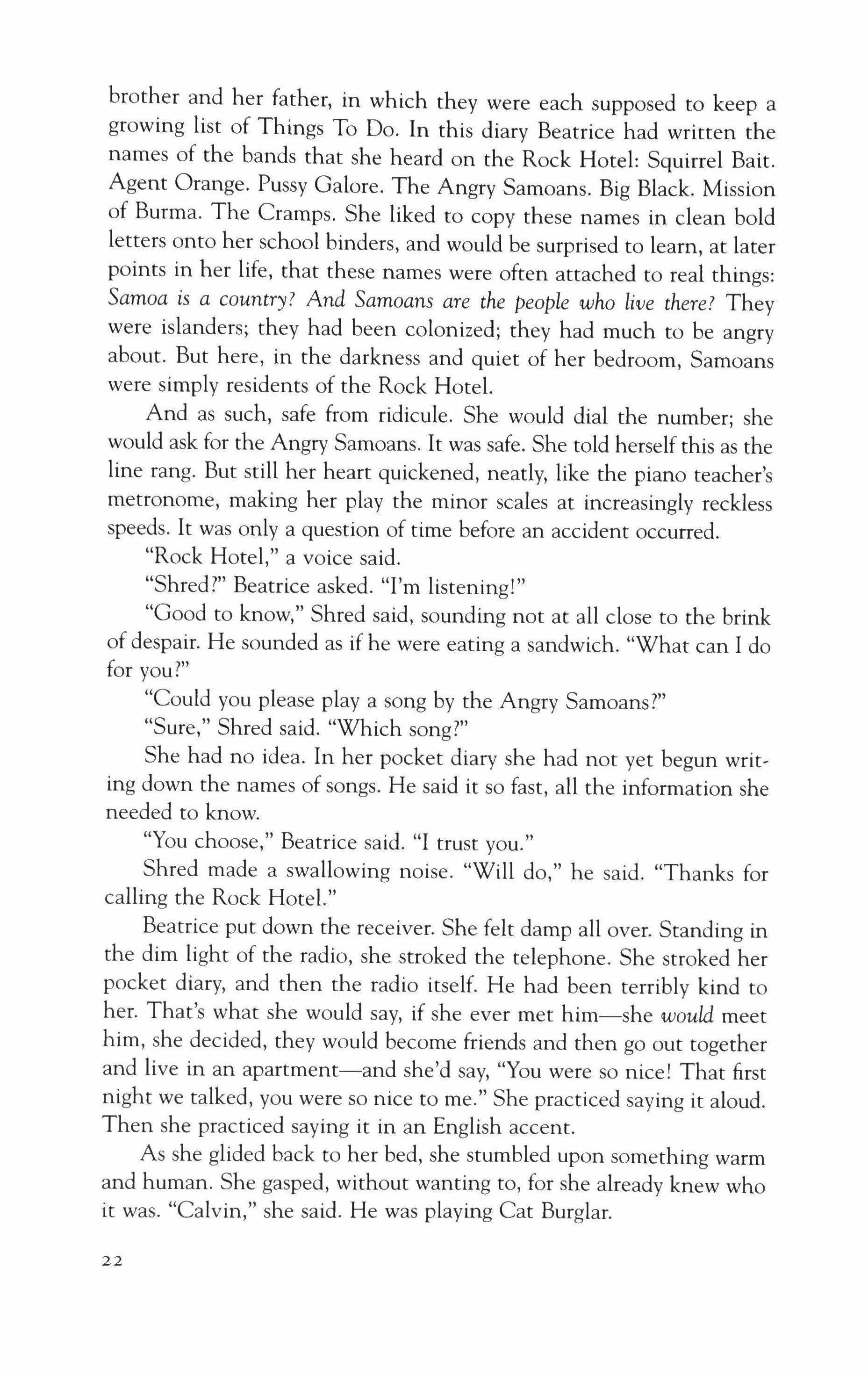
brother and her father, in which they were each supposed to keep a growing list of Things To Do. In this diary Beatrice had written the names of the bands that she heard on the Rock Hotel: Squirrel Bait. Agent Orange. Pussy Galore. The Angry Samoans. Big Black. Mission of Burma. The Cramps. She liked to copy these names in clean bold letters onto her school binders, and would be surprised to learn, at later points in her life, that these names were often attached to real things: Samoa is a country? And Samoans are the people who live there? They were islanders; they had been colonized; they had much to be angry about. But here, in the darkness and quiet of her bedroom, Samoans were simply residents of the Rock Hotel.
And as such, safe from ridicule. She would dial the number; she would ask for the Angry Samoans. It was safe. She told herself this as the line rang. But still her heart quickened, neatly, like the piano teacher's metronome, making her play the minor scales at increasingly reckless speeds. It was only a question of time before an accident occurred.
"Rock Hotel," a voice said.
"Shred?" Beatrice asked. "I'm listening!"
"Good to know," Shred said, sounding not at all close to the brink of despair. He sounded as if he were eating a sandwich. "What can I do for you?"
"Could you please playa song by the Angry Samoans?"
"Sure," Shred said. "Which song?"
She had no idea. In her pocket diary she had not yet begun writing down the names of songs. He said it so fast, all the information she needed to know.
"You choose," Beatrice said. "I trust you."
Shred made a swallowing noise. "Will do," he said. "Thanks for calling the Rock Hotel."
Beatrice put down the receiver. She felt damp all over. Standing in the dim light of the radio, she stroked the telephone. She stroked her pocket diary, and then the radio itself. He had been terribly kind to her. That's what she would say, if she ever met him-she would meet him, she decided, they would become friends and then go out together and live in an apartment-and she'd say, "You were so nice! That first night we talked, you were so nice to me." She practiced saying it aloud. Then she practiced saying it in an English accent.
As she glided back to her bed, she stumbled upon something warm and human. She gasped, without wanting to, for she already knew who it was. "Calvin," she said. He was playing Cat Burglar.
22
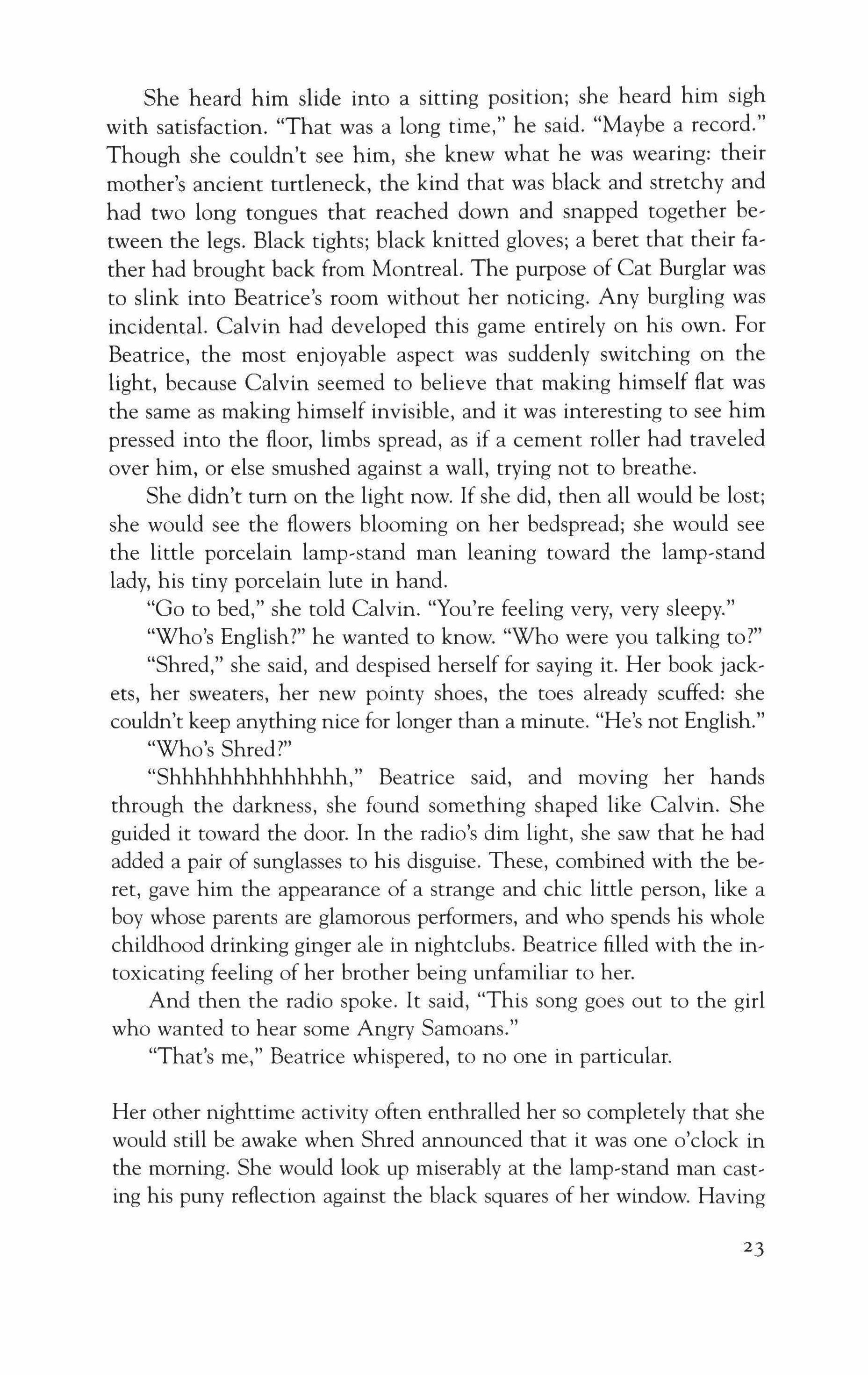
She heard him slide into a sitting position; she heard him sigh with satisfaction. "That was a long time," he said. "Maybe a record." Though she couldn't see him, she knew what he was wearing: their mother's ancient turtleneck, the kind that was black and stretchy and had two long tongues that reached down and snapped together between the legs. Black tights; black knitted gloves; a beret that their father had brought back from Montreal. The purpose of Cat Burglar was to slink into Beatrice's room without her noticing. Any burgling was incidental. Calvin had developed this game entirely on his own. For Beatrice, the most enjoyable aspect was suddenly switching on the light, because Calvin seemed to believe that making himself flat was the same as making himself invisible, and it was interesting to see him pressed into the floor, limbs spread, as if a cement roller had traveled over him, or else smushed against a wall, trying not to breathe.
She didn't tum on the light now. If she did, then all would be lost; she would see the flowers blooming on her bedspread; she would see the little porcelain lamp-stand man leaning toward the lamp-stand lady, his tiny porcelain lute in hand.
"Go to bed," she told Calvin. "You're feeling very, very sleepy."
"Who's English?" he wanted to know. "Who were you talking to?"
"Shred," she said, and despised herself for saying it. Her book jackets, her sweaters, her new pointy shoes, the toes already scuffed: she couldn't keep anything nice for longer than a minute. "He's not English."
"Who's Shred?"
"Shhhhhhhhhhhhhh," Beatrice said, and moving her hands through the darkness, she found something shaped like Calvin. She guided it toward the door. In the radio's dim light, she saw that he had added a pair of sunglasses to his disguise. These, combined with the beret, gave him the appearance of a strange and chic little person, like a boy whose parents are glamorous performers, and who spends his whole childhood drinking ginger ale in nightclubs. Beatrice filled with the intoxicating feeling of her brother being unfamiliar to her.
And then the radio spoke. It said, "This song goes out to the girl who wanted to hear some Angry Samoans."
"That's me," Beatrice whispered, to no one in particular.
Her other nighttime activity often enthralled her so completely that she would still be awake when Shred announced that it was one o'clock in the morning. She would look up miserably at the lamp-stand man casting his puny reflection against the black squares of her window. Having
23
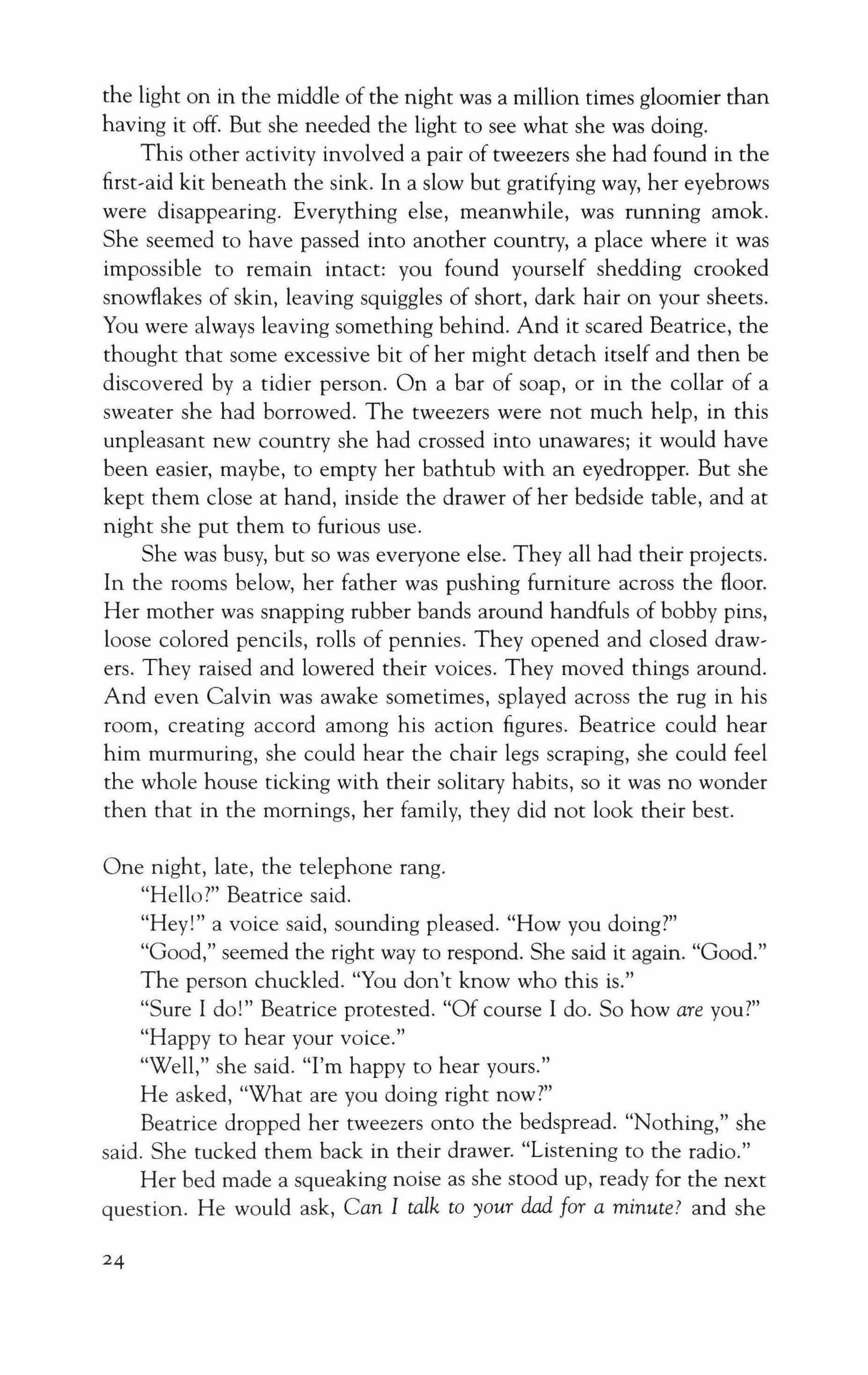
the light on in the middle of the night was a million times gloomier than having it off. But she needed the light to see what she was doing.
This other activity involved a pair of tweezers she had found in the first-aid kit beneath the sink. In a slow but gratifying way, her eyebrows were disappearing. Everything else, meanwhile, was running amok. She seemed to have passed into another country, a place where it was impossible to remain intact: you found yourself shedding crooked snowflakes of skin, leaving squiggles of short, dark hair on your sheets. You were always leaving something behind. And it scared Beatrice, the thought that some excessive bit of her might detach itself and then be discovered by a tidier person. On a bar of soap, or in the collar of a sweater she had borrowed. The tweezers were not much help, in this unpleasant new country she had crossed into unawares; it would have been easier, maybe, to empty her bathtub with an eyedropper. But she kept them close at hand, inside the drawer of her bedside table, and at night she put them to furious use.
She was busy, but so was everyone else. They all had their projects. In the rooms below, her father was pushing furniture across the floor. Her mother was snapping rubber bands around handfuls of bobby pins, loose colored pencils, rolls of pennies. They opened and closed drawers. They raised and lowered their voices. They moved things around. And even Calvin was awake sometimes, splayed across the rug in his room, creating accord among his action figures. Beatrice could hear him murmuring, she could hear the chair legs scraping, she could feel the whole house ticking with their solitary habits, so it was no wonder then that in the mornings, her family, they did not look their best.
One night, late, the telephone rang.
"Hello?" Beatrice said.
"Hey!" a voice said, sounding pleased. "How you doing?"
"Good," seemed the right way to respond. She said it again. "Good."
The person chuckled. "You don't know who this is."
"Sure I do!" Beatrice protested. "Of course I do. So how are you?"
"Happy to hear your voice."
"Well," she said. "I'm happy to hear yours."
He asked, "What are you doing right now?"
Beatrice dropped her tweezers onto the bedspread. "Nothing," she said. She tucked them back in their drawer. "Listening to the radio."
Her bed made a squeaking noise as she stood up, ready for the next question. He would ask, Can I talk to your dad for a minute? and she
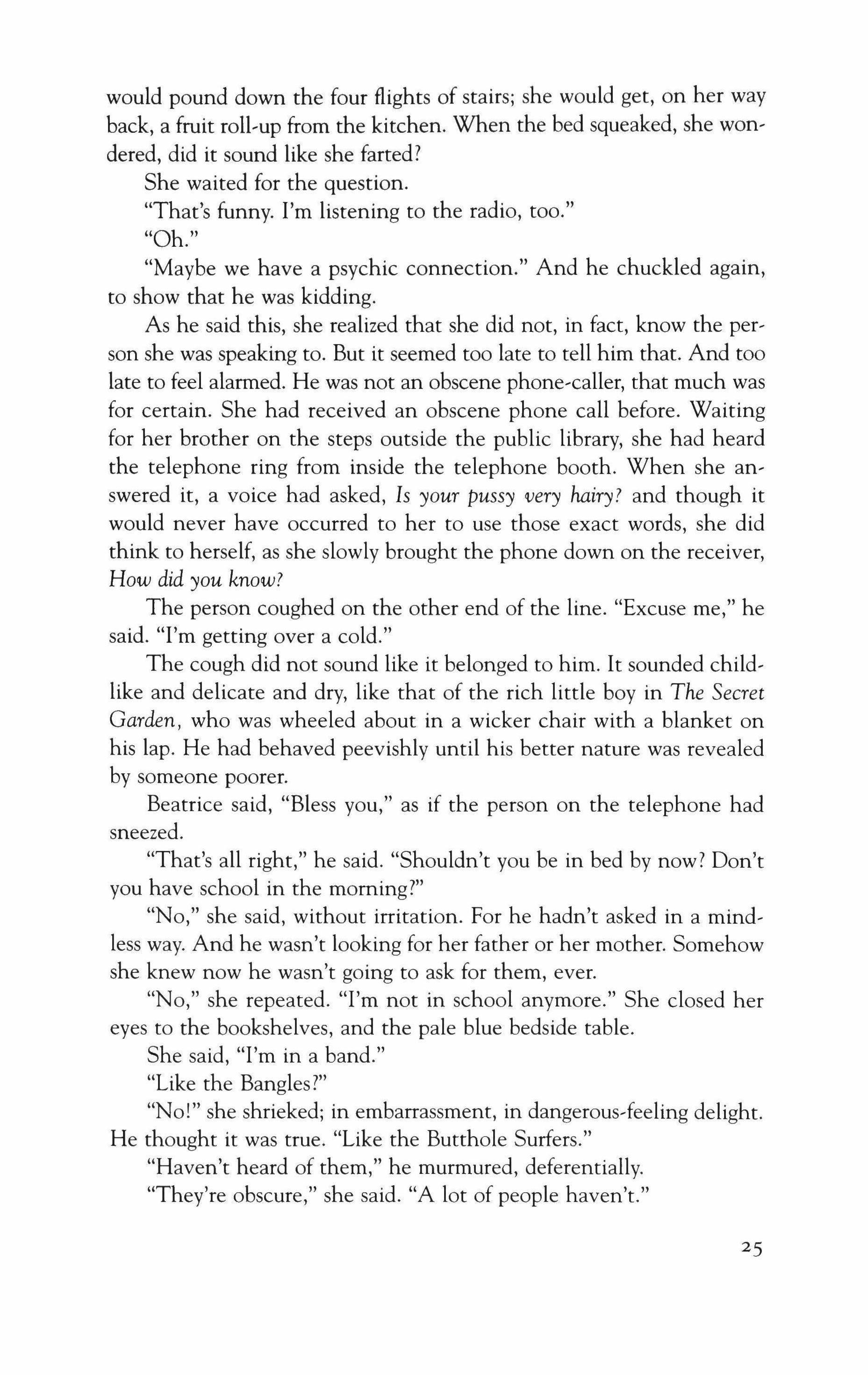
would pound down the four flights of stairs; she would get, on her way back, a fruit roll-up from the kitchen. When the bed squeaked, she won, dered, did it sound like she fatted?
She waited for the question.
"That's funny. I'm listening to the radio, too."
"Oh."
"Maybe we have a psychic connection." And he chuckled again, to show that he was kidding.
As he said this, she realized that she did not, in fact, know the per, son she was speaking to. But it seemed too late to tell him that. And too late to feel alarmed. He was not an obscene phone-caller, that much was for certain. She had received an obscene phone call before. Waiting for her brother on the steps outside the public library, she had heard the telephone ring from inside the telephone booth. When she an, swered it, a voice had asked, Is your pussy very hairy? and though it would never have occurred to her to use those exact words, she did think to herself, as she slowly brought the phone down on the receiver, How did you know?
The person coughed on the other end of the line. "Excuse me," he said. "I'm getting over a cold."
The cough did not sound like it belonged to him. It sounded child, like and delicate and dry, like that of the rich little boy in The Secret Garden, who was wheeled about in a wicker chair with a blanket on his lap. He had behaved peevishly until his better nature was revealed by someone poorer.
Beatrice said, "Bless you," as if the person on the telephone had sneezed.
"That's all right," he said. "Shouldn't you be in bed by now? Don't you have school in the morning?"
"No," she said, without irritation. For he hadn't asked in a mind, less way. And he wasn't looking for her father or her mother. Somehow she knew now he wasn't going to ask for them, ever.
"No," she repeated. "I'm not in school anymore." She closed her eyes to the bookshelves, and the pale blue bedside table.
She said, "I'm in a band."
"Like the Bangles?"
"No!" she shrieked; in embarrassment, in dangerous-feeling delight. He thought it was true. "Like the Butthole Surfers."
"Haven't heard of them," he murmured, deferentially.
"They're obscure," she said. "A lot of people haven't."
25
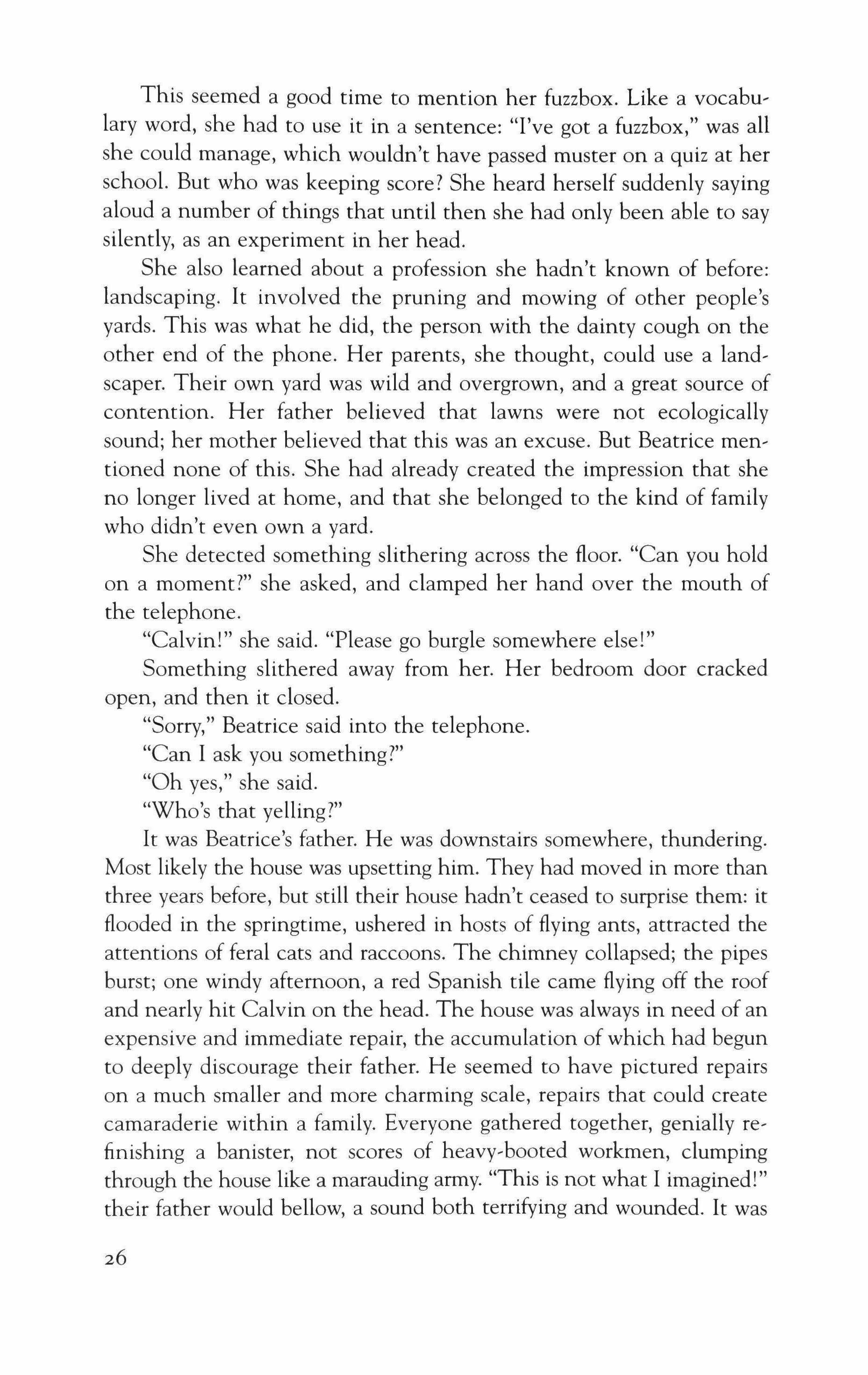
This seemed a good time to mention her fuzzbox. Like a vocabulary word, she had to use it in a sentence: "I've got a fuzzbox," was all she could manage, which wouldn't have passed muster on a quiz at her school. But who was keeping score? She heard herself suddenly saying aloud a number of things that until then she had only been able to say silently, as an experiment in her head.
She also learned about a profession she hadn't known of before: landscaping. It involved the pruning and mowing of other people's yards. This was what he did, the person with the dainty cough on the other end of the phone. Her parents, she thought, could use a landscaper. Their own yard was wild and overgrown, and a great source of contention. Her father believed that lawns were not ecologically sound; her mother believed that this was an excuse. But Beatrice mentioned none of this. She had already created the impression that she no longer lived at home, and that she belonged to the kind of family who didn't even own a yard.
She detected something slithering across the floor. "Can you hold on a moment?" she asked, and clamped her hand over the mouth of the telephone.
"Calvin!" she said. "Please go burgle somewhere else!"
Something slithered away from her. Her bedroom door cracked open, and then it closed.
"Sorry," Beatrice said into the telephone.
"Can I ask you something?"
"Oh yes," she said.
"Who's that yelling?"
It was Beatrice's father. He was downstairs somewhere, thundering. Most likely the house was upsetting him. They had moved in more than three years before, but still their house hadn't ceased to surprise them: it flooded in the springtime, ushered in hosts of flying ants, attracted the attentions of feral cats and raccoons. The chimney collapsed; the pipes burst; one windy afternoon, a red Spanish tile came flying off the roof and nearly hit Calvin on the head. The house was always in need of an expensive and immediate repair, the accumulation of which had begun to deeply discourage their father. He seemed to have pictured repairs on a much smaller and more charming scale, repairs that could create camaraderie within a family. Everyone gathered together, genially refinishing a banister, not scores of heavy-booted workmen, clumping through the house like a marauding army. "This is not what I imagined!" their father would bellow, a sound both terrifying and wounded. It was
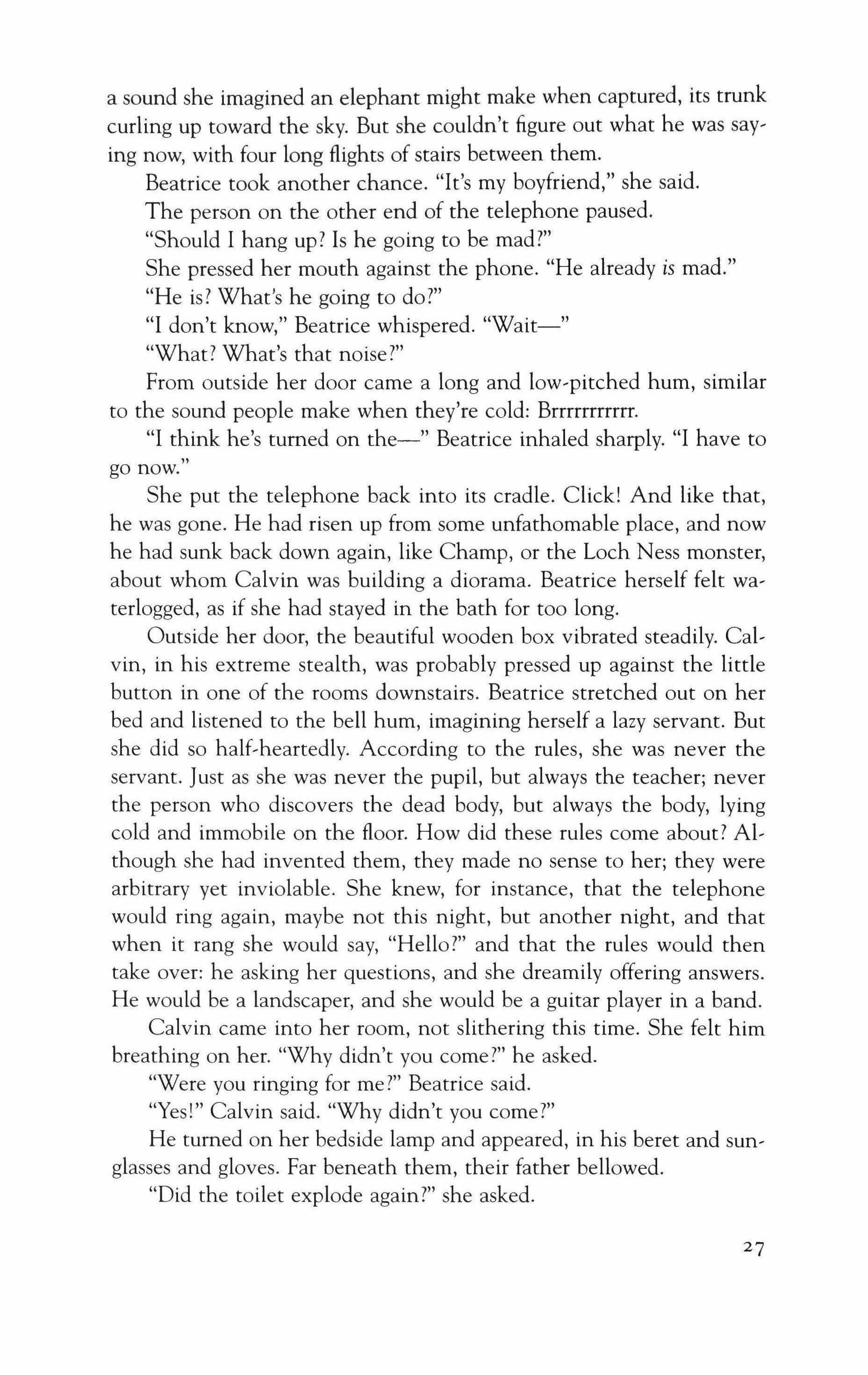
a sound she imagined an elephant might make when captured, its trunk curling up toward the sky. But she couldn't figure out what he was saying now, with four long flights of stairs between them.
Beatrice took another chance. "It's my boyfriend," she said. The person on the other end of the telephone paused. "Should I hang up? Is he going to be mad?"
She pressed her mouth against the phone. "He already is mad."
"He is? What's he going to do?"
"I don't know," Beatrice whispered. "Wait-" "What? What's that noise?"
From outside her door came a long and low-pitched hum, similar to the sound people make when they're cold: Brrrrrrrrrrr.
"I think he's turned on the-" Beatrice inhaled sharply. "I have to go now."
She put the telephone back into its cradle. Click! And like that, he was gone. He had risen up from some unfathomable place, and now he had sunk back down again, like Champ, or the Loch Ness monster, about whom Calvin was building a diorama. Beatrice herself felt waterlogged, as if she had stayed in the bath for too long.
Outside her door, the beautiful wooden box vibrated steadily. Calvin, in his extreme stealth, was probably pressed up against the little button in one of the rooms downstairs. Beatrice stretched out on her bed and listened to the bell hum, imagining herself a lazy servant. But she did so half-heartedly. According to the rules, she was never the servant. Just as she was never the pupil, but always the teacher; never the person who discovers the dead body, but always the body, lying cold and immobile on the floor. How did these rules come about? Although she had invented them, they made no sense to her; they were arbitrary yet inviolable. She knew, for instance, that the telephone would ring again, maybe not this night, but another night, and that when it rang she would say, "Hello?" and that the rules would then take over: he asking her questions, and she dreamily offering answers. He would be a landscaper, and she would be a guitar player in a band.
Calvin came into her room, not slithering this time. She felt him breathing on her. "Why didn't you come?" he asked.
"Were you ringing for me?" Beatrice said.
"Yes!" Calvin said. "Why didn't you come?"
He turned on her bedside lamp and appeared, in his beret and sunglasses and gloves. Far beneath them, their father bellowed.
"Did the toilet explode again?" she asked.
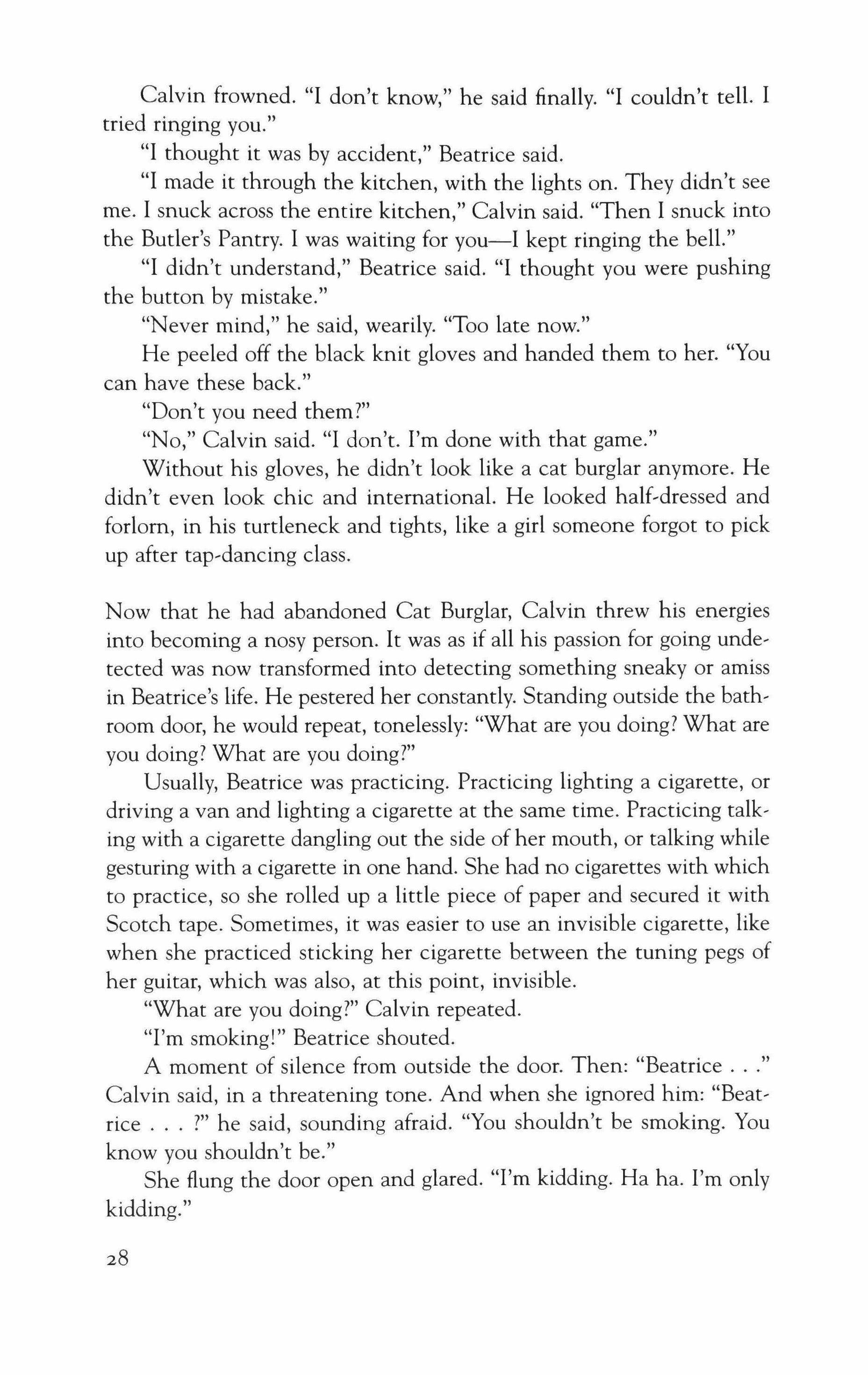
Calvin frowned. "I don't know," he said finally. "I couldn't tell. I tried ringing you."
"I thought it was by accident," Beatrice said. "I made it through the kitchen, with the lights on. They didn't see me. I snuck across the entire kitchen," Calvin said. "Then I snuck into the Butler's Pantry. I was waiting for you-I kept ringing the bell."
"I didn't understand," Beatrice said. "I thought you were pushing the button by mistake."
"Never mind," he said, wearily. "Too late now."
He peeled off the black knit gloves and handed them to her. "You can have these back."
"Don't you need them?"
"No," Calvin said. "I don't. I'm done with that game."
Without his gloves, he didn't look like a cat burglar anymore. He didn't even look chic and international. He looked half-dressed and forlorn, in his turtleneck and tights, like a girl someone forgot to pick up after tap-dancing class.
Now that he had abandoned Cat Burglar, Calvin threw his energies into becoming a nosy person. It was as if all his passion for going undetected was now transformed into detecting something sneaky or amiss in Beatrice's life. He pestered her constantly. Standing outside the bathroom door, he would repeat, tonelessly: "What are you doing? What are you doing? What are you doing?"
Usually, Beatrice was practicing. Practicing lighting a cigarette, or driving a van and lighting a cigarette at the same time. Practicing talking with a cigarette dangling out the side of her mouth, or talking while gesturing with a cigarette in one hand. She had no cigarettes with which to practice, so she rolled up a little piece of paper and secured it with Scotch tape. Sometimes, it was easier to use an invisible cigarette, like when she practiced sticking her cigarette between the tuning pegs of her guitar, which was also, at this point, invisible.
"What are you doing?" Calvin repeated.
"I'm smoking!" Beatrice shouted.
A moment of silence from outside the door. Then: "Beatrice Calvin said, in a threatening tone. And when she ignored him: "Beatrice ?" he said, sounding afraid. "You shouldn't be smoking. You know you shouldn't be."
She flung the door open and glared. "I'm kidding. Ha ha. I'm only kidding."
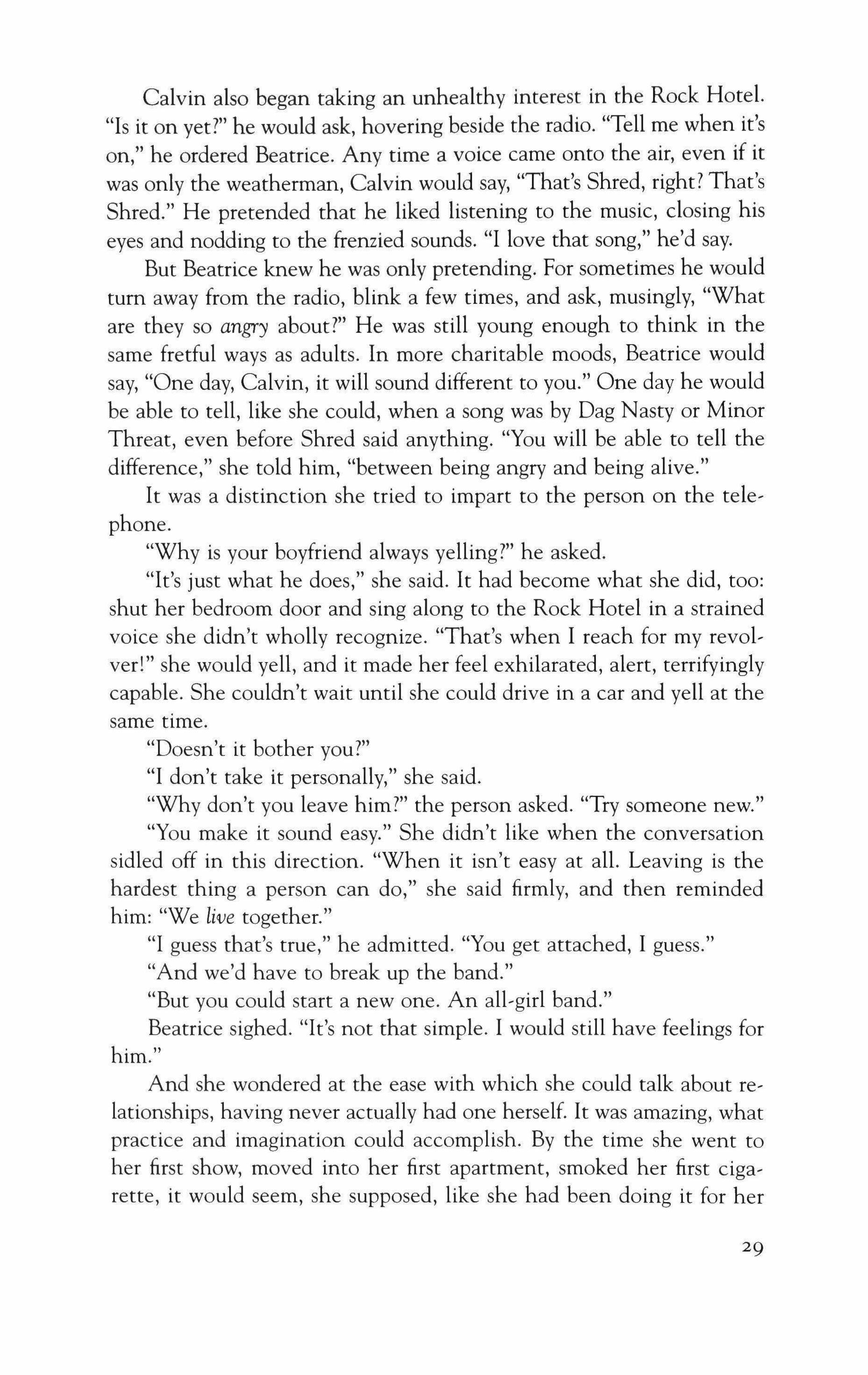
Calvin also began taking an unhealthy interest in the Rock Hotel. "Is it on yet?" he would ask, hovering beside the radio. "Tell me when it's on," he ordered Beatrice. Any time a voice came onto the air, even if it was only the weatherman, Calvin would say, "That's Shred, right? That's Shred." He pretended that he liked listening to the music, closing his eyes and nodding to the frenzied sounds. "I love that song," he'd say.
But Beatrice knew he was only pretending. For sometimes he would tum away from the radio, blink a few times, and ask, musingly, "What are they so angry about?" He was still young enough to think in the same fretful ways as adults. In more charitable moods, Beatrice would say, "One day, Calvin, it will sound different to you." One day he would be able to tell, like she could, when a song was by Dag Nasty or Minor Threat, even before Shred said anything. "You will be able to tell the difference," she told him, "between being angry and being alive."
It was a distinction she tried to impart to the person on the telephone.
"Why is your boyfriend always yelling?" he asked.
"It's just what he does," she said. It had become what she did, too: shut her bedroom door and sing along to the Rock Hotel in a strained voice she didn't wholly recognize. "That's when I reach for my revolver!" she would yell, and it made her feel exhilarated, alert, terrifyingly capable. She couldn't wait until she could drive in a car and yell at the same time.
"Doesn't it bother you?"
"I don't take it personally," she said.
"Why don't you leave him?" the person asked. "Try someone new."
"You make it sound easy." She didn't like when the conversation sidled off in this direction. "When it isn't easy at all. Leaving is the hardest thing a person can do," she said firmly, and then reminded him: "We live together."
"I guess that's true," he admitted. "You get attached, I guess."
"And we'd have to break up the band."
"But you could start a new one. An all-girl band."
Beatrice sighed. "It's not that simple. I would still have feelings for him."
And she wondered at the ease with which she could talk about relationships, having never actually had one herself. It was amazing, what practice and imagination could accomplish. By the time she went to her first show, moved into her first apartment, smoked her first cigarette, it would seem, she supposed, like she had been doing it for her
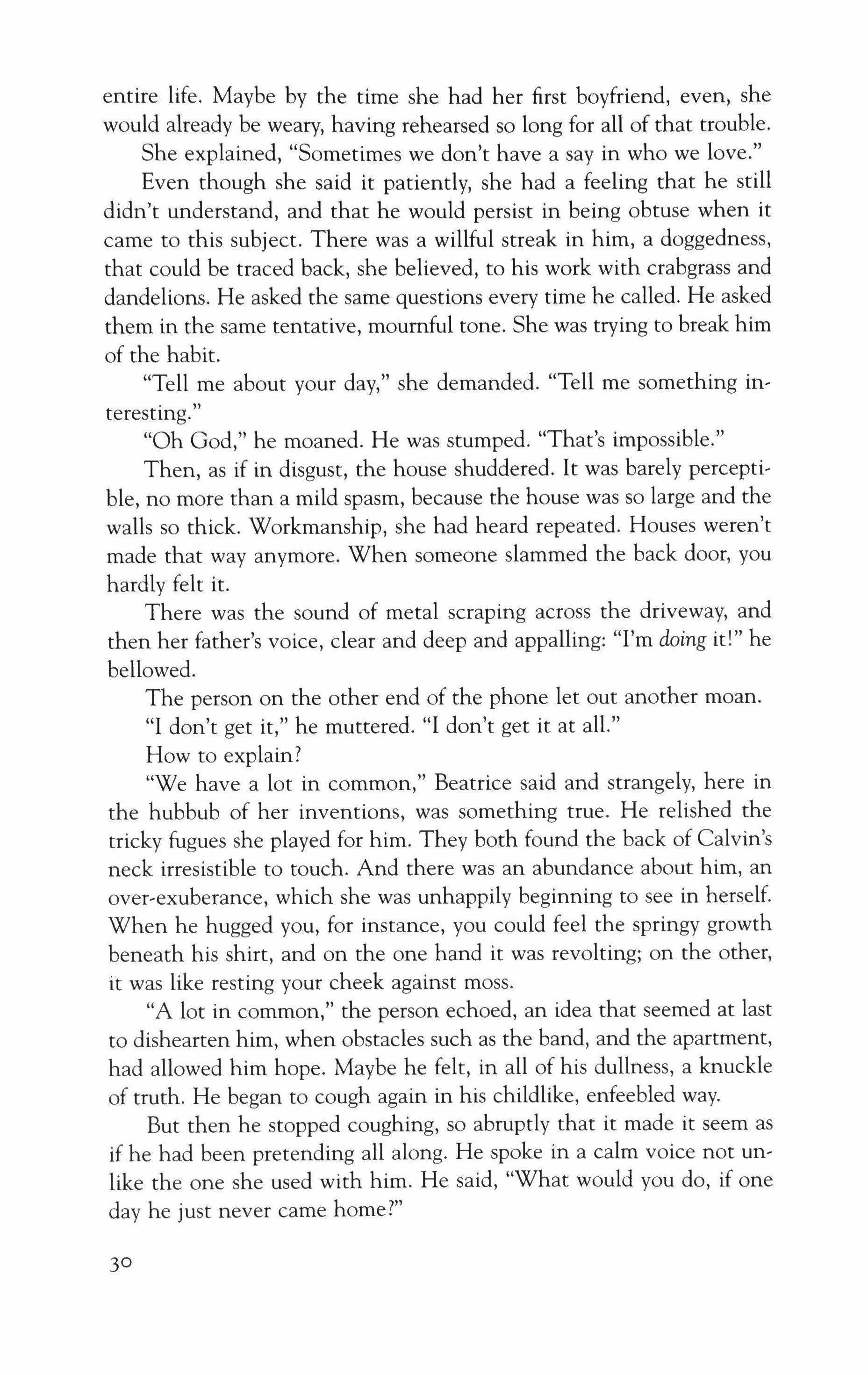
entire life. Maybe by the time she had her first boyfriend, even, she would already be weary, having rehearsed so long for all of that trouble. She explained, "Sometimes we don't have a say in who we love."
Even though she said it patiently, she had a feeling that he still didn't understand, and that he would persist in being obtuse when it came to this subject. There was a willful streak in him, a doggedness, that could be traced back, she believed, to his work with crabgrass and dandelions. He asked the same questions every time he called. He asked them in the same tentative, mournful tone. She was trying to break him of the habit.
"Tell me about your day," she demanded. "Tell me something interesting."
"Oh God," he moaned. He was stumped. "That's impossible."
Then, as if in disgust, the house shuddered. It was barely perceptible, no more than a mild spasm, because the house was so large and the walls so thick. Workmanship, she had heard repeated. Houses weren't made that way anymore. When someone slammed the back door, you hardly felt it.
There was the sound of metal scraping across the driveway, and then her father's voice, clear and deep and appalling: "I'm doing it!" he bellowed.
The person on the other end of the phone let out another moan. "I don't get it," he muttered. "I don't get it at all."
How to explain?
"We have a lot in common," Beatrice said and strangely, here in the hubbub of her inventions, was something true. He relished the tricky fugues she played for him. They both found the back of Calvin's neck irresistible to touch. And there was an abundance about him, an over-exuberance, which she was unhappily beginning to see in herself. When he hugged you, for instance, you could feel the springy growth beneath his shirt, and on the one hand it was revolting; on the other, it was like resting your cheek against moss.
"A lot in common," the person echoed, an idea that seemed at last to dishearten him, when obstacles such as the band, and the apartment, had allowed him hope. Maybe he felt, in all of his dullness, a knuckle of truth. He began to cough again in his childlike, enfeebled way.
But then he stopped coughing, so abruptly that it made it seem as if he had been pretending all along. He spoke in a calm voice not unlike the one she used with him. He said, "What would you do, if one day he just never came home?"
30
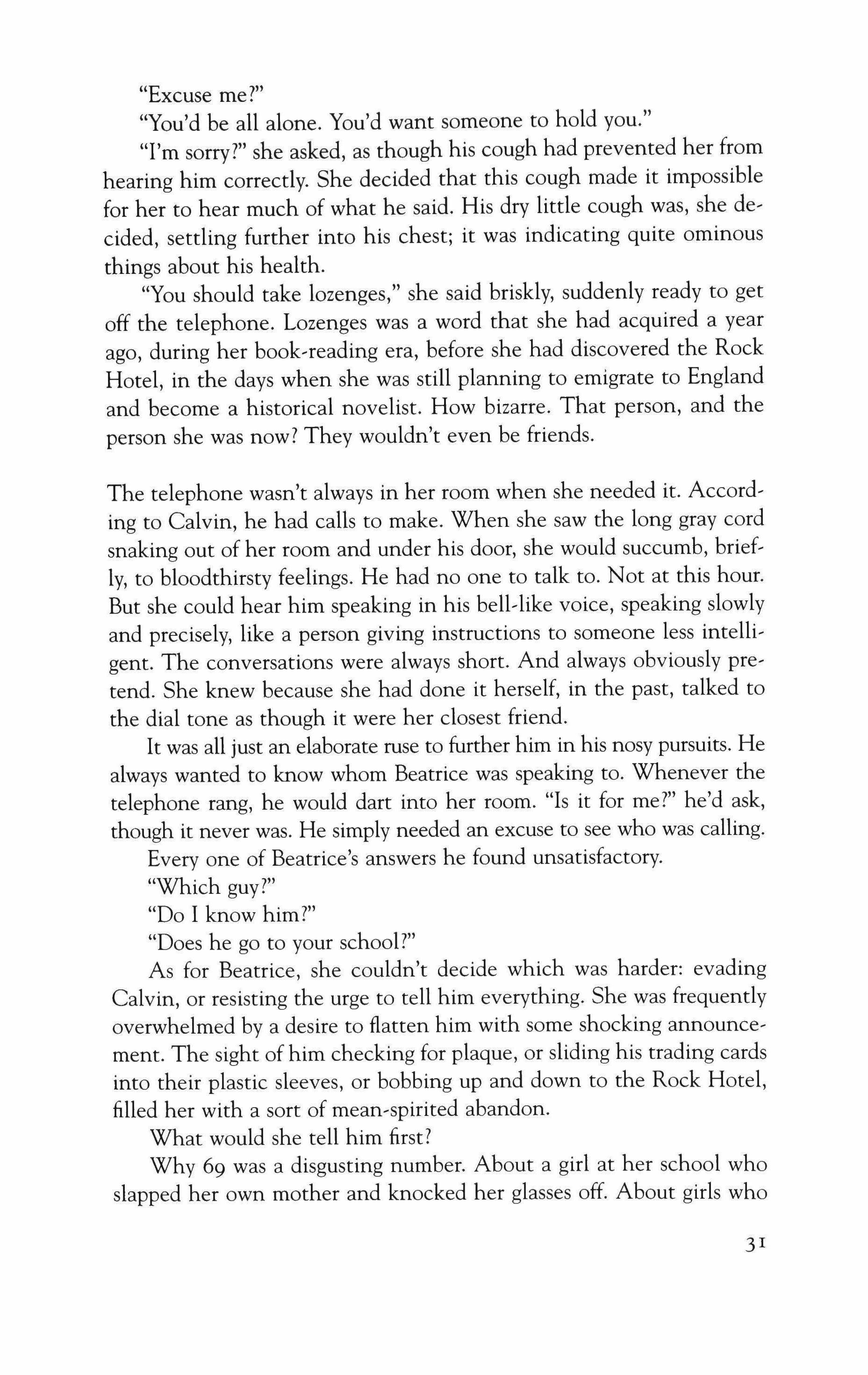
"Excuse me?"
"You'd be all alone. You'd want someone to hold you."
"I'm sorry?" she asked, as though his cough had prevented her from hearing him correctly. She decided that this cough made it impossible for her to hear much of what he said. His dry little cough was, she decided, settling further into his chest; it was indicating quite ominous things about his health.
"You should take lozenges," she said briskly, suddenly ready to get off the telephone. Lozenges was a word that she had acquired a year ago, during her book-reading era, before she had discovered the Rock Hotel, in the days when she was still planning to emigrate to England and become a historical novelist. How bizarre. That person, and the person she was now? They wouldn't even be friends.
The telephone wasn't always in her room when she needed it. According to Calvin, he had calls to make. When she saw the long gray cord snaking out of her room and under his door, she would succumb, briefly, to bloodthirsty feelings. He had no one to talk to. Not at this hour. But she could hear him speaking in his bell-like voice, speaking slowly and precisely, like a person giving instructions to someone less intelligent. The conversations were always short. And always obviously pretend. She knew because she had done it herself, in the past, talked to the dial tone as though it were her closest friend.
It was all just an elaborate ruse to further him in his nosy pursuits. He always wanted to know whom Beatrice was speaking to. Whenever the telephone rang, he would dart into her room. "Is it for me?" he'd ask, though it never was. He simply needed an excuse to see who was calling. Every one of Beatrice's answers he found unsatisfactory.
"Which guy?"
"Do I know him?"
"Does he go to your school?"
As for Beatrice, she couldn't decide which was harder: evading Calvin, or resisting the urge to tell him everything. She was frequently overwhelmed by a desire to flatten him with some shocking announcement. The sight of him checking for plaque, or sliding his trading cards into their plastic sleeves, or bobbing up and down to the Rock Hotel, filled her with a sort of mean-spirited abandon. What would she tell him first?
Why 69 was a disgusting number. About a girl at her school who slapped her own mother and knocked her glasses off. About girls who
31
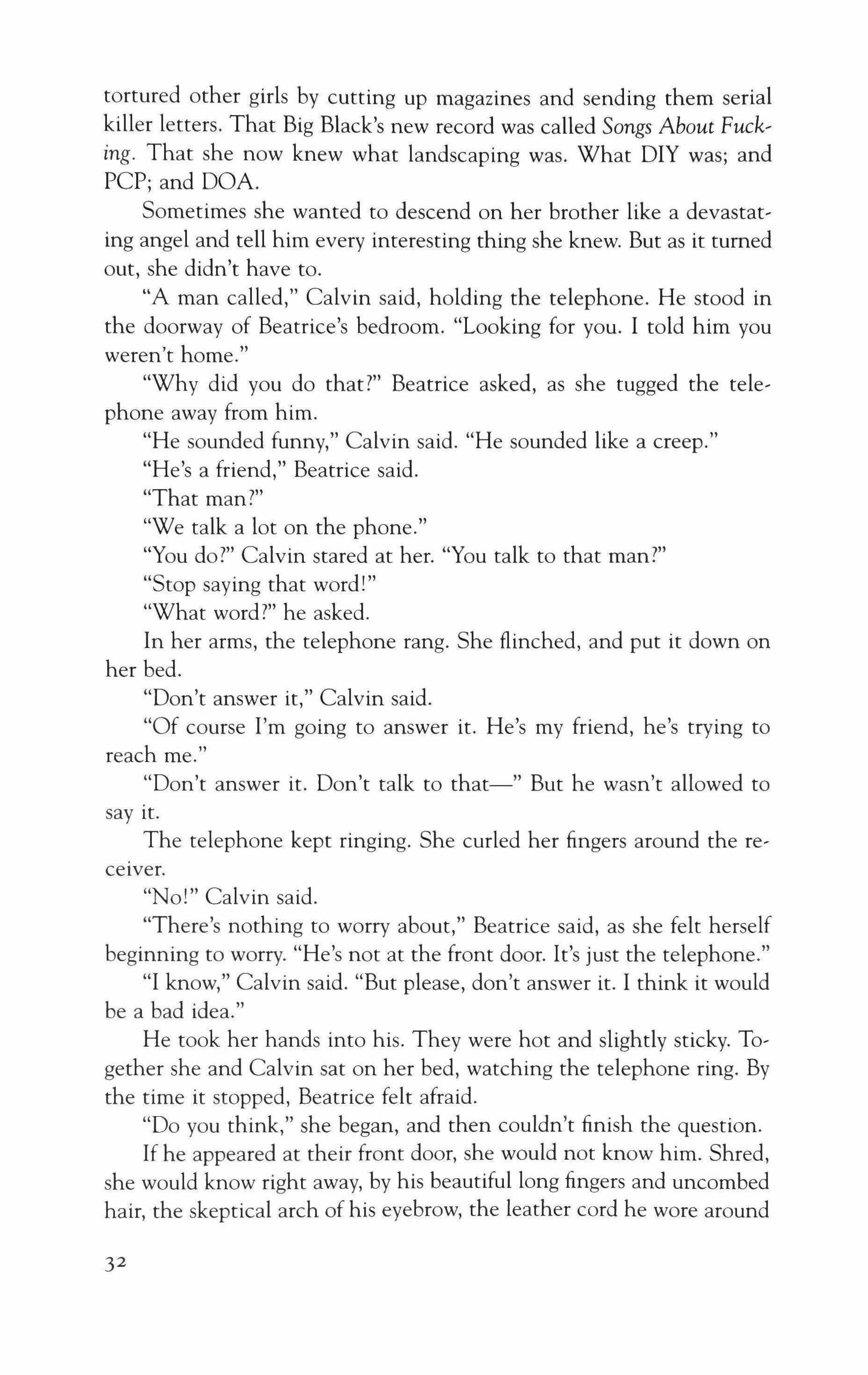
tortured other girls by cutting up magazines and sending them serial killer letters. That Big Black's new record was called Songs About Fuck� ing. That she now knew what landscaping was. What DIY was; and PCP; and DOA.
Sometimes she wanted to descend on her brother like a devastating angel and tell him every interesting thing she knew. But as it turned out, she didn't have to.
"A man called," Calvin said, holding the telephone. He stood in the doorway of Beatrice's bedroom. "Looking for you. I told him you weren't home."
"Why did you do that?" Beatrice asked, as she tugged the telephone away from him.
"He sounded funny," Calvin said. "He sounded like a creep."
"He's a friend," Beatrice said.
"That man?"
"We talk a lot on the phone."
"You do?" Calvin stared at her. "You talk to that man?"
"Stop saying that word!"
"What word?" he asked.
In her arms, the telephone rang. She flinched, and put it down on her bed.
"Don't answer it," Calvin said.
"Of course I'm going to answer it. He's my friend, he's trying to reach me."
"Don't answer it. Don't talk to that-" But he wasn't allowed to say it.
The telephone kept ringing. She curled her fingers around the receiver.
"No!" Calvin said.
"There's nothing to worry about," Beatrice said, as she felt herself beginning to worry. "He's not at the front door. It's just the telephone."
"I know," Calvin said. "But please, don't answer it. I think it would be a bad idea."
He took her hands into his. They were hot and slightly sticky. Together she and Calvin sat on her bed, watching the telephone ring. By the time it stopped, Beatrice felt afraid.
"Do you think," she began, and then couldn't finish the question.
If he appeared at their front door, she would not know him. Shred, she would know right away, by his beautiful long fingers and uncombed hair, the skeptical arch of his eyebrow, the leather cord he wore around
32
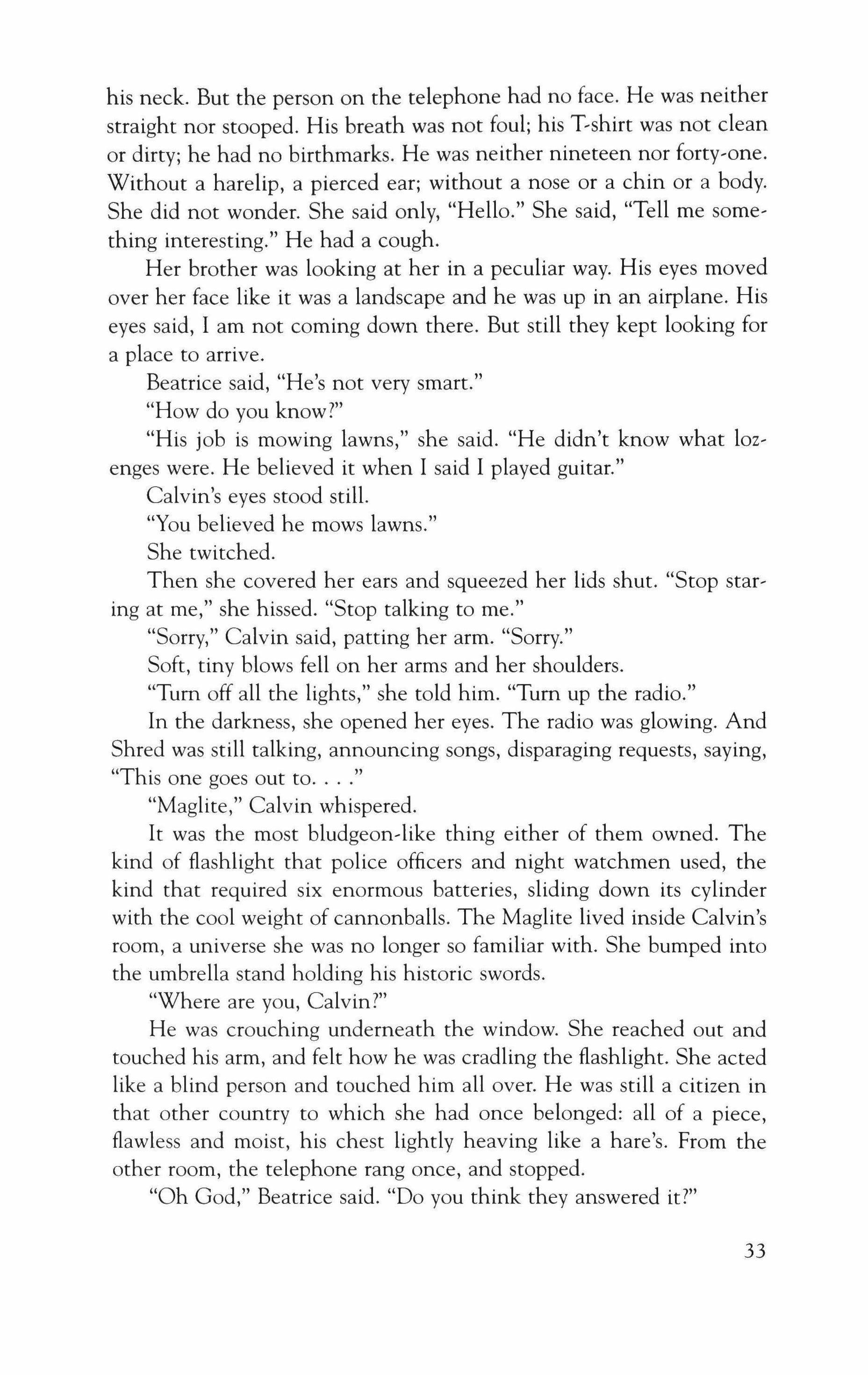
his neck. But the person on the telephone had no face. He was neither straight nor stooped. His breath was not foul; his T�shirt was not clean or dirty; he had no birthmarks. He was neither nineteen nor forty-one. Without a harelip, a pierced ear; without a nose or a chin or a body. She did not wonder. She said only, "Hello." She said, "Tell me something interesting." He had a cough.
Her brother was looking at her in a peculiar way. His eyes moved over her face like it was a landscape and he was up in an airplane. His eyes said, I am not coming down there. But still they kept looking for a place to arrive.
Beatrice said, "He's not very smart."
"How do you know?"
"His job is mowing lawns," she said. "He didn't know what lozenges were. He believed it when I said I played guitar."
Calvin's eyes stood still.
"You believed he mows lawns."
She twitched.
Then she covered her ears and squeezed her lids shut. "Stop staring at me," she hissed. "Stop talking to me."
"Sorry," Calvin said, patting her arm. "Sorry."
Soft, tiny blows fell on her arms and her shoulders.
"Tum off all the lights," she told him. "Tum up the radio."
In the darkness, she opened her eyes. The radio was glowing. And Shred was still talking, announcing songs, disparaging requests, saying, "This one goes out to
"Maglite," Calvin whispered.
It was the most bludgeon-like thing either of them owned. The kind of flashlight that police officers and night watchmen used, the kind that required six enormous batteries, sliding down its cylinder with the cool weight of cannonballs. The Maglite lived inside Calvin's room, a universe she was no longer so familiar with. She bumped into the umbrella stand holding his historic swords.
"Where are you, Calvin?"
He was crouching underneath the window. She reached out and touched his arm, and felt how he was cradling the flashlight. She acted like a blind person and touched him all over. He was still a citizen in that other country to which she had once belonged: all of a piece, flawless and moist, his chest lightly heaving like a hare's. From the other room, the telephone rang once, and stopped.
"Oh God," Beatrice said. "Do you think they answered it?"
33
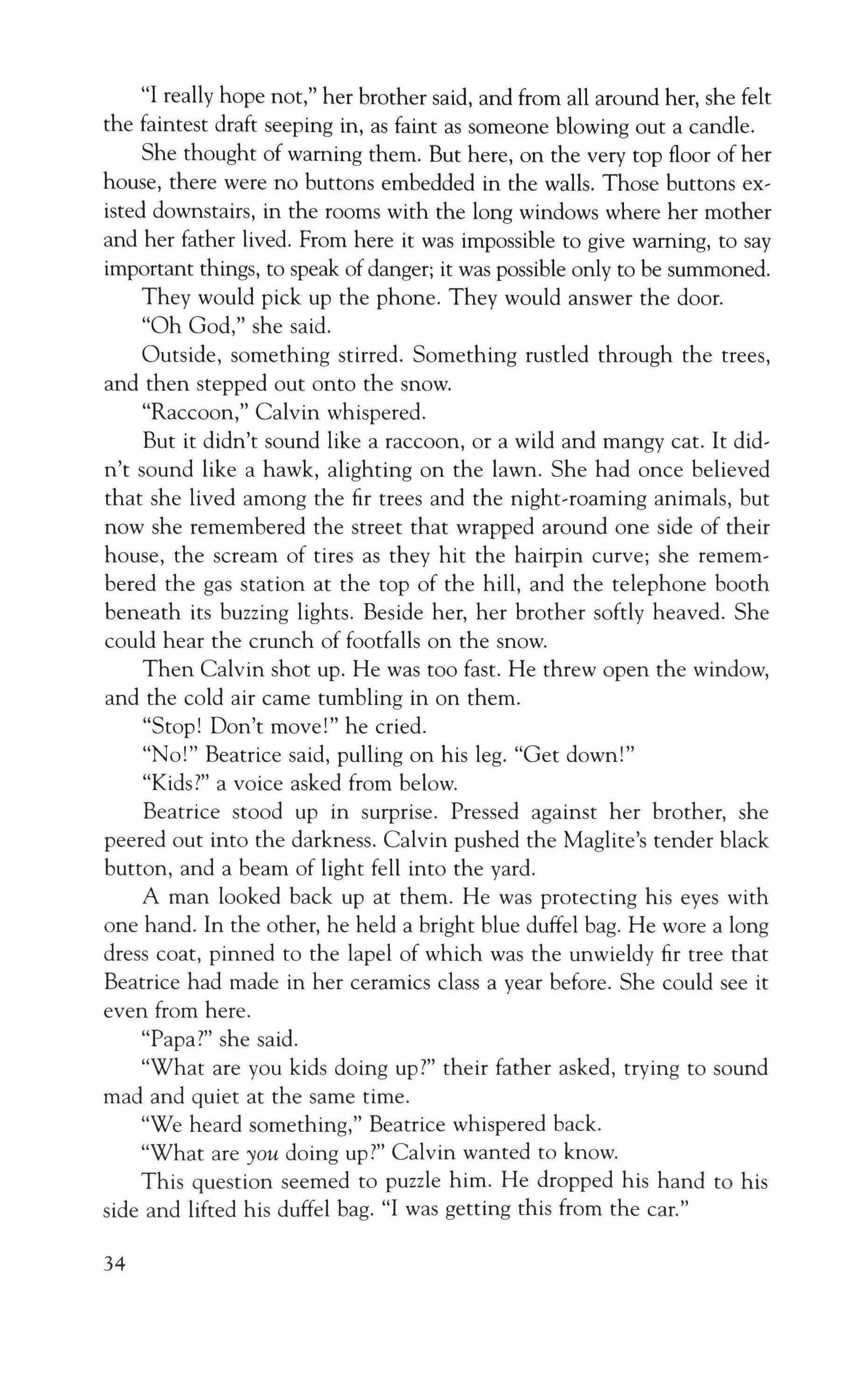
"I really hope not," her brother said, and from all around her, she felt the faintest draft seeping in, as faint as someone blowing out a candle. She thought of warning them. But here, on the very top floor of her house, there were no buttons embedded in the walls. Those buttons existed downstairs, in the rooms with the long windows where her mother and her father lived. From here it was impossible to give warning, to say important things, to speak of danger; it was possible only to be summoned. They would pick up the phone. They would answer the door.
"Oh God," she said.
Outside, something stirred. Something rustled through the trees, and then stepped out onto the snow.
"Raccoon," Calvin whispered.
But it didn't sound like a raccoon, or a wild and mangy cat. It didn't sound like a hawk, alighting on the lawn. She had once believed that she lived among the fir trees and the night-roaming animals, but now she remembered the street that wrapped around one side of their house, the scream of tires as they hit the hairpin curve; she rernembered the gas station at the top of the hill, and the telephone booth beneath its buzzing lights. Beside her, her brother softly heaved. She could hear the crunch of footfalls on the snow.
Then Calvin shot up. He was too fast. He threw open the window, and the cold air came tumbling in on them.
"Stop! Don't move!" he cried.
"No!" Beatrice said, pulling on his leg. "Get down!"
"Kids?" a voice asked from below.
Beatrice stood up in surprise. Pressed against her brother, she peered out into the darkness. Calvin pushed the Maglite's tender black button, and a beam of light fell into the yard.
A man looked back up at them. He was protecting his eyes with one hand. In the other, he held a bright blue duffel bag. He wore a long dress coat, pinned to the lapel of which was the unwieldy fir tree that Beatrice had made in her ceramics class a year before. She could see it even from here.
"Papa?" she said.
"What are you kids doing up?" their father asked, trying to sound mad and quiet at the same time.
"We heard something," Beatrice whispered back.
"What are you doing up?" Calvin wanted to know.
This question seemed to puzzle him. He dropped his hand to his side and lifted his duffel bag. "I was getting this from the car."
34

Calvin kept the beam of light trained on their father. "It's late!" Calvin said.
The light fell in a circle around him. Beyond that, Beatrice could make out the shape of trees rising up, and the untidy bushes, and the lopsided skeleton of the gazebo that he had begun building in the fall, but didn't have time to finish. She thought she spied something rotund in the darkness, loping toward the trashcans. She saw the marks her fa, ther's feet had left in the snow, and the sharp shadow that his body threw onto the lawn. It was only her father. But something inside of her still clenched. It was only her father creeping about in the dark, and now he was standing there, holding his duffel bag, wearing her fir tree, his footsteps heading in one direction.
Tonight, she knew, he would go back inside. He would raise his voice, move furniture across the floor, and in the morning, around the table, the four of them would look into each other's tired faces. But one night, another night, soon, she thought, there would be an apartment.
And suddenly it was no longer her word, her idea.
"Calvin," she said. "Tum it off."
Without the flashlight, her brother wouldn't be able to see. She wrapped her hands around the cold cylinder and pulled.
But he did not let go. "No." He said fiercely, "It's late."
From behind her, she could hear the sound of the radio, speaking into the emptiness of her bedroom. The voice said, 'This kid who keeps calling me, he wants to hear the Clash. Now normally, I would never play the Clash. Yes, I know, we wouldn't have punk rock without them, but I mean, you can hear the Clash on other radio stations. You can hear the Clash on oldies stations. We just don't play the Clash here on the Rock Hotel," Shred explained. "But this kid who called, he got me thinking about when I was his age, when I heard the Clash for the first time. I had never heard anything like them. London Calling-that record changed me. I wouldn't be sitting here, talking to you, if it was, n't for that record. So I'm going to play that song, for that kid who called. What can I say? It's a song from my youth."
35
Charles Simic

He Heard with His Deaf Ear
Your prayer. The one you offered On behalf of someone ailing. Darkness was his world
So you shut your eyes tight to come into it.
There was no one there. He may be wearing another disguise, You were told. No one can keep track of them?
The morning light was full of cobwebs As if it had brushed against a ghost. A cow they forgot to milk Had lowed all night long.
Now it was peaceful again. Her bed had its sheets stripped off. One of her red slippers missingIn fact, nowhere to be found.
A Few Windows
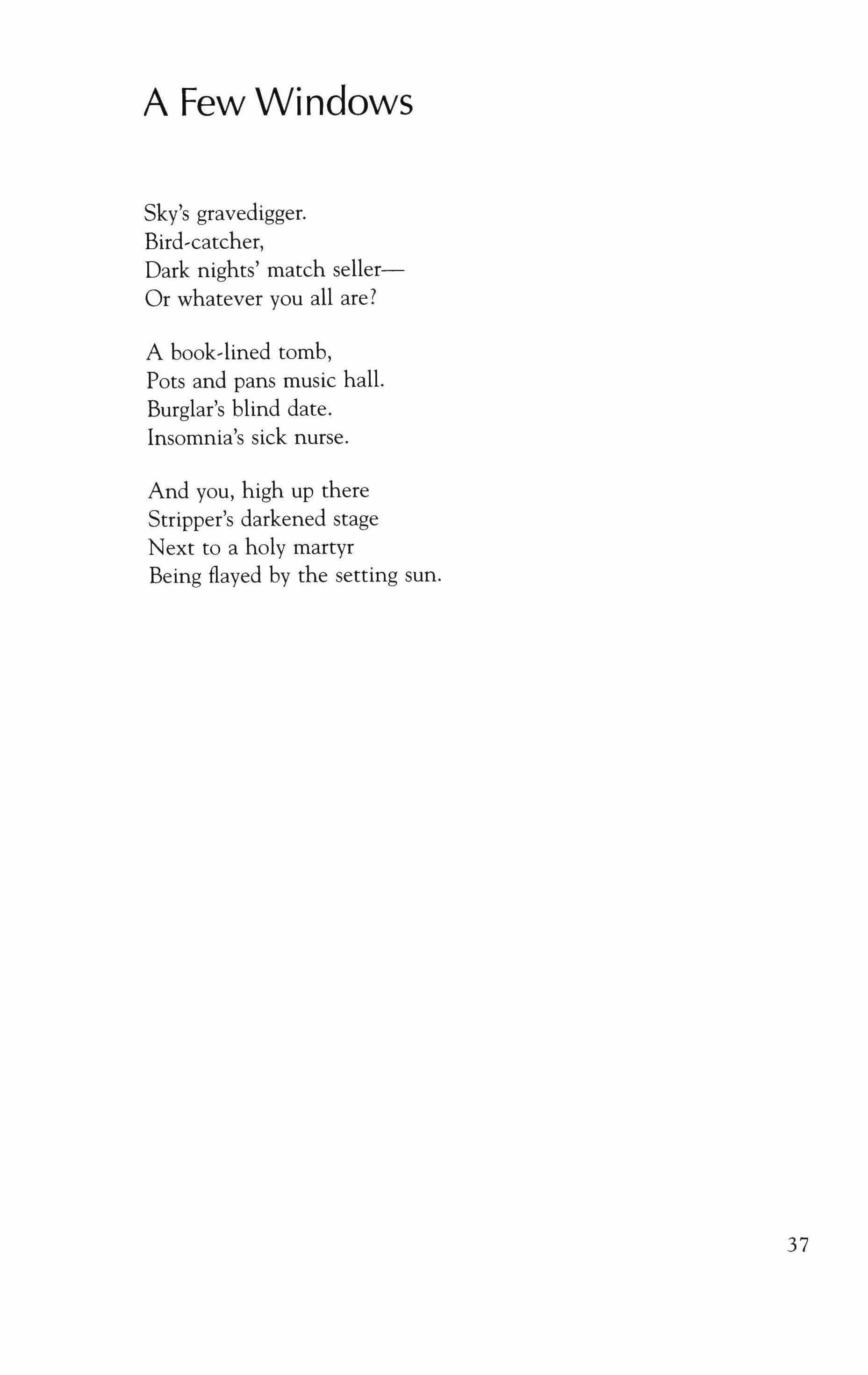
Sky's gravedigger.
Bird-catcher, Dark nights' match seller
Or whatever you all are?
A book-lined tomb, Pots and pans music hall.
Burglar's blind date.
Insomnia's sick nurse.
And you, high up there
Stripper's darkened stage
Next to a holy martyr
Being flayed by the setting sun.
37
The Gamblers Upstairs
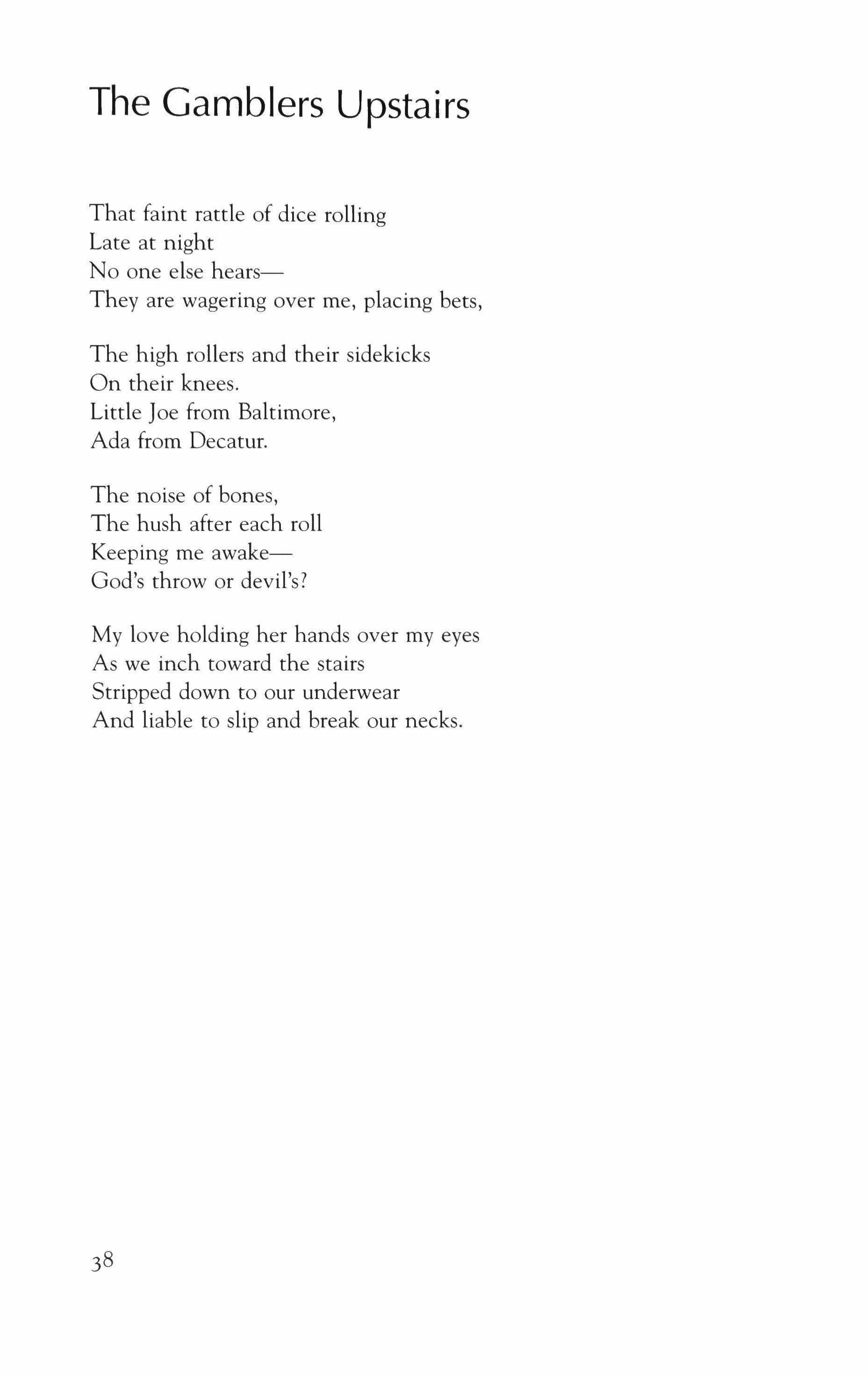
That faint rattle of dice rolling
Late at night
No one else hears-
They are wagering over me, placing bets,
The high rollers and their sidekicks On their knees.
Little Joe from Baltimore, Ada from Decatur.
The noise of bones, The hush after each roll
Keeping me awakeGod's throw or devil's?
My love holding her hands over my eyes As we inch toward the stairs Stripped down to our underwear And liable to slip and break our necks.
The Early Mass
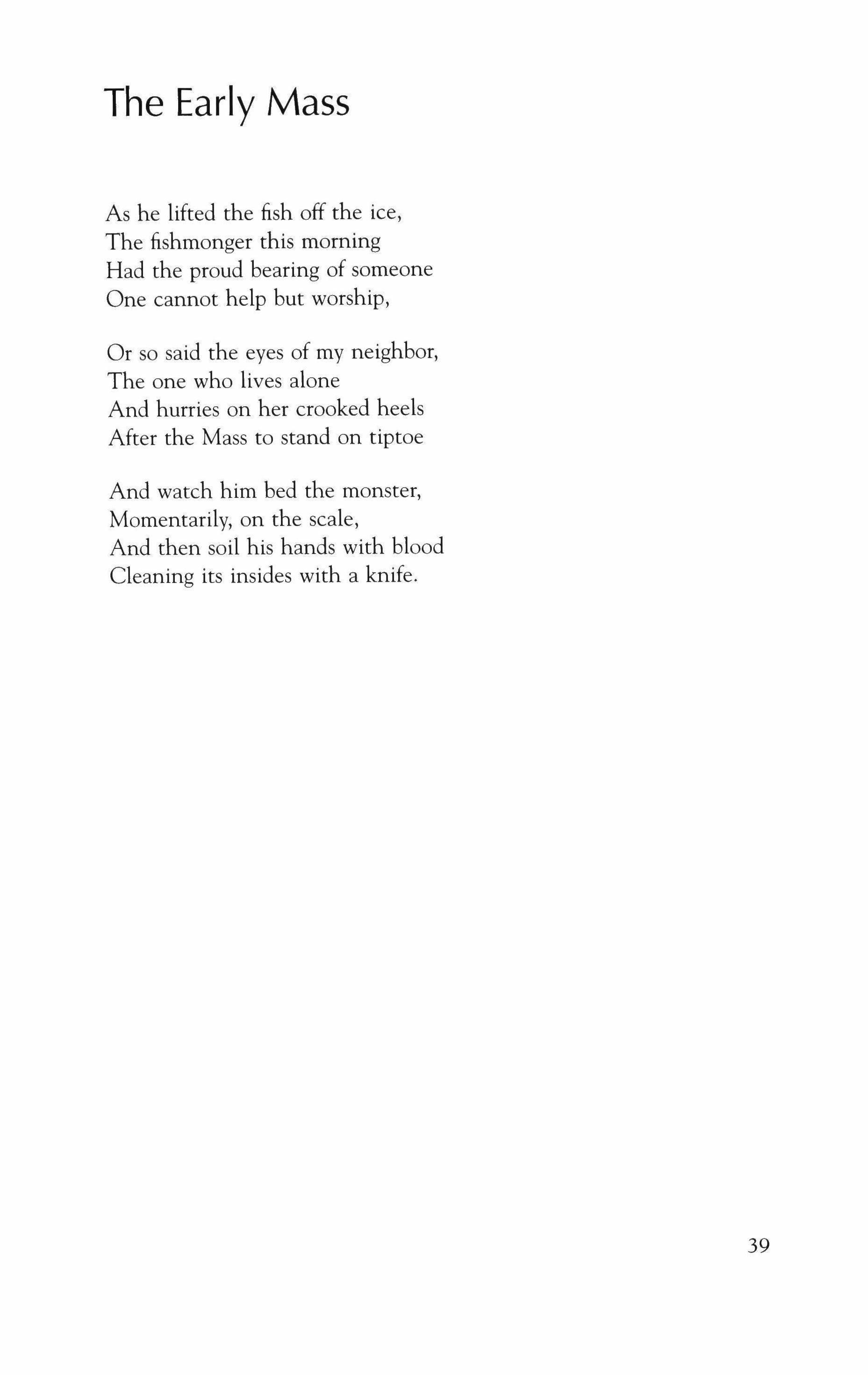
As he lifted the fish off the ice, The fishmonger this morning
Had the proud bearing of someone
One cannot help but worship,
Or so said the eyes of my neighbor,
The one who lives alone
And hurries on her crooked heels
After the Mass to stand on tiptoe
And watch him bed the monster, Momentarily, on the scale, And then soil his hands with blood
Cleaning its insides with a knife.
39
YusefKomunyakaa
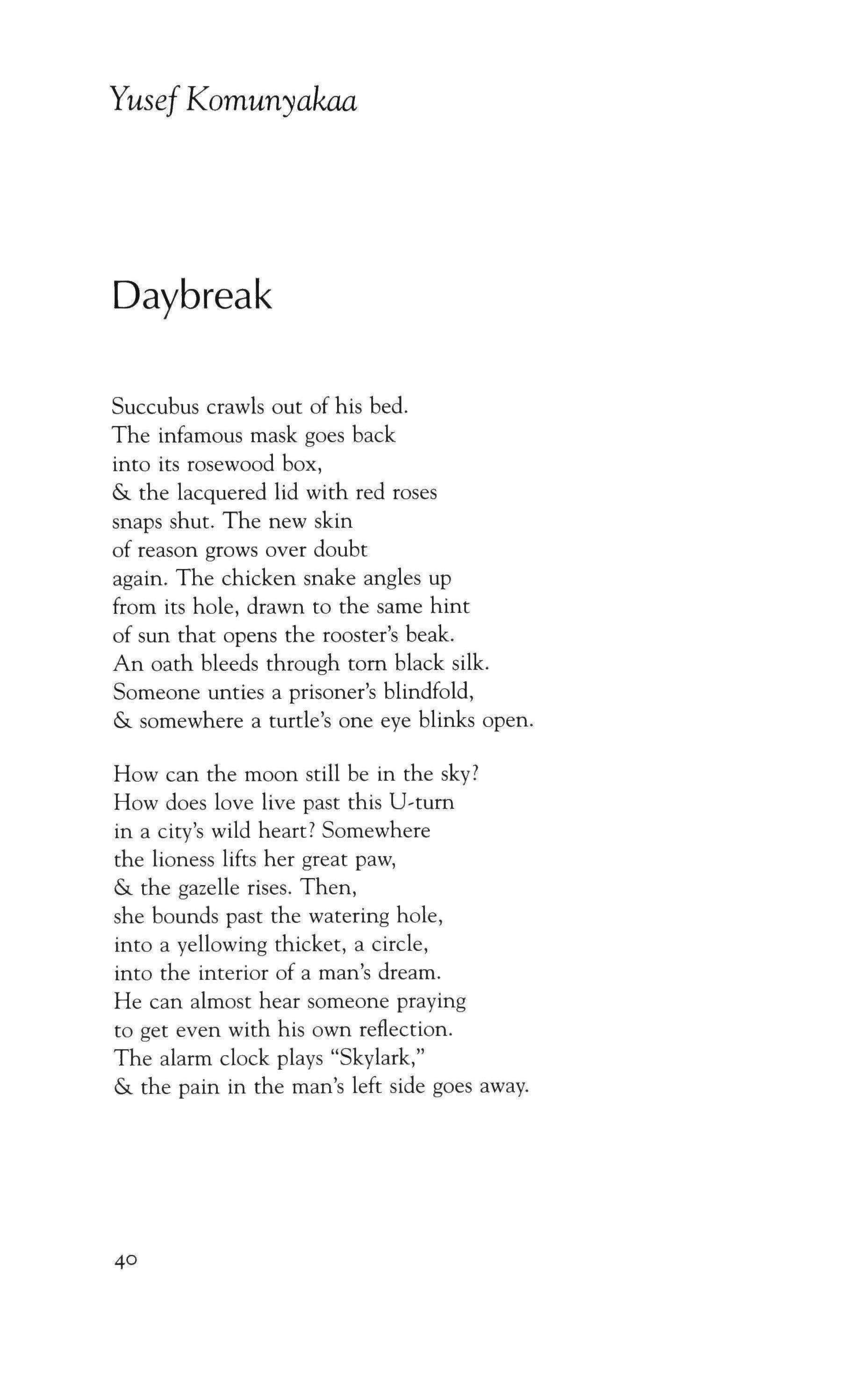
Daybreak
Succubus crawls out of his bed. The infamous mask goes back into its rosewood box, & the lacquered lid with red roses snaps shut. The new skin of reason grows over doubt again. The chicken snake angles up from its hole, drawn to the same hint of sun that opens the rooster's beak. An oath bleeds through tom black silk. Someone unties a prisoner's blindfold, & somewhere a turtle's one eye blinks open.
How can the moon still be in the sky? How does love live past this U-tum in a city's wild heart? Somewhere the lioness lifts her great paw, & the gazelle rises. Then, she bounds past the watering hole, into a yellowing thicket, a circle, into the interior of a man's dream. He can almost hear someone praying to get even with his own reflection. The alarm clock plays "Skylark," & the pain in the man's left side goes away.
Tree Ghost
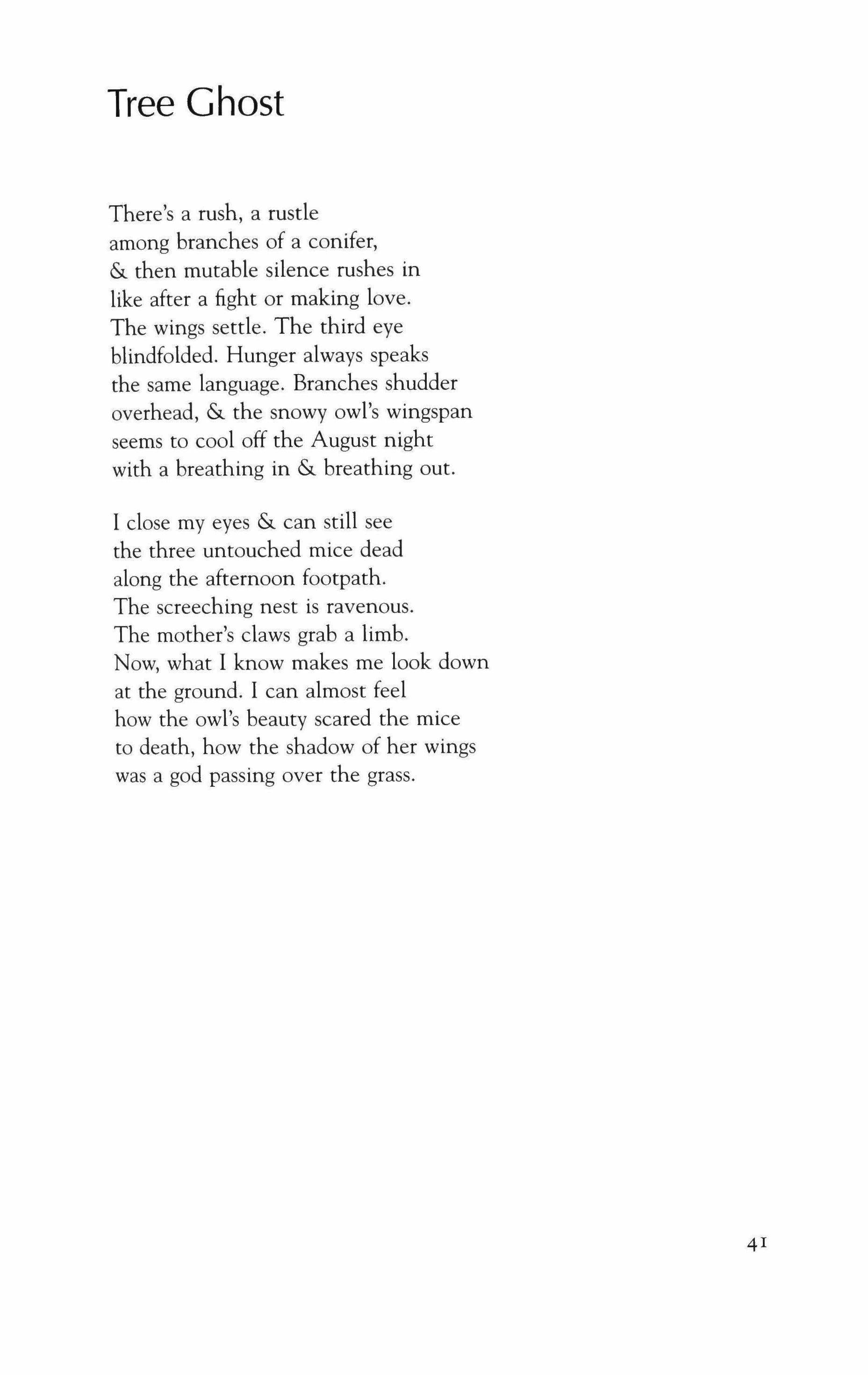
There's a rush, a rustle among branches of a conifer, & then mutable silence rushes in like after a fight or making love. The wings settle. The third eye blindfolded. Hunger always speaks the same language. Branches shudder overhead, & the snowy owl's wingspan seems to cool off the August night with a breathing in & breathing out.
I close my eyes & can still see the three untouched mice dead along the afternoon footpath. The screeching nest is ravenous. The mother's claws grab a limb. Now, what I know makes me look down at the ground. I can almost feel how the owl's beauty scared the mice to death, how the shadow of her wings was a god passing over the grass.
41
Night
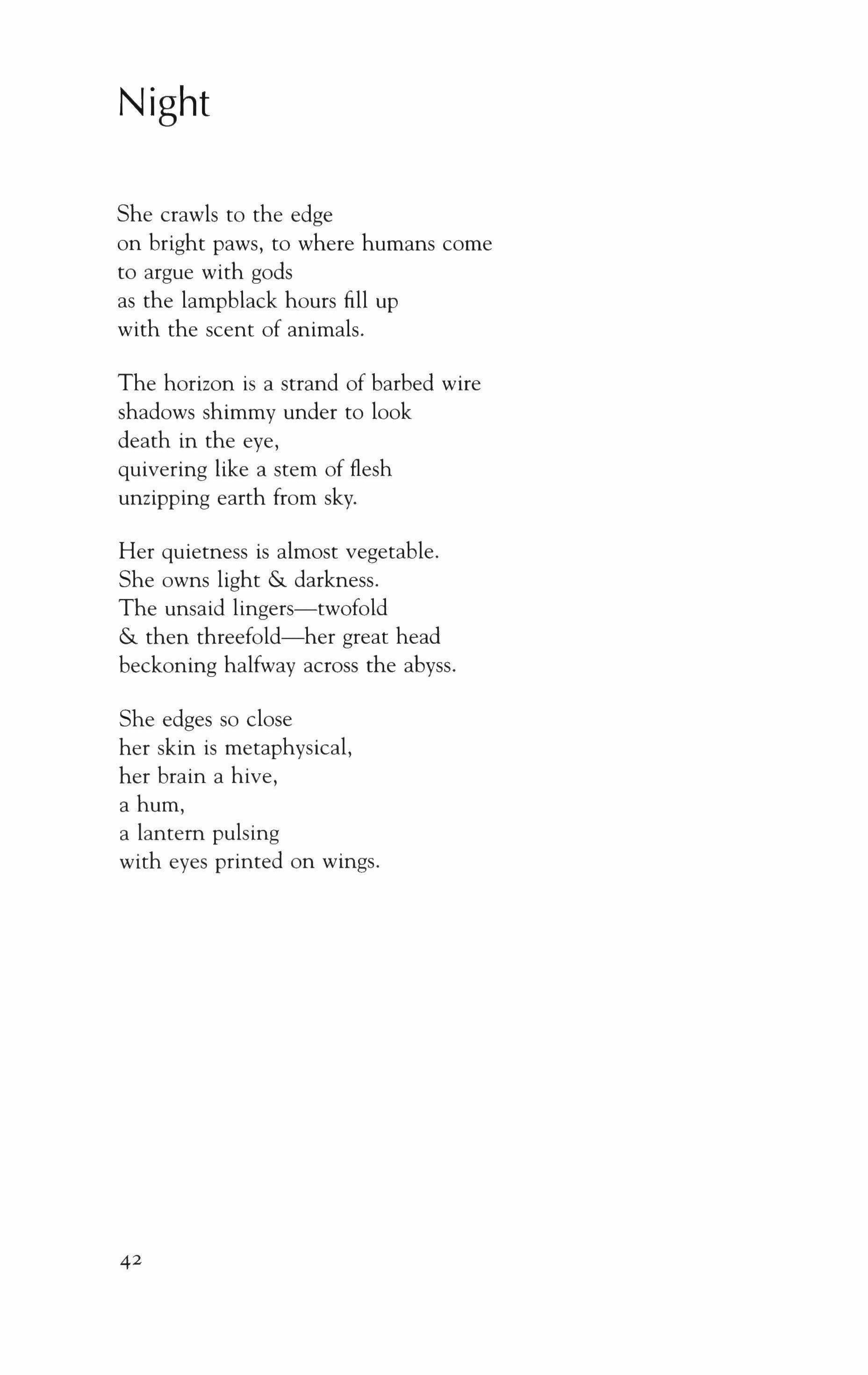
She crawls to the edge on bright paws, to where humans come to argue with gods as the lampblack hours fill up with the scent of animals.
The horizon is a strand of barbed wire shadows shimmy under to look death in the eye, quivering like a stem of flesh unzipping earth from sky.
Her quietness is almost vegetable. She owns light & darkness. The unsaid lingers-twofold & then threefold-her great head beckoning halfway across the abyss.
She edges so close her skin is metaphysical, her brain a hive, a hum, a lantern pulsing with eyes printed on wings.
42
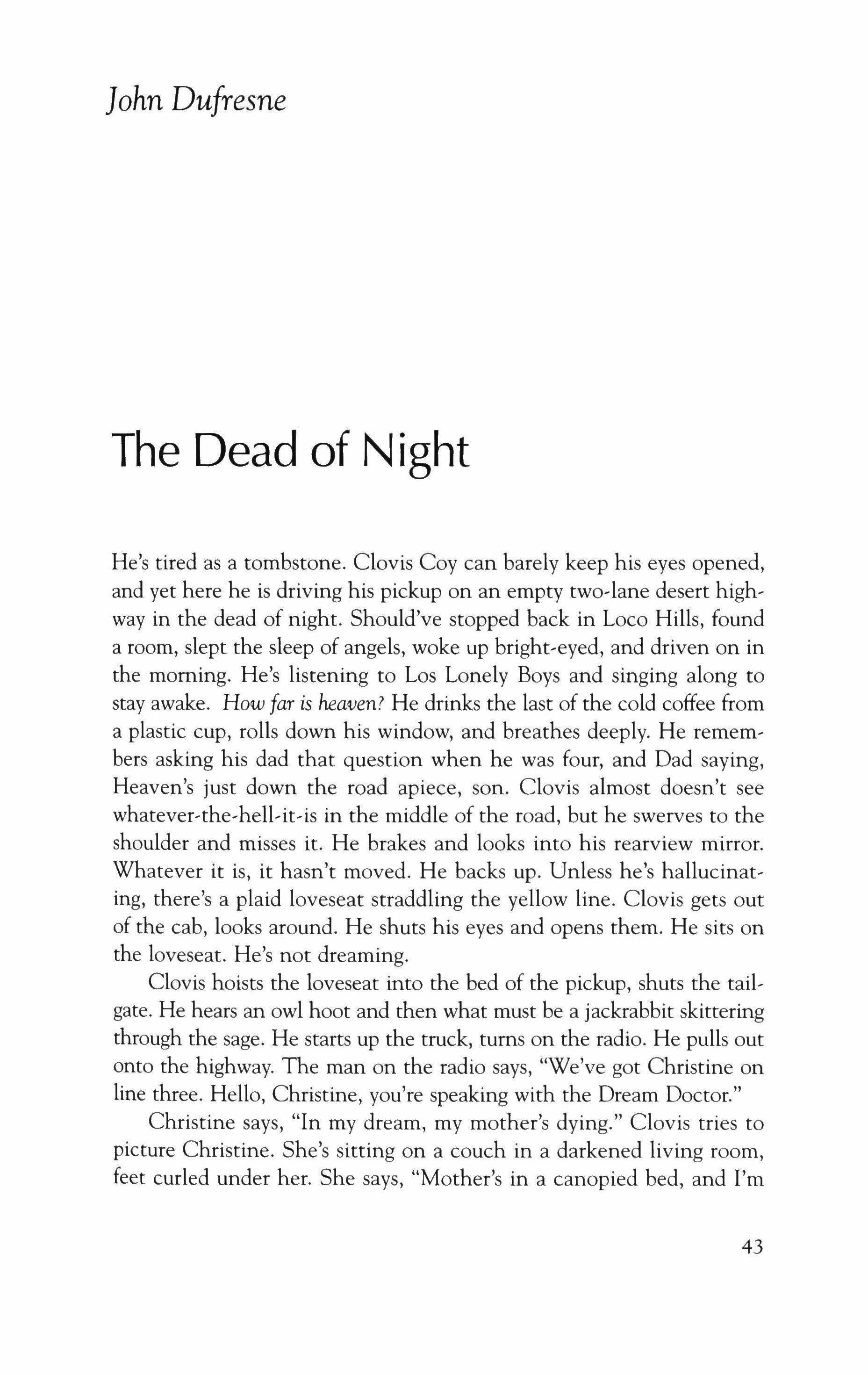
The Dead of Night
He's tired as a tombstone. Clovis Coy can barely keep his eyes opened, and yet here he is driving his pickup on an empty two-lane desert highway in the dead of night. Should've stopped back in Loco Hills, found a room, slept the sleep of angels, woke up bright-eyed, and driven on in the morning. He's listening to Los Lonely Boys and singing along to stay awake. How far is heaven? He drinks the last of the cold coffee from a plastic cup, rolls down his window, and breathes deeply. He remembers asking his dad that question when he was four, and Dad saying, Heaven's just down the road apiece, son. Clovis almost doesn't see whatever-the-hell-it-is in the middle of the road, but he swerves to the shoulder and misses it. He brakes and looks into his rearview mirror. Whatever it is, it hasn't moved. He backs up. Unless he's hallucinating, there's a plaid loveseat straddling the yellow line. Clovis gets out of the cab, looks around. He shuts his eyes and opens them. He sits on the loveseat. He's not dreaming.
Clovis hoists the loveseat into the bed of the pickup, shuts the tailgate. He hears an owl hoot and then what must be a jackrabbit skittering through the sage. He starts up the truck, turns on the radio. He pulls out onto the highway. The man on the radio says, "We've got Christine on line three. Hello, Christine, you're speaking with the Dream Doctor."
Christine says, "In my dream, my mother's dying." Clovis tries to picture Christine. She's sitting on a couch in a darkened living room, feet curled under her. She says, "Mother's in a canopied bed, and I'm
]ohn Dufresne
43
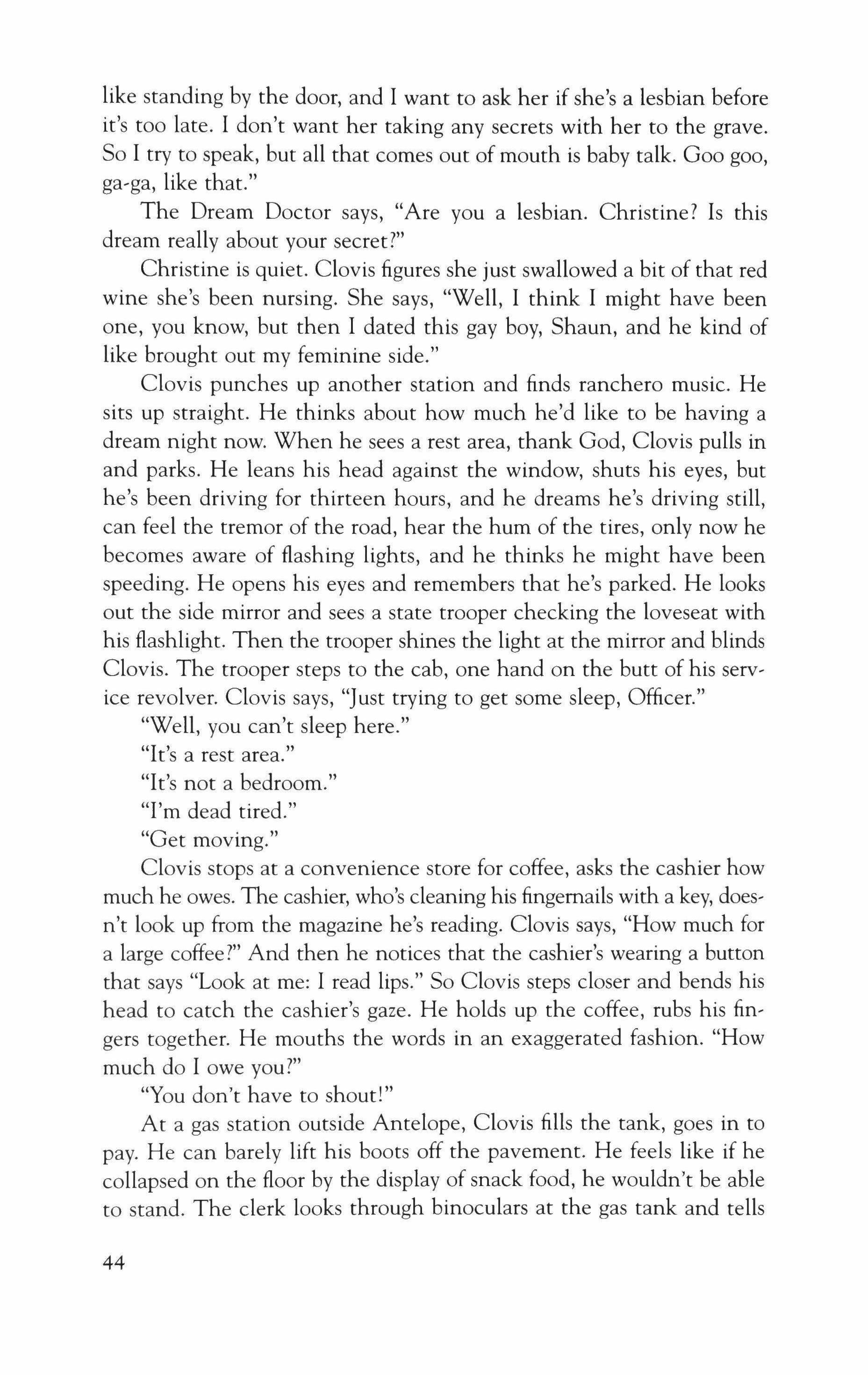
like standing by the door, and I want to ask her if she's a lesbian before it's too late. I don't want her taking any secrets with her to the grave. So I try to speak, but all that comes out of mouth is baby talk. Goo goo, ga-ga, like that."
The Dream Doctor says, "Are you a lesbian. Christine? Is this dream really about your secret?"
Christine is quiet. Clovis figures she just swallowed a bit of that red wine she's been nursing. She says, "Well, I think I might have been one, you know, but then I dated this gay boy, Shaun, and he kind of like brought out my feminine side."
Clovis punches up another station and finds ranchero music. He sits up straight. He thinks about how much he'd like to be having a dream night now. When he sees a rest area, thank God, Clovis pulls in and parks. He leans his head against the window, shuts his eyes, but he's been driving for thirteen hours, and he dreams he's driving still, can feel the tremor of the road, hear the hum of the tires, only now he becomes aware of flashing lights, and he thinks he might have been speeding. He opens his eyes and remembers that he's parked. He looks out the side mirror and sees a state trooper checking the loveseat with his flashlight. Then the trooper shines the light at the mirror and blinds Clovis. The trooper steps to the cab, one hand on the butt of his service revolver. Clovis says, "Just trying to get some sleep, Officer."
"Well, you can't sleep here."
"It's a rest area."
"It's not a bedroom."
"I'm dead tired."
"Get moving."
Clovis stops at a convenience store for coffee, asks the cashier how much he owes. The cashier, who's cleaning his fingernails with a key, doesn't look up from the magazine he's reading. Clovis says, "How much for a large coffee?" And then he notices that the cashier's wearing a button that says "Look at me: I read lips." So Clovis steps closer and bends his head to catch the cashier's gaze. He holds up the coffee, rubs his fingers together. He mouths the words in an exaggerated fashion. "How much do I owe you?"
"You don't have to shout!"
At a gas station outside Antelope, Clovis fills the tank, goes in to pay. He can barely lift his boots off the pavement. He feels like if he collapsed on the floor by the display of snack food, he wouldn't be able to stand. The clerk looks through binoculars at the gas tank and tells
44
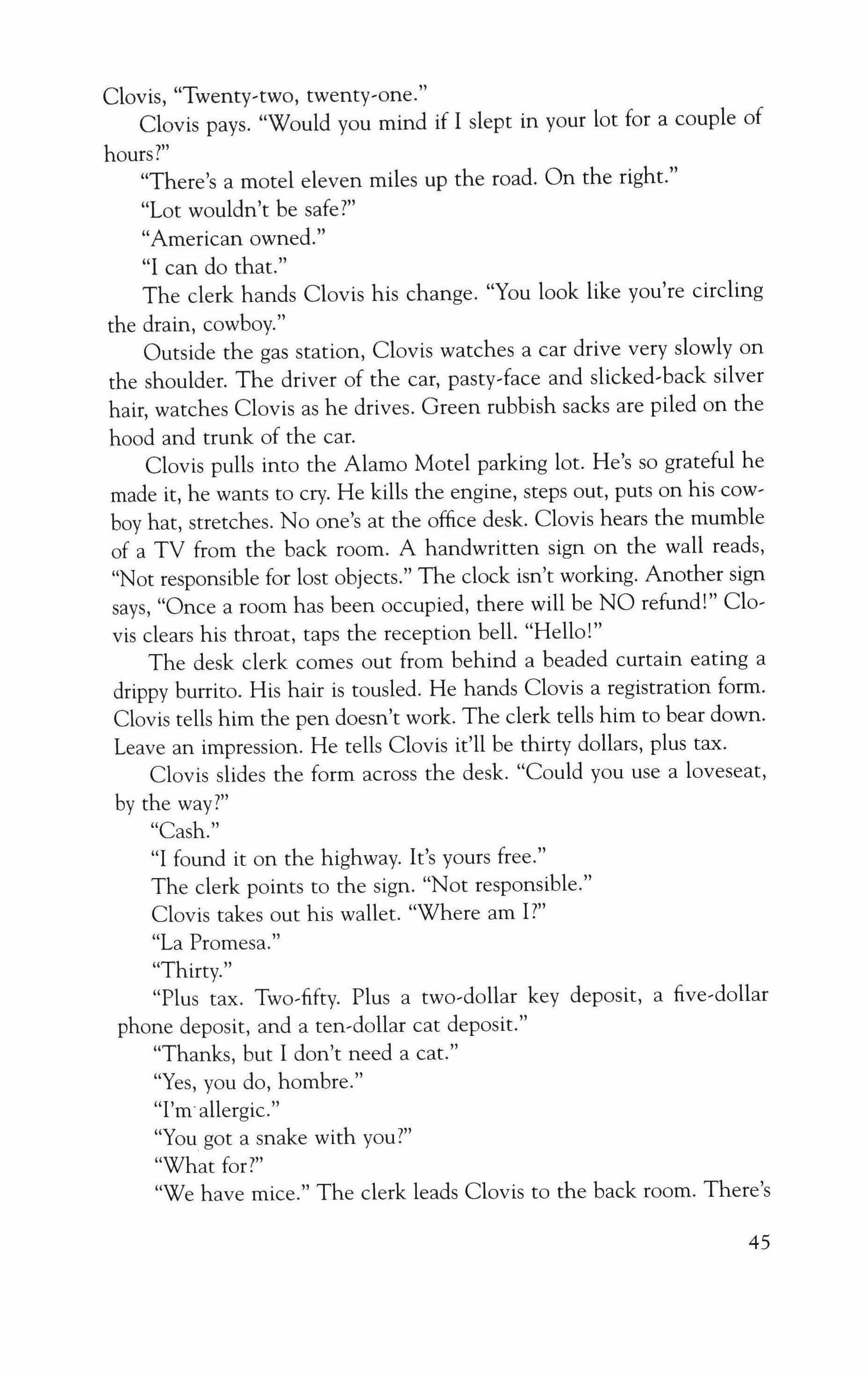
Clovis, "Twenty-two, twenty-one."
Clovis pays. "Would you mind if I slept in your lot for a couple of hours?"
"There's a motel eleven miles up the road. On the right."
"Lot wouldn't be safe?"
"American owned."
"I can do that."
The clerk hands Clovis his change. "You look like you're circling the drain, cowboy."
Outside the gas station, Clovis watches a car drive very slowly on the shoulder. The driver of the car, pasty-face and slicked-back silver hair, watches Clovis as he drives. Green rubbish sacks are piled on the hood and trunk of the car.
Clovis pulls into the Alamo Motel parking lot. He's so grateful he made it, he wants to cry. He kills the engine, steps out, puts on his cow' boy hat, stretches. No one's at the office desk. Clovis hears the mumble of a TV from the back room. A handwritten sign on the wall reads, "Not responsible for lost objects." The clock isn't working. Another sign says, "Once a room has been occupied, there will be NO refund!" Clovis clears his throat, taps the reception bell. "Hello!"
The desk clerk comes out from behind a beaded curtain eating a drippy burrito. His hair is tousled. He hands Clovis a registration form. Clovis tells him the pen doesn't work. The clerk tells him to bear down. Leave an impression. He tells Clovis it'll be thirty dollars, plus tax.
Clovis slides the form across the desk. "Could you use a loveseat, by the way?"
"Cash."
"I found it on the highway. It's yours free."
The clerk points to the sign. "Not responsible."
Clovis takes out his wallet. "Where am I?"
"La Promesa."
"Thirty."
"Plus tax. Two-fiftv, Plus a two-dollar key deposit, a five-dollar phone deposit, and a ten,dollar cat deposit."
"Thanks, but I don't need a cat."
"Yes, you do, hombre."
"I'm' allergic."
"You got a snake with you?"
"What for?"
"We have mice." The clerk leads Clovis to the back room. There's
45
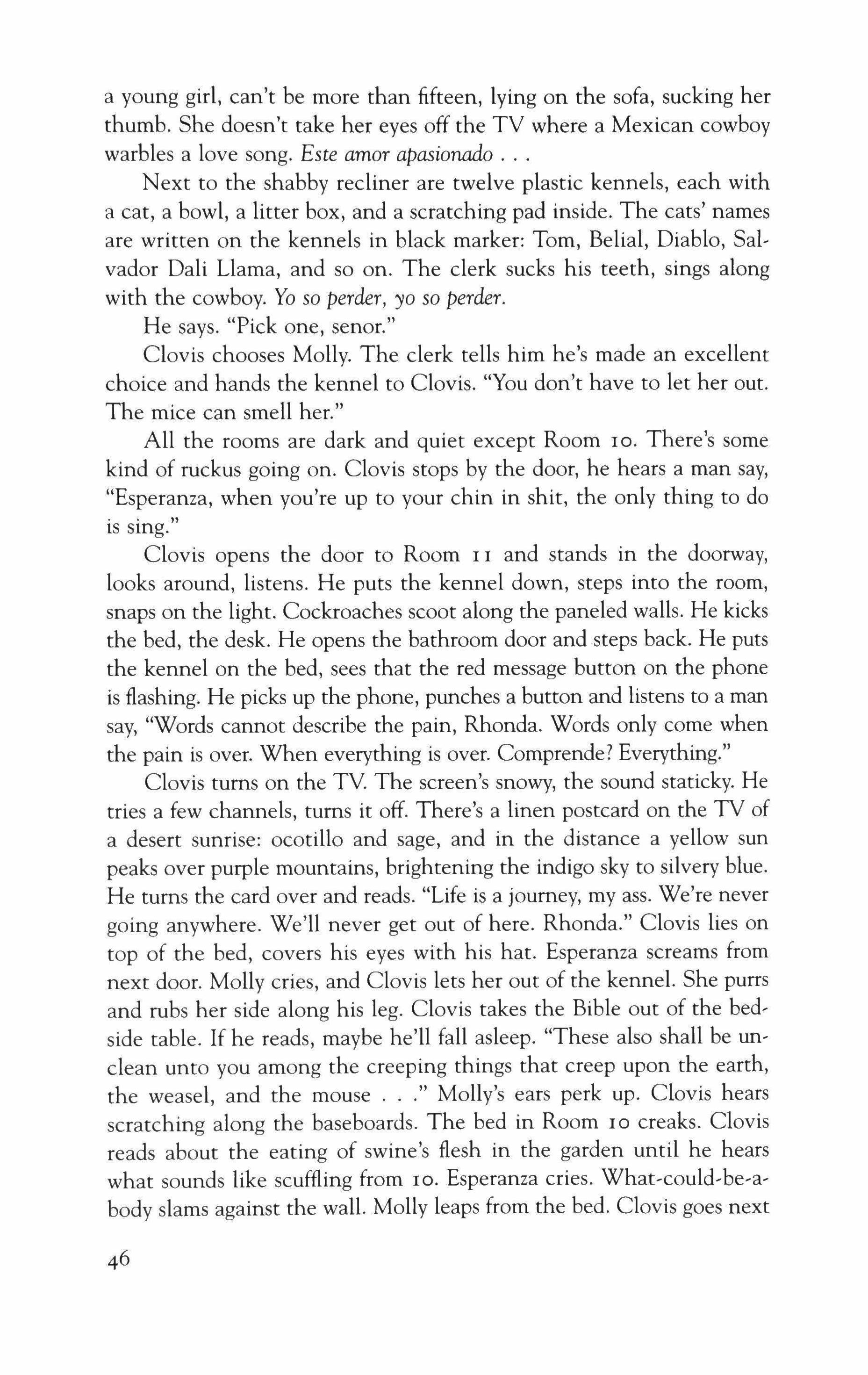
a young girl, can't be more than fifteen, lying on the sofa, sucking her thumb. She doesn't take her eyes off the TV where a Mexican cowboy warbles a love song. Este amor apasionado
Next to the shabby recliner are twelve plastic kennels, each with a cat, a bowl, a litter box, and a scratching pad inside. The cats' names are written on the kennels in black marker: Tom, Belial, Diablo, Salvador Dali Llama, and so on. The clerk sucks his teeth, sings along with the cowboy. Yo so perder, yo so perder.
He says. "Pick one, senor."
Clovis chooses Molly. The clerk tells him he's made an excellent choice and hands the kennel to Clovis. "You don't have to let her out. The mice can smell her."
All the rooms are dark and quiet except Room 10. There's some kind of ruckus going on. Clovis stops by the door, he hears a man say, "Esperanza, when you're up to your chin in shit, the only thing to do is sing."
Clovis opens the door to Room 1 1 and stands in the doorway, looks around, listens. He puts the kennel down, steps into the room, snaps on the light. Cockroaches scoot along the paneled walls. He kicks the bed, the desk. He opens the bathroom door and steps back. He puts the kennel on the bed, sees that the red message button on the phone is flashing. He picks up the phone, punches a button and listens to a man say, "Words cannot describe the pain, Rhonda. Words only come when the pain is over. When everything is over. Comprende? Everything."
Clovis turns on the TV The screen's snowy, the sound staticky. He tries a few channels, turns it off. There's a linen postcard on the TV of a desert sunrise: ocotillo and sage, and in the distance a yellow sun peaks over purple mountains, brightening the indigo sky to silvery blue. He turns the card over and reads. "Life is a journey, my ass. We're never going anywhere. We'll never get out of here. Rhonda." Clovis lies on top of the bed, covers his eyes with his hat. Esperanza screams from next door. Molly cries, and Clovis lets her out of the kennel. She purrs and rubs her side along his leg. Clovis takes the Bible out of the bedside table. If he reads, maybe he'll fall asleep. "These also shall be unclean unto you among the creeping things that creep upon the earth, the weasel, and the mouse " Molly's ears perk up. Clovis hears scratching along the baseboards. The bed in Room 10 creaks. Clovis reads about the eating of swine's flesh in the garden until he hears what sounds like scuffling from 10. Esperanza cries. What-could-be-abody slams against the wall. Molly leaps from the bed. Clovis goes next
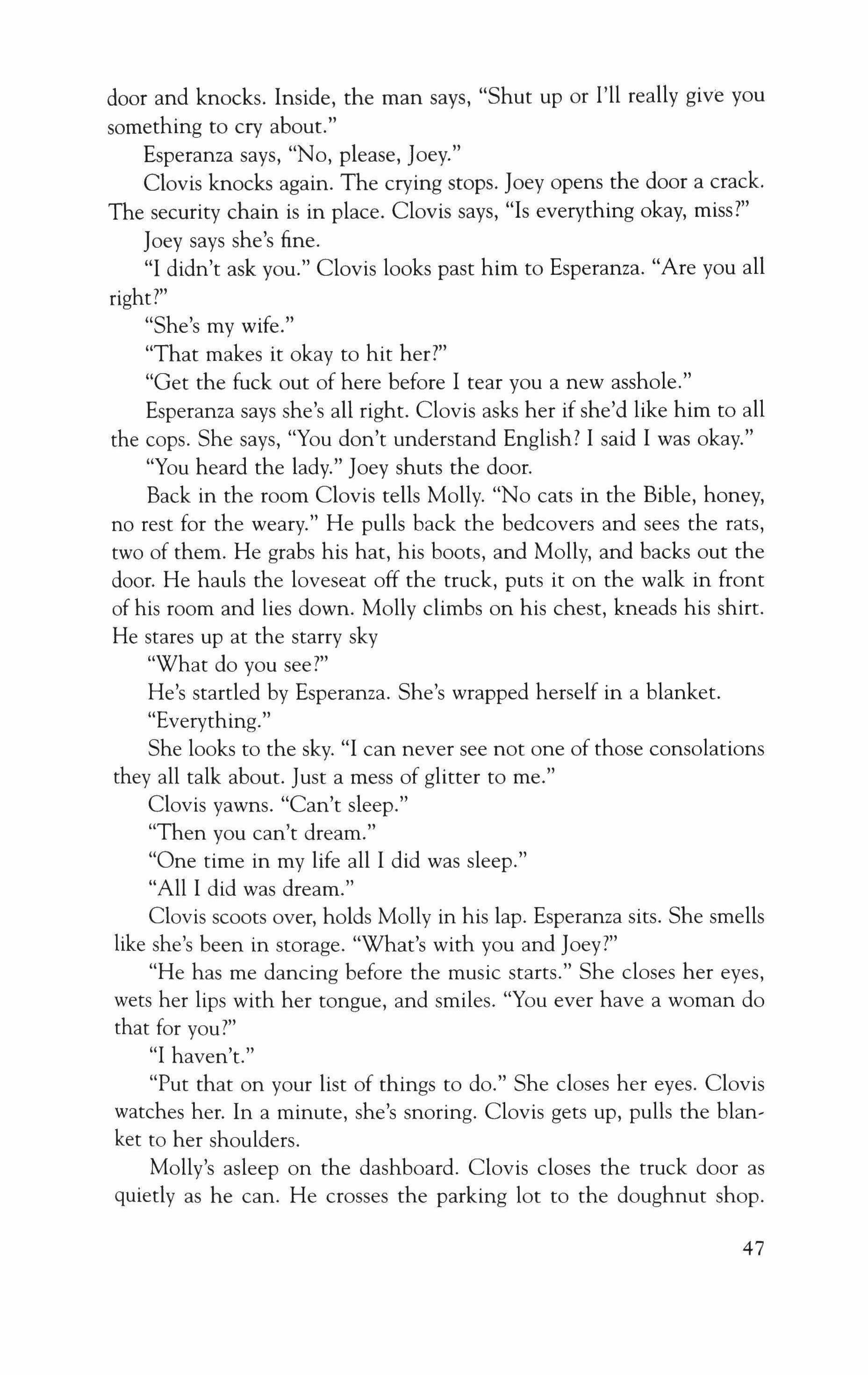
door and knocks. Inside, the man says, "Shut up or I'll really give you something to cry about."
Esperanza says, "No, please, Joey."
Clovis knocks again. The crying stops. Joey opens the door a crack. The security chain is in place. Clovis says, "Is everything okay, miss?"
Joey says she's fine.
"I didn't ask you." Clovis looks past him to Esperanza. "Are you all right?"
"She's my wife."
"That makes it okay to hit her?"
"Get the fuck out of here before I tear you a new asshole."
Esperanza says she's all right. Clovis asks her if she'd like him to all the cops. She says, "You don't understand English? I said I was okay."
"You heard the lady." Joey shuts the door.
Back in the room Clovis tells Molly. "No cats in the Bible, honey, no rest for the weary." He pulls back the bedcovers and sees the rats, two of them. He grabs his hat, his boots, and Molly, and backs out the door. He hauls the loveseat off the truck, puts it on the walk in front of his room and lies down. Molly climbs on his chest, kneads his shirt. He stares up at the starry sky
"What do you see?"
He's startled by Esperanza. She's wrapped herself in a blanket.
"Everything.
She looks to the sky. "I can never see not one of those consolations they all talk about. Just a mess of glitter to me."
Clovis yawns. "Can't sleep."
"Then you can't dream."
"One time in my life all I did was sleep."
"All I did was dream."
Clovis scoots over, holds Molly in his lap. Esperanza sits. She smells like she's been in storage. "What's with you and Joey?"
"He has me dancing before the music starts." She closes her eyes, wets her lips with her tongue, and smiles. "You ever have a woman do that for you?"
"I haven't."
"Put that on your list of things to do." She closes her eyes. Clovis watches her. In a minute, she's snoring. Clovis gets up, pulls the blanket to her shoulders.
Molly's asleep on the dashboard. Clovis closes the truck door as quietly as he can. He crosses the parking lot to the doughnut shop.
47
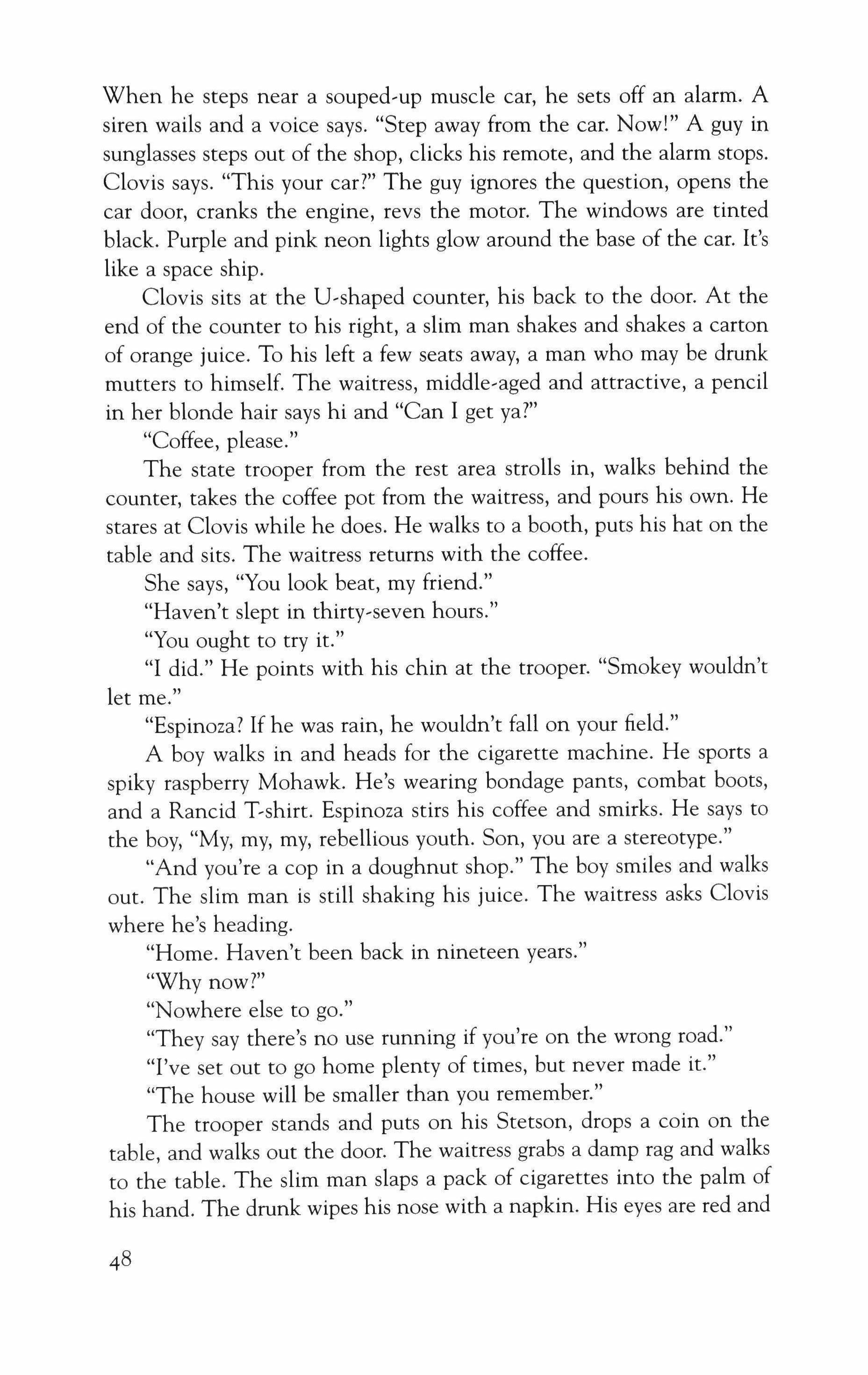
When he steps near a souped-up muscle car, he sets off an alarm. A siren wails and a voice says. "Step away from the car. Now!" A guy in sunglasses steps out of the shop, clicks his remote, and the alarm stops. Clovis says. "This your car?" The guy ignores the question, opens the car door, cranks the engine, revs the motor. The windows are tinted black. Purple and pink neon lights glow around the base of the car. It's like a space ship.
Clovis sits at the Uvshaped counter, his back to the door. At the end of the counter to his right, a slim man shakes and shakes a carton of orange juice. To his left a few seats away, a man who may be drunk mutters to himself. The waitress, middle-aged and attractive, a pencil in her blonde hair says hi and "Can I get ya?"
"Coffee, please."
The state trooper from the rest area strolls in, walks behind the counter, takes the coffee pot from the waitress, and pours his own. He stares at Clovis while he does. He walks to a booth, puts his hat on the table and sits. The waitress returns with the coffee.
She says, "You look beat, my friend."
"Haven't slept in thirty-seven hours."
"You ought to try it."
"1 did." He points with his chin at the trooper. "Smokey wouldn't let me."
"Espinoza? If he was rain, he wouldn't fall on your field."
A boy walks in and heads for the cigarette machine. He sports a spiky raspberry Mohawk. He's wearing bondage pants, combat boots, and a Rancid 'Tshirt. Espinoza stirs his coffee and smirks. He says to the boy, "My, my, my, rebellious youth. Son, you are a stereotype."
"And you're a cop in a doughnut shop." The boy smiles and walks out. The slim man is still shaking his juice. The waitress asks Clovis where he's heading.
"Home. Haven't been back in nineteen years."
"Why now?"
"Nowhere else to go."
"They say there's no use running if you're on the wrong road."
"I've set out to go home plenty of times, but never made it."
"The house will be smaller than you remember."
The trooper stands and puts on his Stetson, drops a coin on the table, and walks out the door. The waitress grabs a damp rag and walks to the table. The slim man slaps a pack of cigarettes into the palm of his hand. The drunk wipes his nose with a napkin. His eyes are red and
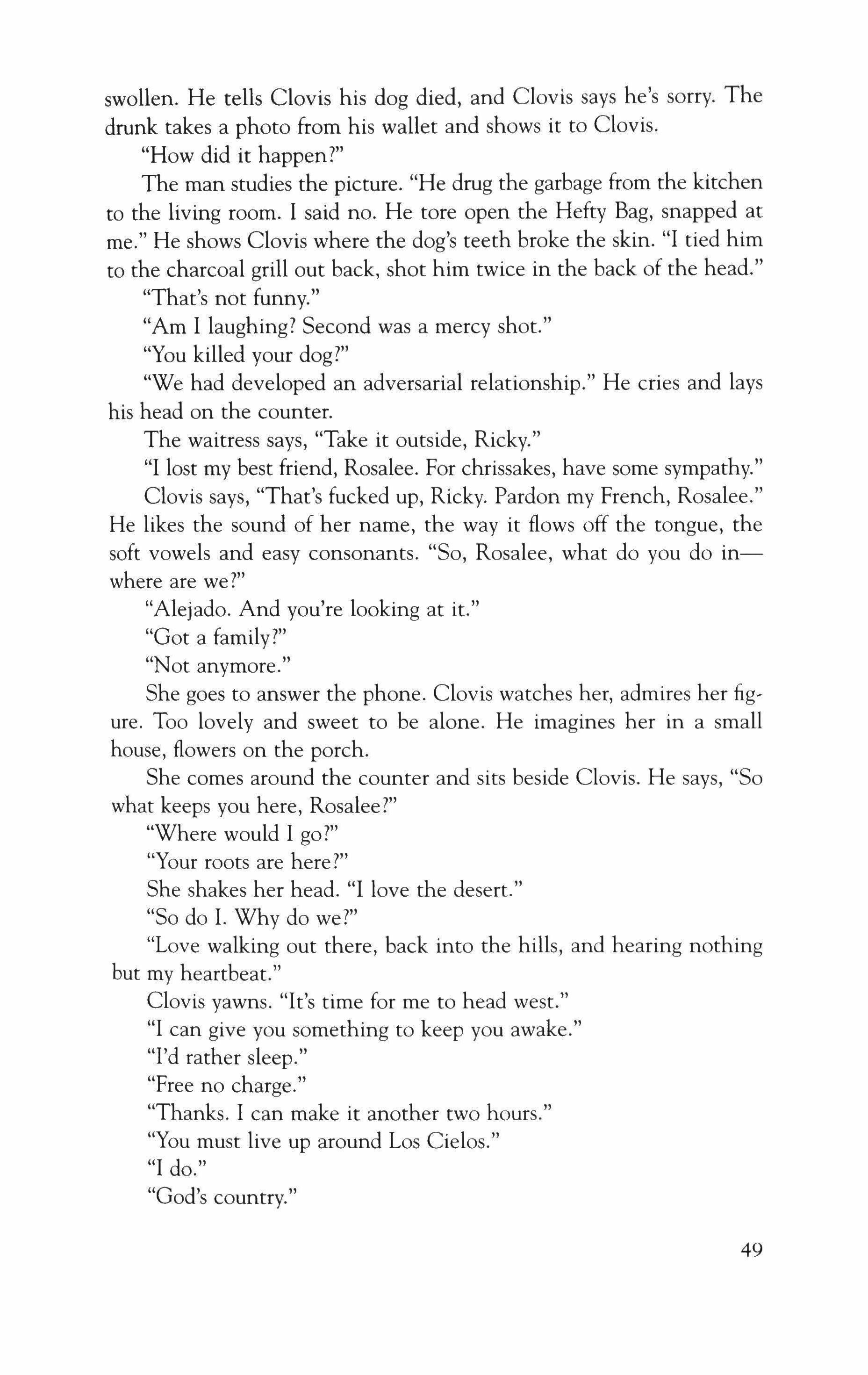
swollen. He tells Clovis his dog died, and Clovis says he's sorry. The drunk takes a photo from his wallet and shows it to Clovis.
"How did it happen?"
The man studies the picture. "He drug the garbage from the kitchen to the living room. 1 said no. He tore open the Hefty Bag, snapped at me." He shows Clovis where the dog's teeth broke the skin. "I tied him to the charcoal grill out back, shot him twice in the back of the head."
"That's not funny."
"Am 1 laughing? Second was a mercy shot."
"You killed your dog?"
"We had developed an adversarial relationship." He cries and lays his head on the counter.
The waitress says, "Take it outside, Ricky."
"I lost my best friend, Rosalee. For chrissakes, have some sympathy."
Clovis says, "That's fucked up, Ricky. Pardon my French, Rosalee." He likes the sound of her name, the way it flows off the tongue, the soft vowels and easy consonants. "So, Rosalee, what do you do inwhere are we?"
"Alejado. And you're looking at it."
"Got a family?"
"Not anymore."
She goes to answer the phone. Clovis watches her, admires her figure. Too lovely and sweet to be alone. He imagines her in a small house, flowers on the porch.
She comes around the counter and sits beside Clovis. He says, "So what keeps you here, Rosalee?"
"Where would I go?"
"Your roots are here?"
She shakes her head. "I love the desert."
"So do I. Why do we?"
"Love walking out there, back into the hills, and hearing nothing but my heartbeat."
Clovis yawns. "It's time for me to head west."
"I can give you something to keep you awake."
"I'd rather sleep."
"Free no charge."
"Thanks. I can make it another two hours."
"You must live up around Los Cielos."
"I do."
"God's country."
49
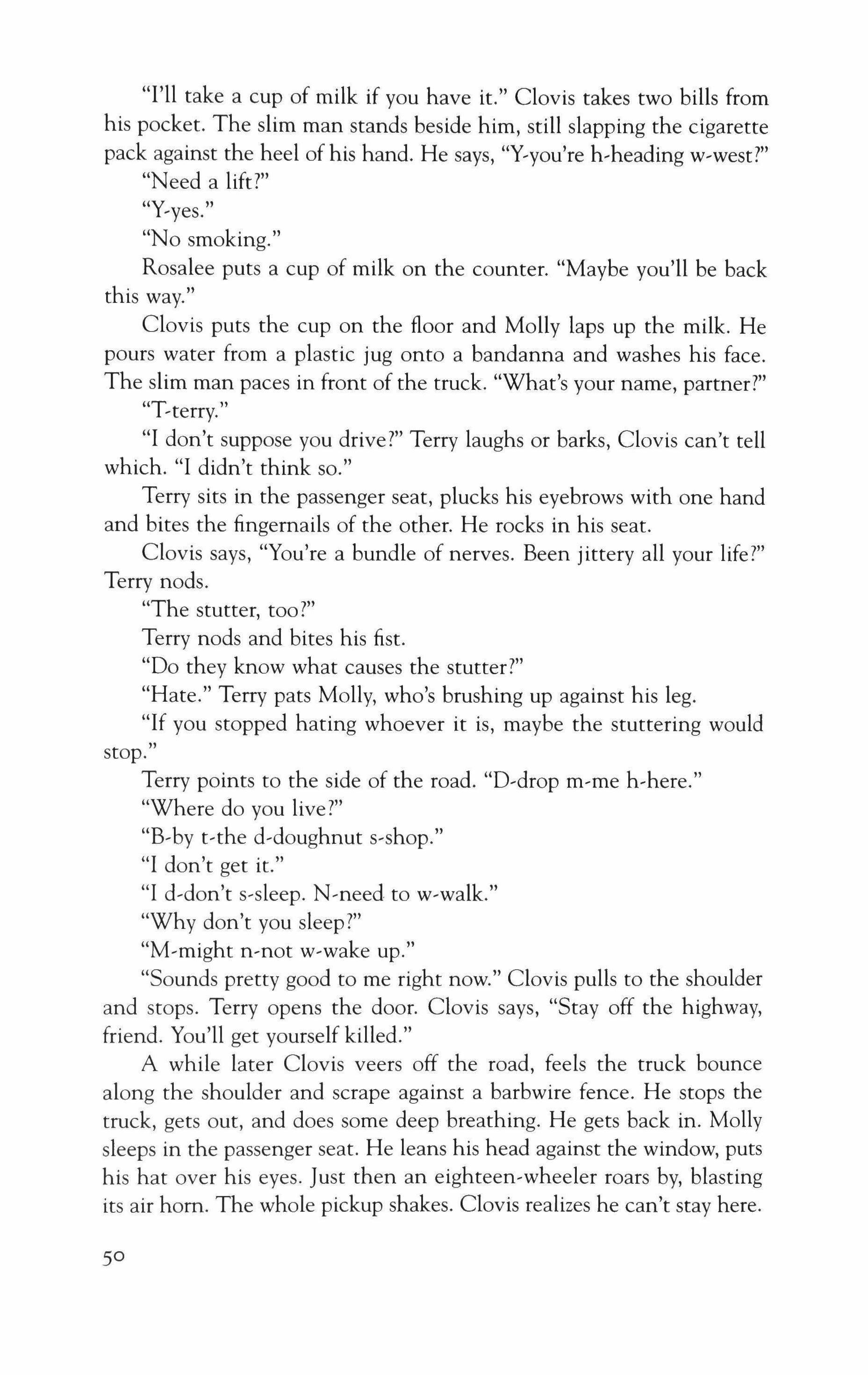
"I'll take a cup of milk if you have it." Clovis takes two bills from his pocket. The slim man stands beside him, still slapping the cigarette pack against the heel of his hand. He says, "Yyou're h-heading w-west?"
"Need a lift?"
"Y-yes."
"No smoking."
Rosalee puts a cup of milk on the counter. "Maybe you'll be back this way."
Clovis puts the cup on the floor and Molly laps up the milk. He pours water from a plastic jug onto a bandanna and washes his face. The slim man paces in front of the truck. "What's your name, partner?"
"Tterry."
"I don't suppose you drive?" Terry laughs or barks, Clovis can't tell which. "I didn't think so."
Terry sits in the passenger seat, plucks his eyebrows with one hand and bites the fingernails of the other. He rocks in his seat.
Clovis says, "You're a bundle of nerves. Been jittery all your life?" Terry nods.
"The stutter, too?"
Terry nods and bites his fist.
"Do they know what causes the stutter?"
"Hate." Terry pats Molly, who's brushing up against his leg.
"If you stopped hating whoever it is, maybe the stuttering would stop."
Terry points to the side of the road. "Dvdrop m-rne h-here."
"Where do you live?"
"B-by t-the d-doughnut s-shop."
"I don't get it."
"I d-don't s-sleep. Nvneed to w-walk."
"Why don't you sleep?"
"Mvmight n-not w-wake up."
"Sounds pretty good to me right now." Clovis pulls to the shoulder and stops. Terry opens the door. Clovis says, "Stay off the highway, friend. You'll get yourself killed."
A while later Clovis veers off the road, feels the truck bounce along the shoulder and scrape against a barbwire fence. He stops the truck, gets out, and does some deep breathing. He gets back in. Molly sleeps in the passenger seat. He leans his head against the window, puts his hat over his eyes. Just then an eighteen-wheeler roars by, blasting its air hom. The whole pickup shakes. Clovis realizes he can't stay here.
50
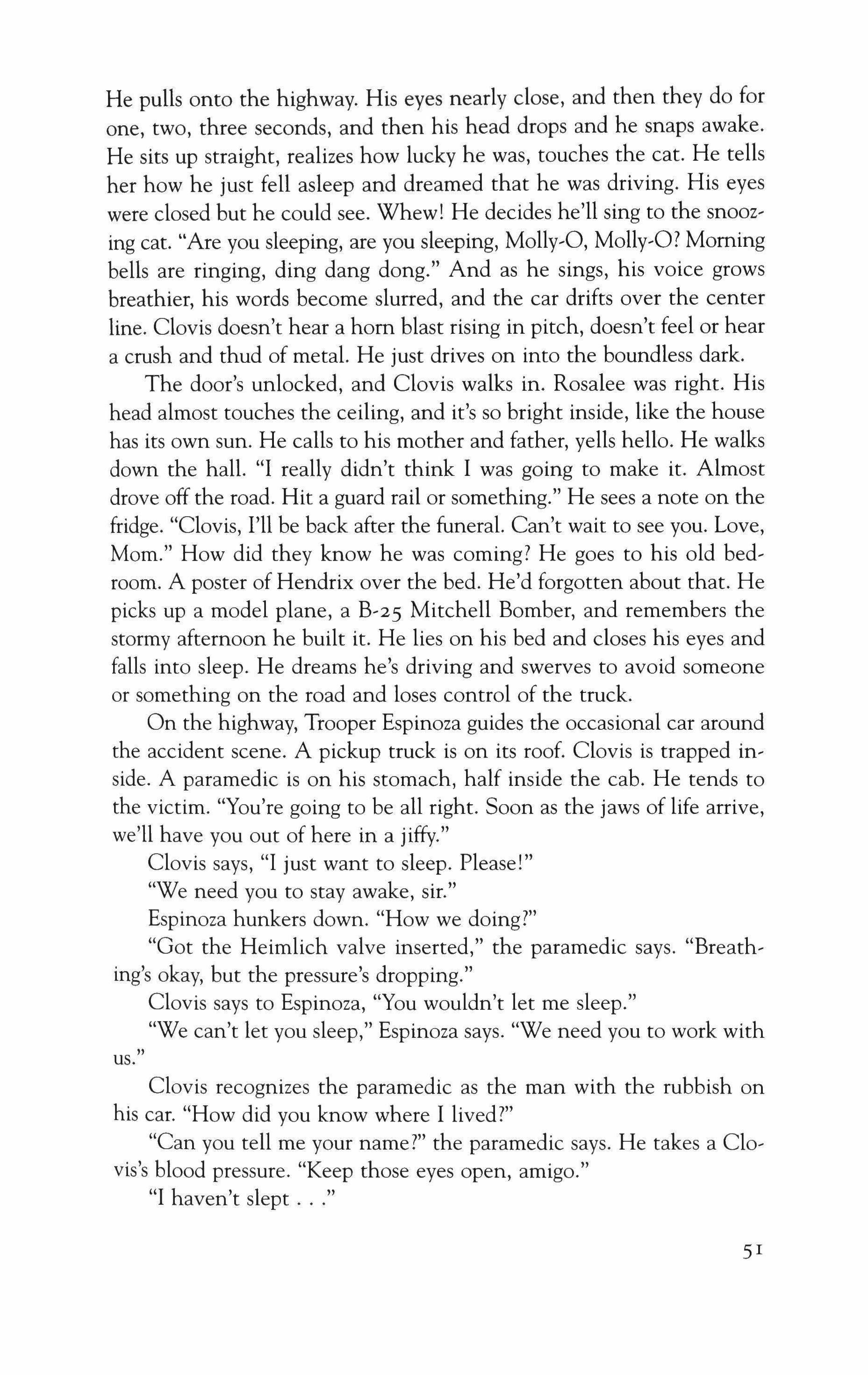
He pulls onto the highway. His eyes nearly close, and then they do for one, two, three seconds, and then his head drops and he snaps awake. He sits up straight, realizes how lucky he was, touches the cat. He tells her how he just fell asleep and dreamed that he was driving. His eyes were closed but he could see. Whew! He decides he'll sing to the snoozing cat. "Are you sleeping, are you sleeping, Molly-O, Molly-O? Morning bells are ringing, ding dang dong." And as he sings, his voice grows breathier, his words become slurred, and the car drifts over the center line. Clovis doesn't hear a horn blast rising in pitch, doesn't feel or hear a crush and thud of metal. He just drives on into the boundless dark.
The door's unlocked, and Clovis walks in. Rosalee was right. His head almost touches the ceiling, and it's so bright inside, like the house has its own sun. He calls to his mother and father, yells hello. He walks down the hall. "I really didn't think 1 was going to make it. Almost drove off the road. Hit a guard rail or something." He sees a note on the fridge. "Clovis, I'll be back after the funeral. Can't wait to see you. Love, Mom." How did they know he was coming? He goes to his old bed, room. A poster of Hendrix over the bed. He'd forgotten about that. He picks up a model plane, a B'25 Mitchell Bomber, and remembers the stormy afternoon he built it. He lies on his bed and closes his eyes and falls into sleep. He dreams he's driving and swerves to avoid someone or something on the road and loses control of the truck.
On the highway, Trooper Espinoza guides the occasional car around the accident scene. A pickup truck is on its roof. Clovis is trapped in, side. A paramedic is on his stomach, half inside the cab. He tends to the victim. "You're going to be all right. Soon as the jaws of life arrive, we'll have you out of here in a jiffy."
Clovis says, "I just want to sleep. Please!"
"We need you to stay awake, sir."
Espinoza hunkers down. "How we doing?"
"Got the Heimlich valve inserted," the paramedic says. "Breath, ing's okay, but the pressure's dropping."
Clovis says to Espinoza, "You wouldn't let me sleep."
"We can't let you sleep," Espinoza says. "We need you to work with us."
Clovis recognizes the paramedic as the man with the rubbish on his car. "How did you know where 1 lived?"
"Can you tell me your name?" the paramedic says. He takes a Clovis's blood pressure. "Keep those eyes open, amigo."
"I haven't slept
51
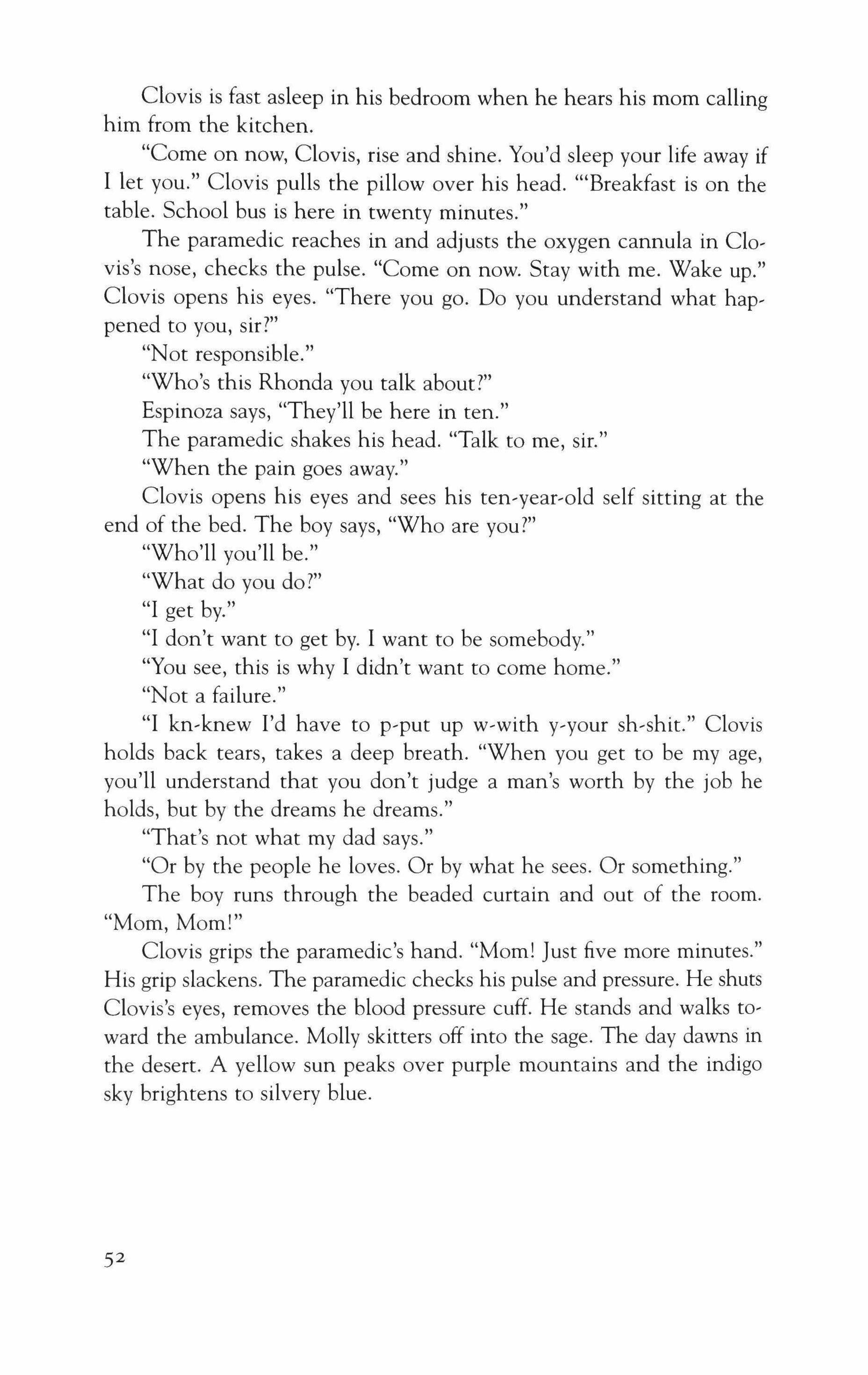
Clovis is fast asleep in his bedroom when he hears his mom calling him from the kitchen.
"Come on now, Clovis, rise and shine. You'd sleep your life away if I let you." Clovis pulls the pillow over his head. "'Breakfast is on the table. School bus is here in twenty minutes."
The paramedic reaches in and adjusts the oxygen cannula in Clovis's nose, checks the pulse. "Come on now. Stay with me. Wake up." Clovis opens his eyes. "There you go. Do you understand what happened to you, sir?"
"Not responsible."
"Who's this Rhonda you talk about?"
Espinoza says, "They'll be here in ten."
The paramedic shakes his head. "Talk to me, sir."
"When the pain goes away."
Clovis opens his eyes and sees his ten-year-old self sitting at the end of the bed. The boy says, "Who are you?"
"Who'll you'll be."
"What do you do?"
"I get by."
"I don't want to get by. I want to be somebody."
"You see, this is why I didn't want to come home."
"Not a failure."
"I kn-knew I'd have to p-put up w-with y-your sh-shit." Clovis holds back tears, takes a deep breath. "When you get to be my age, you'll understand that you don't judge a man's worth by the job he holds, but by the dreams he dreams."
"That's not what my dad says."
"Or by the people he loves. Or by what he sees. Or something."
The boy runs through the beaded curtain and out of the room. "Mom, Mom!"
Clovis grips the paramedic's hand. "Mom! Just five more minutes." His grip slackens. The paramedic checks his pulse and pressure. He shuts Clovis's eyes, removes the blood pressure cuff. He stands and walks toward the ambulance. Molly skitters off into the sage. The day dawns in the desert. A yellow sun peaks over purple mountains and the indigo sky brightens to silvery blue.
Edward Hirsch
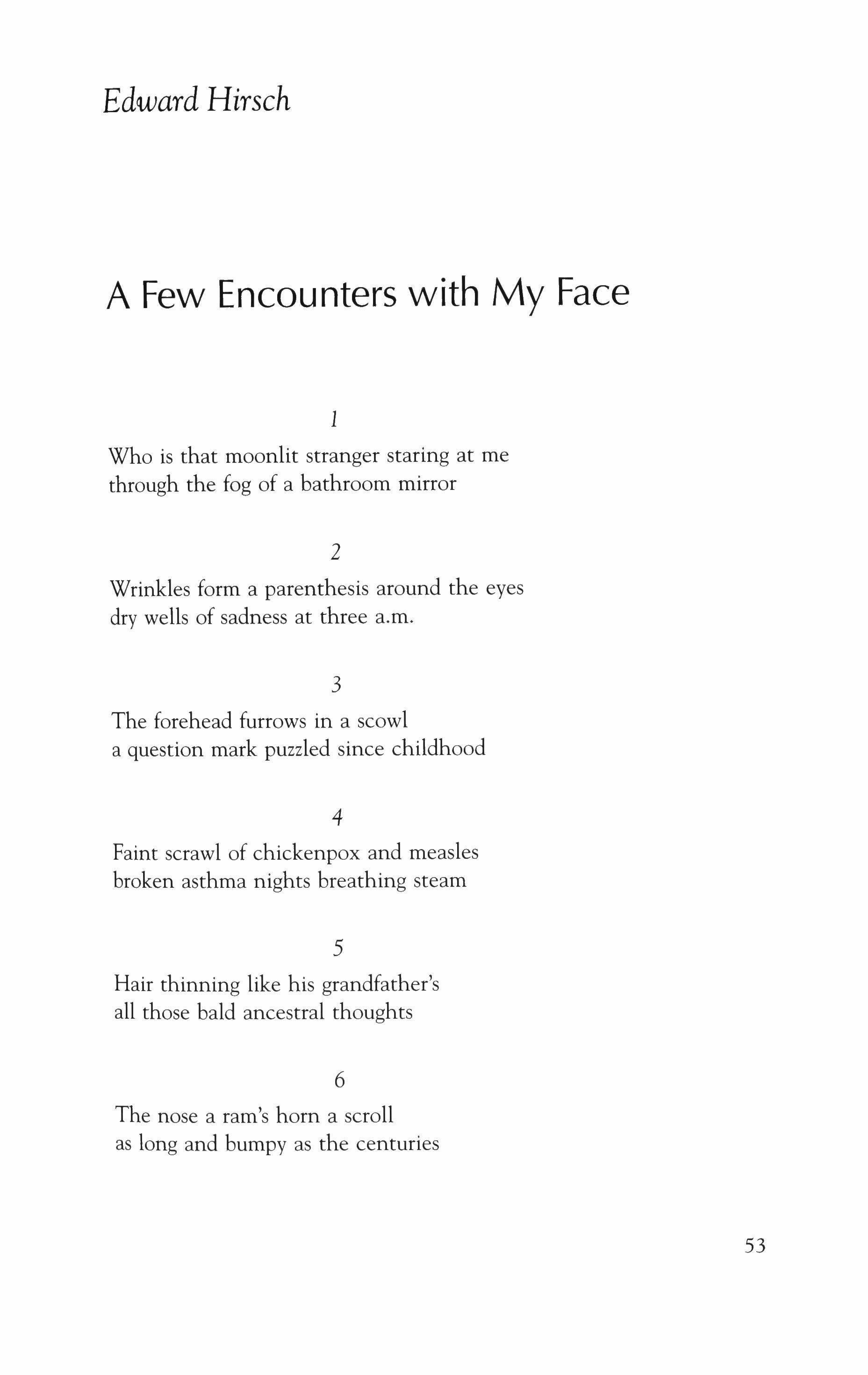
A Few Encounters with My Face
Who
stranger staring at me through
a bathroom mirror 2 Wrinkles
dry
3 The
a
a
puzzled since childhood 4 Faint scrawl of chickenpox and measles broken asthma nights breathing steam 5 Hair thinning like his grandfather's all those bald ancestral thoughts 6 The nose a ram's horn a scroll as long and bumpy as the centuries 53
is that moonlit
the fog of
form a parenthesis around the eyes
wells of sadness at three a.m.
forehead furrows in
scowl
question mark
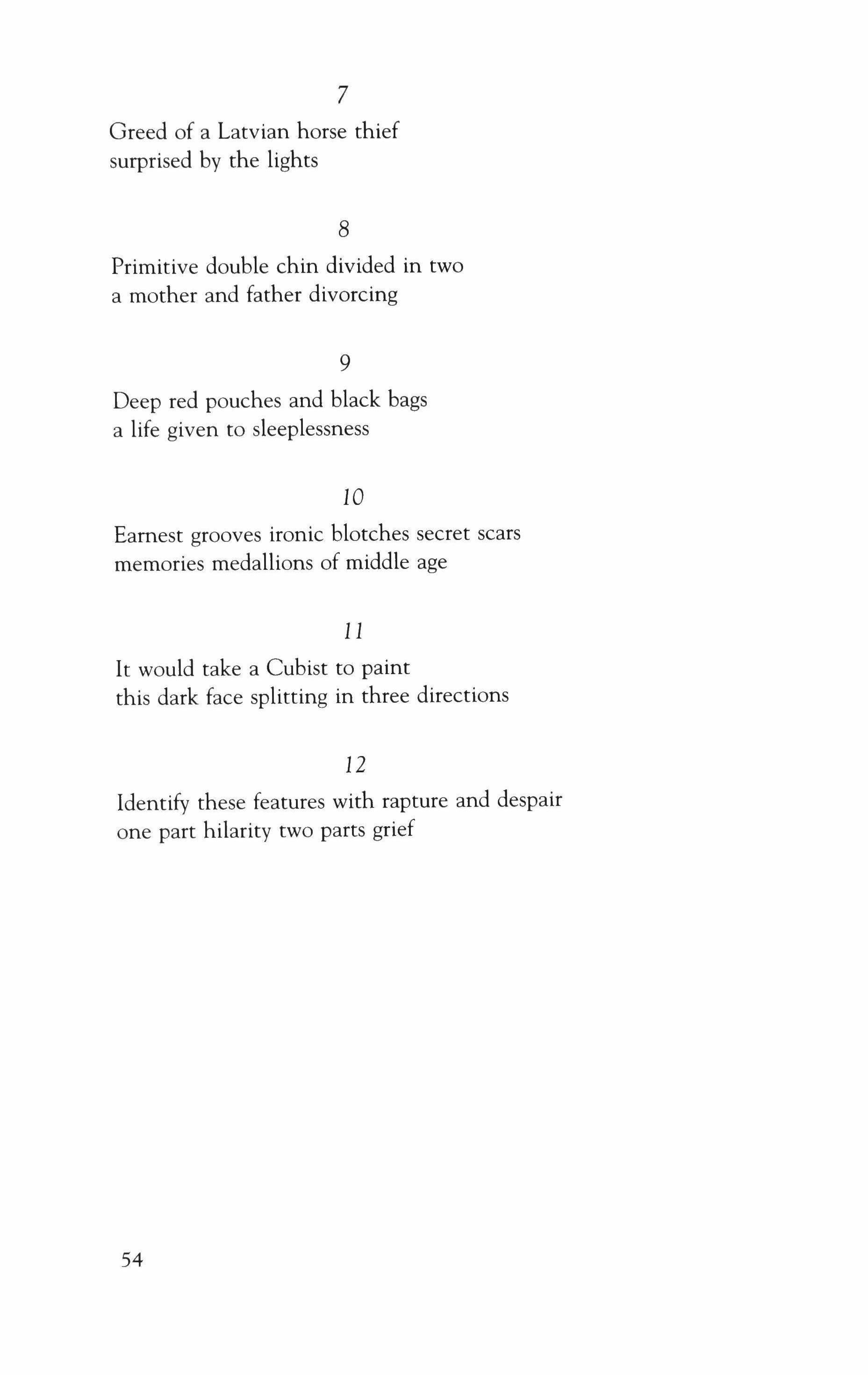
7 Greed of a Latvian horse thief surprised by the lights 8 Primitive double chin divided in two a mother and father divorcing 9 Deep red pouches and black bags a life given to sleeplessness 10 Earnest grooves ironic blotches secret scars memories medallions of middle age 11 It would take a Cubist to paint this dark face splitting in three directions 12 Identify these features with rapture and despair one part hilarity two parts grief 54
Mark Strand Cake
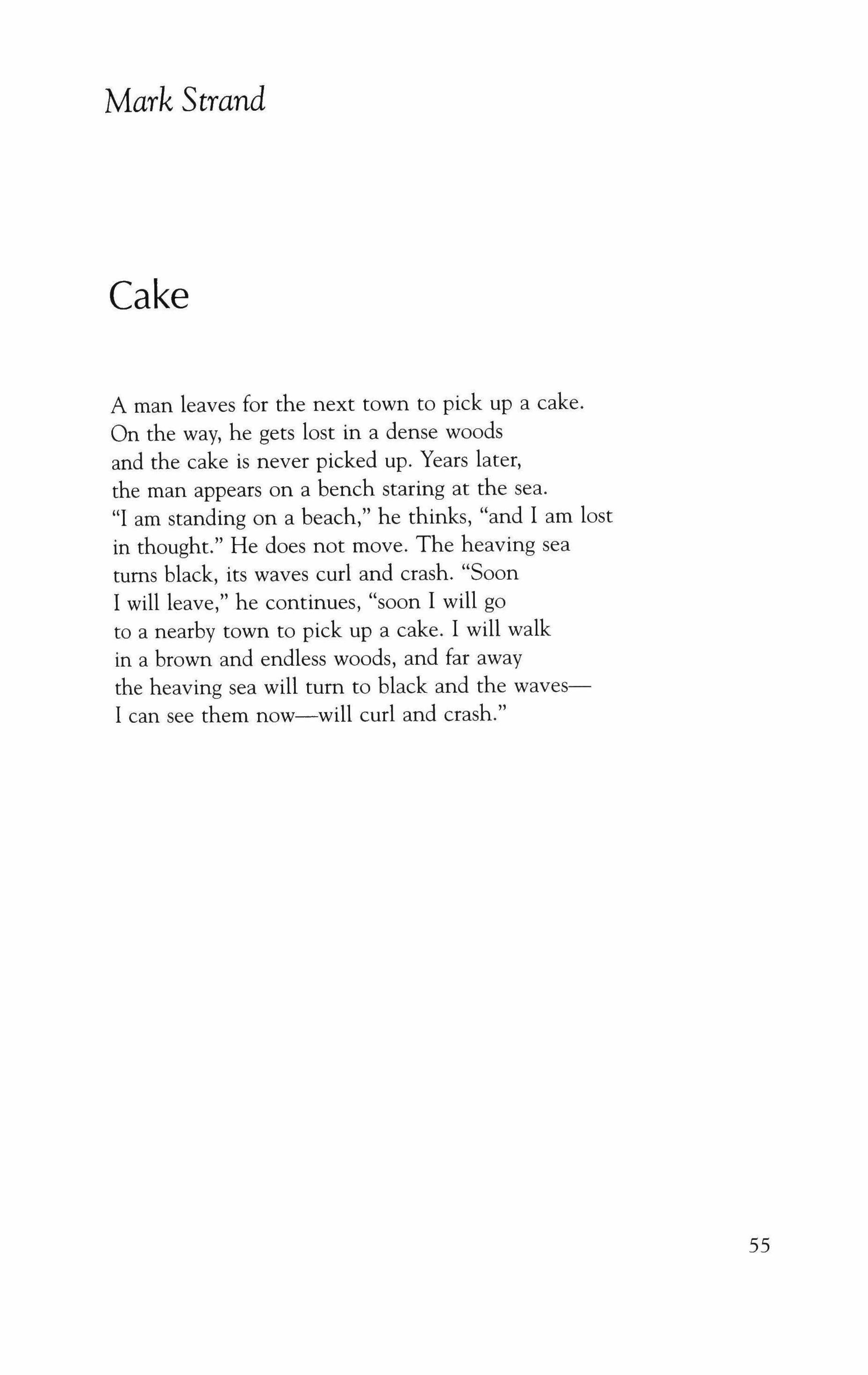
A man leaves for the next town to pick up a cake. On the way, he gets lost in a dense woods and the cake is never picked up. Years later, the man appears on a bench staring at the sea. "I am standing on a beach," he thinks, "and I am lost in thought." He does not move. The heaving sea turns black, its waves curl and crash. "Soon I will leave," he continues, "soon I will go to a nearby town to pick up a cake. I will walk in a brown and endless woods, and far away the heaving sea will tum to black and the wavesI can see them now-will curl and crash."
55
John Rybicki
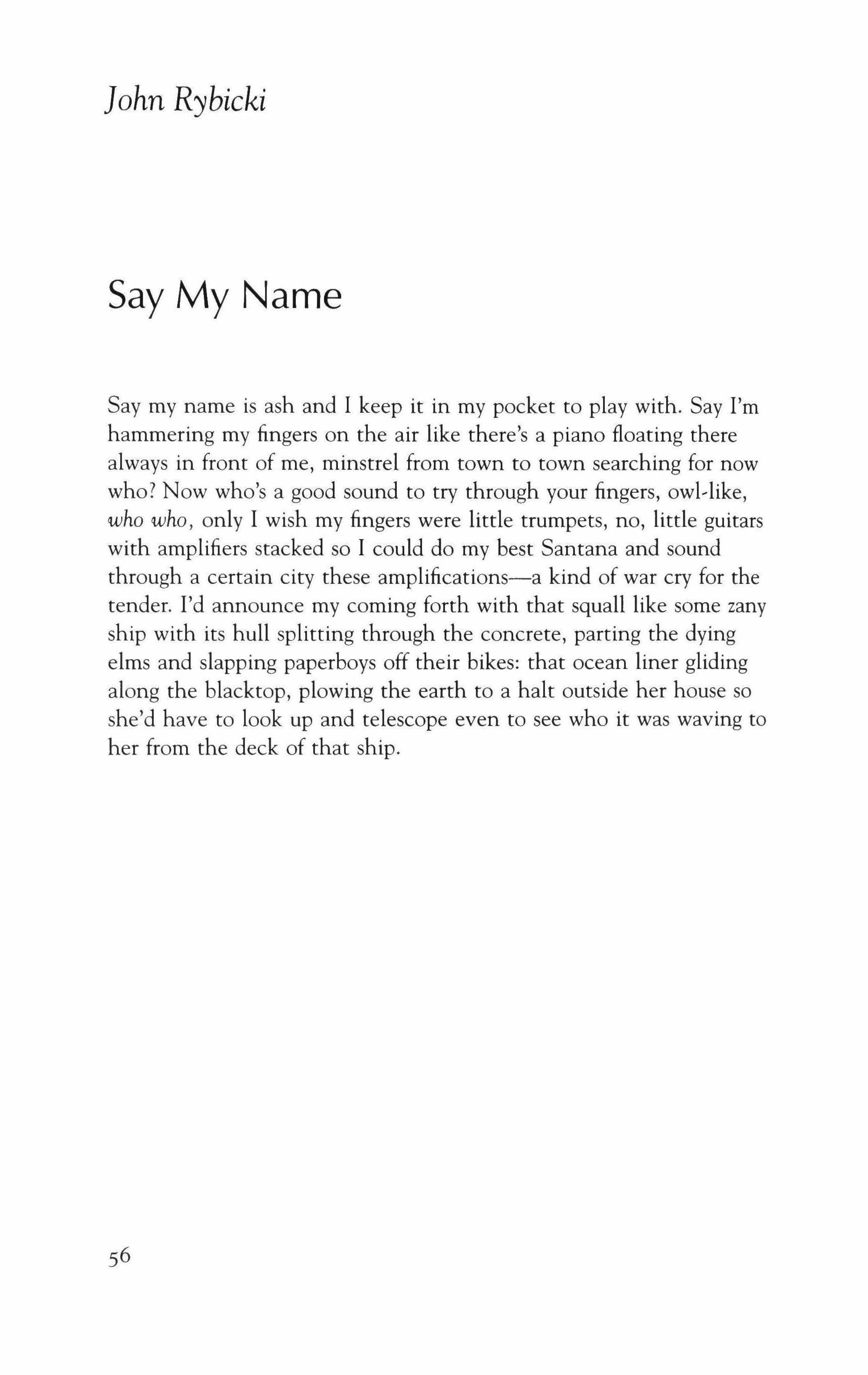
Say My Name
Say my name is ash and I keep it in my pocket to play with. Say I'm hammering my fingers on the air like there's a piano floating there always in front of me, minstrel from town to town searching for now who? Now who's a good sound to try through your fingers, owl-like, who who, only I wish my fingers were little trumpets, no, little guitars with amplifiers stacked so I could do my best Santana and sound through a certain city these amplifications-a kind of war cry for the tender. I'd announce my coming forth with that squall like some zany ship with its hull splitting through the concrete, parting the dying elms and slapping paperboys off their bikes: that ocean liner gliding along the blacktop, plowing the earth to a halt outside her house so she'd have to look up and telescope even to see who it was waving to her from the deck of that ship.
56
Courtney Angela Brkic
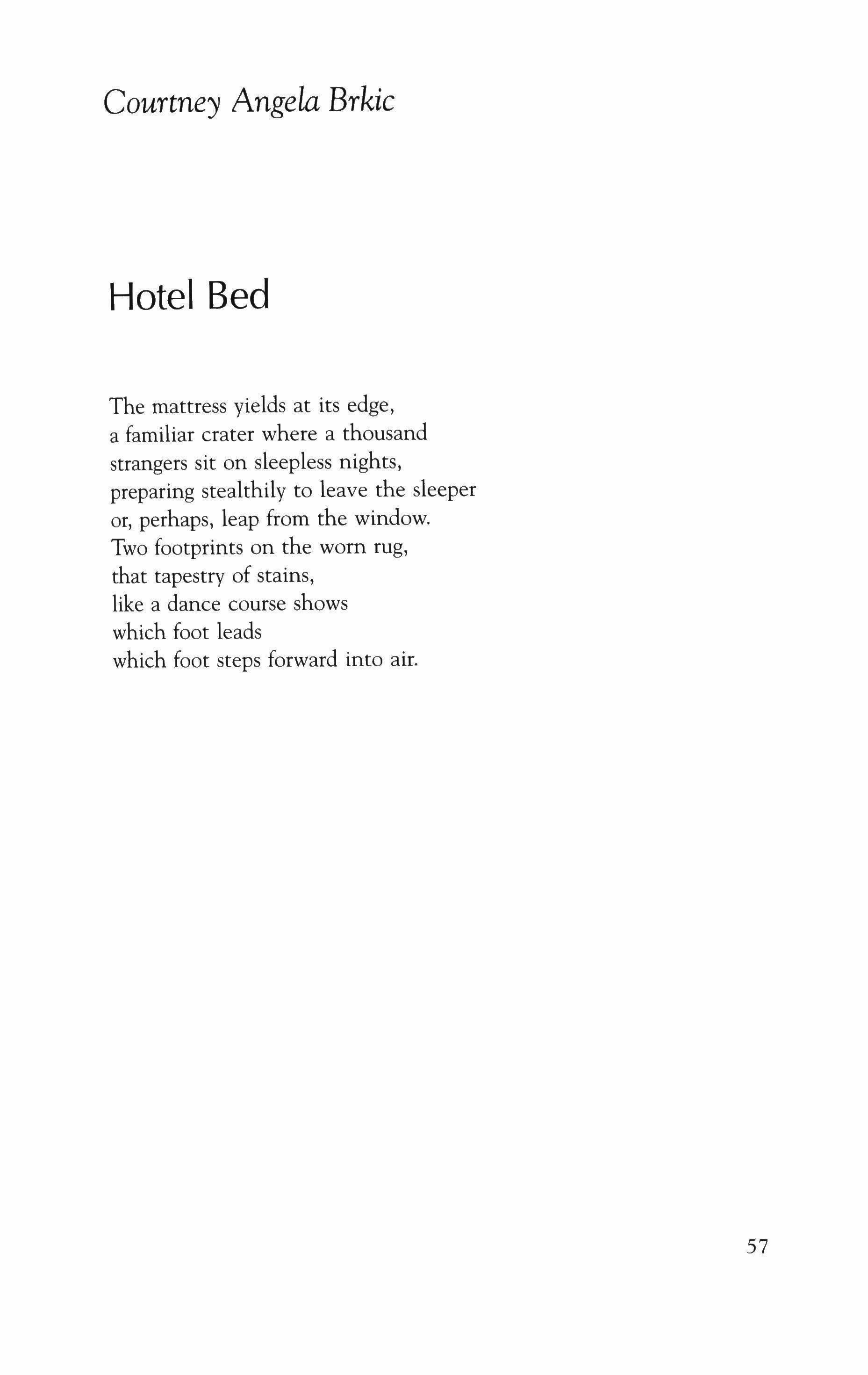
Hotel Bed
The mattress yields at its edge, a familiar crater where a thousand strangers sit on sleepless nights, preparing stealthily to leave the sleeper Of, perhaps, leap from the window. Two footprints on the worn rug, that tapestry of stains, like a dance course shows which foot leads which foot steps forward into air.
57
Mark Slouka
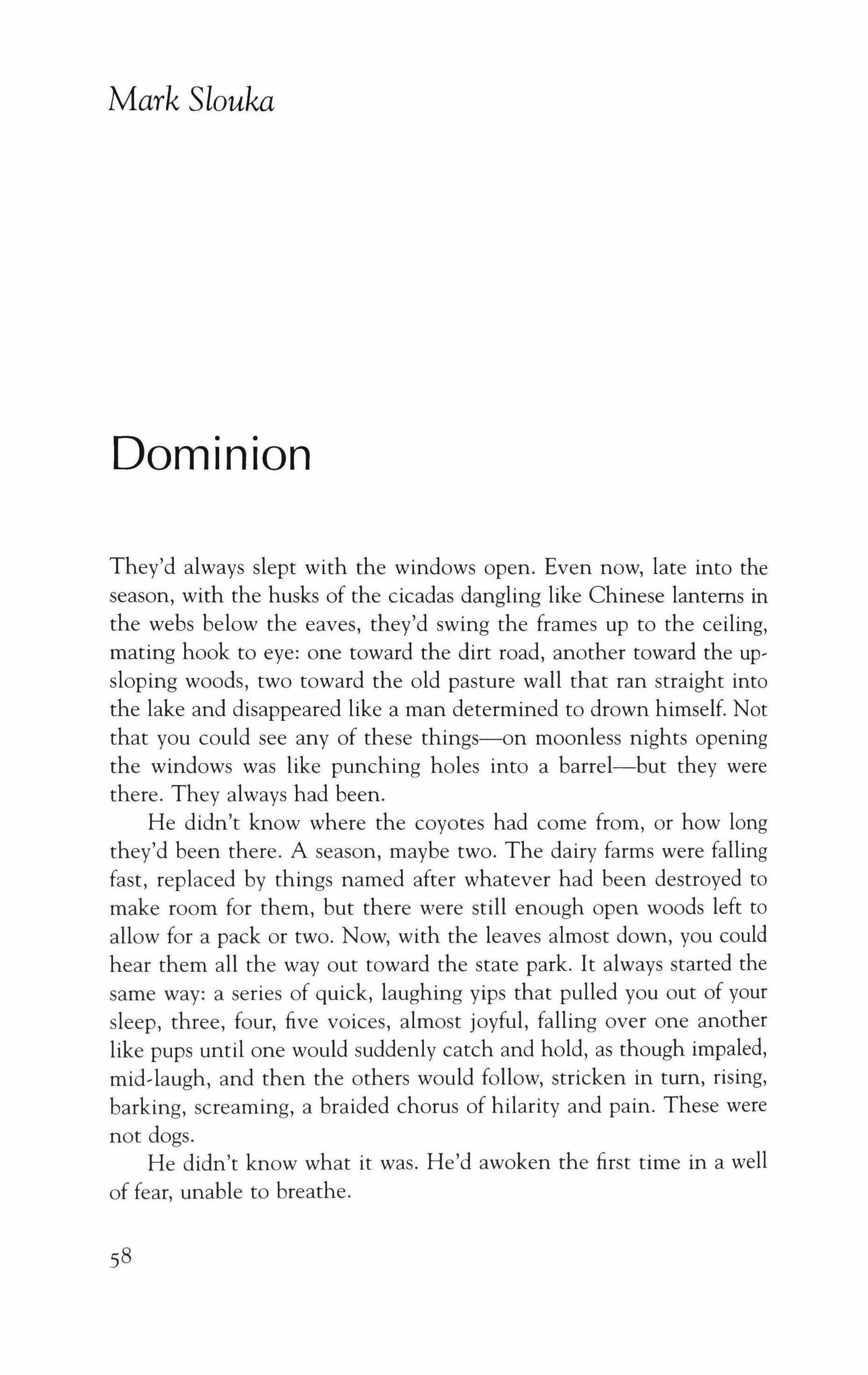
Dominion
They'd always slept with the windows open. Even now, late into the season, with the husks of the cicadas dangling like Chinese lanterns in the webs below the eaves, they'd swing the frames up to the ceiling, mating hook to eye: one toward the dirt road, another toward the upsloping woods, two toward the old pasture wall that ran straight into the lake and disappeared like a man determined to drown himself. Not that you could see any of these things-on moonless nights opening the windows was like punching holes into a barrel-but they were there. They always had been.
He didn't know where the coyotes had come from, or how long they'd been there. A season, maybe two. The dairy farms were falling fast, replaced by things named after whatever had been destroyed to make room for them, but there were still enough open woods left to allow for a pack or two. Now, with the leaves almost down, you could hear them all the way out toward the state park. It always started the same way: a series of quick, laughing yips that pulled you out of your sleep, three, four, five voices, almost joyful, falling over one another like pups until one would suddenly catch and hold, as though impaled, mid-laugh, and then the others would follow, stricken in turn, rising, barking, screaming, a braided chorus of hilarity and pain. These were not dogs.
He didn't know what it was. He'd awoken the first time in a well of fear, unable to breathe.
58
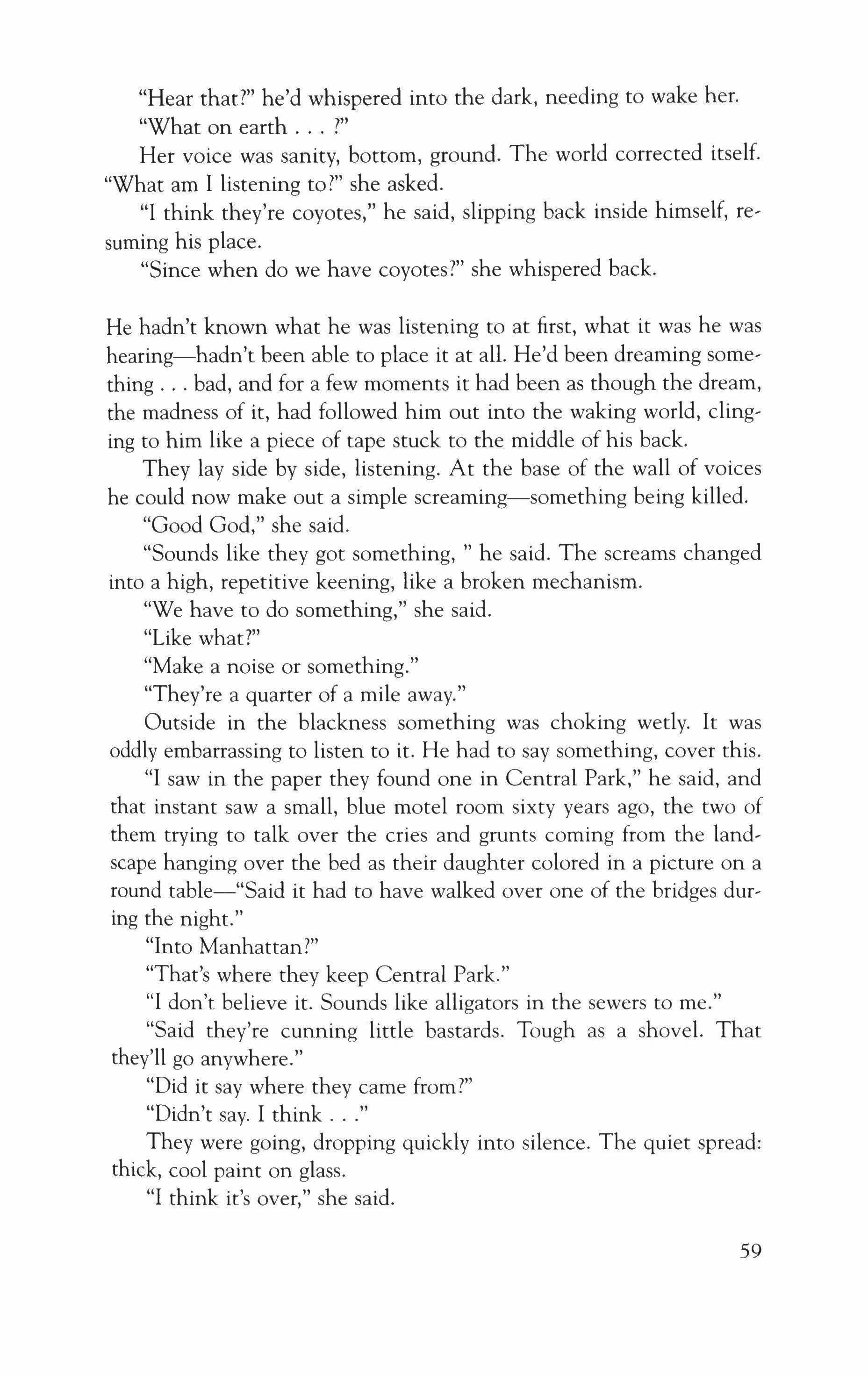
"Hear that?" he'd whispered into the dark, needing to wake her.
"What on earth ?"
Her voice was sanity, bottom, ground. The world corrected itself. "What am I listening to?" she asked.
"I think they're coyotes," he said, slipping back inside himself, resuming his place.
"Since when do we have coyotes?" she whispered back.
He hadn't known what he was listening to at first, what it was he was hearing-hadn't been able to place it at all. He'd been dreaming something bad, and for a few moments it had been as though the dream, the madness of it, had followed him out into the waking world, clinging to him like a piece of tape stuck to the middle of his back.
They lay side by side, listening. At the base of the wall of voices he could now make out a simple screaming-something being killed.
"Good God," she said.
"Sounds like they got something, he said. The screams changed into a high, repetitive keening, like a broken mechanism.
"We have to do something," she said.
"Like what?"
"Make a noise or something."
"They're a quarter of a mile away."
Outside in the blackness something was choking wetly. It was oddly embarrassing to listen to it. He had to say something, cover this.
"I saw in the paper they found one in Central Park," he said, and that instant saw a small, blue motel room sixty years ago, the two of them trying to talk over the cries and grunts coming from the landscape hanging over the bed as their daughter colored in a picture on a round table-"Said it had to have walked over one of the bridges during the night."
"Into Manhattan?"
"That's where they keep Central Park."
"I don't believe it. Sounds like alligators in the sewers to me."
"Said they're cunning little bastards. Tough as a shovel. That they'll go anywhere."
"Did it say where they came from?"
"Didn't say. I think They were going, dropping quickly into silence. The quiet spread: thick, cool paint on glass.
"I think it's over," she said.
59
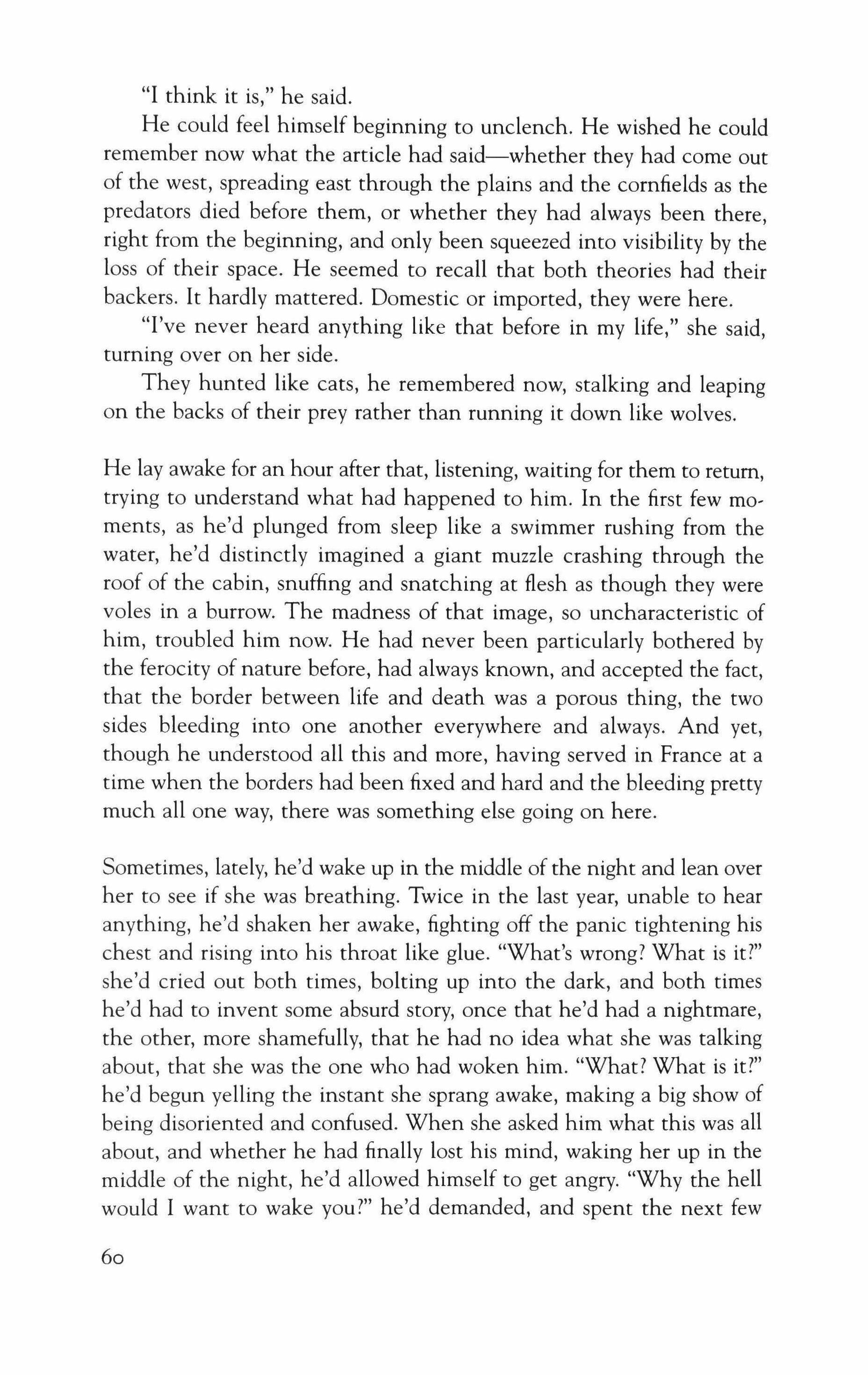
"I think it is," he said.
He could feel himself beginning to unclench. He wished he could remember now what the article had said-whether they had come out of the west, spreading east through the plains and the cornfields as the predators died before them, or whether they had always been there, right from the beginning, and only been squeezed into visibility by the loss of their space. He seemed to recall that both theories had their backers. It hardly mattered. Domestic or imported, they were here.
"I've never heard anything like that before in my life," she said, turning over on her side.
They hunted like cats, he remembered now, stalking and leaping on the backs of their prey rather than running it down like wolves.
He lay awake for an hour after that, listening, waiting for them to return, trying to understand what had happened to him. In the first few moments, as he'd plunged from sleep like a swimmer rushing from the water, he'd distinctly imagined a giant muzzle crashing through the roof of the cabin, snuffing and snatching at flesh as though they were voles in a burrow. The madness of that image, so uncharacteristic of him, troubled him now. He had never been particularly bothered by the ferocity of nature before, had always known, and accepted the fact, that the border between life and death was a porous thing, the two sides bleeding into one another everywhere and always. And yet, though he understood all this and more, having served in France at a time when the borders had been fixed and hard and the bleeding pretty much all one way, there was something else going on here.
Sometimes, lately, he'd wake up in the middle of the night and lean over her to see if she was breathing. Twice in the last year, unable to hear anything, he'd shaken her awake, fighting off the panic tightening his chest and rising into his throat like glue. "What's wrong? What is it?" she'd cried out both times, bolting up into the dark, and both times he'd had to invent some absurd story, once that he'd had a nightmare, the other, more shamefully, that he had no idea what she was talking about, that she was the one who had woken him. "What? What is it?" he'd begun yelling the instant she sprang awake, making a big show of being disoriented and confused. When she asked him what this was all about, and whether he had finally lost his mind, waking her up in the middle of the night, he'd allowed himself to get angry. "Why the hell would I want to wake you?" he'd demanded, and spent the next few
60
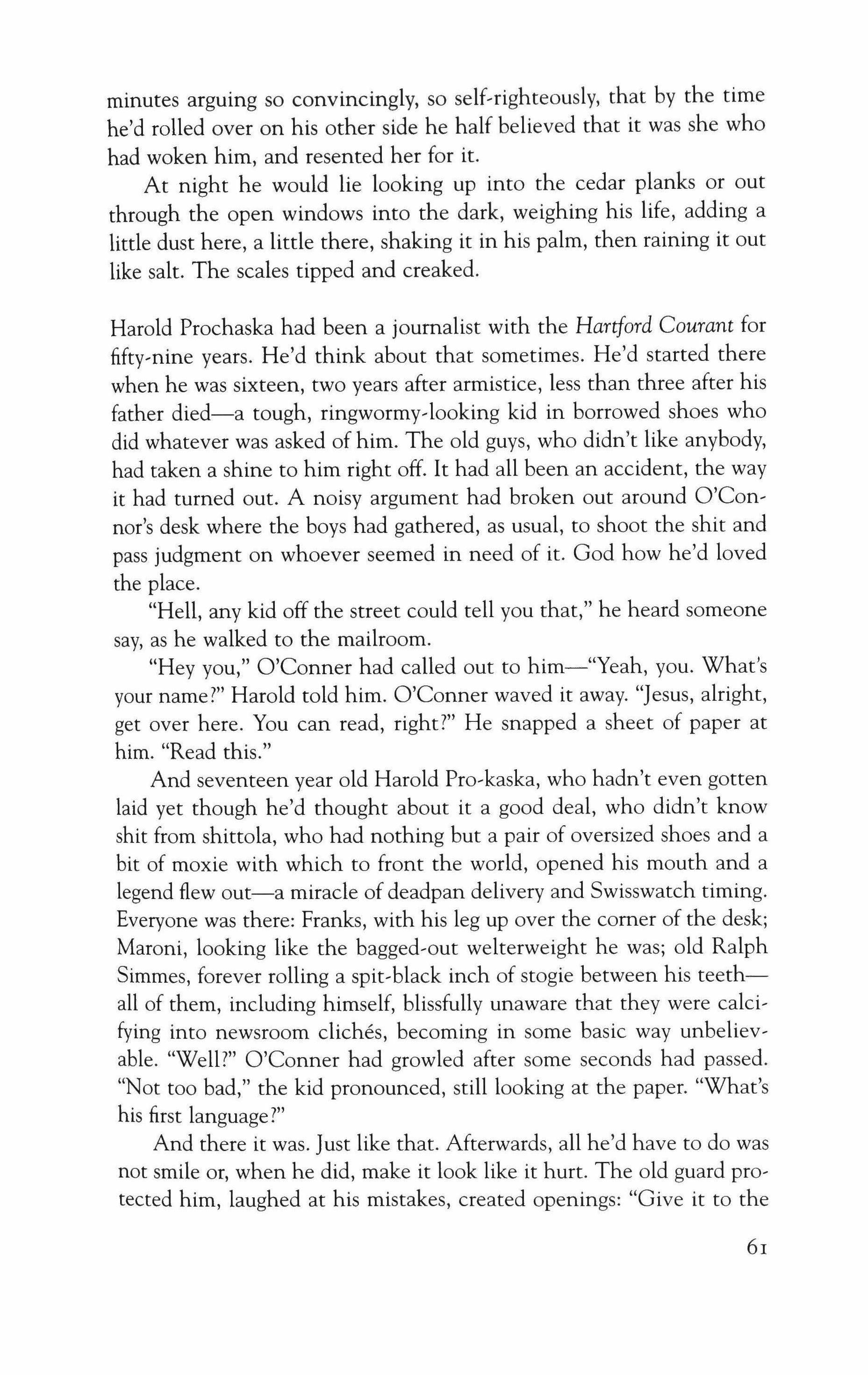
minutes arguing so convincingly, so self-righteously, that by the time he'd rolled over on his other side he half believed that it was she who had woken him, and resented her for it.
At night he would lie looking up into the cedar planks or out through the open windows into the dark, weighing his life, adding a little dust here, a little there, shaking it in his palm, then raining it out like salt. The scales tipped and creaked.
Harold Prochaska had been a journalist with the Hartford Courant for fifty-nine years. He'd think about that sometimes. He'd started there when he was sixteen, two years after armistice, less than three after his father died-a tough, ringworrny-looking kid in borrowed shoes who did whatever was asked of him. The old guys, who didn't like anybody, had taken a shine to him right off. It had all been an accident, the way it had turned out. A noisy argument had broken out around O'Connor's desk where the boys had gathered, as usual, to shoot the shit and pass judgment on whoever seemed in need of it. God how he'd loved the place.
"Hell, any kid off the street could tell you that," he heard someone say, as he walked to the mailroom.
"Hey you," O'Conner had called out to him-"Yeah, you. What's your name?" Harold told him. O'Conner waved it away. "Jesus, alright, get over here. You can read, right?" He snapped a sheet of paper at him. "Read this."
And seventeen year old Harold Pro-kaska, who hadn't even gotten laid yet though he'd thought about it a good deal, who didn't know shit from shittola, who had nothing but a pair of oversized shoes and a bit of moxie with which to front the world, opened his mouth and a legend flew out-a miracle of deadpan delivery and Swisswatch timing. Everyone was there: Franks, with his leg up over the comer of the desk; Maroni, looking like the bagged-out welterweight he was; old Ralph Simmes, forever rolling a spit-black inch of stogie between his teethall of them, including himself, blissfully unaware that they were calcifying into newsroom cliches, becoming in some basic way unbelievable. "Well?" O'Conner had growled after some seconds had passed. "Not too bad," the kid pronounced, still looking at the paper. "What's his first language?"
And there it was. Just like that. Afterwards, all he'd have to do was not smile or, when he did, make it look like it hurt. The old guard protected him, laughed at his mistakes, created openings: "Give it to the
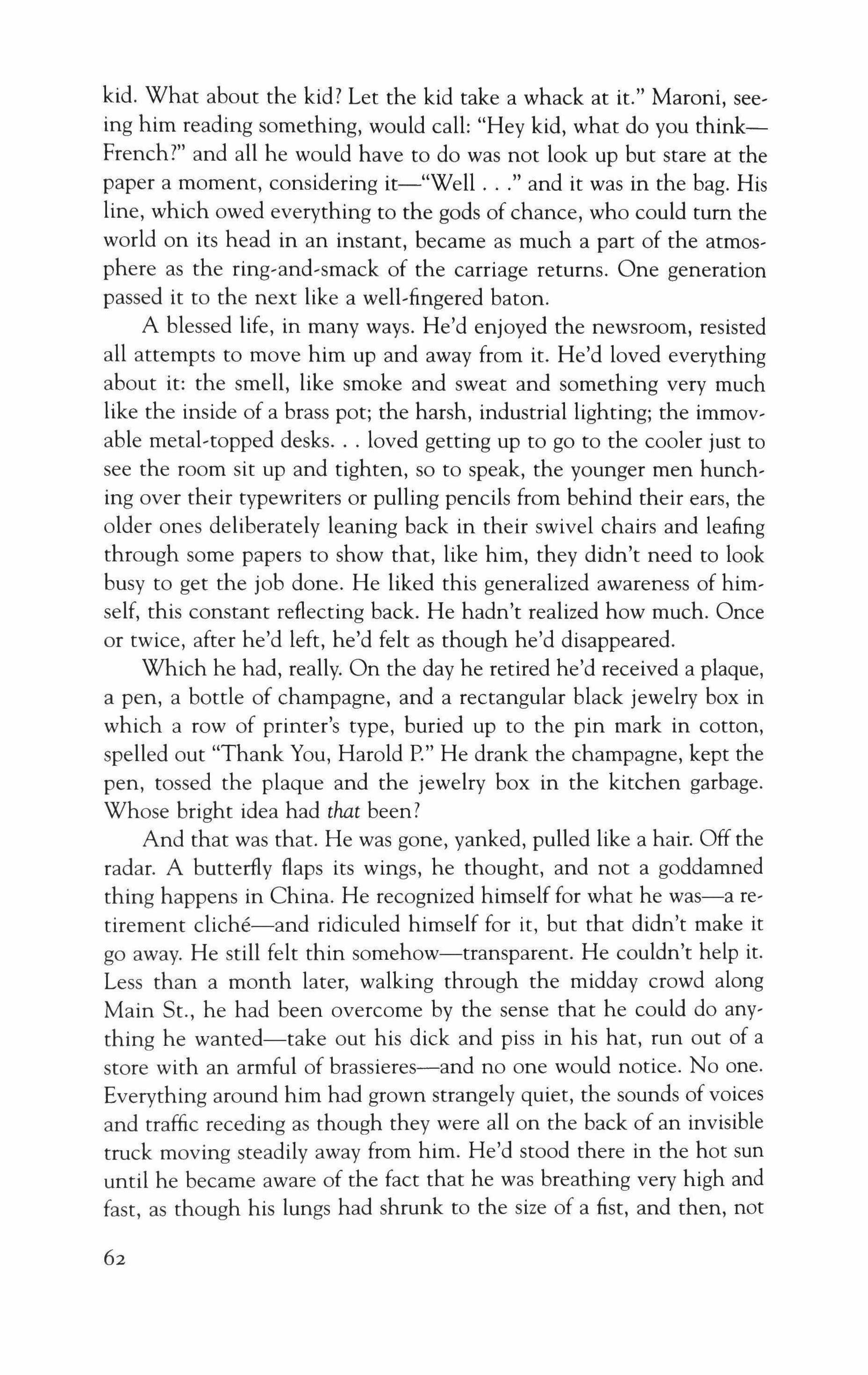
kid. What about the kid? Let the kid take a whack at it." Maroni, see, ing him reading something, would call: "Hey kid, what do you thinkFrench?" and all he would have to do was not look up but stare at the paper a moment, considering it-"Well and it was in the bag. His line, which owed everything to the gods of chance, who could tum the world on its head in an instant, became as much a part of the atmosphere as the ring-and-smack of the carriage returns. One generation passed it to the next like a well-fingered baton.
A blessed life, in many ways. He'd enjoyed the newsroom, resisted all attempts to move him up and away from it. He'd loved everything about it: the smell, like smoke and sweat and something very much like the inside of a brass pot; the harsh, industrial lighting; the immovable metal-topped desks loved getting up to go to the cooler just to see the room sit up and tighten, so to speak, the younger men hunch, ing over their typewriters or pulling pencils from behind their ears, the older ones deliberately leaning back in their swivel chairs and leafing through some papers to show that, like him, they didn't need to look busy to get the job done. He liked this generalized awareness of him, self, this constant reflecting back. He hadn't realized how much. Once or twice, after he'd left, he'd felt as though he'd disappeared.
Which he had, really. On the day he retired he'd received a plaque, a pen, a bottle of champagne, and a rectangular black jewelry box in which a row of printer's type, buried up to the pin mark in cotton, spelled out "Thank You, Harold P." He drank the champagne, kept the pen, tossed the plaque and the jewelry box in the kitchen garbage. Whose bright idea had that been?
And that was that. He was gone, yanked, pulled like a hair. Off the radar. A butterfly flaps its wings, he thought, and not a goddamned thing happens in China. He recognized himself for what he was-a retirement cliche-and ridiculed himself for it, but that didn't make it go away. He still felt thin somehow-transparent. He couldn't help it. Less than a month later, walking through the midday crowd along Main St., he had been overcome by the sense that he could do any' thing he wanted-take out his dick and piss in his hat, run out of a store with an armful of brassieres-and no one would notice. No one. Everything around him had grown strangely quiet, the sounds of voices and traffic receding as though they were all on the back of an invisible truck moving steadily away from him. He'd stood there in the hot sun until he became aware of the fact that he was breathing very high and fast, as though his lungs had shrunk to the size of a fist, and then, not
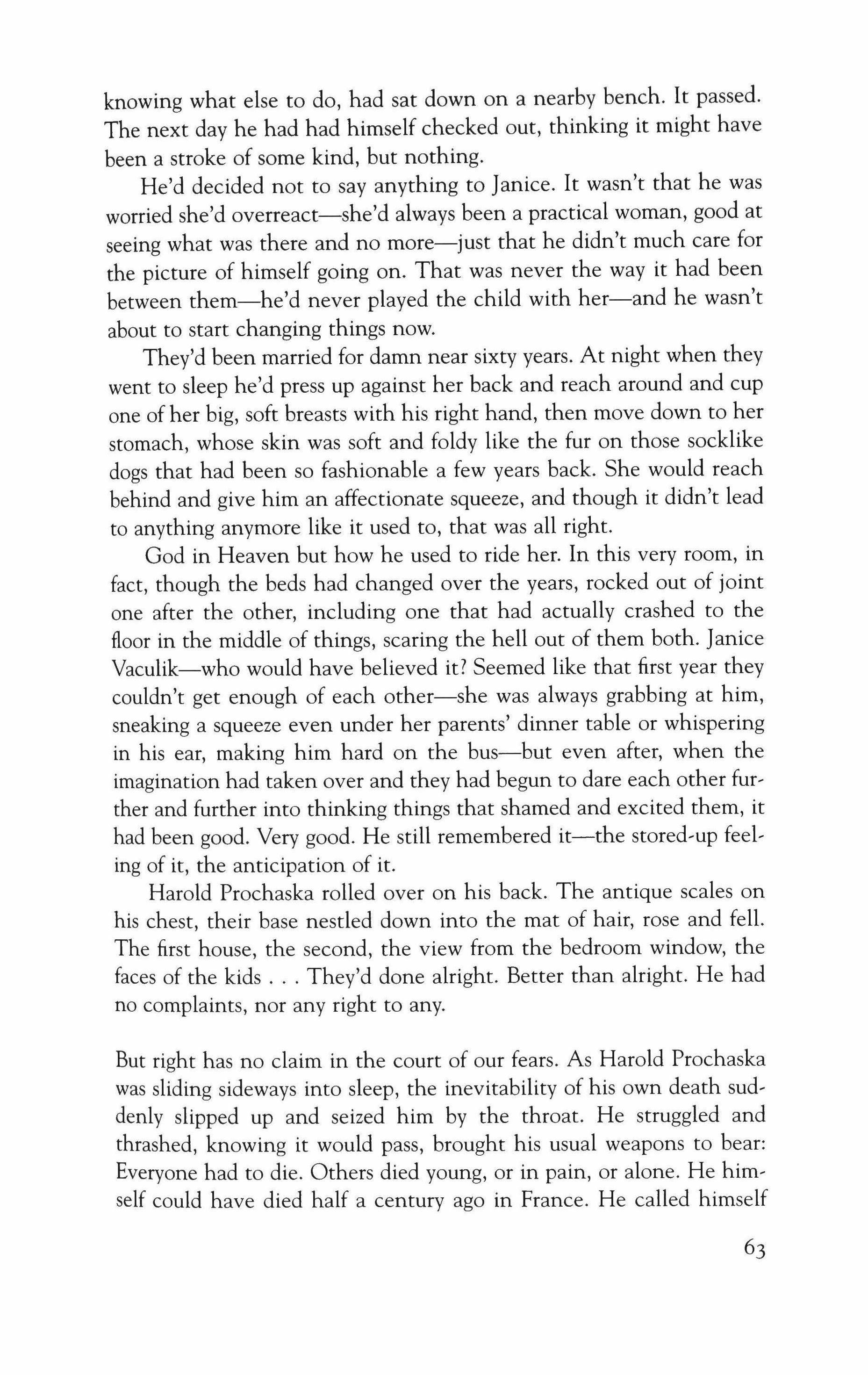
knowing what else to do, had sat down on a nearby bench. It passed. The next day he had had himself checked out, thinking it might have been a stroke of some kind, but nothing.
He'd decided not to say anything to Janice. It wasn't that he was worried she'd overreact-she'd always been a practical woman, good at seeing what was there and no more-just that he didn't much care for the picture of himself going on. That was never the way it had been between them-he'd never played the child with her-and he wasn't about to start changing things now.
They'd been married for damn near sixty years. At night when they went to sleep he'd press up against her back and reach around and cup one of her big, soft breasts with his right hand, then move down to her stomach, whose skin was soft and foldy like the fur on those socklike dogs that had been so fashionable a few years back. She would reach behind and give him an affectionate squeeze, and though it didn't lead to anything anymore like it used to, that was all right.
God in Heaven but how he used to ride her. In this very room, in fact, though the beds had changed over the years, rocked out of joint one after the other, including one that had actually crashed to the floor in the middle of things, scaring the hell out of them both. Janice Vaculik-who would have believed it? Seemed like that first year they couldn't get enough of each other-she was always grabbing at him, sneaking a squeeze even under her parents' dinner table or whispering in his ear, making him hard on the bus-but even after, when the imagination had taken over and they had begun to dare each other further and further into thinking things that shamed and excited them, it had been good. Very good. He still remembered it-the stored-up feeling of it, the anticipation of it.
Harold Prochaska rolled over on his back. The antique scales on his chest, their base nestled down into the mat of hair, rose and fell. The first house, the second, the view from the bedroom window, the faces of the kids They'd done alright. Better than alright. He had no complaints, nor any right to any.
But right has no claim in the court of our fears. As Harold Prochaska was sliding sideways into sleep, the inevitability of his own death suddenly slipped up and seized him by the throat. He struggled and thrashed, knowing it would pass, brought his usual weapons to bear: Everyone had to die. Others died young, or in pain, or alone. He himself could have died half a century ago in France. He called himself
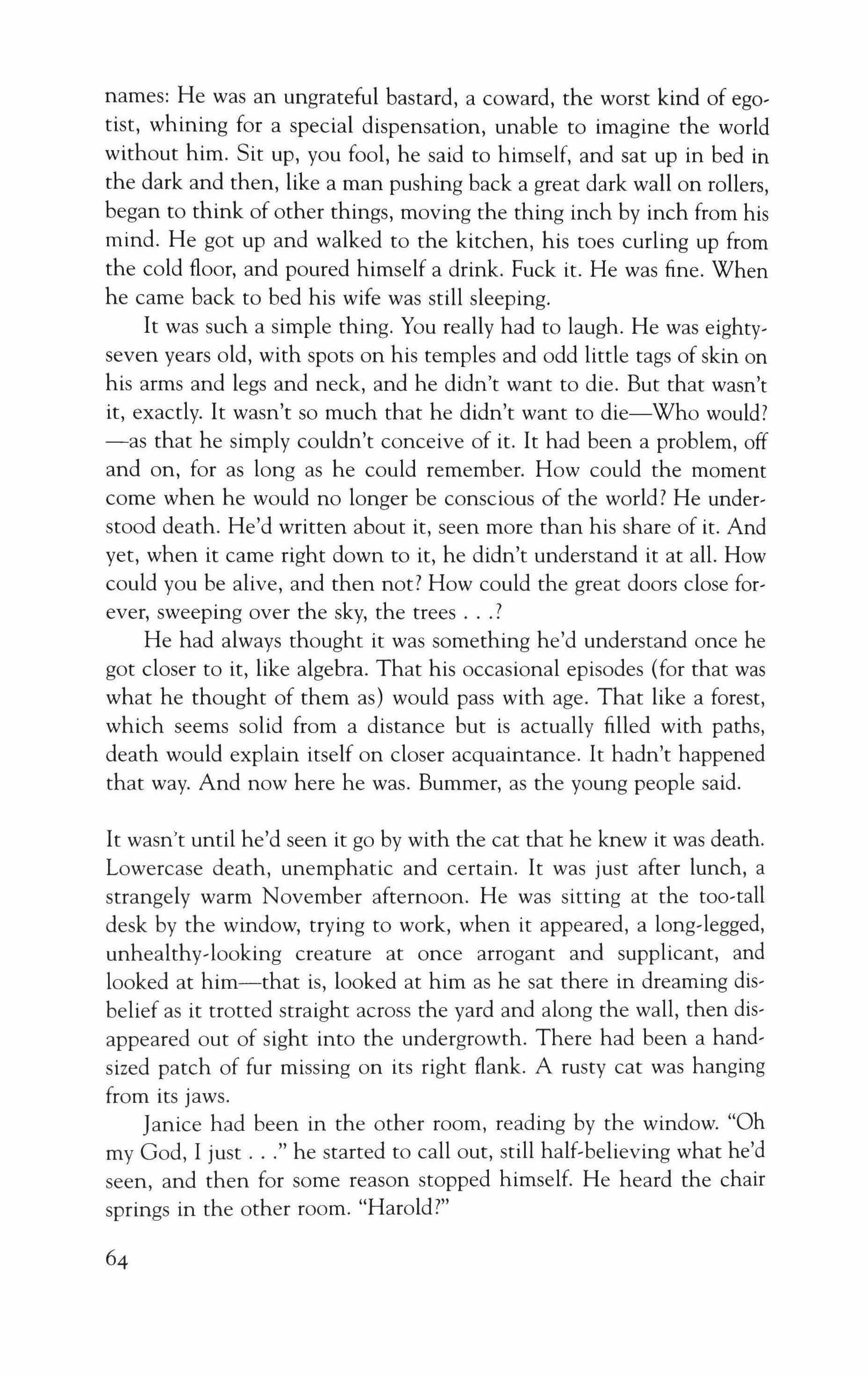
names: He was an ungrateful bastard, a coward, the worst kind of egotist, whining for a special dispensation, unable to imagine the world without him. Sit up, you fool, he said to himself, and sat up in bed in the dark and then, like a man pushing back a great dark wall on rollers, began to think of other things, moving the thing inch by inch from his mind. He got up and walked to the kitchen, his toes curling up from the cold floor, and poured himself a drink. Fuck it. He was fine. When he came back to bed his wife was still sleeping.
It was such a simple thing. You really had to laugh. He was eightyseven years old, with spots on his temples and odd little tags of skin on his arms and legs and neck, and he didn't want to die. But that wasn't it, exactly. It wasn't so much that he didn't want to die-Who would? -as that he simply couldn't conceive of it. It had been a problem, off and on, for as long as he could remember. How could the moment come when he would no longer be conscious of the world? He understood death. He'd written about it, seen more than his share of it. And yet, when it came right down to it, he didn't understand it at all. How could you be alive, and then not? How could the great doors close forever, sweeping over the sky, the trees ?
He had always thought it was something he'd understand once he got closer to it, like algebra. That his occasional episodes (for that was what he thought of them as) would pass with age. That like a forest, which seems solid from a distance but is actually filled with paths, death would explain itself on closer acquaintance. It hadn't happened that way. And now here he was. Bummer, as the young people said.
It wasn't until he'd seen it go by with the cat that he knew it was death. Lowercase death, unemphatic and certain. It was just after lunch, a strangely warm November afternoon. He was sitting at the too-tall desk by the window, trying to work, when it appeared, a long-legged, unhealthy-looking creature at once arrogant and supplicant, and looked at him-that is, looked at him as he sat there in dreaming disbelief as it trotted straight across the yard and along the wall, then disappeared out of sight into the undergrowth. There had been a handsized patch of fur missing on its right flank. A rusty cat was hanging from its jaws.
Janice had been in the other room, reading by the window. "Oh my God, I just " he started to call out, still half-believing what he'd seen, and then for some reason stopped himself. He heard the chair springs in the other room. "Harold?"
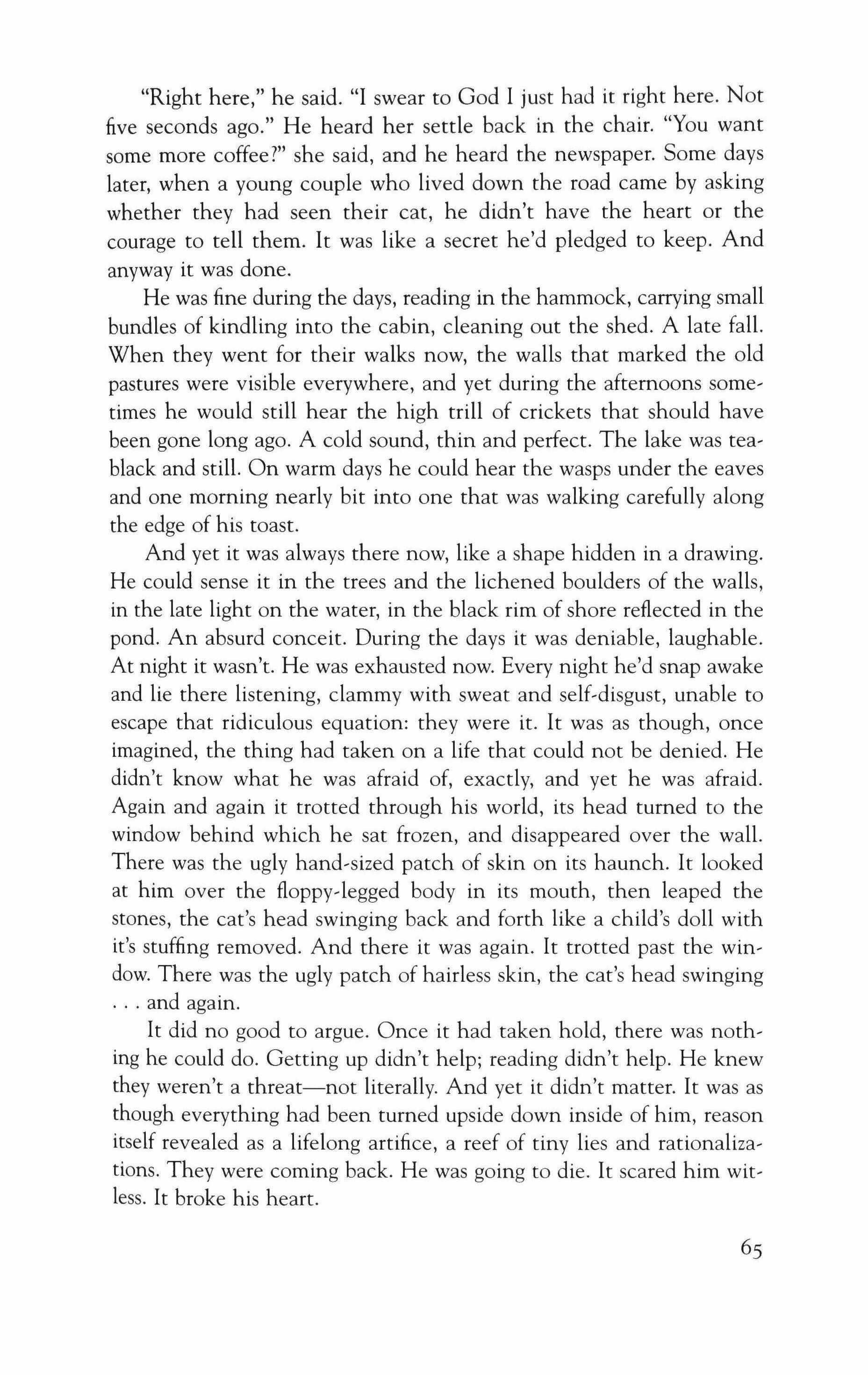
"Right here," he said. "I swear to God I just had it right here. Not five seconds ago." He heard her settle back in the chair. "You want some more coffee?" she said, and he heard the newspaper. Some days later, when a young couple who lived down the road came by asking whether they had seen their cat, he didn't have the heart or the courage to tell them. It was like a secret he'd pledged to keep. And anyway it was done.
He was fine during the days, reading in the hammock, carrying small bundles of kindling into the cabin, cleaning out the shed. A late fall. When they went for their walks now, the walls that marked the old pastures were visible everywhere, and yet during the afternoons sometimes he would still hear the high trill of crickets that should have been gone long ago. A cold sound, thin and perfect. The lake was teablack and still. On warm days he could hear the wasps under the eaves and one morning nearly bit into one that was walking carefully along the edge of his toast.
And yet it was always there now, like a shape hidden in a drawing. He could sense it in the trees and the lichened boulders of the walls, in the late light on the water, in the black rim of shore reflected in the pond. An absurd conceit. During the days it was deniable, laughable. At night it wasn't. He was exhausted now. Every night he'd snap awake and lie there listening, clammy with sweat and self-disgust, unable to escape that ridiculous equation: they were it. It was as though, once imagined, the thing had taken on a life that could not be denied. He didn't know what he was afraid of, exactly, and yet he was afraid. Again and again it trotted through his world, its head turned to the window behind which he sat frozen, and disappeared over the wall. There was the ugly hand-sized patch of skin on its haunch. It looked at him over the floppy-legged body in its mouth, then leaped the stones, the eat's head swinging back and forth like a child's doll with it's stuffing removed. And there it was again. It trotted past the window. There was the ugly patch of hairless skin, the eat's head swinging and again.
It did no good to argue. Once it had taken hold, there was nothing he could do. Getting up didn't help; reading didn't help. He knew they weren't a threat-not literally. And yet it didn't matter. It was as though everything had been turned upside down inside of him, reason itself revealed as a lifelong artifice, a reef of tiny lies and rationalizations. They were coming back. He was going to die. It scared him witless. It broke his heart.
65
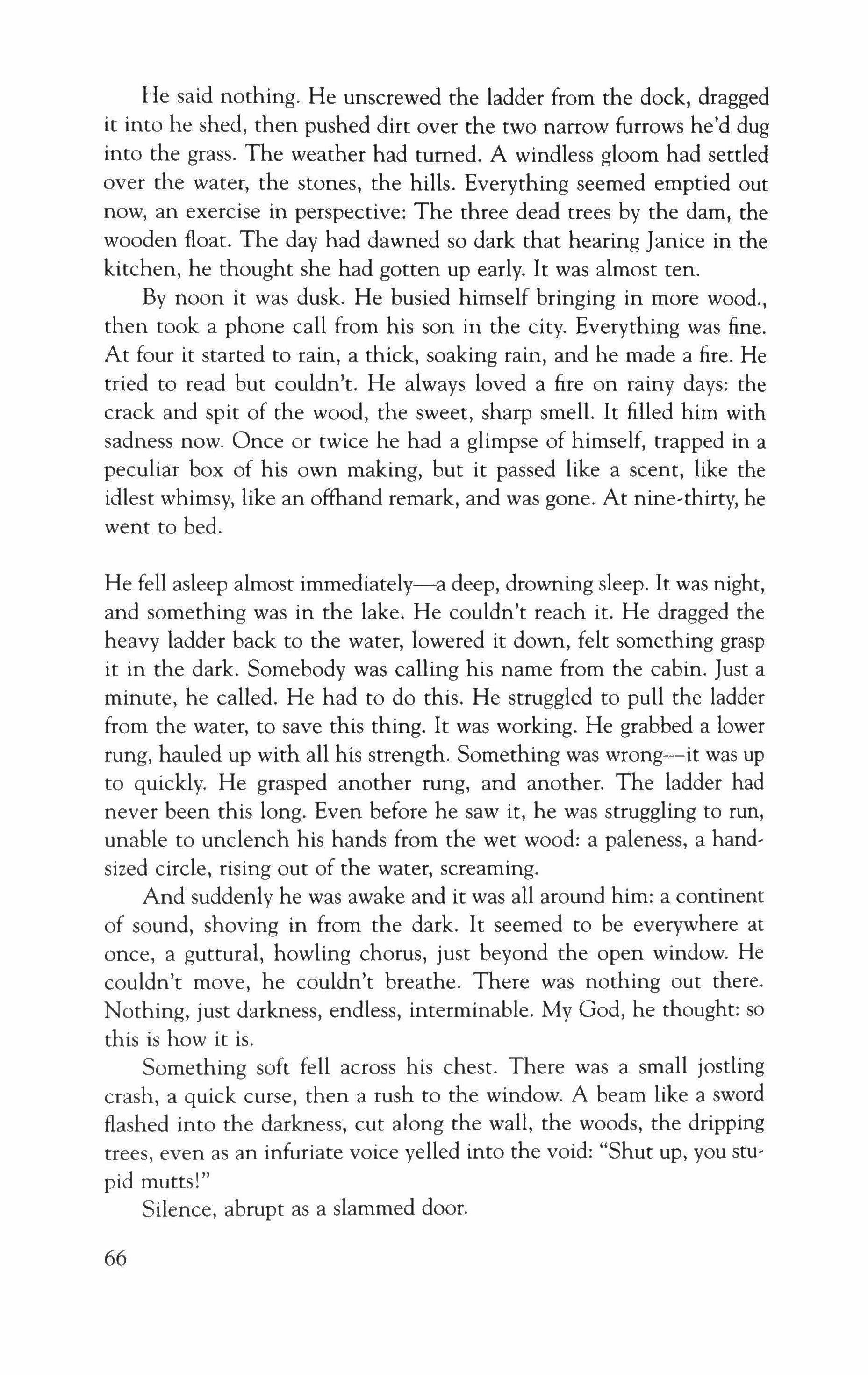
He said nothing. He unscrewed the ladder from the dock, dragged it into he shed, then pushed dirt over the two narrow furrows he'd dug into the grass. The weather had turned. A windless gloom had settled over the water, the stones, the hills. Everything seemed emptied out now, an exercise in perspective: The three dead trees by the dam, the wooden float. The day had dawned so dark that hearing Janice in the kitchen, he thought she had gotten up early. It was almost ten.
By noon it was dusk. He busied himself bringing in more wood., then took a phone call from his son in the city. Everything was fine. At four it started to rain, a thick, soaking rain, and he made a fire. He tried to read but couldn't. He always loved a fire on rainy days: the crack and spit of the wood, the sweet, sharp smell. It filled him with sadness now. Once or twice he had a glimpse of himself, trapped in a peculiar box of his own making, but it passed like a scent, like the idlest whimsy, like an offhand remark, and was gone. At nine-thirty, he went to bed.
He fell asleep almost immediately-a deep, drowning sleep. It was night, and something was in the lake. He couldn't reach it. He dragged the heavy ladder back to the water, lowered it down, felt something grasp it in the dark. Somebody was calling his name from the cabin. Just a minute, he called. He had to do this. He struggled to pull the ladder from the water, to save this thing. It was working. He grabbed a lower rung, hauled up with all his strength. Something was wrong-it was up to quickly. He grasped another rung, and another. The ladder had never been this long. Even before he saw it, he was struggling to run, unable to unclench his hands from the wet wood: a paleness, a handsized circle, rising out of the water, screaming. And suddenly he was awake and it was all around him: a continent of sound, shoving in from the dark. It seemed to be everywhere at once, a guttural, howling chorus, just beyond the open window. He couldn't move, he couldn't breathe. There was nothing out there. Nothing, just darkness, endless, interminable. My God, he thought: so this is how it is.
Something soft fell across his chest. There was a small jostling crash, a quick curse, then a rush to the window. A beam like a sword flashed into the darkness, cut along the wall, the woods, the dripping trees, even as an infuriate voice yelled into the void: "Shut up, you stupid mutts!"
Silence, abrupt as a slammed door.
66
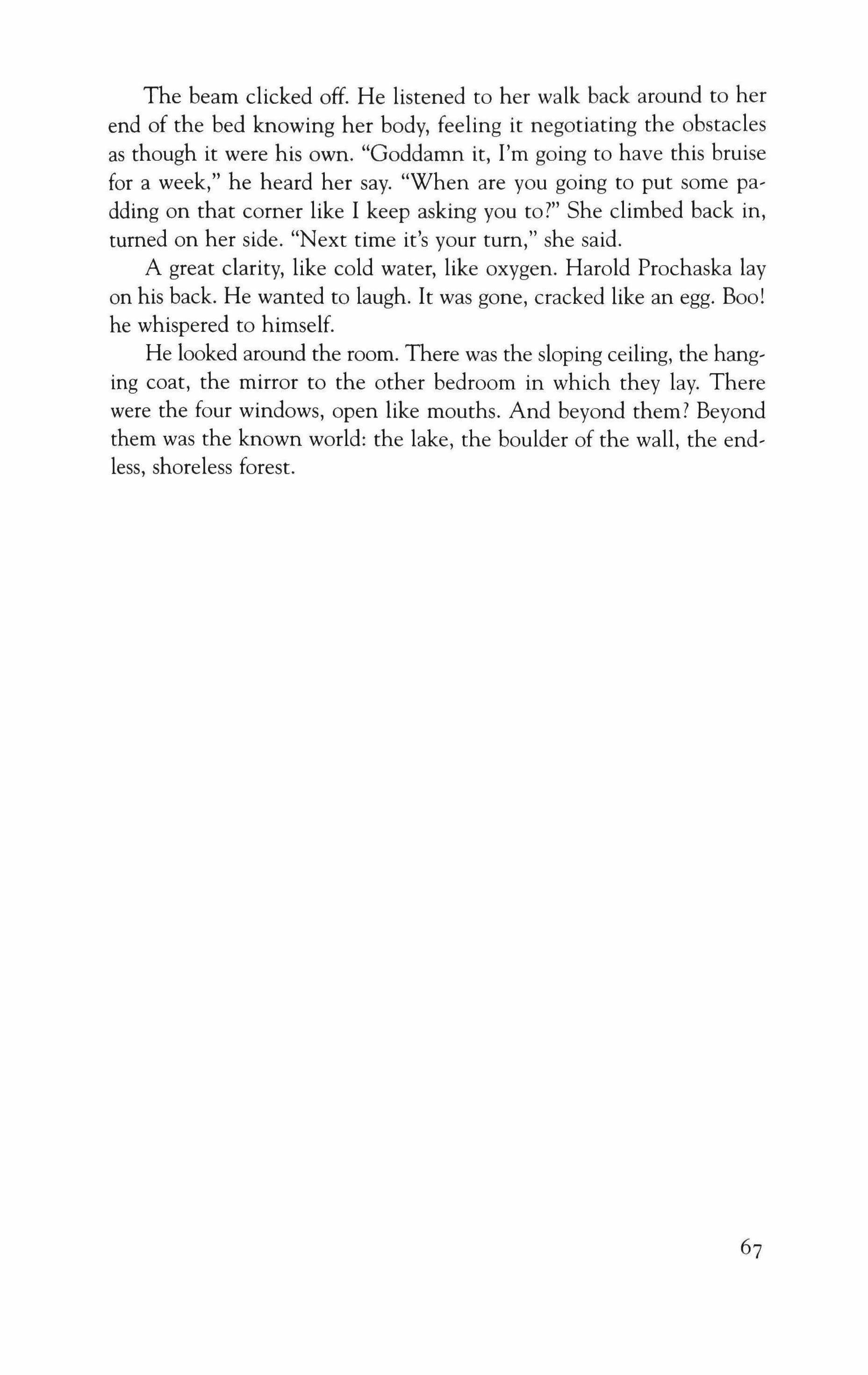
The beam clicked off. He listened to her walk back around to her end of the bed knowing her body, feeling it negotiating the obstacles as though it were his own. "Goddamn it, I'm going to have this bruise for a week," he heard her say. "When are you going to put some padding on that comer like I keep asking you to?" She climbed back in, turned on her side. "Next time it's your tum," she said.
A great clarity, like cold water, like oxygen. Harold Prochaska lay on his back. He wanted to laugh. It was gone, cracked like an egg. Boo! he whispered to himself.
He looked around the room. There was the sloping ceiling, the hanging coat, the mirror to the other bedroom in which they lay. There were the four windows, open like mouths. And beyond them? Beyond them was the known world: the lake, the boulder of the wall, the endless, shoreless forest.
Louise Mathias
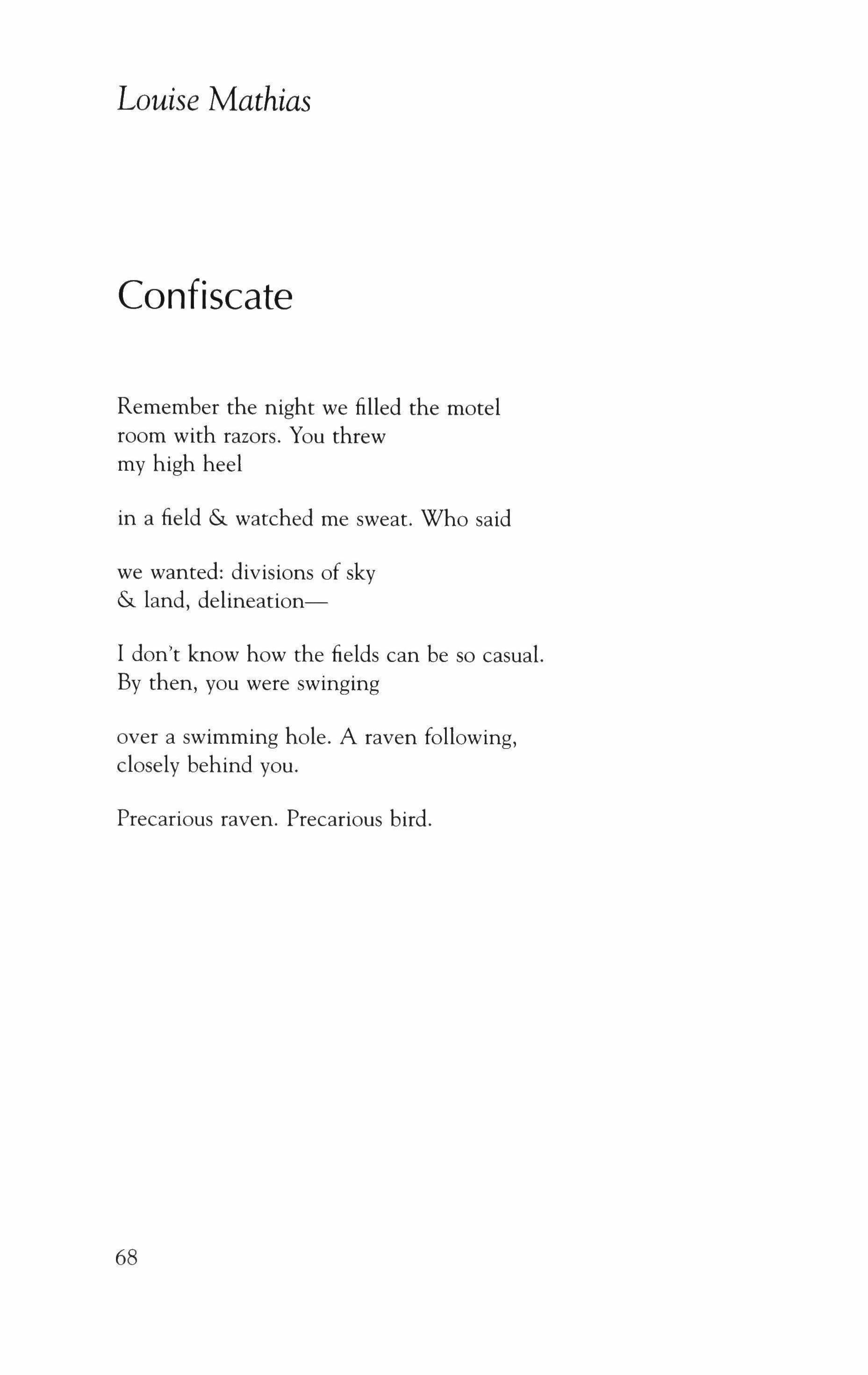
Confiscate
Remember the night we filled the motel room with razors. You threw my high heel in a field & watched me sweat. Who said we wanted: divisions of sky & land, delineation-
I don't know how the fields can be so casual. By then, you were swinging over a swimming hole. A raven following, closely behind you.
Precarious raven. Precarious bird.
68
Snuff
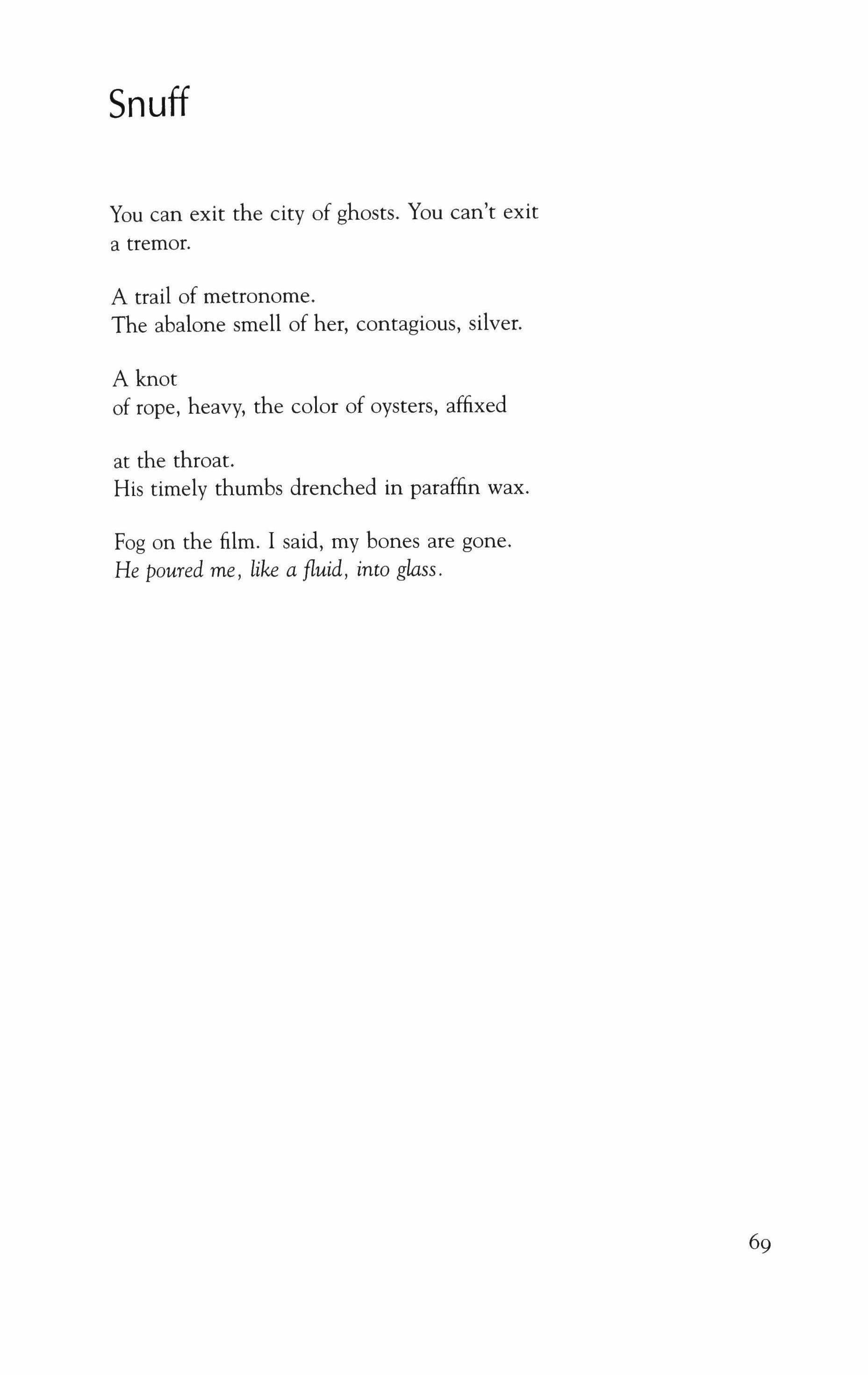
You can exit the city of ghosts. You can't exit a tremor.
A trail of metronome. The abalone smell of her, contagious, silver.
A knot of rope, heavy, the color of oysters, affixed at the throat. His timely thumbs drenched in paraffin wax.
Fog on the film. I said, my bones are gone. He poured me, like a fluid, into glass.
Carl Phillips
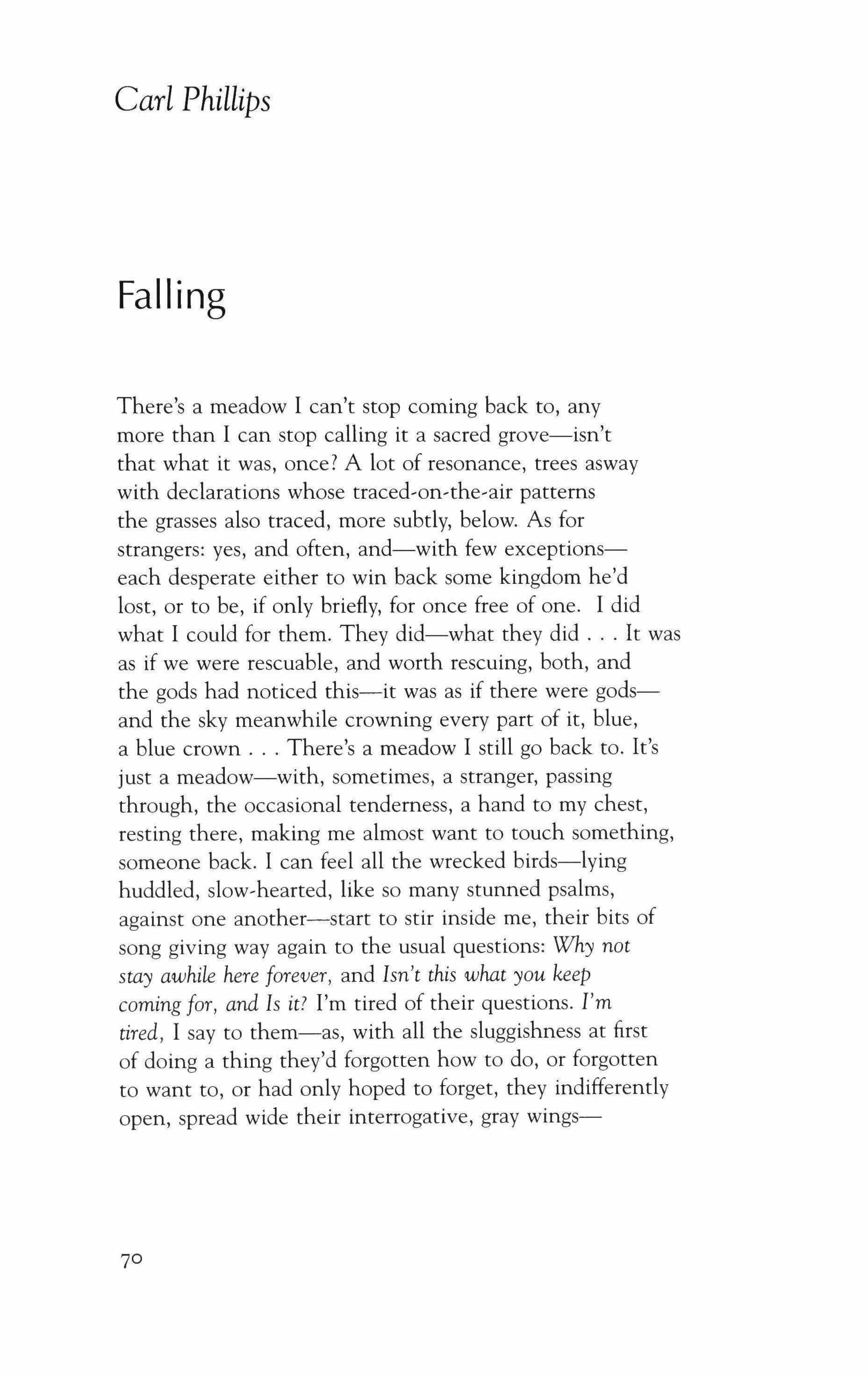
Falling
There's a meadow I can't stop coming back to, any more than I can stop calling it a sacred grove-isn't that what it was, once? A lot of resonance, trees asway with declarations whose traced-on-the-air patterns the grasses also traced, more subtly, below. As for strangers: yes, and often, and-with few exceptionseach desperate either to win back some kingdom he'd lost, or to be, if only briefly, for once free of one. I did what I could for them. They did-what they did It was as if we were rescuable, and worth rescuing, both, and the gods had noticed this-it was as if there were godsand the sky meanwhile crowning every part of it, blue, a blue crown There's a meadow I still go back to. It's just a meadow-with, sometimes, a stranger, passing through, the occasional tenderness, a hand to my chest, resting there, making me almost want to touch something, someone back. I can feel all the wrecked birds-lying huddled, slow-hearted, like so many stunned psalms, against one another-start to stir inside me, their bits of song giving way again to the usual questions: Why not stay awhile here forever, and Isn't this what you keep coming for, and Is it? I'm tired of their questions. I'm tired, I say to them-as, with all the sluggishness at first of doing a thing they'd forgotten how to do, or forgotten to want to, or had only hoped to forget, they indifferently open, spread wide their interrogative, gray wings-
Southern Cross
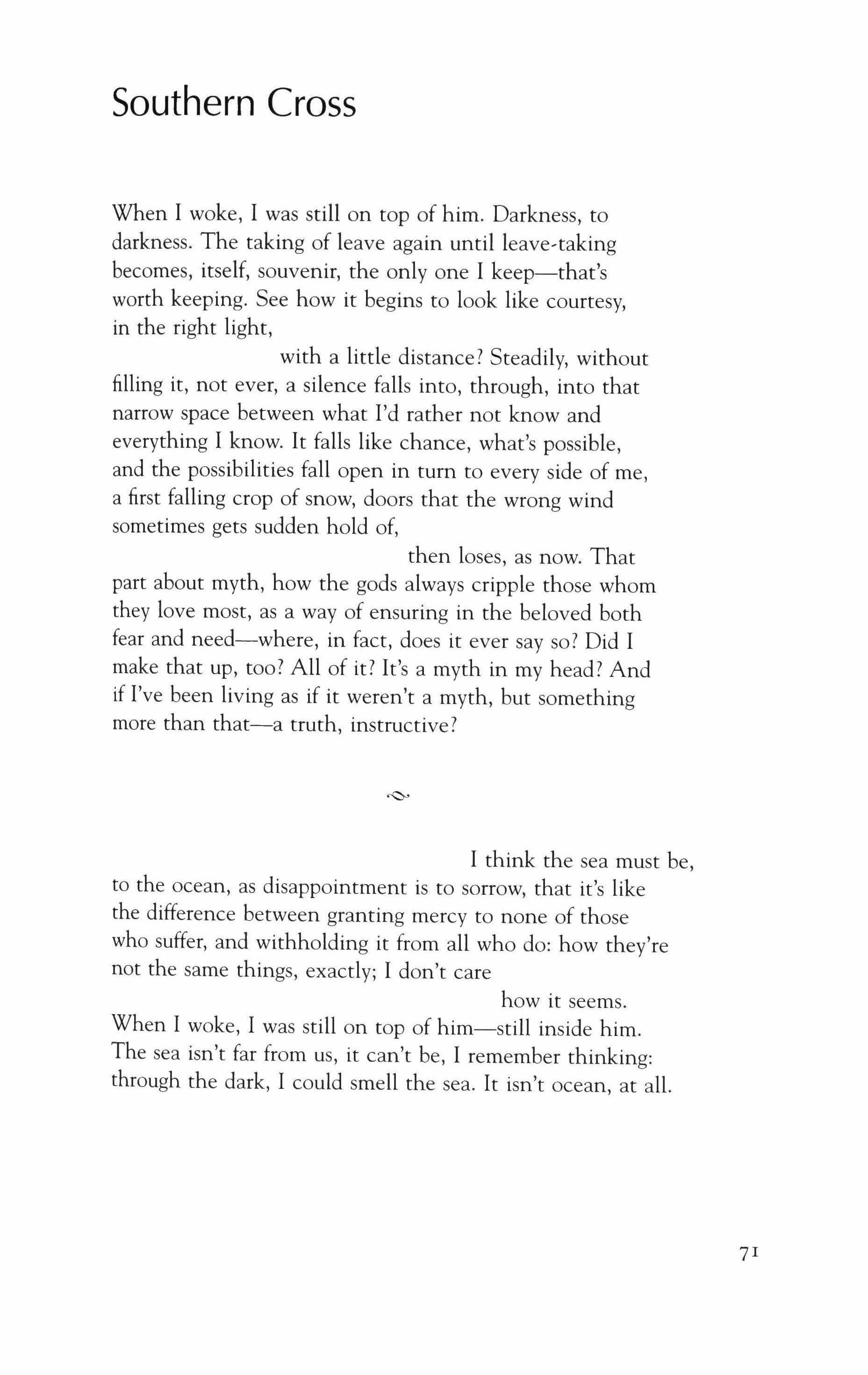
When I woke, I was still on top of him. Darkness, to darkness. The taking of leave again until leave-taking becomes, itself, souvenir, the only one I keep-that's worth keeping. See how it begins to look like courtesy, in the right light, with a little distance? Steadily, without filling it, not ever, a silence falls into, through, into that narrow space between what I'd rather not know and everything I know. It falls like chance, what's possible, and the possibilities fall open in turn to every side of me, a first falling crop of snow, doors that the wrong wind sometimes gets sudden hold of, then loses, as now. That part about myth, how the gods always cripple those whom they love most, as a way of ensuring in the beloved both fear and need-where, in fact, does it ever say so? Did I make that up, too? All of it? It's a myth in my head? And if I've been living as if it weren't a myth, but something more than that-a truth, instructive?
I think the sea must be, to the ocean, as disappointment is to sorrow, that it's like the difference between granting mercy to none of those who suffer, and withholding it from all who do: how they're not the same things, exactly; I don't care how it seems. When I woke, I was still on top of him-still inside him. The sea isn't far from us, it can't be, I remember thinking: through the dark, I could smell the sea. It isn't ocean, at all.
71
Doreen Gildroy
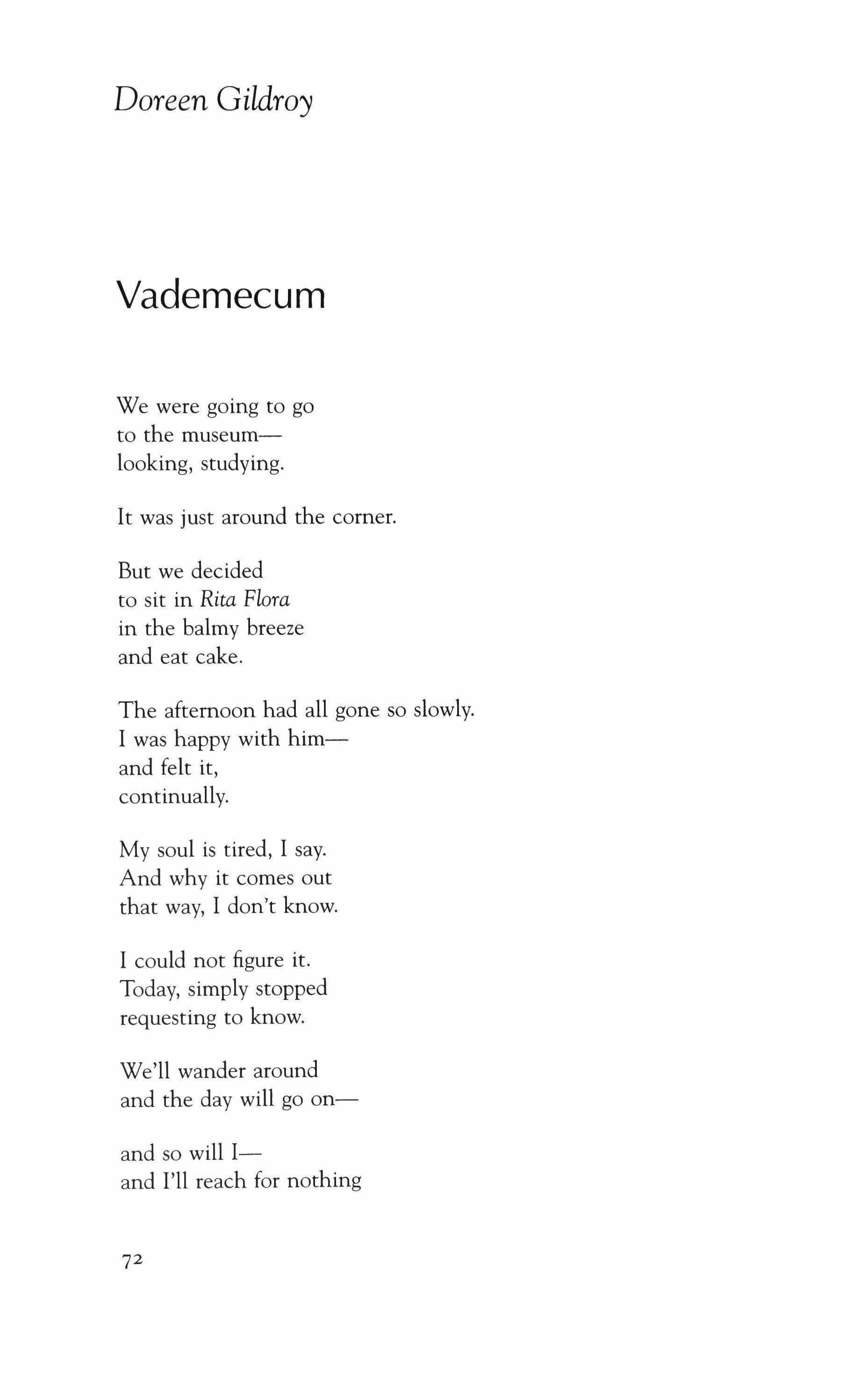
Vademecum
We were going to go to the museumlooking, studying.
Itwas just around the corner.
But we decided to sit in Rita Flora in the balmy breeze and eat cake.
The afternoon had all gone so slowly. I was happy with himand felt it, continually.
My soul is tired, I say. And why it comes out that way, I don't know.
I could not figure it. Today, simply stopped requesting to know.
We'll wander around and the day will go onand so will land I'll reach for nothing

that doesn't touch me, doesn't present itself
inquisitive of me.
73
Visitation
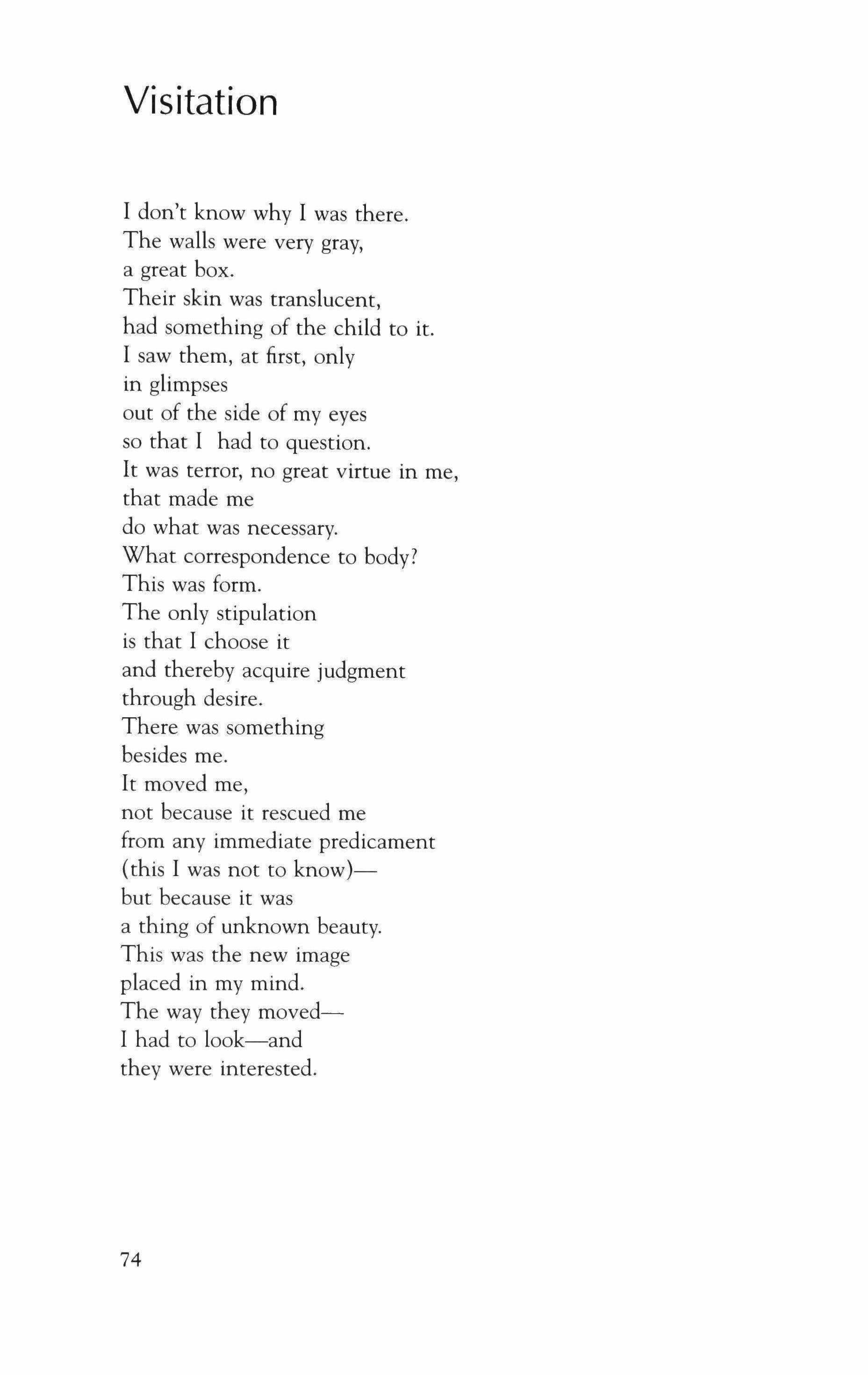
I don't know why I was there. The walls were very gray, a great box. Their skin was translucent, had something of the child to it. I saw them, at first, only in glimpses out of the side of my eyes so that I had to question. It was terror, no great virtue in me, that made me do what was necessary. What correspondence to body? This was form.
The only stipulation is that I choose it and thereby acquire judgment through desire. There was something besides me. It moved me, not because it rescued me from any immediate predicament (this I was not to know)but because it was a thing of unknown beauty. This was the new image placed in my mind. The way they movedI had to look-and they were interested.
74
Visual Binary
Fear was the invisible field that separated them:
The beasts, the elders; the old view of the lovers, the old landscape. Who wouldn't be bewildered?
(The sulphur mud pools )
I was speaking to you and then I understood my myth of childhood.
The bandages covered my face so I couldn't see what was taking place. When the bandages came off my mother gave me all the books I wanted.
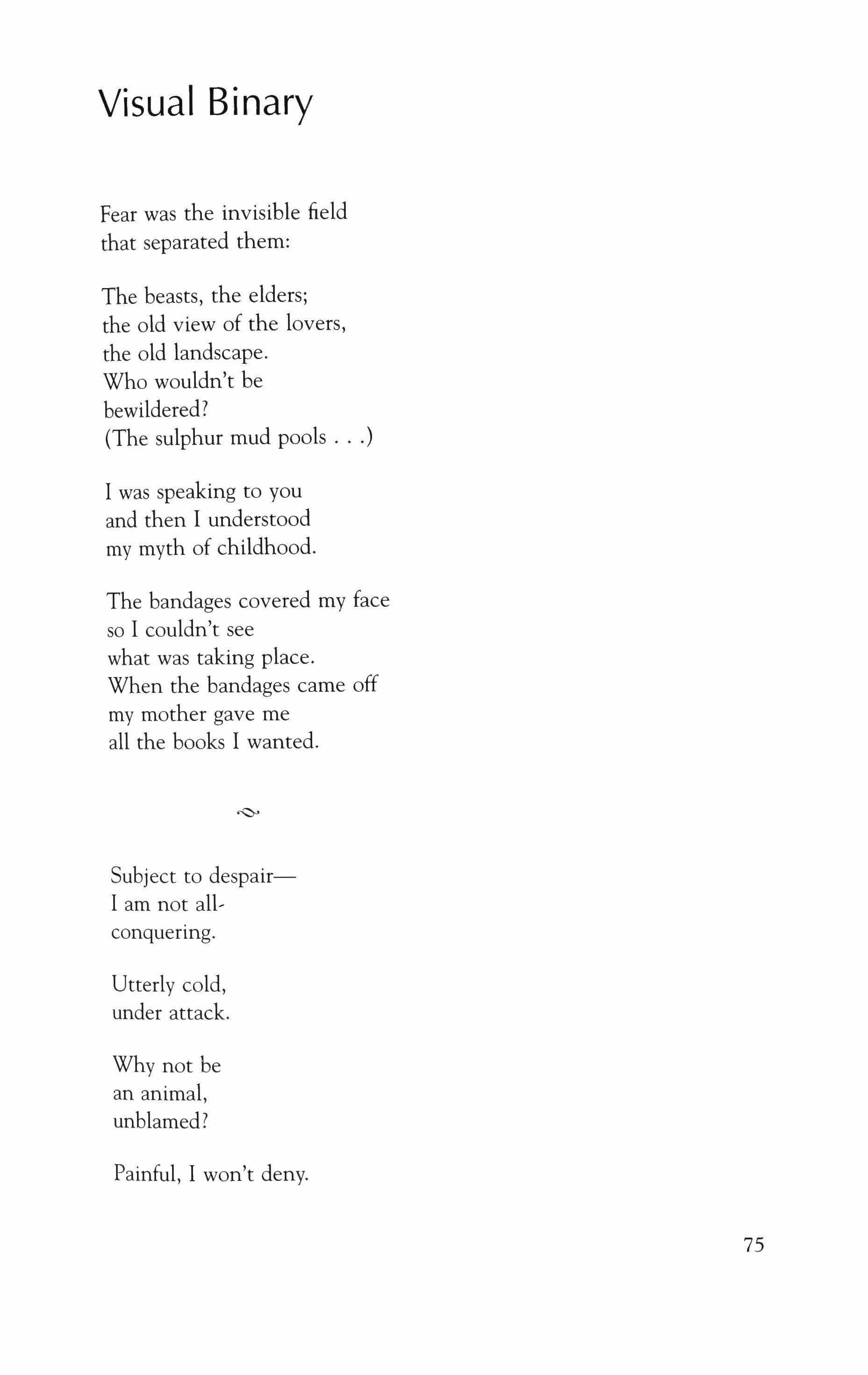
Subject to despairI am not allconquering.
Utterly cold, under attack.
Why not be an animal, unblamed?
Painful, I won't deny.
75
To put the question on, and behave as if: beautiful dress.
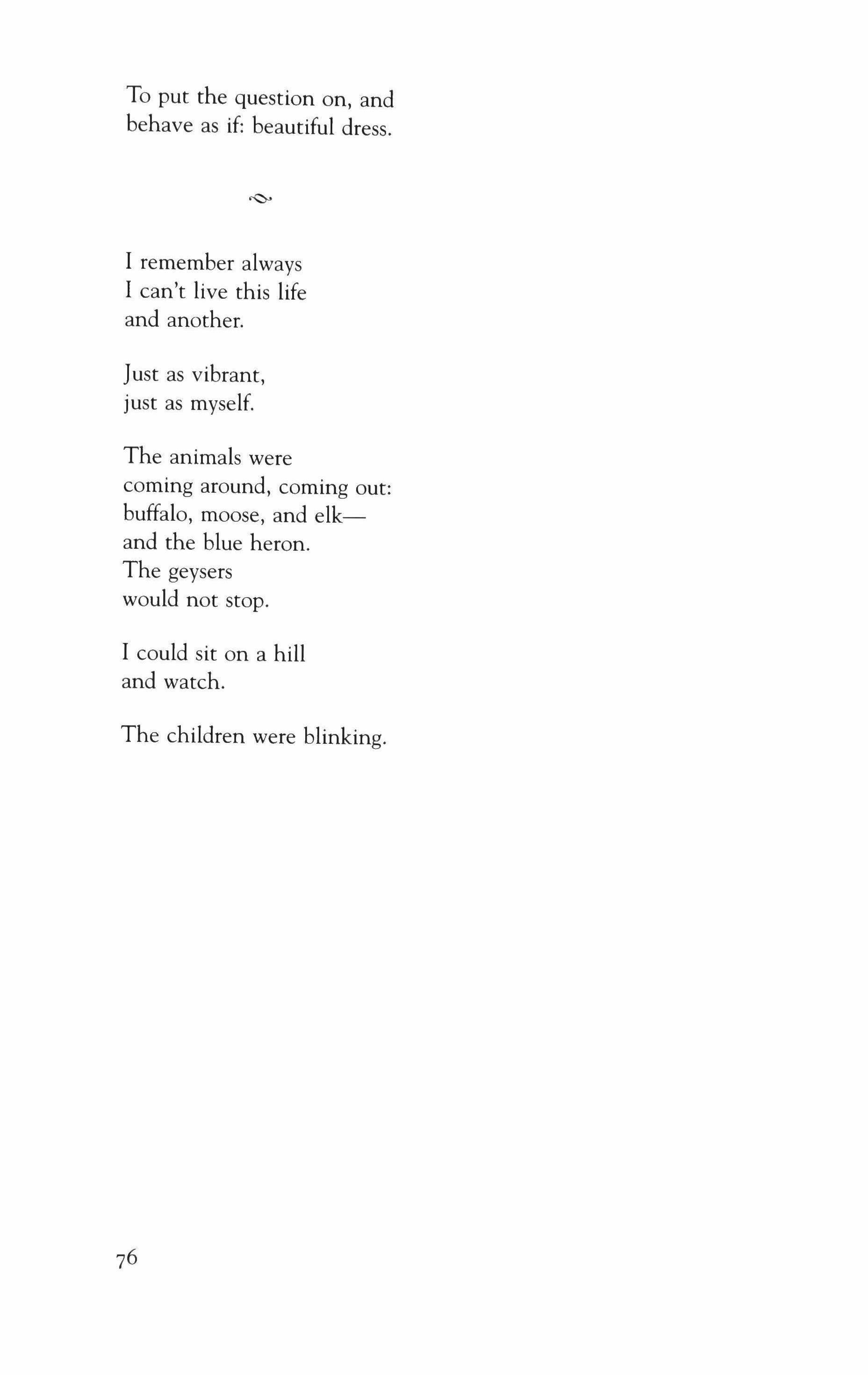
I remember always I can't live this life and another.
Just as vibrant, just as myself.
The animals were coming around, coming out: buffalo, moose, and elkand the blue heron. The geysers would not stop.
I could sit on a hill and watch.
The children were blinking.
Brooks Haxton
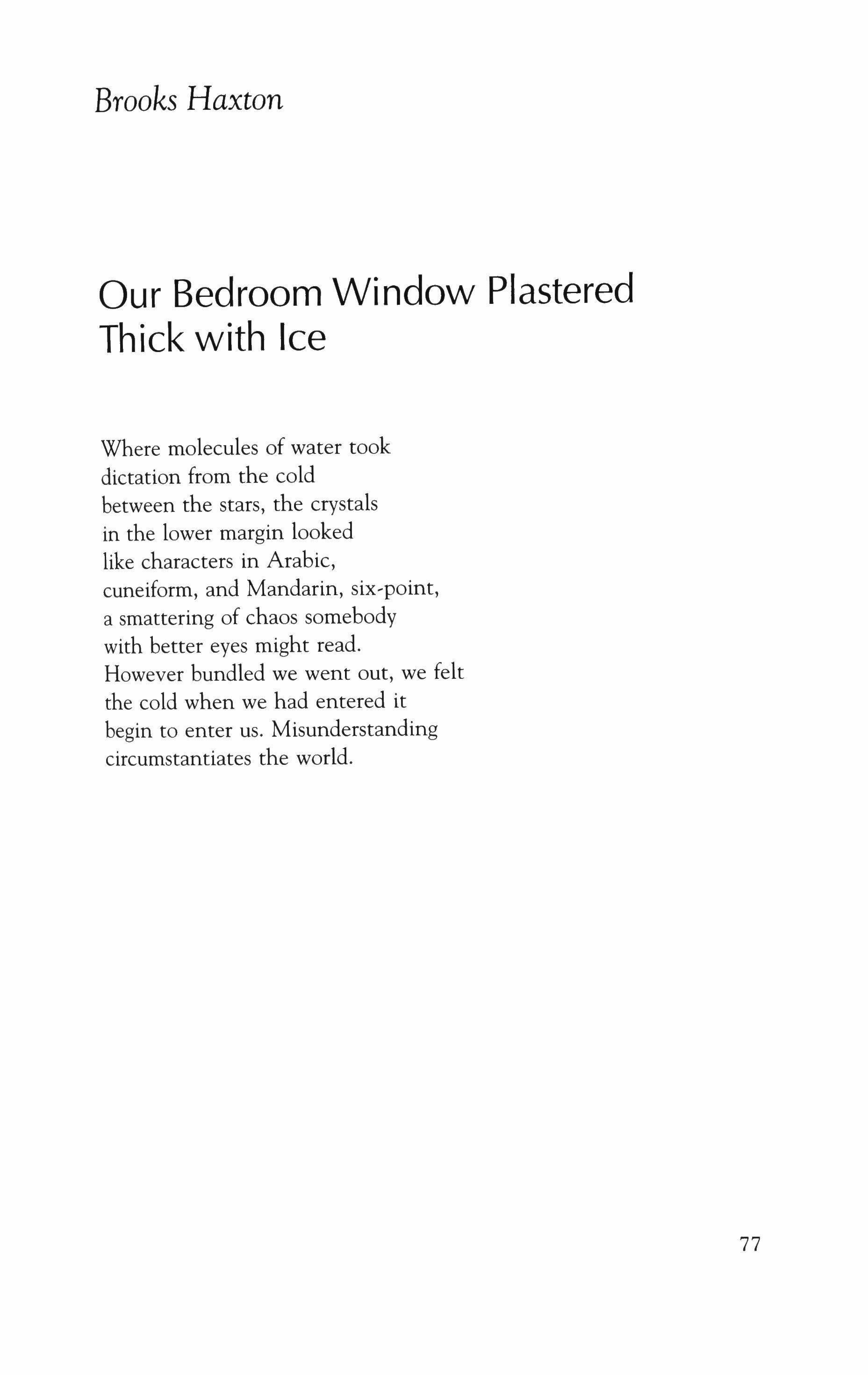
Our Bedroom Window Plastered
Thick with Ice
Where molecules of water took dictation from the cold between the stars, the crystals in the lower margin looked like characters in Arabic, cuneiform, and Mandarin, six-point, a smattering of chaos somebody with better eyes might read. However bundled we went out, we felt the cold when we had entered it begin to enter us. Misunderstanding circumstantiates the world.
77
Anent the Yellow Field, Fa-La
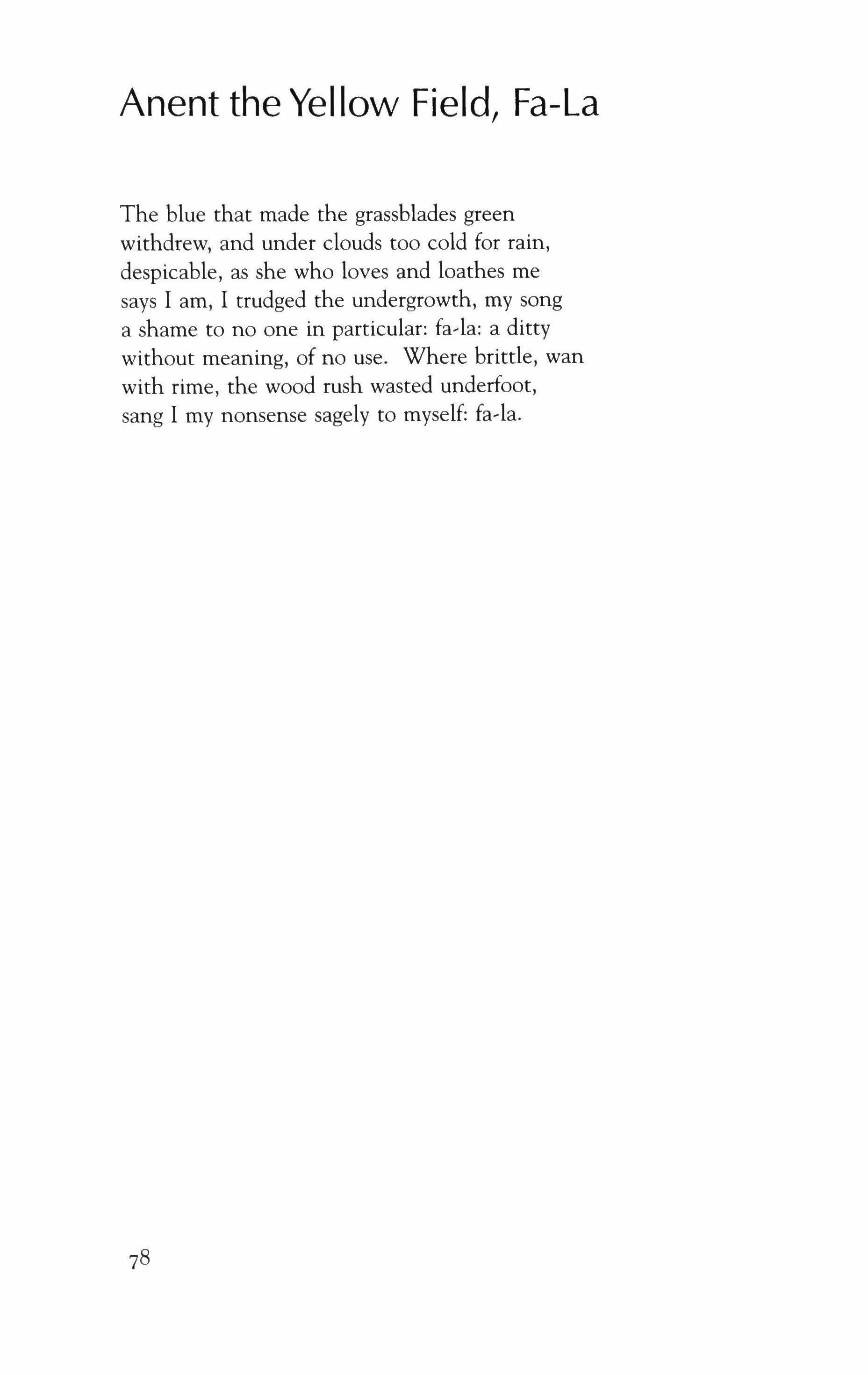
The blue that made the grassblades green withdrew, and under clouds too cold for rain, despicable, as she who loves and loathes me says I am, I trudged the undergrowth, my song a shame to no one in particular: fa-la: a ditty without meaning, of no use. Where brittle, wan with rime, the wood rush wasted underfoot, sang I my nonsense sagely to myself: fa-la.
Shrine at the Wayside
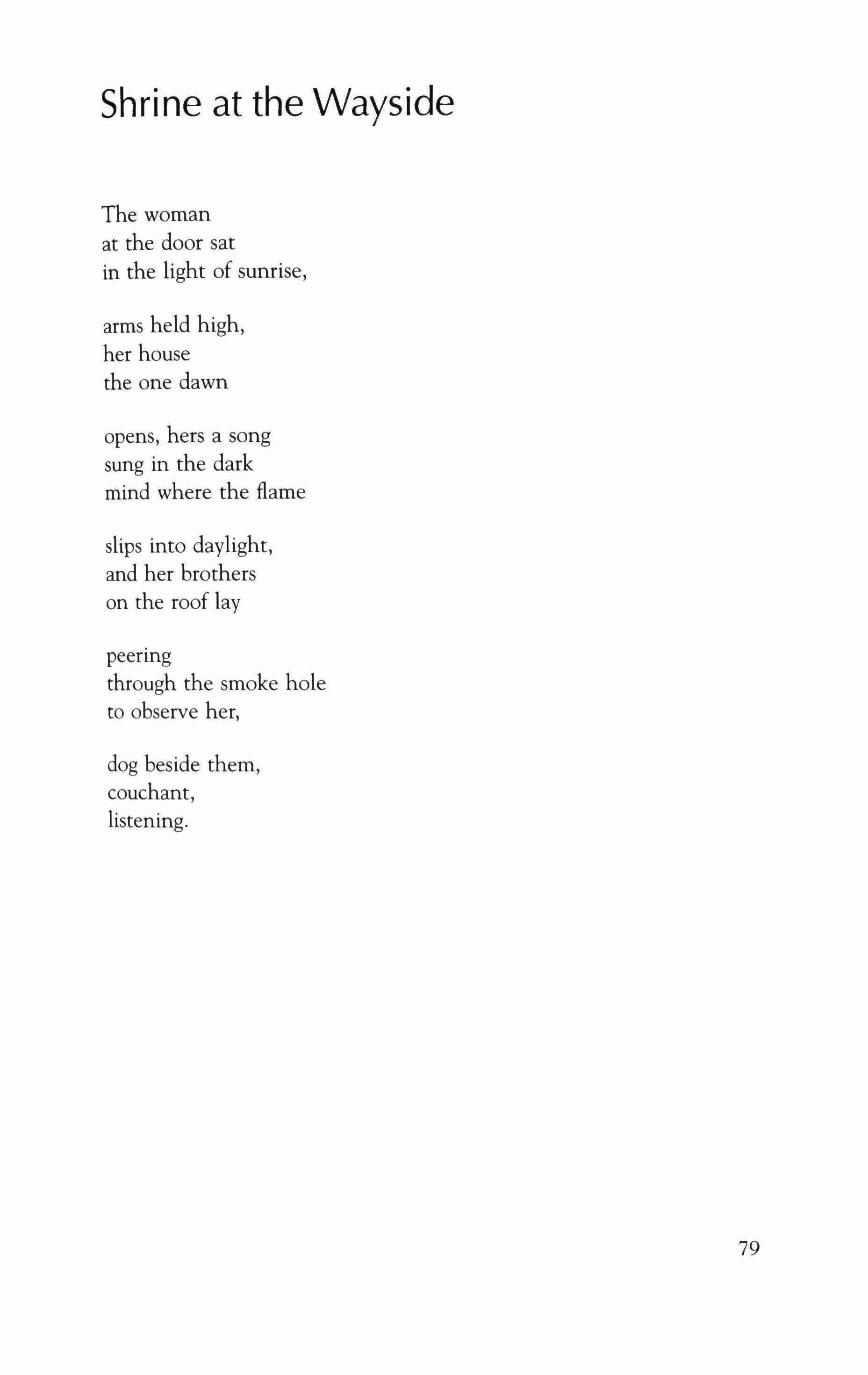
The woman at the door sat in the light of sunrise, arms held high, her house the one dawn opens, hers a song sung in the dark mind where the flame slips into daylight, and her brothers on the roof lay peering through the smoke hole to observe her, dog beside them, couchant, listening.
79
Whereabouts Unknown

Lost under the missile fire and bombs, this small man carved in stone, bare-chested in a skirt of tufted wool, hands folded at the sternum, pleads with him who takes us in his net, the tall god vast as earth, his beard in ropes of braid, wings spread, arising like the lion-headed eagle flanked by stags.
80
Propitiation at the Temple

While thieves brawl in the palaces and fish prowl under the south bridge where they used to feed on scraps, our daughters, whispering to their disfigured goddess, wait.
Heather A. Slomski
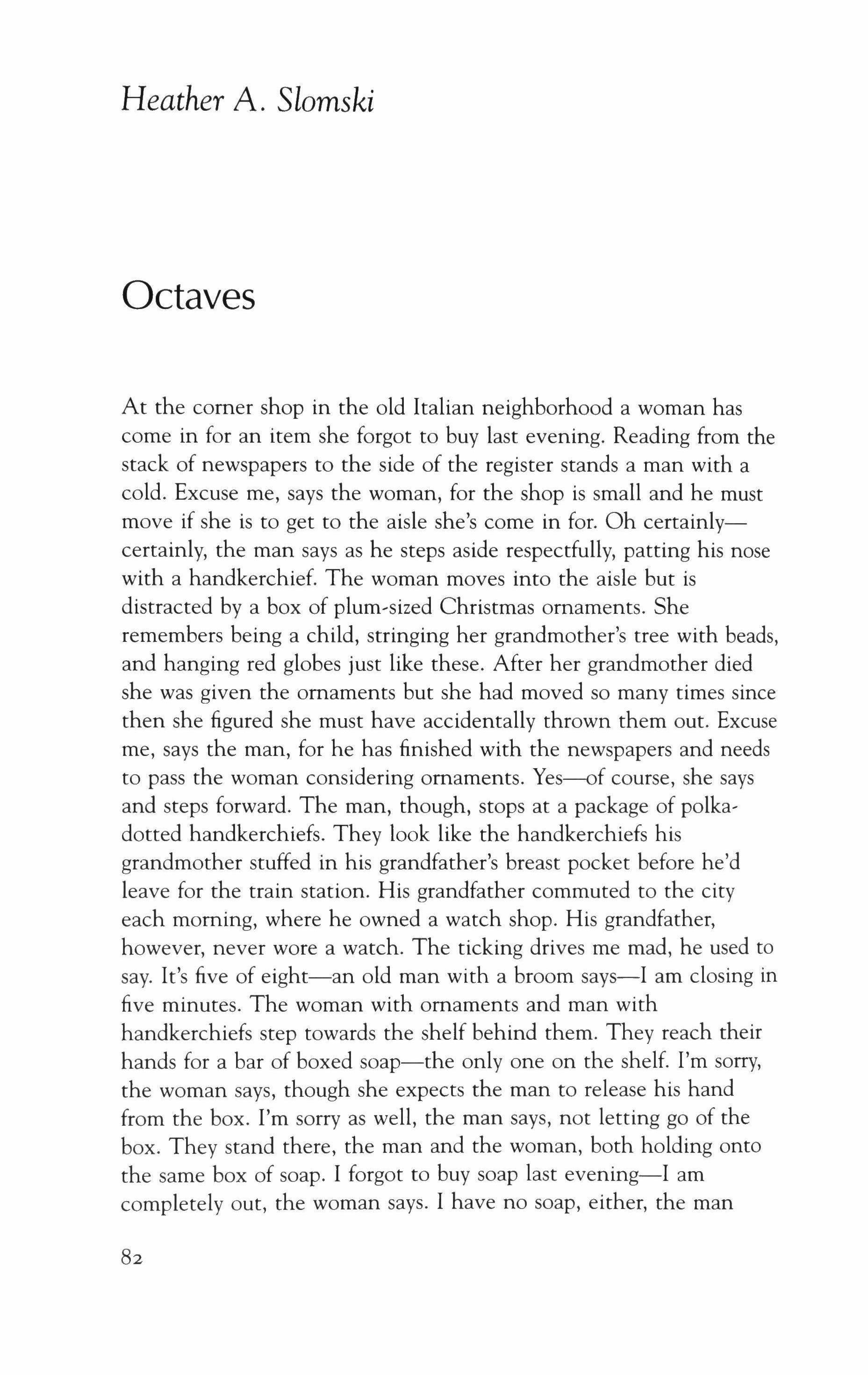
Octaves
At the comer shop in the old Italian neighborhood a woman has come in for an item she forgot to buy last evening. Reading from the stack of newspapers to the side of the register stands a man with a cold. Excuse me, says the woman, for the shop is small and he must move if she is to get to the aisle she's come in for. Oh certainlycertainly, the man says as he steps aside respectfully, patting his nose with a handkerchief. The woman moves into the aisle but is distracted by a box of plum-sized Christmas ornaments. She remembers being a child, stringing her grandmother's tree with beads, and hanging red globes just like these. After her grandmother died she was given the ornaments but she had moved so many times since then she figured she must have accidentally thrown them out. Excuse me, says the man, for he has finished with the newspapers and needs to pass the woman considering ornaments. Yes-of course, she says and steps forward. The man, though, stops at a package of polkadotted handkerchiefs. They look like the handkerchiefs his grandmother stuffed in his grandfather's breast pocket before he'd leave for the train station. His grandfather commuted to the city each morning, where he owned a watch shop. His grandfather, however, never wore a watch. The ticking drives me mad, he used to say. It's five of eight-an old man with a broom says-I am closing in five minutes. The woman with ornaments and man with handkerchiefs step towards the shelf behind them. They reach their hands for a bar of boxed soap-the only one on the shelf. I'm sorry, the woman says, though she expects the man to release his hand from the box. I'm sorry as well, the man says, not letting go of the box. They stand there, the man and the woman, both holding onto the same box of soap. I forgot to buy soap last evening-I am completely out, the woman says. I have no soap, either, the man
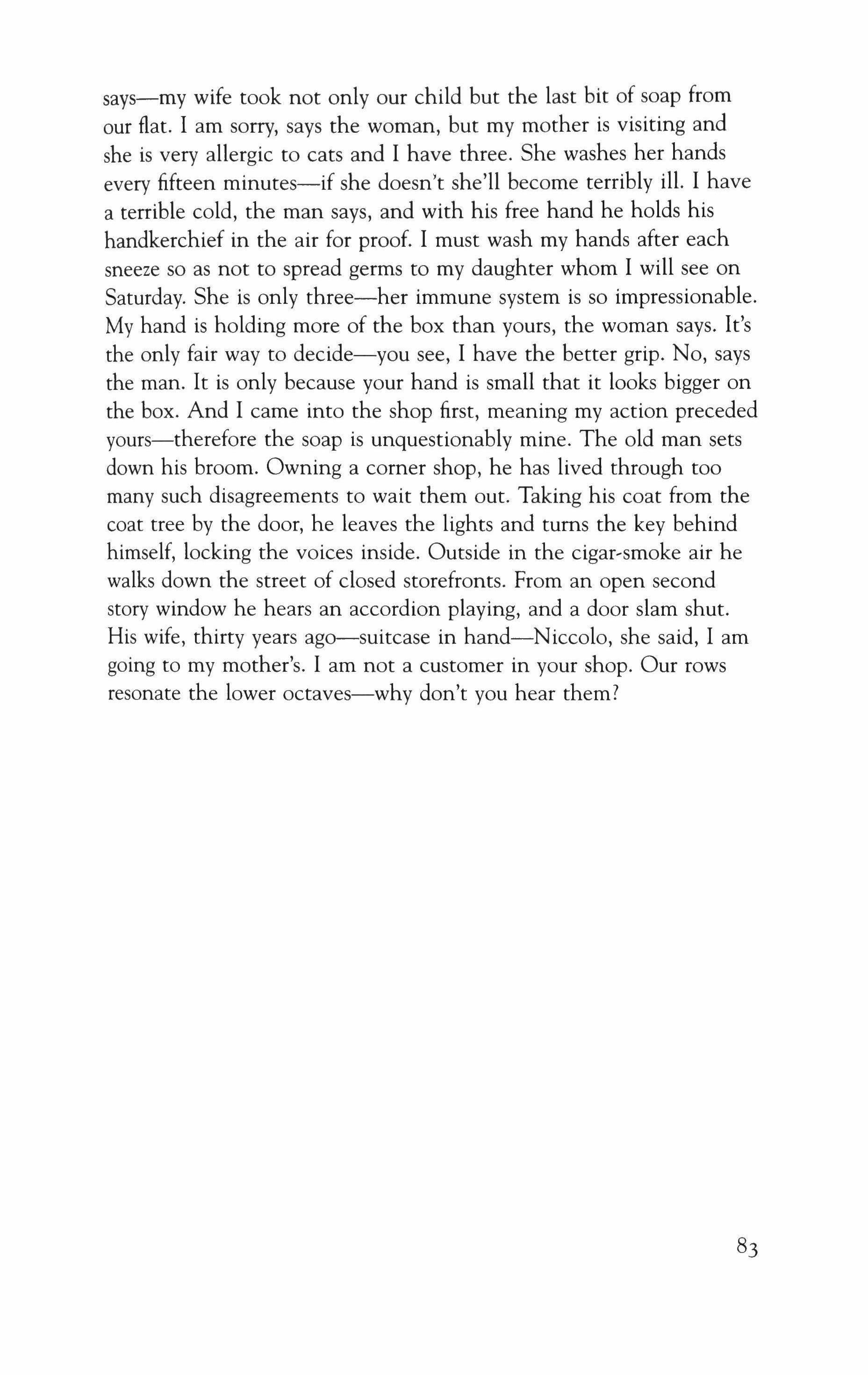
says-my wife took not only our child but the last bit of soap from our flat. I am sorry, says the woman, but my mother is visiting and she is very allergic to cats and I have three. She washes her hands every fifteen minutes-if she doesn't she'll become terribly ill. I have a terrible cold, the man says, and with his free hand he holds his handkerchief in the air for proof. I must wash my hands after each sneeze so as not to spread germs to my daughter whom I will see on Saturday. She is only three-her immune system is so impressionable. My hand is holding more of the box than yours, the woman says. It's the only fair way to decide-you see, I have the better grip. No, says the man. It is only because your hand is small that it looks bigger on the box. And I came into the shop first, meaning my action preceded yours-therefore the soap is unquestionably mine. The old man sets down his broom. Owning a corner shop, he has lived through too many such disagreements to wait them out. Taking his coat from the coat tree by the door, he leaves the lights and turns the key behind himself, locking the voices inside. Outside in the cigar,smoke air he walks down the street of closed storefronts. From an open second story window he hears an accordion playing, and a door slam shut. His wife, thirty years ago-suitcase in hand-Niccolo, she said, I am going to my mother's. I am not a customer in your shop. Our rows resonate the lower octaves-why don't you hear them?
A Seat at the Table
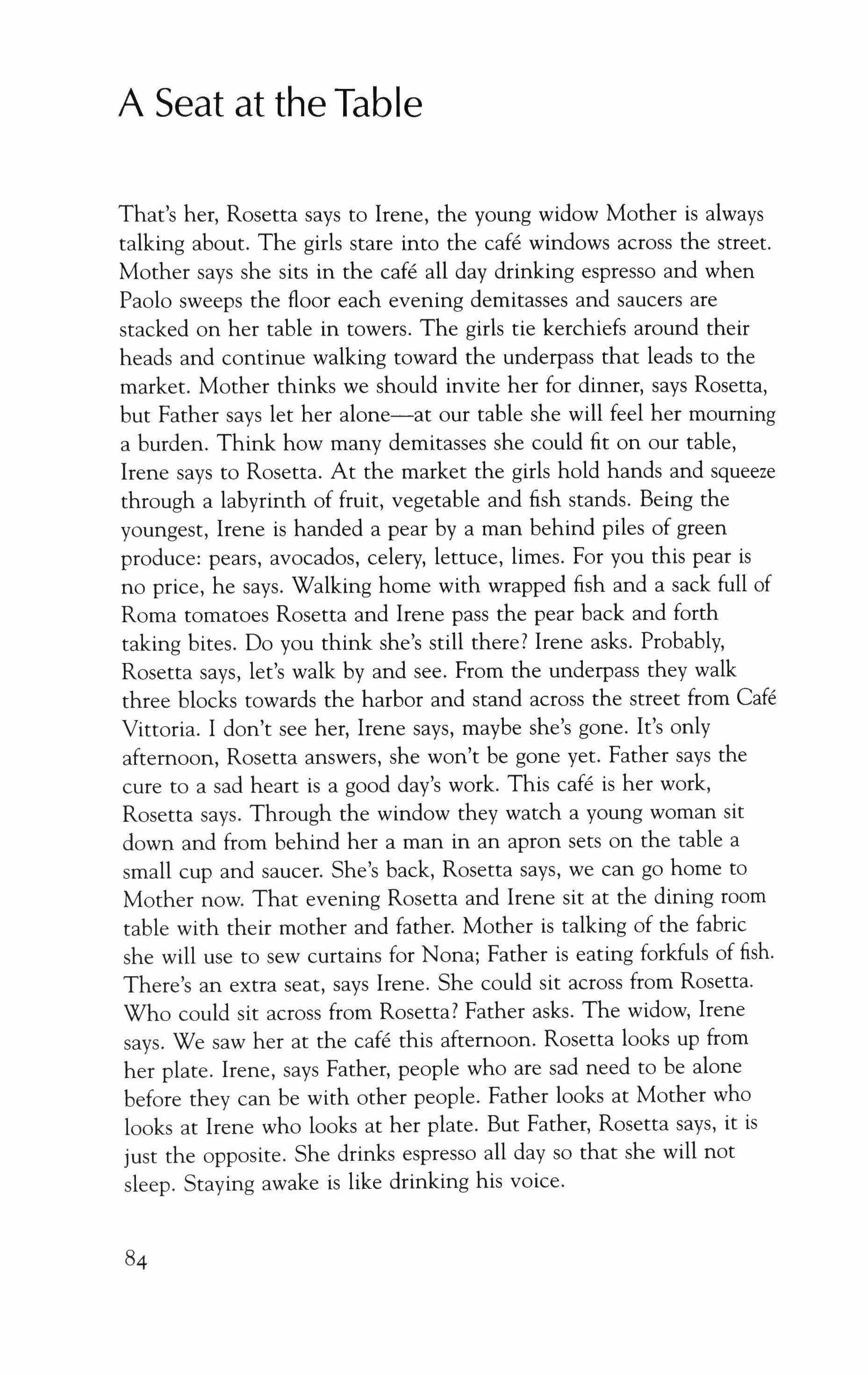
That's her, Rosetta says to Irene, the young widow Mother is always talking about. The girls stare into the cafe windows across the street. Mother says she sits in the cafe all day drinking espresso and when Paolo sweeps the floor each evening demitasses and saucers are stacked on her table in towers. The girls tie kerchiefs around their heads and continue walking toward the underpass that leads to the market. Mother thinks we should invite her for dinner, says Rosetta, but Father says let her alone-at our table she will feel her mourning a burden. Think how many demitasses she could fit on our table, Irene says to Rosetta. At the market the girls hold hands and squeeze through a labyrinth of fruit, vegetable and fish stands. Being the youngest, Irene is handed a pear by a man behind piles of green produce: pears, avocados, celery, lettuce, limes. For you this pear is no price, he says. Walking home with wrapped fish and a sack full of Roma tomatoes Rosetta and Irene pass the pear back and forth taking bites. Do you think she's still there? Irene asks. Probably, Rosetta says, let's walk by and see. From the underpass they walk three blocks towards the harbor and stand across the street from Cafe Vittoria. I don't see her, Irene says, maybe she's gone. It's only afternoon, Rosetta answers, she won't be gone yet. Father says the cure to a sad heart is a good day's work. This cafe is her work, Rosetta says. Through the window they watch a young woman sit down and from behind her a man in an apron sets on the table a small cup and saucer. She's back, Rosetta says, we can go home to Mother now. That evening Rosetta and Irene sit at the dining room table with their mother and father. Mother is talking of the fabric she will use to sew curtains for Nona; Father is eating forkfuls of fish. There's an extra seat, says Irene. She could sit across from Rosetta. Who could sit across from Rosetta? Father asks. The widow, Irene says. We saw her at the cafe this afternoon. Rosetta looks up from her plate. Irene, says Father, people who are sad need to be alone before they can be with other people. Father looks at Mother who looks at Irene who looks at her plate. But Father, Rosetta says, it is just the opposite. She drinks espresso all day so that she will not sleep. Staying awake is like drinking his voice.
Women
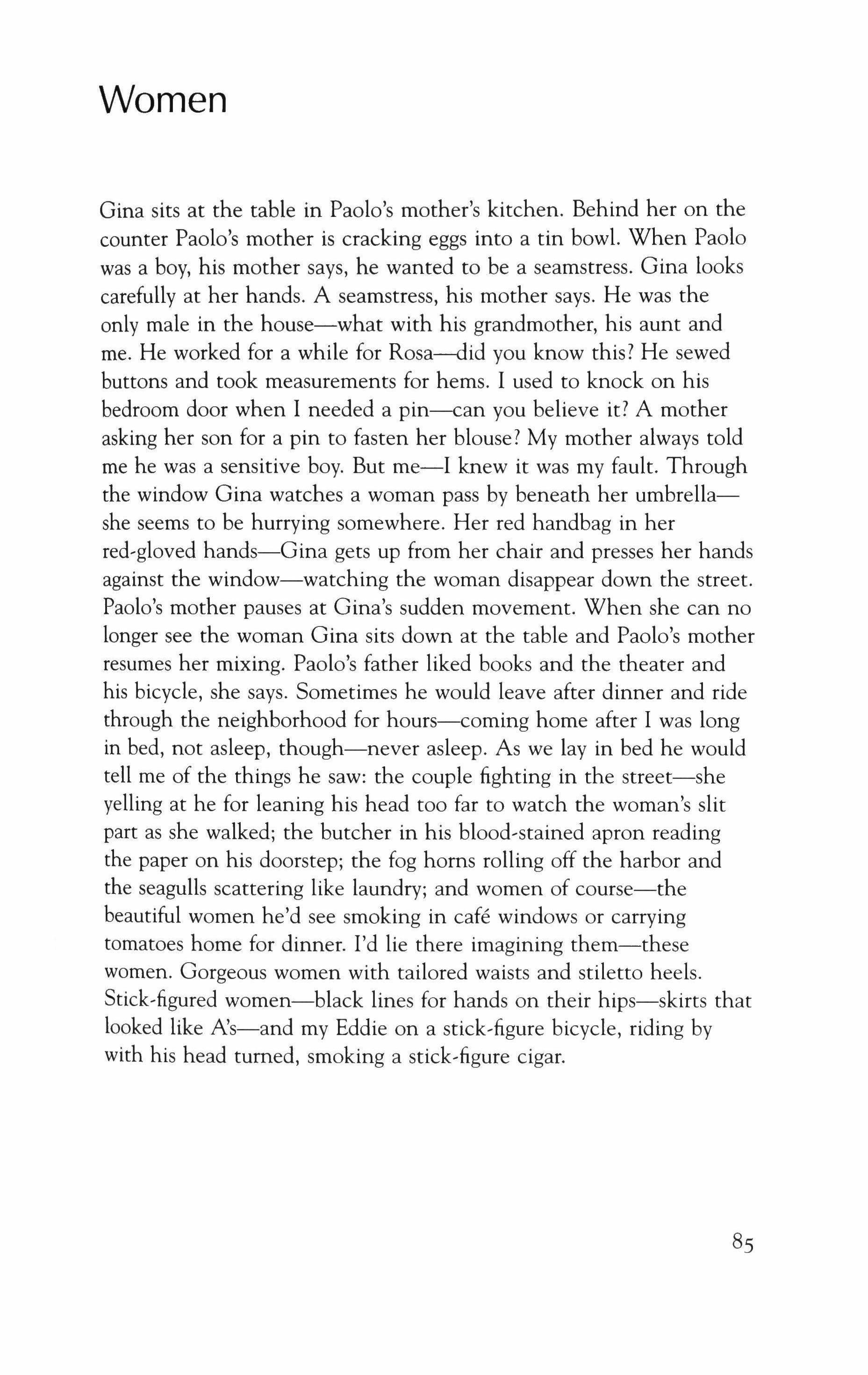
Gina sits at the table in Paolo's mother's kitchen. Behind her on the counter Paolo's mother is cracking eggs into a tin bowl. When Paolo was a boy, his mother says, he wanted to be a seamstress. Gina looks carefully at her hands. A seamstress, his mother says. He was the only male in the house-what with his grandmother, his aunt and me. He worked for a while for Rosa=-did you know this? He sewed buttons and took measurements for hems. I used to knock on his bedroom door when I needed a pin-can you believe it? A mother asking her son for a pin to fasten her blouse? My mother always told me he was a sensitive boy. But me-I knew it was my fault. Through the window Gina watches a woman pass by beneath her umbrellashe seems to be hurrying somewhere. Her red handbag in her red-gloved hands-Gina gets up from her chair and presses her hands against the window-watching the woman disappear down the street. Paolo's mother pauses at Gina's sudden movement. When she can no longer see the woman Gina sits down at the table and Paolo's mother resumes her mixing. Paolo's father liked books and the theater and his bicycle, she says. Sometimes he would leave after dinner and ride through the neighborhood for hours-coming home after I was long in bed, not asleep, though-never asleep. As we lay in bed he would tell me of the things he saw: the couple fighting in the street-she yelling at he for leaning his head too far to watch the woman's slit part as she walked; the butcher in his blood-stained apron reading the paper on his doorstep; the fog horns rolling off the harbor and the seagulls scattering like laundry; and women of course-the beautiful women he'd see smoking in cafe windows or carrying tomatoes home for dinner. I'd lie there imagining them-these women. Gorgeous women with tailored waists and stiletto heels. Stick-figured women-black lines for hands on their hips-skirts that looked like A's-and my Eddie on a stick-figure bicycle, riding by with his head turned, smoking a stick-figure cigar.
85
Giacomo Leopardi
Translated from the Italian by Jonathan Galassi
The Solitary Thrush
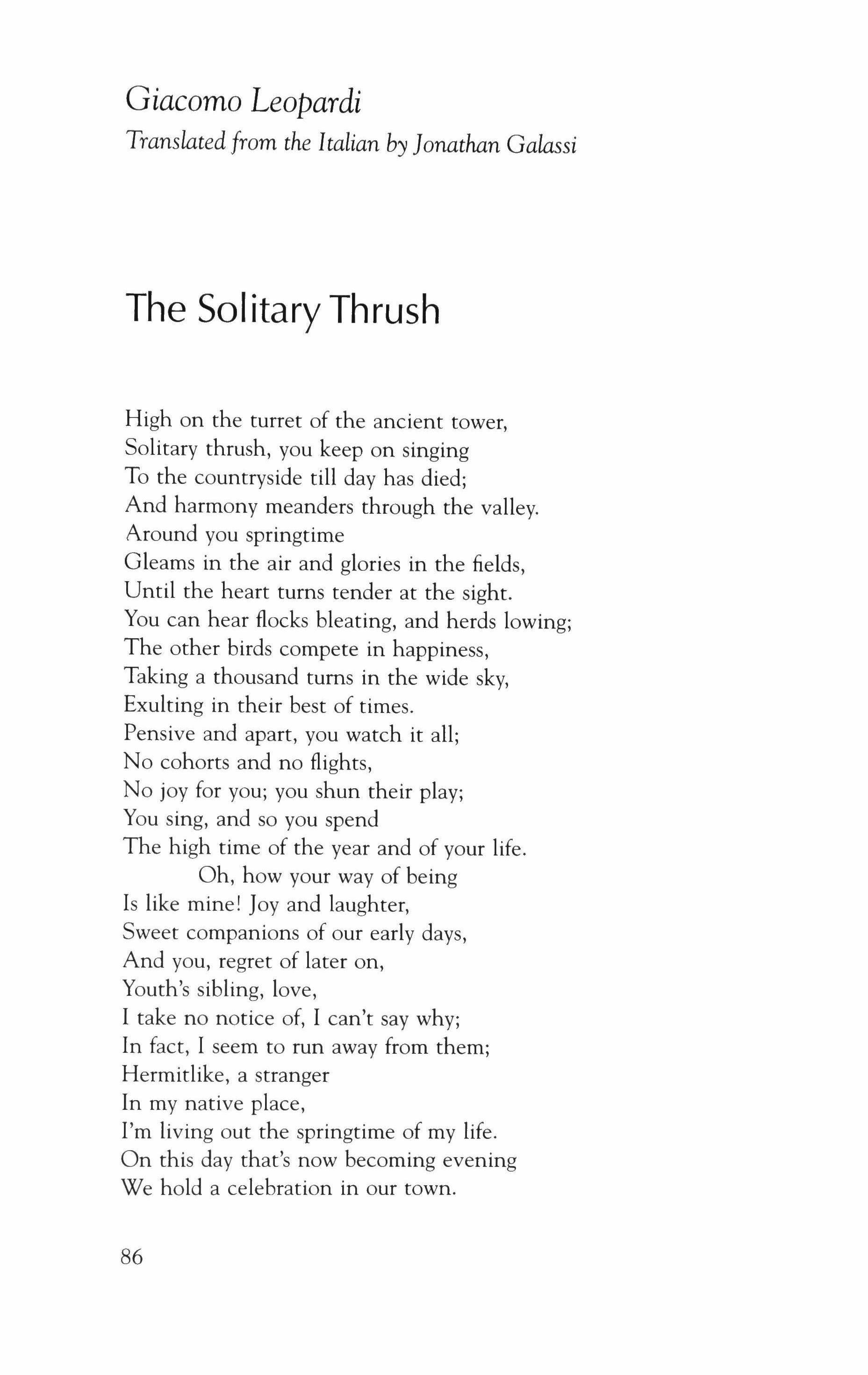
High on the turret of the ancient tower, Solitary thrush, you keep on singing
To the countryside till day has died; And harmony meanders through the valley. Around you springtime
Gleams in the air and glories in the fields, Until the heart turns tender at the sight. You can hear flocks bleating, and herds lowing; The other birds compete in happiness, Taking a thousand turns in the wide sky, Exulting in their best of times.
Pensive and apart, you watch it all; No cohorts and no flights, No joy for you; you shun their play; You sing, and so you spend The high time of the year and of your life.
Oh, how your way of being Is like mine! Joy and laughter, Sweet companions of our early days, And you, regret of later on, Youth's sibling, love,
I take no notice of, I can't say why; In fact, I seem to run away from them; Hermitlike, a stranger
In my native place, I'm living out the springtime of my life.
On this day that's now becoming evening
We hold a celebration in our town.
86
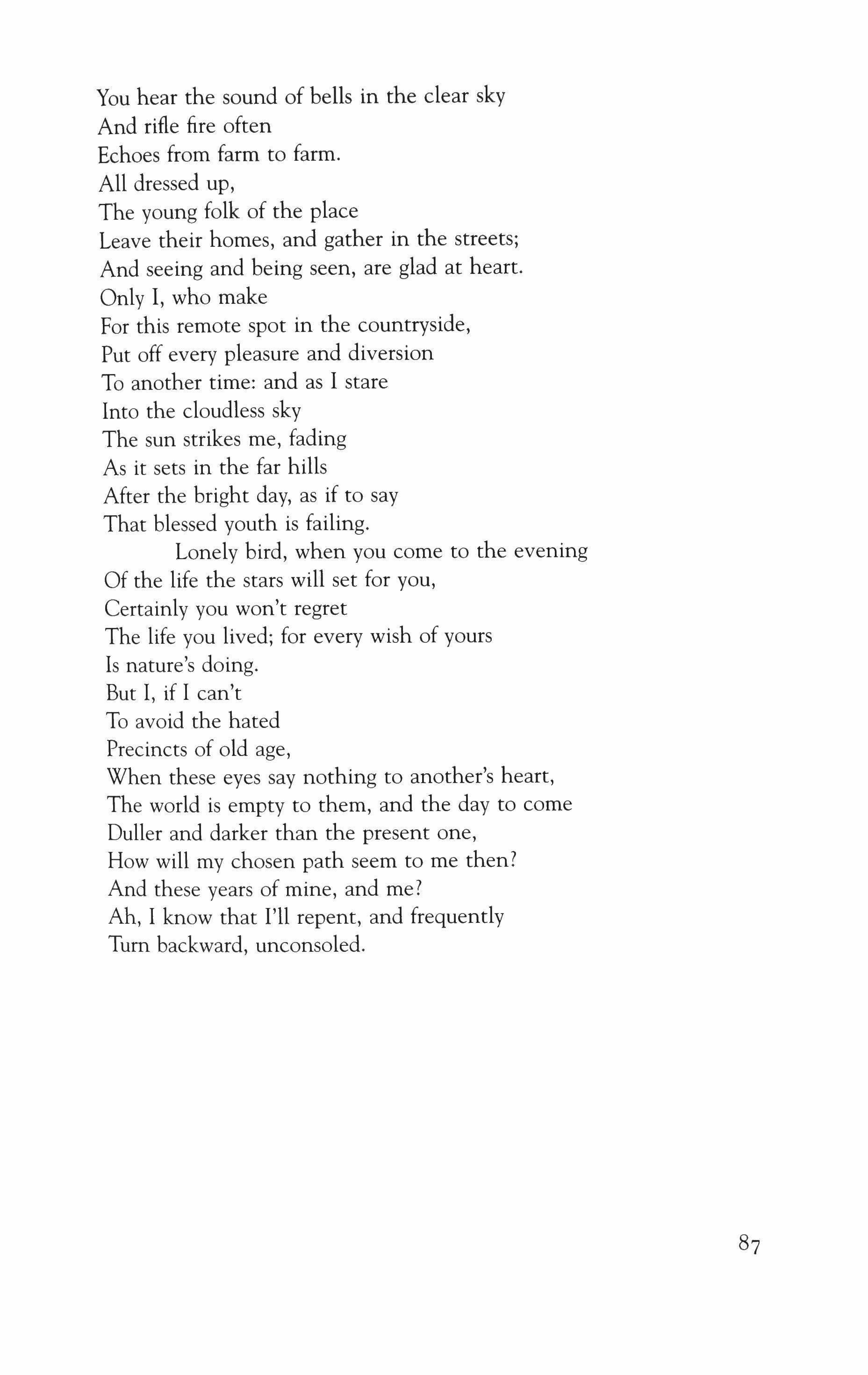
You hear the sound of bells in the clear sky And rifle fire often Echoes from farm to farm.
All dressed up,
The young folk of the place Leave their homes, and gather in the streets; And seeing and being seen, are glad at heart.
Only I, who make
For this remote spot in the countryside, Put off every pleasure and diversion To another time: and as I stare Into the cloudless sky
The sun strikes me, fading As it sets in the far hills
After the bright day, as if to say That blessed youth is failing.
Lonely bird, when you come to the evening Of the life the stars will set for you,
Certainly you won't regret The life you lived; for every wish of yours Is nature's doing.
But I, if I can't To avoid the hated
Precincts of old age, When these eyes say nothing to another's heart, The world is empty to them, and the day to come Duller and darker than the present one, How will my chosen path seem to me then? And these years of mine, and me?
Ah, I know that I'll repent, and frequently Turn backward, unconsoled.
The Evening of the Holiday

The night is soft and bright and without wind, And the moon hangs still above the roofs
And gardens, showing every mountain
Clear in the distance. 0 my lady, Every lane is quiet now, and night lights
Glow in a window only here and there:
You sleep, for sleep came easily to you
In your still rooms; no worry troubles you; Nor do you know or think What a wound you opened in my heart.
You sleep: while I come to my window
In order to salute this sky, which seems So benevolent to look upon, And archaic, all-commanding nature, Who created me for suffering.
I deny you hope, she told me, even hope; Your eyes will shine with tears alone.
This was a holiday; tonight you rest From your amusements; and in your sleep perhaps Recall how many men you pleased today, And those who pleased you, too: but I don't come to mind, Not that I hoped to. And so, I ask What's left in life for me, and fall
On the ground and shout and tremble. Awful Days at such a tender age! Ah, on the road
Not far from me I hear the lonely song
Of the workman, coming late at night
After his pleasures back to his poor home; And my heart is stricken
To think how everything in this world passes And barely leaves a trace. Look, the holiday Has flown, the workday follows On our day of rest, and time makes off with Each human occasion. Where is the noise now
Of those ancient peoples? Where's the renown
88
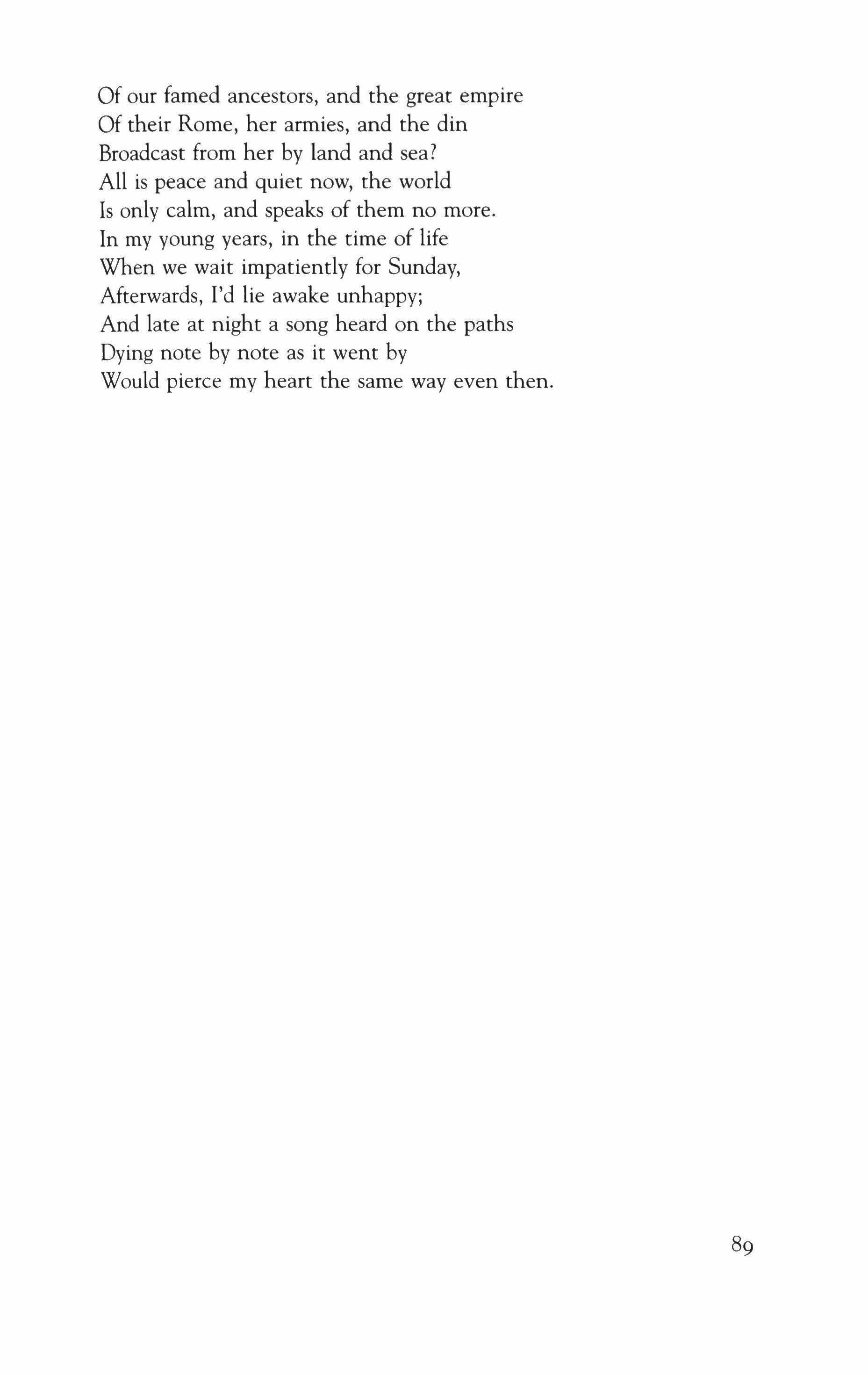
Of our famed ancestors, and the great empire Of their Rome, her armies, and the din Broadcast from her by land and sea?
All is peace and quiet now, the world Is only calm, and speaks of them no more. In my young years, in the time of life When we wait impatiently for Sunday, Afterwards, I'd lie awake unhappy; And late at night a song heard on the paths Dying note by note as it went by Would pierce my heart the same way even then.
The Recollections
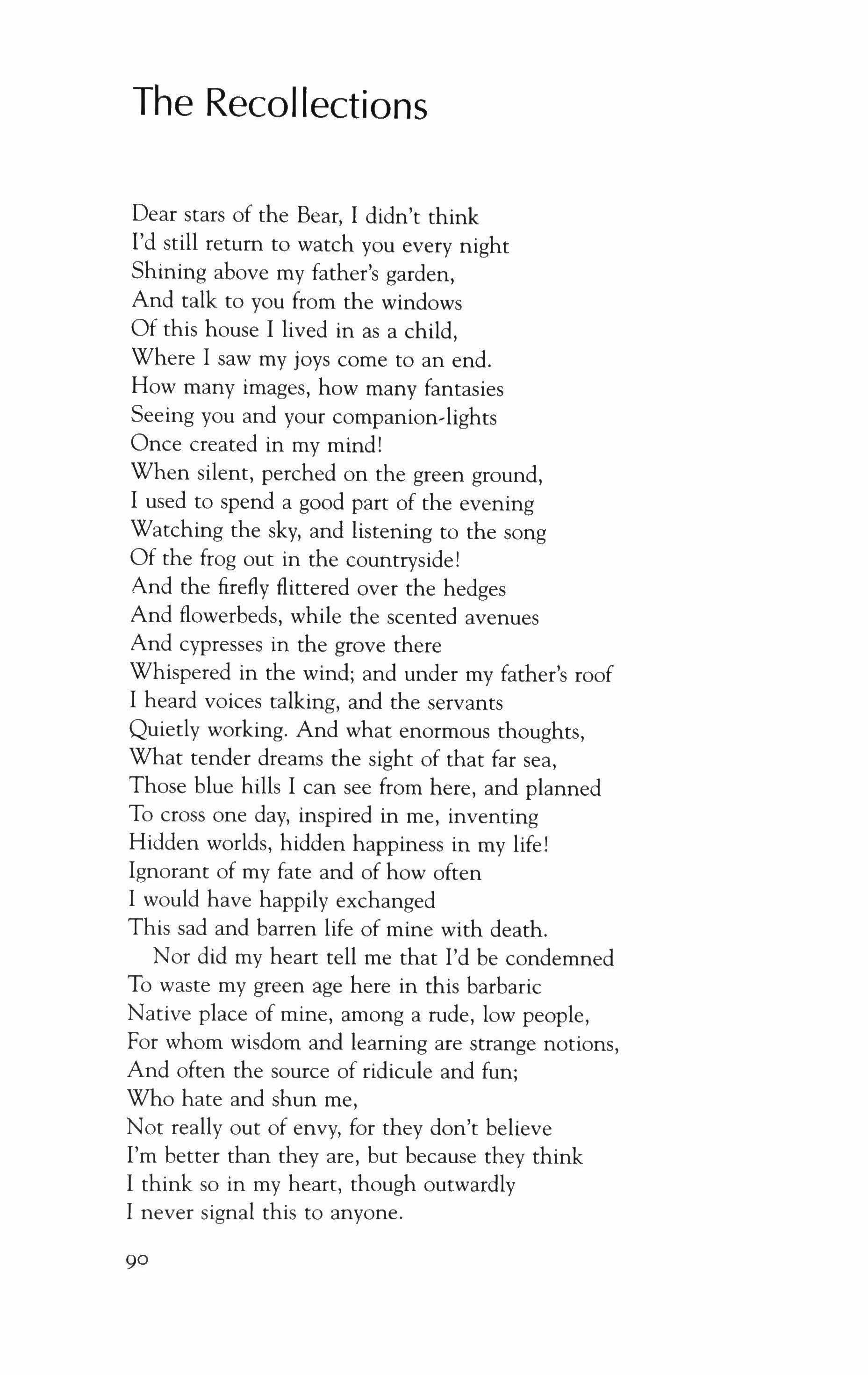
Dear stars of the Bear, I didn't think I'd still return to watch you every night
Shining above my father's garden, And talk to you from the windows
Of this house I lived in as a child, Where I saw my joys come to an end. How many images, how many fantasies
Seeing you and your companion-lights Once created in my mind!
When silent, perched on the green ground, I used to spend a good part of the evening
Watching the sky, and listening to the song
Of the frog out in the countryside!
And the firefly flittered over the hedges And flowerbeds, while the scented avenues And cypresses in the grove there
Whispered in the wind; and under my father's roof
I heard voices talking, and the servants
Quietly working. And what enormous thoughts, What tender dreams the sight of that far sea, Those blue hills I can see from here, and planned
To cross one day, inspired in me, inventing Hidden worlds, hidden happiness in my life!
Ignorant of my fate and of how often I would have happily exchanged This sad and barren life of mine with death.
Nor did my heart tell me that I'd be condemned
To waste my green age here in this barbaric Native place of mine, among a rude, low people, For whom wisdom and learning are strange notions, And often the source of ridicule and fun; Who hate and shun me, Not really out of envy, for they don't believe I'm better than they are, but because they think I think so in my heart, though outwardly
I never signal this to anyone.
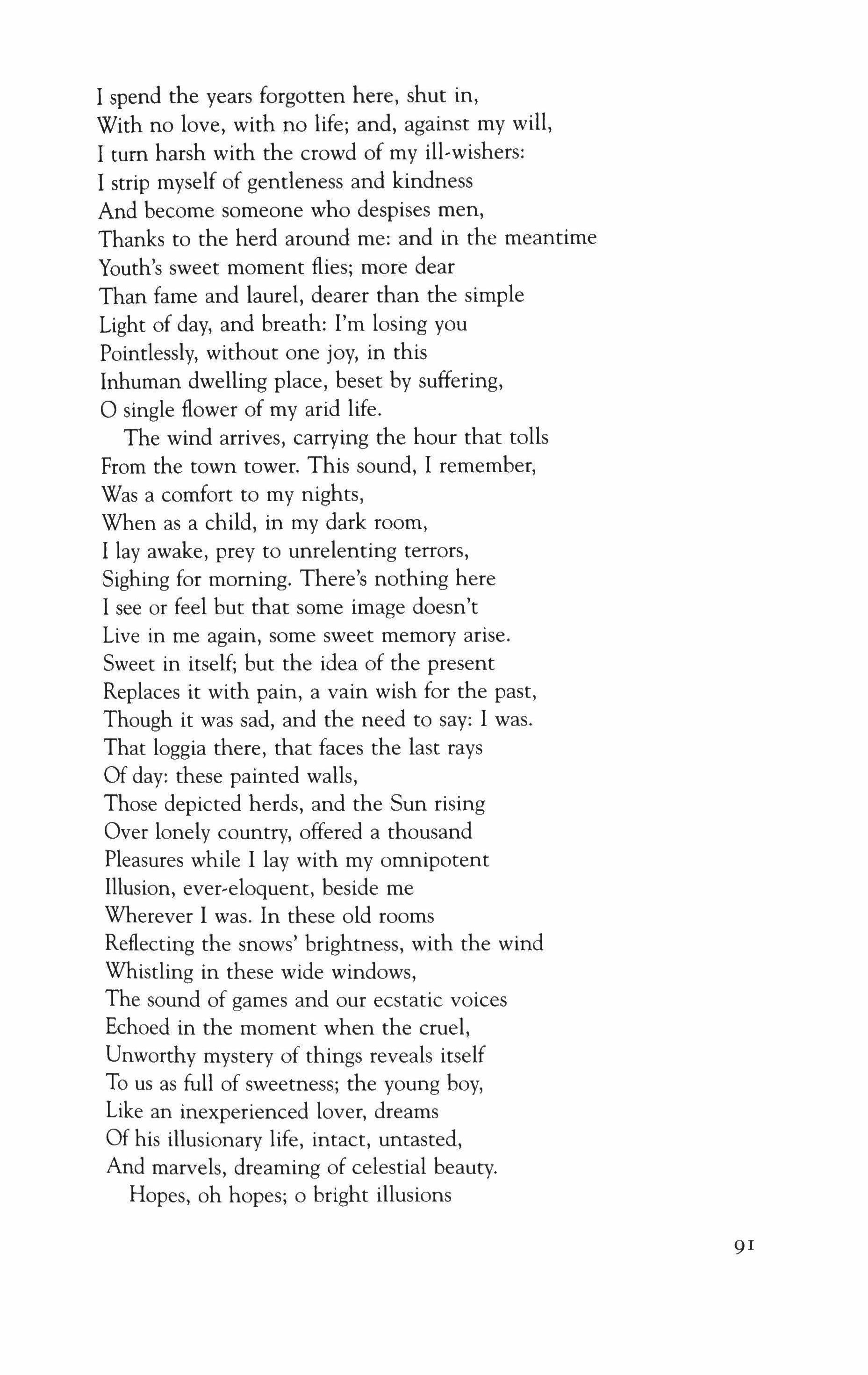
I spend the years forgotten here, shut in, With no love, with no life; and, against my will, I tum harsh with the crowd of my ill-wishers: I strip myself of gentleness and kindness And become someone who despises men, Thanks to the herd around me: and in the meantime Youth's sweet moment flies; more dear Than fame and laurel, dearer than the simple Light of day, and breath: I'm losing you Pointlessly, without one joy, in this Inhuman dwelling place, beset by suffering, o single flower of my arid life.
The wind arrives, carrying the hour that tolls From the town tower. This sound, I remember, Was a comfort to my nights, When as a child, in my dark room, I lay awake, prey to unrelenting terrors, Sighing for morning. There's nothing here I see or feel but that some image doesn't Live in me again, some sweet memory arise. Sweet in itself; but the idea of the present Replaces it with pain, a vain wish for the past, Though it was sad, and the need to say: I was. That loggia there, that faces the last rays Of day: these painted walls, Those depicted herds, and the Sun rising Over lonely country, offered a thousand Pleasures while I lay with my omnipotent Illusion, ever-eloquent, beside me Wherever I was. In these old rooms Reflecting the snows' brightness, with the wind Whistling in these wide windows, The sound of games and our ecstatic voices Echoed in the moment when the cruel, Unworthy mystery of things reveals itself
To us as full of sweetness; the young boy, Like an inexperienced lover, dreams Of his illusionary life, intact, untasted, And marvels, dreaming of celestial beauty. Hopes, oh hopes; 0 bright illusions
91
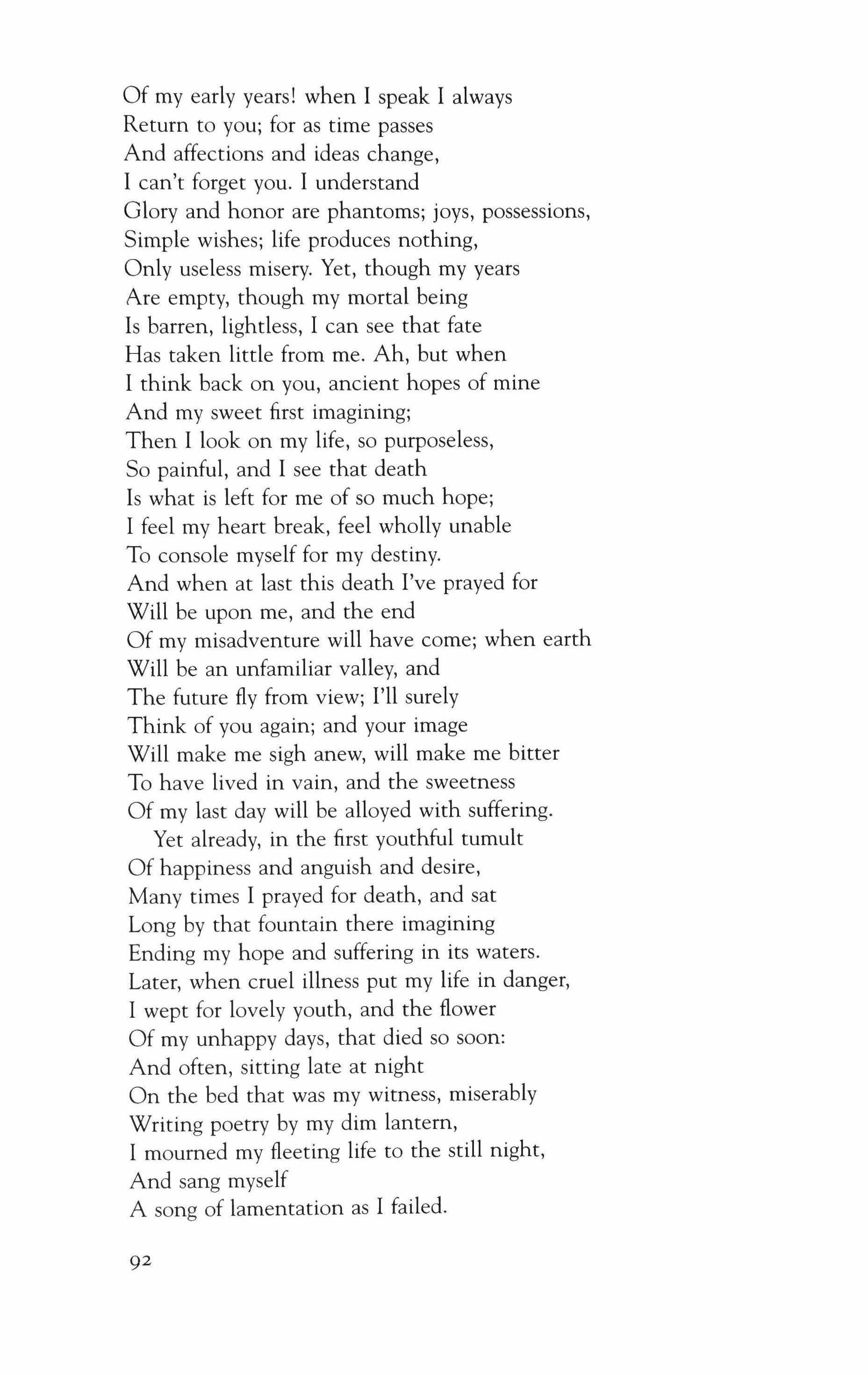
Of my early years! when I speak I always
Return to you; for as time passes And affections and ideas change, I can't forget you. I understand Glory and honor are phantoms; joys, possessions, Simple wishes; life produces nothing, Only useless misery. Yet, though my years Are empty, though my mortal being Is barren, lightless, I can see that fate Has taken little from me. Ah, but when I think back on you, ancient hopes of mine
And my sweet first imagining; Then I look on my life, so purposeless, So painful, and I see that death
Is what is left for me of so much hope; I feel my heart break, feel wholly unable
To console myself for my destiny.
And when at last this death I've prayed for Will be upon me, and the end
Of my misadventure will have come; when earth Will be an unfamiliar valley, and The future fly from view; I'll surely Think of you again; and your image Will make me sigh anew, will make me bitter
To have lived in vain, and the sweetness
Of my last day will be alloyed with suffering. Yet already, in the first youthful tumult
Of happiness and anguish and desire, Many times I prayed for death, and sat Long by that fountain there imagining
Ending my hope and suffering in its waters.
Later, when cruel illness put my life in danger, I wept for lovely youth, and the flower
Of my unhappy days, that died so soon: And often, sitting late at night
On the bed that was my witness, miserably
Writing poetry by my dim lantern, I mourned my fleeting life to the still night, And sang myself
A song of lamentation as I failed.
92
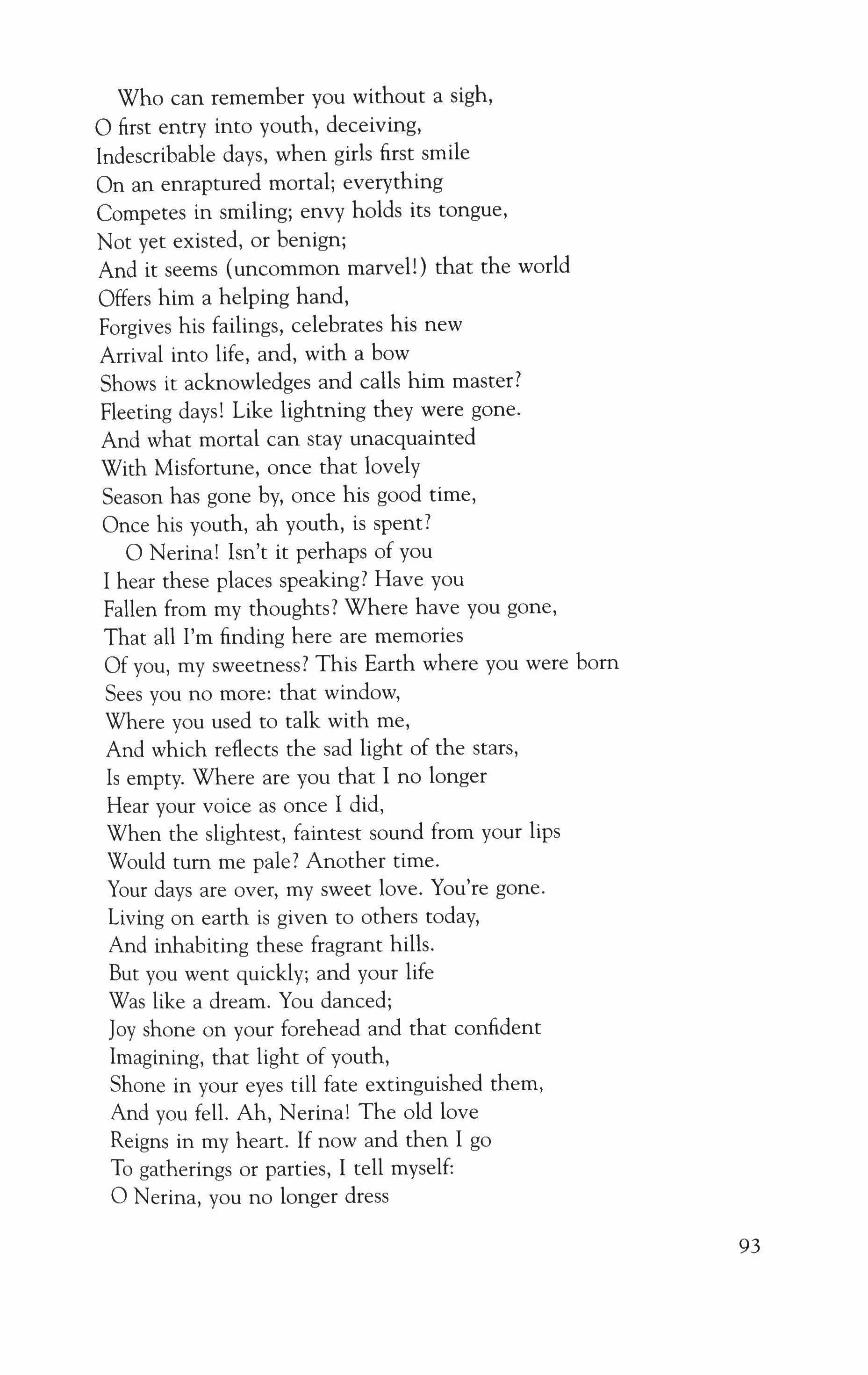
Who can remember you without a sigh, o first entry into youth, deceiving, Indescribable days, when girls first smile
On an enraptured mortal; everything Competes in smiling; envy holds its tongue, Not yet existed, or benign; And it seems (uncommon marvel!) that the world Offers him a helping hand, Forgives his failings, celebrates his new Arrival into life, and, with a bow Shows it acknowledges and calls him master?
Fleeting days! Like lightning they were gone. And what mortal can stay unacquainted With Misfortune, once that lovely Season has gone by, once his good time, Once his youth, ah youth, is spent?
o Nerina! Isn't it perhaps of you I hear these places speaking? Have you Fallen from my thoughts? Where have you gone, That all I'm finding here are memories Of you, my sweetness? This Earth where you were born Sees you no more: that window, Where you used to talk with me, And which reflects the sad light of the stars, Is empty. Where are you that I no longer Hear your voice as once I did, When the slightest, faintest sound from your lips Would turn me pale? Another time. Your days are over, my sweet love. You're gone. Living on earth is given to others today, And inhabiting these fragrant hills. But you went quickly; and your life Was like a dream. You danced; Joy shone on your forehead and that confident Imagining, that light of youth, Shone in your eyes till fate extinguished them, And you fell. Ah, Nerina! The old love Reigns in my heart. If now and then I go To gatherings or parties, I tell myself: o Nerina, you no longer dress
93
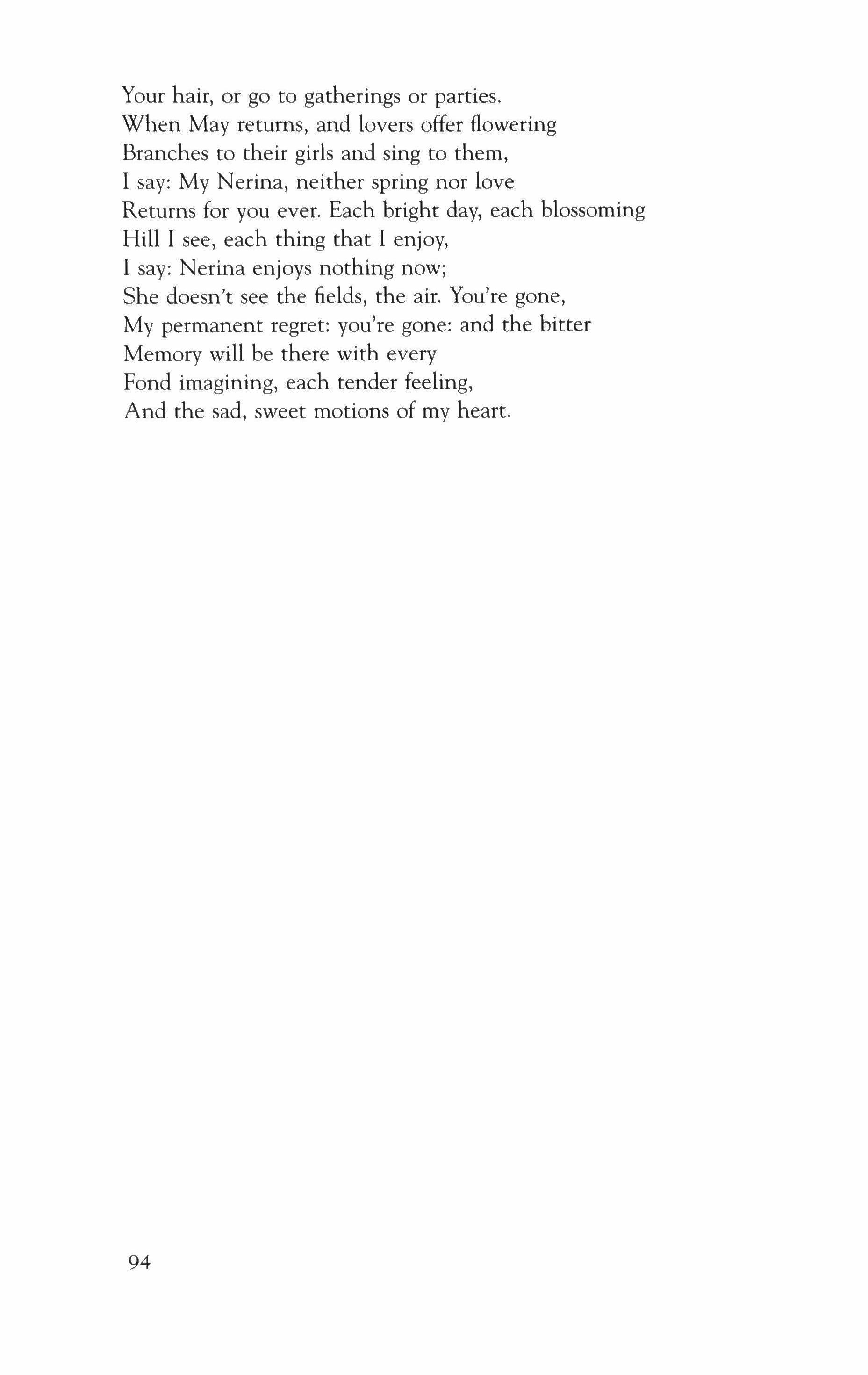
Your hair, or go to gatherings or parties. When May returns, and lovers offer flowering Branches to their girls and sing to them, I say: My Nerina, neither spring nor love Returns for you ever. Each bright day, each blossoming Hill I see, each thing that I enjoy, I say: Nerina enjoys nothing now; She doesn't see the fields, the air. You're gone, My permanent regret: you're gone: and the bitter Memory will be there with every Fond imagining, each tender feeling, And the sad, sweet motions of my heart.
94
The Calm after the Storm
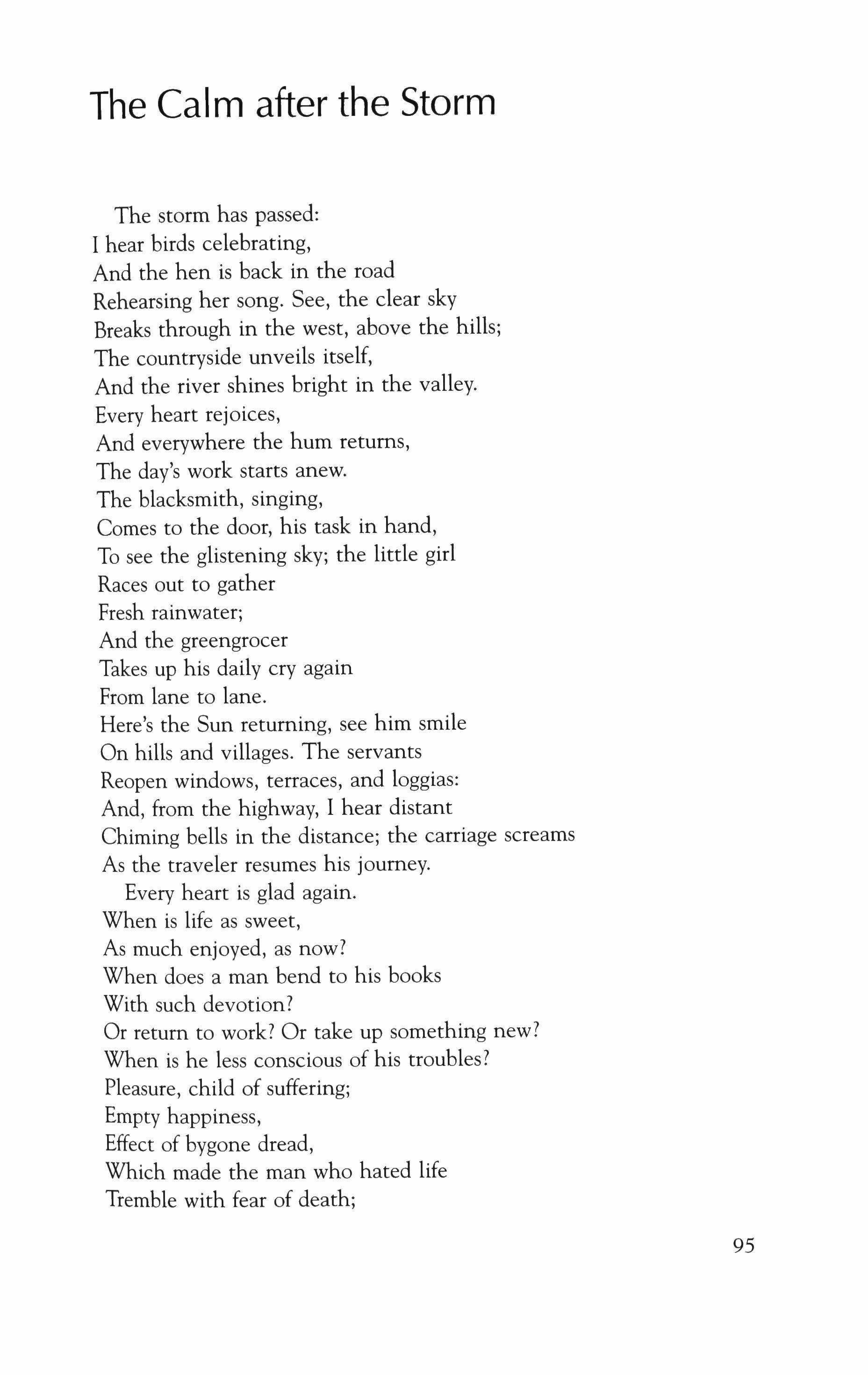
The storm has passed: I hear birds celebrating, And the hen is back in the road
Rehearsing her song. See, the clear sky Breaks through in the west, above the hills; The countryside unveils itself, And the river shines bright in the valley. Every heart rejoices, And everywhere the hum returns, The day's work starts anew.
The blacksmith, singing, Comes to the door, his task in hand, To see the glistening sky; the little girl Races out to gather Fresh rainwater; And the greengrocer Takes up his daily cry again From lane to lane.
Here's the Sun returning, see him smile On hills and villages. The servants Reopen windows, terraces, and loggias: And, from the highway, I hear distant Chiming bells in the distance; the carriage screams As the traveler resumes his journey. Every heart is glad again. When is life as sweet, As much enjoyed, as now?
When does a man bend to his books With such devotion? Or return to work? Or take up something new? When is he less conscious of his troubles?
Pleasure, child of suffering; Empty happiness, Effect of bygone dread, Which made the man who hated life
Tremble with fear of death;
95
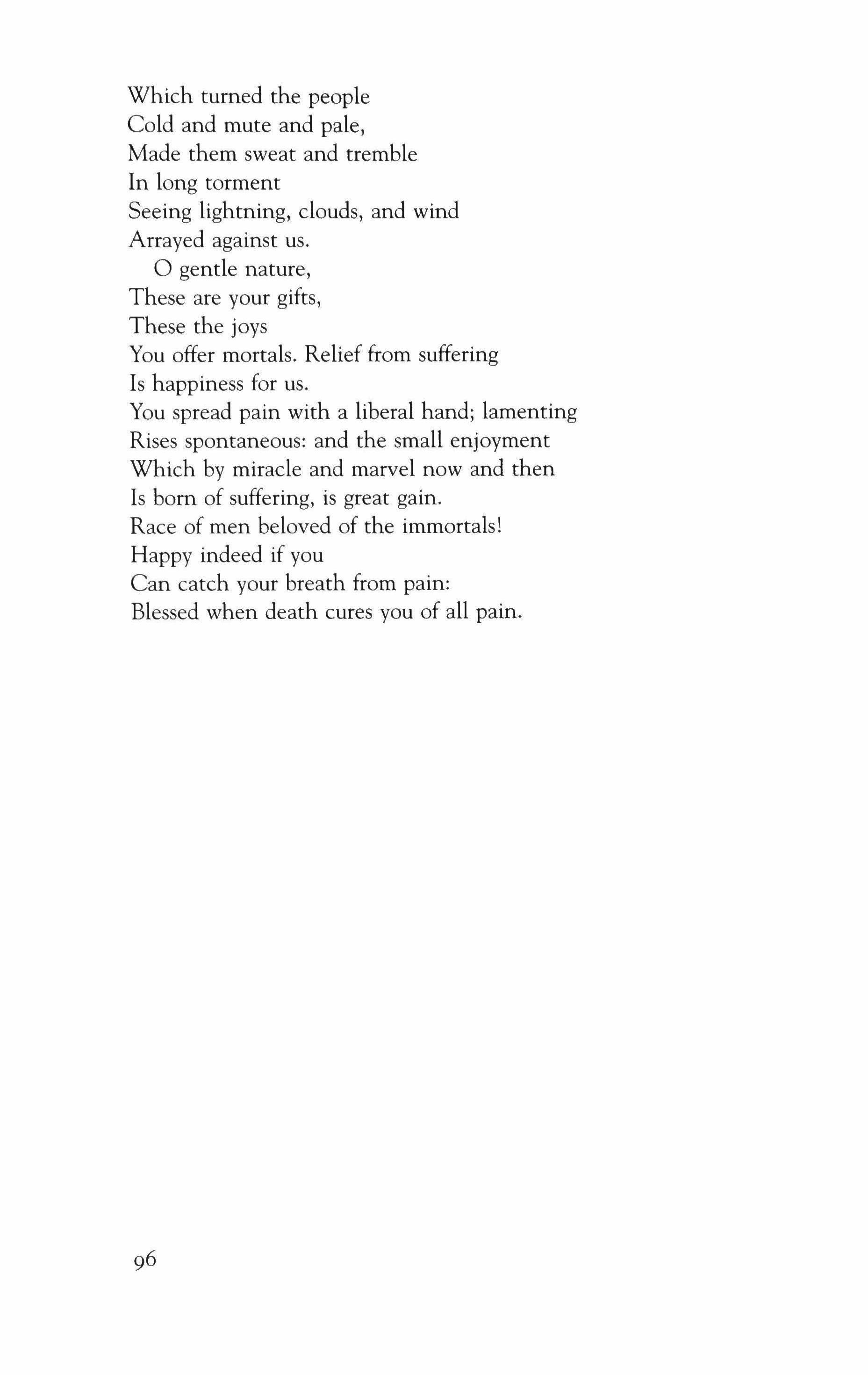
Which turned the people
Cold and mute and pale, Made them sweat and tremble
In long torment
Seeing lightning, clouds, and wind
Arrayed against us.
o gentle nature,
These are your gifts, These the joys
You offer mortals. Relief from suffering Is happiness for us.
You spread pain with a liberal hand; lamenting Rises spontaneous: and the small enjoyment Which by miracle and marvel now and then Is born of suffering, is great gain.
Race of men beloved of the immortals!
Happy indeed if you
Can catch your breath from pain: Blessed when death cures you of all pain.
Ellen Litman
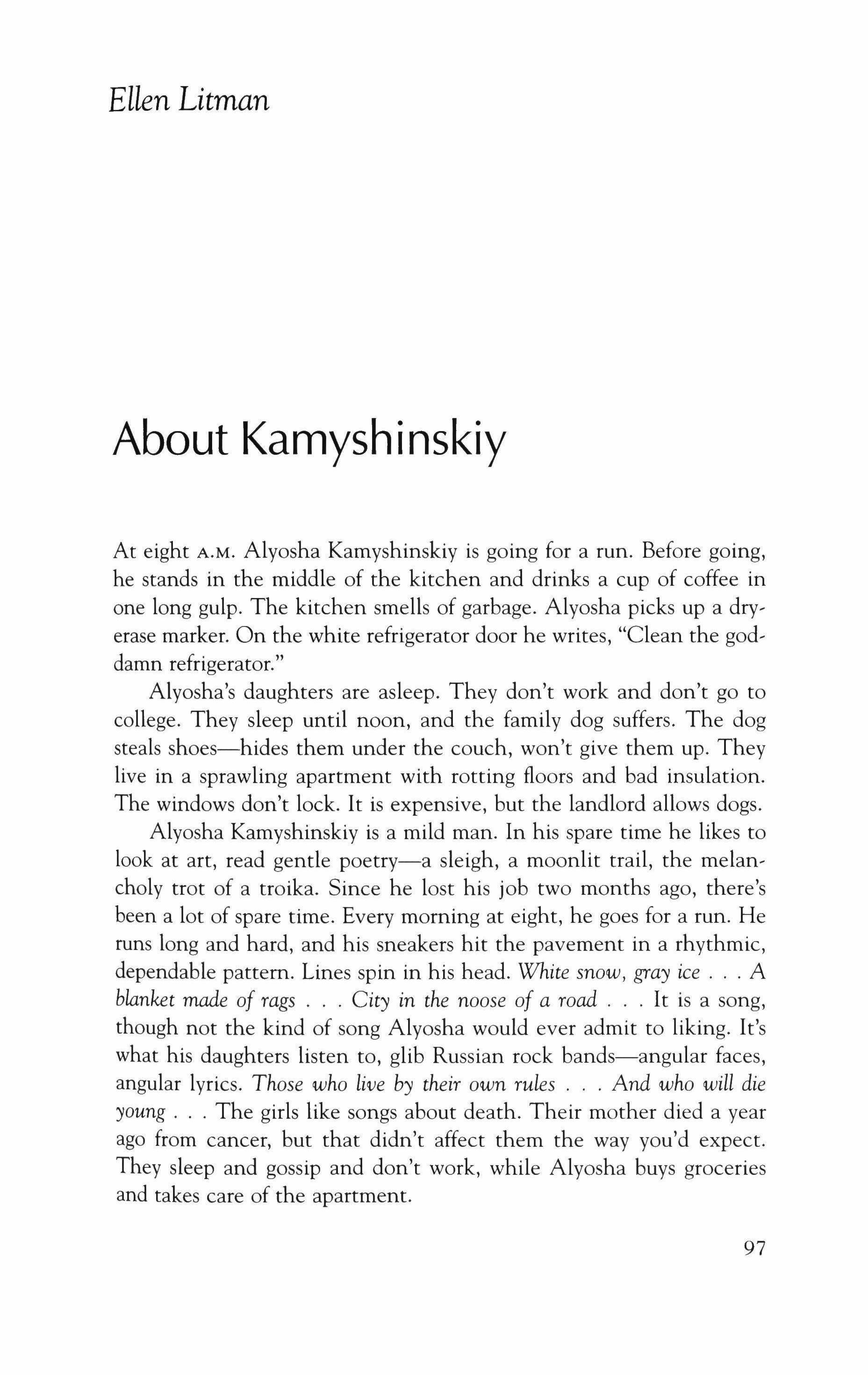
About Kamyshinskiy
At eight A.M. Alyosha Kamyshinskiy is going for a run. Before going, he stands in the middle of the kitchen and drinks a cup of coffee in one long gulp. The kitchen smells of garbage. Alyosha picks up a dry, erase marker. On the white refrigerator door he writes, "Clean the god, damn refrigerator."
Alyosha's daughters are asleep. They don't work and don't go to college. They sleep until noon, and the family dog suffers. The dog steals shoes-hides them under the couch, won't give them up. They live in a sprawling apartment with rotting floors and bad insulation. The windows don't lock. It is expensive, but the landlord allows dogs.
Alyosha Kamyshinskiy is a mild man. In his spare time he likes to look at art, read gentle poetry-a sleigh, a moonlit trail, the melancholy trot of a troika. Since he lost his job two months ago, there's been a lot of spare time. Every morning at eight, he goes for a run. He runs long and hard, and his sneakers hit the pavement in a rhythmic, dependable pattern. Lines spin in his head. White snow, gray ice A blanket made of rags City in the noose of a road It is a song, though not the kind of song Alyosha would ever admit to liking. It's what his daughters listen to, glib Russian rock bands-angular faces, angular lyrics. Those who live by their own rules And who will die young The girls like songs about death. Their mother died a year ago from cancer, but that didn't affect them the way you'd expect. They sleep and gossip and don't work, while Alyosha buys groceries and takes care of the apartment.
97
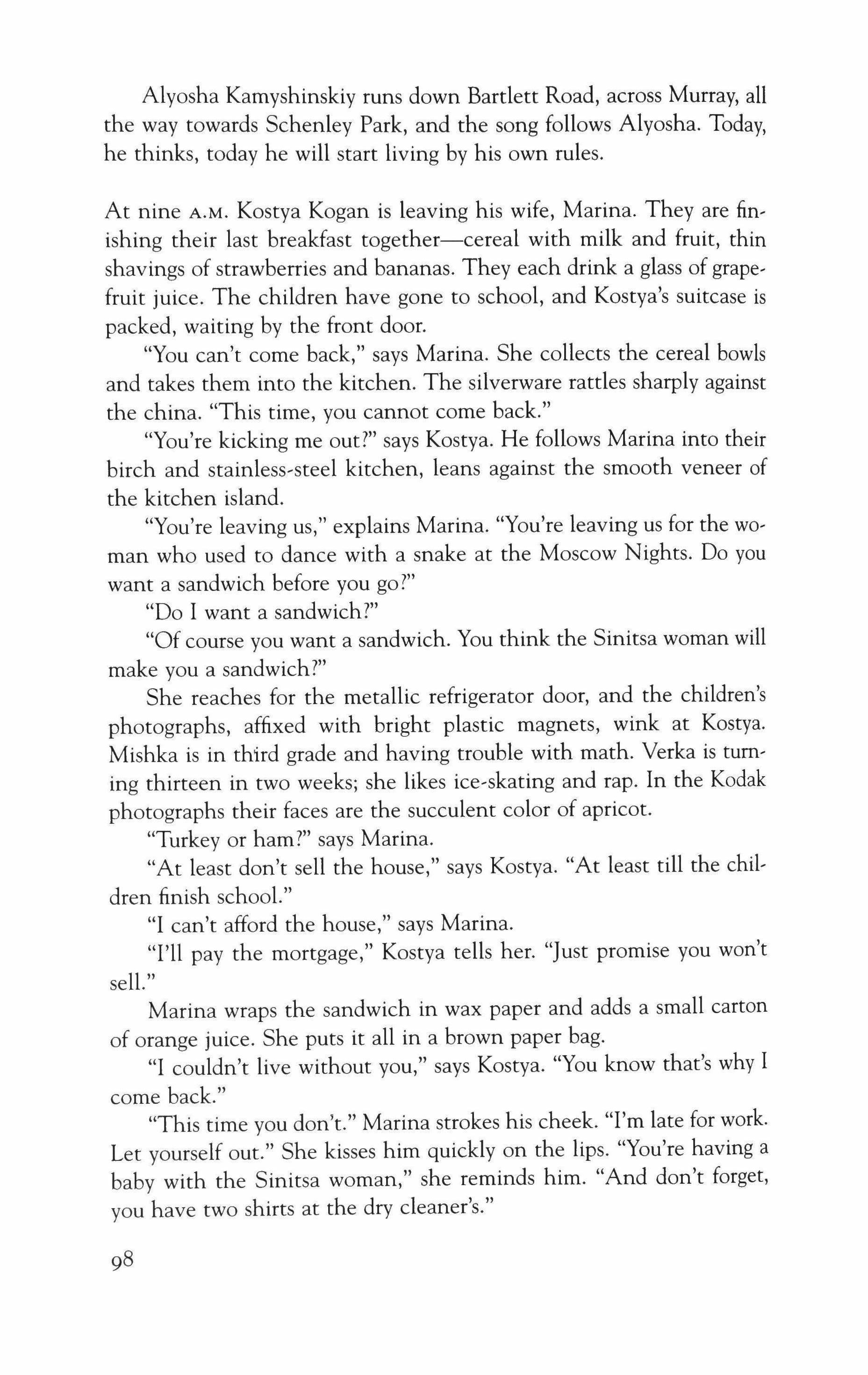
Alyosha Kamyshinskiy runs down Bartlett Road, across Murray, all the way towards Schenley Park, and the song follows Alyosha. Today, he thinks, today he will start living by his own rules.
At nine A.M. Kostya Kogan is leaving his wife, Marina. They are finishing their last breakfast together-cereal with milk and fruit, thin shavings of strawberries and bananas. They each drink a glass of grapefruit juice. The children have gone to school, and Kostya's suitcase is packed, waiting by the front door.
"You can't come back," says Marina. She collects the cereal bowls and takes them into the kitchen. The silverware rattles sharply against the china. "This time, you cannot come back."
"You're kicking me out?" says Kostya. He follows Marina into their birch and stainless-steel kitchen, leans against the smooth veneer of the kitchen island.
"You're leaving us," explains Marina. "You're leaving us for the woman who used to dance with a snake at the Moscow Nights. Do you want a sandwich before you go?"
"Do I want a sandwich?"
"Of course you want a sandwich. You think the Sinitsa woman will make you a sandwich?"
She reaches for the metallic refrigerator door, and the children's photographs, affixed with bright plastic magnets, wink at Kostya. Mishka is in third grade and having trouble with math. Verka is turning thirteen in two weeks; she likes ice-skating and rap. In the Kodak photographs their faces are the succulent color of apricot.
"Turkey or ham?" says Marina.
"At least don't sell the house," says Kostya. "At least till the children finish school."
"I can't afford the house," says Marina.
"I'll pay the mortgage," Kostya tells her. "Just promise you won't sell."
Marina wraps the sandwich in wax paper and adds a small carton of orange juice. She puts it all in a brown paper bag.
"I couldn't live without you," says Kostya. "You know that's why I come back."
"This time you don't." Marina strokes his cheek. "I'm late for work. Let yourself out." She kisses him quickly on the lips. "You're having a baby with the Sinitsa woman," she reminds him. "And don't forget, you have two shirts at the dry cleaner's."
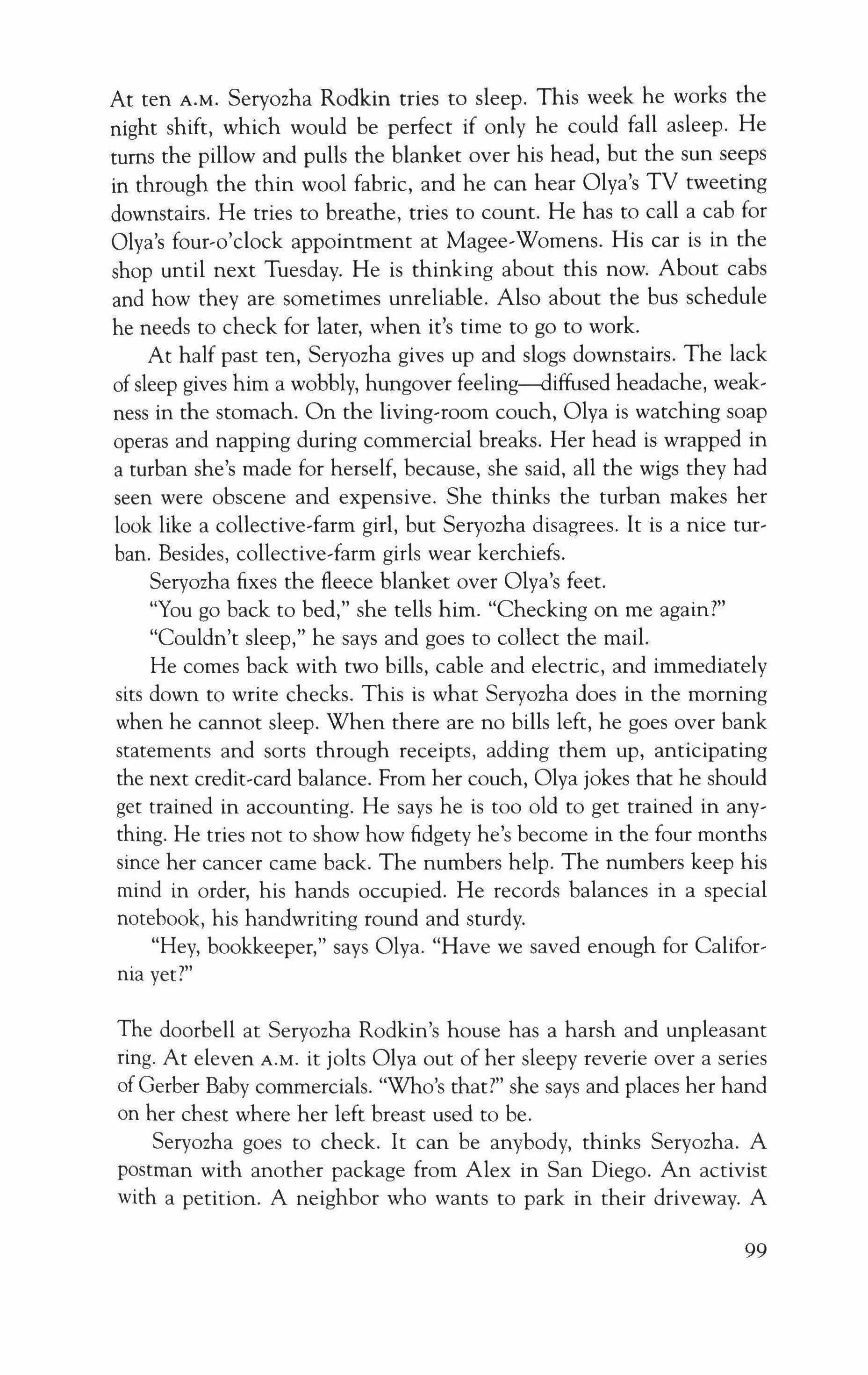
At ten A.M. Seryozha Rodkin tries to sleep. This week he works the night shift, which would be perfect if only he could fall asleep. He turns the pillow and pulls the blanket over his head, but the sun seeps in through the thin wool fabric, and he can hear Olya's TV tweeting downstairs. He tries to breathe, tries to count. He has to call a cab for Olya's four-o'clock appointment at Magee-Womens. His car is in the shop until next Tuesday. He is thinking about this now. About cabs and how they are sometimes unreliable. Also about the bus schedule he needs to check for later, when it's time to go to work.
At half past ten, Seryozha gives up and slogs downstairs. The lack of sleep gives him a wobbly, hungover feeling-diffused headache, weakness in the stomach. On the living-room couch, Olya is watching soap operas and napping during commercial breaks. Her head is wrapped in a turban she's made for herself, because, she said, all the wigs they had seen were obscene and expensive. She thinks the turban makes her look like a collective-farm girl, but Seryozha disagrees. It is a nice turban. Besides, collective-farm girls wear kerchiefs.
Seryozha fixes the fleece blanket over Olya's feet.
"You go back to bed," she tells him. "Checking on me again?"
"Couldn't sleep," he says and goes to collect the mail.
He comes back with two bills, cable and electric, and immediately sits down to write checks. This is what Seryozha does in the morning when he cannot sleep. When there are no bills left, he goes over bank statements and sorts through receipts, adding them up, anticipating the next credit-card balance. From her couch, Olya jokes that he should get trained in accounting. He says he is too old to get trained in anything. He tries not to show how fidgety he's become in the four months since her cancer came back. The numbers help. The numbers keep his mind in order, his hands occupied. He records balances in a special notebook, his handwriting round and sturdy.
"Hey, bookkeeper," says Olya. "Have we saved enough for California yet?"
The doorbell at Seryozha Rodkin's house has a harsh and unpleasant ring. At eleven A.M. it jolts Olya out of her sleepy reverie over a series of Gerber Baby commercials. "Who's that?" she says and places her hand on her chest where her left breast used to be.
Seryozha goes to check. It can be anybody, thinks Seryozha. A postman with another package from Alex in San Diego. An activist with a petition. A neighbor who wants to park in their driveway. A
99
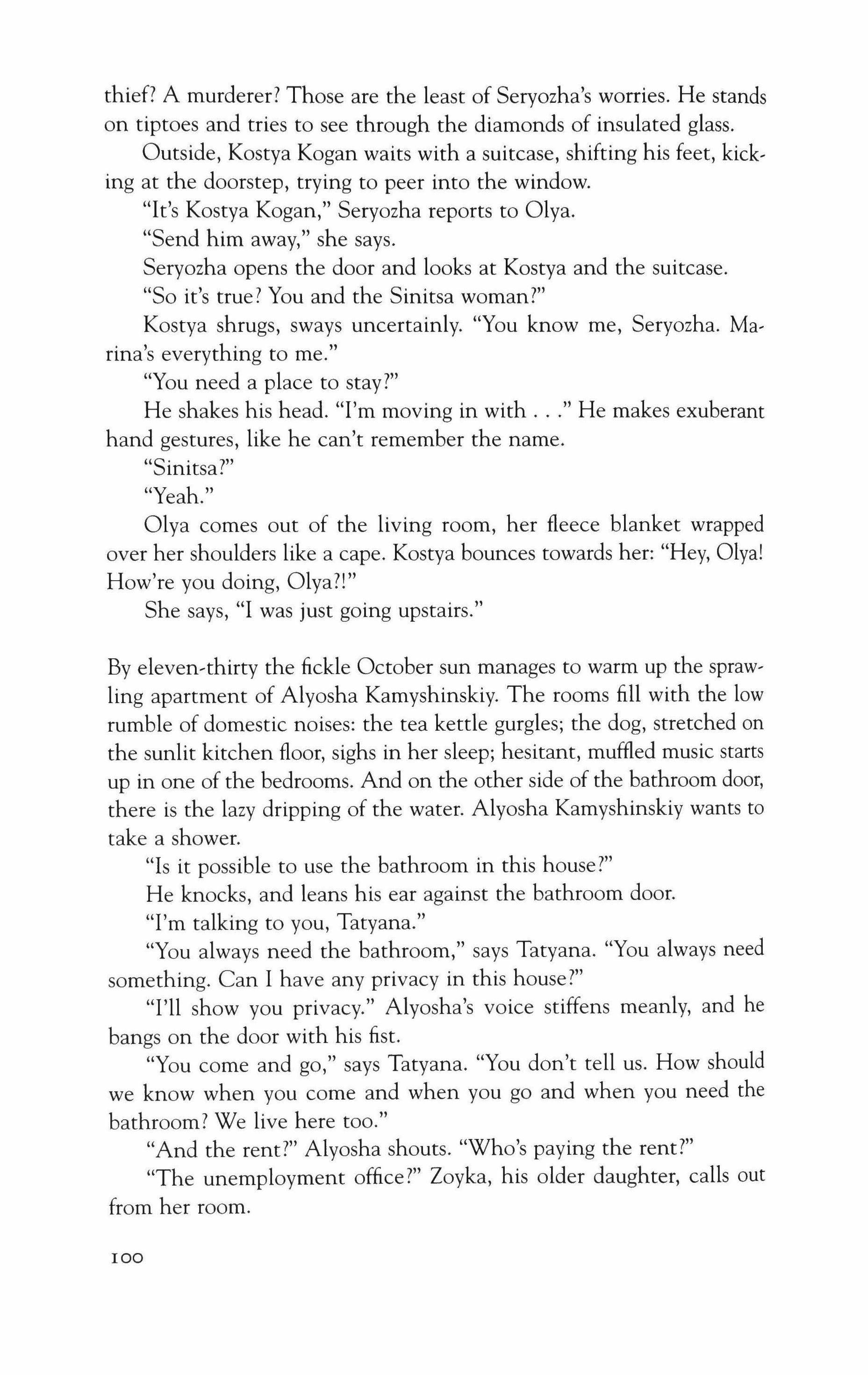
thief? A murderer? Those are the least of Seryozha's worries. He stands on tiptoes and tries to see through the diamonds of insulated glass.
Outside, Kostya Kogan waits with a suitcase, shifting his feet, kicking at the doorstep, trying to peer into the window.
"It's Kostya Kogan," Seryozha reports to Olya.
"Send him away," she says.
Seryozha opens the door and looks at Kostya and the suitcase.
"So it's true? You and the Sinitsa woman?"
Kostya shrugs, sways uncertainly. "You know me, Seryozha. Marina's everything to me."
"You need a place to stay?"
He shakes his head. "I'm moving in with " He makes exuberant hand gestures, like he can't remember the name.
"Sinitsa?"
"Yeah."
Olya comes out of the living room, her fleece blanket wrapped over her shoulders like a cape. Kostya bounces towards her: "Hey, Olya! How're you doing, Olya?!"
She says, "I was just going upstairs."
By eleven-thirty the fickle October sun manages to warm up the sprawling apartment of Alyosha Kamyshinskiy. The rooms fill with the low rumble of domestic noises: the tea kettle gurgles; the dog, stretched on the sunlit kitchen floor, sighs in her sleep; hesitant, muffled music starts up in one of the bedrooms. And on the other side of the bathroom door, there is the lazy dripping of the water. Alyosha Kamyshinskiy wants to take a shower.
"Is it possible to use the bathroom in this house?"
He knocks, and leans his ear against the bathroom door.
"I'm talking to you, Tatyana."
"You always need the bathroom," says Tatyana. "You always need something. Can I have any privacy in this house?"
"I'll show you privacy." Alyosha's voice stiffens meanly, and he bangs on the door with his fist.
"You come and go," says Tatyana. "You don't tell us. How should we know when you come and when you go and when you need the bathroom? We live here too."
"And the rent?" Alyosha shouts. "Who's paying the rent?"
"The unemployment office?" Zoyka, his older daughter, calls out from her room.
100
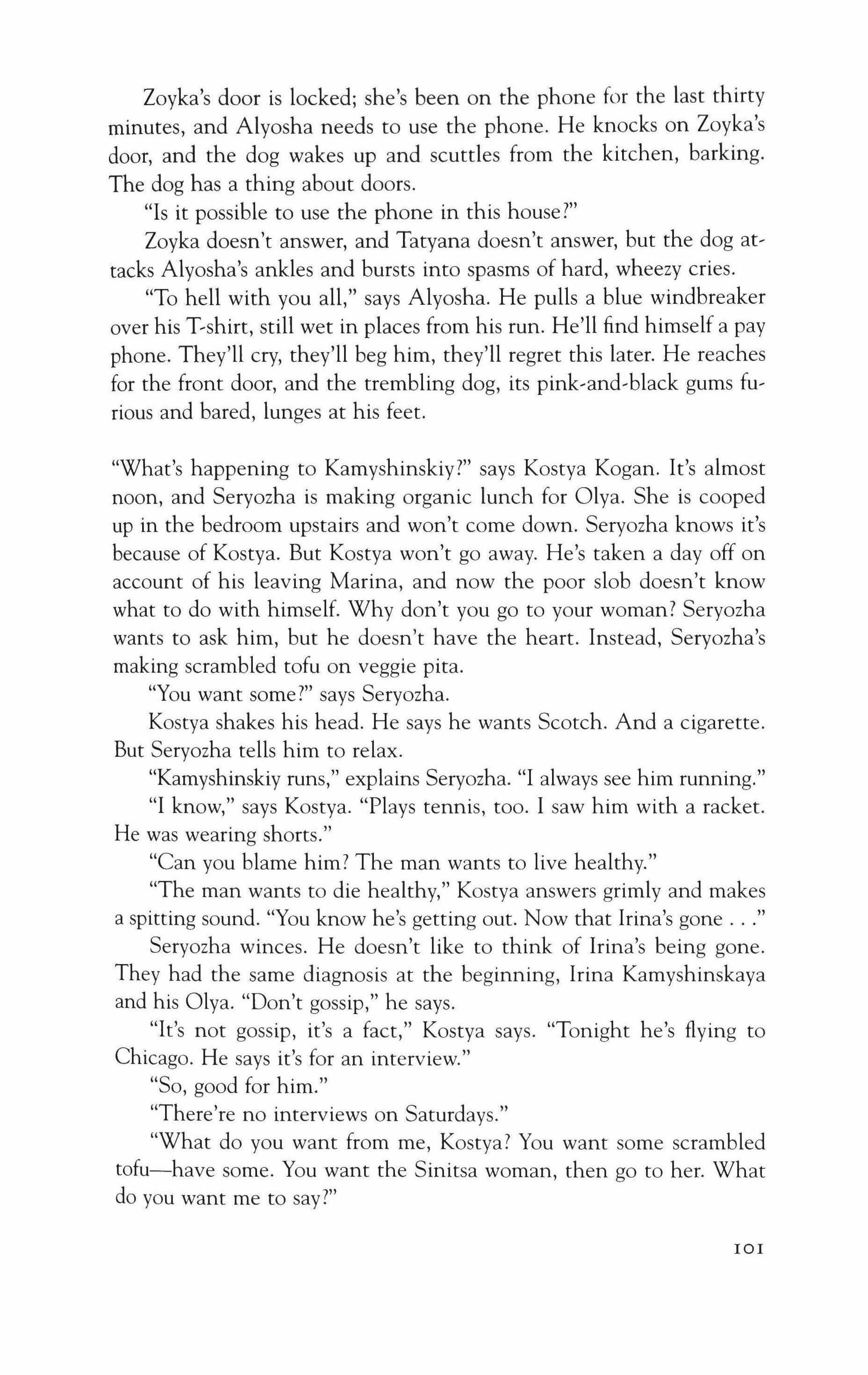
Zoyka's door is locked; she's been on the phone for the last thirty minutes, and Alyosha needs to use the phone. He knocks on Zoyka's door, and the dog wakes up and scuttles from the kitchen, barking. The dog has a thing about doors.
"Is it possible to use the phone in this house?"
Zoyka doesn't answer, and Tatyana doesn't answer, but the dog at, tacks Alyosha's ankles and bursts into spasms of hard, wheezy cries.
"To hell with you all," says Alyosha. He pulls a blue windbreaker over his T,shirt, still wet in places from his run. He'll find himself a pay phone. They'll cry, they'll beg him, they'll regret this later. He reaches for the front door, and the trembling dog, its pink-and-black gums furious and bared, lunges at his feet.
"What's happening to Kamyshinskiy?" says Kostya Kogan. It's almost noon, and Seryozha is making organic lunch for Olya. She is cooped up in the bedroom upstairs and won't come down. Seryozha knows it's because of Kostya. But Kostya won't go away. He's taken a day off on account of his leaving Marina, and now the poor slob doesn't know what to do with himself. Why don't you go to your woman? Seryozha wants to ask him, but he doesn't have the heart. Instead, Seryozha's making scrambled tofu on veggie pita.
"You want some?" says Seryozha.
Kostya shakes his head. He says he wants Scotch. And a cigarette. But Seryozha tells him to relax.
"Kamyshinskiy runs," explains Seryozha. "I always see him running."
"I know," says Kostya. "Plays tennis, too. I saw him with a racket. He was wearing shorts."
"Can you blame him? The man wants to live healthy."
"The man wants to die healthy," Kostya answers grimly and makes a spitting sound. "You know he's getting out. Now that Irina's gone Seryozha winces. He doesn't like to think of Irina's being gone. They had the same diagnosis at the beginning, Irina Kamyshinskaya and his Olya. "Don't gossip," he says.
"It's not gossip, it's a fact," Kostya says. "Tonight he's flying to Chicago. He says it's for an interview."
"So, good for him."
"There're no interviews on Saturdays."
"What do you want from me, Kostya? You want some scrambled tofu-have some. You want the Sinitsa woman, then go to her. What do you want me to say?"
101
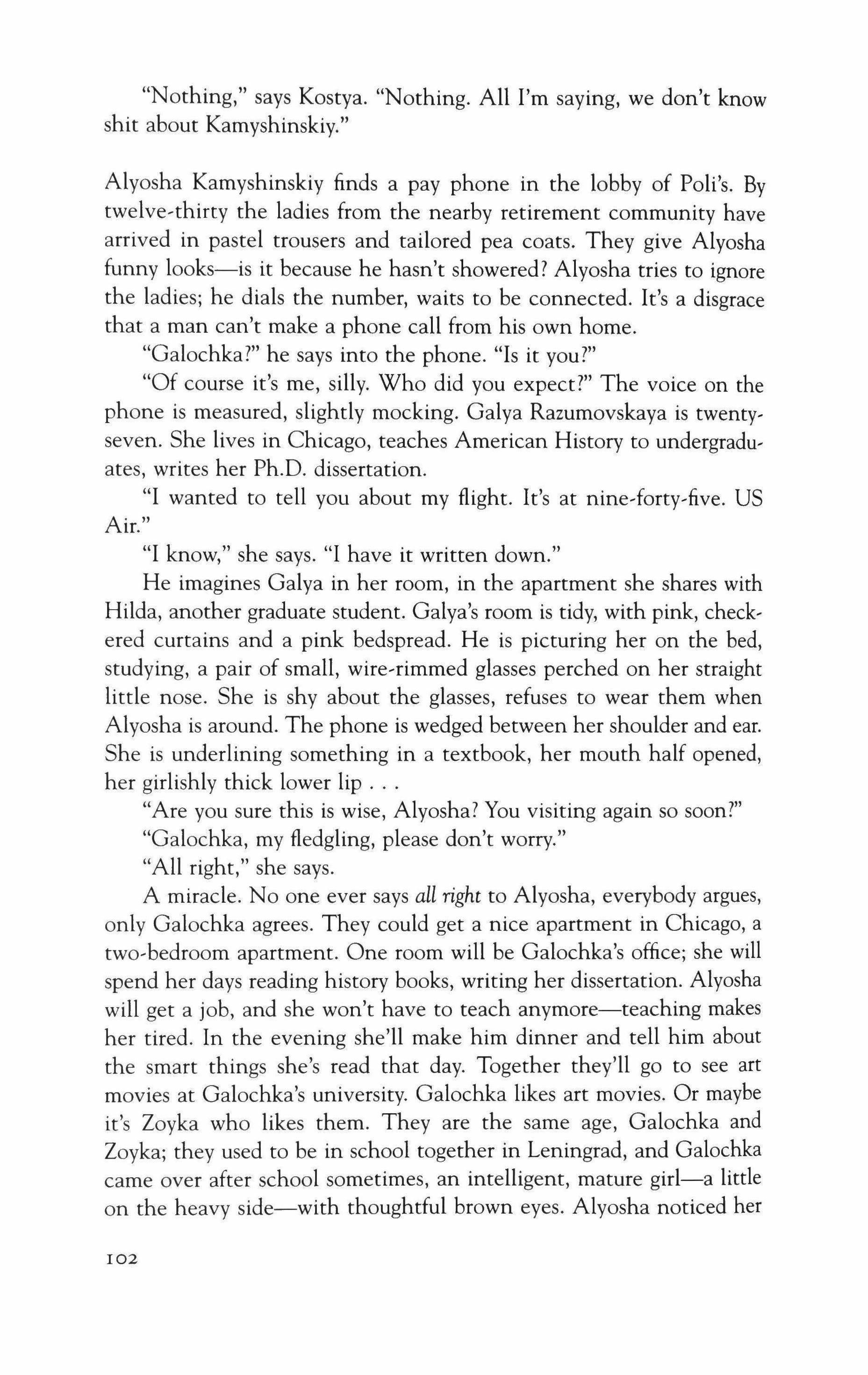
"Nothing," says Kostya. "Nothing. All I'm saying, we don't know shit about Kamyshinskiy."
Alyosha Kamyshinskiy finds a pay phone in the lobby of Poli's. By twelve-thirty the ladies from the nearby retirement community have arrived in pastel trousers and tailored pea coats. They give Alyosha funny looks-is it because he hasn't showered? Alyosha tries to ignore the ladies; he dials the number, waits to be connected. It's a disgrace that a man can't make a phone call from his own home.
"Galochka?" he says into the phone. "Is it you?"
"Of course it's me, silly. Who did you expect?" The voice on the phone is measured, slightly mocking. Galya Razumovskaya is twenty, seven. She lives in Chicago, teaches American History to undergraduates, writes her Ph.D. dissertation.
"I wanted to tell you about my flight. It's at nine-forty-five. US Air."
"I know," she says. "I have it written down."
He imagines Galya in her room, in the apartment she shares with Hilda, another graduate student. Galya's room is tidy, with pink, check, ered curtains and a pink bedspread. He is picturing her on the bed, studying, a pair of small, wire'rimmed glasses perched on her straight little nose. She is shy about the glasses, refuses to wear them when Alyosha is around. The phone is wedged between her shoulder and ear. She is underlining something in a textbook, her mouth half opened, her girlishly thick lower lip
"Are you sure this is wise, Alyosha? You visiting again so soon?"
"Galochka, my fledgling, please don't worry."
"All right," she says.
A miracle. No one ever says all right to Alyosha, everybody argues, only Galochka agrees. They could get a nice apartment in Chicago, a two'bedroom apartment. One room will be Galochka's office; she will spend her days reading history books, writing her dissertation. Alyosha will get a job, and she won't have to teach anymore-teaching makes her tired. In the evening she'll make him dinner and tell him about the smart things she's read that day. Together they'll go to see art movies at Galochka's university. Galochka likes art movies. Or maybe it's Zoyka who likes them. They are the same age, Galochka and Zoyka; they used to be in school together in Leningrad, and Galochka came over after school sometimes, an intelligent, mature girl-a little on the heavy side-with thoughtful brown eyes. Alyosha noticed her
102
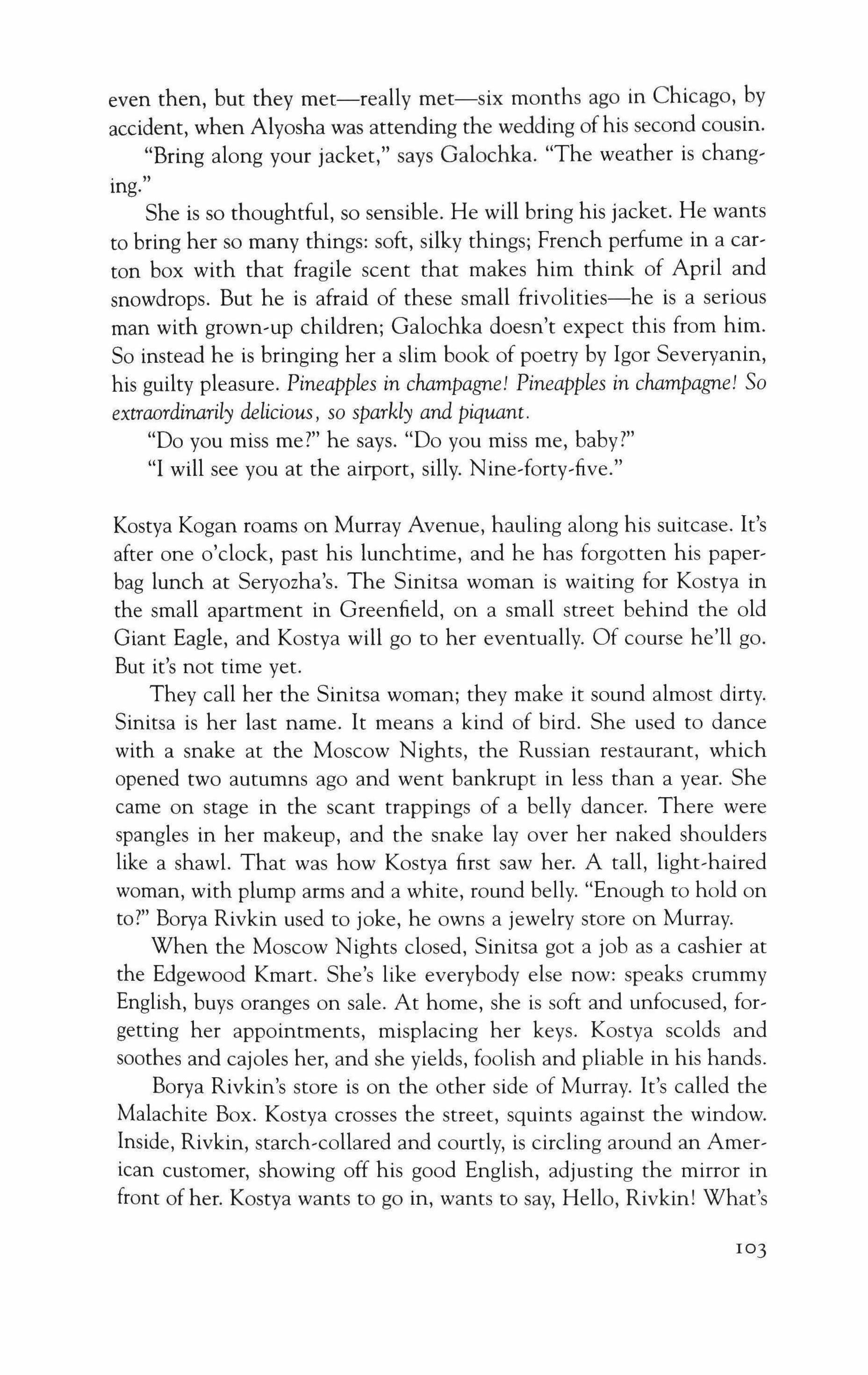
even then, but they met-really met-six months ago in Chicago, by accident, when Alyosha was attending the wedding ofhis second cousin.
"Bring along your jacket," says Galochka. "The weather is changmg.
She is so thoughtful, so sensible. He will bring his jacket. He wants to bring her so many things: soft, silky things; French perfume in a carton box with that fragile scent that makes him think of April and snowdrops. But he is afraid of these small frivolities-he is a serious man with grown-up children; Galochka doesn't expect this from him. So instead he is bringing her a slim book of poetry by Igor Severyanin, his guilty pleasure. Pineapples in champagne! Pineapples in champagne! So extraordinarily delicious, so sparkly and piquant.
"Do you miss me?" he says. "Do you miss me, baby?"
"I will see you at the airport, silly. Nine-forty-five."
Kostya Kogan roams on Murray Avenue, hauling along his suitcase. It's after one o'clock, past his lunchtime, and he has forgotten his paperbag lunch at Seryozha's. The Sinitsa woman is waiting for Kostya in the small apartment in Greenfield, on a small street behind the old Giant Eagle, and Kostya will go to her eventually. Of course he'll go. But it's not time yet.
They call her the Sinitsa woman; they make it sound almost dirty. Sinitsa is her last name. It means a kind of bird. She used to dance with a snake at the Moscow Nights, the Russian restaurant, which opened two autumns ago and went bankrupt in less than a year. She came on stage in the scant trappings of a belly dancer. There were spangles in her makeup, and the snake layover her naked shoulders like a shawl. That was how Kostya first saw her. A tall, light-haired woman, with plump arms and a white, round belly. "Enough to hold on to?"
Borya Rivkin used to joke, he owns a jewelry store on Murray.
When the Moscow Nights closed, Sinitsa got a job as a cashier at the Edgewood Kmart. She's like everybody else now: speaks crummy English, buys oranges on sale. At home, she is soft and unfocused, forgetting her appointments, misplacing her keys. Kostya scolds and soothes and cajoles her, and she yields, foolish and pliable in his hands.
Borya Rivkin's store is on the other side of Murray. It's called the Malachite Box. Kostya crosses the street, squints against the window. Inside, Rivkin, starch-collared and courtly, is circling around an American customer, showing off his good English, adjusting the mirror in front of her. Kostya wants to go in, wants to say, Hello, Rivkin! What's
103
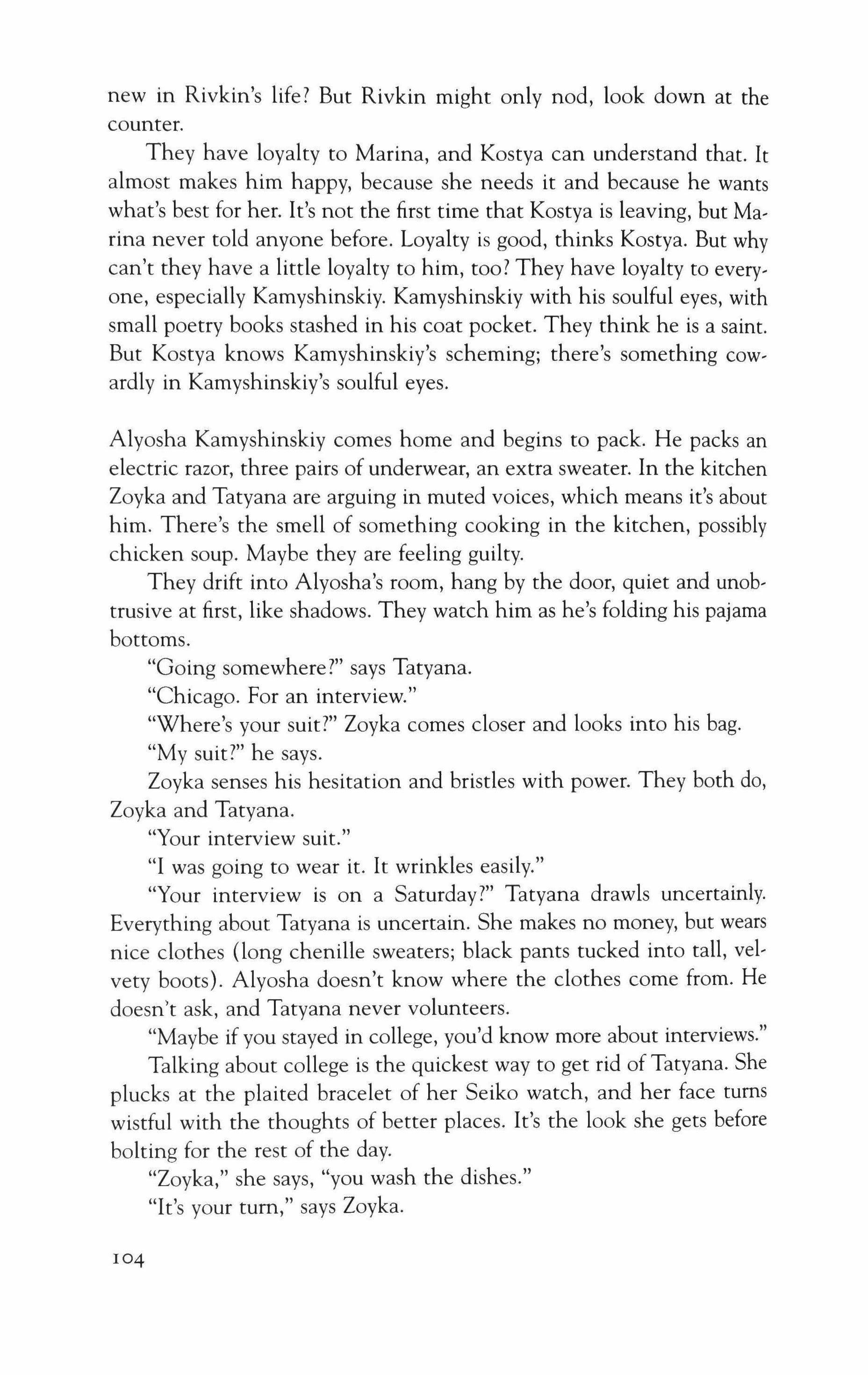
new in Rivkin's life? But Rivkin might only nod, look down at the counter.
They have loyalty to Marina, and Kostya can understand that. It almost makes him happy, because she needs it and because he wants what's best for her. It's not the first time that Kostya is leaving, but Marina never told anyone before. Loyalty is good, thinks Kostya. But why can't they have a little loyalty to him, too? They have loyalty to everyone, especially Kamyshinskiy. Kamyshinskiy with his soulful eyes, with small poetry books stashed in his coat pocket. They think he is a saint. But Kostya knows Kamyshinskiy's scheming; there's something cowardly in Kamyshinskiy's soulful eyes.
Alyosha Kamyshinskiy comes home and begins to pack. He packs an electric razor, three pairs of underwear, an extra sweater. In the kitchen Zoyka and Tatyana are arguing in muted voices, which means it's about him. There's the smell of something cooking in the kitchen, possibly chicken soup. Maybe they are feeling guilty.
They drift into Alvosha's room, hang by the door, quiet and unobtrusive at first, like shadows. They watch him as he's folding his pajama bottoms.
"Going somewhere?" says Tatyana.
"Chicago. For an interview."
"Where's your suit?" Zoyka comes closer and looks into his bag.
"My suit?" he says.
Zoyka senses his hesitation and bristles with power. They both do, Zoyka and Tatyana.
"Your interview suit."
"I was going to wear it. It wrinkles easily."
"Your interview is on a Saturday?" Tatyana drawls uncertainly. Everything about Tatyana is uncertain. She makes no money, but wears nice clothes (long chenille sweaters; black pants tucked into tall, velvety boots). Alyosha doesn't know where the clothes come from. He doesn't ask, and Tatyana never volunteers.
"Maybe if you stayed in college, you'd know more about interviews."
Talking about college is the quickest way to get rid of Tatyana. She plucks at the plaited bracelet of her Seiko watch, and her face turns wistful with the thoughts of better places. It's the look she gets before bolting for the rest of the day.
"Zoyka," she says, "you wash the dishes."
"It's your tum," says Zoyka.
104
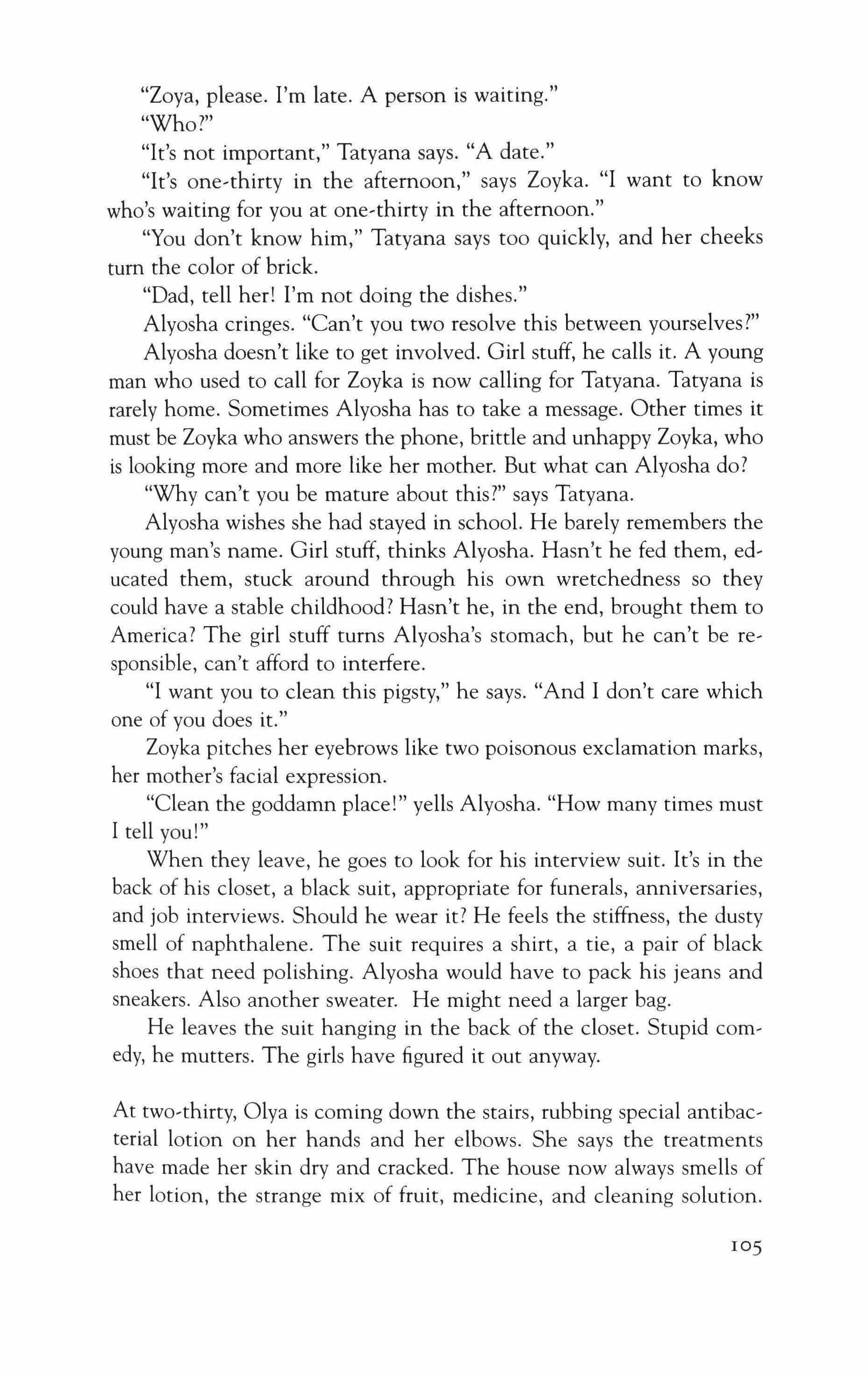
"Zoya, please. I'm late. A person is waiting." "Who?"
"It's not important," Tatyana says. "A date."
"It's one-thirty in the afternoon," says Zoyka. "I want to know who's waiting for you at one-thirty in the afternoon."
"You don't know him," Tatyana says too quickly, and her cheeks tum the color of brick.
"Dad, tell her! I'm not doing the dishes."
Alyosha cringes. "Can't you two resolve this between yourselves?"
Alyosha doesn't like to get involved. Girl stuff, he calls it. A young man who used to call for Zoyka is now calling for Tatyana. Tatyana is rarely home. Sometimes Alyosha has to take a message. Other times it must be Zoyka who answers the phone, brittle and unhappy Zoyka, who is looking more and more like her mother. But what can Alyosha do?
"Why can't you be mature about this?" says Tatyana.
Alyosha wishes she had stayed in school. He barely remembers the young man's name. Girl stuff, thinks Alyosha. Hasn't he fed them, educated them, stuck around through his own wretchedness so they could have a stable childhood? Hasn't he, in the end, brought them to America? The girl stuff turns Alyosha's stomach, but he can't be responsible, can't afford to interfere.
"I want you to clean this pigsty," he says. "And I don't care which one of you does it."
Zoyka pitches her eyebrows like two poisonous exclamation marks, her mother's facial expression.
"Clean the goddamn place!" yells Alyosha. "How many times must I tell you!"
When they leave, he goes to look for his interview suit. It's in the back of his closet, a black suit, appropriate for funerals, anniversaries, and job interviews. Should he wear it? He feels the stiffness, the dusty smell of naphthalene. The suit requires a shirt, a tie, a pair of black shoes that need polishing. Alyosha would have to pack his jeans and sneakers. Also another sweater. He might need a larger bag.
He leaves the suit hanging in the back of the closet. Stupid cornedy, he mutters. The girls have figured it out anyway.
At two-thirty, Olya is coming down the stairs, rubbing special antibacterial lotion on her hands and her elbows. She says the treatments have made her skin dry and cracked. The house now always smells of her lotion, the strange mix of fruit, medicine, and cleaning solution.
105
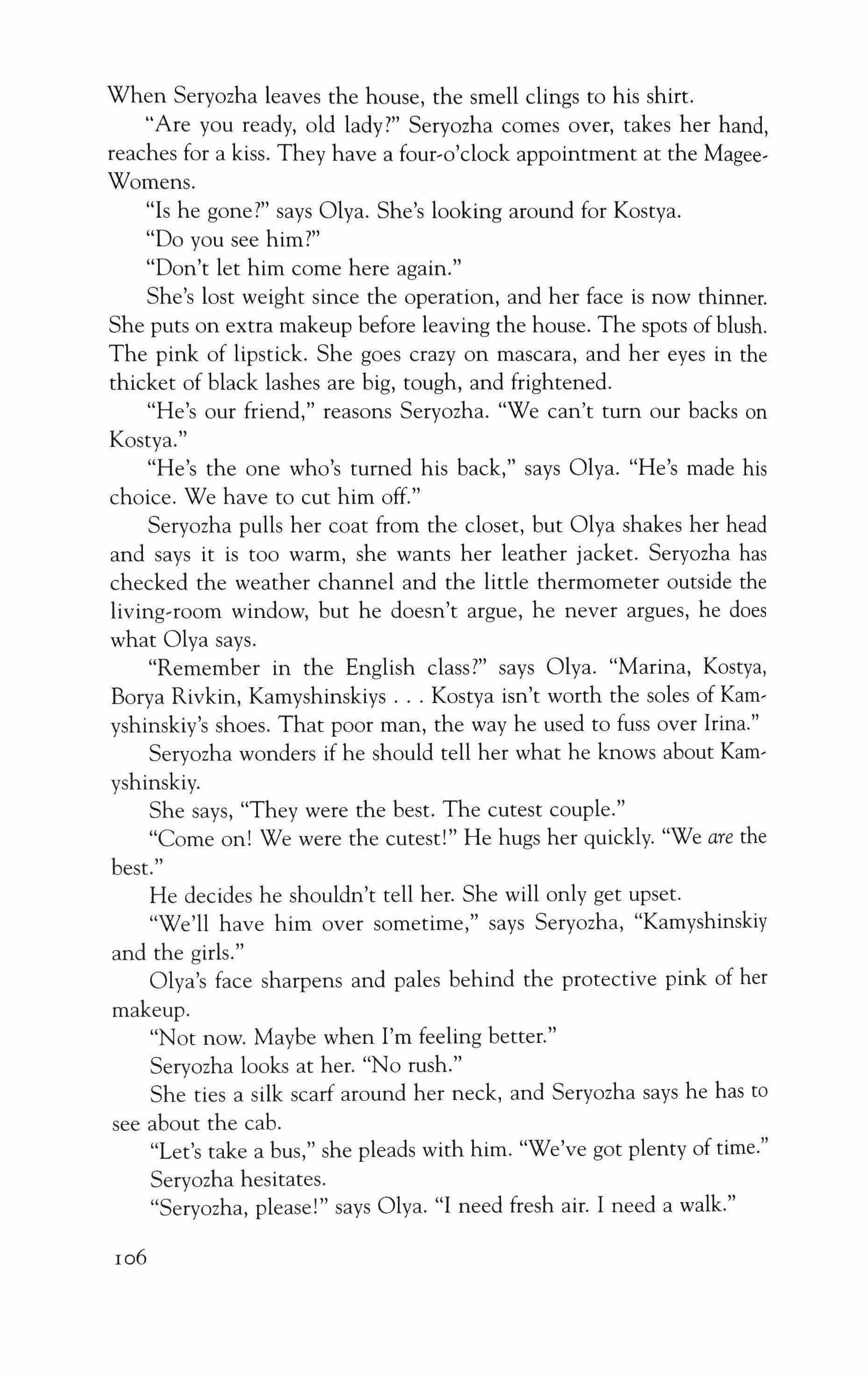
When Seryozha leaves the house, the smell clings to his shirt.
"Are you ready, old lady?" Seryozha comes over, takes her hand, reaches for a kiss. They have a four-o'clock appointment at the MageeWomens.
"Is he gone?" says Olya. She's looking around for Kostya.
"Do you see him?"
"Don't let him come here again."
She's lost weight since the operation, and her face is now thinner. She puts on extra makeup before leaving the house. The spots of blush. The pink of lipstick. She goes crazy on mascara, and her eyes in the thicket of black lashes are big, tough, and frightened.
"He's our friend," reasons Seryozha. "We can't turn our backs on Kostya."
"He's the one who's turned his back," says Olya. "He's made his choice. We have to cut him off."
Seryozha pulls her coat from the closet, but Olya shakes her head and says it is too warm, she wants her leather jacket. Seryozha has checked the weather channel and the little thermometer outside the living-room window, but he doesn't argue, he never argues, he does what Olya says.
"Remember in the English class?" says Olya. "Marina, Kostya, Borya Rivkin, Kamyshinskiys Kostya isn't worth the soles of Kamyshinskiy's shoes. That poor man, the way he used to fuss over Irina."
Seryozha wonders if he should tell her what he knows about Kamyshinskiy.
She says, "They were the best. The cutest couple."
"Come on! We were the cutest!" He hugs her quickly. "We are the best."
He decides he shouldn't tell her. She will only get upset.
"We'll have him over sometime," says Seryozha, "Kamyshinskiy and the girls."
Olya's face sharpens and pales behind the protective pink of her makeup.
"Not now. Maybe when I'm feeling better."
Seryozha looks at her. "No rush."
She ties a silk scarf around her neck, and Seryozha says he has to see about the cab.
"Let's take a bus," she pleads with him. "We've got plenty of time."
Seryozha hesitates.
"Seryozha, please!" says Olya. "I need fresh air. I need a walk."
106
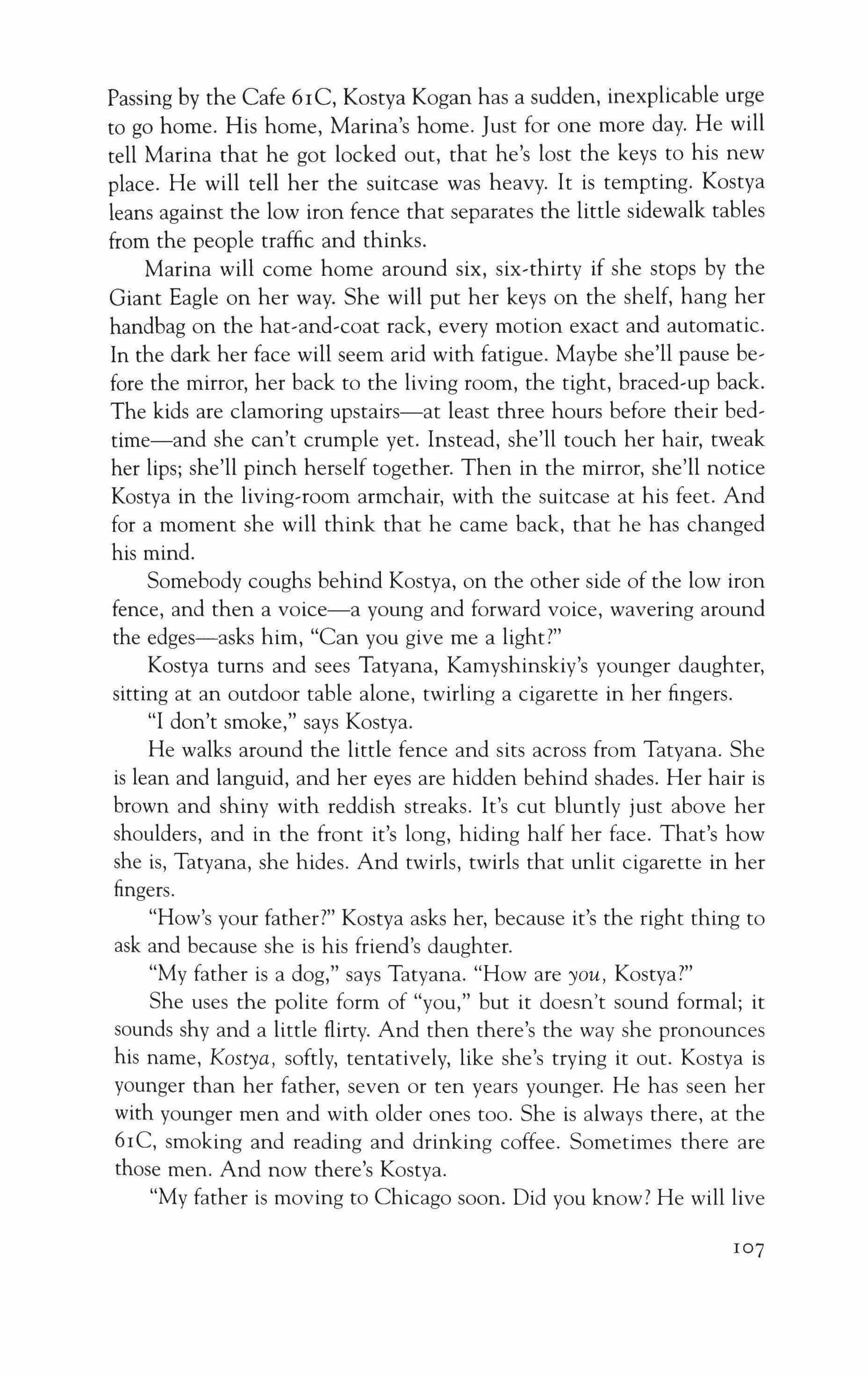
Passing by the Cafe 6IC, Kostya Kogan has a sudden, inexplicable urge to go home. His home, Marina's home. Just for one more day. He will tell Marina that he got locked out, that he's lost the keys to his new place. He will tell her the suitcase was heavy. It is tempting. Kostya leans against the low iron fence that separates the little sidewalk tables from the people traffic and thinks.
Marina will come home around six, six-thirty if she stops by the Giant Eagle on her way. She will put her keys on the shelf, hang her handbag on the hat-and-coat rack, every motion exact and automatic. In the dark her face will seem arid with fatigue. Maybe she'll pause be' fore the mirror, her back to the living room, the tight, braced-up back. The kids are clamoring upstairs-at least three hours before their bed, time-and she can't crumple yet. Instead, she'll touch her hair, tweak her lips; she'll pinch herself together. Then in the mirror, she'll notice Kostya in the living,room armchair, with the suitcase at his feet. And for a moment she will think that he came back, that he has changed his mind.
Somebody coughs behind Kostya, on the other side of the low iron fence, and then a voice-a young and forward voice, wavering around the edges-asks him, "Can you give me a light?"
Kostya turns and sees Tatyana, Kamyshinskiy's younger daughter, sitting at an outdoor table alone, twirling a cigarette in her fingers.
"I don't smoke," says Kostya.
He walks around the little fence and sits across from Tatyana. She is lean and languid, and her eyes are hidden behind shades. Her hair is brown and shiny with reddish streaks. It's cut bluntly just above her shoulders, and in the front it's long, hiding half her face. That's how she is, Tatyana, she hides. And twirls, twirls that unlit cigarette in her fingers.
"How's your father?" Kostya asks her, because it's the right thing to ask and because she is his friend's daughter.
"My father is a dog," says Tatyana. "How are you, Kostya?"
She uses the polite form of "you," but it doesn't sound formal; it sounds shy and a little flirty. And then there's the way she pronounces his name, Kostya, softly, tentatively, like she's trying it out. Kostya is younger than her father, seven or ten years younger. He has seen her with younger men and with older ones too. She is always there, at the 61C, smoking and reading and drinking coffee. Sometimes there are those men. And now there's Kostya.
"My father is moving to Chicago soon. Did you know? He will live
107
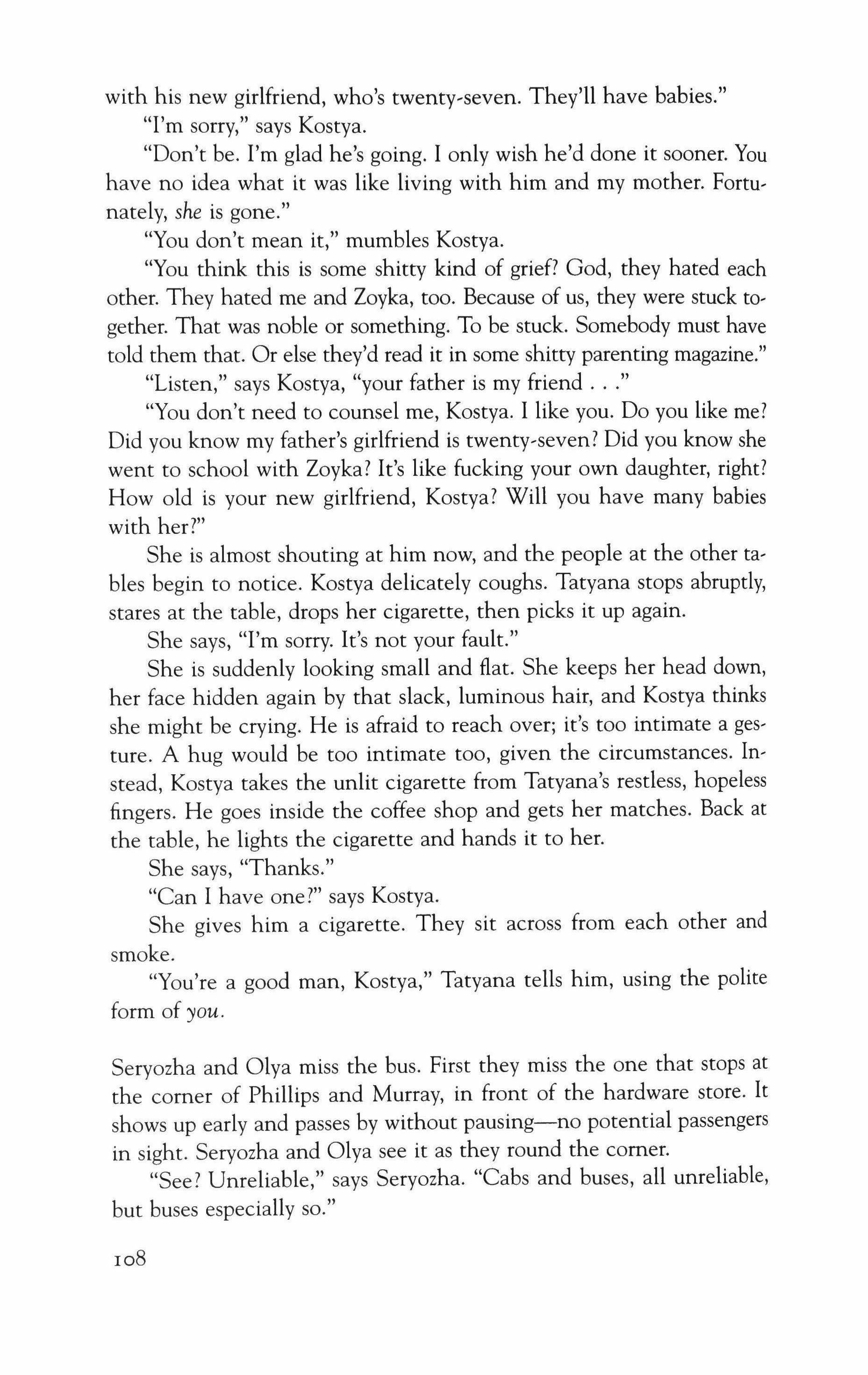
with his new girlfriend, who's twenty-seven. They'll have babies."
"I'm sorry," says Kostya.
"Don't be. I'm glad he's going. I only wish he'd done it sooner. You have no idea what it was like living with him and my mother. Fortunately, she is gone."
"You don't mean it," mumbles Kostya.
"You think this is some shitty kind of grief? God, they hated each other. They hated me and Zoyka, too. Because of us, they were stuck together. That was noble or something. To be stuck. Somebody must have told them that. Or else they'd read it in some shitty parenting magazine."
"Listen," says Kostya, "your father is my friend "
"You don't need to counsel me, Kostya. I like you. Do you like me? Did you know my father's girlfriend is twenty-seven? Did you know she went to school with Zoyka? It's like fucking your own daughter, right? How old is your new girlfriend, Kostya? Will you have many babies with her?"
She is almost shouting at him now, and the people at the other tables begin to notice. Kostya delicately coughs. Tatyana stops abruptly, stares at the table, drops her cigarette, then picks it up again.
She says, "I'm sorry. It's not your fault."
She is suddenly looking small and flat. She keeps her head down, her face hidden again by that slack, luminous hair, and Kostya thinks she might be crying. He is afraid to reach over; it's too intimate a gesture. A hug would be too intimate too, given the circumstances. Instead, Kostya takes the unlit cigarette from Tatyana's restless, hopeless fingers. He goes inside the coffee shop and gets her matches. Back at the table, he lights the cigarette and hands it to her.
She says, "Thanks."
"Can I have one?" says Kostya.
She gives him a cigarette. They sit across from each other and smoke.
"You're a good man, Kostya," Tatyana tells him, using the polite form of you.
Seryozha and Olya miss the bus. First they miss the one that stops at the corner of Phillips and Murray, in front of the hardware store. It shows up early and passes by without pausing-no potential passengers in sight. Seryozha and Olya see it as they round the corner.
"See? Unreliable," says Seryozha. "Cabs and buses, all unreliable, but buses especially so."
I08
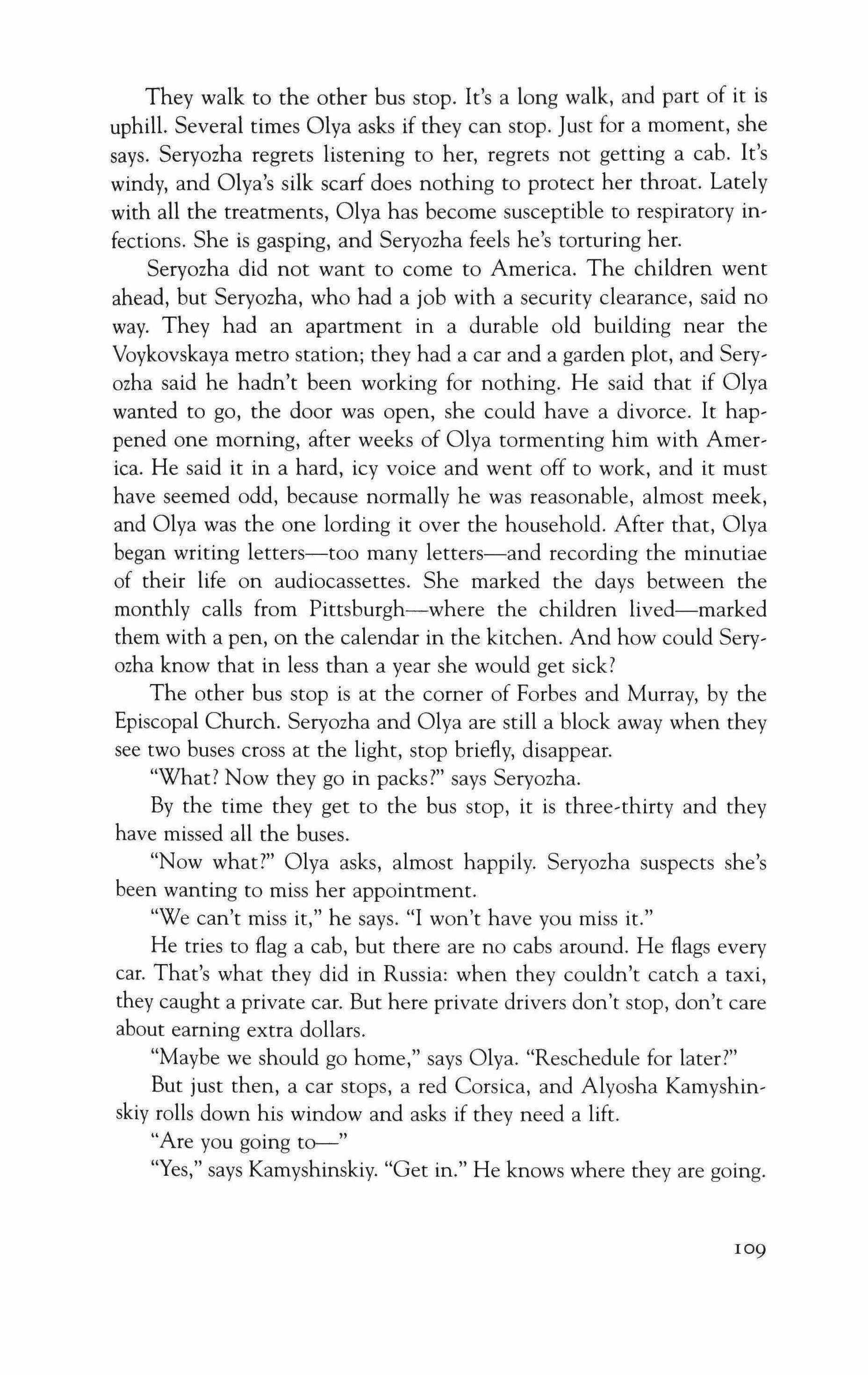
They walk to the other bus stop. It's a long walk, and part of it is uphill. Several times Olya asks if they can stop. Just for a moment, she says. Seryozha regrets listening to her, regrets not getting a cab. It's windy, and Olya's silk scarf does nothing to protect her throat. Lately with all the treatments, Olya has become susceptible to respiratory infections. She is gasping, and Seryozha feels he's torturing her.
Seryozha did not want to come to America. The children went ahead, but Seryozha, who had a job with a security clearance, said no way. They had an apartment in a durable old building near the Voykovskaya metro station; they had a car and a garden plot, and Seryozha said he hadn't been working for nothing. He said that if Olya wanted to go, the door was open, she could have a divorce. It happened one morning, after weeks of Olya tormenting him with America. He said it in a hard, icy voice and went off to work, and it must have seemed odd, because normally he was reasonable, almost meek, and Olya was the one lording it over the household. After that, Olya began writing letters-too many letters-and recording the minutiae of their life on audiocassettes. She marked the days between the monthly calls from Pittsburgh-where the children lived-marked them with a pen, on the calendar in the kitchen. And how could Seryozha know that in less than a year she would get sick?
The other bus stop is at the corner of Forbes and Murray, by the Episcopal Church. Seryozha and Olya are still a block away when they see two buses cross at the light, stop briefly, disappear.
"What? Now they go in packs?" says Seryozha.
By the time they get to the bus stop, it is three-thirty and they have missed all the buses.
"Now what?" Olya asks, almost happily. Seryozha suspects she's been wanting to miss her appointment.
"We can't miss it," he says. "I won't have you miss it."
He tries to flag a cab, but there are no cabs around. He flags every car. That's what they did in Russia: when they couldn't catch a taxi, they caught a private car. But here private drivers don't stop, don't care about earning extra dollars.
"Maybe we should go home," says Olya. "Reschedule for later?"
But just then, a car stops, a red Corsica, and Alyosha Kamyshinskiy rolls down his window and asks if they need a lift.
"Are you going to-"
"Yes," says Kamyshinskiy. "Get in." He knows where they are going.
109
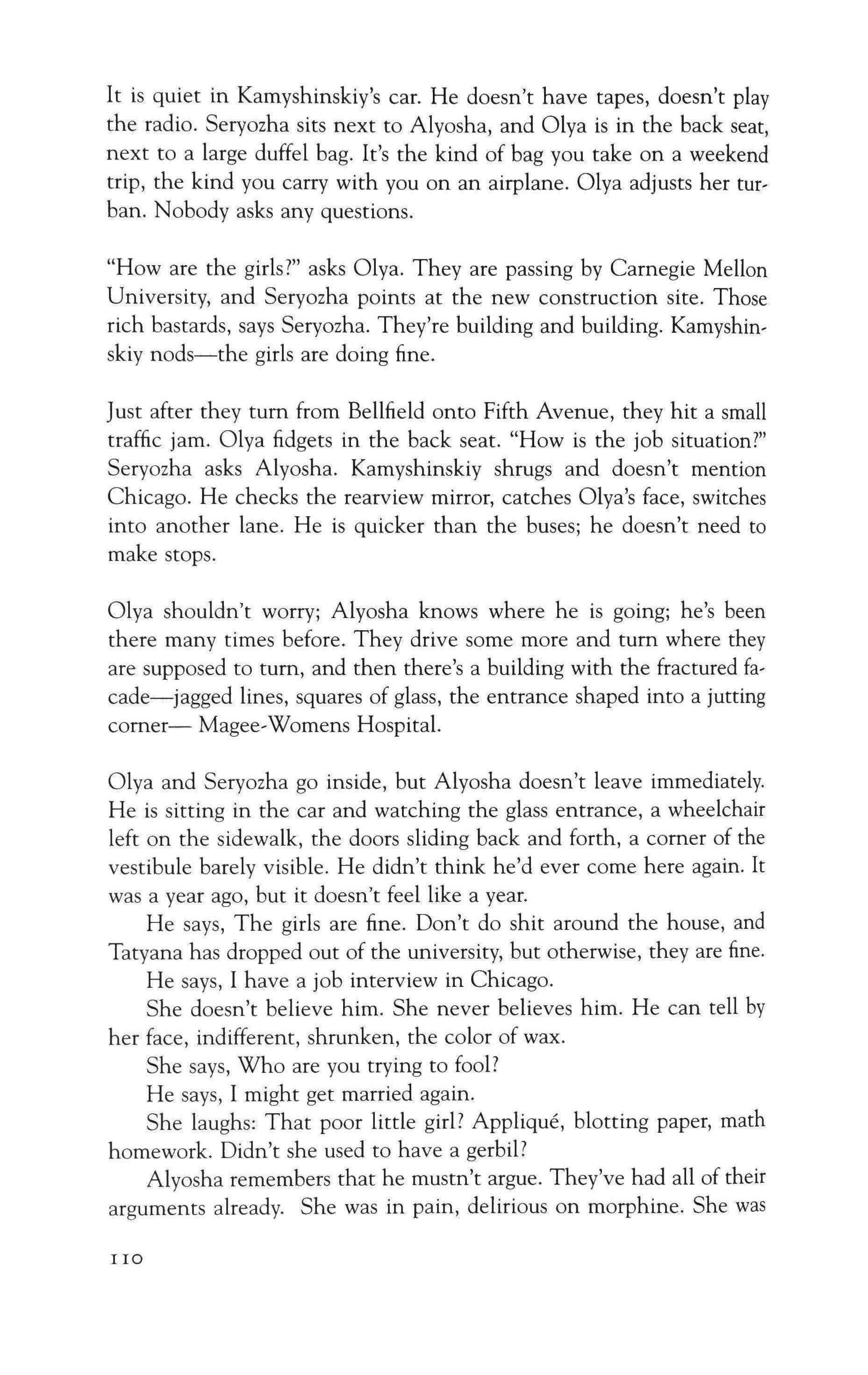
It is quiet in Kamyshinskiy's car. He doesn't have tapes, doesn't play the radio. Seryozha sits next to Alyosha, and Olya is in the back seat, next to a large duffel bag. It's the kind of bag you take on a weekend trip, the kind you carry with you on an airplane. Olya adjusts her turban. Nobody asks any questions.
"How are the girls?" asks Olya. They are passing by Carnegie Mellon University, and Seryozha points at the new construction site. Those rich bastards, says Seryozha. They're building and building. Kamyshinskiy nods-the girls are doing fine.
Just after they turn from Bellfield onto Fifth Avenue, they hit a small traffic jam. Olya fidgets in the back seat. "How is the job situation?" Seryozha asks Alyosha. Kamyshinskiy shrugs and doesn't mention Chicago. He checks the rearview mirror, catches Olya's face, switches into another lane. He is quicker than the buses; he doesn't need to make stops.
Olya shouldn't worry; Alyosha knows where he is going; he's been there many times before. They drive some more and turn where they are supposed to turn, and then there's a building with the fractured facade-jagged lines, squares of glass, the entrance shaped into a jutting corner- Magee-Womens Hospital.
Olya and Seryozha go inside, but Alyosha doesn't leave immediately. He is sitting in the car and watching the glass entrance, a wheelchair left on the sidewalk, the doors sliding back and forth, a corner of the vestibule barely visible. He didn't think he'd ever come here again. It was a year ago, but it doesn't feel like a year.
He says, The girls are fine. Don't do shit around the house, and Tatyana has dropped out of the university, but otherwise, they are fine.
He says, I have a job interview in Chicago.
She doesn't believe him. She never believes him. He can tell by her face, indifferent, shrunken, the color of wax.
She says, Who are you trying to fool?
He says, I might get married again.
She laughs: That poor little girl? Applique, blotting paper, math homework. Didn't she used to have a gerbil?
Alyosha remembers that he mustn't argue. They've had all of their arguments already. She was in pain, delirious on morphine. She was
110
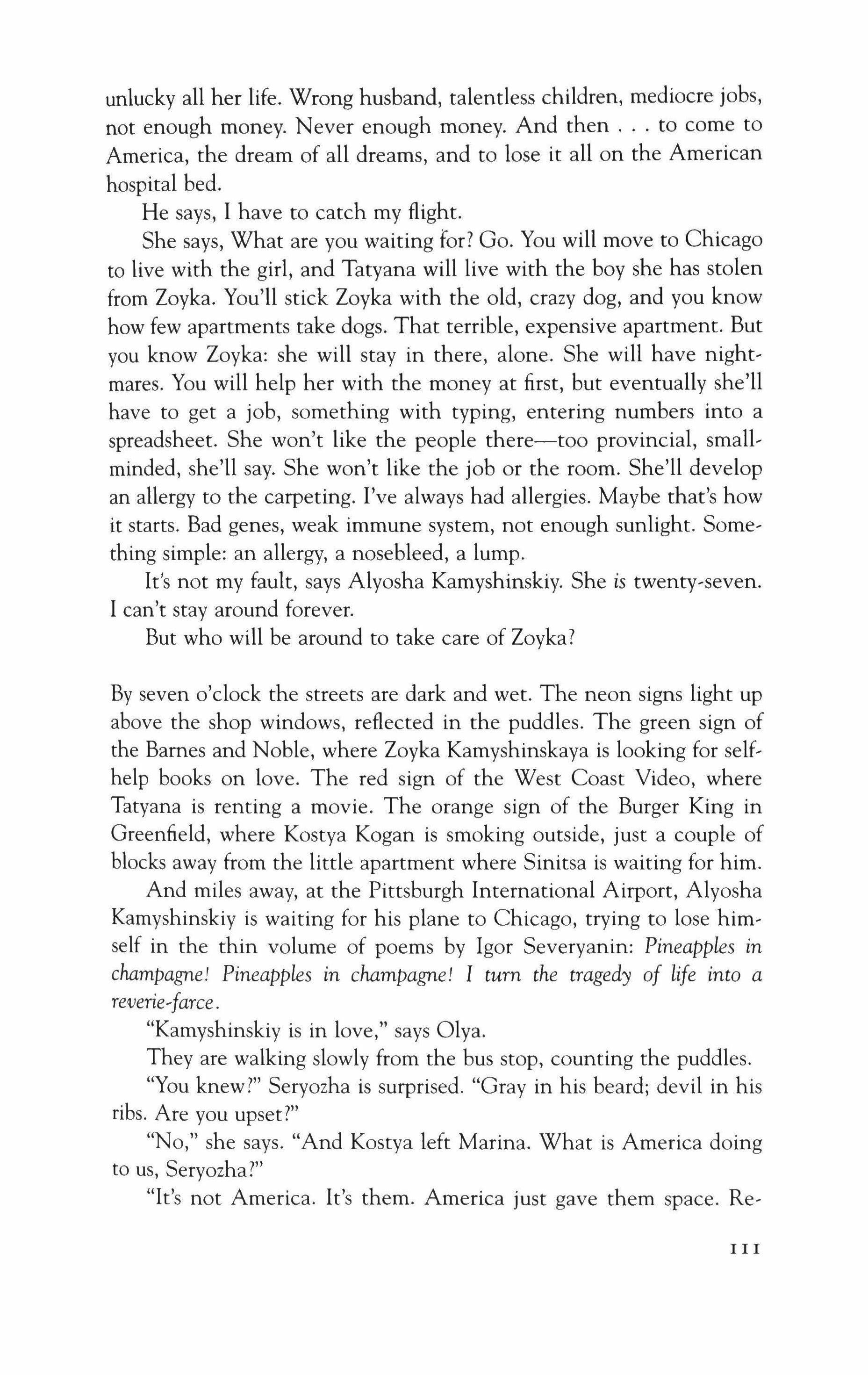
unlucky all her life. Wrong husband, talentless children, mediocre jobs, not enough money. Never enough money. And then to come to America, the dream of all dreams, and to lose it all on the American hospital bed.
He says, I have to catch my flight.
She says, What are you waiting for? Go. You will move to Chicago to live with the girl, and Tatyana will live with the boy she has stolen from Zoyka. You'll stick Zoyka with the old, crazy dog, and you know how few apartments take dogs. That terrible, expensive apartment. But you know Zoyka: she will stay in there, alone. She will have nightmares. You will help her with the money at first, but eventually she'll have to get a job, something with typing, entering numbers into a spreadsheet. She won't like the people there-too provincial, smallminded, she'll say. She won't like the job or the room. She'll develop an allergy to the carpeting. I've always had allergies. Maybe that's how it starts. Bad genes, weak immune system, not enough sunlight. Something simple: an allergy, a nosebleed, a lump.
It's not my fault, says Alyosha Kamyshinskiy. She is twenty-seven. I can't stay around forever.
But who will be around to take care of Zoyka?
By seven o'clock the streets are dark and wet. The neon signs light up above the shop windows, reflected in the puddles. The green sign of the Barnes and Noble, where Zoyka Kamyshinskaya is looking for selfhelp books on love. The red sign of the West Coast Video, where Tatyana is renting a movie. The orange sign of the Burger King in Greenfield, where Kostya Kogan is smoking outside, just a couple of blocks away from the little apartment where Sinitsa is waiting for him.
And miles away, at the Pittsburgh International Airport, Alyosha Kamyshinskiy is waiting for his plane to Chicago, trying to lose himself in the thin volume of poems by Igor Severyanin: Pineapples in champagne! Pineapples in champagne! I turn the tragedy of life into a reverie-farce.
"Kamyshinskiy is in love," says Olya. They are walking slowly from the bus stop, counting the puddles.
"You knew?" Seryozha is surprised. "Gray in his beard; devil in his ribs. Are you upset?"
"No," she says. "And Kostya left Marina. What is America doing to us, Seryozha?"
"It's not America. It's them. America just gave them space. ReIII
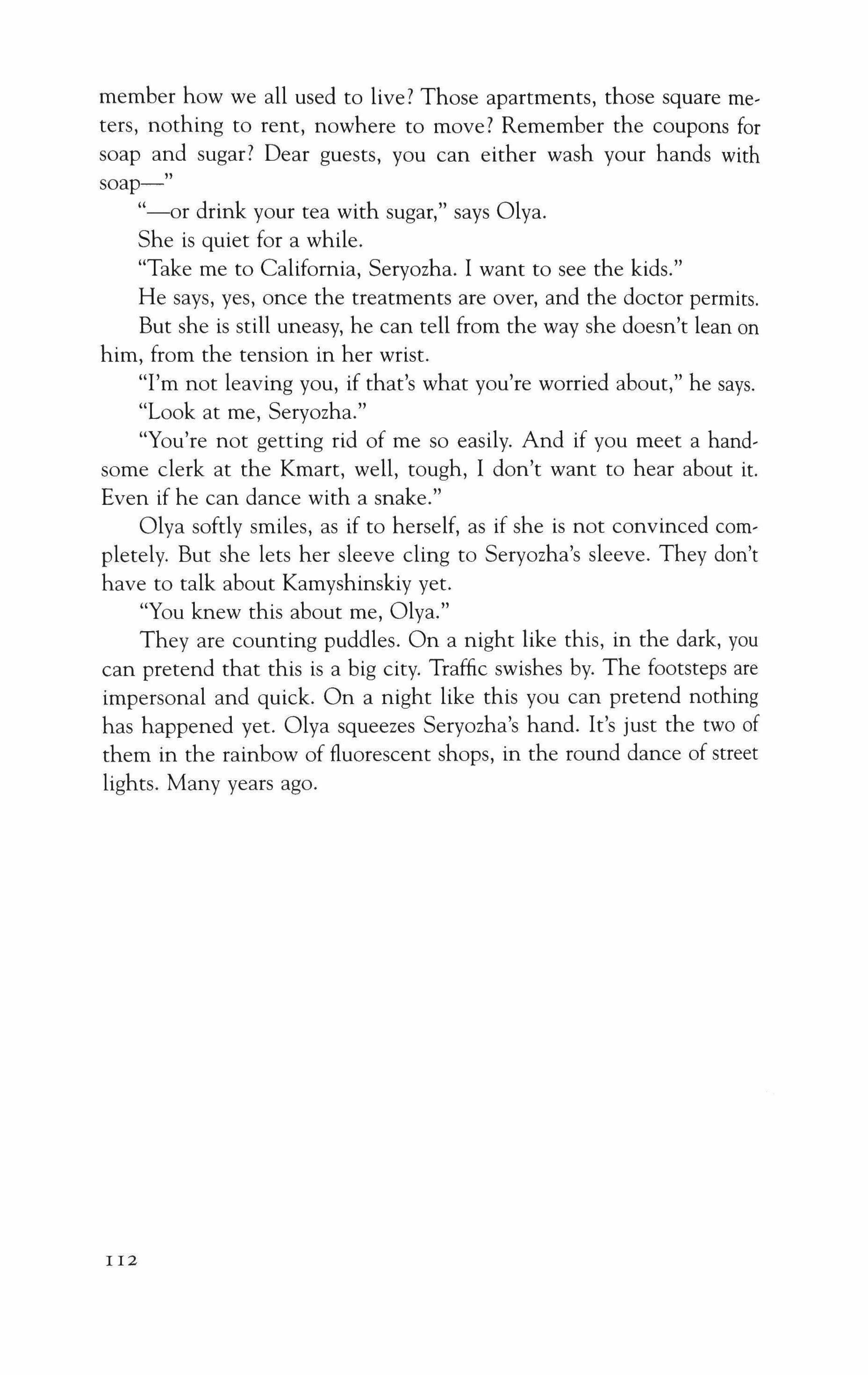
member how we all used to live? Those apartments, those square meters, nothing to rent, nowhere to move? Remember the coupons for soap and sugar? Dear guests, you can either wash your hands with soap-"
"-or drink your tea with sugar," says Olya. She is quiet for a while.
"Take me to California, Seryozha. I want to see the kids."
He says, yes, once the treatments are over, and the doctor permits. But she is still uneasy, he can tell from the way she doesn't lean on him, from the tension in her wrist.
"I'm not leaving you, if that's what you're worried about," he says.
"Look at me, Seryozha."
"You're not getting rid of me so easily. And if you meet a handsome clerk at the Kmart, well, tough, I don't want to hear about it. Even if he can dance with a snake."
Olya softly smiles, as if to herself, as if she is not convinced completely. But she lets her sleeve cling to Seryozha's sleeve. They don't have to talk about Kamyshinskiy yet.
"You knew this about me, Olya."
They are counting puddles. On a night like this, in the dark, you can pretend that this is a big city. Traffic swishes by. The footsteps are impersonal and quick. On a night like this you can pretend nothing has happened yet. Olya squeezes Seryozha's hand. It's just the two of them in the rainbow of fluorescent shops, in the round dance of street lights. Many years ago.
112
Adam Zagajewski
Translated from the Polish by
Clare Cavanagh
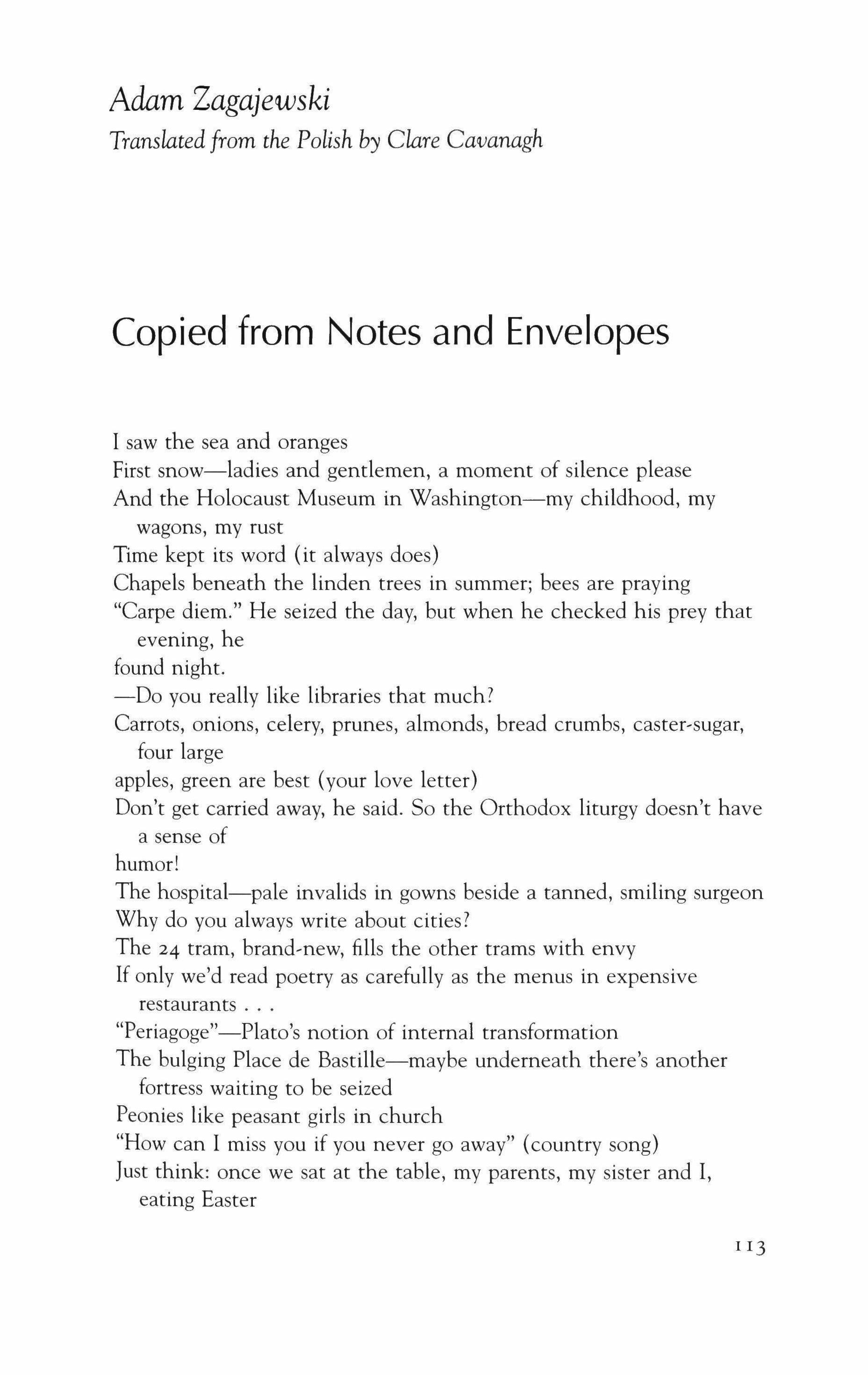
Copied from Notes and Envelopes
I saw the sea and oranges
First snow-ladies and gentlemen, a moment of silence please
And the Holocaust Museum in Washington-my childhood, my wagons, my rust
Time kept its word (it always does)
Chapels beneath the linden trees in summer; bees are praying "Carpe diem." He seized the day, but when he checked his prey that evening, he found night.
-Do you really like libraries that much?
Carrots, onions, celery, prunes, almonds, bread crumbs, caster-sugar, four large apples, green are best (your love letter)
Don't get carried away, he said. So the Orthodox liturgy doesn't have a sense of humor!
The hospital-pale invalids in gowns beside a tanned, smiling surgeon
Why do you always write about cities?
The 24 tram, brand-new, fills the other trams with envy
If only we'd read poetry as carefully as the menus in expensive restaurants
"Periagoge"-Plato's notion of internal transformation
The bulging Place de Bastille-maybe underneath there's another fortress waiting to be seized
Peonies like peasant girls in church
"How can I miss you if you never go away" (country song)
Just think: once we sat at the table, my parents, my sister and I, eating Easter
113
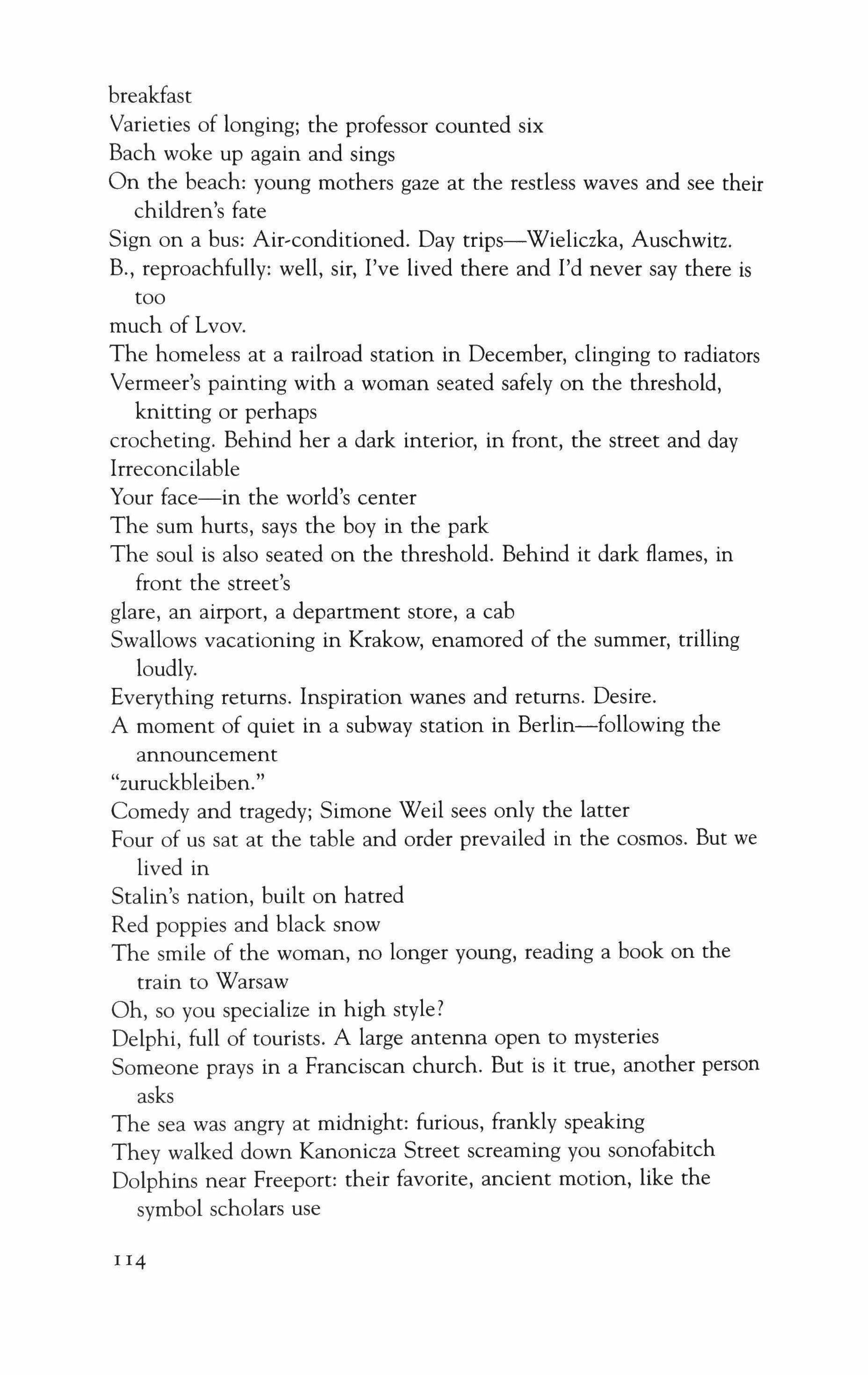
breakfast
Varieties of longing; the professor counted six Bach woke up again and sings
On the beach: young mothers gaze at the restless waves and see their children's fate
Sign on a bus: Air-conditioned. Day trips-Wieliczka, Auschwitz. B., reproachfully: well, sir, I've lived there and I'd never say there is too much of Lvov.
The homeless at a railroad station in December, clinging to radiators
Vermeer's painting with a woman seated safely on the threshold, knitting or perhaps crocheting. Behind her a dark interior, in front, the street and day Irreconcilable
Your face-in the world's center
The sum hurts, says the boy in the park
The soul is also seated on the threshold. Behind it dark flames, in front the street's glare, an airport, a department store, a cab Swallows vacationing in Krakow, enamored of the summer, trilling loudly.
Everything returns. Inspiration wanes and returns. Desire.
A moment of quiet in a subway station in Berlin-following the announcement "zuruckbleiben."
Comedy and tragedy; Simone Weil sees only the latter
Four of us sat at the table and order prevailed in the cosmos. But we lived in Stalin's nation, built on hatred Red poppies and black snow
The smile of the woman, no longer young, reading a book on the train to Warsaw
Oh, so you specialize in high style?
Delphi, full of tourists. A large antenna open to mysteries
Someone prays in a Franciscan church. But is it true, another person asks
The sea was angry at midnight: furious, frankly speaking
They walked down Kanonicza Street screaming you sonofabitch Dolphins near Freeport: their favorite, ancient motion, like the symbol scholars use
II4
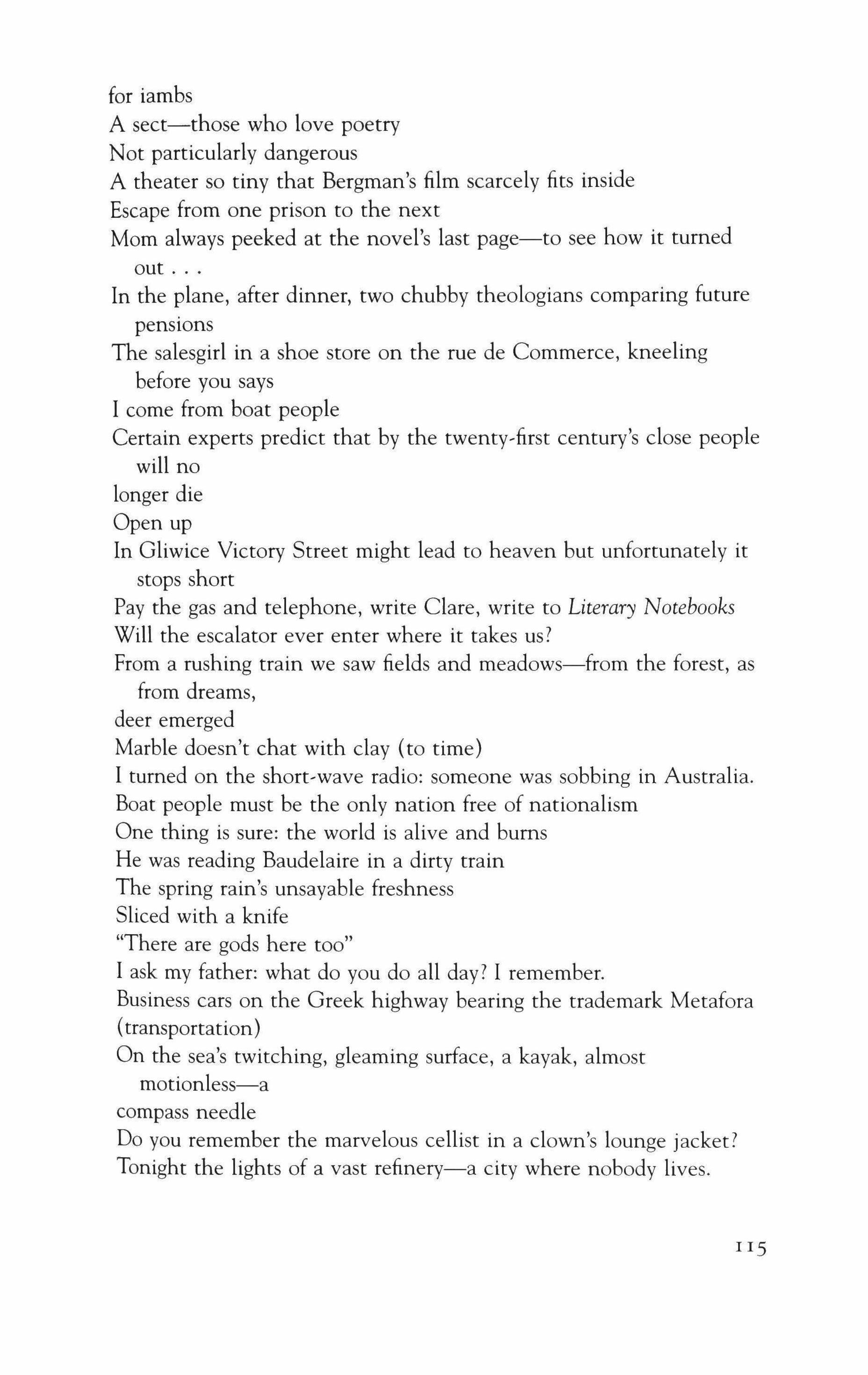
for iambs
A sect-those who love poetry
Not particularly dangerous
A theater so tiny that Bergman's film scarcely fits inside
Escape from one prison to the next
Mom always peeked at the novel's last page-to see how it turned out
In the plane, after dinner, two chubby theologians comparing future pensions
The salesgirl in a shoe store on the rue de Commerce, kneeling before you says I come from boat people
Certain experts predict that by the twenty-first century's close people will no longer die
Open up
In Gliwice Victory Street might lead to heaven but unfortunately it stops short
Pay the gas and telephone, write Clare, write to Literary Notebooks
Will the escalator ever enter where it takes us?
From a rushing train we saw fields and meadows-from the forest, as from dreams, deer emerged
Marble doesn't chat with clay (to time)
I turned on the short-wave radio: someone was sobbing in Australia. Boat people must be the only nation free of nationalism
One thing is sure: the world is alive and bums
He was reading Baudelaire in a dirty train
The spring rain's unsayable freshness
Sliced with a knife
"There are gods here too"
I ask my father: what do you do all day? I remember.
Business cars on the Greek highway bearing the trademark Metafora (transportation)
On the sea's twitching, gleaming surface, a kayak, almost motionless-a compass needle
Do you remember the marvelous cellist in a clown's lounge jacket?
Tonight the lights of a vast refinery-a city where nobody lives.
115
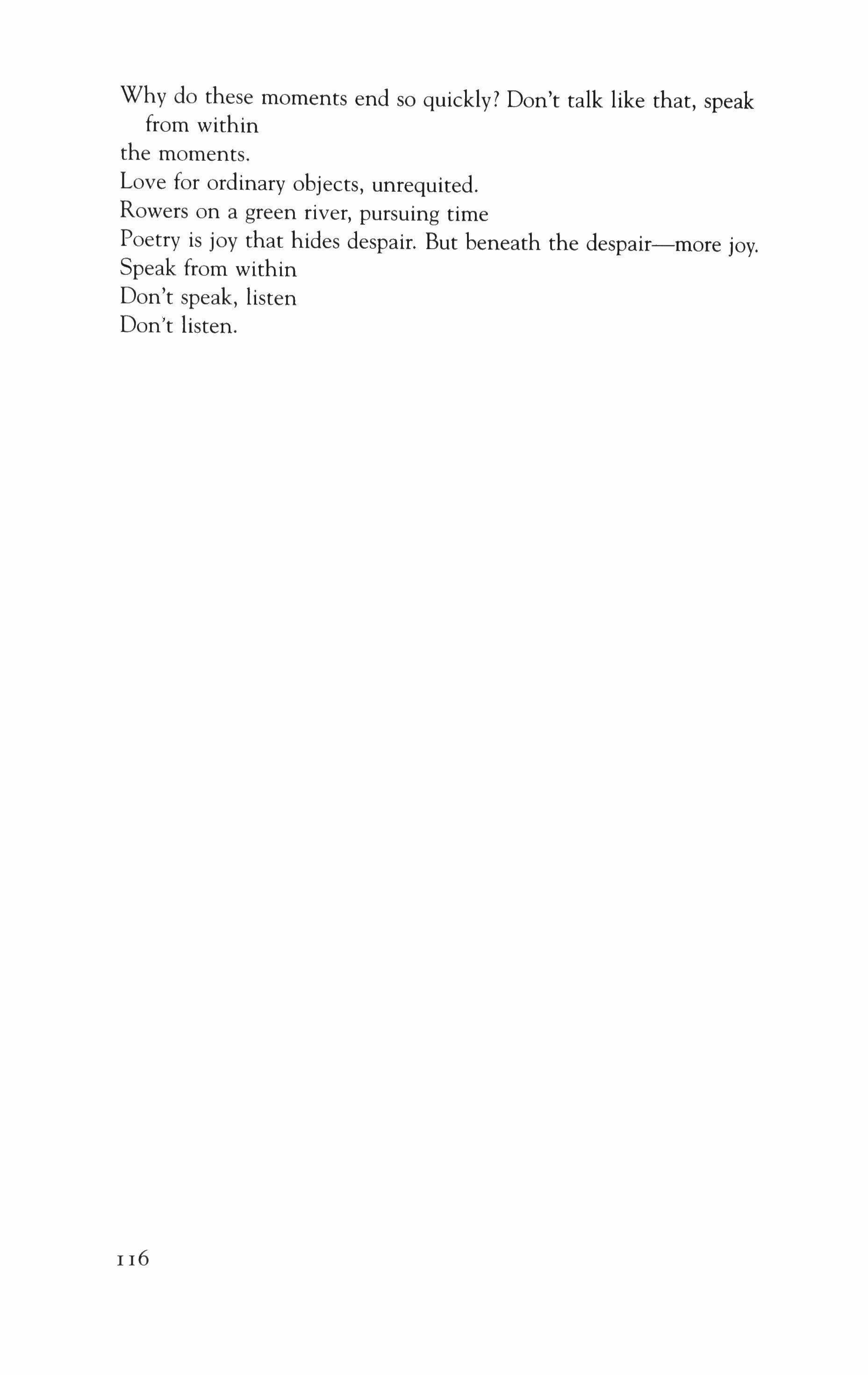
Why do these moments end so quickly? Don't talk like that, speak from within the moments.
Love for ordinary objects, unrequited. Rowers on a green river, pursuing time Poetry is joy that hides despair. But beneath the despair-more joy. Speak from within Don't speak, listen Don't listen.
II6
Wislawa Szymborska
Translated
from the Polish by
Clare Cavanagh and Stanislaw Baranczak
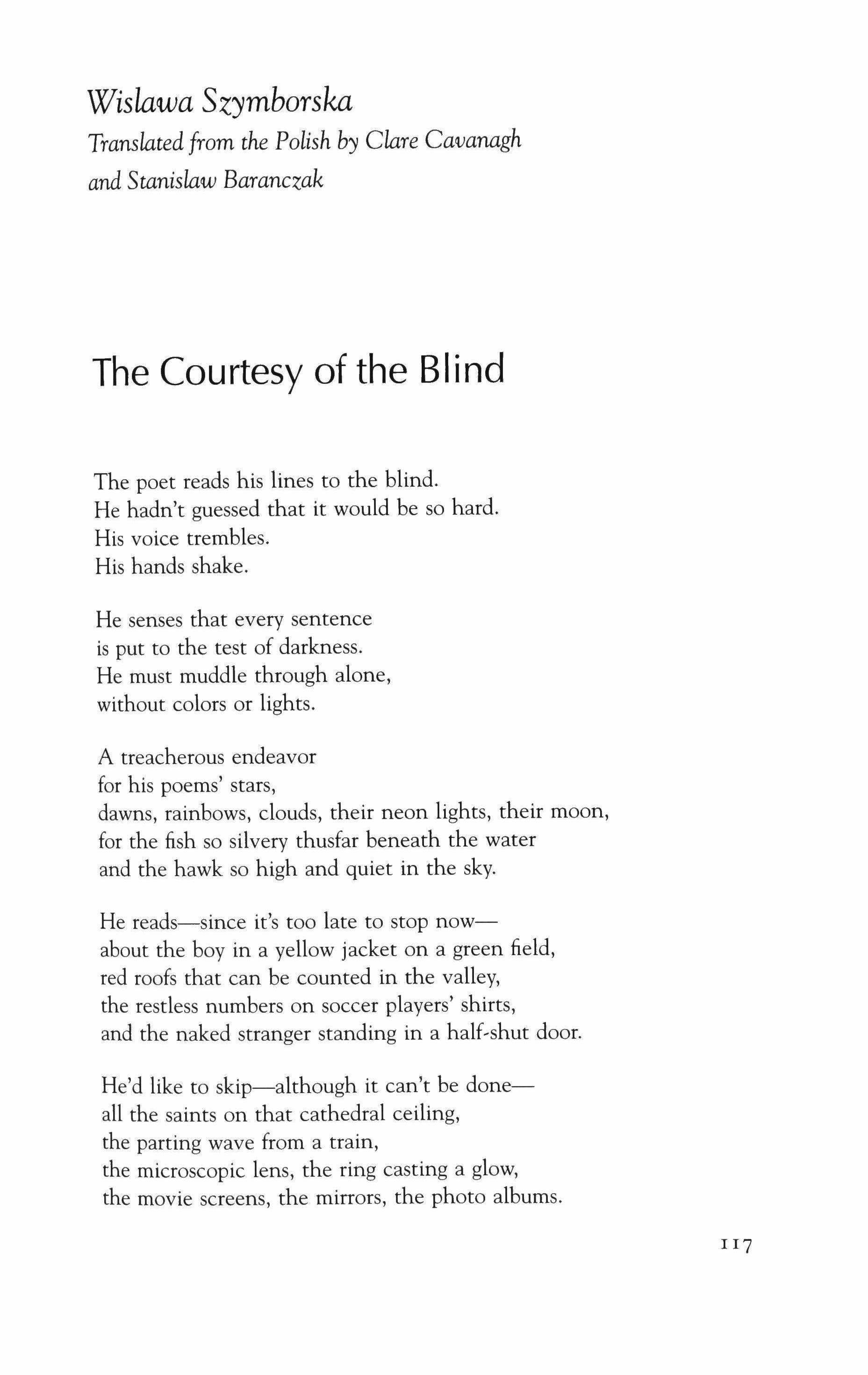
The Courtesy of the Blind
The poet reads his lines to the blind. He hadn't guessed that it would be so hard. His voice trembles. His hands shake.
He senses that every sentence is put to the test of darkness. He must muddle through alone, without colors or lights.
A treacherous endeavor for his poems' stars, dawns, rainbows, clouds, their neon lights, their moon, for the fish so silvery thusfar beneath the water and the hawk so high and quiet in the sky.
He reads-since it's too late to stop nowabout the boy in a yellow jacket on a green field, red roofs that can be counted in the valley, the restless numbers on soccer players' shirts, and the naked stranger standing in a half-shut door.
He'd like to skip-although it can't be doneall the saints on that cathedral ceiling, the parting wave from a train, the microscopic lens, the ring casting a glow, the movie screens, the mirrors, the photo albums.
117
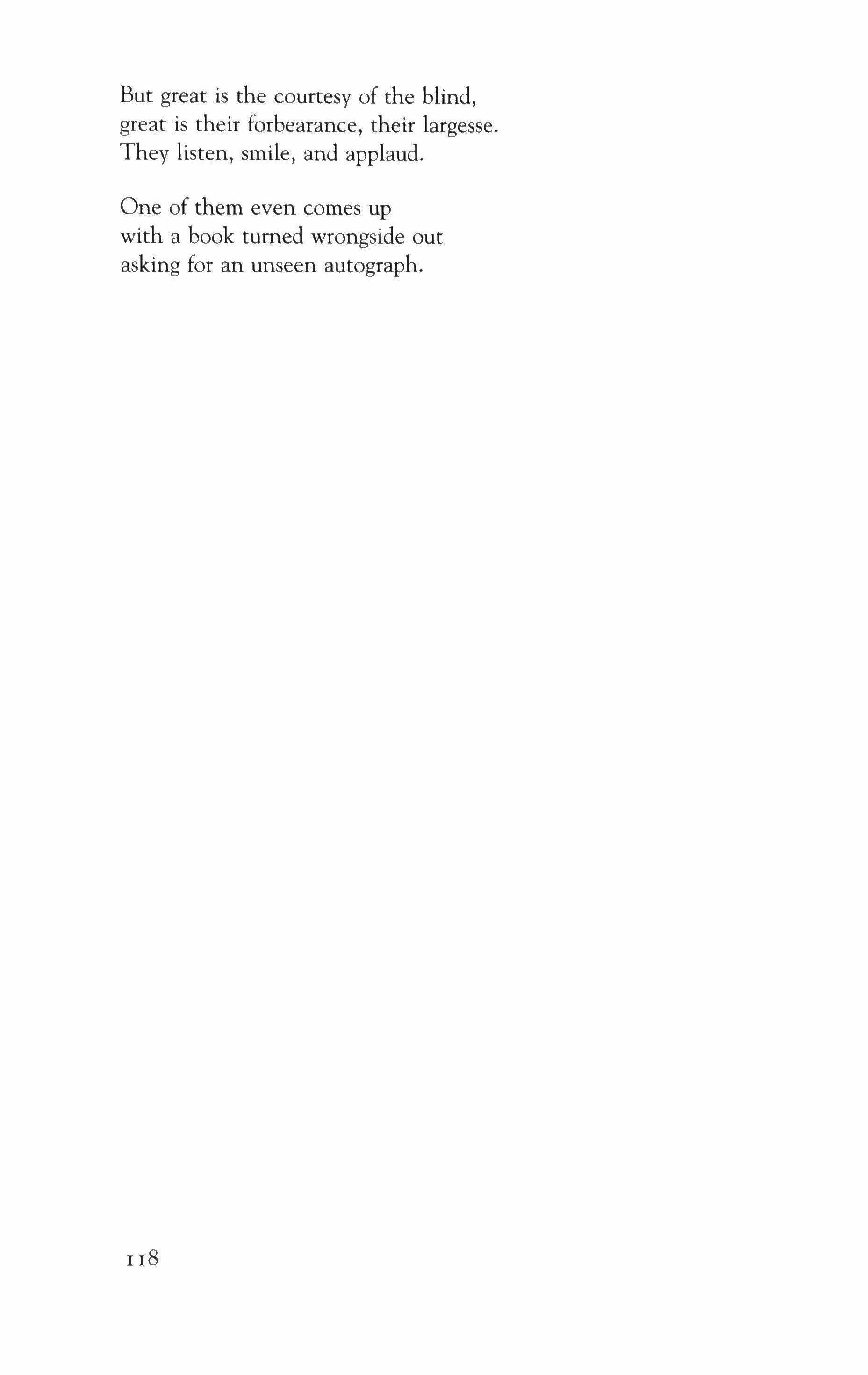
But great is the courtesy of the blind, great is their forbearance, their largesse. They listen, smile, and applaud.
One of them even comes up with a book turned wrongside out asking for an unseen autograph.
lIS
Puddles
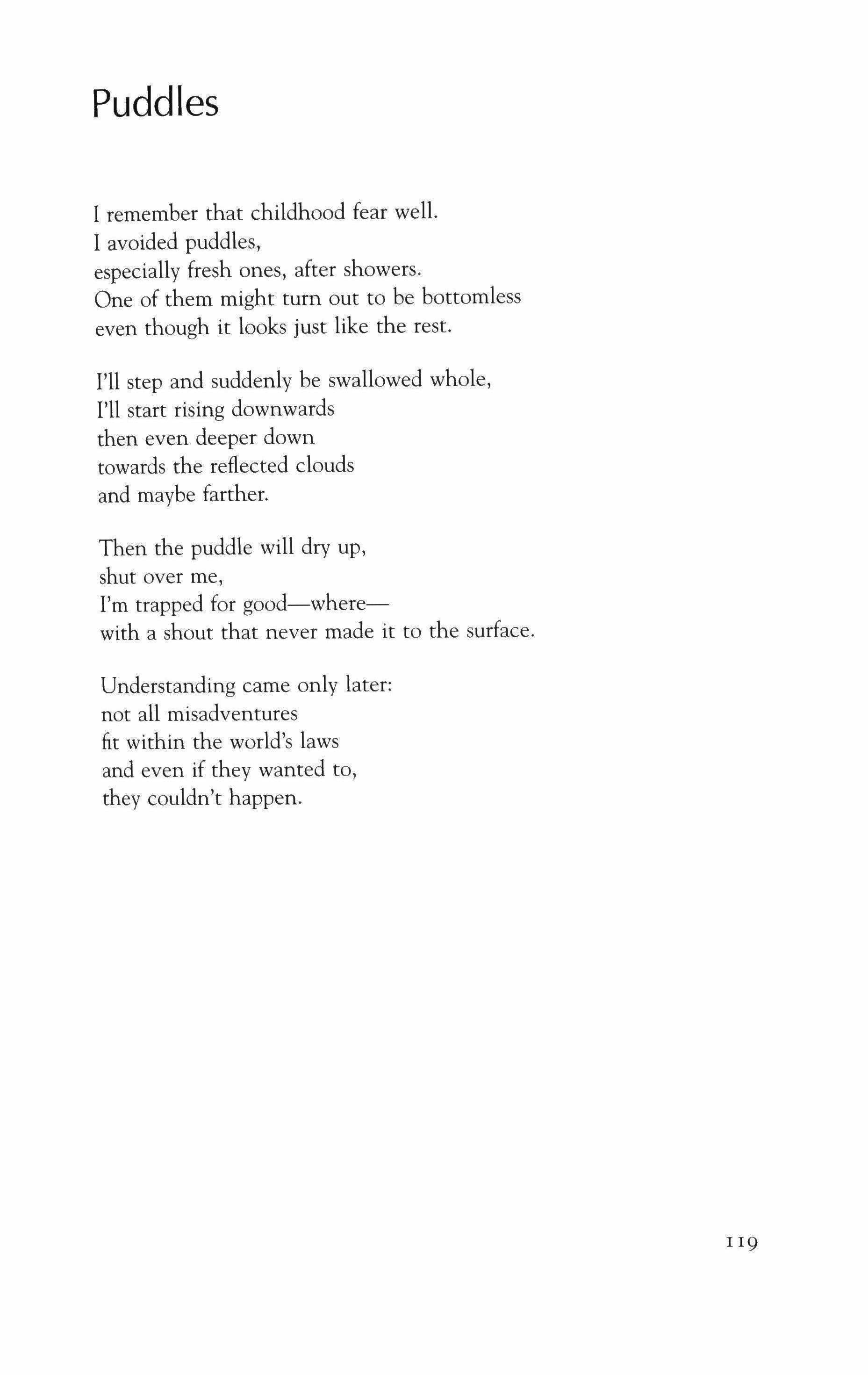
1 remember that childhood fear well. I avoided puddles, especially fresh ones, after showers. One of them might turn out to be bottomless even though it looks just like the rest.
I'll step and suddenly be swallowed whole, I'll start rising downwards then even deeper down towards the reflected clouds and maybe farther.
Then the puddle will dry up, shut over me,
I'm trapped for good-wherewith a shout that never made it to the surface.
Understanding came only later: not all misadventures fit within the world's laws and even if they wanted to, they couldn't happen.
119
Bronislaw Maj
Translated from the Polish by Clare
Cavanagh
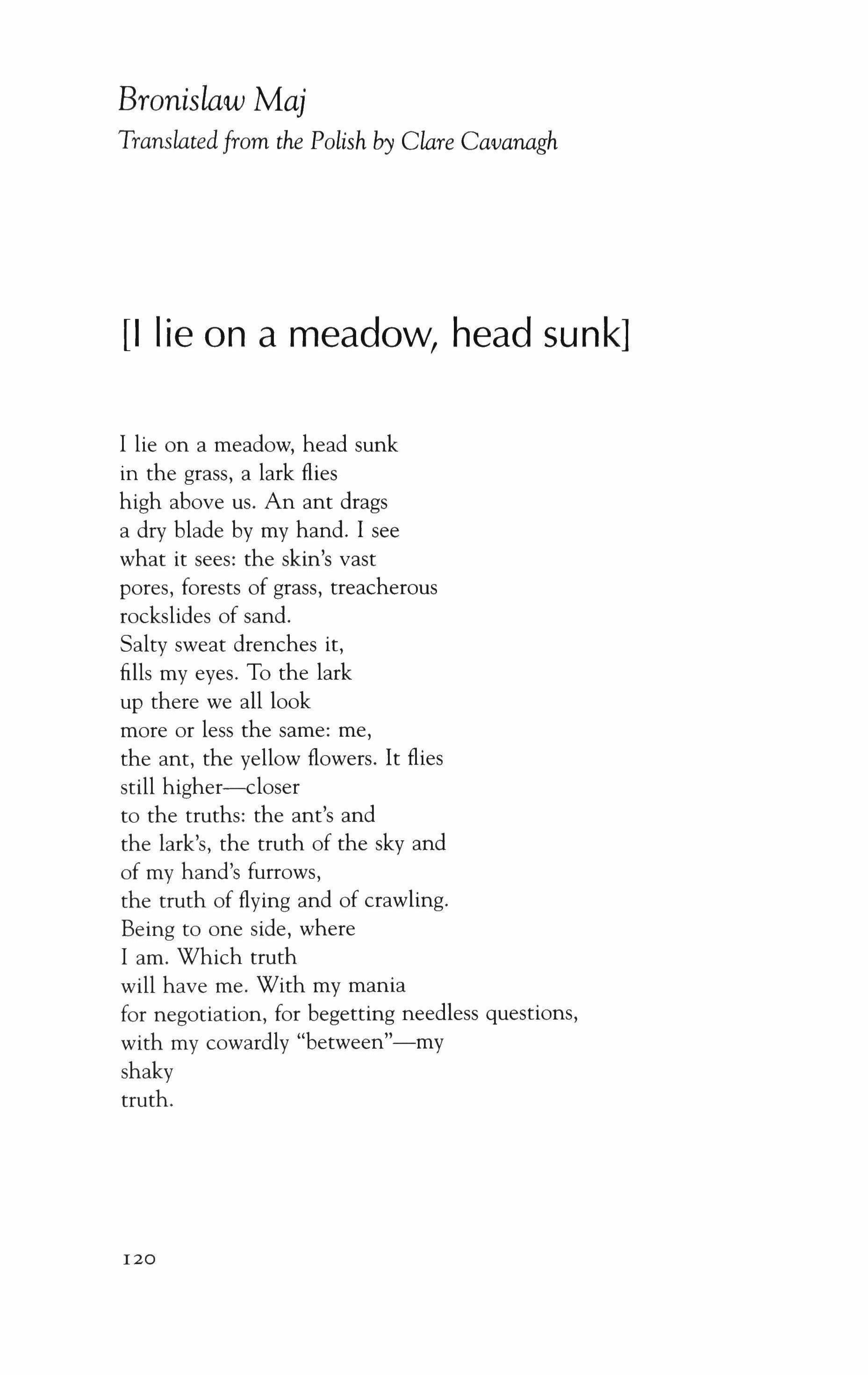
[I lie on a meadow, head sunk]
I lie on a meadow, head sunk in the grass, a lark flies high above us. An ant drags a dry blade by my hand. I see what it sees: the skin's vast pores, forests of grass, treacherous rockslides of sand.
Salty sweat drenches it, fills my eyes. To the lark up there we all look more or less the same: me, the ant, the yellow flowers. It flies still higher-closer to the truths: the ant's and the lark's, the truth of the sky and of my hand's furrows, the truth of flying and of crawling. Being to one side, where I am. Which truth will have me. With my mania for negotiation, for begetting needless questions, with my cowardly "between"-my shaky truth.
120
[Why is there no You for me. Why don't I
see]
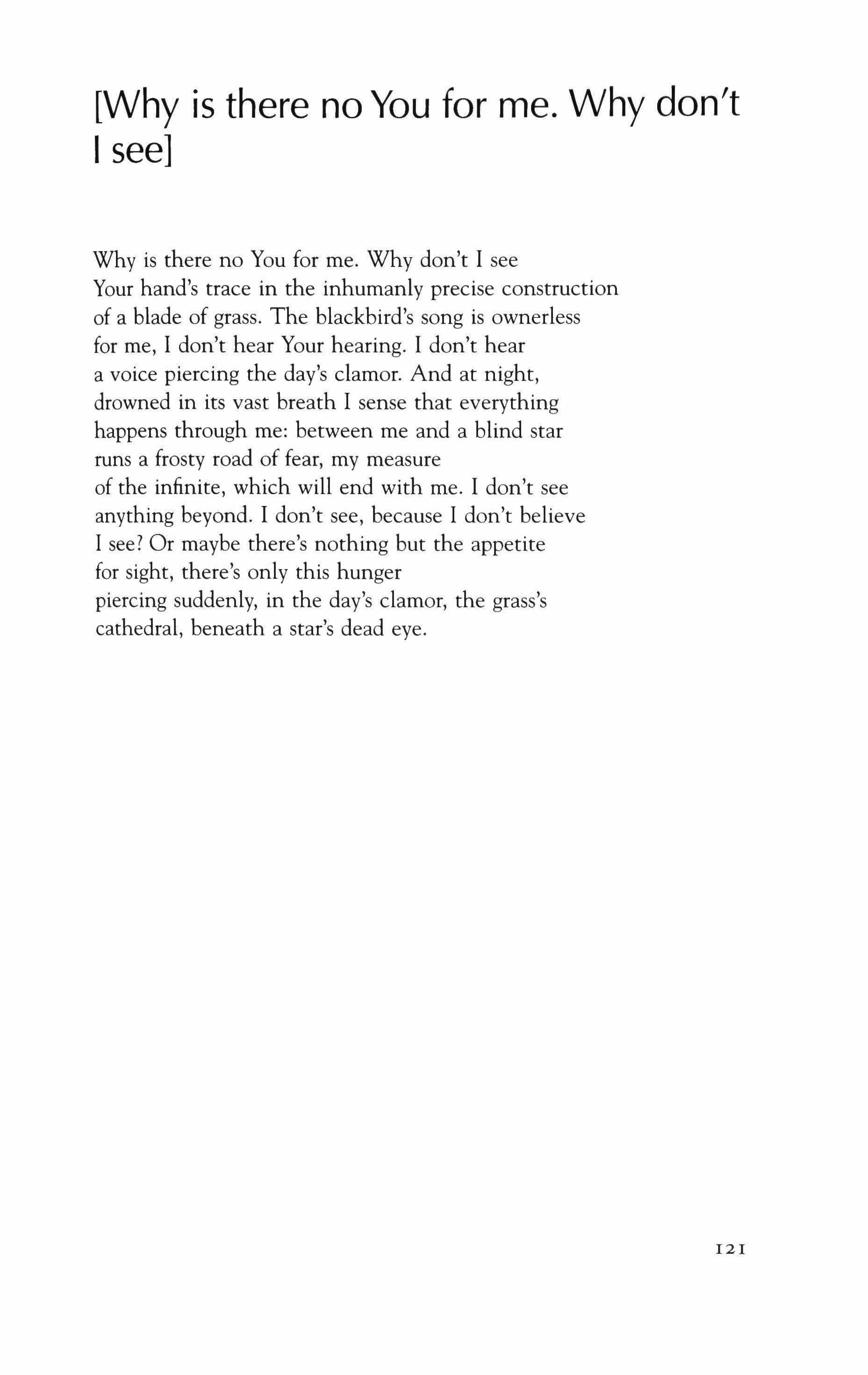
Why is there no You for me. Why don't I see Your hand's trace in the inhumanly precise construction of a blade of grass. The blackbird's song is ownerless for me, I don't hear Your hearing. I don't hear a voice piercing the day's clamor. And at night, drowned in its vast breath I sense that everything happens through me: between me and a blind star runs a frosty road of fear, my measure of the infinite, which will end with me. I don't see anything beyond. I don't see, because I don't believe I see? Or maybe there's nothing but the appetite for sight, there's only this hunger piercing suddenly, in the day's clamor, the grass's cathedral, beneath a star's dead eye.
121
Ryszard Krynicki
Translated from the Polish by
Clare Cavanagh
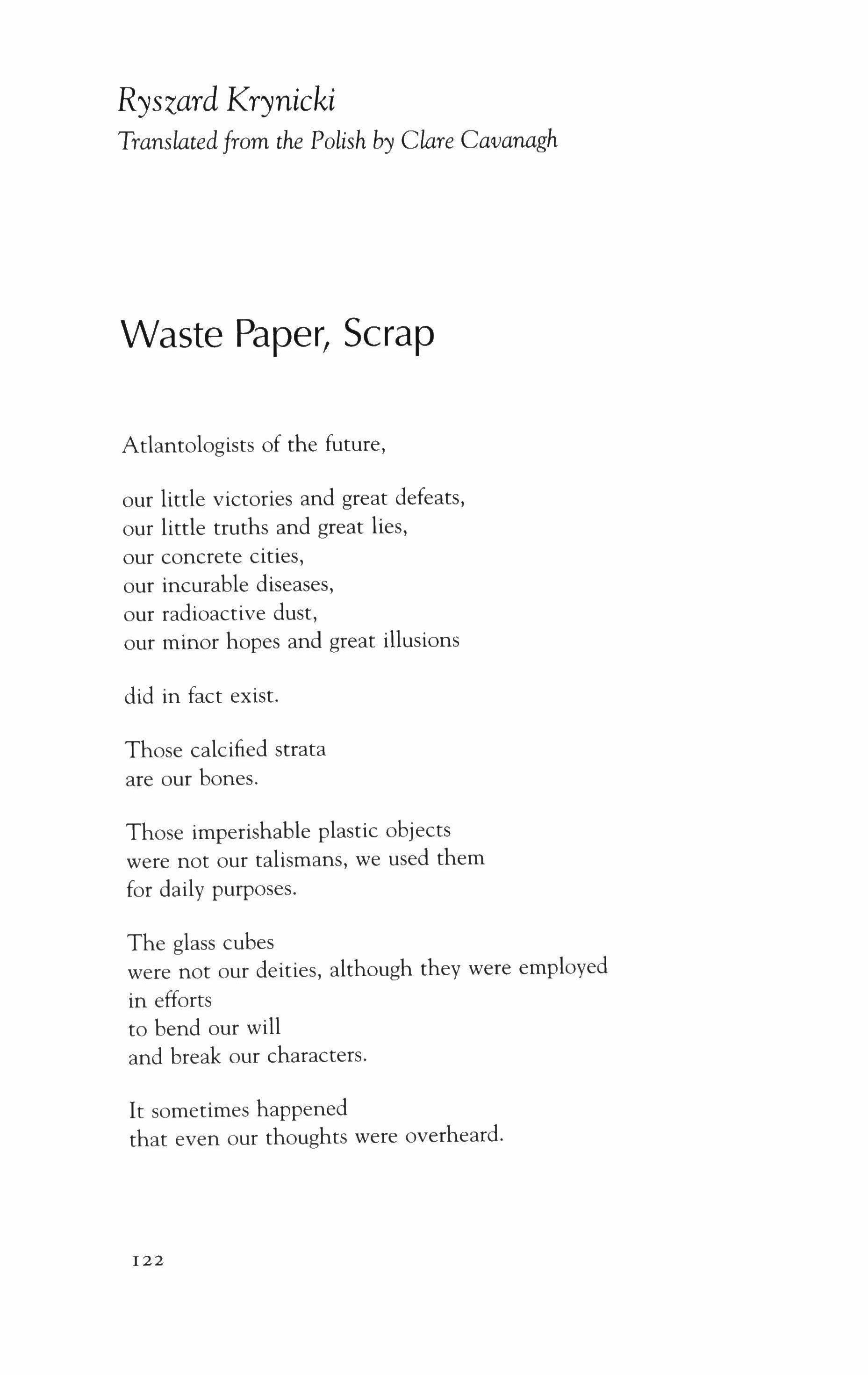
Waste Paper, Scrap
Atlantologists of the future, our little victories and great defeats, our little truths and great lies, our concrete cities, our incurable diseases, our radioactive dust, our minor hopes and great illusions did in fact exist.
Those calcified strata are our bones.
Those imperishable plastic objects were not our talismans, we used them for daily purposes.
The glass cubes were not our deities, although they were employed in efforts to bend our will and break our characters.
It sometimes happened that even our thoughts were overheard.
122
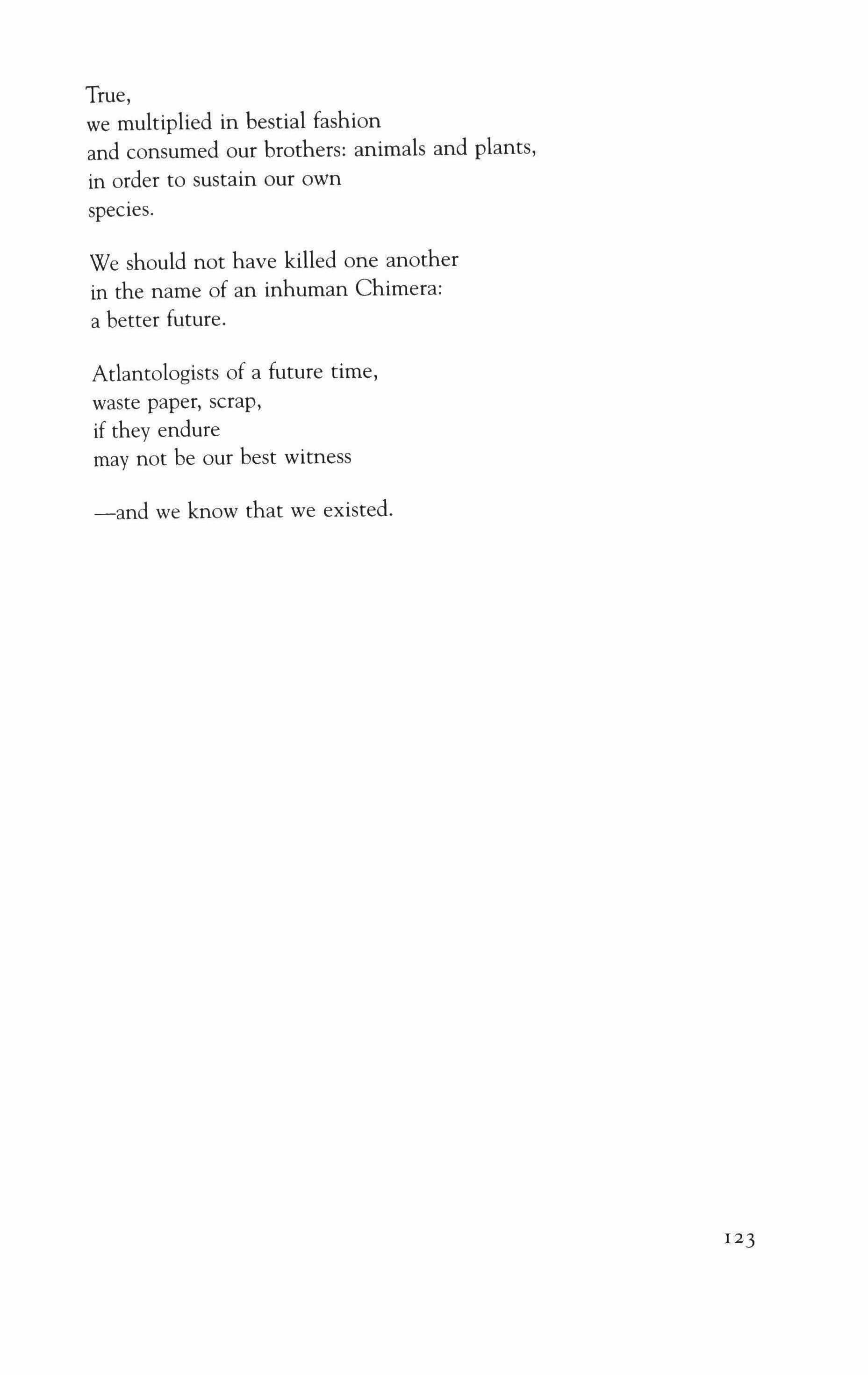
True, we multiplied in bestial fashion and consumed our brothers: animals and plants, in order to sustain our own species.
We should not have killed one another in the name of an inhuman Chimera: a better future.
Atlantologists of a future time, waste paper, scrap, if they endure may not be our best witness -and we know that we existed.
123
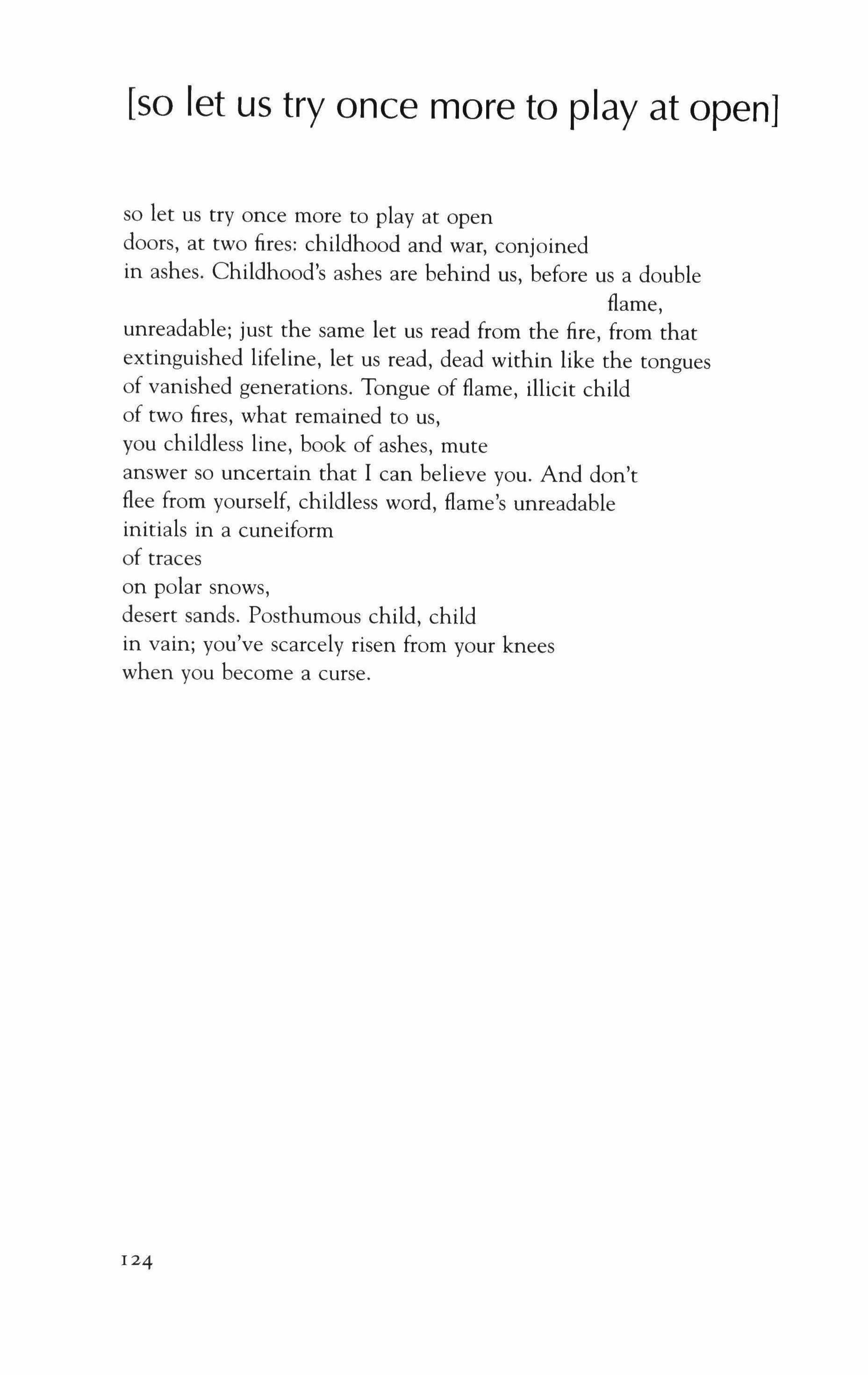
[so let us try once more to play at
open]
so let us try once more to play at open doors, at two fires: childhood and war, conjoined in ashes. Childhood's ashes are behind us, before us a double flame, unreadable; just the same let us read from the fire, from that extinguished lifeline, let us read, dead within like the tongues of vanished generations. Tongue of flame, illicit child of two fires, what remained to us, you childless line, book of ashes, mute answer so uncertain that I can believe you. And don't flee from yourself, childless word, flame's unreadable initials in a cuneiform of traces on polar snows, desert sands. Posthumous child, child in vain; you've scarcely risen from your knees when you become a curse.
124
Not much
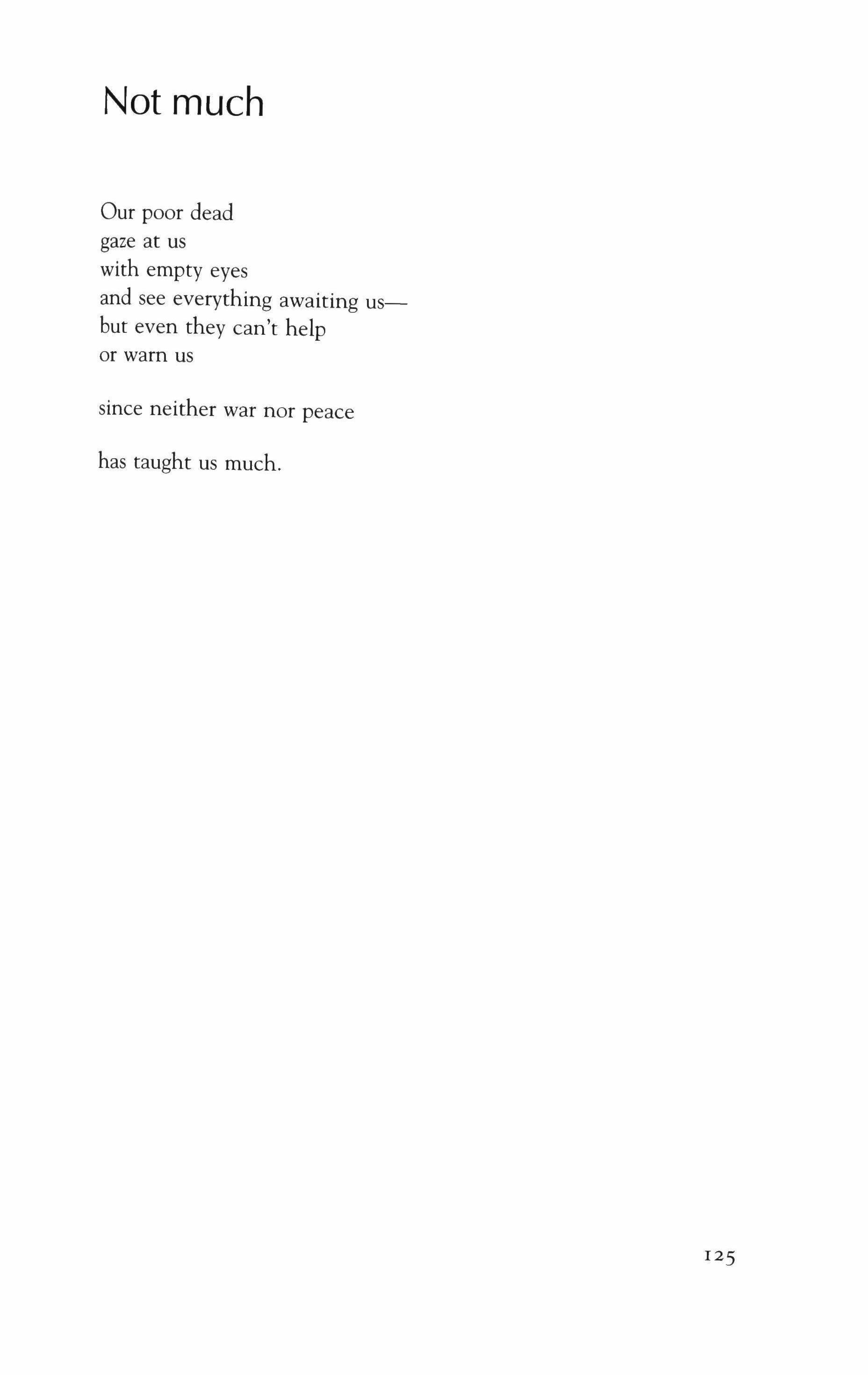
Our poor dead gaze at us with empty eyes and see everything awaiting usbut even they can't help or warn us since neither war nor peace has taught us much.
125
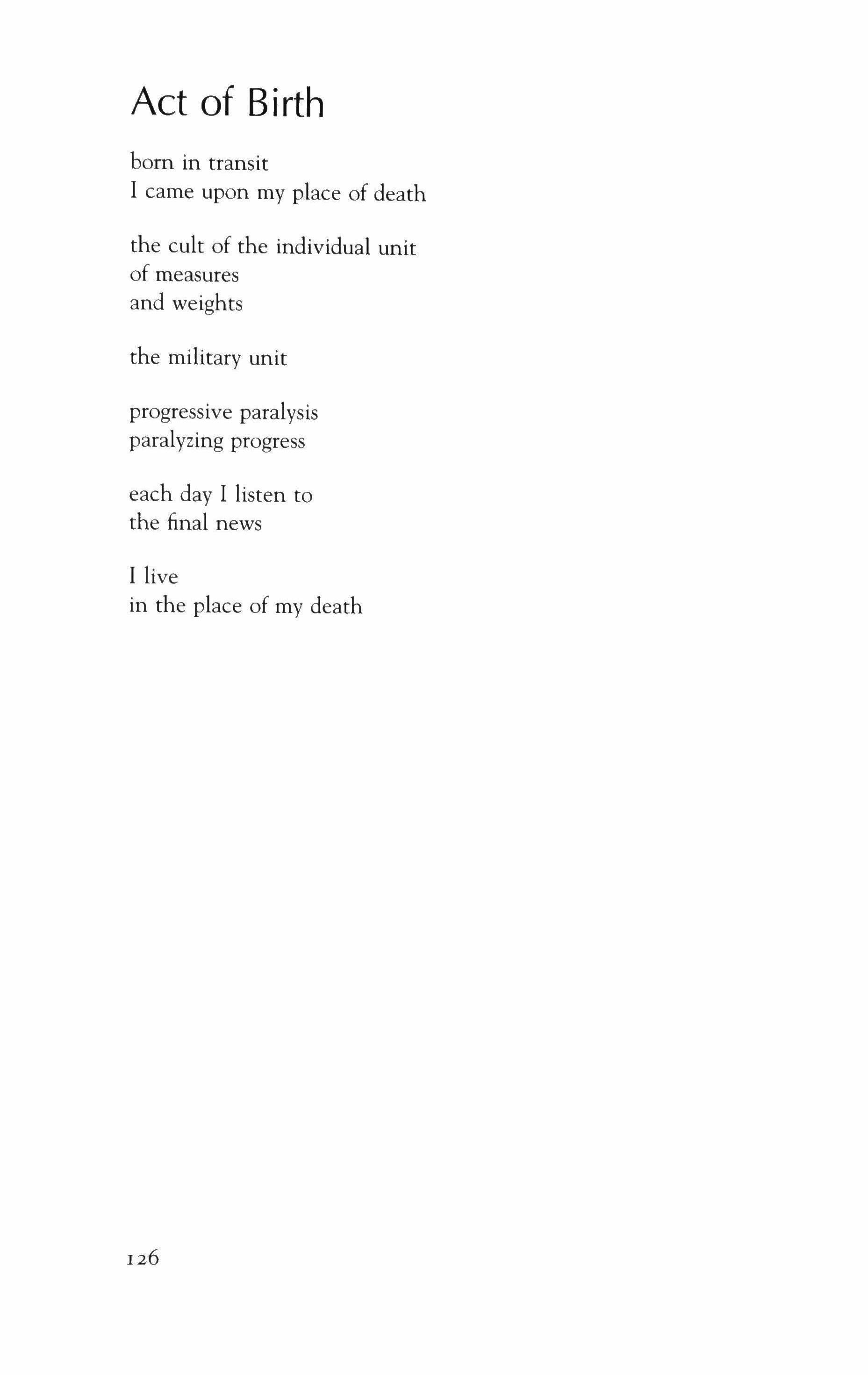
Act of Birth
born in transit
I came upon my place of death
the cult of the individual unit of measures and weights the military unit progressive paralysis paralyzing progress
each day I listen to the final news
I live in the place of my death
126
What good luck
Translated from the Polish by
Alissa Valles
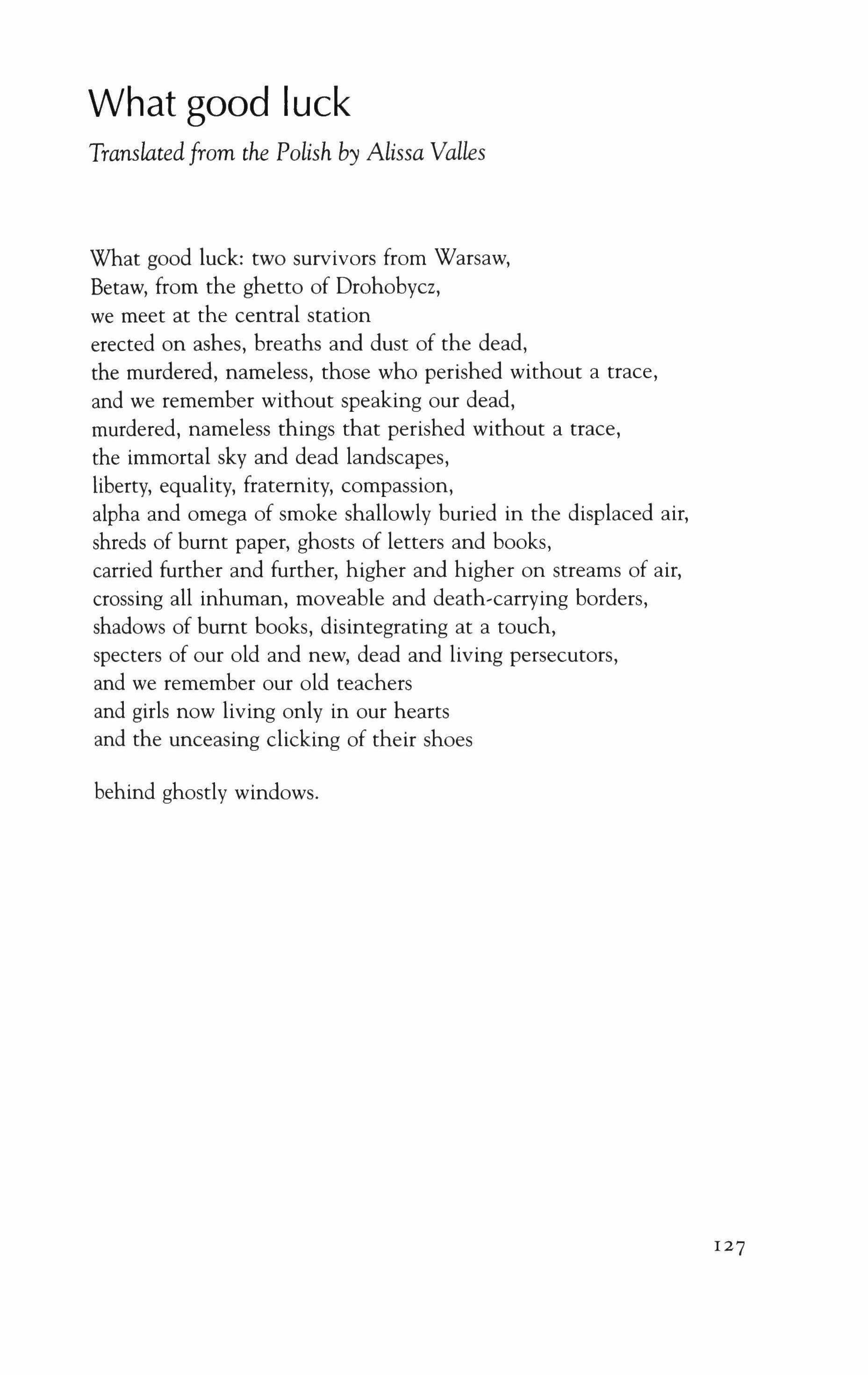
What good luck: two survivors from Warsaw, Betaw, from the ghetto of Drohobycz, we meet at the central station erected on ashes, breaths and dust of the dead, the murdered, nameless, those who perished without a trace, and we remember without speaking our dead, murdered, nameless things that perished without a trace, the immortal sky and dead landscapes, liberty, equality, fraternity, compassion, alpha and omega of smoke shallowly buried in the displaced air, shreds of burnt paper, ghosts of letters and books, carried further and further, higher and higher on streams of air, crossing all inhuman, moveable and death-carrying borders, shadows of burnt books, disintegrating at a touch, specters of our old and new, dead and living persecutors, and we remember our old teachers and girls now living only in our hearts and the unceasing clicking of their shoes behind ghostly windows.
127
Alexai Galaviz,Budziszewski
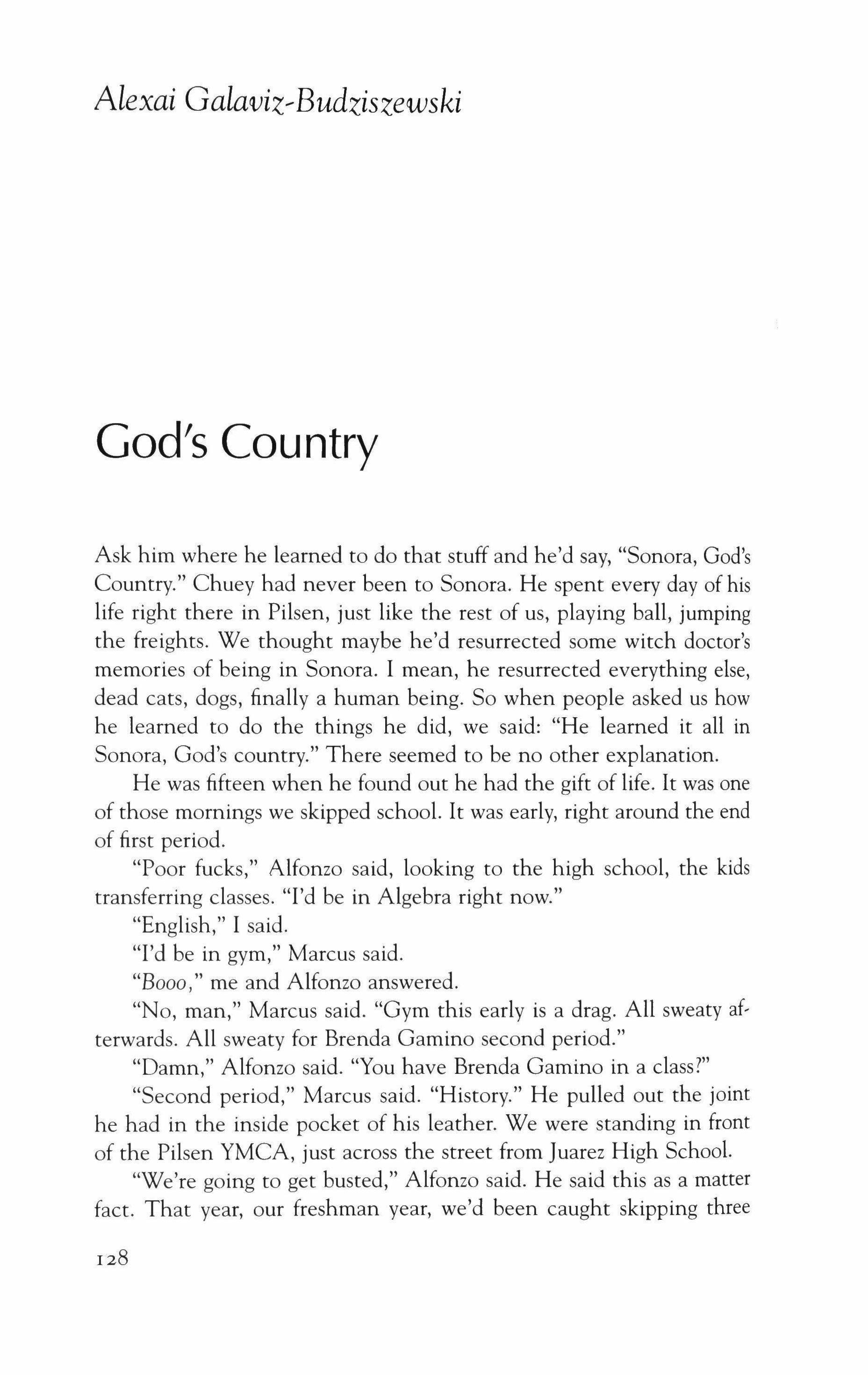
God's Country
Ask him where he learned to do that stuff and he'd say, "Sonora, God's Country." Chuey had never been to Sonora. He spent every day of his life right there in Pilsen, just like the rest of us, playing ball, jumping the freights. We thought maybe he'd resurrected some witch doctor's memories of being in Sonora. I mean, he resurrected everything else, dead cats, dogs, finally a human being. So when people asked us how he learned to do the things he did, we said: "He learned it all in Sonora, God's country." There seemed to be no other explanation.
He was fifteen when he found out he had the gift of life. It was one of those mornings we skipped school. It was early, right around the end of first period.
"Poor fucks," Alfonzo said, looking to the high school, the kids transferring classes. "I'd be in Algebra right now."
"English," I said.
"I'd be in gym," Marcus said.
"Booo," me and Alfonzo answered.
"No, man," Marcus said. "Gym this early is a drag. All sweaty afterwards. All sweaty for Brenda Gamino second period."
"Damn," Alfonzo said. "You have Brenda Gamino in a class?"
"Second period," Marcus said. "History." He pulled out the joint he had in the inside pocket of his leather. We were standing in front of the Pilsen YMCA, just across the street from Juarez High School.
"We're going to get busted," Alfonzo said. He said this as a matter fact. That year, our freshman year, we'd been caught skipping three
128
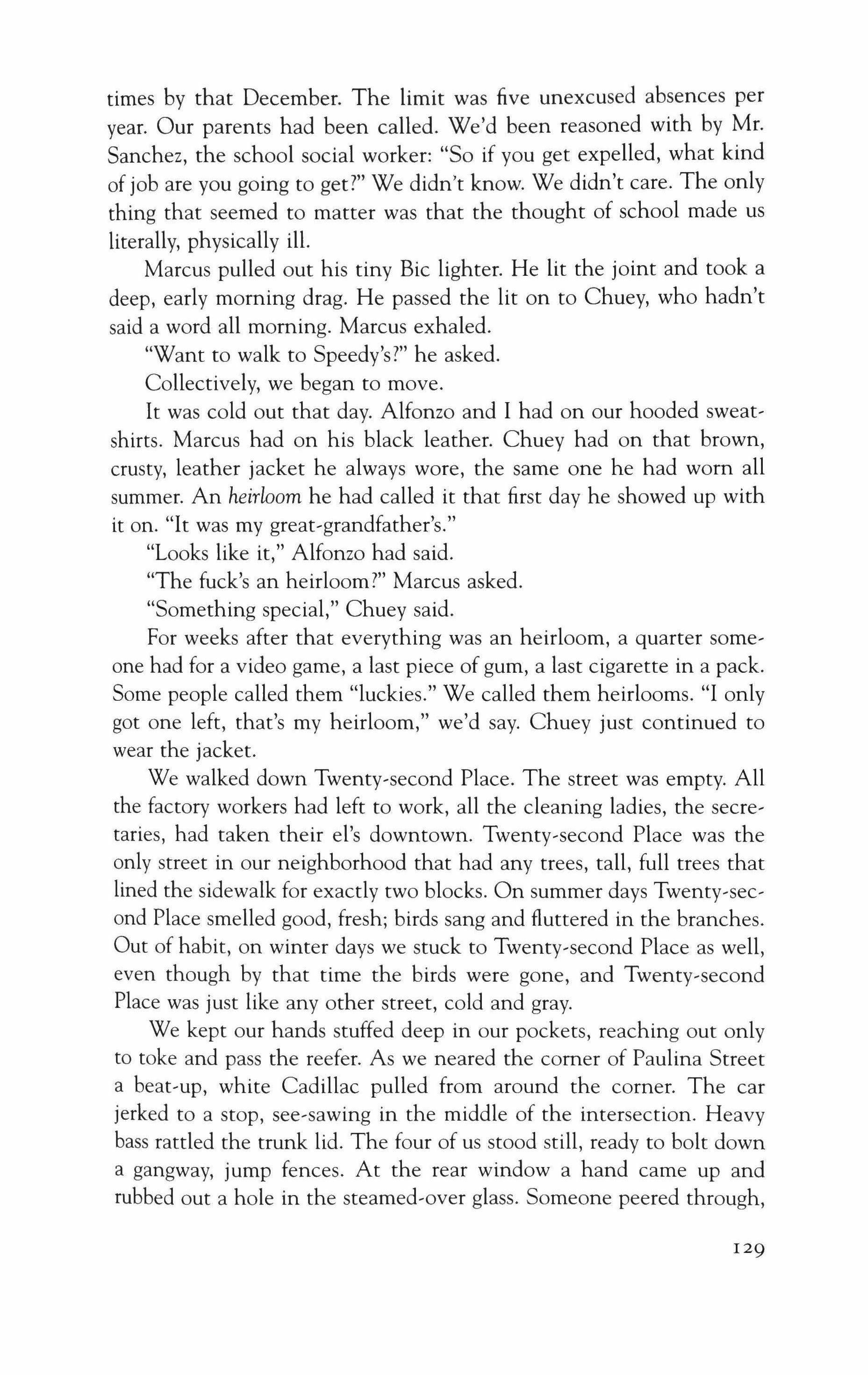
times by that December. The limit was five unexcused absences per year. Our parents had been called. We'd been reasoned with by Mr. Sanchez, the school social worker: "So if you get expelled, what kind of job are you going to get?" We didn't know. We didn't care. The only thing that seemed to matter was that the thought of school made us literally, physically ill.
Marcus pulled out his tiny Bic lighter. He lit the joint and took a deep, early morning drag. He passed the lit on to Chuey, who hadn't said a word all morning. Marcus exhaled.
"Want to walk to Speedy's?" he asked.
Collectively, we began to move.
It was cold out that day. Alfonzo and I had on our hooded sweatshirts. Marcus had on his black leather. Chuey had on that brown, crusty, leather jacket he always wore, the same one he had worn all summer. An heirloom he had called it that first day he showed up with it on. "It was my great-grandfather's."
"Looks like it," Alfonzo had said.
"The fuck's an heirloom?" Marcus asked.
"Something special," Chuey said.
For weeks after that everything was an heirloom, a quarter someone had for a video game, a last piece of gum, a last cigarette in a pack. Some people called them "luckies." We called them heirlooms. "I only got one left, that's my heirloom," we'd say. Chuey just continued to wear the jacket.
We walked down Twenty-second Place. The street was empty. All the factory workers had left to work, all the cleaning ladies, the secretaries, had taken their el's downtown. Twenty-second Place was the only street in our neighborhood that had any trees, tall, full trees that lined the sidewalk for exactly two blocks. On summer days Twenty-second Place smelled good, fresh; birds sang and fluttered in the branches. Out of habit, on winter days we stuck to Twenty-second Place as well, even though by that time the birds were gone, and Twenty-second Place was just like any other street, cold and gray.
We kept our hands stuffed deep in our pockets, reaching out only to toke and pass the reefer. As we neared the corner of Paulina Street a beat-up, white Cadillac pulled from around the corner. The car jerked to a stop, see-sawing in the middle of the intersection. Heavy bass rattled the trunk lid. The four of us stood still, ready to bolt down a gangway, jump fences. At the rear window a hand came up and rubbed out a hole in the steamed-over glass. Someone peered through,
129
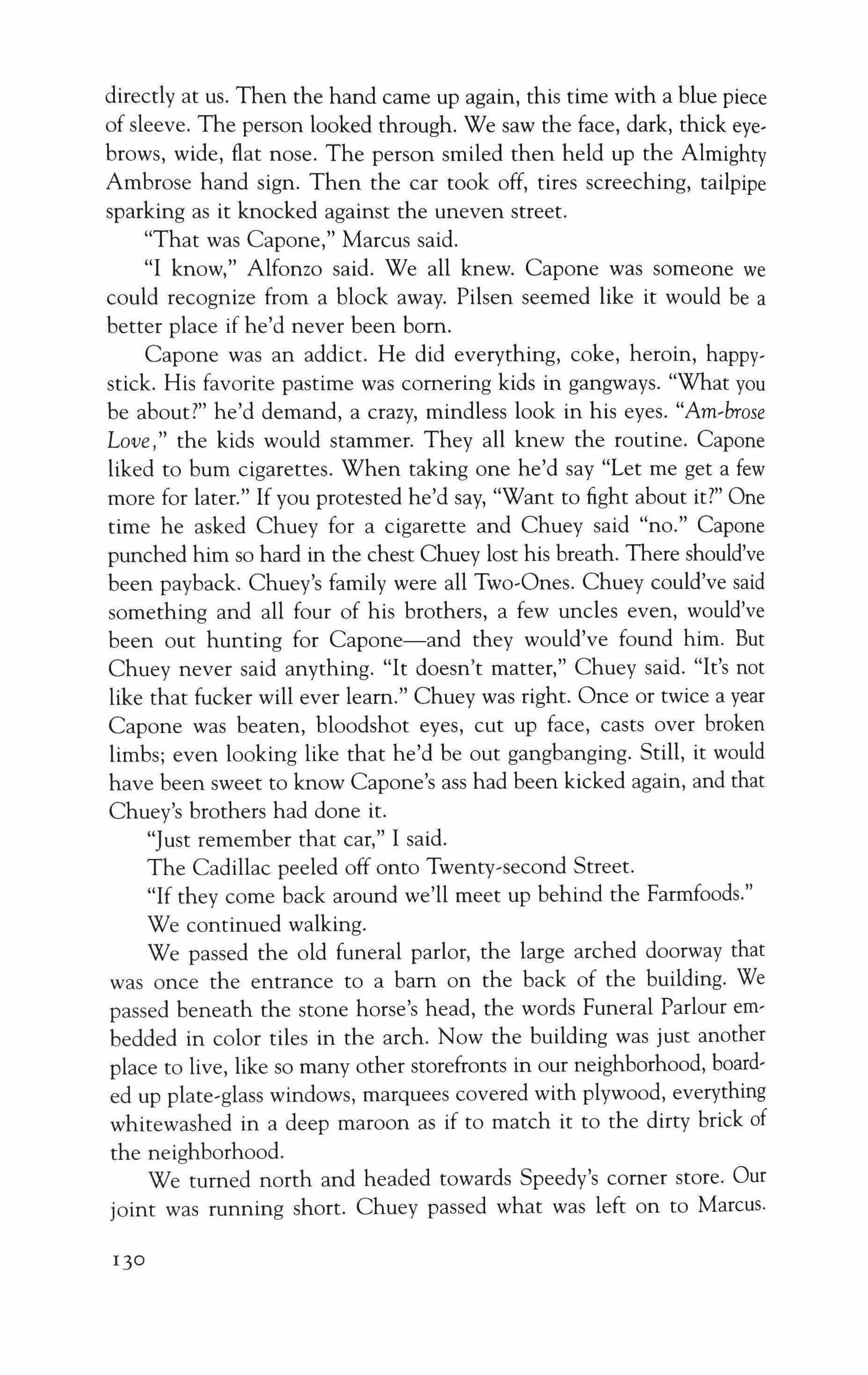
directly at us. Then the hand came up again, this time with a blue piece of sleeve. The person looked through. We saw the face, dark, thick eyebrows, wide, flat nose. The person smiled then held up the Almighty Ambrose hand sign. Then the car took off, tires screeching, tailpipe sparking as it knocked against the uneven street.
"That was Capone," Marcus said.
"I know," Alfonzo said. We all knew. Capone was someone we could recognize from a block away. Pilsen seemed like it would be a better place if he'd never been born.
Capone was an addict. He did everything, coke, heroin, happystick. His favorite pastime was cornering kids in gangways. "What you be about?" he'd demand, a crazy, mindless look in his eyes. "Am-brose Love," the kids would stammer. They all knew the routine. Capone liked to bum cigarettes. When taking one he'd say "Let me get a few more for later." If you protested he'd say, "Want to fight about it?" One time he asked Chuey for a cigarette and Chuey said "no." Capone punched him so hard in the chest Chuey lost his breath. There should've been payback. Chuey's family were all Two-Ones. Chuey could've said something and all four of his brothers, a few uncles even, would've been out hunting for Capone-and they would've found him. But Chuey never said anything. "It doesn't matter," Chuey said. "It's not like that fucker will ever learn." Chuey was right. Once or twice a year Capone was beaten, bloodshot eyes, cut up face, casts over broken limbs; even looking like that he'd be out gangbanging. Still, it would have been sweet to know Capone's ass had been kicked again, and that Chuey's brothers had done it.
"Just remember that car," I said.
The Cadillac peeled off onto Twenty-second Street.
"If they come back around we'll meet up behind the Farmfoods."
We continued walking.
We passed the old funeral parlor, the large arched doorway that was once the entrance to a bam on the back of the building. We passed beneath the stone horse's head, the words Funeral Parlour embedded in color tiles in the arch. Now the building was just another place to live, like so many other storefronts in our neighborhood, boarded up plate-glass windows, marquees covered with plywood, everything whitewashed in a deep maroon as if to match it to the dirty brick of the neighborhood.
We turned north and headed towards Speedy's comer store. Our joint was running short. Chuey passed what was left on to Marcus. 13°
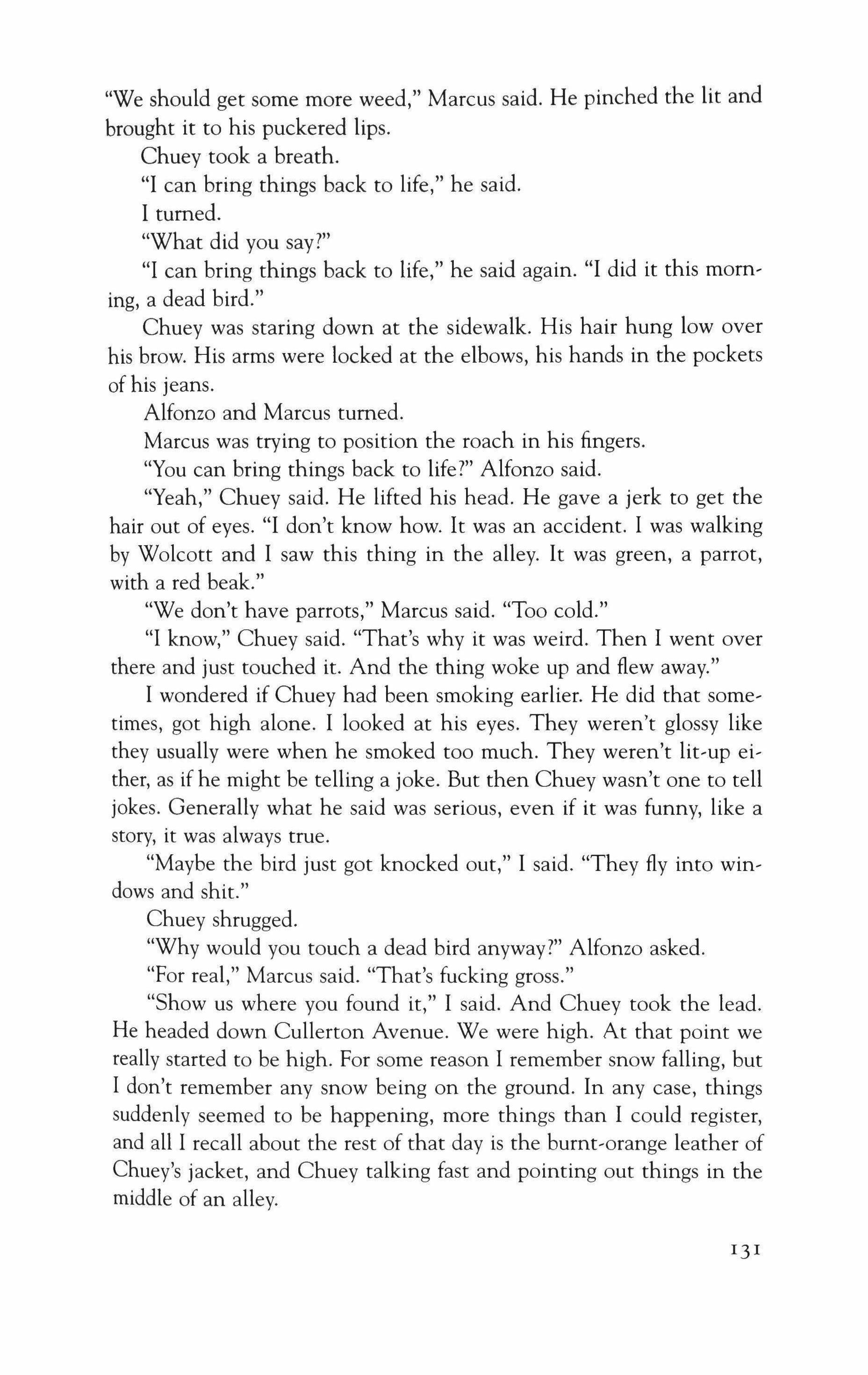
"We should get some more weed," Marcus said. He pinched the lit and brought it to his puckered lips.
Chuey took a breath.
"I can bring things back to life," he said.
I turned.
"What did you say?"
"I can bring things back to life," he said again. "I did it this morning, a dead bird."
Chuey was staring down at the sidewalk. His hair hung low over his brow. His arms were locked at the elbows, his hands in the pockets of his jeans.
Alfonzo and Marcus turned.
Marcus was trying to position the roach in his fingers.
"You can bring things back to life?" Alfonzo said.
"Yeah," Chuey said. He lifted his head. He gave a jerk to get the hair out of eyes. "I don't know how. It was an accident. I was walking by Wolcott and I saw this thing in the alley. It was green, a parrot, with a red beak."
"We don't have parrots," Marcus said. "Too cold."
"I know," Chuey said. "That's why it was weird. Then I went over there and just touched it. And the thing woke up and flew away."
I wondered if Chuey had been smoking earlier. He did that sometimes, got high alone. I looked at his eyes. They weren't glossy like they usually were when he smoked too much. They weren't lit-up either, as if he might be telling a joke. But then Chuey wasn't one to tell jokes. Generally what he said was serious, even if it was funny, like a story, it was always true.
"Maybe the bird just got knocked out," I said. "They fly into windows and shit."
Chuey shrugged.
"Why would you touch a dead bird anyway?" Alfonzo asked.
"For real," Marcus said. "That's fucking gross."
"Show us where you found it," I said. And Chuey took the lead. He headed down Cullerton Avenue. We were high. At that point we really started to be high. For some reason I remember snow falling, but I don't remember any snow being on the ground. In any case, things suddenly seemed to be happening, more things than I could register, and all I recall about the rest of that day is the burnt-orange leather of Chuey's jacket, and Chuey talking fast and pointing out things in the middle of an alley.
131
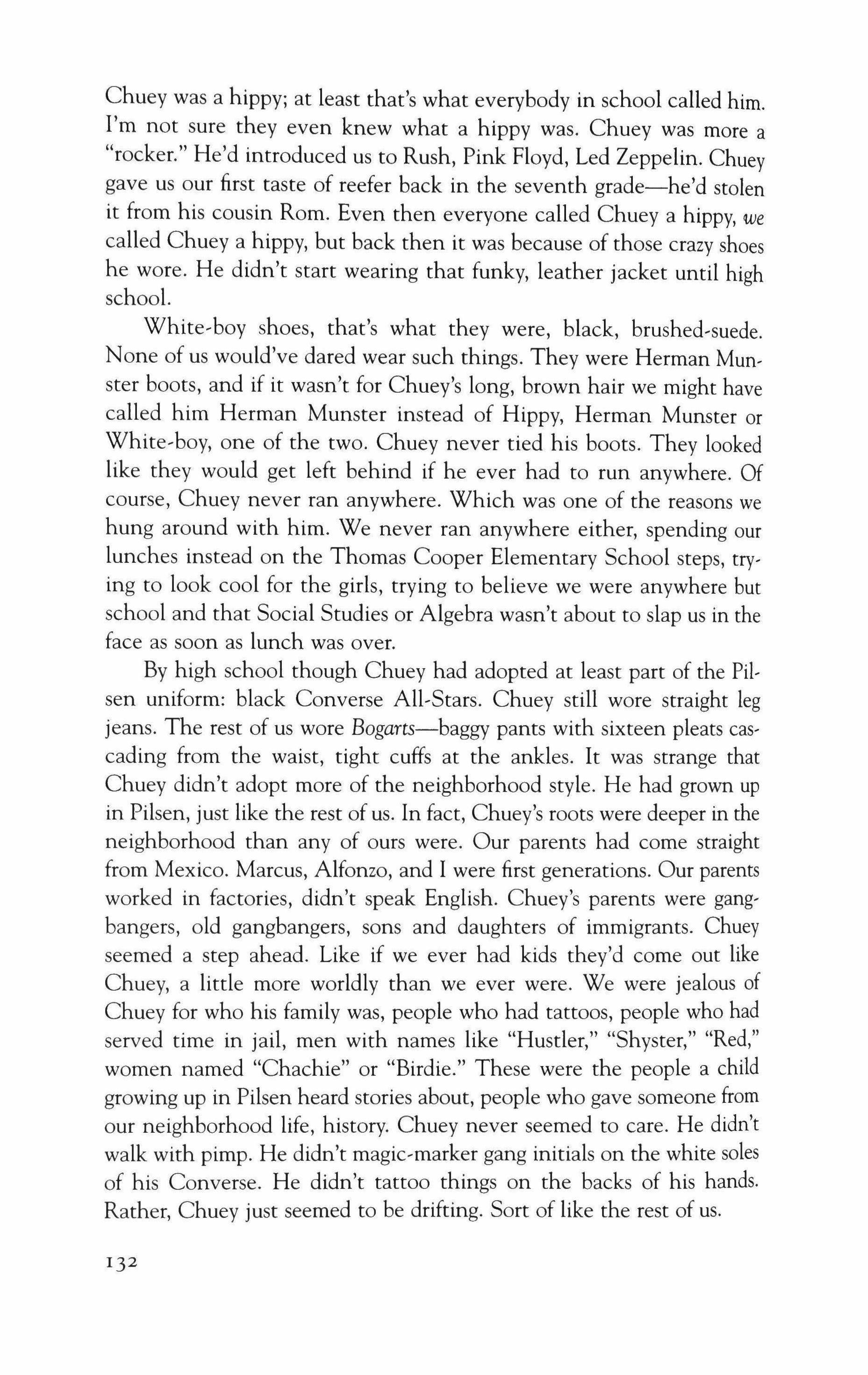
Chuey was a hippy; at least that's what everybody in school called him. I'm not sure they even knew what a hippy was. Chuey was more a "rocker." He'd introduced us to Rush, Pink Floyd, Led Zeppelin. Chuey gave us our first taste of reefer back in the seventh grade-he'd stolen it from his cousin Rom. Even then everyone called Chuey a hippy, we called Chuey a hippy, but back then it was because of those crazy shoes he wore. He didn't start wearing that funky, leather jacket until high school.
White-boy shoes, that's what they were, black, brushed-suede. None of us would've dared wear such things. They were Herman Munster boots, and if it wasn't for Chuey's long, brown hair we might have called him Herman Munster instead of Hippy, Herman Munster or White-boy, one of the two. Chuey never tied his boots. They looked like they would get left behind if he ever had to run anywhere. Of course, Chuey never ran anywhere. Which was one of the reasons we hung around with him. We never ran anywhere either, spending our lunches instead on the Thomas Cooper Elementary School steps, trying to look cool for the girls, trying to believe we were anywhere but school and that Social Studies or Algebra wasn't about to slap us in the face as soon as lunch was over.
By high school though Chuey had adopted at least part of the Pitsen uniform: black Converse All-Stars. Chuey still wore straight leg jeans. The rest of us wore Bogarts-baggy pants with sixteen pleats cascading from the waist, tight cuffs at the ankles. It was strange that Chuey didn't adopt more of the neighborhood style. He had grown up in Pilsen, just like the rest of us. In fact, Chuey's roots were deeper in the neighborhood than any of ours were. Our parents had come straight from Mexico. Marcus, Alfonzo, and I were first generations. Our parents worked in factories, didn't speak English. Chuey's parents were gangbangers, old gangbangers, sons and daughters of immigrants. Chuey seemed a step ahead. Like if we ever had kids they'd come out like Chuey, a little more worldly than we ever were. We were jealous of Chuey for who his family was, people who had tattoos, people who had served time in jail, men with names like "Hustler," "Shyster," "Red," women named "Chachie" or "Birdie." These were the people a child growing up in Pilsen heard stories about, people who gave someone from our neighborhood life, history. Chuey never seemed to care. He didn't walk with pimp. He didn't magic-marker gang initials on the white sales of his Converse. He didn't tattoo things on the backs of his hands. Rather, Chuey just seemed to be drifting. Sort of like the rest of us.
132
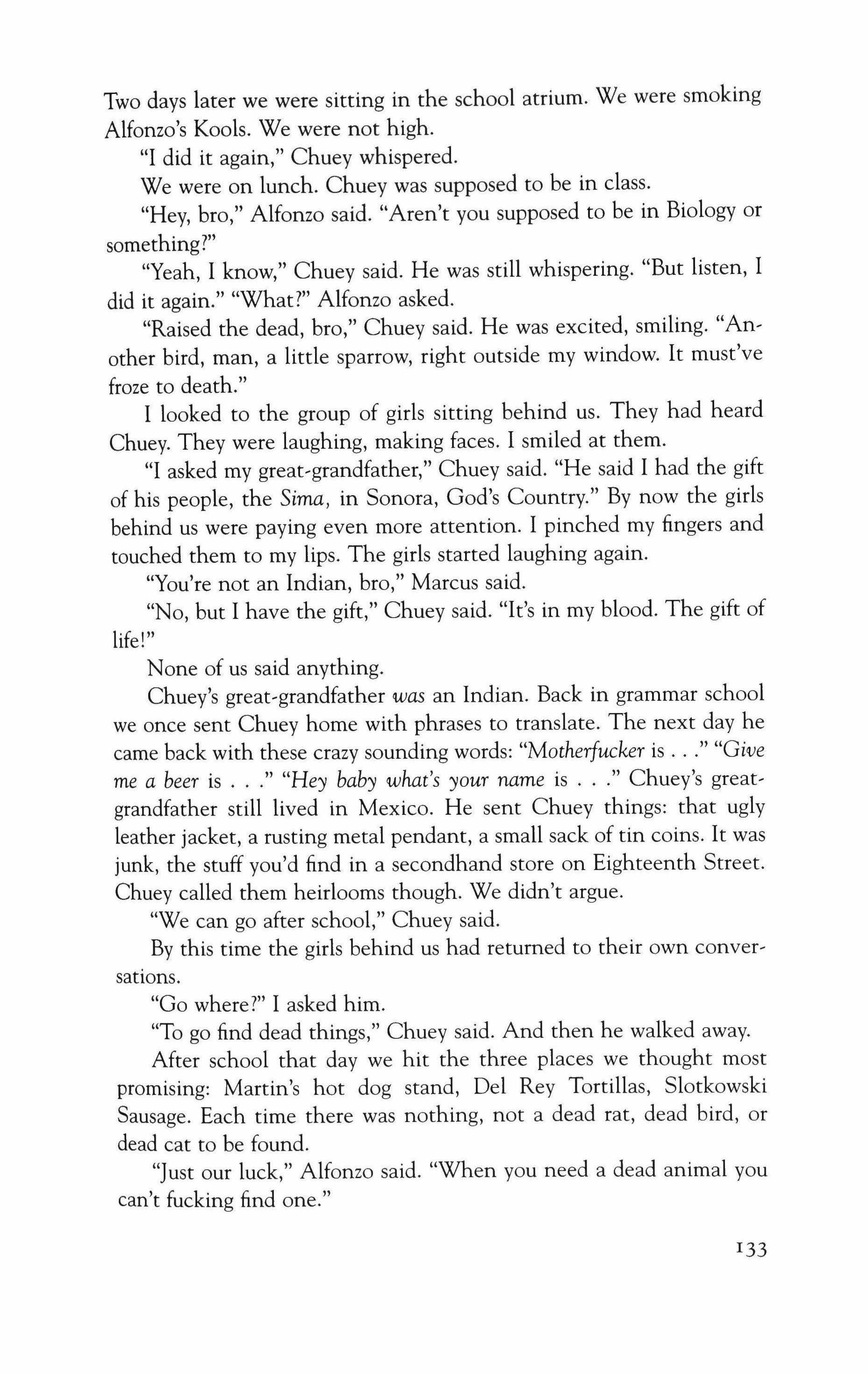
Two days later we were sitting in the school atrium. We were smoking Alfonzo's Kools. We were not high.
"I did it again," Chuey whispered.
We were on lunch. Chuey was supposed to be in class.
"Hey, bro," Alfonzo said. "Aren't you supposed to be in Biology or something?"
"Yeah, I know," Chuey said. He was still whispering. "But listen, I did it again." "What?" Alfonzo asked.
"Raised the dead, bro," Chuey said. He was excited, smiling. "An, other bird, man, a little sparrow, right outside my window. It must've froze to death."
I looked to the group of girls sitting behind us. They had heard Chuey. They were laughing, making faces. I smiled at them.
"I asked my great,grandfather," Chuey said. "He said I had the gift of his people, the Sima, in Sonora, God's Country." By now the girls behind us were paying even more attention. I pinched my fingers and touched them to my lips. The girls started laughing again.
"You're not an Indian, bro," Marcus said.
"No, but I have the gift," Chuey said. "It's in my blood. The gift of life!"
None of us said anything.
Chuey's great,grandfather was an Indian. Back in grammar school we once sent Chuey home with phrases to translate. The next day he came back with these crazy sounding words: "Motherfucker is "Give me a beer is "Hey baby what's your name is Chuey's great, grandfather still lived in Mexico. He sent Chuey things: that ugly leather jacket, a rusting metal pendant, a small sack of tin coins. It was junk, the stuff you'd find in a secondhand store on Eighteenth Street. Chuey called them heirlooms though. We didn't argue.
"We can go after school," Chuey said.
By this time the girls behind us had returned to their own conversations.
"Go where?" I asked him.
"To go find dead things," Chuey said. And then he walked away.
After school that day we hit the three places we thought most promising: Martin's hot dog stand, Del Rey Tortillas, Slotkowski Sausage. Each time there was nothing, not a dead rat, dead bird, or dead cat to be found.
"Just our luck," Alfonzo said. "When you need a dead animal you can't fucking find one."
I}}

"No shit," Marcus answered. He tilted back a garbage can. "I thought the city was putting rat poison down. There should be a shitload of dead rats."
"They're probably immune," I said. "Super rats." I peeked down a long, descending gangway.
"Hey, bro," Alfonzo said. "Does your magic work on trees?"
"I don't know," Chuey said.
"They're dead right?" Alfonzo asked. " in the winter."
"No," I said. "I think they're just sleeping."
"We should try it," Marcus said. "Maybe it'll work."
So we walked back to school, back to Twenty-second Place. After a short search we found the tree that looked the most dead: twisted branches, peeling bark, white streaks down the trunk like the tree had been bleeding. Above us the streetlights were just flickering on. The sky held a dark lavender color, clouds so low they looked dangerous.
Chuey took off his jacket.
"Does it hurt?" Alfonzo asked.
"No," Chuey said. "It's weird. I don't even feel anything. But I know it's coming so it almost hurts."
Chuey took a deep breath. "Ready?" he asked.
We all nodded.
Chuey reached out and tapped the tree. He did it quickly as if expecting an electric shock.
We waited.
We waited even longer.
There was nothing. No sudden blossoms, no thick, heavy leaves, no fresh bark climbing up the diseased looking trunk.
"Touch it again," Alfonzo said.
"No," Chuey said. "This is not how it works. This is not what it's meant for."
"Well it's getting fucking cold out here," Marcus said. He blew into his hands. We started to move towards home.
Twenty-second Place was flooded with orange streetlight now. Tree branches cast long shadows against the two and three-flats. In the sidewalk fingered-out letters stood out like mini-mountain ranges: PartyPlayer Love, Maria�L's�Frido 4�Now.
We crossed an alley. I took a quick glance down to the other end. There, in the middle of the alley, resting in the shallow drainage canal, was a large black mound.
"Look," I said.
134

"Damn," Alfonzo said.
"If that's a rat Marcus said.
We walked down the alley. As we got closer the mound began to take shape: a fat, pink tail, a wide belly, yellow teeth propping up a long, pointy head. It was the biggest rat any of us had ever seen.
"That fucker's huge," Alfonzo said.
I picked up a rock and threw it. I hit the rat square in the ribs.
Nothing.
Alfonzo stomped on the ground. He waved his arms over his head. Still nothing.
It was the size of a small dog. The tail alone was so fat wrinkles were visible, fingerprints almost.
"You sure that's not an O-possum?" Alfonso asked.
"What the fuck's an O-possum?" Marcus said.
"Just like a rat, only bigger. They got them in Jew-town, by Maxwell Street."
"That's a rat, man," I said. I looked down to the animal, its stiff, short hair. I gave the body a kick. The entire thing moved, a block of ice. Even the tail held its stiff "S" shape.
"You're going to touch that?" Alfonzo asked Chuey.
Chuey didn't answer. He got down on his knees and started to rub his hands together.
"Those things got diseases," Marcus said.
"Shhh," I told Marcus.
"Those things can jump too," Marcus said. "One time, in my gangway
"Shut up, asshole," Alfonzo said. He pulled back on Marcus's hood. They both fell in behind Chuey.
Chuey pushed the sleeves of his brown jacket up to his elbows.
I scanned the porches of the apartment buildings around us. In some windows Christmas lights had been hung, tight crisscrossing patterns, steep triangles. In a few windows the designs had collapsed, leaving only sagging, drooping strings of lights, barely hanging on, like a wino's pants. Through some windows blue TV reflections could be seen, brilliant flashes against white, plaster ceilings, Christmas specials probably, "A Charlie Brown Christmas," "Frosty the Snow Man." At that moment we seemed to be the only ones alive.
Chuey blew into his hands. He took a deep breath and closed his eyes. After a moment he opened them. Then he reached out and stabbed at the rat's hind leg. We waited. We waited even longer. I
135
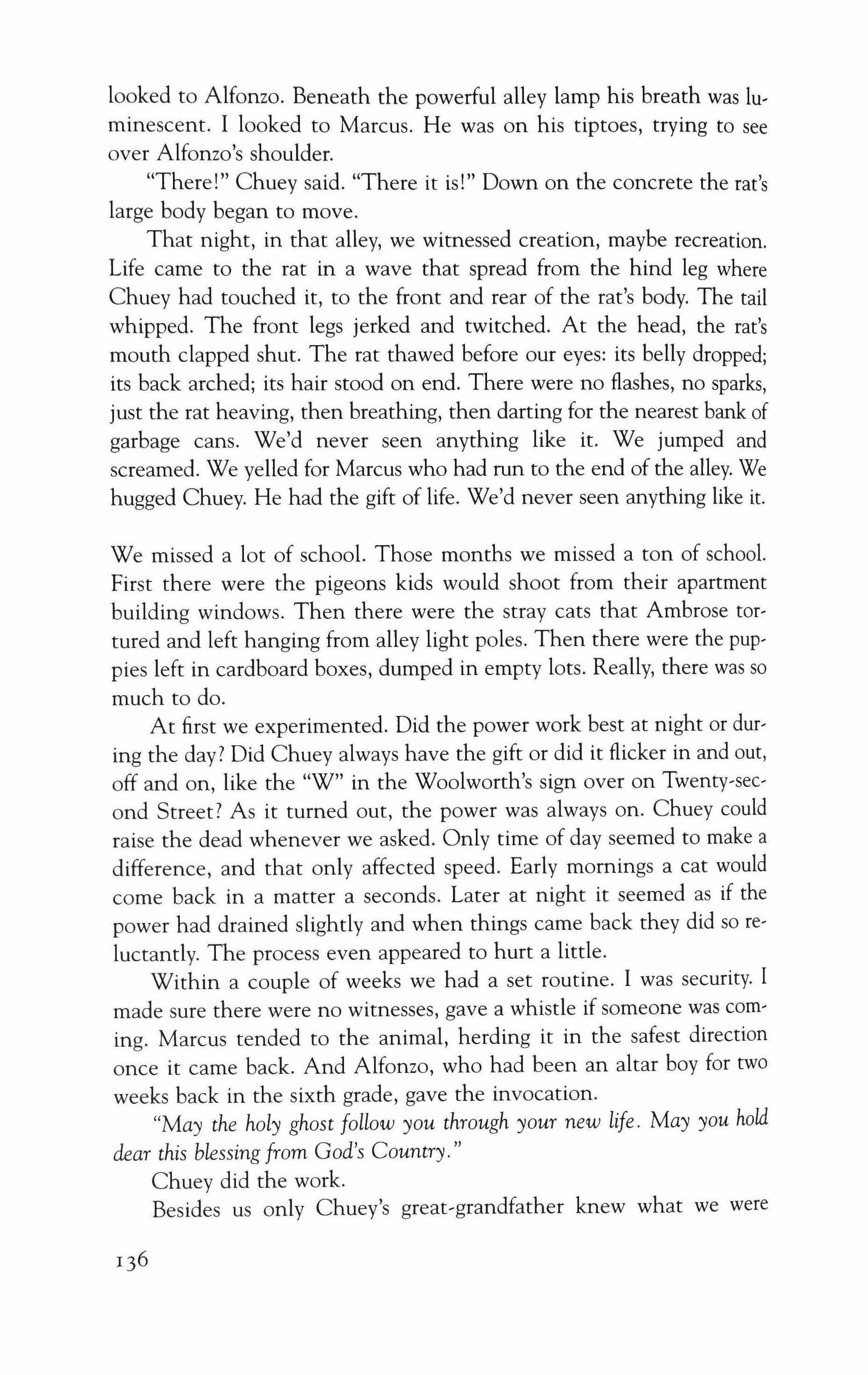
looked to Alfonzo. Beneath the powerful alley lamp his breath was luminescent. I looked to Marcus. He was on his tiptoes, trying to see over Alfonzo's shoulder.
"There!" Chuey said. "There it is!" Down on the concrete the rat's large body began to move.
That night, in that alley, we witnessed creation, maybe recreation. Life came to the rat in a wave that spread from the hind leg where Chuey had touched it, to the front and rear of the rat's body. The tail whipped. The front legs jerked and twitched. At the head, the rat's mouth clapped shut. The rat thawed before our eyes: its belly dropped; its back arched; its hair stood on end. There were no flashes, no sparks, just the rat heaving, then breathing, then darting for the nearest bank of garbage cans. We'd never seen anything like it. We jumped and screamed. We yelled for Marcus who had run to the end of the alley. We hugged Chuey. He had the gift of life. We'd never seen anything like it.
We missed a lot of school. Those months we missed a ton of school. First there were the pigeons kids would shoot from their apartment building windows. Then there were the stray cats that Ambrose tortured and left hanging from alley light poles. Then there were the puppies left in cardboard boxes, dumped in empty lots. Really, there was so much to do.
At first we experimented. Did the power work best at night or during the day? Did Chuey always have the gift or did it flicker in and out, off and on, like the "w" in the Woolworth's sign over on Twenty-second Street? As it turned out, the power was always on. Chuey could raise the dead whenever we asked. Only time of day seemed to make a difference, and that only affected speed. Early mornings a cat would come back in a matter a seconds. Later at night it seemed as if the power had drained slightly and when things came back they did so reluctantly. The process even appeared to hurt a little.
Within a couple of weeks we had a set routine. I was security. I made sure there were no witnesses, gave a whistle if someone was coming. Marcus tended to the animal, herding it in the safest direction once it came back. And Alfonzo, who had been an altar boy for two weeks back in the sixth grade, gave the invocation.
"May the holy ghost follow you through your new life. May you hold dear this blessing from God's Country."
Chuey did the work.
Besides us only Chuey's great-grandfather knew what we were
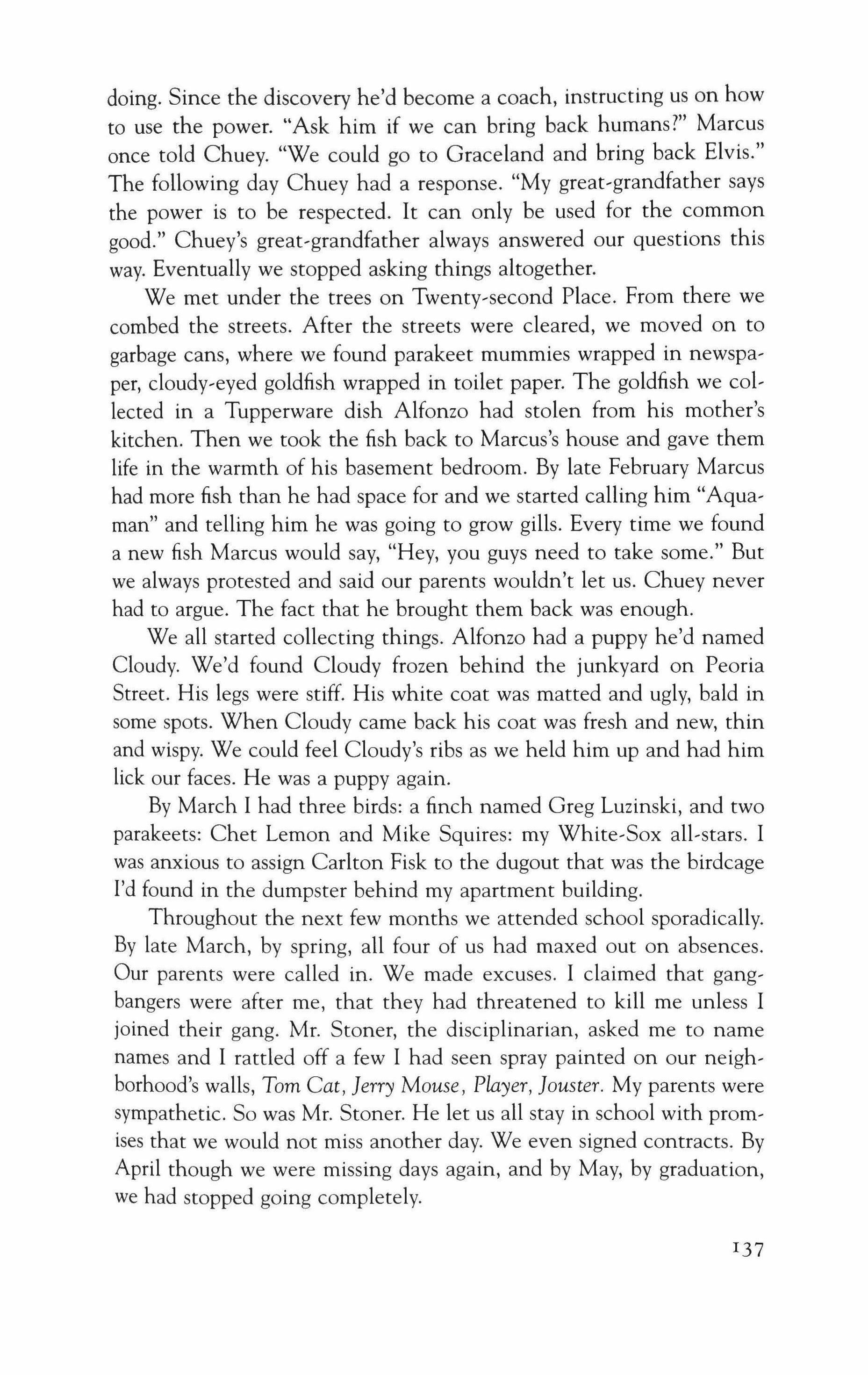
doing. Since the discovery he'd become a coach, instructing us on how to use the power. "Ask him if we can bring back humans?" Marcus once told Chuey. "We could go to Graceland and bring back Elvis." The following day Chuey had a response. "My great�grandfather says the power is to be respected. It can only be used for the common good." Chuey's great-grandfather always answered our questions this way. Eventually we stopped asking things altogether.
We met under the trees on Twenty-second Place. From there we combed the streets. After the streets were cleared, we moved on to garbage cans, where we found parakeet mummies wrapped in newspaper, cloudy-eyed goldfish wrapped in toilet paper. The goldfish we collected in a Tupperware dish Alfonzo had stolen from his mother's kitchen. Then we took the fish back to Marcus's house and gave them life in the warmth of his basement bedroom. By late February Marcus had more fish than he had space for and we started calling him "Aquaman" and telling him he was going to grow gills. Every time we found a new fish Marcus would say, "Hey, you guys need to take some." But we always protested and said our parents wouldn't let us. Chuey never had to argue. The fact that he brought them back was enough.
We all started collecting things. Alfonzo had a puppy he'd named Cloudy. We'd found Cloudy frozen behind the junkyard on Peoria Street. His legs were stiff. His white coat was matted and ugly, bald in some spots. When Cloudy came back his coat was fresh and new, thin and wispy. We could feel Cloudy's ribs as we held him up and had him lick our faces. He was a puppy again.
By March I had three birds: a finch named Greg Luzinski, and two parakeets: Chet Lemon and Mike Squires: my White�Sox all-stars. I was anxious to assign Carlton Fisk to the dugout that was the birdcage I'd found in the dumpster behind my apartment building.
Throughout the next few months we attended school sporadically. By late March, by spring, all four of us had maxed out on absences. Our parents were called in. We made excuses. I claimed that gangbangers were after me, that they had threatened to kill me unless I joined their gang. Mr. Stoner, the disciplinarian, asked me to name names and I rattled off a few I had seen spray painted on our neighborhood's walls, Tom Cat, Jerry Mouse, Player, [ouster. My parents were sympathetic. So was Mr. Stoner. He let us all stay in school with promises that we would not miss another day. We even signed contracts. By April though we were missing days again, and by May, by graduation, we had stopped going completely.
137
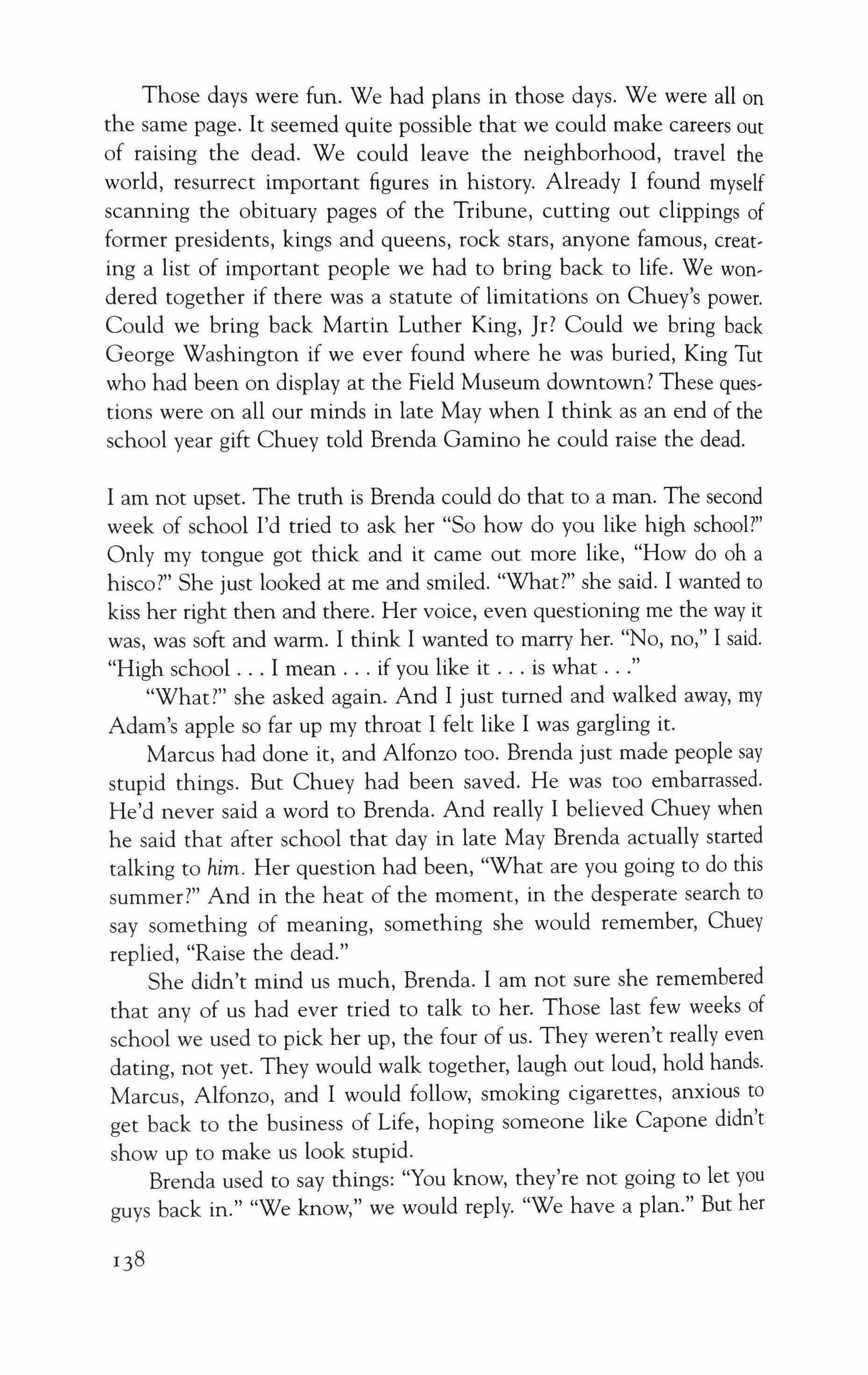
Those days were fun. We had plans in those days. We were all on the same page. It seemed quite possible that we could make careers out of raising the dead. We could leave the neighborhood, travel the world, resurrect important figures in history. Already I found myself scanning the obituary pages of the Tribune, cutting out clippings of former presidents, kings and queens, rock stars, anyone famous, creating a list of important people we had to bring back to life. We wondered together if there was a statute of limitations on Chuey's power. Could we bring back Martin Luther King, Jr? Could we bring back George Washington if we ever found where he was buried, King Tut who had been on display at the Field Museum downtown? These questions were on all our minds in late May when I think as an end of the school year gift Chuey told Brenda Gamino he could raise the dead.
I am not upset. The truth is Brenda could do that to a man. The second week of school I'd tried to ask her "So how do you like high school?" Only my tongue got thick and it came out more like, "How do oh a hisco?" She just looked at me and smiled. "What?" she said. I wanted to kiss her right then and there. Her voice, even questioning me the way it was, was soft and warm. I think I wanted to marry her. "No, no," I said. "High school I mean if you like it is what " "What?" she asked again. And I just turned and walked away, my Adam's apple so far up my throat I felt like I was gargling it.
Marcus had done it, and Alfonzo too. Brenda just made people say stupid things. But Chuey had been saved. He was too embarrassed. He'd never said a word to Brenda. And really I believed Chuey when he said that after school that day in late May Brenda actually started talking to him. Her question had been, "What are you going to do this summer?" And in the heat of the moment, in the desperate search to say something of meaning, something she would remember, Chuey replied, "Raise the dead."
She didn't mind us much, Brenda. I am not sure she remembered that any of us had ever tried to talk to her. Those last few weeks of school we used to pick her up, the four of us. They weren't really even dating, not yet. They would walk together, laugh out loud, hold hands. Marcus, Alfonzo, and I would follow, smoking cigarettes, anxious to get back to the business of Life, hoping someone like Capone didn't show up to make us look stupid.
Brenda used to say things: "You know, they're not going to let you guys back in." "We know," we would reply. "We have a plan." But her
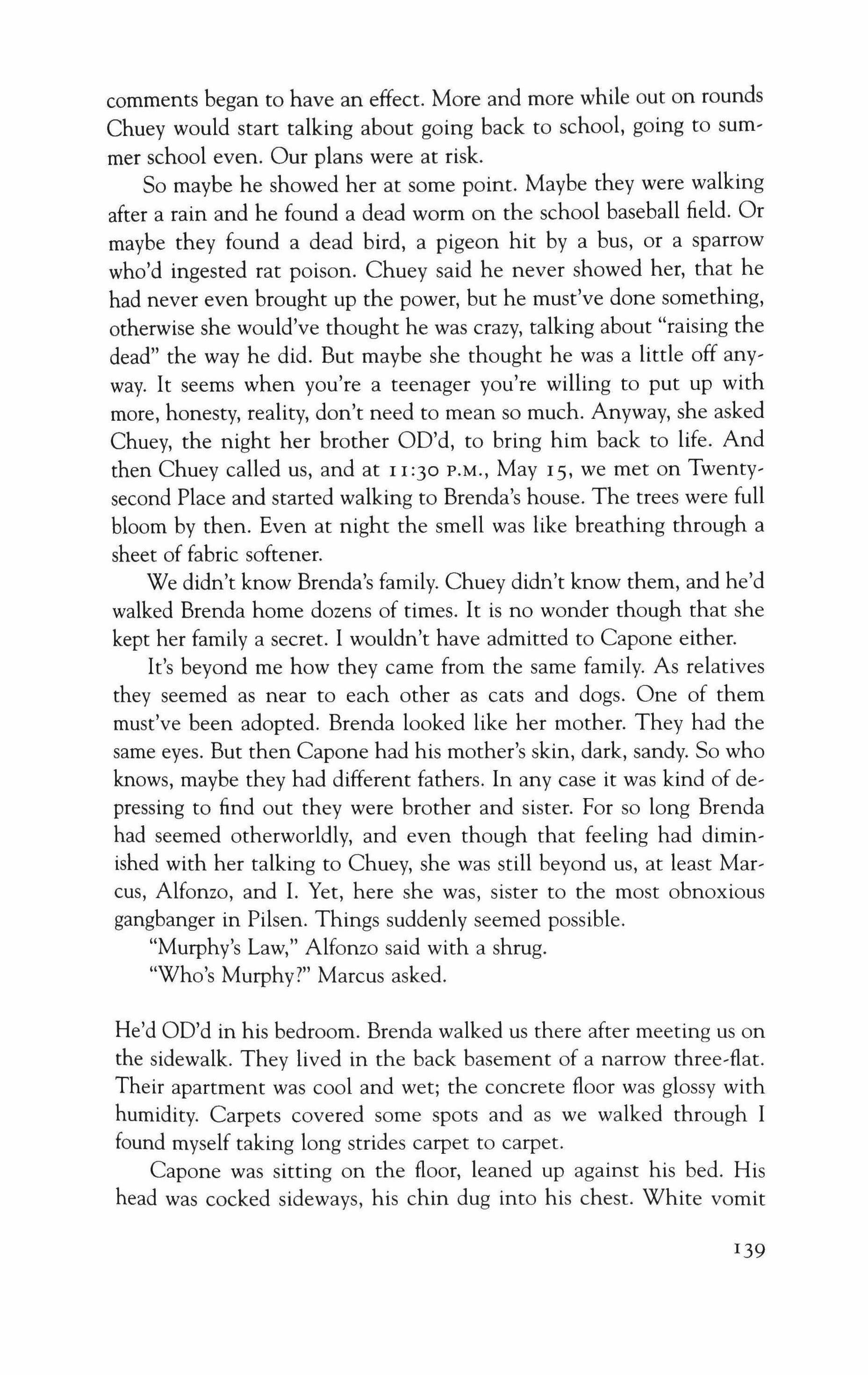
comments began to have an effect. More and more while out on rounds Chuey would start talking about going back to school, going to summer school even. Our plans were at risk.
So maybe he showed her at some point. Maybe they were walking after a rain and he found a dead worm on the school baseball field. Or maybe they found a dead bird, a pigeon hit by a bus, or a sparrow who'd ingested rat poison. Chuey said he never showed her, that he had never even brought up the power, but he must've done something, otherwise she would've thought he was crazy, talking about "raising the dead" the way he did. But maybe she thought he was a little off anyway. It seems when you're a teenager you're willing to put up with more, honesty, reality, don't need to mean so much. Anyway, she asked Chuey, the night her brother OD'd, to bring him back to life. And then Chuey called us, and at 11:30 P.M., May 15, we met on Twentysecond Place and started walking to Brenda's house. The trees were full bloom by then. Even at night the smell was like breathing through a sheet of fabric softener.
We didn't know Brenda's family. Chuey didn't know them, and he'd walked Brenda home dozens of times. It is no wonder though that she kept her family a secret. I wouldn't have admitted to Capone either.
It's beyond me how they came from the same family. As relatives they seemed as near to each other as cats and dogs. One of them must've been adopted. Brenda looked like her mother. They had the same eyes. But then Capone had his mother's skin, dark, sandy. So who knows, maybe they had different fathers. In any case it was kind of depressing to find out they were brother and sister. For so long Brenda had seemed otherworldly, and even though that feeling had diminished with her talking to Chuey, she was still beyond us, at least Marcus, Alfonzo, and 1. Yet, here she was, sister to the most obnoxious gangbanger in Pilsen. Things suddenly seemed possible.
"Murphy's Law," Alfonzo said with a shrug.
"Who's Murphy?" Marcus asked.
He'd OD'd in his bedroom. Brenda walked us there after meeting us on the sidewalk. They lived in the back basement of a narrow three-flat. Their apartment was cool and wet; the concrete floor was glossy with humidity. Carpets covered some spots and as we walked through I found myself taking long strides carpet to carpet.
Capone was sitting on the floor, leaned up against his bed. His head was cocked sideways, his chin dug into his chest. White vomit
139

streaked down the left side of his mouth onto his black T-shirt. He was filthy. He stunk. He looked like he hadn't bathed in a week.
"How long has he been this way!" Marcus asked.
"We just found him," Brenda said. "Maybe a half-hour ago."
"No, I mean dirty like that," Marcus said. "When's the last time he took a bath!"
"I don't know," Brenda said. "He leaves home for weeks then just shows up for breakfast or something. We haven't seen him for a month, then tonight we found him here."
The last time the four of us had seen Capone was back in the winter, back when that white Cadillac had stopped in middle of Paulina Street. I wondered if he'd been stoned since then. I wondered if his death was the end of a five-month long high.
"You sure he's dead?" Alfonzo asked.
"His heart's not beating," Brenda said. She raised her eyebrows as if she might be wrong.
Chuey got down on a knee and reached for Capone's wrist. He searched for a pulse, using two fingers, stopping at various points like he knew exactly what he was doing.
Capone's arms were covered in tattoos. On his right forearm, close to his elbow, were the masks of comedy and tragedy, both crying large, white tears. Just below was a fat, green, faded crucifix. And then at his wrist, where Chuey was searching, the word AMOR was written in Old English script.
"Can you do something, Jesse?" Brenda asked. She used Chuey's real name. No one ever used Chuey's real name, not even his family. I wanted to correct her.
Chuey sighed. "An hour max," he said. "Easy death, no violence. We'll take care of it."
I looked to Alfonzo and Marcus. They both looked at me. Chuey had never sounded so official.
Chuey reached into his pocket and pulled out a penlight. He pried open one of Capone's eyelids and then shined the light in. He pulled the light away and brought it back quickly. He did this two or three times for each eye. With each flash he gave a small grunt as if whatever he was looking for wasn't there.
Capone's pants were stiff and crusty. They were blue but hazy, spotted with dirt and grease. They looked like the pants of an alley auto mechanic. Capone's socks had been white at some point. Now they were black at the soles, lighter shades of gray towards his ankles. I could-
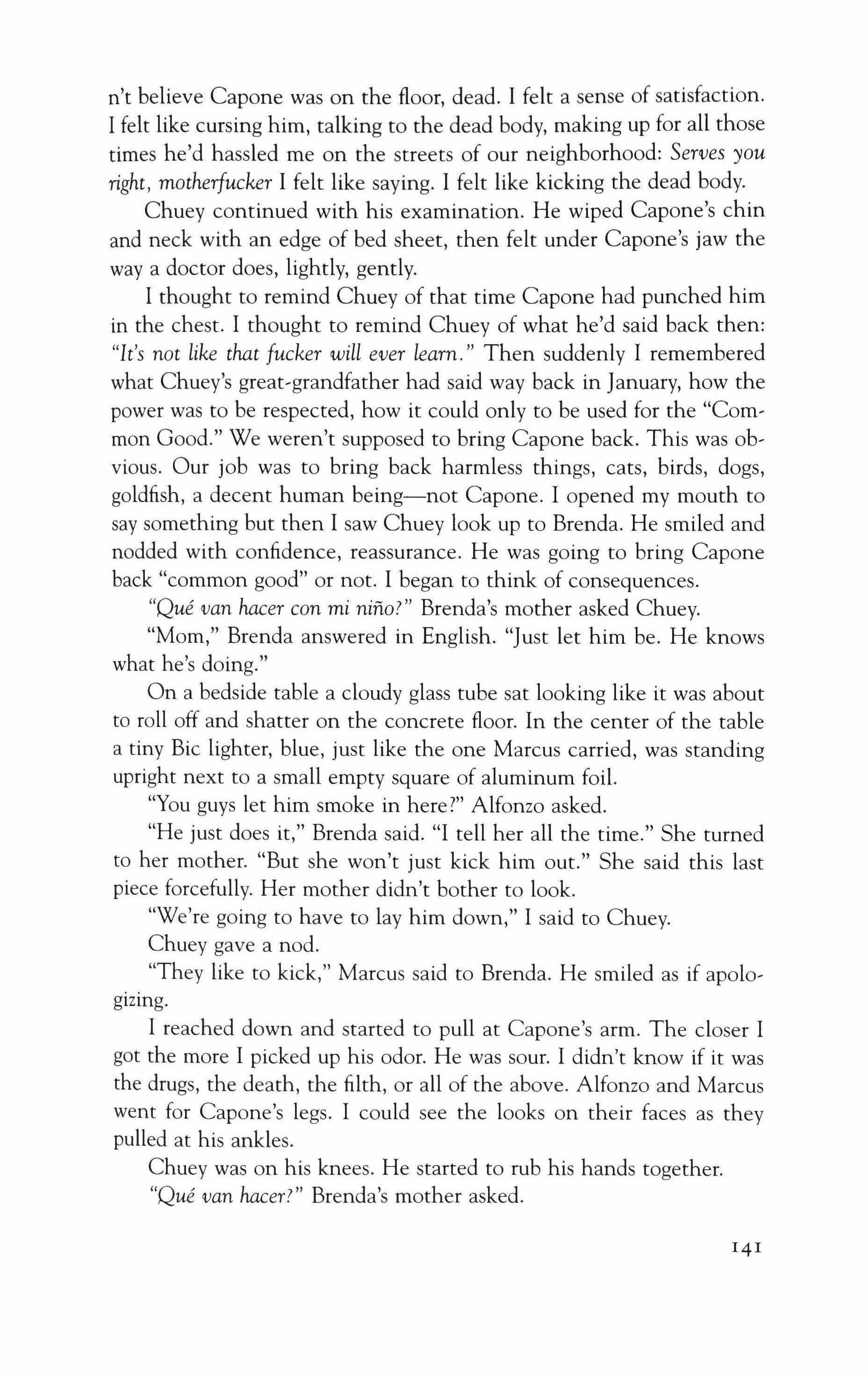
n't believe Capone was on the floor, dead. I felt a sense of satisfaction. I felt like cursing him, talking to the dead body, making up for all those times he'd hassled me on the streets of our neighborhood: Serves you right, motherfucker I felt like saying. I felt like kicking the dead body.
Chuey continued with his examination. He wiped Capone's chin and neck with an edge of bed sheet, then felt under Capone's jaw the way a doctor does, lightly, gently.
I thought to remind Chuey of that time Capone had punched him in the chest. I thought to remind Chuey of what he'd said back then: "It's not like that fucker will ever learn." Then suddenly I remembered what Chuey's great-grandfather had said way back in January, how the power was to be respected, how it could only to be used for the "Common Good." We weren't supposed to bring Capone back. This was obvious. Our job was to bring back harmless things, cats, birds, dogs, goldfish, a decent human being-not Capone. I opened my mouth to say something but then I saw Chuey look up to Brenda. He smiled and nodded with confidence, reassurance. He was going to bring Capone back "common good" or not. I began to think of consequences.
"Que van hacer can mi nino?" Brenda's mother asked Chuey.
"Mom," Brenda answered in English. "Just let him be. He knows what he's doing."
On a bedside table a cloudy glass tube sat looking like it was about to roll off and shatter on the concrete floor. In the center of the table a tiny Bic lighter, blue, just like the one Marcus carried, was standing upright next to a small empty square of aluminum foil.
"You guys let him smoke in here?" Alfonzo asked.
"He just does it," Brenda said. "I tell her all the time." She turned to her mother. "But she won't just kick him out." She said this last piece forcefully. Her mother didn't bother to look.
"We're going to have to lay him down," I said to Chuey.
Chuey gave a nod.
"They like to kick," Marcus said to Brenda. He smiled as if apologizing.
I reached down and started to pull at Capone's arm. The closer I got the more I picked up his odor. He was sour. I didn't know if it was the drugs, the death, the filth, or all of the above. Alfonzo and Marcus went for Capone's legs. I could see the looks on their faces as they pulled at his ankles.
Chuey was on his knees. He started to rub his hands together.
"Que van hacer?" Brenda's mother asked.
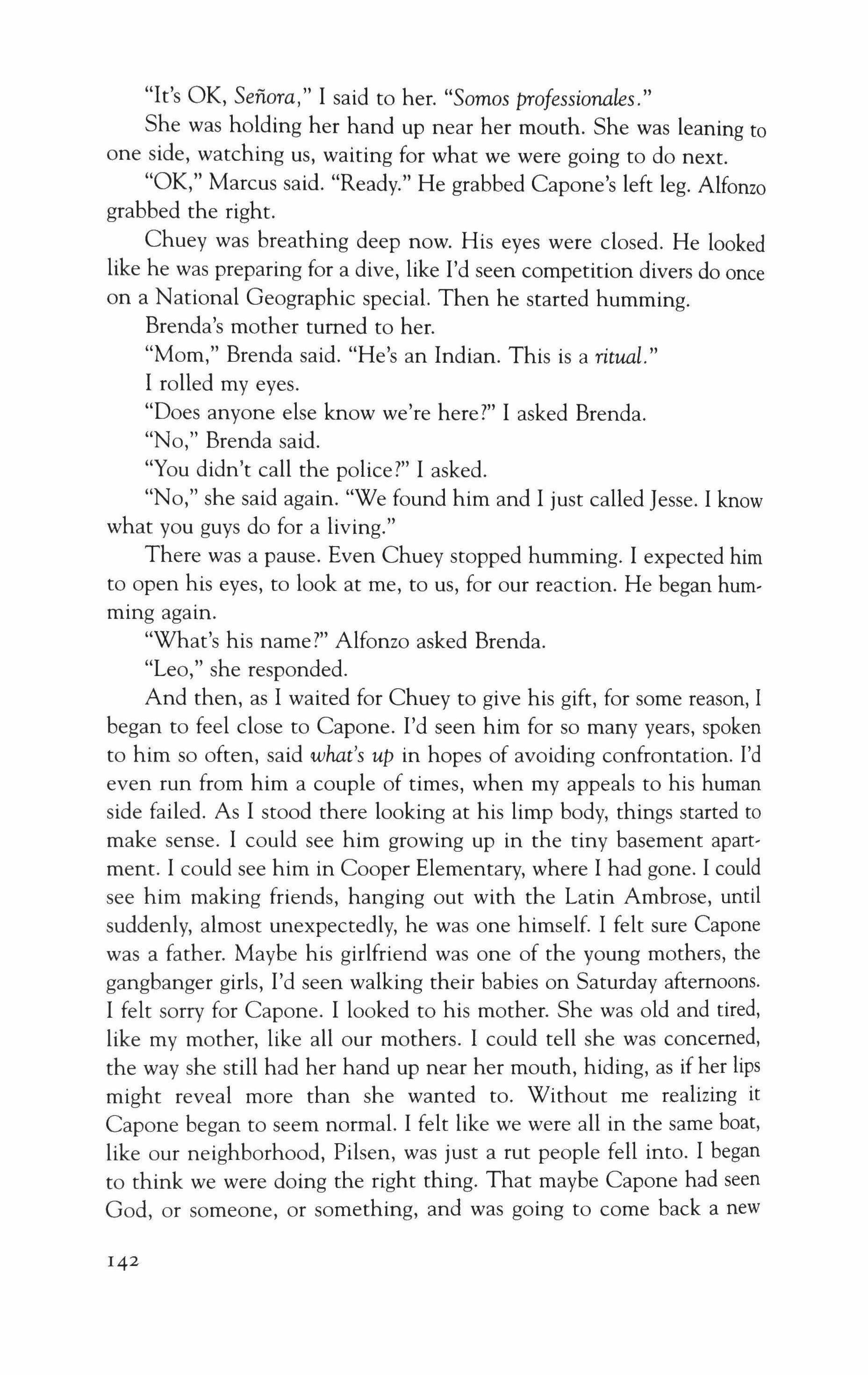
"It's OK, Senora," I said to her. "Somos professionales."
She was holding her hand up near her mouth. She was leaning to one side, watching us, waiting for what we were going to do next.
"OK," Marcus said. "Ready." He grabbed Capone's left leg. Alfonzo grabbed the right.
Chuey was breathing deep now. His eyes were closed. He looked like he was preparing for a dive, like I'd seen competition divers do once on a National Geographic special. Then he started humming. Brenda's mother turned to her.
"Mom," Brenda said. "He's an Indian. This is a ritual."
I rolled my eyes.
"Does anyone else know we're here?" I asked Brenda.
"No," Brenda said.
"You didn't call the police?" I asked.
"No," she said again. "We found him and I just called Jesse. I know what you guys do for a living."
There was a pause. Even Chuey stopped humming. I expected him to open his eyes, to look at me, to us, for our reaction. He began humming again.
"What's his name?" Alfonzo asked Brenda.
"Leo," she responded.
And then, as I waited for Chuey to give his gift, for some reason, I began to feel close to Capone. I'd seen him for so many years, spoken to him so often, said what's up in hopes of avoiding confrontation. I'd even run from him a couple of times, when my appeals to his human side failed. As I stood there looking at his limp body, things started to make sense. I could see him growing up in the tiny basement apartment. I could see him in Cooper Elementary, where I had gone. I could see him making friends, hanging out with the Latin Ambrose, until suddenly, almost unexpectedly, he was one himself. I felt sure Capone was a father. Maybe his girlfriend was one of the young mothers, the gangbanger girls, I'd seen walking their babies on Saturday afternoons. I felt sorry for Capone. I looked to his mother. She was old and tired, like my mother, like all our mothers. I could tell she was concerned, the way she still had her hand up near her mouth, hiding, as if her lips might reveal more than she wanted to. Without me realizing it Capone began to seem normal. I felt like we were all in the same boat, like our neighborhood, Pilsen, was just a rut people fell into. I began to think we were doing the right thing. That maybe Capone had seen God, or someone, or something, and was going to come back a new
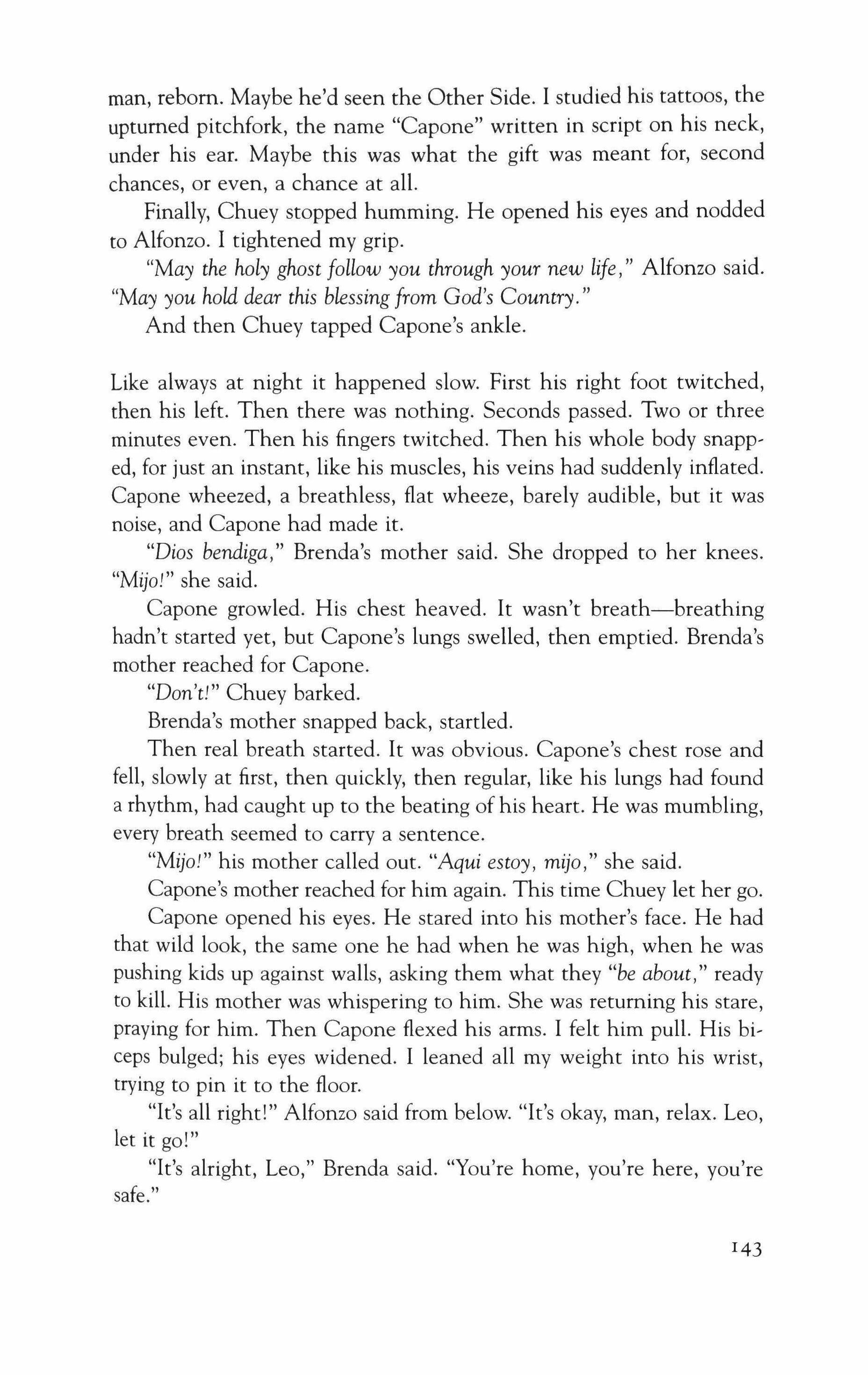
man, reborn. Maybe he'd seen the Other Side. I studied his tattoos, the upturned pitchfork, the name "Capone" written in script on his neck, under his ear. Maybe this was what the gift was meant for, second chances, or even, a chance at all.
Finally, Chuey stopped humming. He opened his eyes and nodded to Alfonzo. I tightened my grip.
"May the holy ghost follow you through your new life," Alfonzo said. "May you hold dear this blessing from God's Country." And then Chuey tapped Capone's ankle.
Like always at night it happened slow. First his right foot twitched, then his left. Then there was nothing. Seconds passed. Two or three minutes even. Then his fingers twitched. Then his whole body snapped, for just an instant, like his muscles, his veins had suddenly inflated. Capone wheezed, a breathless, flat wheeze, barely audible, but it was noise, and Capone had made it.
"Dios bendiga," Brenda's mother said. She dropped to her knees. "Mijo!" she said.
Capone growled. His chest heaved. It wasn't breath-breathing hadn't started yet, but Capone's lungs swelled, then emptied. Brenda's mother reached for Capone.
"Don't!" Chuey barked.
Brenda's mother snapped back, startled. Then real breath started. It was obvious. Capone's chest rose and fell, slowly at first, then quickly, then regular, like his lungs had found a rhythm, had caught up to the beating of his heart. He was mumbling, every breath seemed to carry a sentence.
"Mijo!" his mother called out. "Aqui estoy, mijo," she said.
Capone's mother reached for him again. This time Chuey let her go. Capone opened his eyes. He stared into his mother's face. He had that wild look, the same one he had when he was high, when he was pushing kids up against walls, asking them what they "be about," ready to kill. His mother was whispering to him. She was returning his stare, praying for him. Then Capone flexed his arms. I felt him pull. His biceps bulged; his eyes widened. I leaned all my weight into his wrist, trying to pin it to the floor.
"It's all right!" Alfonzo said from below. "It's okay, man, relax. Leo, let it go!"
"It's alright, Leo," Brenda said. "You're home, you're here, you're safe."
143
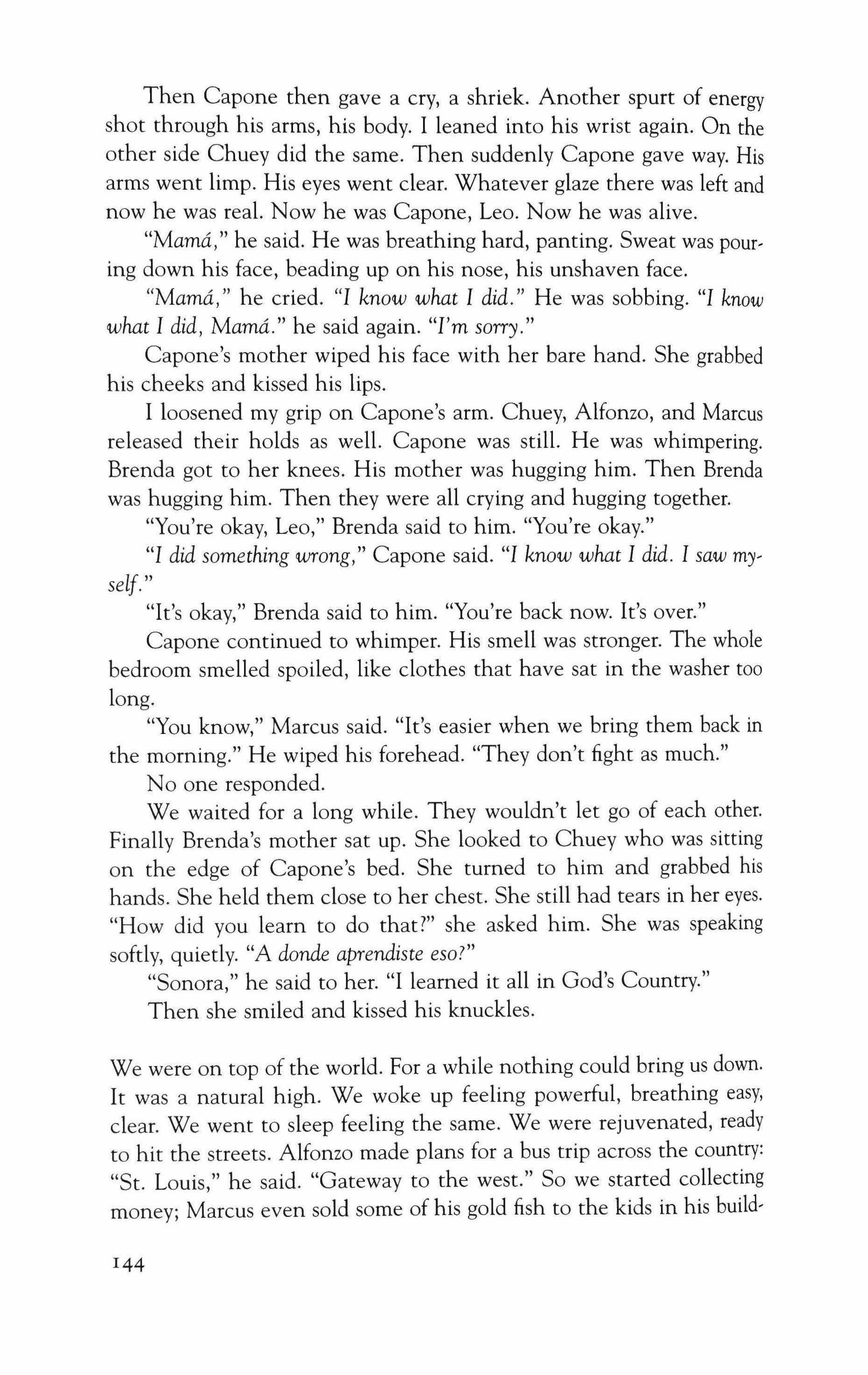
Then Capone then gave a cry, a shriek. Another spurt of energy shot through his arms, his body. I leaned into his wrist again. On the other side Chuey did the same. Then suddenly Capone gave way. His arms went limp. His eyes went clear. Whatever glaze there was left and now he was real. Now he was Capone, Leo. Now he was alive.
"Mama," he said. He was breathing hard, panting. Sweat was pouring down his face, beading up on his nose, his unshaven face.
"Mama," he cried. "I know what I did." He was sobbing. "I know what I did, Mama." he said again. "I'm sorry."
Capone's mother wiped his face with her bare hand. She grabbed his cheeks and kissed his lips.
I loosened my grip on Capone's arm. Chuey, Alfonzo, and Marcus released their holds as well. Capone was still. He was whimpering. Brenda got to her knees. His mother was hugging him. Then Brenda was hugging him. Then they were all crying and hugging together.
"You're okay, Leo," Brenda said to him. "You're okay."
"I did something wrong," Capone said. "I know what I did. I saw myself.
"It's okay," Brenda said to him. "You're back now. It's over."
Capone continued to whimper. His smell was stronger. The whole bedroom smelled spoiled, like clothes that have sat in the washer too long.
"You know," Marcus said. "It's easier when we bring them back in the morning." He wiped his forehead. "They don't fight as much."
No one responded.
We waited for a long while. They wouldn't let go of each other. Finally Brenda's mother sat up. She looked to Chuey who was sitting on the edge of Capone's bed. She turned to him and grabbed his hands. She held them close to her chest. She still had tears in her eyes. "How did you learn to do that?" she asked him. She was speaking softly, quietly. "A donde aprendiste esol"
"Sonora," he said to her. "I learned it all in God's Country." Then she smiled and kissed his knuckles.
We were on top of the world. For a while nothing could bring us down. It was a natural high. We woke up feeling powerful, breathing easy, clear. We went to sleep feeling the same. We were rejuvenated, ready to hit the streets. Alfonzo made plans for a bus trip across the country: "St. Louis," he said. "Gateway to the west." So we started collecting money; Marcus even sold some of his gold fish to the kids in his build-
144
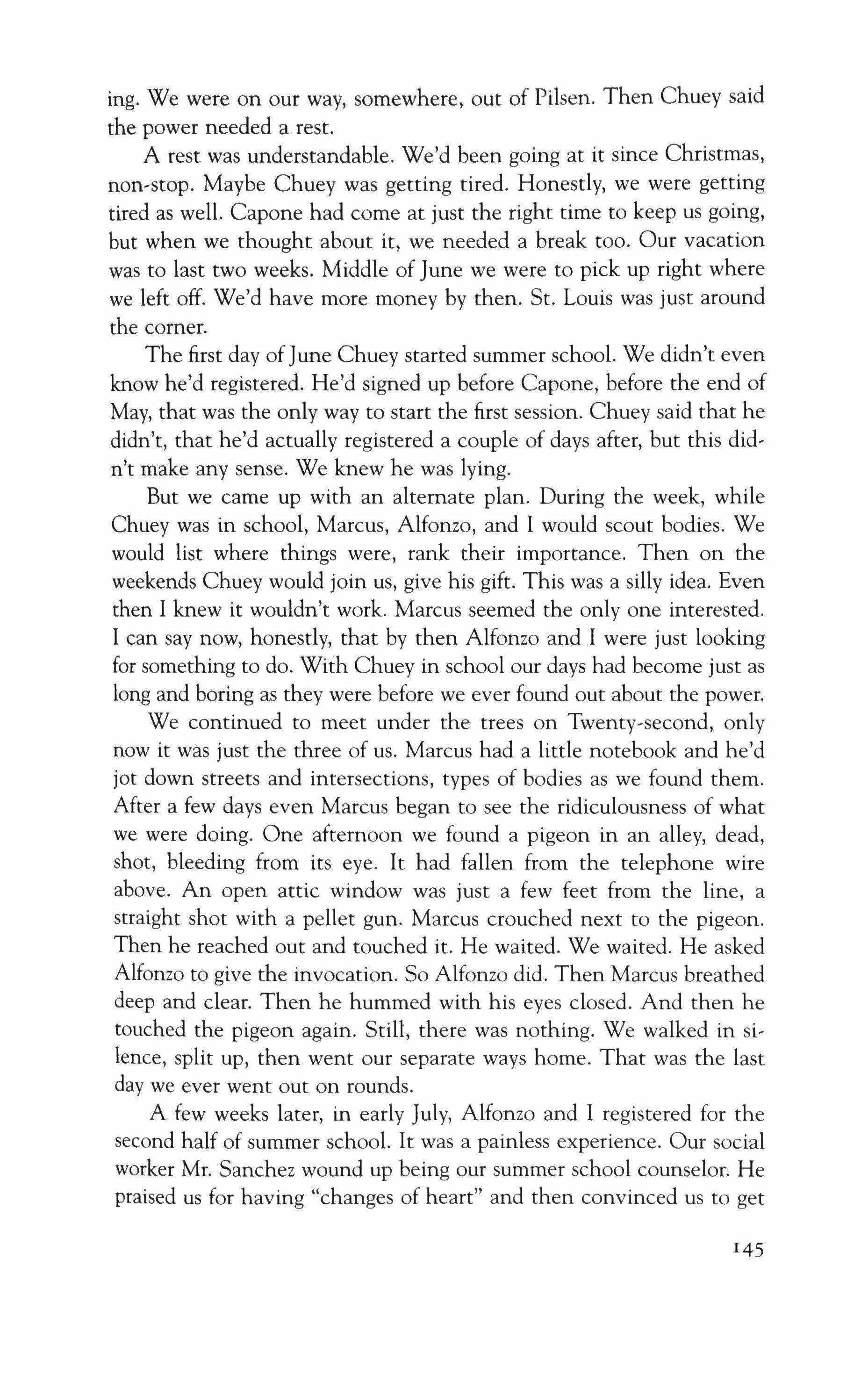
ing. We were on our way, somewhere, out of Pilsen. Then Chuey said the power needed a rest.
A rest was understandable. We'd been going at it since Christmas, non-stop. Maybe Chuey was getting tired. Honestly, we were getting tired as well. Capone had come at just the right time to keep us going, but when we thought about it, we needed a break too. Our vacation was to last two weeks. Middle of June we were to pick up right where we left off. We'd have more money by then. St. Louis was just around the corner.
The first day ofJune Chuey started summer school. We didn't even know he'd registered. He'd signed up before Capone, before the end of May, that was the only way to start the first session. Chuey said that he didn't, that he'd actually registered a couple of days after, but this didn't make any sense. We knew he was lying.
But we came up with an alternate plan. During the week, while Chuey was in school, Marcus, Alfonzo, and I would scout bodies. We would list where things were, rank their importance. Then on the weekends Chuey would join us, give his gift. This was a silly idea. Even then I knew it wouldn't work. Marcus seemed the only one interested. I can say now, honestly, that by then Alfonzo and I were just looking for something to do. With Chuey in school our days had become just as long and boring as they were before we ever found out about the power. We continued to meet under the trees on Twenty-second, only now it was just the three of us. Marcus had a little notebook and he'd jot down streets and intersections, types of bodies as we found them. After a few days even Marcus began to see the ridiculousness of what we were doing. One afternoon we found a pigeon in an alley, dead, shot, bleeding from its eye. It had fallen from the telephone wire above. An open attic window was just a few feet from the line, a straight shot with a pellet gun. Marcus crouched next to the pigeon. Then he reached out and touched it. He waited. We waited. He asked Alfonzo to give the invocation. So Alfonzo did. Then Marcus breathed deep and clear. Then he hummed with his eyes closed. And then he touched the pigeon again. Still, there was nothing. We walked in silence, split up, then went our separate ways home. That was the last day we ever went out on rounds.
A few weeks later, in early July, Alfonzo and I registered for the second half of summer school. It was a painless experience. Our social worker Mr. Sanchez wound up being our summer school counselor. He praised us for having "changes of heart" and then convinced us to get
145
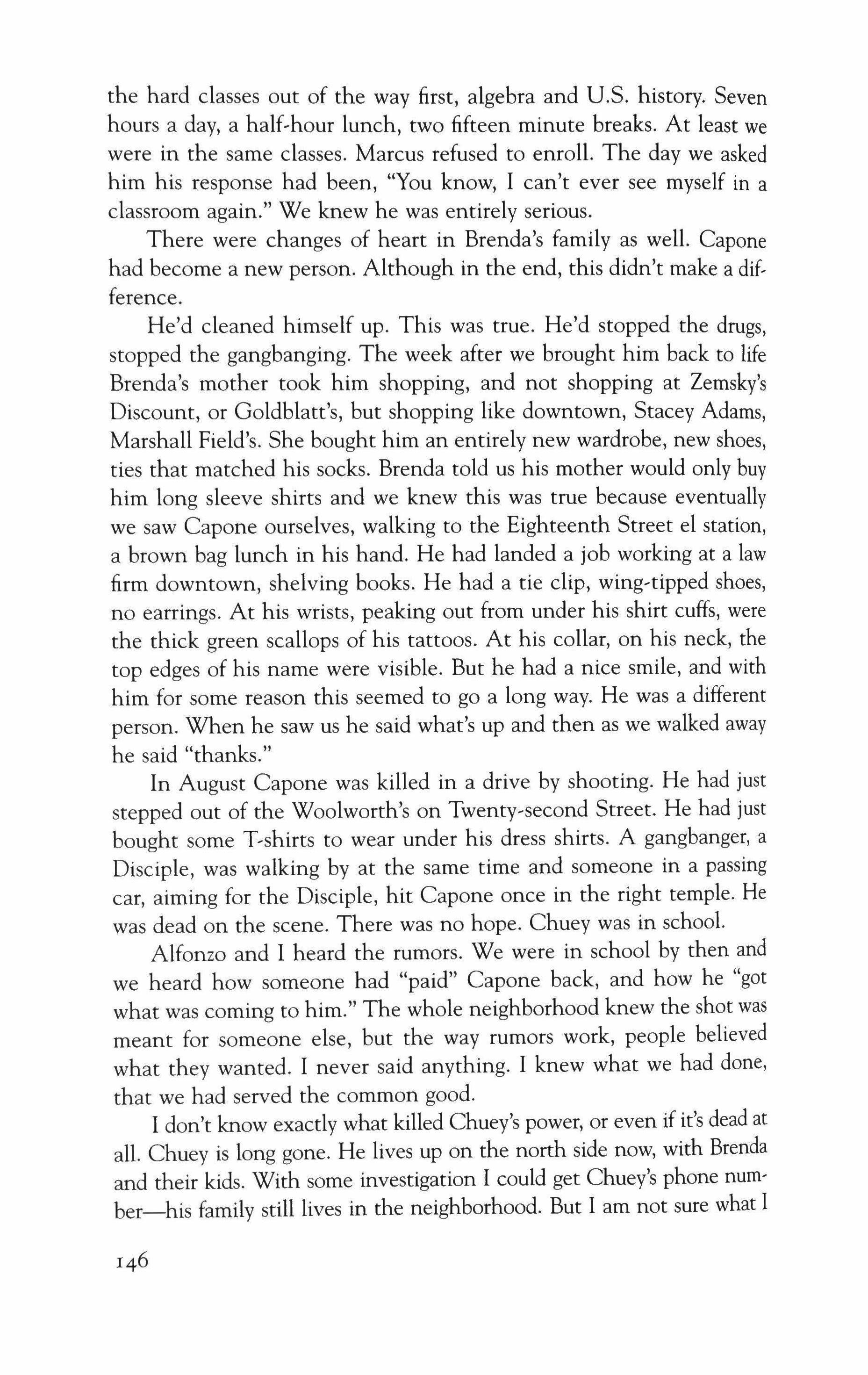
the hard classes out of the way first, algebra and U.S. history. Seven hours a day, a half-hour lunch, two fifteen minute breaks. At least we were in the same classes. Marcus refused to enroll. The day we asked him his response had been, "You know, I can't ever see myself in a classroom again." We knew he was entirely serious. There were changes of heart in Brenda's family as well. Capone had become a new person. Although in the end, this didn't make a difference.
He'd cleaned himself up. This was true. He'd stopped the drugs, stopped the gangbanging. The week after we brought him back to life Brenda's mother took him shopping, and not shopping at Zemsky's Discount, or Goldblatt's, but shopping like downtown, Stacey Adams, Marshall Field's. She bought him an entirely new wardrobe, new shoes, ties that matched his socks. Brenda told us his mother would only buy him long sleeve shirts and we knew this was true because eventually we saw Capone ourselves, walking to the Eighteenth Street el station, a brown bag lunch in his hand. He had landed a job working at a law firm downtown, shelving books. He had a tie clip, wing-tipped shoes, no earrings. At his wrists, peaking out from under his shirt cuffs, were the thick green scallops of his tattoos. At his collar, on his neck, the top edges of his name were visible. But he had a nice smile, and with him for some reason this seemed to go a long way. He was a different person. When he saw us he said what's up and then as we walked away he said "thanks."
In August Capone was killed in a drive by shooting. He had just stepped out of the Woolworth's on Twenty-second Street. He had just bought some T'shirts to wear under his dress shirts. A gangbanger, a Disciple, was walking by at the same time and someone in a passing car, aiming for the Disciple, hit Capone once in the right temple. He was dead on the scene. There was no hope. Chuey was in school.
Alfonzo and I heard the rumors. We were in school by then and we heard how someone had "paid" Capone back, and how he "got what was coming to him." The whole neighborhood knew the shot was meant for someone else, but the way rumors work, people believed what they wanted. I never said anything. I knew what we had done, that we had served the common good.
I don't know exactly what killed Chuey's power, or even if it's dead at all. Chuey is long gone. He lives up on the north side now, with Brenda and their kids. With some investigation I could get Chuey's phone number-his family still lives in the neighborhood. But I am not sure what I
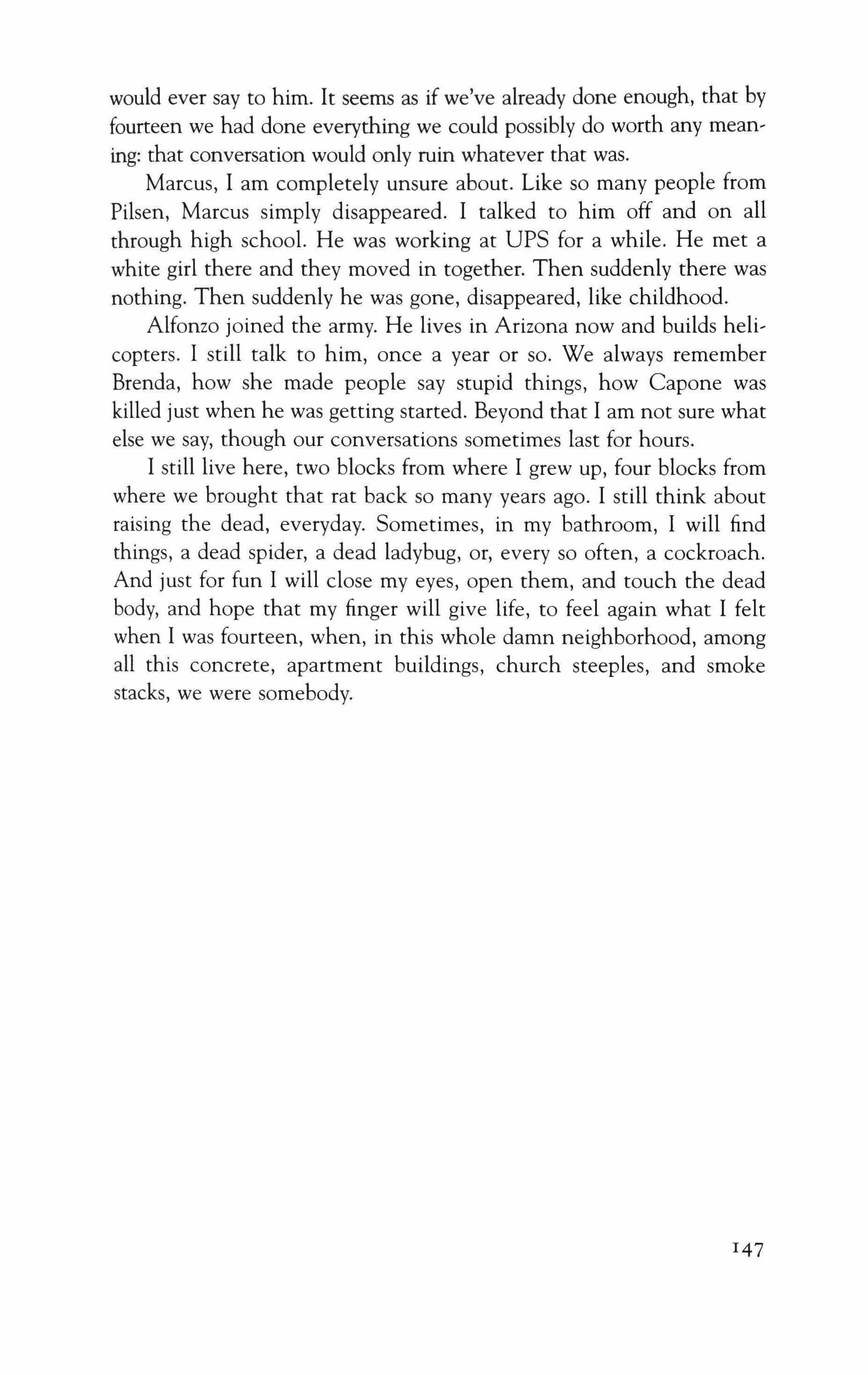
would ever say to him. It seems as if we've already done enough, that by fourteen we had done everything we could possibly do worth any meaning: that conversation would only ruin whatever that was.
Marcus, I am completely unsure about. Like so many people from Pilsen, Marcus simply disappeared. I talked to him off and on all through high school. He was working at UPS for a while. He met a white girl there and they moved in together. Then suddenly there was nothing. Then suddenly he was gone, disappeared, like childhood.
Alfonzo joined the army. He lives in Arizona now and builds helicopters. I still talk to him, once a year or so. We always remember Brenda, how she made people say stupid things, how Capone was killed just when he was getting started. Beyond that I am not sure what else we say, though our conversations sometimes last for hours.
I still live here, two blocks from where I grew up, four blocks from where we brought that rat back so many years ago. I still think about raising the dead, everyday. Sometimes, in my bathroom, I will find things, a dead spider, a dead ladybug, or, every so often, a cockroach. And just for fun I will close my eyes, open them, and touch the dead body, and hope that my finger will give life, to feel again what I felt when I was fourteen, when, in this whole damn neighborhood, among all this concrete, apartment buildings, church steeples, and smoke stacks, we were somebody.
I47
One Firefly
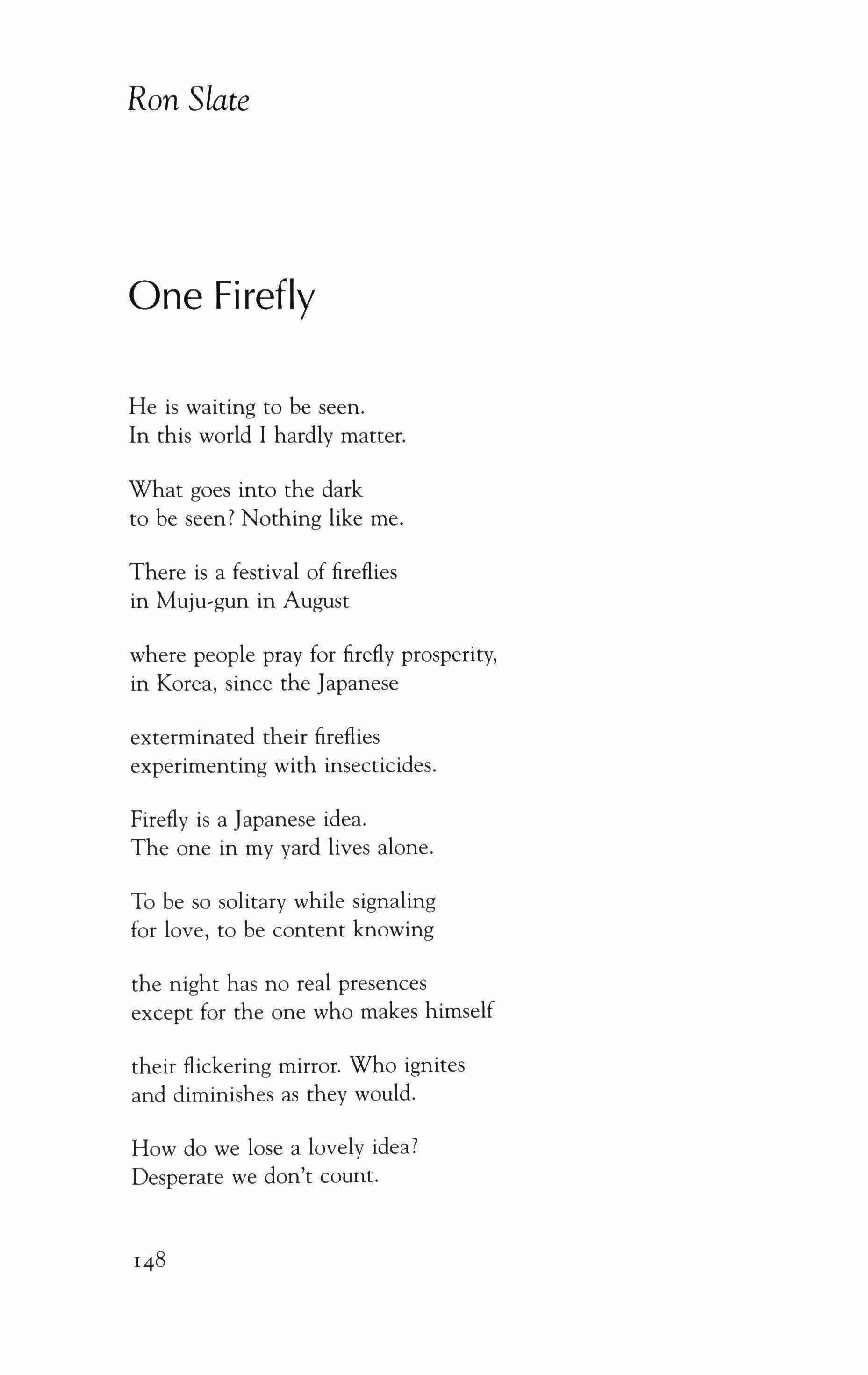
He is waiting to be seen. In this world I hardly matter.
What goes into the dark to be seen? Nothing like me.
There is a festival of fireflies in Muju-gun in August
where people pray for firefly prosperity, in Korea, since the Japanese exterminated their fireflies experimenting with insecticides.
Firefly is a Japanese idea. The one in my yard lives alone.
To be so solitary while signaling for love, to be content knowing the night has no real presences except for the one who makes himself their flickering mirror. Who ignites and diminishes as they would.
How do we lose a lovely idea? Desperate we don't count.
Ron Slate
148
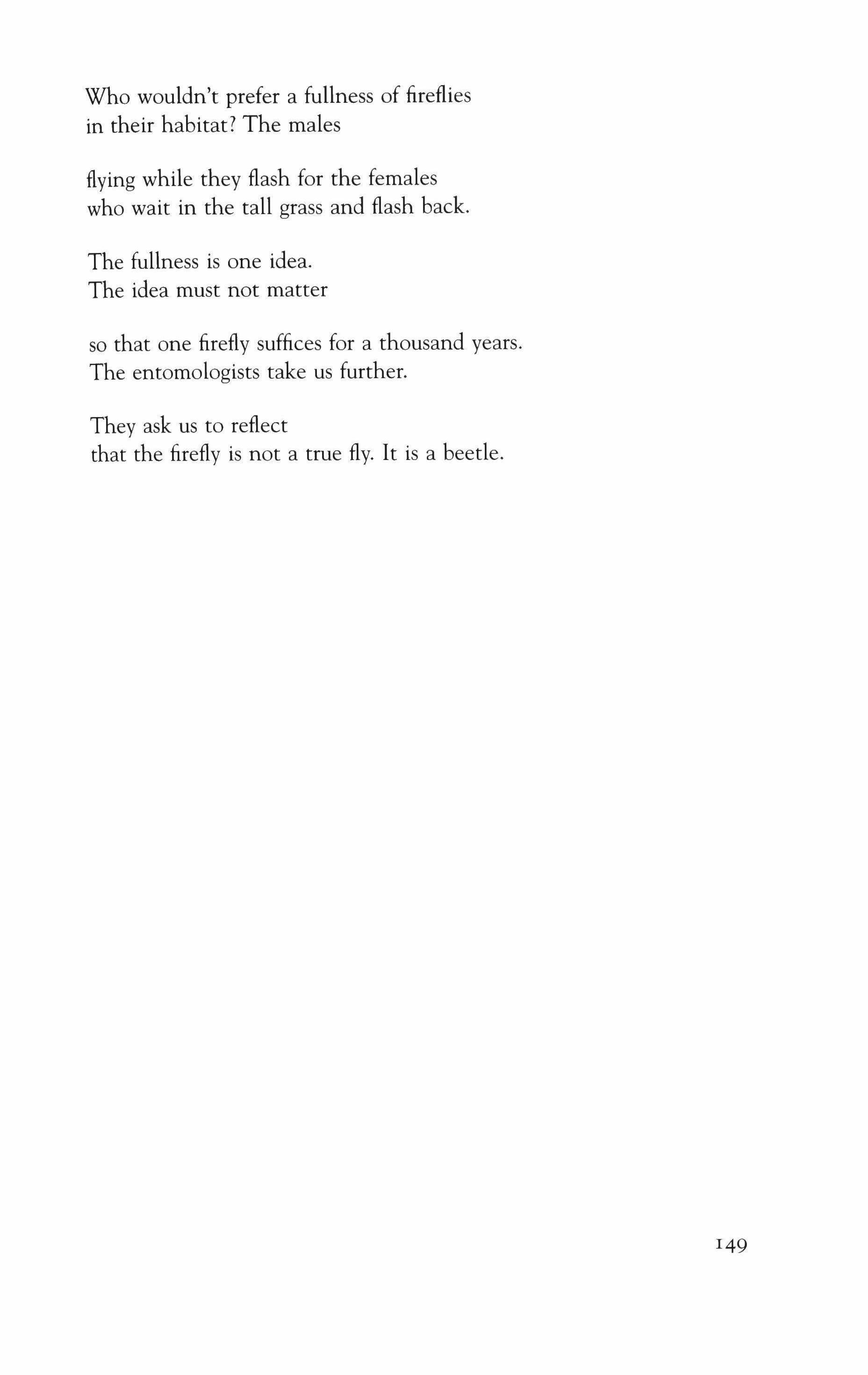
Who wouldn't prefer a fullness of fireflies in their habitat? The males
flying while they flash for the females who wait in the tall grass and flash back.
The fullness is one idea. The idea must not matter
so that one firefly suffices for a thousand years. The entomologists take us further.
They ask us to reflect that the firefly is not a true fly. It is a beetle.
149
Crow Menace in Tokyo
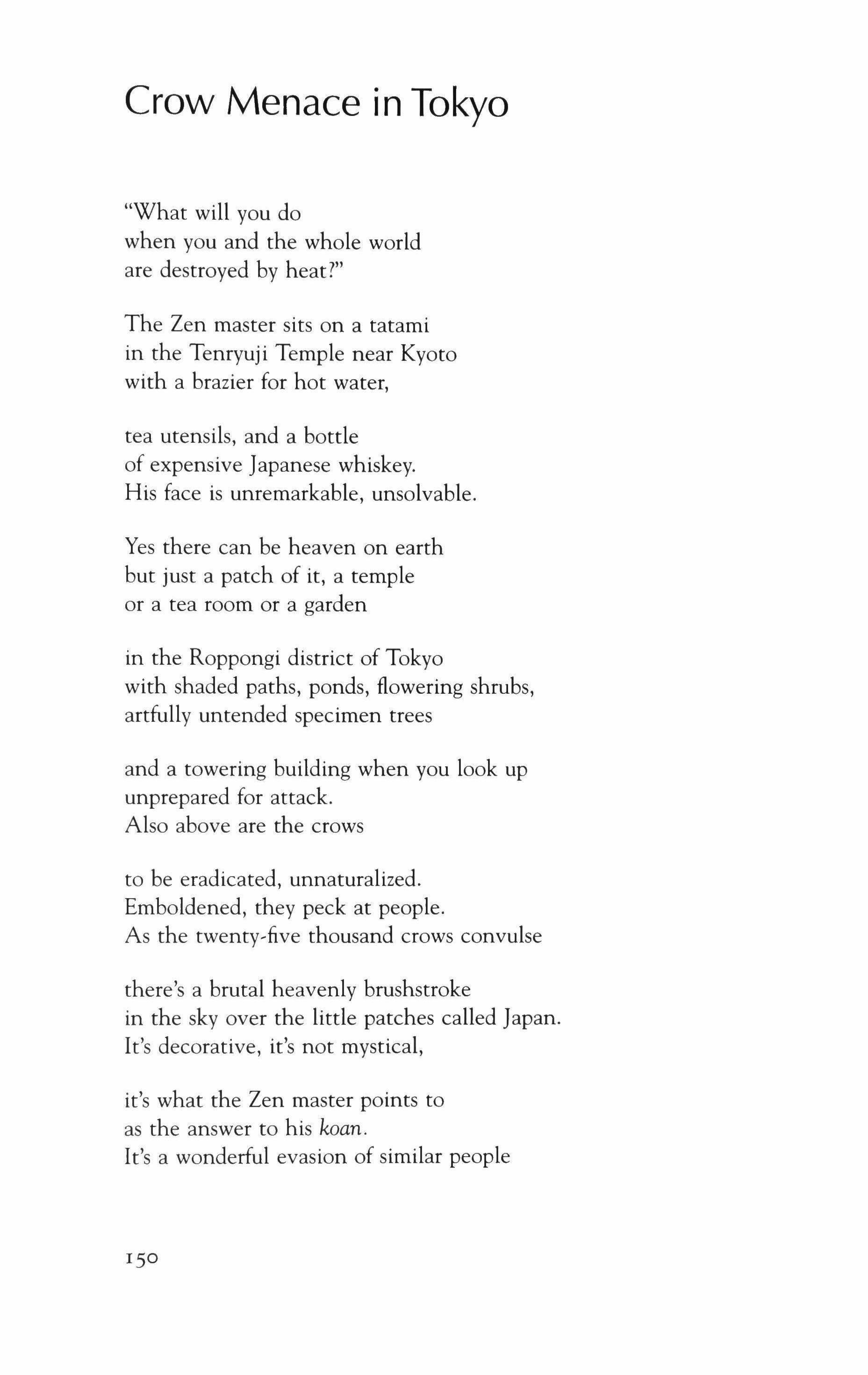
"What will you do when you and the whole world are destroyed by heat?"
The Zen master sits on a tatami in the Tenryuji Temple near Kyoto with a brazier for hot water, tea utensils, and a bottle of expensive Japanese whiskey. His face is unremarkable, unsolvable.
Yes there can be heaven on earth but just a patch of it, a temple or a tea room or a garden in the Roppongi district of Tokyo with shaded paths, ponds, flowering shrubs, artfully untended specimen trees
and a towering building when you look up unprepared for attack. Also above are the crows
to be eradicated, unnaturalized. Emboldened, they peck at people. As the twenty-five thousand crows convulse
there's a brutal heavenly brushstroke in the sky over the little patches called Japan. It's decorative, it's not mystical, it's what the Zen master points to as the answer to his koan. It's a wonderful evasion of similar people
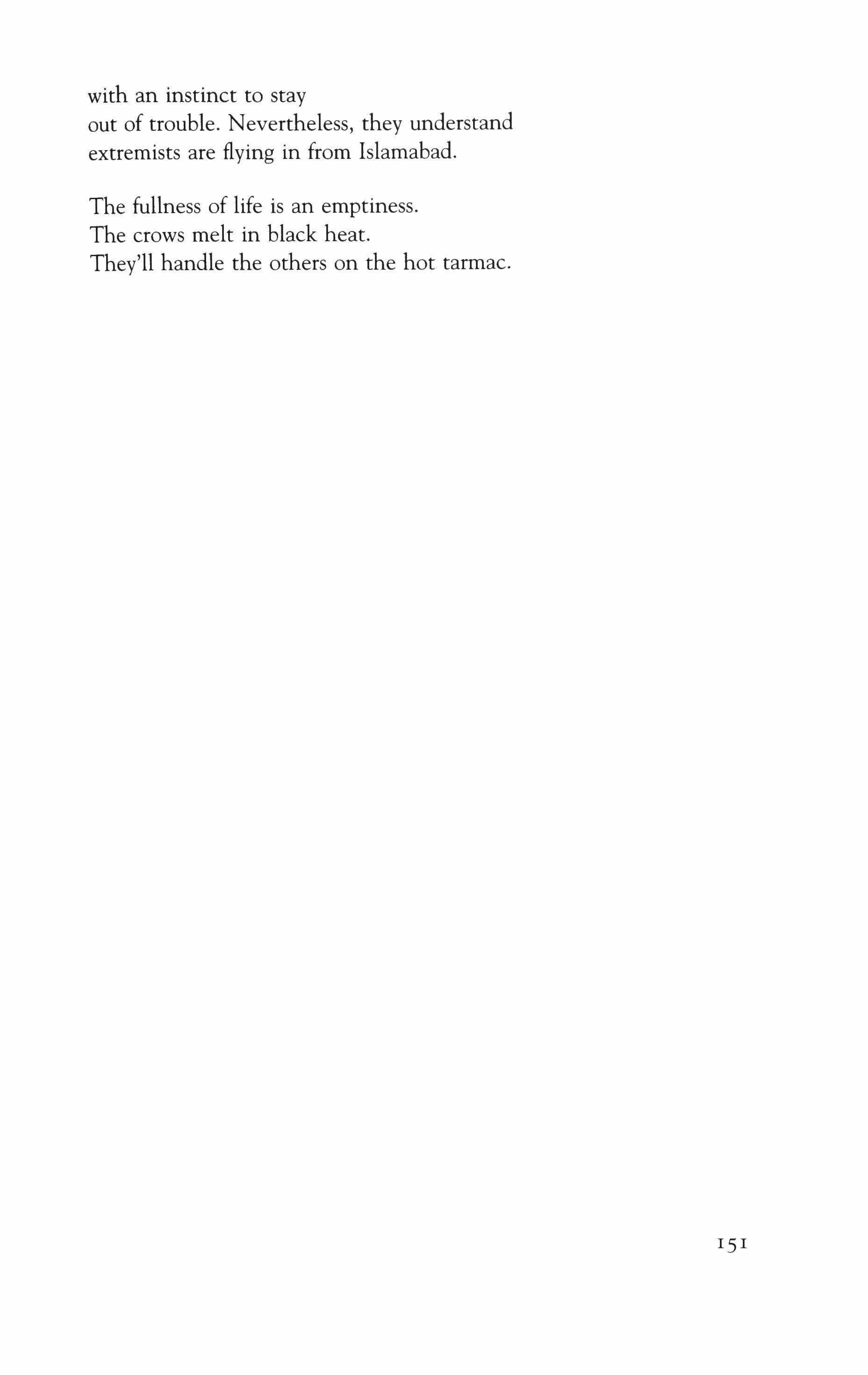
with an instinct to stay out of trouble. Nevertheless, they understand extremists are flying in from Islamabad.
The fullness of life is an emptiness. The crows melt in black heat. They'll handle the others on the hot tarmac.
Tristia at Neap Tide
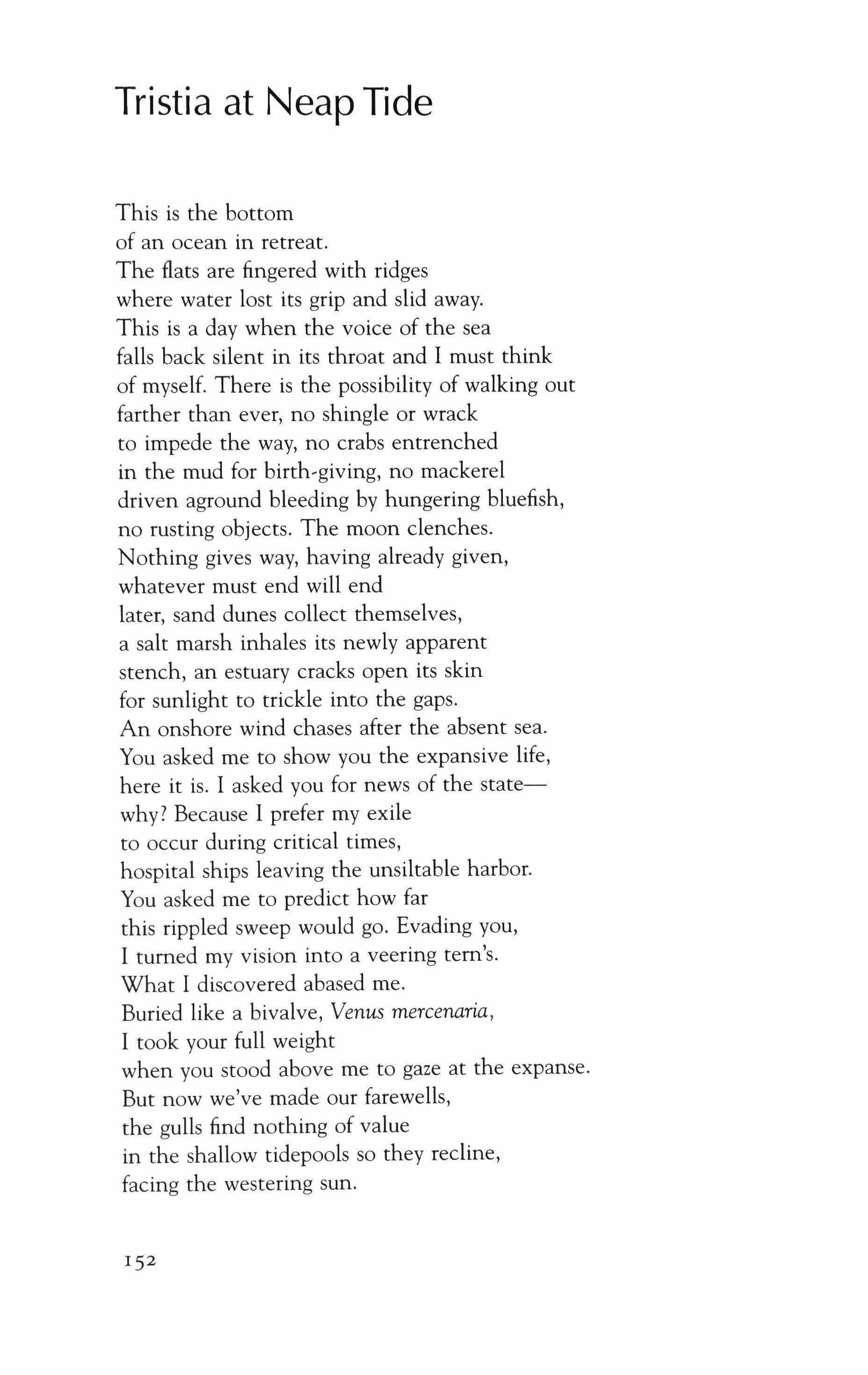
This is the bottom of an ocean in retreat. The flats are fingered with ridges where water lost its grip and slid away. This is a day when the voice of the sea falls back silent in its throat and I must think of myself. There is the possibility of walking out farther than ever, no shingle or wrack to impede the way, no crabs entrenched in the mud for birth-giving, no mackerel driven aground bleeding by hungering bluefish, no rusting objects. The moon clenches. Nothing gives way, having already given, whatever must end will end later, sand dunes collect themselves, a salt marsh inhales its newly apparent stench, an estuary cracks open its skin for sunlight to trickle into the gaps. An onshore wind chases after the absent sea. You asked me to show you the expansive life, here it is. I asked you for news of the statewhy? Because I prefer my exile to occur during critical times, hospital ships leaving the unsiltable harbor. You asked me to predict how far this rippled sweep would go. Evading you, I turned my vision into a veering tern's. What I discovered abased me.
Buried like a bivalve, Venus mercenaria, I took your full weight when you stood above me to gaze at the expanse. But now we've made our farewells, the gulls find nothing of value in the shallow tidepools so they recline, facing the westering sun.
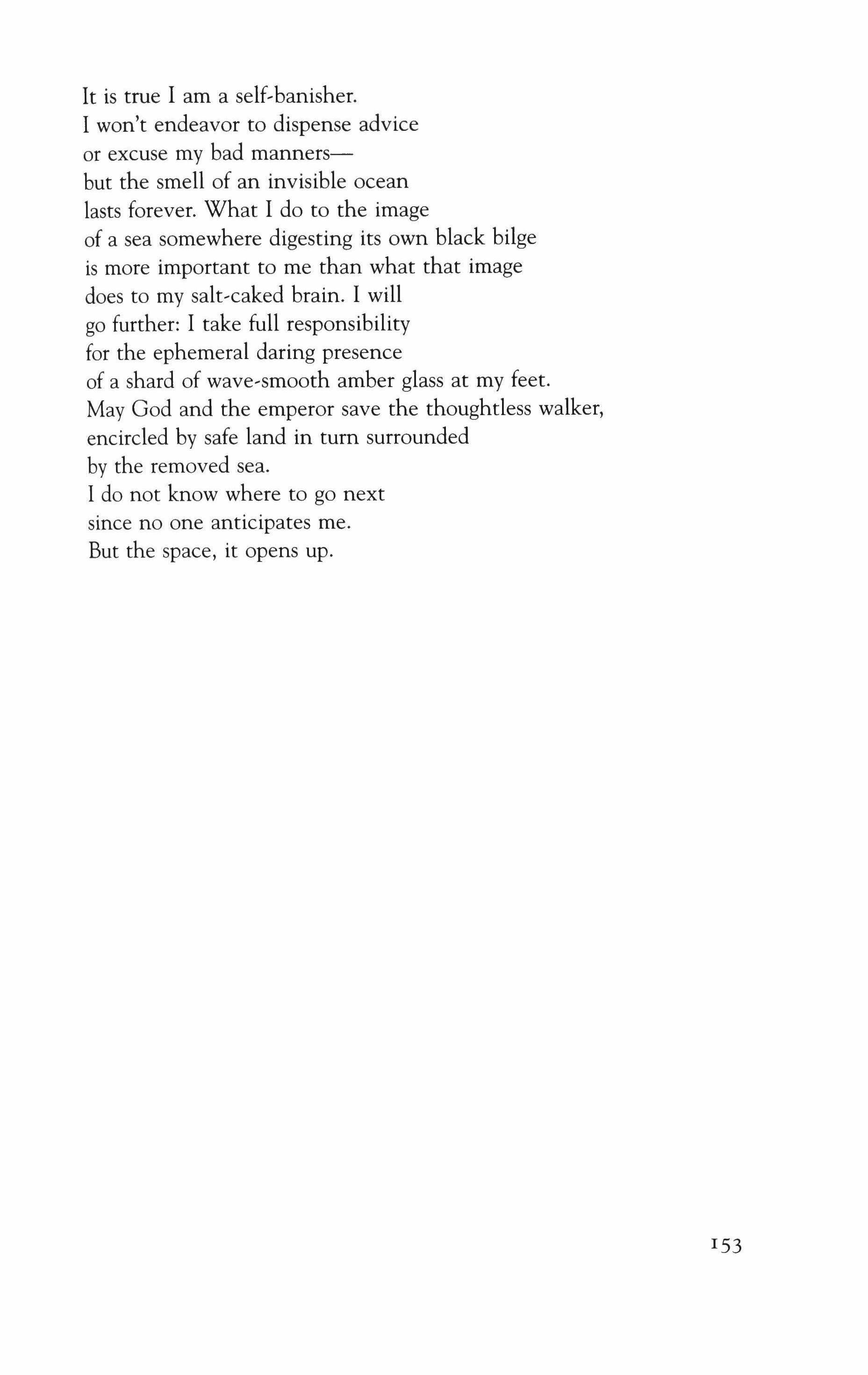
It is true 1 am a self-banisher, I won't endeavor to dispense advice or excuse my bad mannersbut the smell of an invisible ocean lasts forever. What 1 do to the image of a sea somewhere digesting its own black bilge is more important to me than what that image does to my salt-caked brain. I will go further: I take full responsibility for the ephemeral daring presence of a shard of wave-smooth amber glass at my feet. May God and the emperor save the thoughtless walker, encircled by safe land in turn surrounded by the removed sea.
I do not know where to go next since no one anticipates me. But the space, it opens up.
I53
Jim Harrison Memorial Day
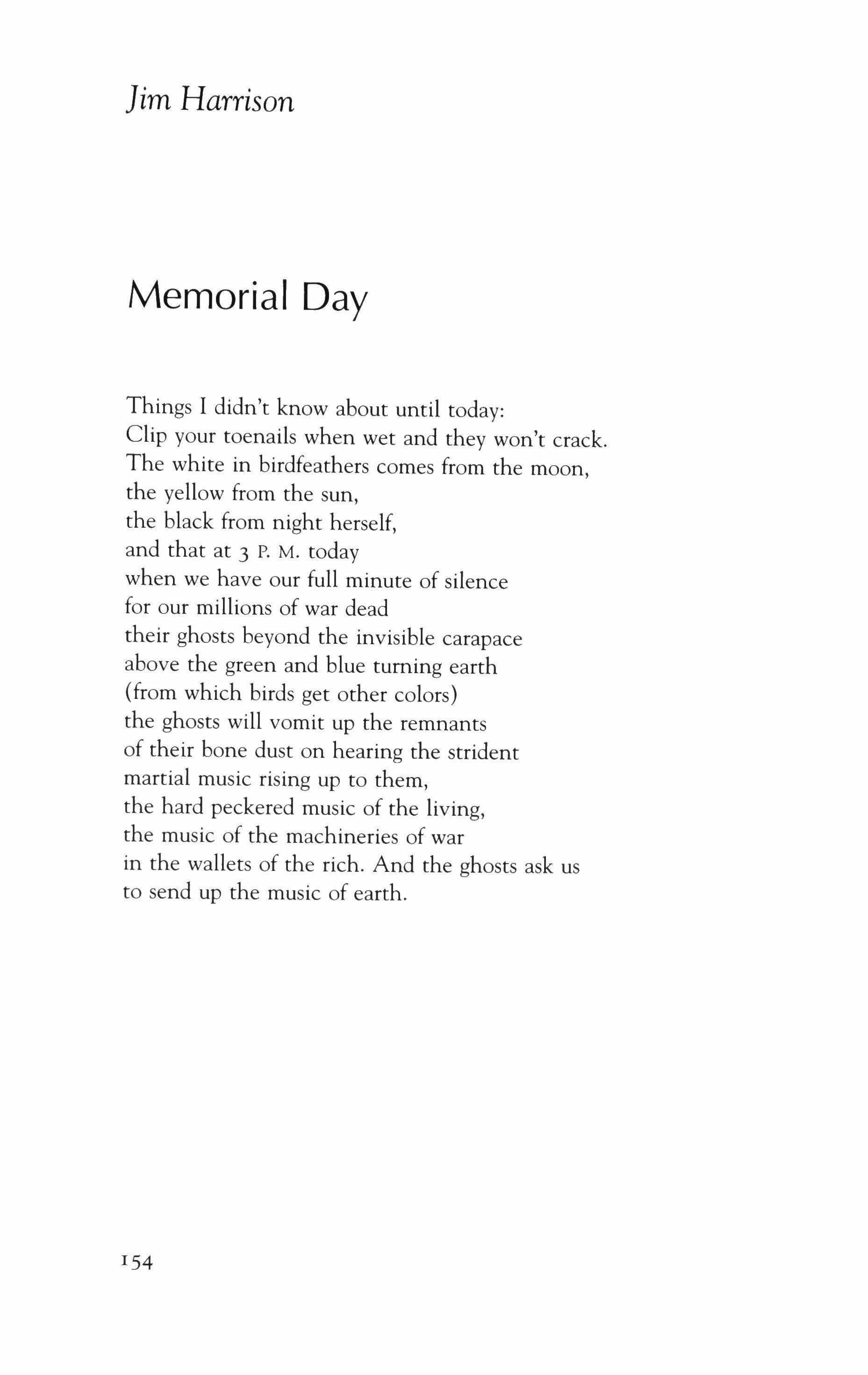
Things I didn't know about until today: Clip your toenails when wet and they won't crack. The white in birdfeathers comes from the moon, the yellow from the sun, the black from night herself, and that at 3 P. M. today when we have our full minute of silence for our millions of war dead their ghosts beyond the invisible carapace above the green and blue turning earth (from which birds get other colors) the ghosts will vomit up the remnants of their bone dust on hearing the strident martial music rising up to them, the hard peckered music of the living, the music of the machineries of war in the wallets of the rich. And the ghosts ask us to send up the music of earth.
154
Effluvia
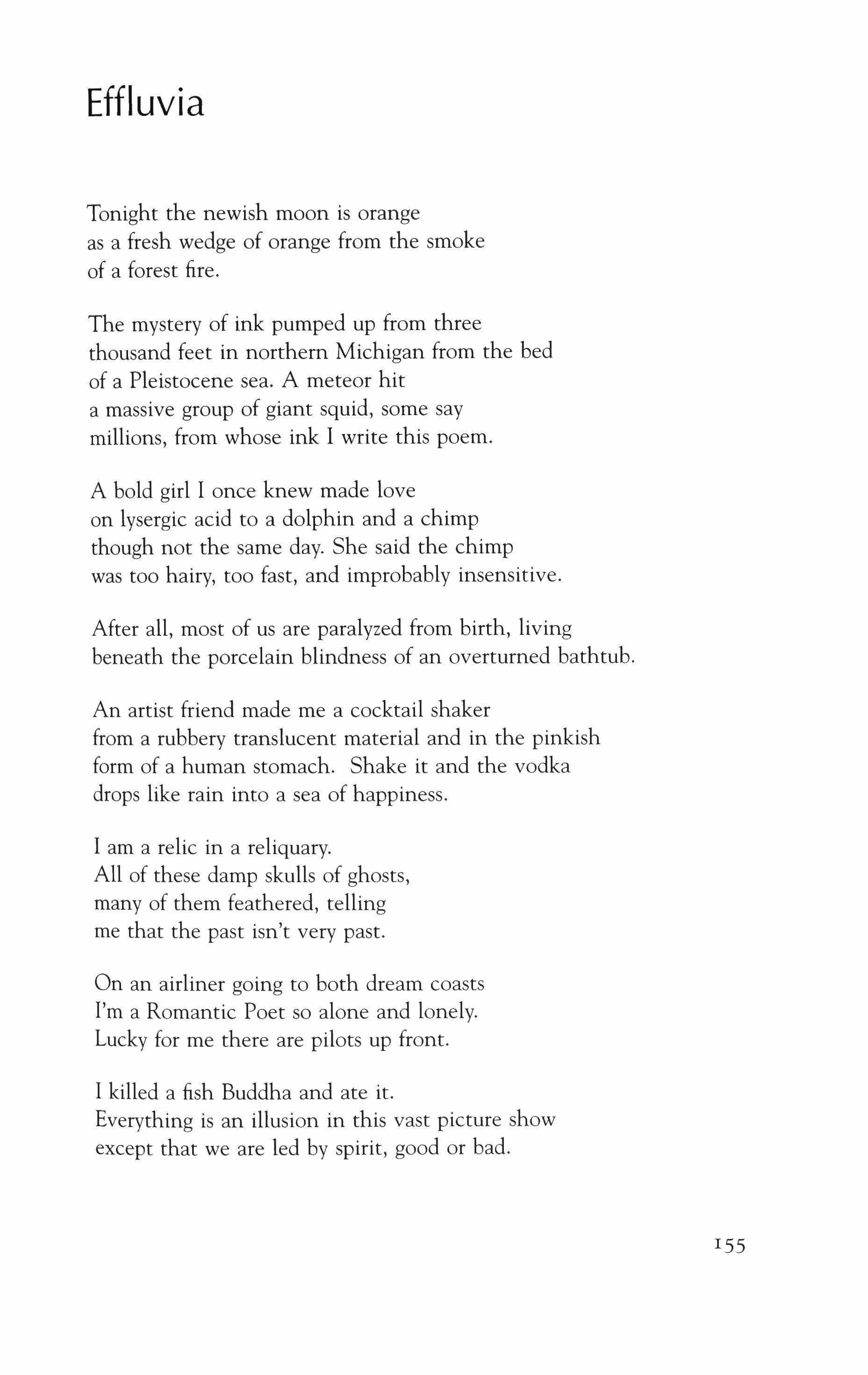
Tonight the newish moon is orange as a fresh wedge of orange from the smoke of a forest fire.
The mystery of ink pumped up from three thousand feet in northern Michigan from the bed of a Pleistocene sea. A meteor hit a massive group of giant squid, some say millions, from whose ink I write this poem.
A bold girl I once knew made love on lysergic acid to a dolphin and a chimp though not the same day. She said the chimp was too hairy, too fast, and improbably insensitive.
After all, most of us are paralyzed from birth, living beneath the porcelain blindness of an overturned bathtub.
An artist friend made me a cocktail shaker from a rubbery translucent material and in the pinkish form of a human stomach. Shake it and the vodka drops like rain into a sea of happiness.
I am a relic in a reliquary. All of these damp skulls of ghosts, many of them feathered, telling me that the past isn't very past.
On an airliner going to both dream coasts I'm a Romantic Poet so alone and lonely. Lucky for me there are pilots up front.
I killed a fish Buddha and ate it. Everything is an illusion in this vast picture show except that we are led by spirit, good or bad.
ISS
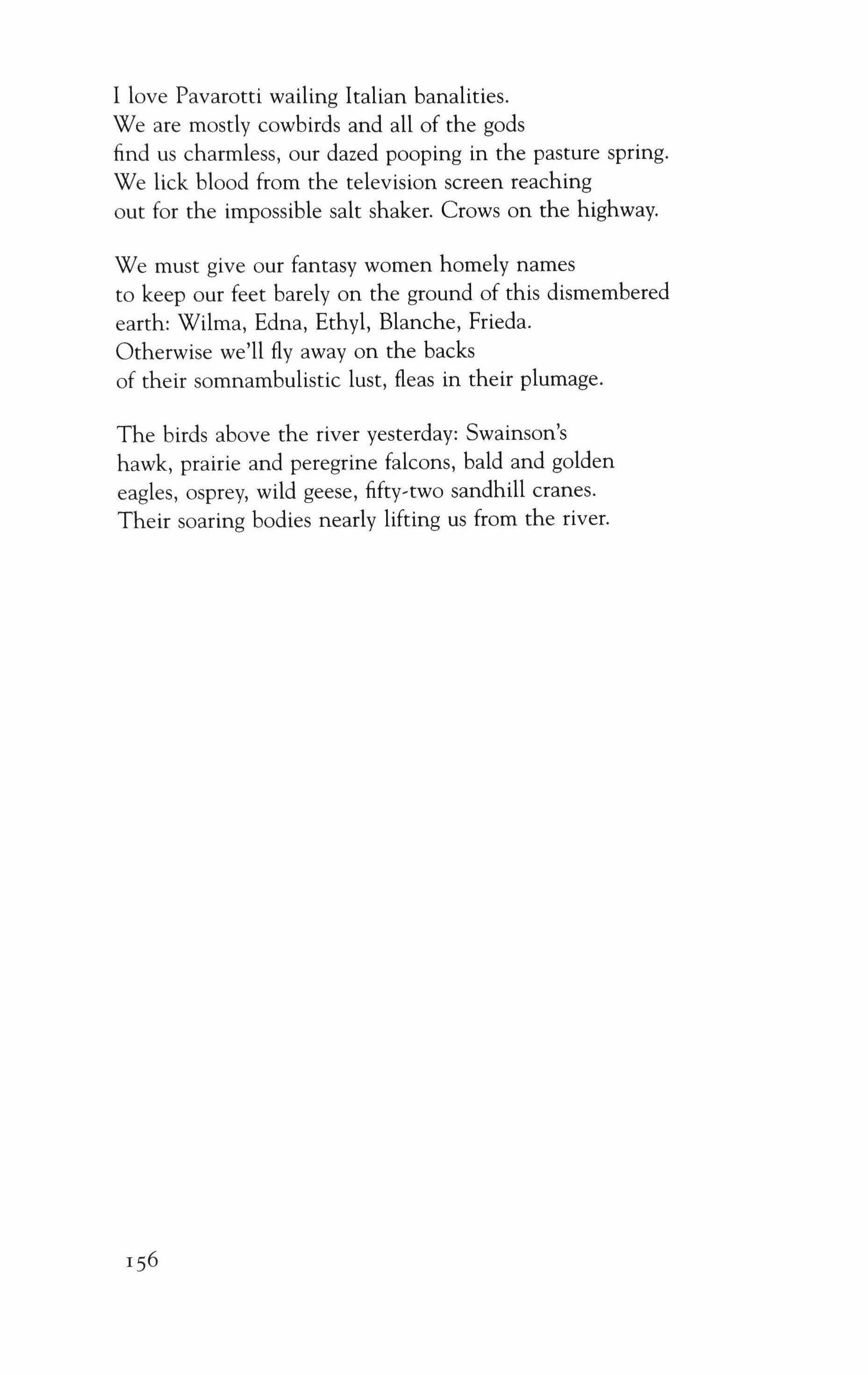
I love Pavarotti wailing Italian banalities. We are mostly cowbirds and all of the gods find us charmless, our dazed pooping in the pasture spring. We lick blood from the television screen reaching out for the impossible salt shaker. Crows on the highway.
We must give our fantasy women homely names to keep our feet barely on the ground of this dismembered earth: Wilma, Edna, Ethyl, Blanche, Frieda. Otherwise we'll flyaway on the backs of their somnambulistic lust, fleas in their plumage.
The birds above the river yesterday: Swainson's hawk, prairie and peregrine falcons, bald and golden eagles, osprey, wild geese, fifty-two sandhill cranes. Their soaring bodies nearly lifting us from the river.
John Skoyles
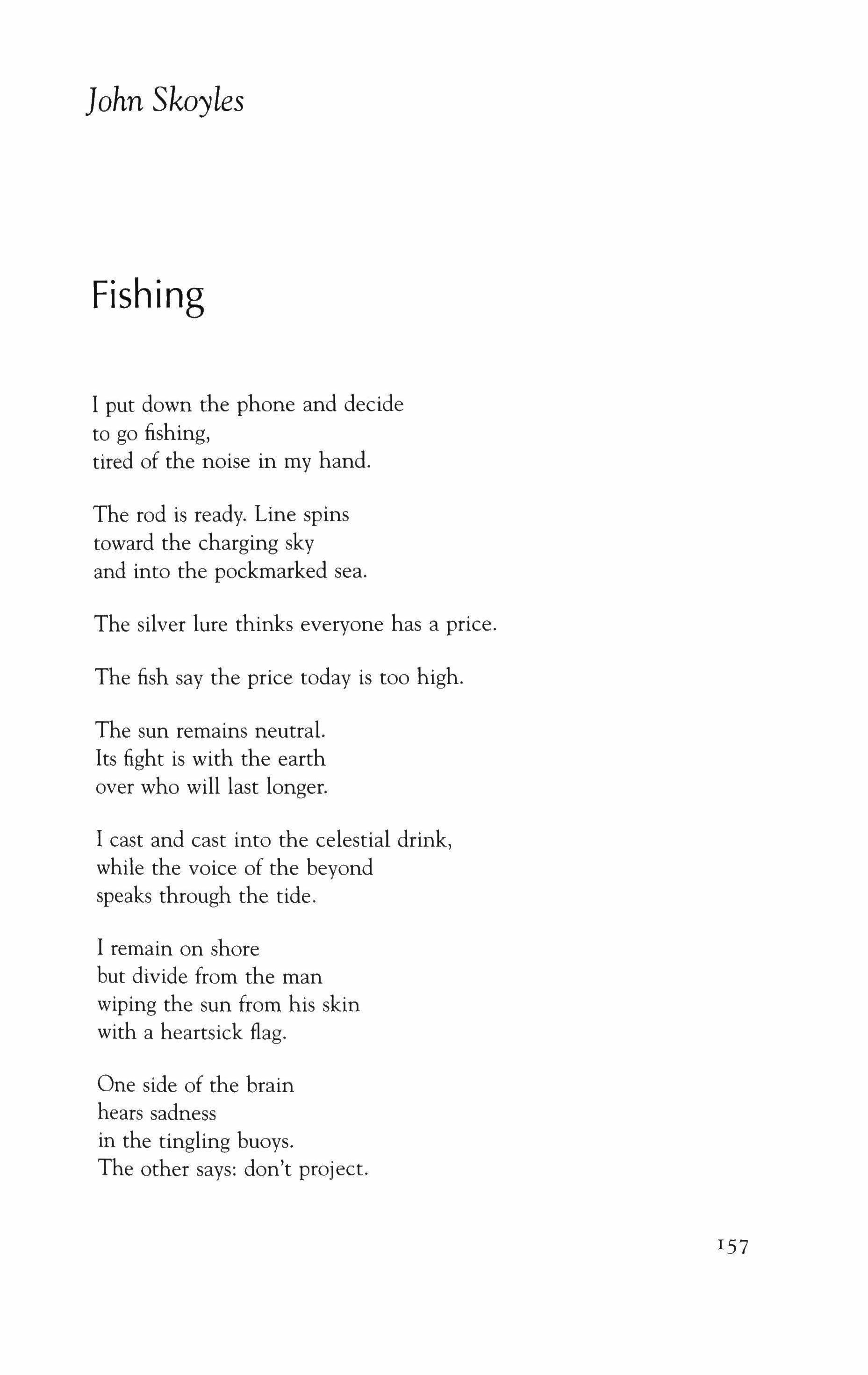
Fishing
I put down the phone and decide to go fishing, tired of the noise in my hand.
The rod is ready. Line spins toward the charging sky and into the pockmarked sea.
The silver lure thinks everyone has a price.
The fish say the price today is too high.
The sun remains neutral. Its fight is with the earth over who will last longer.
I cast and cast into the celestial drink, while the voice of the beyond speaks through the tide.
I remain on shore but divide from the man wiping the sun from his skin with a heartsick flag.
One side of the brain hears sadness in the tingling buoys. The other says: don't project.
157
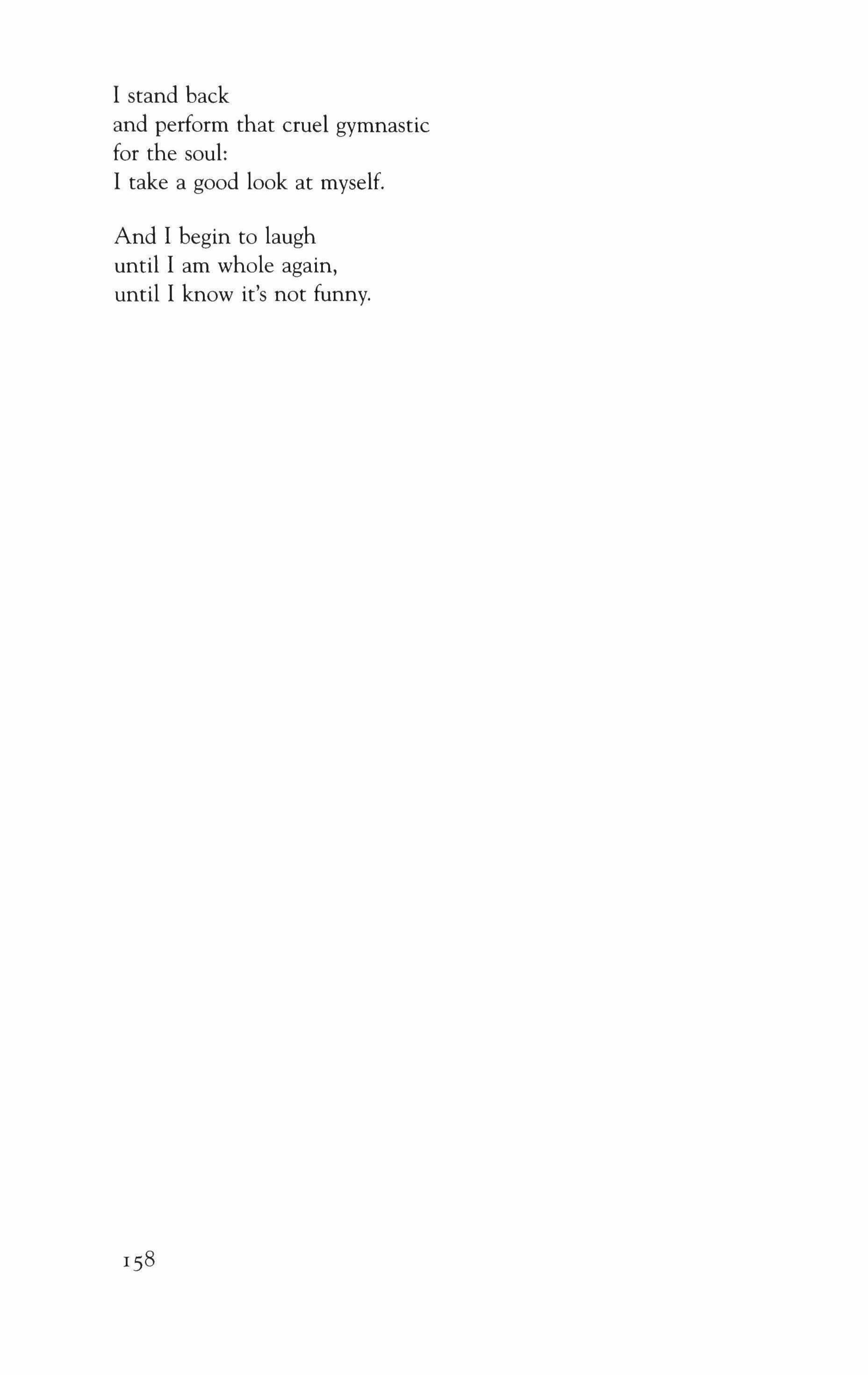
I stand back and perform that cruel gymnastic for the soul:
I take a good look at myself.
And I begin to laugh until I am whole again, until I know it's not funny.
In the Radiation Oncology Waiting Room
Massachusetts General Hospital
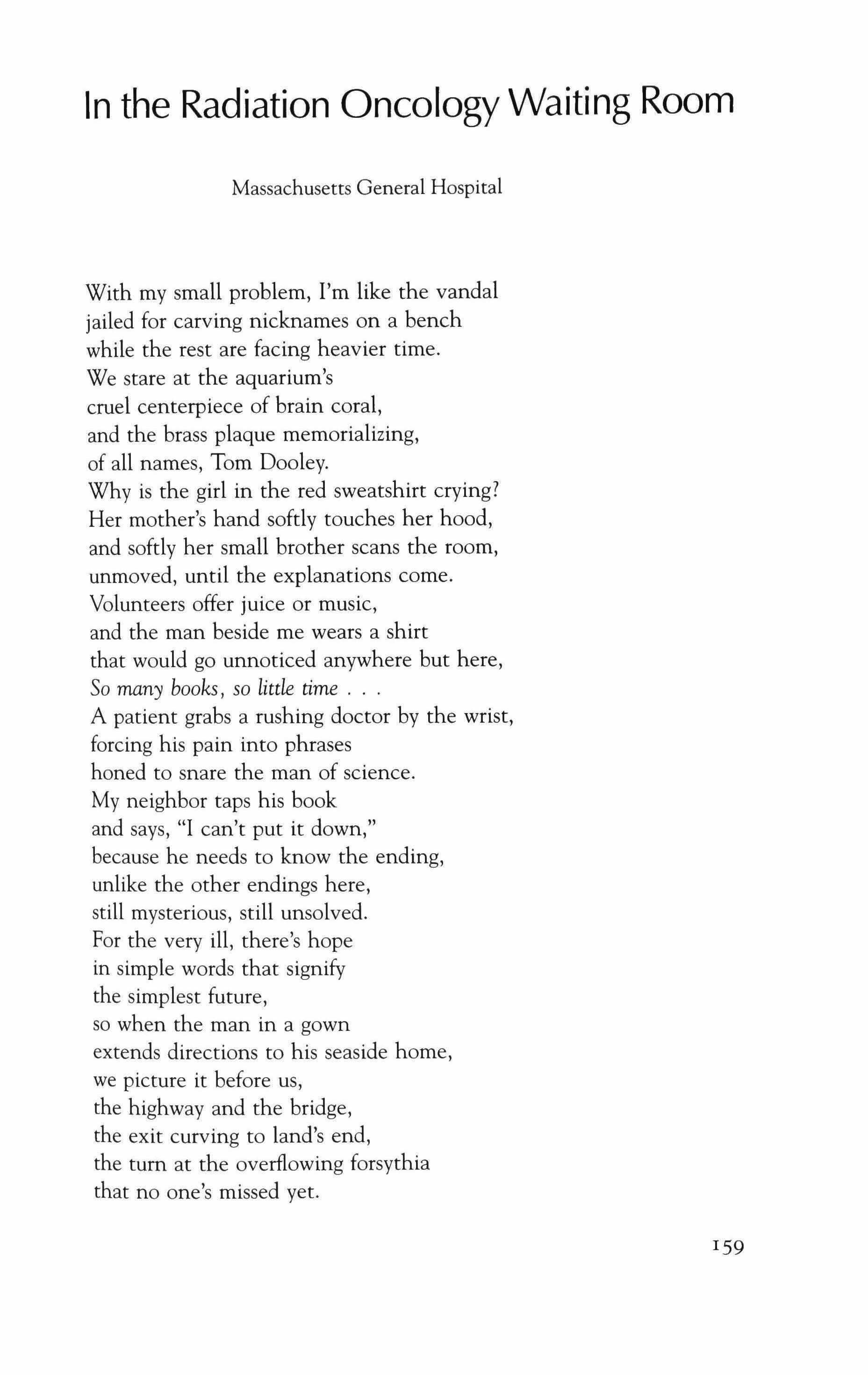
With my small problem, I'm like the vandal jailed for carving nicknames on a bench while the rest are facing heavier time. We stare at the aquarium's cruel centerpiece of brain coral, and the brass plaque memorializing, of all names, Tom Dooley. Why is the girl in the red sweatshirt crying? Her mother's hand softly touches her hood, and softly her small brother scans the room, unmoved, until the explanations come. Volunteers offer juice or music, and the man beside me wears a shirt that would go unnoticed anywhere but here, So many books, so little time
A patient grabs a rushing doctor by the wrist, forcing his pain into phrases honed to snare the man of science. My neighbor taps his book and says, "I can't put it down," because he needs to know the ending, unlike the other endings here, still mysterious, still unsolved. For the very ill, there's hope in simple words that signify the simplest future, so when the man in a gown extends directions to his seaside home, we picture it before us, the highway and the bridge, the exit curving to land's end, the tum at the overflowing forsythia that no one's missed yet.
159
The Wish Mind
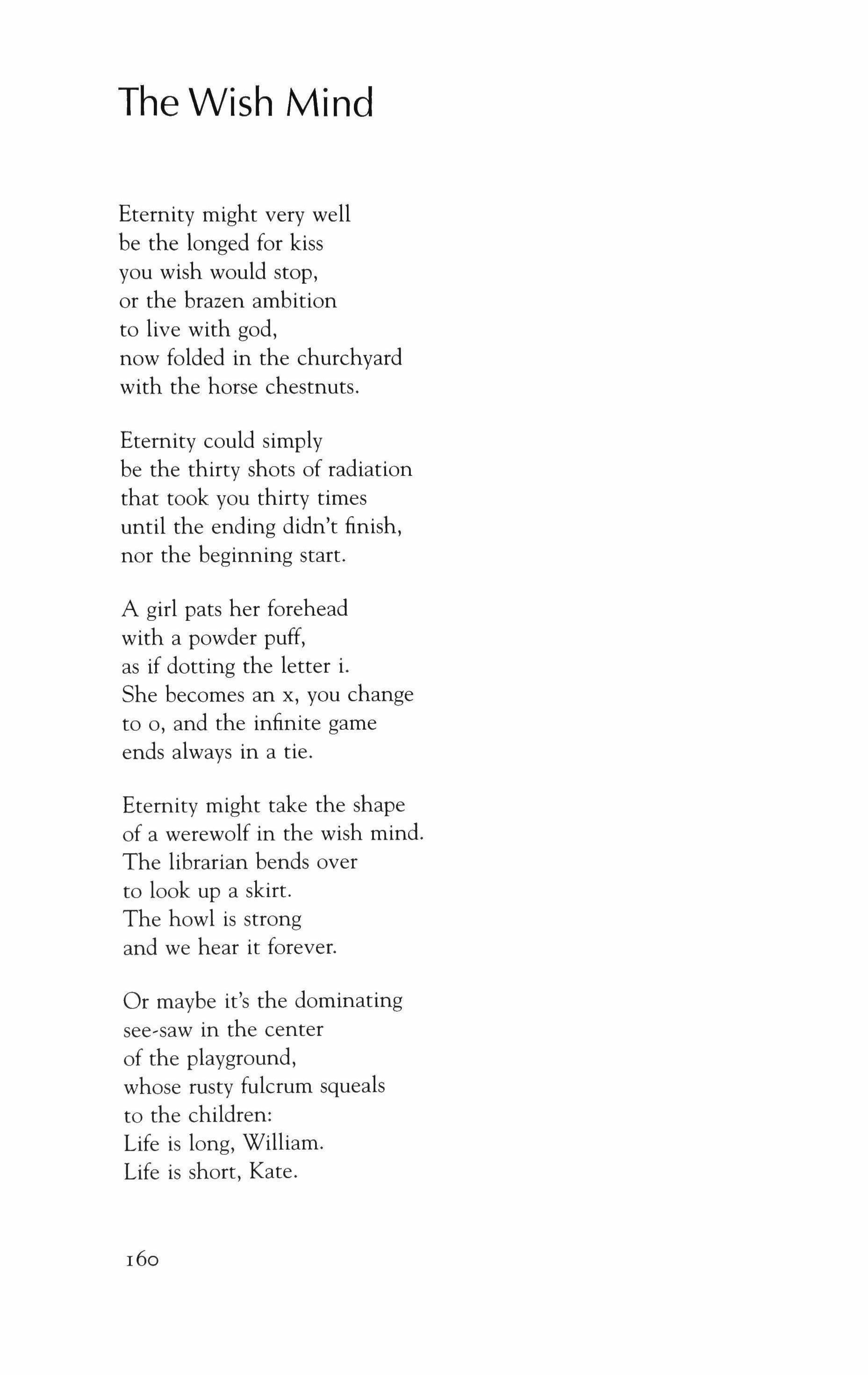
Eternity might very well be the longed for kiss you wish would stop, or the brazen ambition to live with god, now folded in the churchyard with the horse chestnuts.
Eternity could simply be the thirty shots of radiation that took you thirty times until the ending didn't finish, nor the beginning start.
A girl pats her forehead with a powder puff, as if dotting the letter i. She becomes an x, you change to 0, and the infinite game ends always in a tie.
Eternity might take the shape of a werewolf in the wish mind. The librarian bends over to look up a skirt. The howl is strong and we hear it forever.
Or maybe it's the dominating see-saw in the center of the playground, whose rusty fulcrum squeals to the children: Life is long, William. Life is short, Kate.
160
No Name for It
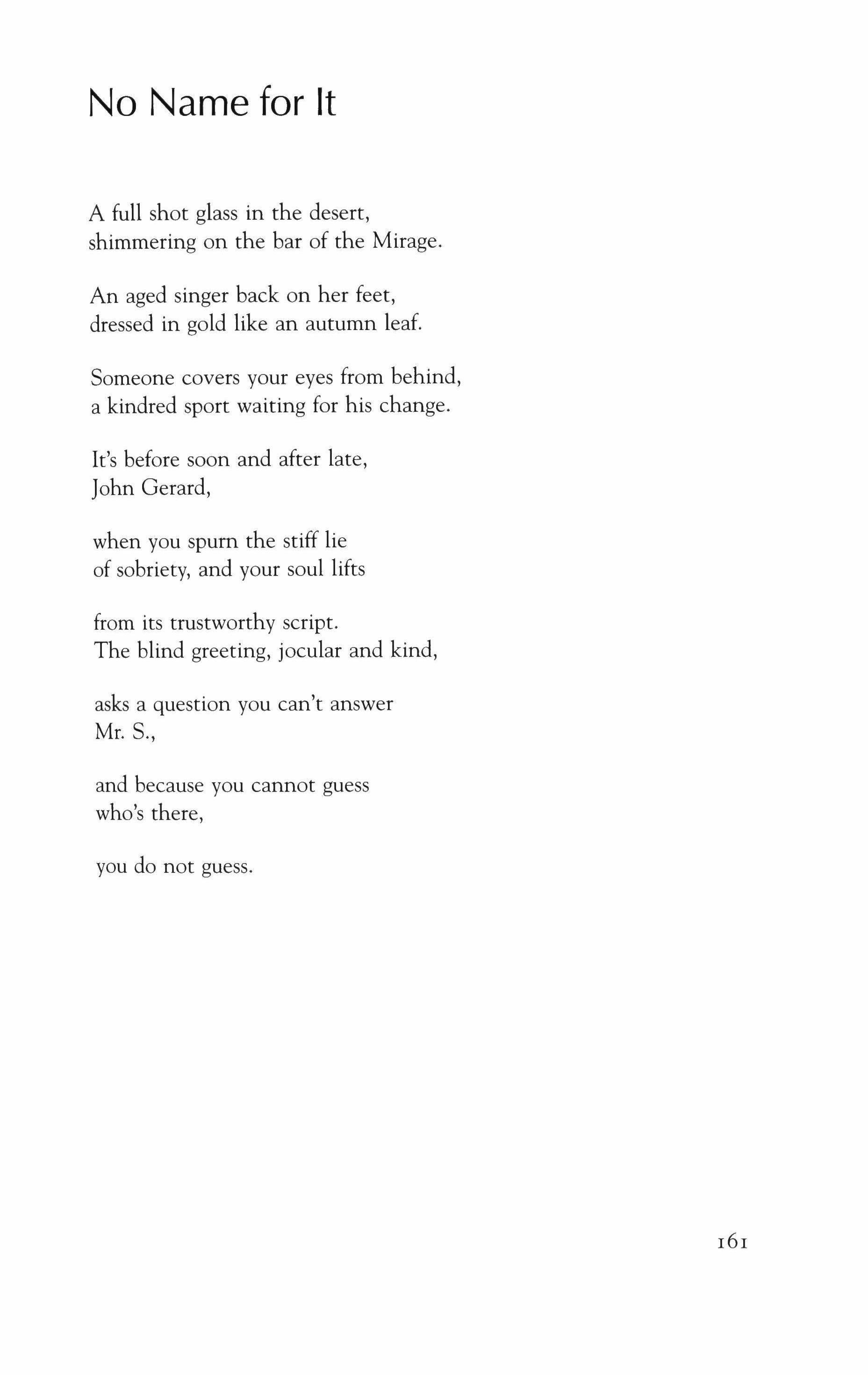
A full shot glass in the desert, shimmering on the bar of the Mirage.
An aged singer back on her feet, dressed in gold like an autumn leaf.
Someone covers your eyes from behind, a kindred sport waiting for his change.
It's before soon and after late, John Gerard, when you spurn the stiff lie of sobriety, and your soul lifts from its trustworthy script. The blind greeting, jocular and kind, asks a question you can't answer Mr. S., and because you cannot guess who's there, you do not guess.
I6I
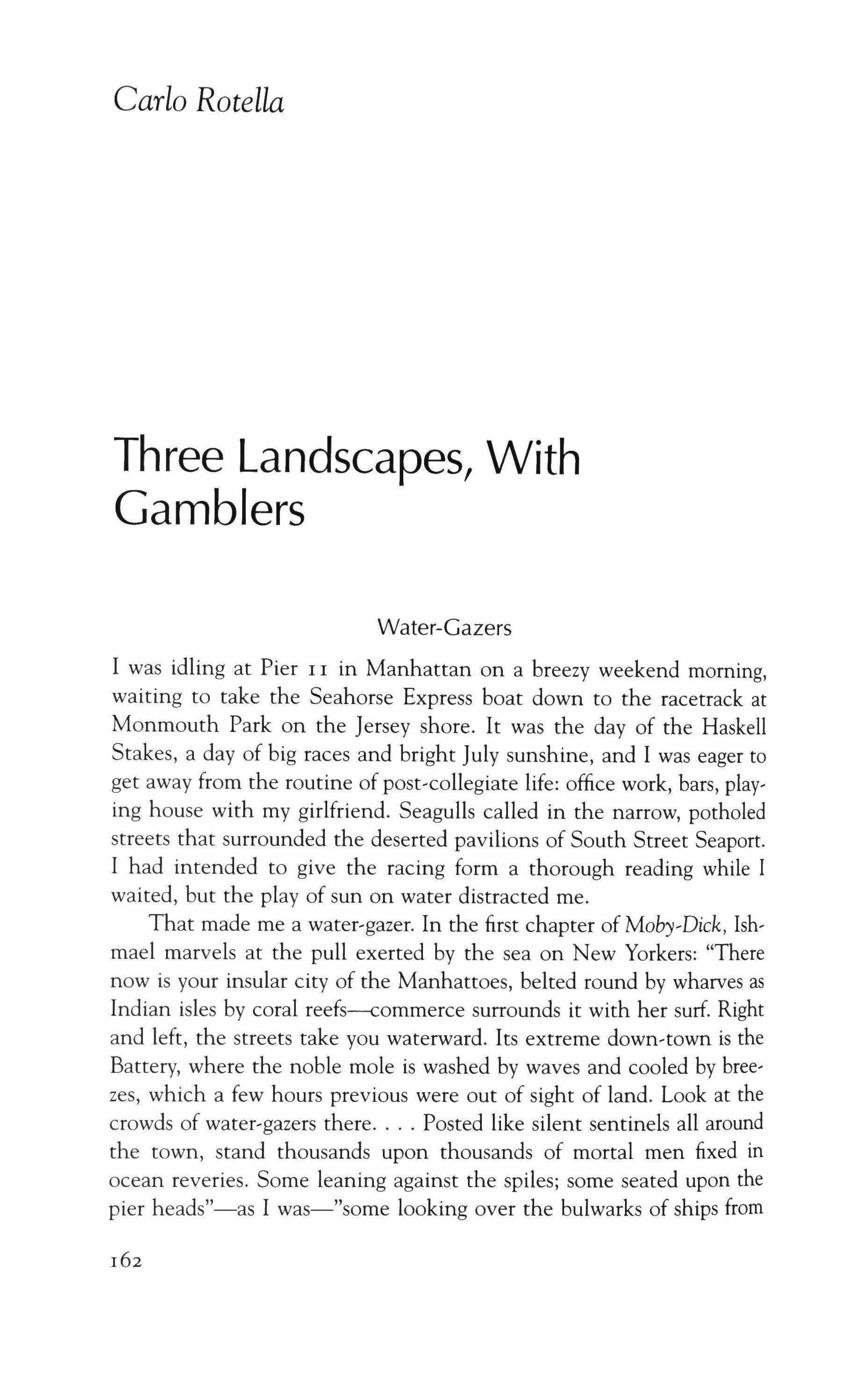
Three Landscapes, With Gamblers
Water-Gazers
I was idling at Pier I I in Manhattan on a breezy weekend morning, waiting to take the Seahorse Express boat down to the racetrack at Monmouth Park on the Jersey shore. It was the day of the Haskell Stakes, a day of big races and bright July sunshine, and I was eager to get away from the routine of post-collegiate life: office work, bars, playing house with my girlfriend. Seagulls called in the narrow, potholed streets that surrounded the deserted pavilions of South Street Seaport. I had intended to give the racing form a thorough reading while I waited, but the play of sun on water distracted me.
That made me a water-gazer. In the first chapter of Moby-Dick, Ishmael marvels at the pull exerted by the sea on New Yorkers: "There now is your insular city of the Manhattoes, belted round by wharves as Indian isles by coral reefs--commerce surrounds it with her surf. Right and left, the streets take you waterward. Its extreme down-town is the Battery, where the noble mole is washed by waves and cooled by breezes, which a few hours previous were out of sight of land. Look at the crowds of water-gazers there Posted like silent sentinels all around the town, stand thousands upon thousands of mortal men fixed in ocean reveries. Some leaning against the spiles; some seated upon the pier heads"-as I was-"some looking over the bulwarks of ships from
Carlo Rotella
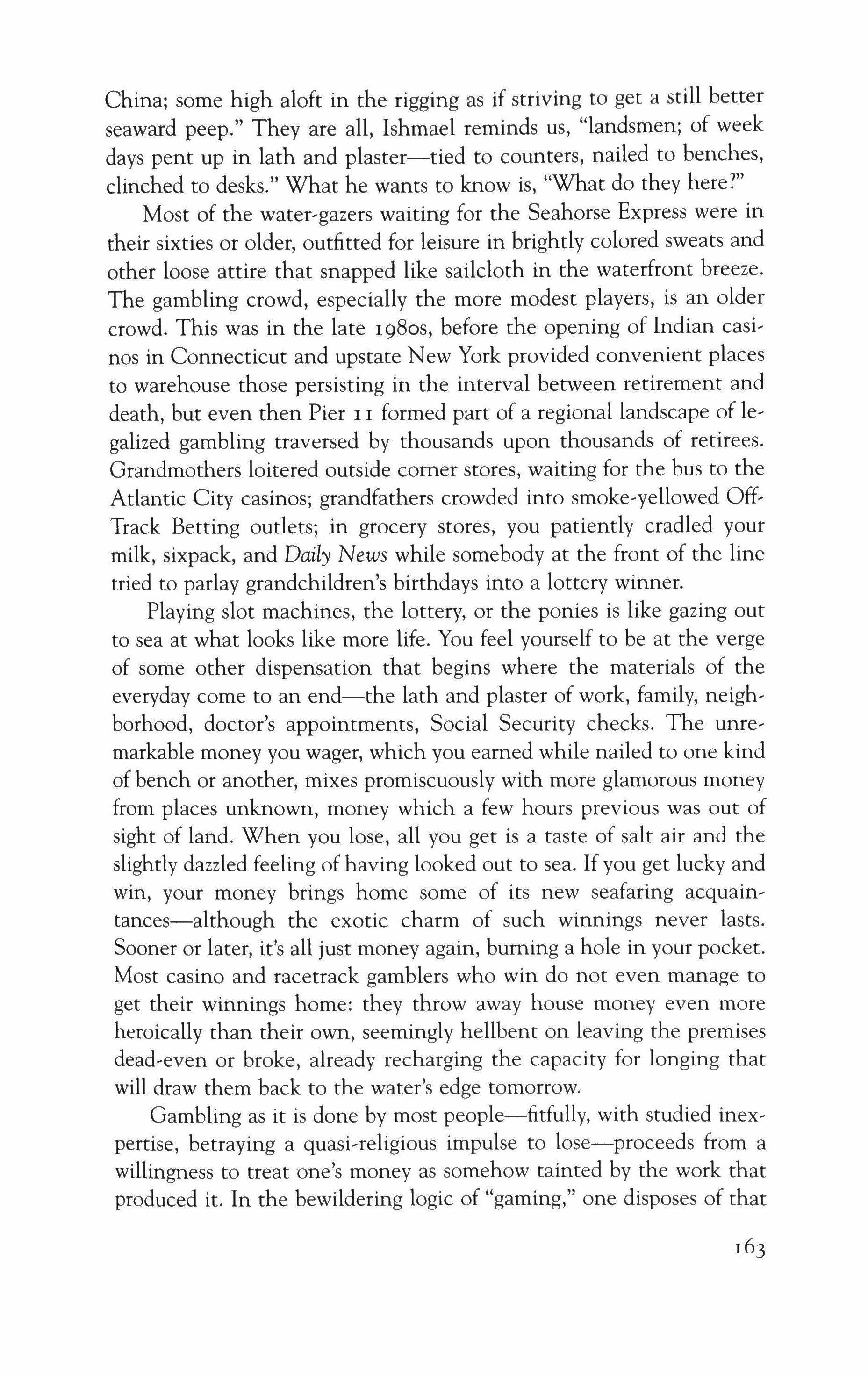
China; some high aloft in the rigging as if striving to get a still better seaward peep." They are all, Ishmael reminds us, "landsmen; of week days pent up in lath and plaster-tied to counters, nailed to benches, clinched to desks." What he wants to know is, "What do they here?"
Most of the water-gazers waiting for the Seahorse Express were in their sixties or older, outfitted for leisure in brightly colored sweats and other loose attire that snapped like sailcloth in the waterfront breeze. The gambling crowd, especially the more modest players, is an older crowd. This was in the late I980s, before the opening of Indian casinos in Connecticut and upstate New York provided convenient places to warehouse those persisting in the interval between retirement and death, but even then Pier I I formed part of a regional landscape of legalized gambling traversed by thousands upon thousands of retirees. Grandmothers loitered outside comer stores, waiting for the bus to the Atlantic City casinos; grandfathers crowded into smoke-yellowed OffTrack Betting outlets; in grocery stores, you patiently cradled your milk, sixpack, and Daily News while somebody at the front of the line tried to parlay grandchildren's birthdays into a lottery winner.
Playing slot machines, the lottery, or the ponies is like gazing out to sea at what looks like more life. You feel yourself to be at the verge of some other dispensation that begins where the materials of the everyday come to an end-the lath and plaster of work, family, neighborhood, doctor's appointments, Social Security checks. The unremarkable money you wager, which you earned while nailed to one kind of bench or another, mixes promiscuously with more glamorous money from places unknown, money which a few hours previous was out of sight of land. When you lose, all you get is a taste of salt air and the slightly dazzled feeling of having looked out to sea. If you get lucky and win, your money brings home some of its new seafaring acquaintances-although the exotic charm of such winnings never lasts. Sooner or later, it's all just money again, burning a hole in your pocket. Most casino and racetrack gamblers who win do not even manage to get their winnings home: they throwaway house money even more heroically than their own, seemingly hellbent on leaving the premises dead-even or broke, already recharging the capacity for longing that will draw them back to the water's edge tomorrow.
Gambling as it is done by most people-fitfully, with studied inexpertise, betraying a quasi-religious impulse to lose-proceeds from a Willingness to treat one's money as somehow tainted by the work that produced it. In the bewildering logic of "gaming," one disposes of that
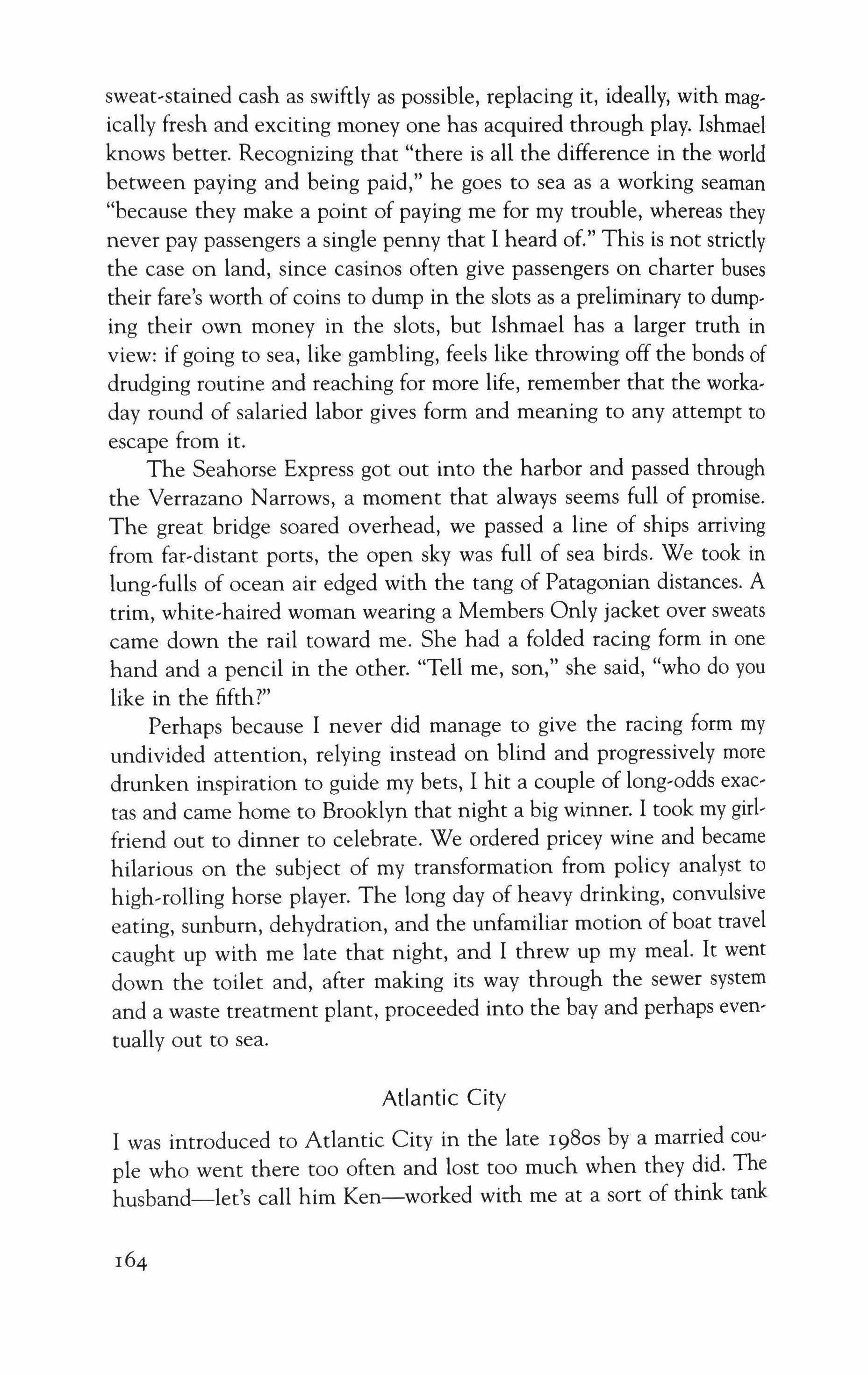
sweat-stained cash as swiftly as possible, replacing it, ideally, with magically fresh and exciting money one has acquired through play. Ishmael knows better. Recognizing that "there is all the difference in the world between paying and being paid," he goes to sea as a working seaman "because they make a point of paying me for my trouble, whereas they never pay passengers a single penny that I heard of." This is not strictly the case on land, since casinos often give passengers on charter buses their fare's worth of coins to dump in the slots as a preliminary to dumping their own money in the slots, but Ishmael has a larger truth in view: if going to sea, like gambling, feels like throwing off the bonds of drudging routine and reaching for more life, remember that the workaday round of salaried labor gives form and meaning to any attempt to escape from it.
The Seahorse Express got out into the harbor and passed through the Verrazano Narrows, a moment that always seems full of promise. The great bridge soared overhead, we passed a line of ships arriving from far-distant ports, the open sky was full of sea birds. We took in lung-fulls of ocean air edged with the tang of Patagonian distances. A trim, white-haired woman wearing a Members Only jacket over sweats carne down the rail toward me. She had a folded racing form in one hand and a pencil in the other. "Tell me, son," she said, "who do you like in the fifth?"
Perhaps because I never did manage to give the racing form my undivided attention, relying instead on blind and progressively more drunken inspiration to guide my bets, I hit a couple of long-odds exactas and carne home to Brooklyn that night a big winner. I took my girlfriend out to dinner to celebrate. We ordered pricey wine and became hilarious on the subject of my transformation from policy analyst to high-rolling horse player. The long day of heavy drinking, convulsive eating, sunburn, dehydration, and the unfamiliar motion of boat travel caught up with me late that night, and I threw up my meal. It went down the toilet and, after making its way through the sewer system and a waste treatment plant, proceeded into the bay and perhaps eventually out to sea.
Atlantic City
I was introduced to Atlantic City in the late 1980s by a married couple who went there too often and lost too much when they did. The husband-let's call him Ken-worked with me at a sort of think tank
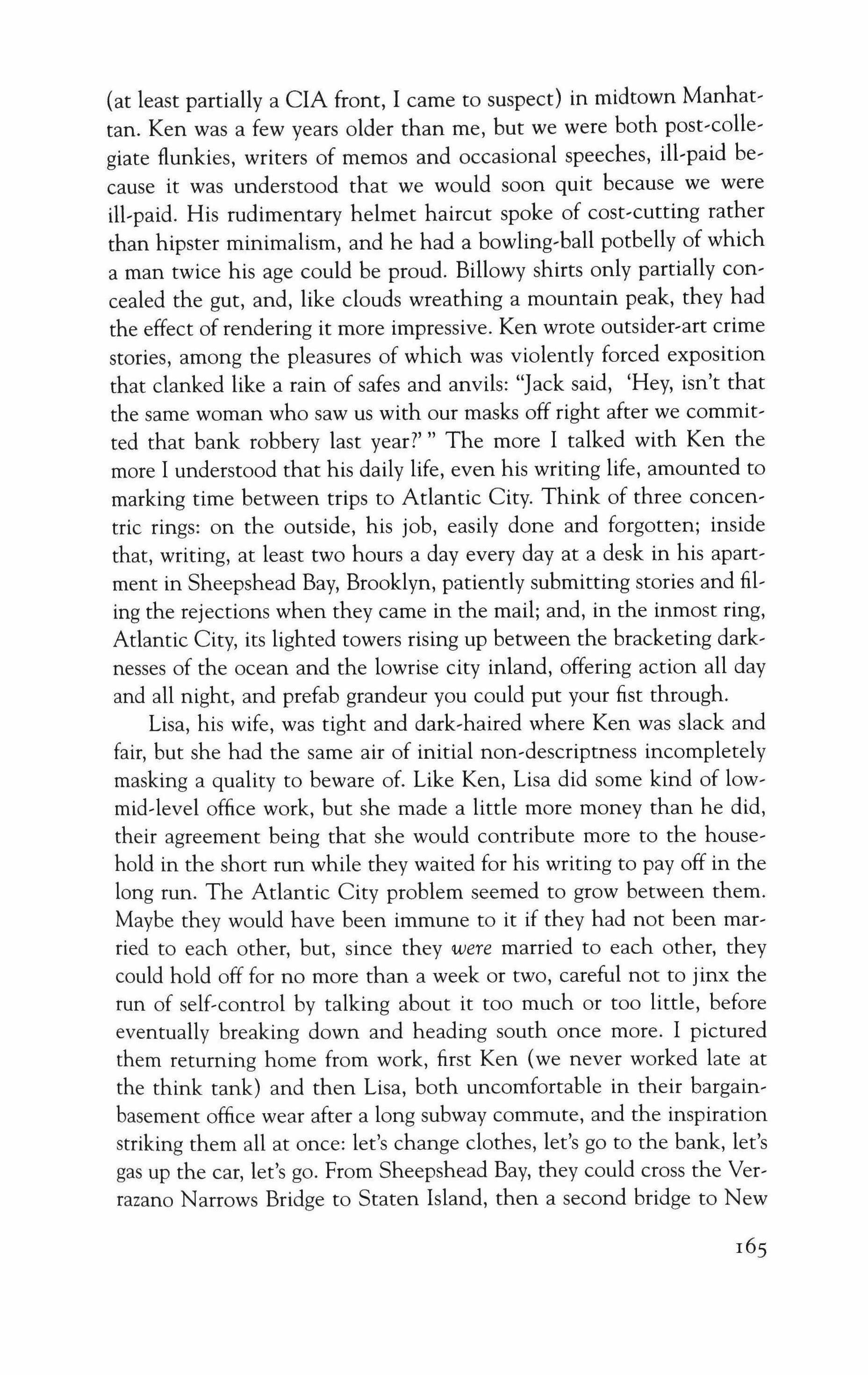
(at least partially a CIA front, I carne to suspect) in midtown Manhattan. Ken was a few years older than me, but we were both post-collegiate flunkies, writers of memos and occasional speeches, ill-paid because it was understood that we would soon quit because we were ill-paid. His rudimentary helmet haircut spoke of cost-cutting rather than hipster minimalism, and he had a bowling-ball potbelly of which a man twice his age could be proud. Billowy shirts only partially concealed the gut, and, like clouds wreathing a mountain peak, they had the effect of rendering it more impressive. Ken wrote outsider-art crime stories, among the pleasures of which was violently forced exposition that clanked like a rain of safes and anvils: "Jack said, 'Hey, isn't that the same woman who saw us with our masks off right after we committed that bank robbery last year?' The more I talked with Ken the more I understood that his daily life, even his writing life, amounted to marking time between trips to Atlantic City. Think of three concentric rings: on the outside, his job, easily done and forgotten; inside that, writing, at least two hours a day every day at a desk in his apartment in Sheepshead Bay, Brooklyn, patiently submitting stories and filing the rejections when they carne in the mail; and, in the inmost ring, Atlantic City, its lighted towers rising up between the bracketing darknesses of the ocean and the lowrise city inland, offering action all day and all night, and prefab grandeur you could put your fist through. Lisa, his wife, was tight and dark-haired where Ken was slack and fair, but she had the same air of initial non-descriptness incompletely masking a quality to beware of. Like Ken, Lisa did some kind of lowmid-level office work, but she made a little more money than he did, their agreement being that she would contribute more to the household in the short run while they waited for his writing to payoff in the long run. The Atlantic City problem seemed to grow between them. Maybe they would have been immune to it if they had not been married to each other, but, since they were married to each other, they could hold off for no more than a week or two, careful not to jinx the run of self-control by talking about it too much or too little, before eventually breaking down and heading south once more. I pictured them returning horne from work, first Ken (we never worked late at the think tank) and then Lisa, both uncomfortable in their bargainbasement office wear after a long subway commute, and the inspiration striking them all at once: let's change clothes, let's go to the bank, let's gas up the car, let's go. From Sheepshead Bay, they could cross the Verrazano Narrows Bridge to Staten Island, then a second bridge to New
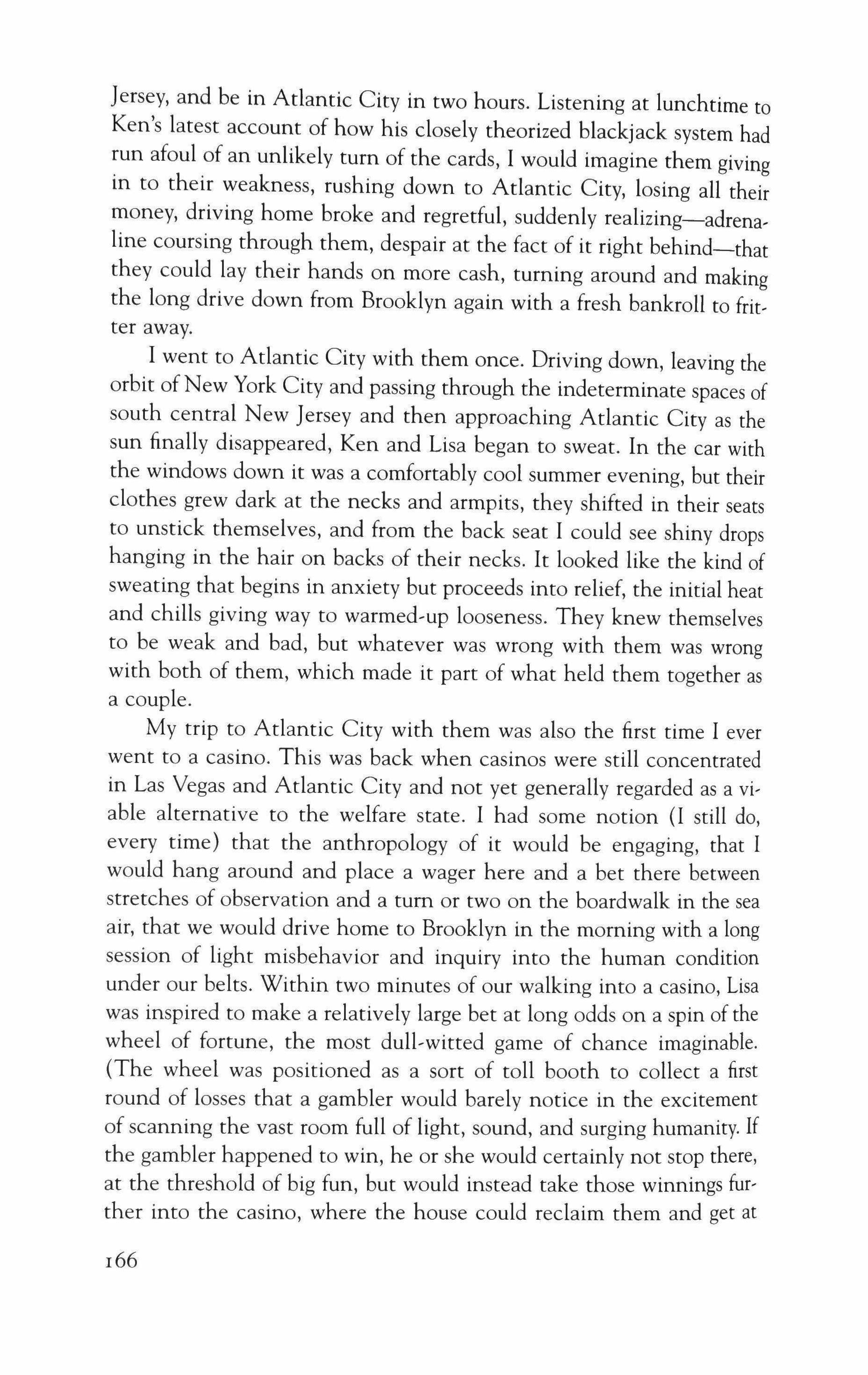
Jersey, and be in Atlantic City in two hours. Listening at lunchtime to Ken's latest account of how his closely theorized blackjack system had run afoul of an unlikely turn of the cards, I would imagine them giving in to their weakness, rushing down to Atlantic City, losing all their money, driving home broke and regretful, suddenly realizing-adrena line coursing through them, despair at the fact of it right behind-that they could lay their hands on more cash, turning around and making the long drive down from Brooklyn again with a fresh bankroll to fritter away.
I went to Atlantic City with them once. Driving down, leaving the orbit of New York City and passing through the indeterminate spaces of south central New Jersey and then approaching Atlantic City as the sun finally disappeared, Ken and Lisa began to sweat. In the car with the windows down it was a comfortably cool summer evening, but their clothes grew dark at the necks and armpits, they shifted in their seats to unstick themselves, and from the back seat I could see shiny drops hanging in the hair on backs of their necks. It looked like the kind of sweating that begins in anxiety but proceeds into relief, the initial heat and chills giving way to warmed-up looseness. They knew themselves to be weak and bad, but whatever was wrong with them was wrong with both of them, which made it part of what held them together as a couple.
My trip to Atlantic City with them was also the first time I ever went to a casino. This was back when casinos were still concentrated in Las Vegas and Atlantic City and not yet generally regarded as a viable alternative to the welfare state. I had some notion (l still do, every time) that the anthropology of it would be engaging, that I would hang around and place a wager here and a bet there between stretches of observation and a turn or two on the boardwalk in the sea air, that we would drive home to Brooklyn in the morning with a long session of light misbehavior and inquiry into the human condition under our belts. Within two minutes of our walking into a casino, Lisa was inspired to make a relatively large bet at long odds on a spin of the wheel of fortune, the most dull-witted game of chance imaginable. (The wheel was positioned as a sort of toll booth to collect a first round of losses that a gambler would barely notice in the excitement of scanning the vast room full of light, sound, and surging humanity. If the gambler happened to win, he or she would certainly not stop there, at the threshold of big fun, but would instead take those winnings further into the casino, where the house could reclaim them and get at
I66
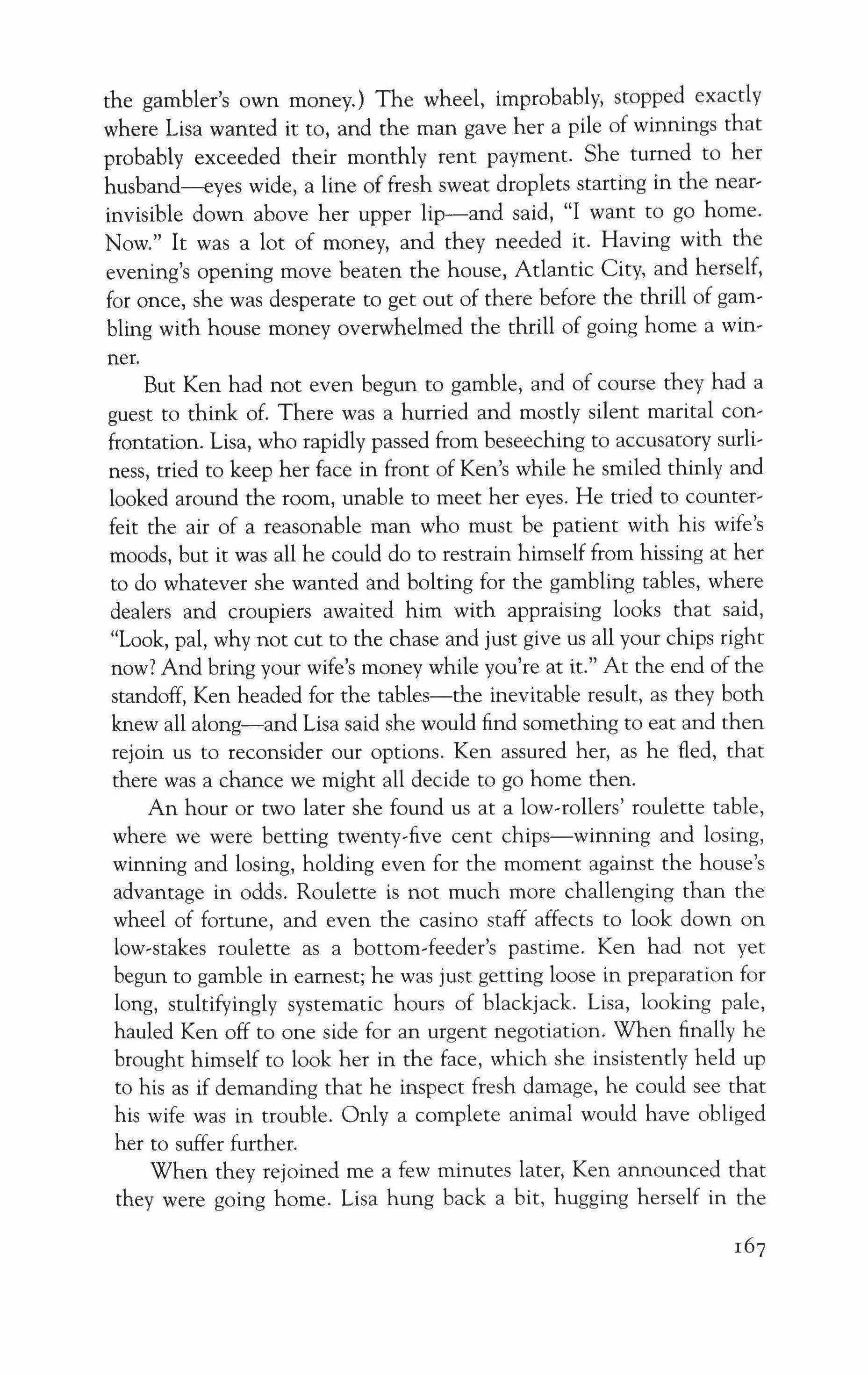
the gambler's own money.) The wheel, improbably, stopped exactly where Lisa wanted it to, and the man gave her a pile of winnings that probably exceeded their monthly rent payment. She turned to her husband-eyes wide, a line of fresh sweat droplets starting in the nearinvisible down above her upper lip-and said, "I want to go home. Now." It was a lot of money, and they needed it. Having with the evening's opening move beaten the house, Atlantic City, and herself, for once, she was desperate to get out of there before the thrill of gambling with house money overwhelmed the thrill of going home a winner.
But Ken had not even begun to gamble, and of course they had a guest to think of. There was a hurried and mostly silent marital confrontation. Lisa, who rapidly passed from beseeching to accusatory surliness, tried to keep her face in front of Ken's while he smiled thinly and looked around the room, unable to meet her eyes. He tried to counterfeit the air of a reasonable man who must be patient with his wife's moods, but it was all he could do to restrain himself from hissing at her to do whatever she wanted and bolting for the gambling tables, where dealers and croupiers awaited him with appraising looks that said, "Look, pal, why not cut to the chase and just give us all your chips right now? And bring your wife's money while you're at it." At the end of the standoff, Ken headed for the tables-the inevitable result, as they both knew all along-and Lisa said she would find something to eat and then rejoin us to reconsider our options. Ken assured her, as he fled, that there was a chance we might all decide to go home then.
An hour or two later she found us at a low-rollers' roulette table, where we were betting twenty-five cent chips-winning and losing, winning and losing, holding even for the moment against the house's advantage in odds. Roulette is not much more challenging than the wheel of fortune, and even the casino staff affects to look down on low-stakes roulette as a bottom-feeder's pastime. Ken had not yet begun to gamble in earnest; he was just getting loose in preparation for long, stultifyingly systematic hours of blackjack. Lisa, looking pale, hauled Ken off to one side for an urgent negotiation. When finally he brought himself to look her in the face, which she insistently held up to his as if demanding that he inspect fresh damage, he could see that his wife was in trouble. Only a complete animal would have obliged her to suffer further.
When they rejoined me a few minutes later, Ken announced that they were going home. Lisa hung back a bit, hugging herself in the
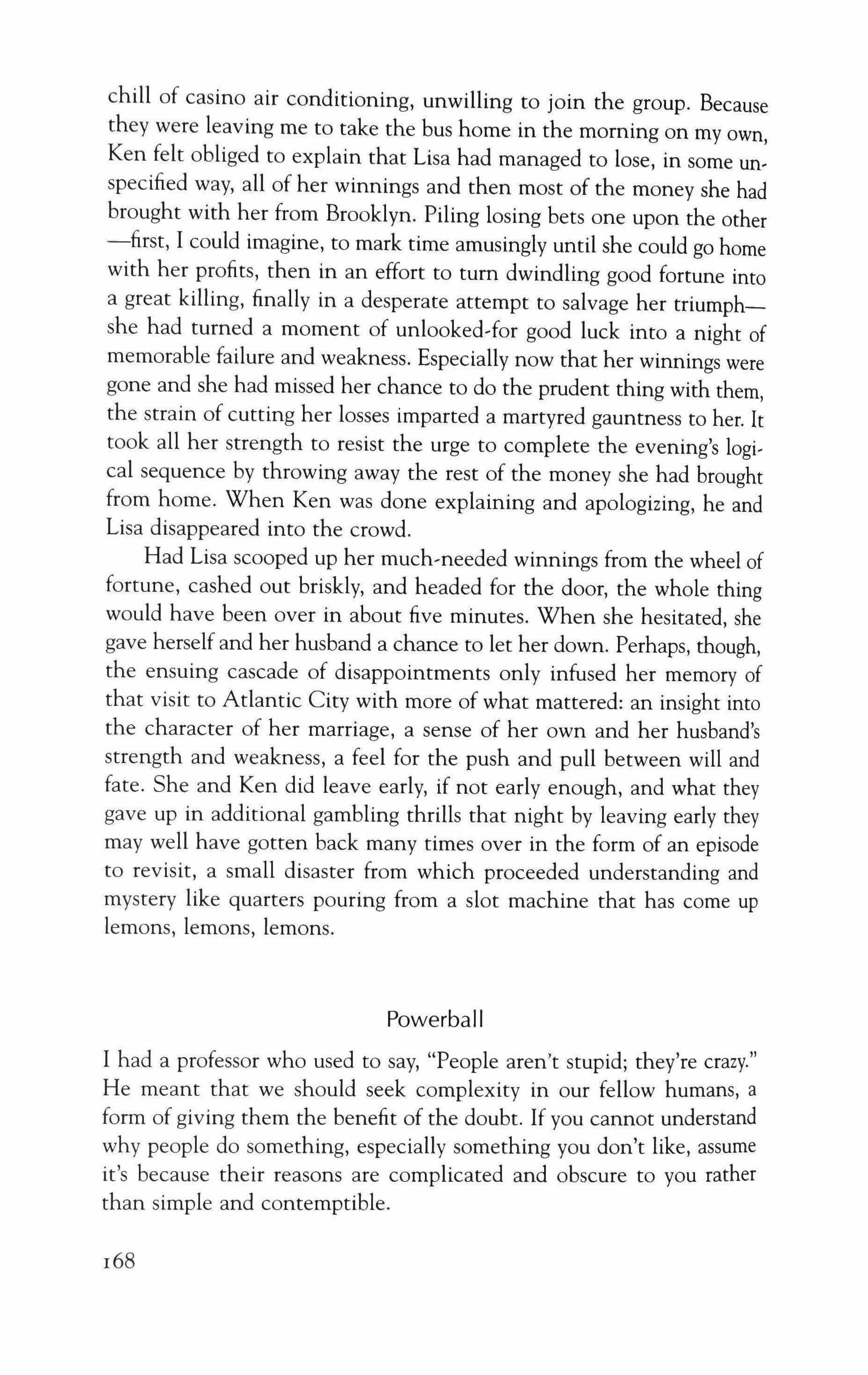
chill of casino air conditioning, unwilling to join the group. Because they were leaving me to take the bus home in the morning on my own, Ken felt obliged to explain that Lisa had managed to lose, in some unspecified way, all of her winnings and then most of the money she had brought with her from Brooklyn. Piling losing bets one upon the other -first, I could imagine, to mark time amusingly until she could go home with her profits, then in an effort to turn dwindling good fortune into a great killing, finally in a desperate attempt to salvage her triumphshe had turned a moment of unlocked-for good luck into a night of memorable failure and weakness. Especially now that her winnings were gone and she had missed her chance to do the prudent thing with them, the strain of cutting her losses imparted a martyred gauntness to her. It took all her strength to resist the urge to complete the evening's logical sequence by throwing away the rest of the money she had brought from home. When Ken was done explaining and apologizing, he and Lisa disappeared into the crowd.
Had Lisa scooped up her much-needed winnings from the wheel of fortune, cashed out briskly, and headed for the door, the whole thing would have been over in about five minutes. When she hesitated, she gave herself and her husband a chance to let her down. Perhaps, though, the ensuing cascade of disappointments only infused her memory of that visit to Atlantic City with more of what mattered: an insight into the character of her marriage, a sense of her own and her husband's strength and weakness, a feel for the push and pull between will and fate. She and Ken did leave early, if not early enough, and what they gave up in additional gambling thrills that night by leaving early they may well have gotten back many times over in the form of an episode to revisit, a small disaster from which proceeded understanding and mystery like quarters pouring from a slot machine that has come up lemons, lemons, lemons.
Powerball
I had a professor who used to say, "People aren't stupid; they're crazy." He meant that we should seek complexity in our fellow humans, a form of giving them the benefit of the doubt. If you cannot understand why people do something, especially something you don't like, assume it's because their reasons are complicated and obscure to you rather than simple and contemptible.
168
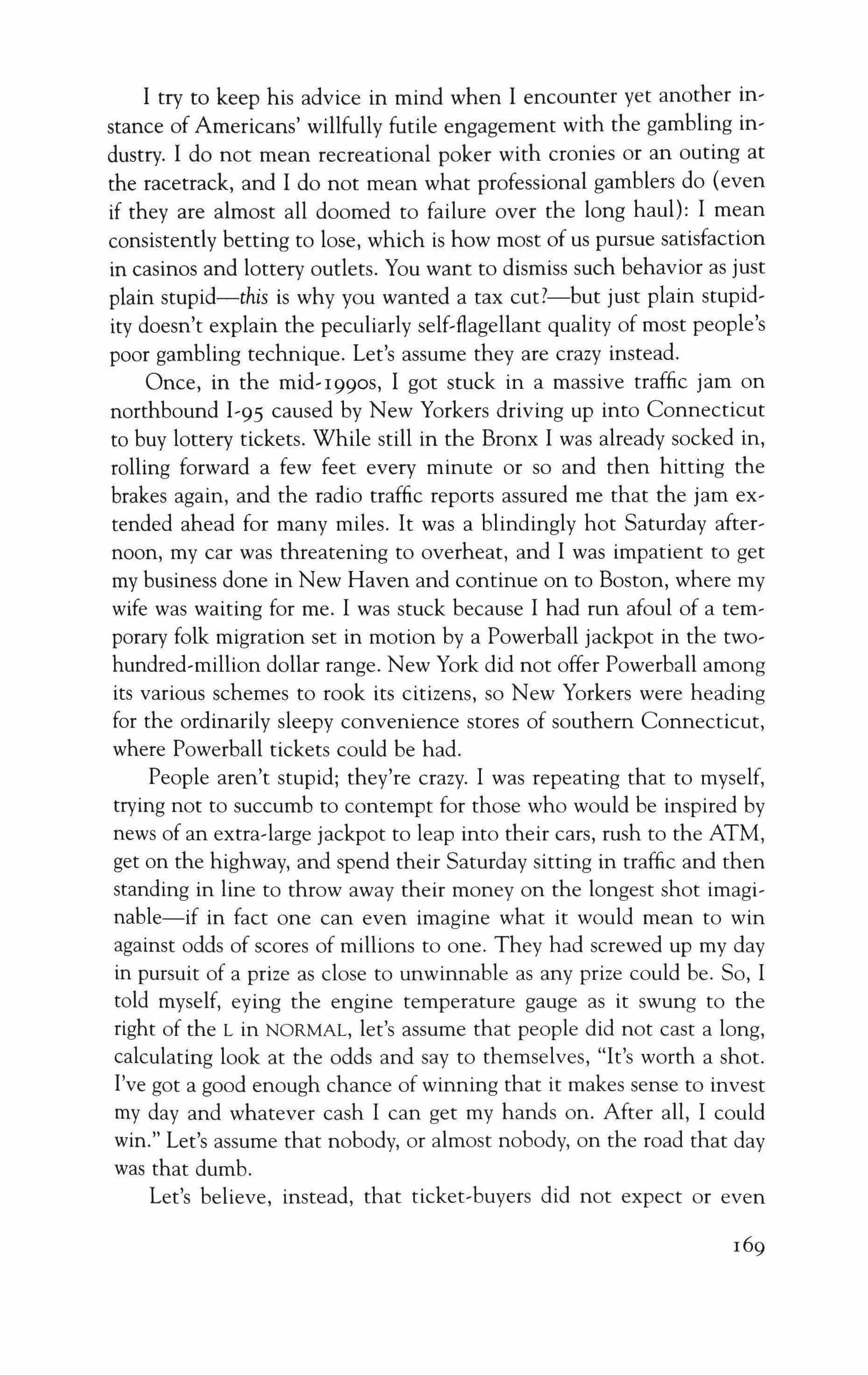
1 try to keep his advice in mind when 1 encounter yet another in' stance of Americans' willfully futile engagement with the gambling in' dustry. 1 do not mean recreational poker with cronies or an outing at the racetrack, and 1 do not mean what professional gamblers do (even if they are almost all doomed to failure over the long haul): 1 mean consistently betting to lose, which is how most of us pursue satisfaction in casinos and lottery outlets. You want to dismiss such behavior as just plain stupid-this is why you wanted a tax cut?-but just plain stupid, ity doesn't explain the peculiarly self-flagellant quality of most people's poor gambling technique. Let's assume they are crazy instead.
Once, in the mid'I990S, 1 got stuck in a massive traffic jam on northbound 1'95 caused by New Yorkers driving up into Connecticut to buy lottery tickets. While still in the Bronx 1 was already socked in, rolling forward a few feet every minute or so and then hitting the brakes again, and the radio traffic reports assured me that the jam ex, tended ahead for many miles. It was a blindingly hot Saturday after, noon, my car was threatening to overheat, and 1 was impatient to get my business done in New Haven and continue on to Boston, where my wife was waiting for me. 1 was stuck because 1 had run afoul of a tern' porary folk migration set in motion by a Powerball jackpot in the two' hundred-million dollar range. New York did not offer Powerball among its various schemes to rook its citizens, so New Yorkers were heading for the ordinarily sleepy convenience stores of southern Connecticut, where Powerball tickets could be had.
People aren't stupid; they're crazy. 1 was repeating that to myself, trying not to succumb to contempt for those who would be inspired by news of an extra,large jackpot to leap into their cars, rush to the ATM, get on the highway, and spend their Saturday sitting in traffic and then standing in line to throwaway their money on the longest shot imaginabIe-if in fact one can even imagine what it would mean to win against odds of scores of millions to one. They had screwed up my day in pursuit of a prize as close to unwinnable as any prize could be. So, 1 told myself, eying the engine temperature gauge as it swung to the right of the L in NORMAL, let's assume that people did not cast a long, calculating look at the odds and say to themselves, "It's worth a shot. I've got a good enough chance of winning that it makes sense to invest my day and whatever cash 1 can get my hands on. After all, 1 could win." Let's assume that nobody, or almost nobody, on the road that day was that dumb.
Let's believe, instead, that ticket-buyers did not expect or even
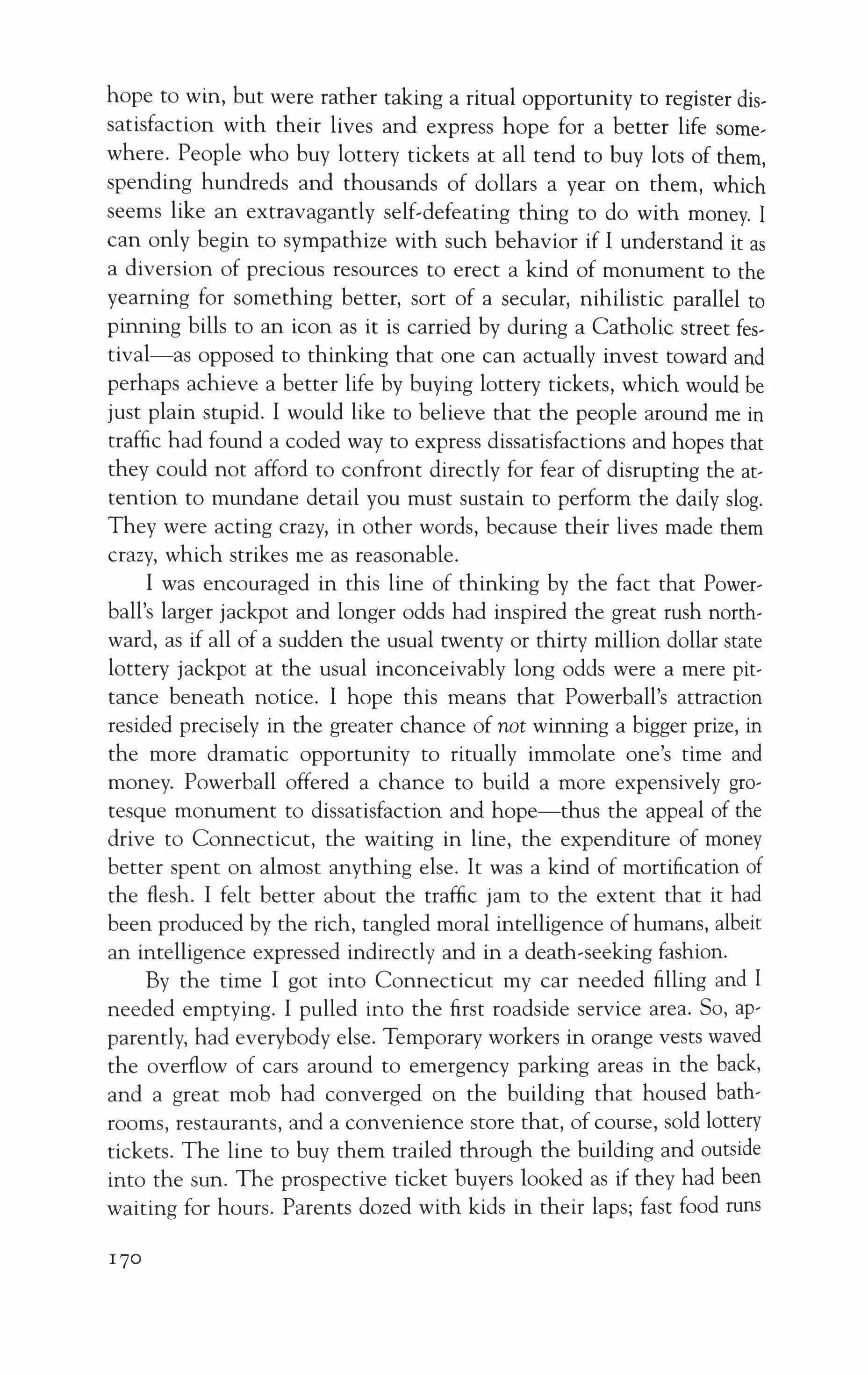
hope to win, but were rather taking a ritual opportunity to register dissatisfaction with their lives and express hope for a better life somewhere. People who buy lottery tickets at all tend to buy lots of them, spending hundreds and thousands of dollars a year on them, which seems like an extravagantly self-defeating thing to do with money. I can only begin to sympathize with such behavior if I understand it as a diversion of precious resources to erect a kind of monument to the yearning for something better, sort of a secular, nihilistic parallel to pinning bills to an icon as it is carried by during a Catholic street festival-as opposed to thinking that one can actually invest toward and perhaps achieve a better life by buying lottery tickets, which would be just plain stupid. I would like to believe that the people around me in traffic had found a coded way to express dissatisfactions and hopes that they could not afford to confront directly for fear of disrupting the attention to mundane detail you must sustain to perform the daily slog. They were acting crazy, in other words, because their lives made them crazy, which strikes me as reasonable.
I was encouraged in this line of thinking by the fact that Powerball's larger jackpot and longer odds had inspired the great rush northward, as if all of a sudden the usual twenty or thirty million dollar state lottery jackpot at the usual inconceivably long odds were a mere pittance beneath notice. I hope this means that Powerball's attraction resided precisely in the greater chance of not winning a bigger prize, in the more dramatic opportunity to ritually immolate one's time and money. Powerball offered a chance to build a more expensively grotesque monument to dissatisfaction and hope-thus the appeal of the drive to Connecticut, the waiting in line, the expenditure of money better spent on almost anything else. It was a kind of mortification of the flesh. I felt better about the traffic jam to the extent that it had been produced by the rich, tangled moral intelligence of humans, albeit an intelligence expressed indirectly and in a death-seeking fashion.
By the time I got into Connecticut my car needed filling and I needed emptying. I pulled into the first roadside service area. So, apparently, had everybody else. Temporary workers in orange vests waved the overflow of cars around to emergency parking areas in the back, and a great mob had converged on the building that housed bathrooms, restaurants, and a convenience store that, of course, sold lottery tickets. The line to buy them trailed through the building and outside into the sun. The prospective ticket buyers looked as if they had been waiting for hours. Parents dozed with kids in their laps; fast food runs
170
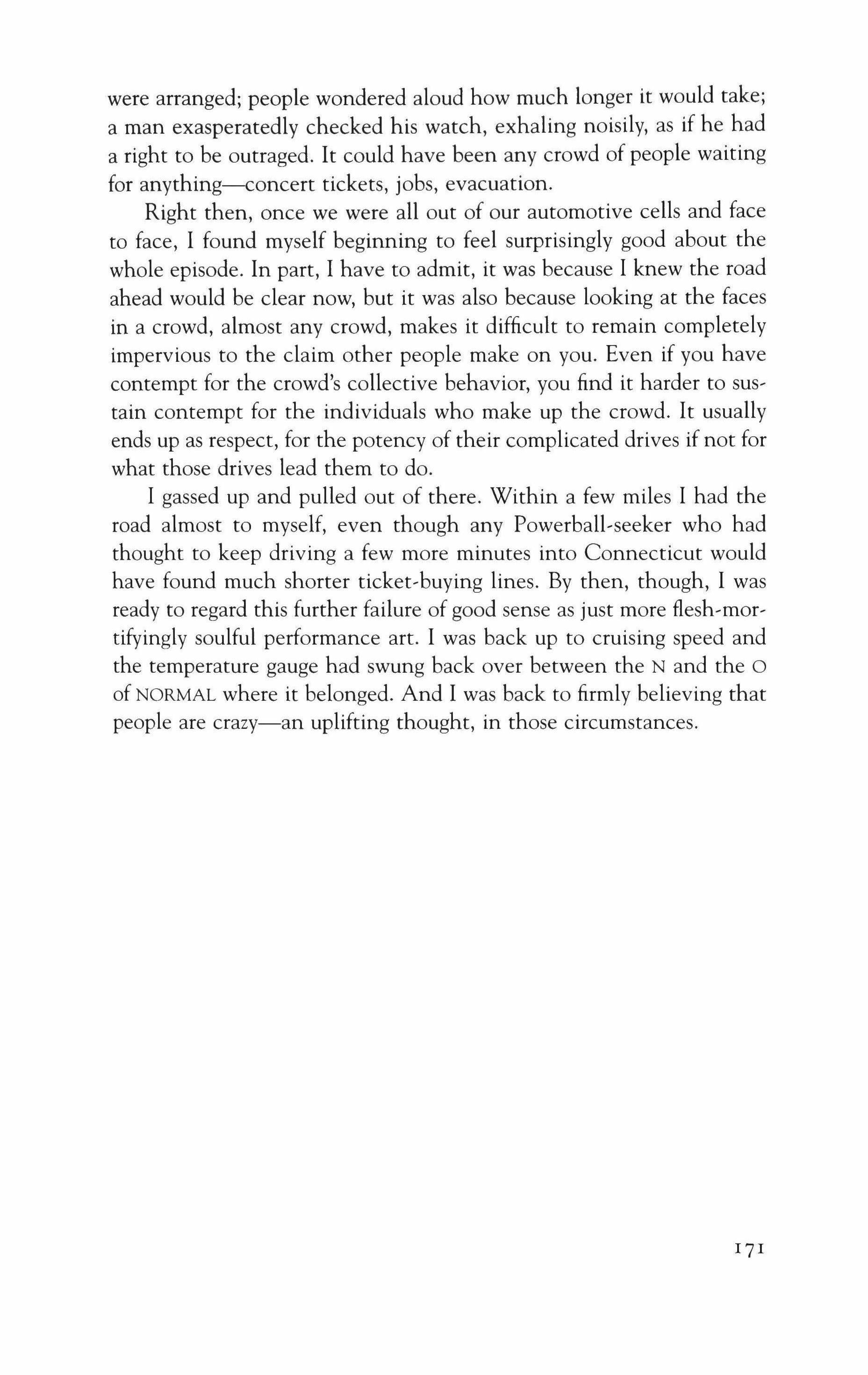
were arranged; people wondered aloud how much longer it would take; a man exasperatedly checked his watch, exhaling noisily, as if he had a right to be outraged. It could have been any crowd of people waiting for anything-concert tickets, jobs, evacuation.
Right then, once we were all out of our automotive cells and face to face, I found myself beginning to feel surprisingly good about the whole episode. In part, I have to admit, it was because I knew the road ahead would be clear now, but it was also because looking at the faces in a crowd, almost any crowd, makes it difficult to remain completely impervious to the claim other people make on you. Even if you have contempt for the crowd's collective behavior, you find it harder to sustain contempt for the individuals who make up the crowd. It usually ends up as respect, for the potency of their complicated drives if not for what those drives lead them to do.
I gassed up and pulled out of there. Within a few miles I had the road almost to myself, even though any Powerball-seeker who had thought to keep driving a few more minutes into Connecticut would have found much shorter ticket-buying lines. By then, though, I was ready to regard this further failure of good sense as just more flesh-mortifyingly soulful performance art. I was back up to cruising speed and the temperature gauge had swung back over between the N and the 0 of NORMAL where it belonged. And I was back to firmly believing that people are crazy-an uplifting thought, in those circumstances.
Lawrence Joseph
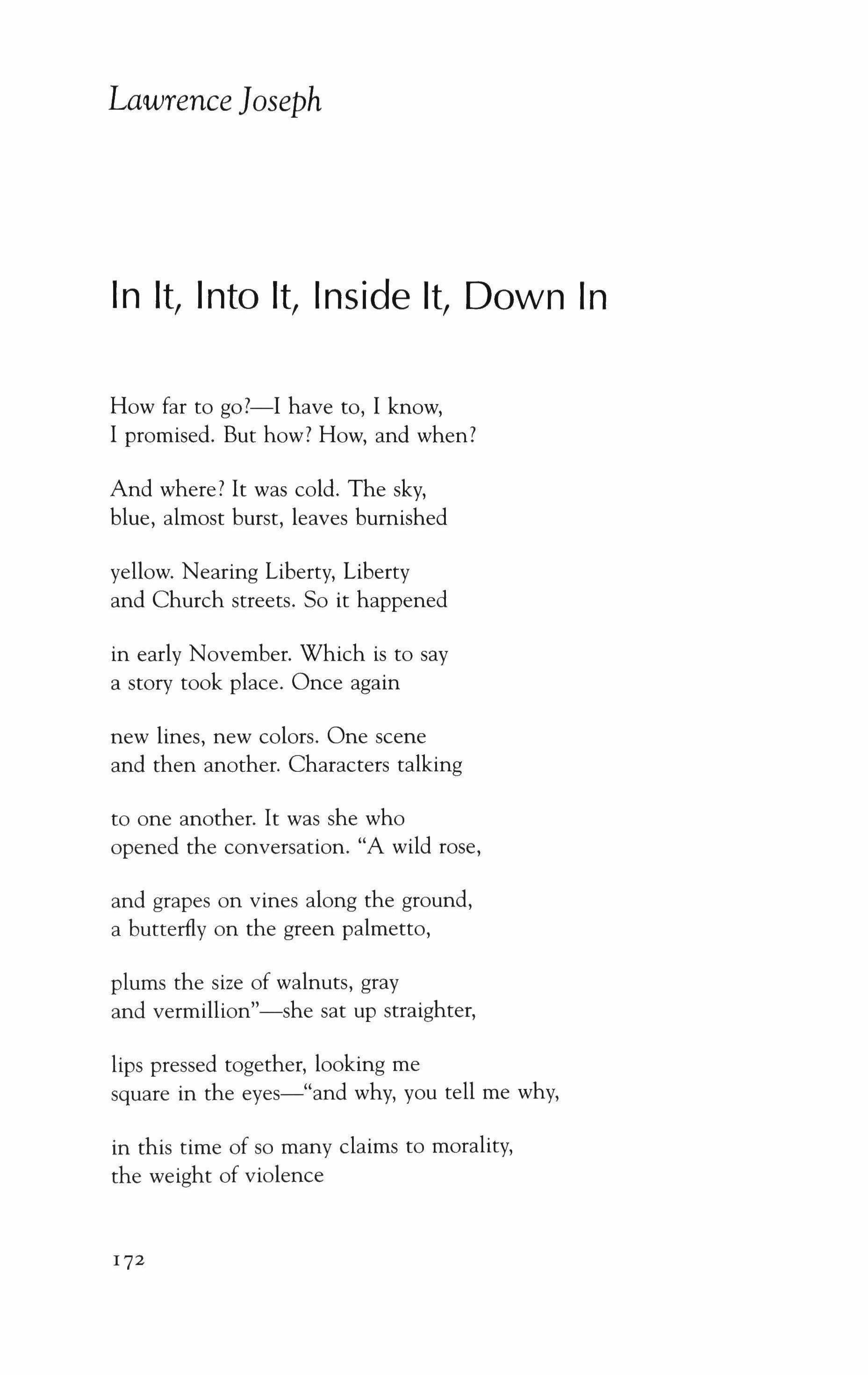
In It, Into It, Inside It, Down In
How far to go?-I have to, I know, I promised. But how? How, and when?
And where? It was cold. The sky, blue, almost burst, leaves burnished
yellow. Nearing Liberty, Liberty and Church streets. So it happened in early November. Which is to say a story took place. Once again
new lines, new colors. One scene and then another. Characters talking to one another. It was she who opened the conversation. "A wild rose, and grapes on vines along the ground, a butterfly on the green palmetto, plums the size of walnuts, gray and vermillion"-she sat up straighter, lips pressed together, looking me square in the eyes-"and why, you tell me why, in this time of so many claims to morality, the weight of violence
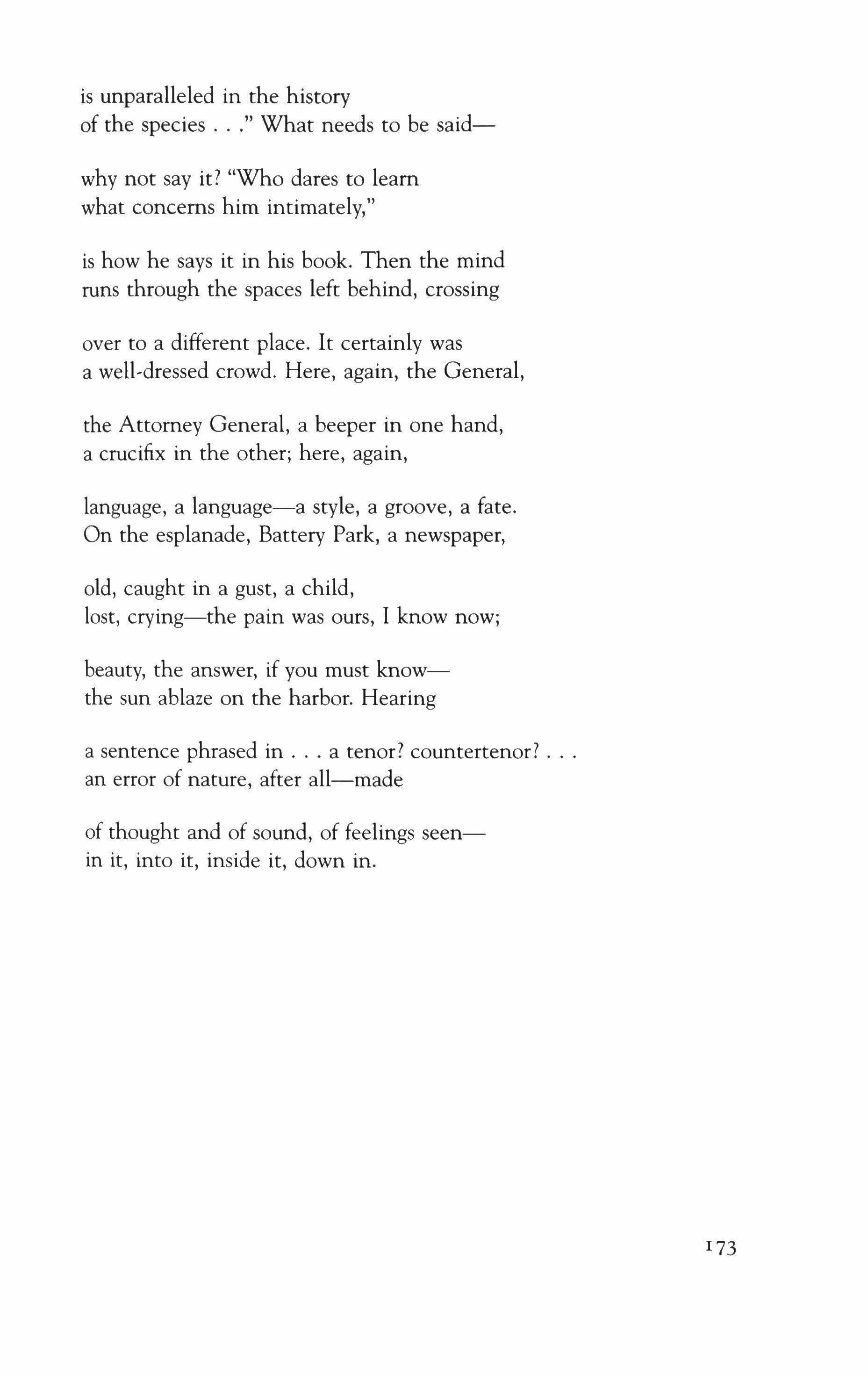
is unparalleled in the history of the species What needs to be said-
why not say it? "Who dares to learn what concerns him intimately,"
is how he says it in his book. Then the mind runs through the spaces left behind, crossing over to a different place. It certainly was a well-dressed crowd. Here, again, the General, the Attorney General, a beeper in one hand, a crucifix in the other; here, again,
language, a language-a style, a groove, a fate. On the esplanade, Battery Park, a newspaper,
old, caught in a gust, a child, lost, crying-the pain was ours, I know now;
beauty, the answer, if you must knowthe sun ablaze on the harbor. Hearing
a sentence phrased in a tenor? countertenor? an error of nature, after all-made of thought and of sound, of feelings seenin it, into it, inside it, down in.
What Do You Mean, What?
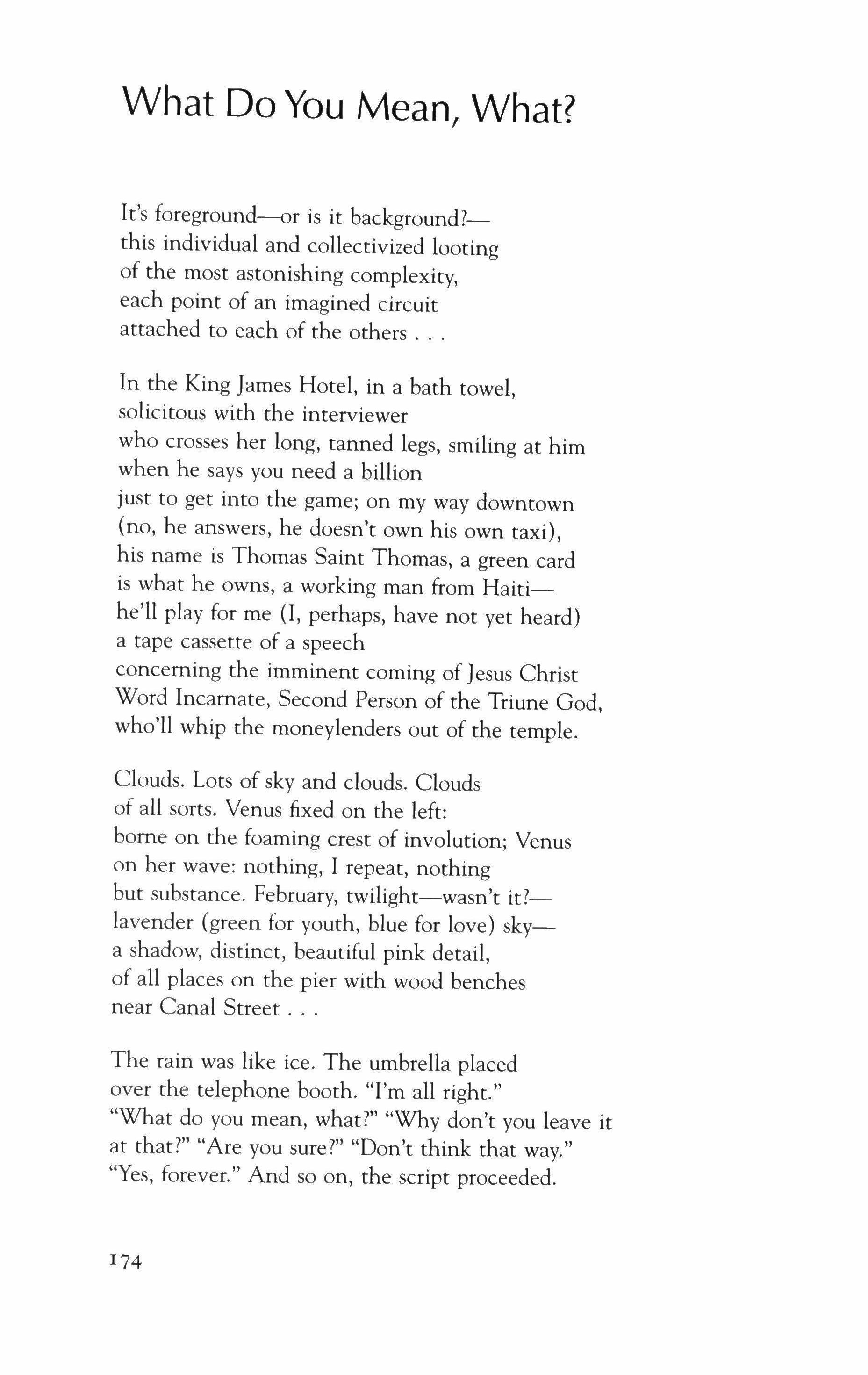
It's foreground-or is it background?this individual and collectivized looting of the most astonishing complexity, each point of an imagined circuit attached to each of the others
In the King James Hotel, in a bath towel, solicitous with the interviewer who crosses her long, tanned legs, smiling at him when he says you need a billion just to get into the game; on my way downtown (no, he answers, he doesn't own his own taxi), his name is Thomas Saint Thomas, a green card is what he owns, a working man from Haitihe'll play for me (I, perhaps, have not yet heard) a tape cassette of a speech concerning the imminent coming of Jesus Christ Word Incarnate, Second Person of the Triune God, who'll whip the moneylenders out of the temple.
Clouds. Lots of sky and clouds. Clouds of all sorts. Venus fixed on the left: borne on the foaming crest of involution; Venus on her wave: nothing, I repeat, nothing but substance. February, twilight-wasn't it?lavender (green for youth, blue for love) skya shadow, distinct, beautiful pink detail, of all places on the pier with wood benches near Canal Street
The rain was like ice. The umbrella placed over the telephone booth. "I'm all right." "What do you mean, what?" "Why don't you leave it at that?" "Are you sure?" "Don't think that way." "Yes, forever." And so on, the script proceeded.
174
The Game Changed
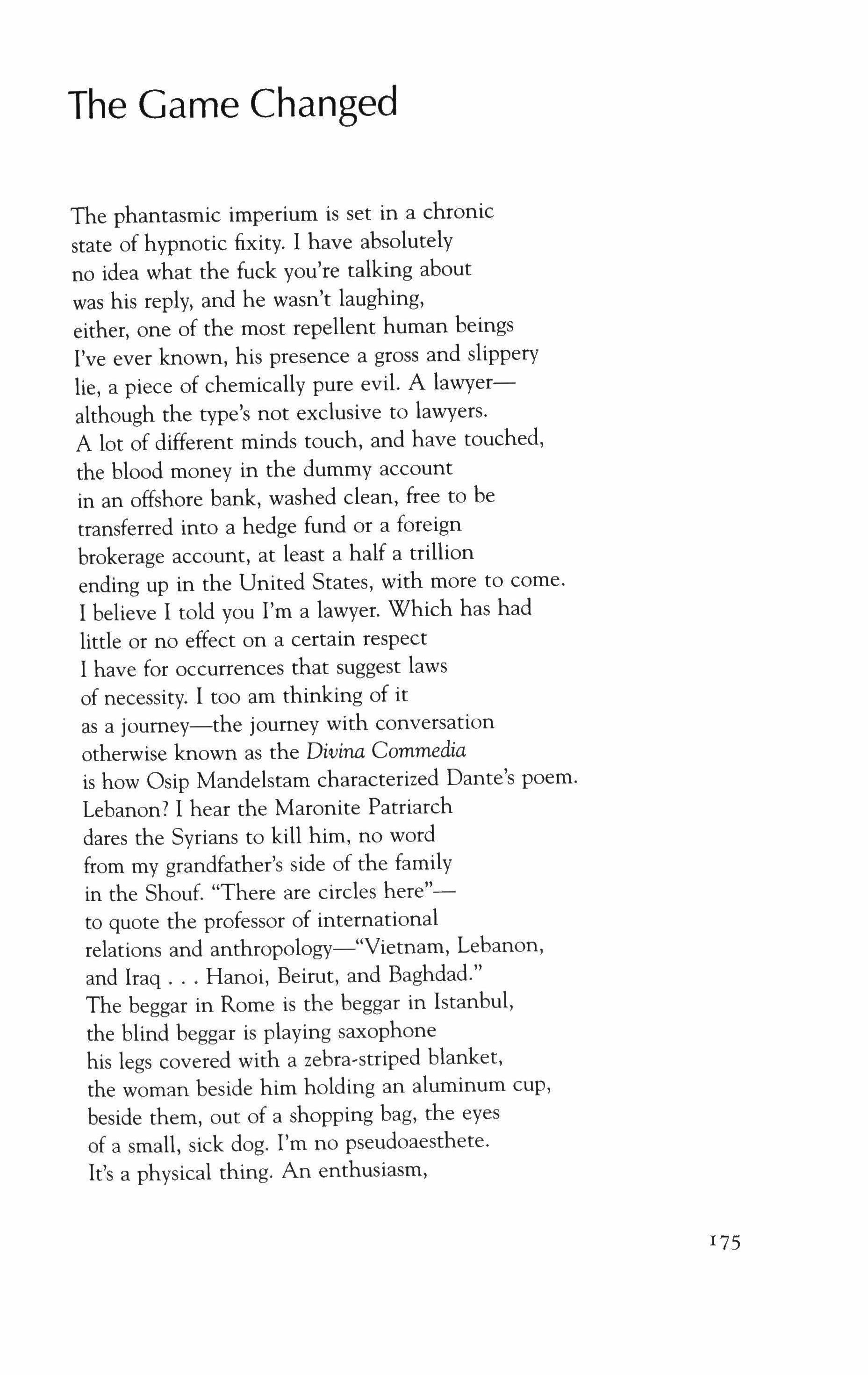
The phantasmic imperium is set in a chronic state of hypnotic fixity. I have absolutely no idea what the fuck you're talking about was his reply, and he wasn't laughing, either, one of the most repellent human beings I've ever known, his presence a gross and slippery lie, a piece of chemically pure evil. A lawyeralthough the type's not exclusive to lawyers. A lot of different minds touch, and have touched, the blood money in the dummy account in an offshore bank, washed clean, free to be transferred into a hedge fund or a foreign brokerage account, at least a half a trillion ending up in the United States, with more to come. I believe I told you I'm a lawyer. Which has had little or no effect on a certain respect I have for occurrences that suggest laws of necessity. I too am thinking of it as a journey-the journey with conversation otherwise known as the Divina Commedia is how Osip Mandelstam characterized Dante's poem. Lebanon? I hear the Maronite Patriarch dares the Syrians to kill him, no word from my grandfather's side of the family in the Shouf. "There are circles here"to quote the professor of international relations and anthropology-"Vietnam, Lebanon, and Iraq Hanoi, Beirut, and Baghdad." The beggar in Rome is the beggar in Istanbul, the blind beggar is playing saxophone his legs covered with a zebra-striped blanket, the woman beside him holding an aluminum cup, beside them, out of a shopping bag, the eyes of a small, sick dog. I'm no pseudoaesthete. It's a physical thing. An enthusiasm,
175
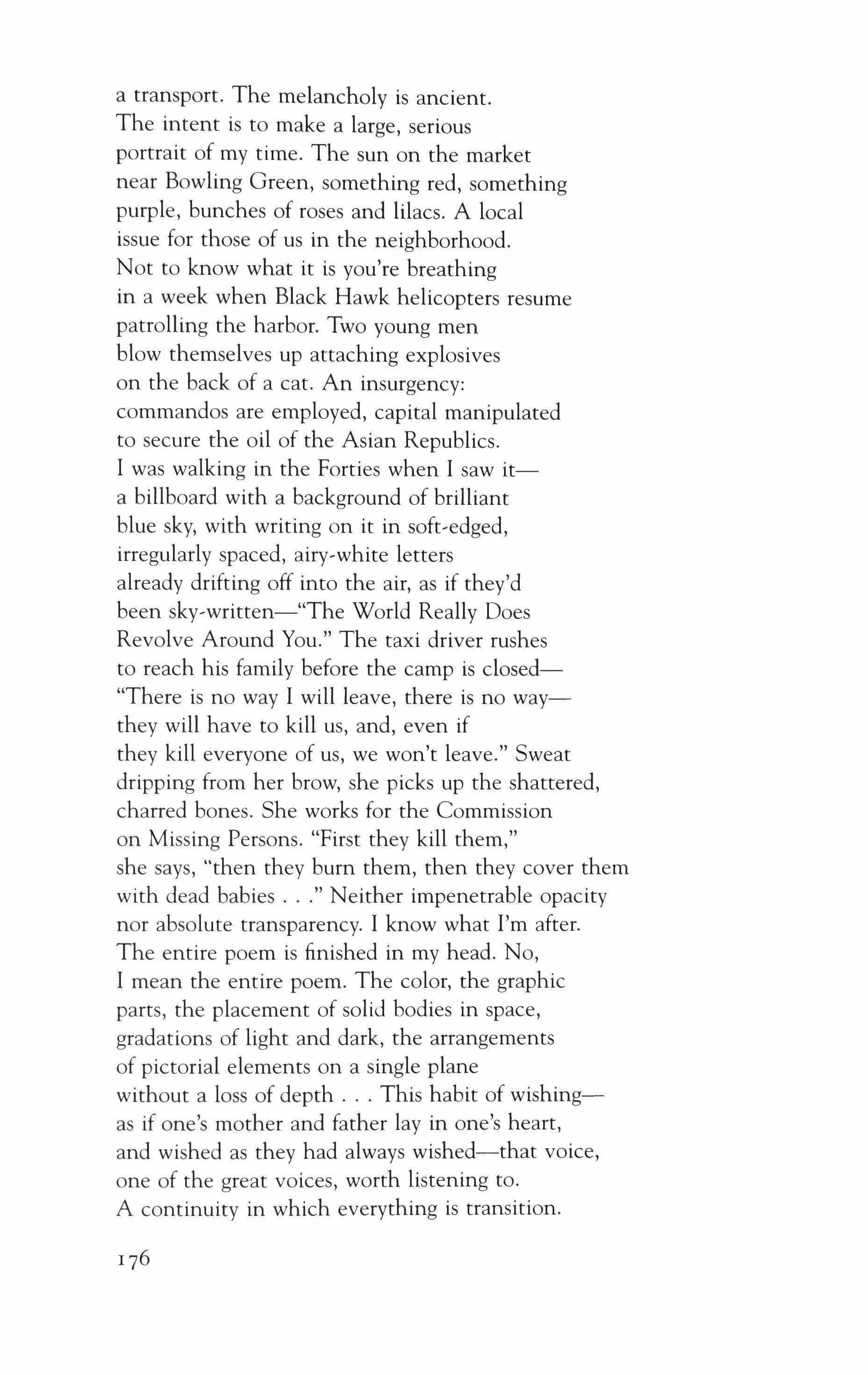
a transport. The melancholy is ancient. The intent is to make a large, serious portrait of my time. The sun on the market near Bowling Green, something red, something purple, bunches of roses and lilacs. A local issue for those of us in the neighborhood. Not to know what it is you're breathing in a week when Black Hawk helicopters resume patrolling the harbor. Two young men blow themselves up attaching explosives on the back of a cat. An insurgency: commandos are employed, capital manipulated to secure the oil of the Asian Republics. I was walking in the Forties when I saw ita billboard with a background of brilliant blue sky, with writing on it in soft-edged, irregularly spaced, airy-white letters already drifting off into the air, as if they'd been skv-written=-v'The World Really Does Revolve Around You." The taxi driver rushes to reach his family before the camp is closed"There is no way I will leave, there is no waythey will have to kill us, and, even if they kill everyone of us, we won't leave." Sweat dripping from her brow, she picks up the shattered, charred bones. She works for the Commission on Missing Persons. "First they kill them," she says, "then they burn them, then they cover them with dead babies Neither impenetrable opacity nor absolute transparency. I know what I'm after. The entire poem is finished in my head. No, I mean the entire poem. The color, the graphic parts, the placement of solid bodies in space, gradations of light and dark, the arrangements of pictorial elements on a single plane without a loss of depth This habit of wishingas if one's mother and father lay in one's heart, and wished as they had always wished-that voice, one of the great voices, worth listening to. A continuity in which everything is transition.
176
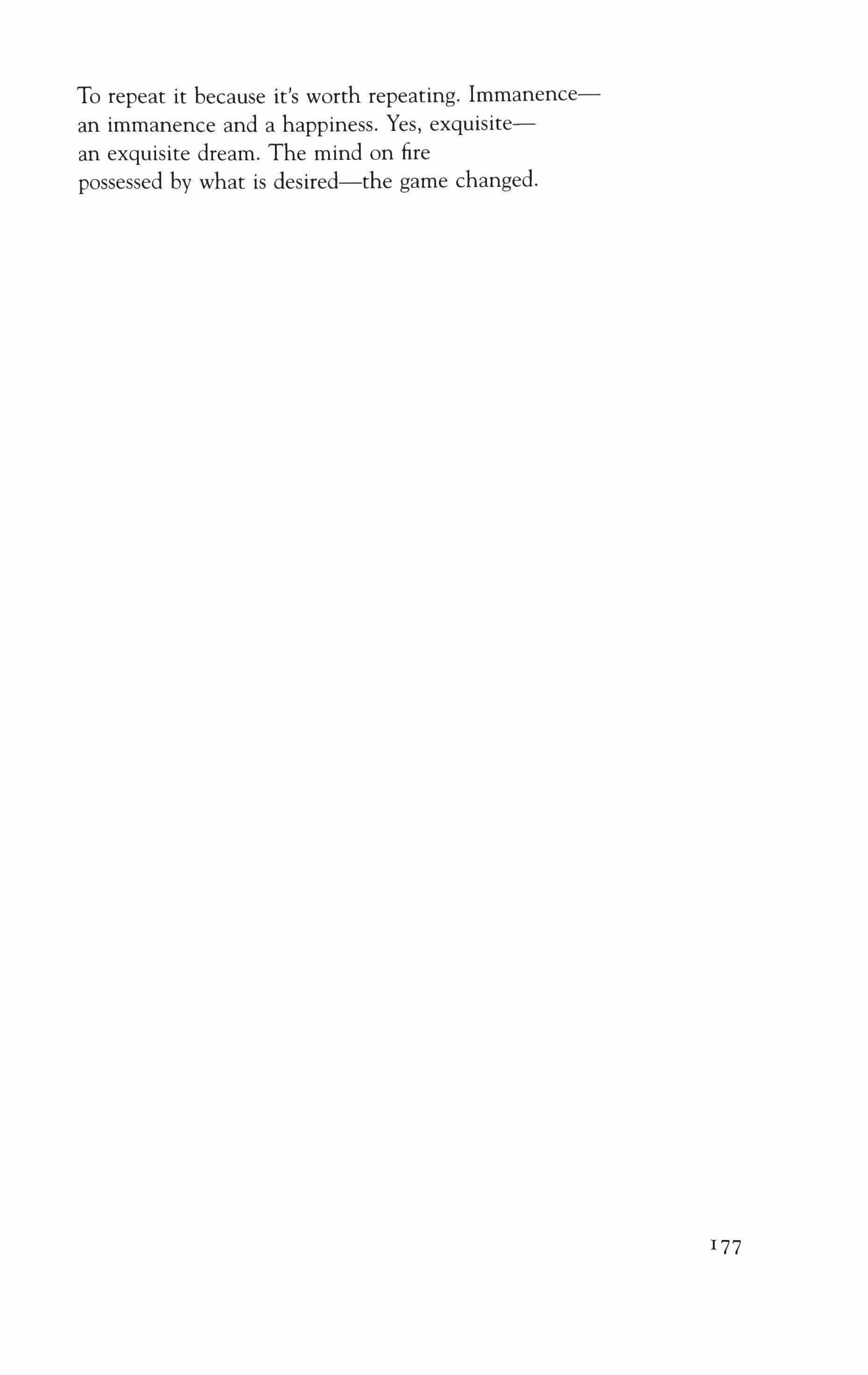
To repeat it because it's worth repeating. Immanencean immanence and a happiness. Yes, exquisitean exquisite dream. The mind on fire possessed by what is desired-the game changed.
Once Again
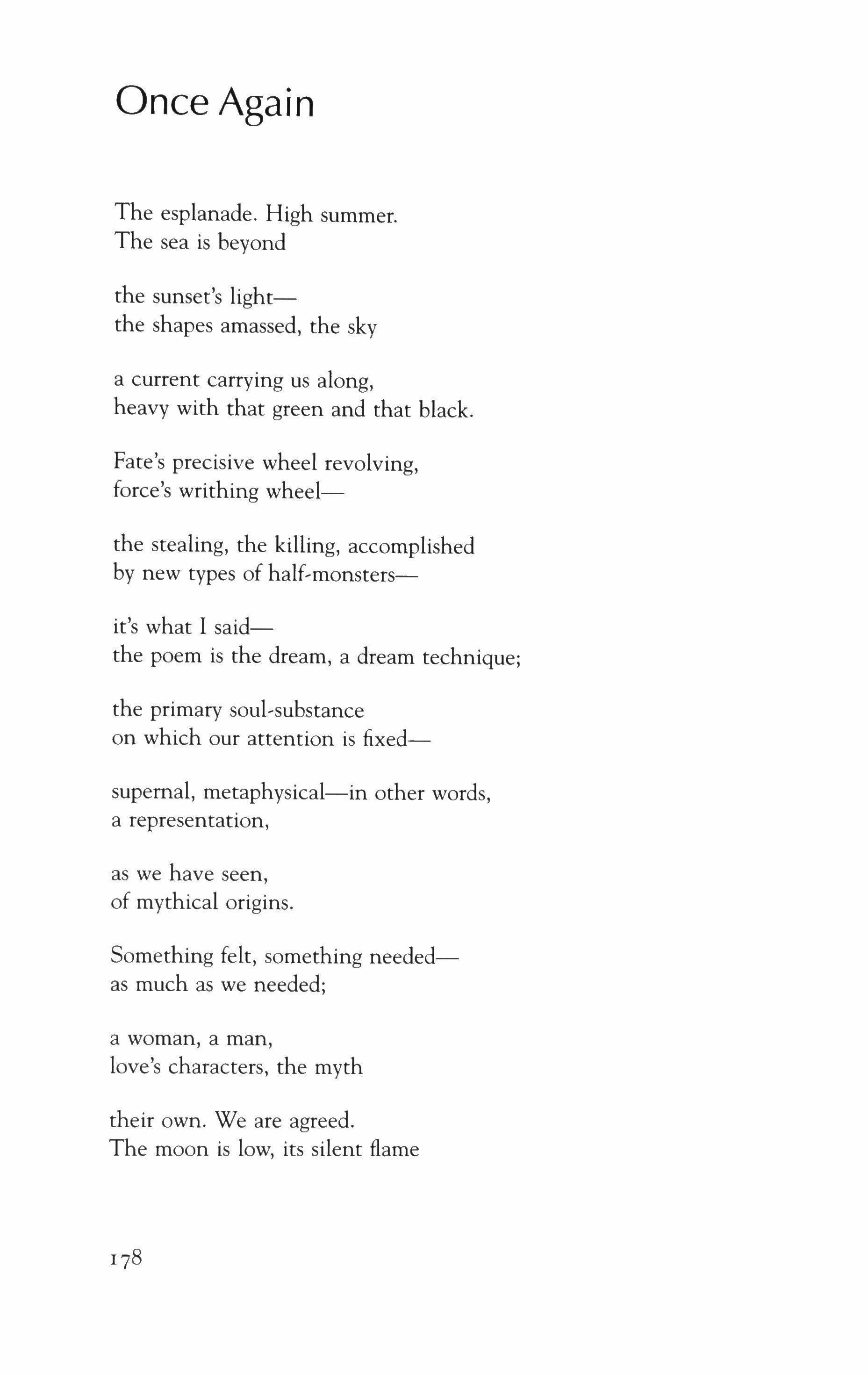
The esplanade. High summer. The sea is beyond the sunset's lightthe shapes amassed, the sky
a current carrying us along, heavy with that green and that black.
Fate's precisive wheel revolving, force's writhing wheelthe stealing, the killing, accomplished by new types of half-monstersit's what I saidthe poem is the dream, a dream technique; the primary soul-substance on which our attention is fixed-
supernal, metaphysical-in other words, a representation,
as we have seen, of mythical origins.
Something felt, something neededas much as we needed; a woman, a man, love's characters, the myth their own. We are agreed. The moon is low, its silent flame
178

across the garden of roses, almost level with the harbor. We place our hands on the silence and, once again, repeat the vow.
179
Ann Beattie
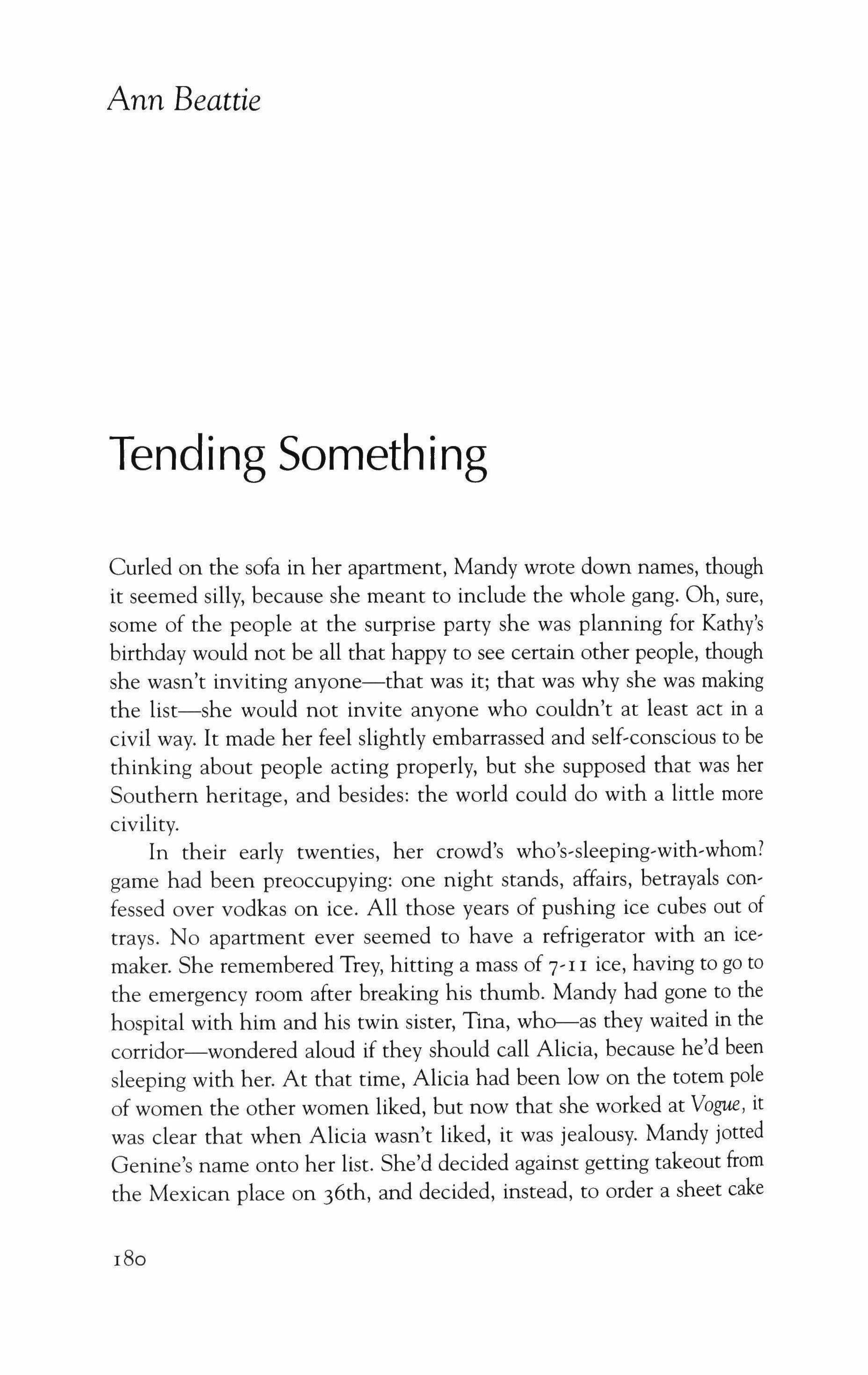
Tending Something
Curled on the sofa in her apartment, Mandy wrote down names, though it seemed silly, because she meant to include the whole gang. Oh, sure, some of the people at the surprise party she was planning for Kathy's birthday would not be all that happy to see certain other people, though she wasn't inviting anyone-that was it; that was why she was making the list-she would not invite anyone who couldn't at least act in a civil way. It made her feel slightly embarrassed and self-conscious to be thinking about people acting properly, but she supposed that was her Southern heritage, and besides: the world could do with a little more civility.
In their early twenties, her crowd's who's-sleeping-with-whom? game had been preoccupying: one night stands, affairs, betrayals confessed over vodkas on ice. All those years of pushing ice cubes out of trays. No apartment ever seemed to have a refrigerator with an icemaker. She remembered Trey, hitting a mass of 7-1 I ice, having to go to the emergency room after breaking his thumb. Mandy had gone to the hospital with him and his twin sister, Tina, who-as they waited in the corridor-wondered aloud if they should call Alicia, because he'd been sleeping with her. At that time, Alicia had been low on the totem pole of women the other women liked, but now that she worked at Vogue, it was clear that when Alicia wasn't liked, it was jealousy. Mandy jotted Genine's name onto her list. She'd decided against getting takeout from the Mexican place on 36th, and decided, instead, to order a sheet cake
180
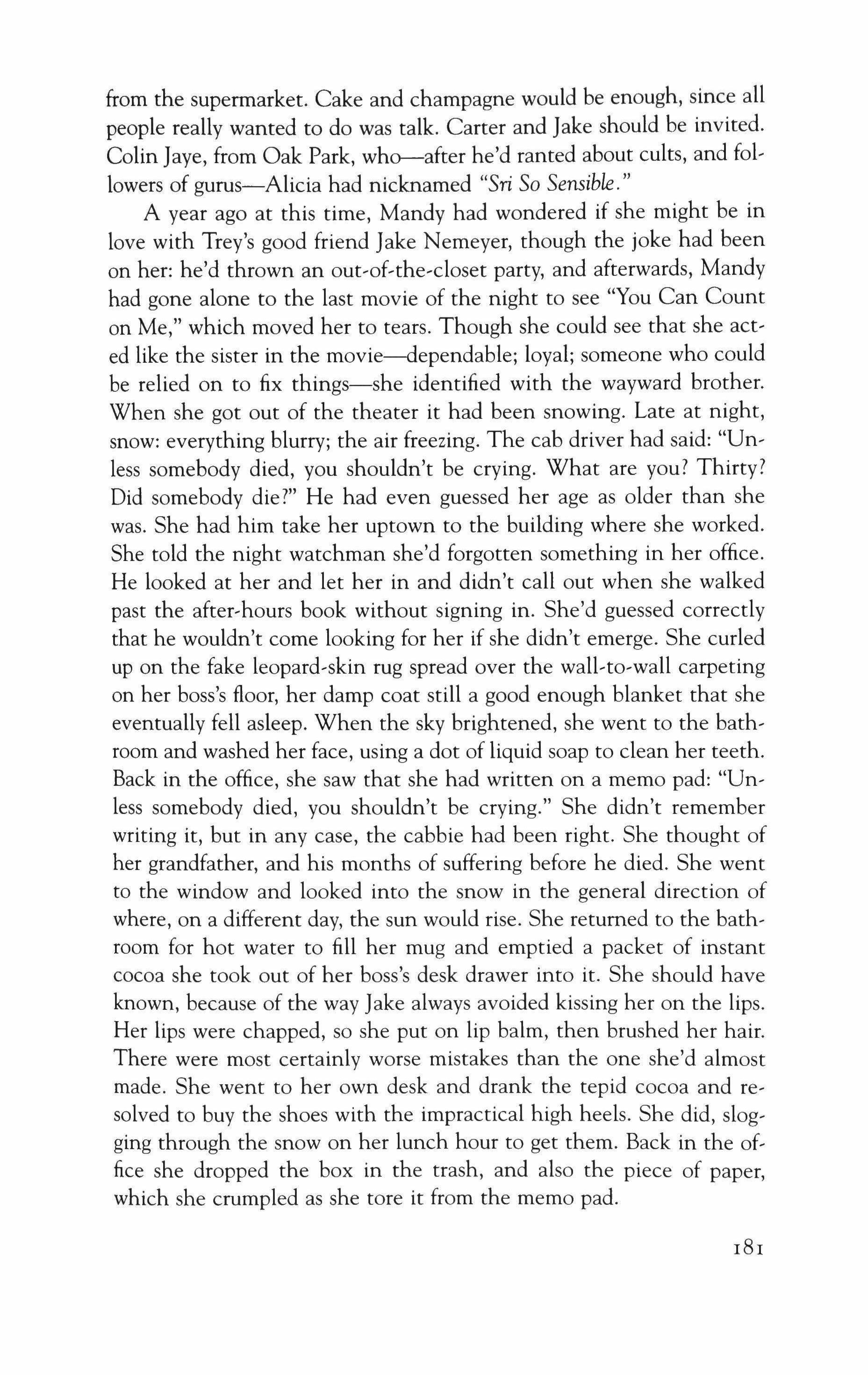
from the supermarket. Cake and champagne would be enough, since all people really wanted to do was talk. Carter and Jake should be invited. Colin [ave, from Oak Park, who-after he'd ranted about cults, and followers of gurus-Alicia had nicknamed "Sri So Sensible."
A year ago at this time, Mandy had wondered if she might be in love with Trey's good friend Jake Nemeyer, though the joke had been on her: he'd thrown an out-of-the-closet party, and afterwards, Mandy had gone alone to the last movie of the night to see "You Can Count on Me," which moved her to tears. Though she could see that she acted like the sister in the movie-dependable; loyal; someone who could be relied on to fix things-she identified with the wayward brother. When she got out of the theater it had been snowing. Late at night, snow: everything blurry; the air freezing. The cab driver had said: "Unless somebody died, you shouldn't be crying. What are you? Thirty? Did somebody die?" He had even guessed her age as older than she was. She had him take her uptown to the building where she worked. She told the night watchman she'd forgotten something in her office. He looked at her and let her in and didn't call out when she walked past the after-hours book without signing in. She'd guessed correctly that he wouldn't come looking for her if she didn't emerge. She curled up on the fake leopard-skin rug spread over the wall-to-wall carpeting on her boss's floor, her damp coat still a good enough blanket that she eventually fell asleep. When the sky brightened, she went to the bathroom and washed her face, using a dot of liquid soap to clean her teeth. Back in the office, she saw that she had written on a memo pad: "Unless somebody died, you shouldn't be crying." She didn't remember writing it, but in any case, the cabbie had been right. She thought of her grandfather, and his months of suffering before he died. She went to the window and looked into the snow in the general direction of where, on a different day, the sun would rise. She returned to the bathroom for hot water to fill her mug and emptied a packet of instant cocoa she took out of her boss's desk drawer into it. She should have known, because of the way Jake always avoided kissing her on the lips. Her lips were chapped, so she put on lip balm, then brushed her hair. There were most certainly worse mistakes than the one she'd almost made. She went to her own desk and drank the tepid cocoa and resolved to buy the shoes with the impractical high heels. She did, slogging through the snow on her lunch hour to get them. Back in the office she dropped the box in the trash, and also the piece of paper, which she crumpled as she tore it from the memo pad.
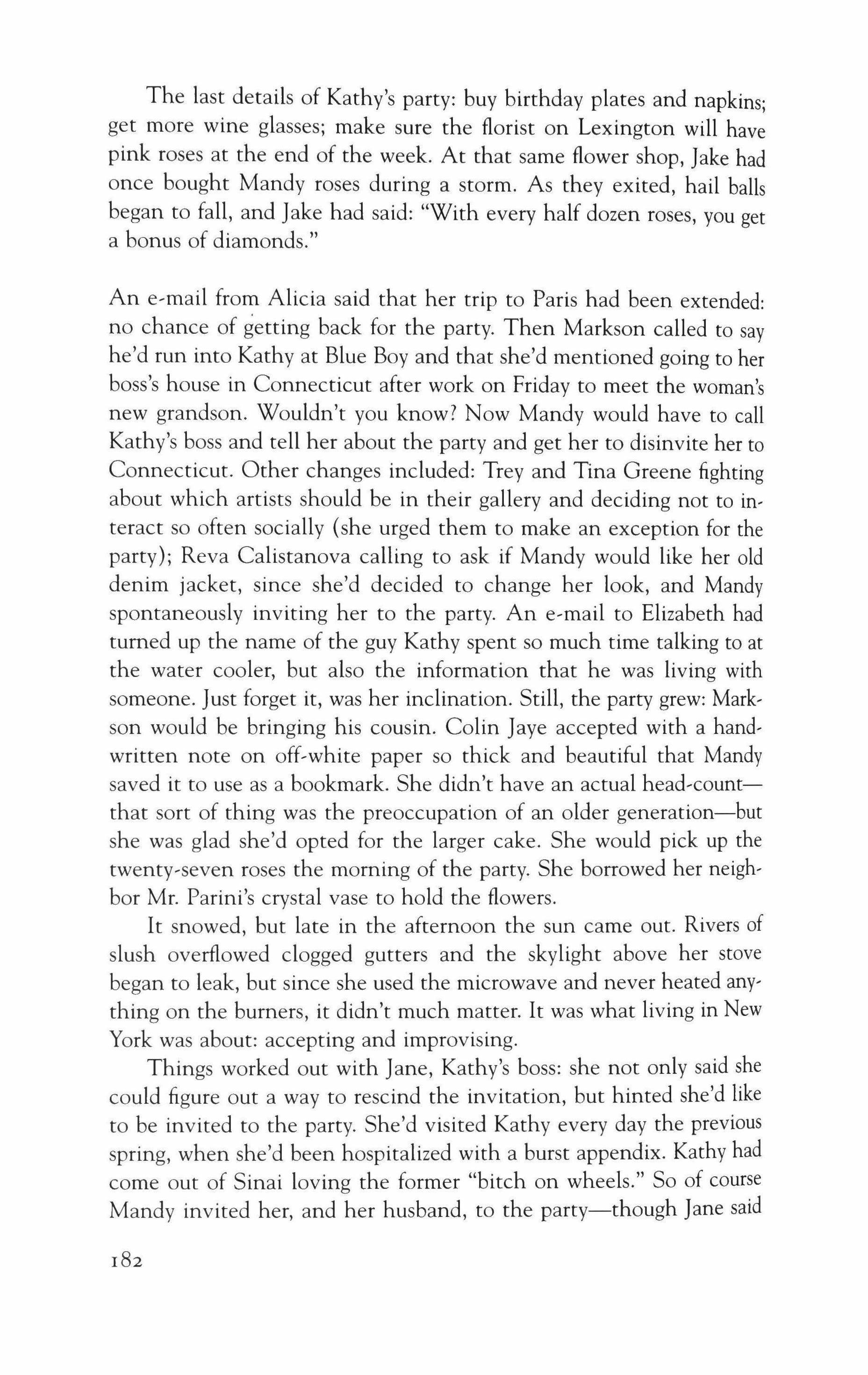
The last details of Kathy's party: buy birthday plates and napkins; get more wine glasses; make sure the florist on Lexington will have pink roses at the end of the week. At that same flower shop, Jake had once bought Mandy roses during a storm. As they exited, hail balls began to fall, and Jake had said: "With every half dozen roses, you get a bonus of diamonds."
An e-mail from Alicia said that her trip to Paris had been extended: no chance of getting back for the party. Then Markson called to say he'd run into Kathy at Blue Boy and that she'd mentioned going to her boss's house in Connecticut after work on Friday to meet the woman's new grandson. Wouldn't you know? Now Mandy would have to call Kathy's boss and tell her about the party and get her to disinvite her to Connecticut. Other changes included: Trey and Tina Greene fighting about which artists should be in their gallery and deciding not to interact so often socially (she urged them to make an exception for the party); Reva Calistanova calling to ask if Mandy would like her old denim jacket, since she'd decided to change her look, and Mandy spontaneously inviting her to the party. An e-mail to Elizabeth had turned up the name of the guy Kathy spent so much time talking to at the water cooler, but also the information that he was living with someone. Just forget it, was her inclination. Still, the party grew: Mark, son would be bringing his cousin. Colin Jaye accepted with a handwritten note on off-white paper so thick and beautiful that Mandy saved it to use as a bookmark. She didn't have an actual head-count-> that sort of thing was the preoccupation of an older generation-but she was glad she'd opted for the larger cake. She would pick up the twenty-seven roses the morning of the party. She borrowed her neighbor Mr. Parini's crystal vase to hold the flowers.
It snowed, but late in the afternoon the sun came out. Rivers of slush overflowed clogged gutters and the skylight above her stove began to leak, but since she used the microwave and never heated anything on the burners, it didn't much matter. It was what living in New York was about: accepting and improvising.
Things worked out with Jane, Kathy's boss: she not only said she could figure out a way to rescind the invitation, but hinted she'd like to be invited to the party. She'd visited Kathy every day the previous spring, when she'd been hospitalized with a burst appendix. Kathy had come out of Sinai loving the former "bitch on wheels." So of course Mandy invited her, and her husband, to the party-though Jane said
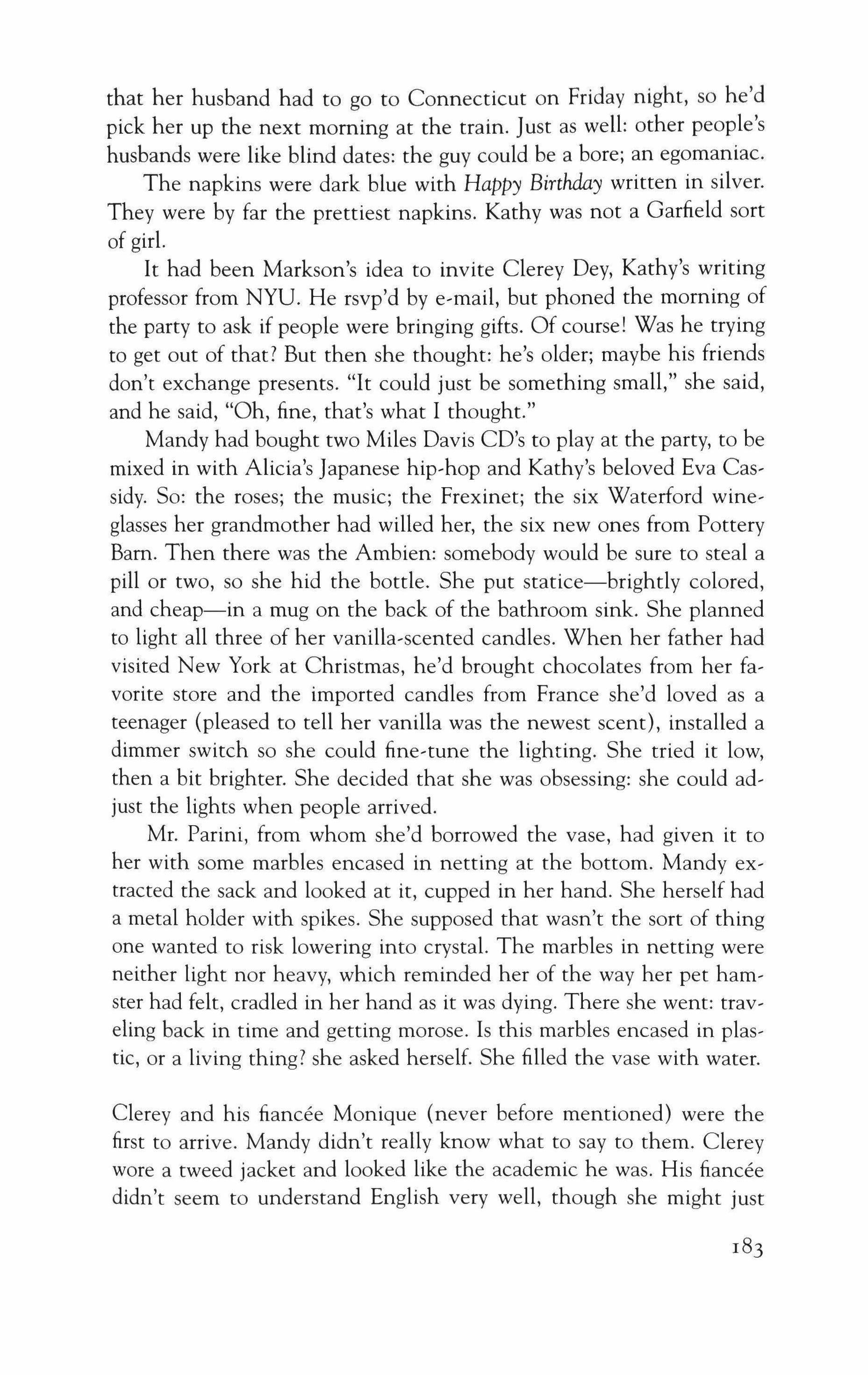
that her husband had to go to Connecticut on Friday night, so he'd pick her up the next morning at the train. Just as well: other people's husbands were like blind dates: the guy could be a bore; an egomaniac.
The napkins were dark blue with Happy Birthday written in silver. They were by far the prettiest napkins. Kathy was not a Garfield sort of girl.
It had been Markson's idea to invite Clerey Dey, Kathy's writing professor from NYU. He rsvp'd bye-mail, but phoned the morning of the party to ask if people were bringing gifts. Of course! Was he trying to get out of that? But then she thought: he's older; maybe his friends don't exchange presents. "It could just be something small," she said, and he said, "Oh, fine, that's what I thought."
Mandy had bought two Miles Davis CD's to play at the party, to be mixed in with Alicia's Japanese hip-hop and Kathy's beloved Eva Cassidy. So: the roses; the music; the Frexinet; the six Waterford wineglasses her grandmother had willed her, the six new ones from Pottery Bam. Then there was the Ambien: somebody would be sure to steal a pill or two, so she hid the bottle. She put statice-brightly colored, and cheap-in a mug on the back of the bathroom sink. She planned to light all three of her vanilla-scented candles. When her father had visited New York at Christmas, he'd brought chocolates from her favorite store and the imported candles from France she'd loved as a teenager (pleased to tell her vanilla was the newest scent), installed a dimmer switch so she could fine-tune the lighting. She tried it low, then a bit brighter. She decided that she was obsessing: she could adjust the lights when people arrived.
Mr. Parini, from whom she'd borrowed the vase, had given it to her with some marbles encased in netting at the bottom. Mandy extracted the sack and looked at it, cupped in her hand. She herself had a metal holder with spikes. She supposed that wasn't the sort of thing one wanted to risk lowering into crystal. The marbles in netting were neither light nor heavy, which reminded her of the way her pet hamster had felt, cradled in her hand as it was dying. There she went: traveling back in time and getting morose. Is this marbles encased in plastic, or a living thing? she asked herself. She filled the vase with water.
Clerey and his fiancee Monique (never before mentioned) were the first to arrive. Mandy didn't really know what to say to them. Clerey wore a tweed jacket and looked like the academic he was. His fiancee didn't seem to understand English very well, though she might just
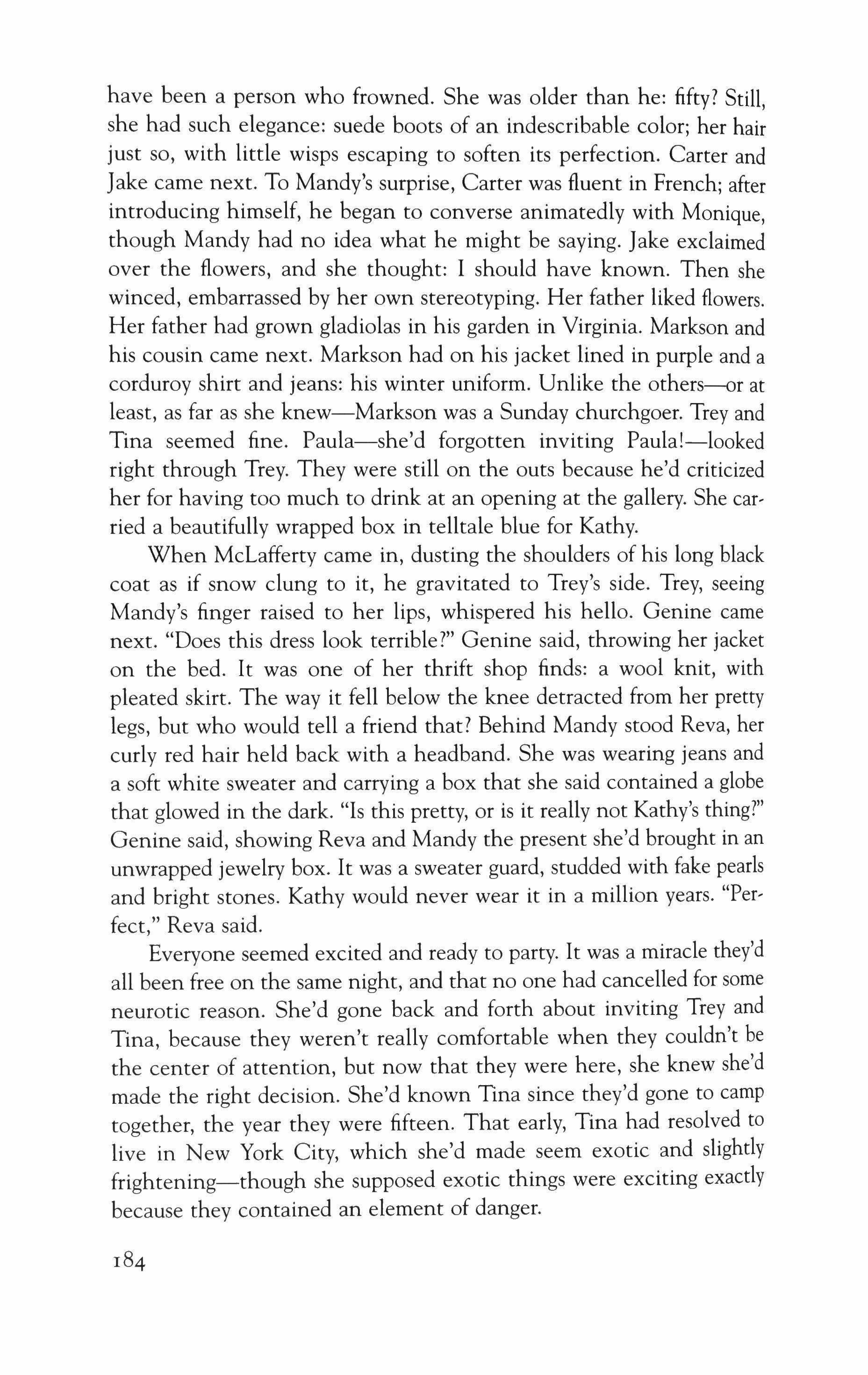
have been a person who frowned. She was older than he: fifty? Still, she had such elegance: suede boots of an indescribable color; her hair just so, with little wisps escaping to soften its perfection. Carter and Jake came next. To Mandy's surprise, Carter was fluent in French; after introducing himself, he began to converse animatedly with Monique, though Mandy had no idea what he might be saying. Jake exclaimed over the flowers, and she thought: I should have known. Then she winced, embarrassed by her own stereotyping. Her father liked flowers. Her father had grown gladiolas in his garden in Virginia. Markson and his cousin came next. Markson had on his jacket lined in purple and a corduroy shirt and jeans: his winter uniform. Unlike the others-or at least, as far as she knew-Markson was a Sunday churchgoer. Trey and Tina seemed fine. Paula-she'd forgotten inviting Paula!-looked right through Trey. They were still on the outs because he'd criticized her for having too much to drink at an opening at the gallery. She carried a beautifully wrapped box in telltale blue for Kathy.
When McLafferty came in, dusting the shoulders of his long black coat as if snow clung to it, he gravitated to Trey's side. Trey, seeing Mandy's finger raised to her lips, whispered his hello. Genine came next. "Does this dress look terrible?" Genine said, throwing her jacket on the bed. It was one of her thrift shop finds: a wool knit, with pleated skirt. The way it fell below the knee detracted from her pretty legs, but who would tell a friend that? Behind Mandy stood Reva, her curly red hair held back with a headband. She was wearing jeans and a soft white sweater and carrying a box that she said contained a globe that glowed in the dark. "Is this pretty, or is it really not Kathy's thing?" Genine said, showing Reva and Mandy the present she'd brought in an unwrapped jewelry box. It was a sweater guard, studded with fake pearls and bright stones. Kathy would never wear it in a million years. "Perfect," Reva said.
Everyone seemed excited and ready to party. It was a miracle they'd all been free on the same night, and that no one had cancelled for some neurotic reason. She'd gone back and forth about inviting Trey and Tina, because they weren't really comfortable when they couldn't be the center of attention, but now that they were here, she knew she'd made the right decision. She'd known Tina since they'd gone to camp together, the year they were fifteen. That early, Tina had resolved to live in New York City, which she'd made seem exotic and slightly frightening-though she supposed exotic things were exciting exactly because they contained an element of danger.
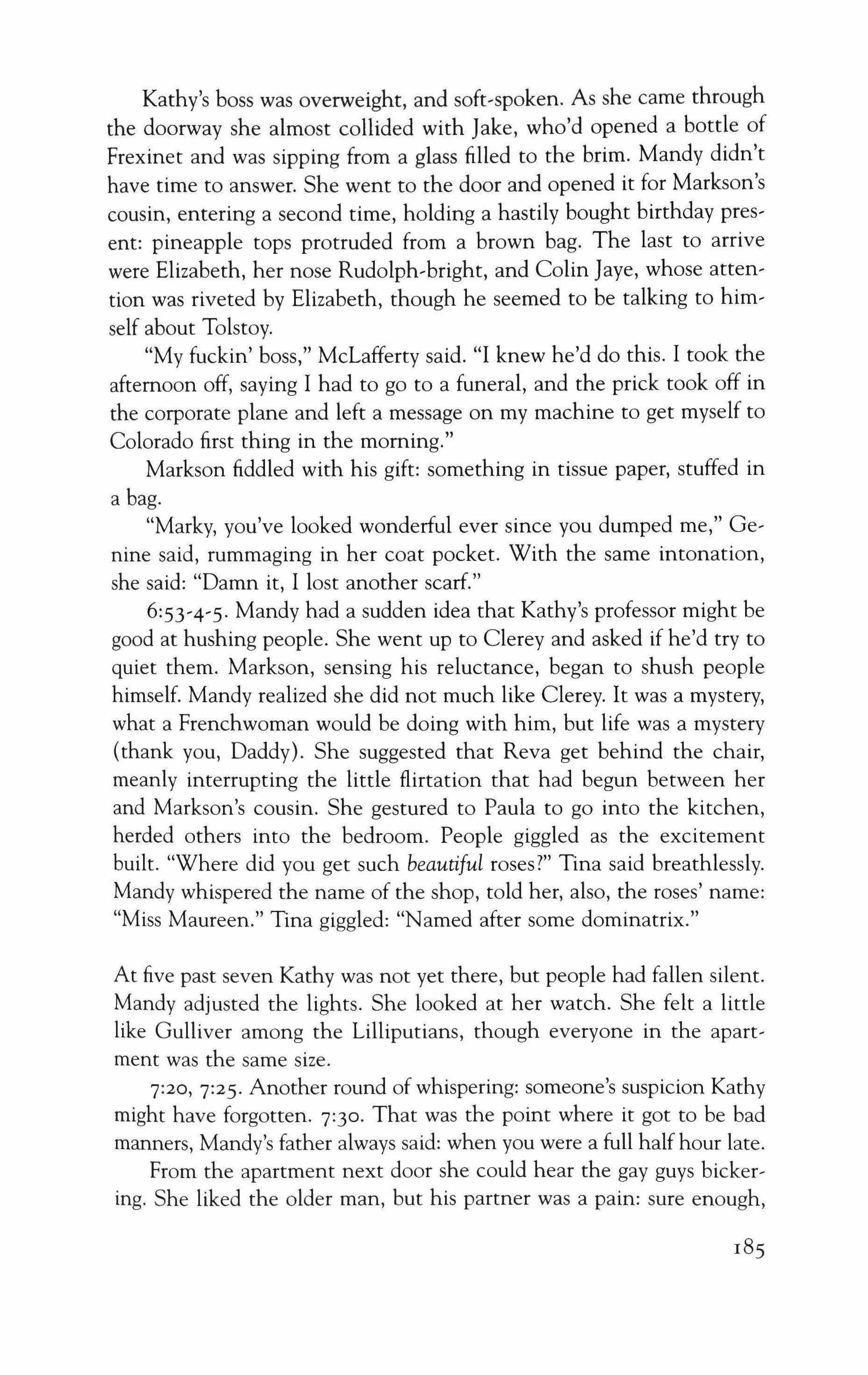
Kathy's boss was overweight, and soft-spoken. As she came through the doorway she almost collided with Jake, who'd opened a bottle of Frexinet and was sipping from a glass filled to the brim. Mandy didn't have time to answer. She went to the door and opened it for Markson's cousin, entering a second time, holding a hastily bought birthday present: pineapple tops protruded from a brown bag. The last to arrive were Elizabeth, her nose Rudolph-bright, and Colin Jaye, whose attention was riveted by Elizabeth, though he seemed to be talking to himself about Tolstoy.
"My fuckin' boss," McLafferty said. "I knew he'd do this. I took the afternoon off, saying I had to go to a funeral, and the prick took off in the corporate plane and left a message on my machine to get myself to Colorado first thing in the morning."
Markson fiddled with his gift: something in tissue paper, stuffed in a bag.
"Marky, you've looked wonderful ever since you dumped me," Genine said, rummaging in her coat pocket. With the same intonation, she said: "Damn it, I lost another scarf."
6:53-4-5. Mandy had a sudden idea that Kathy's professor might be good at hushing people. She went up to Clerey and asked if he'd try to quiet them. Markson, sensing his reluctance, began to shush people himself. Mandy realized she did not much like Clerey. It was a mystery, what a Frenchwoman would be doing with him, but life was a mystery (thank you, Daddy). She suggested that Reva get behind the chair, meanly interrupting the little flirtation that had begun between her and Markson's cousin. She gestured to Paula to go into the kitchen, herded others into the bedroom. People giggled as the excitement built. "Where did you get such beautiful roses?" Tina said breathlessly. Mandy whispered the name of the shop, told her, also, the roses' name: "Miss Maureen." Tina giggled: "Named after some dominatrix."
At five past seven Kathy was not yet there, but people had fallen silent. Mandy adjusted the lights. She looked at her watch. She felt a little like Gulliver among the Lilliputians, though everyone in the apartment was the same size.
7:20,7:25. Another round of whispering: someone's suspicion Kathy might have forgotten. T30. That was the point where it got to be bad manners, Mandy's father always said: when you were a full half hour late. From the apartment next door she could hear the gay guys bickering. She liked the older man, but his partner was a pain: sure enough,
185
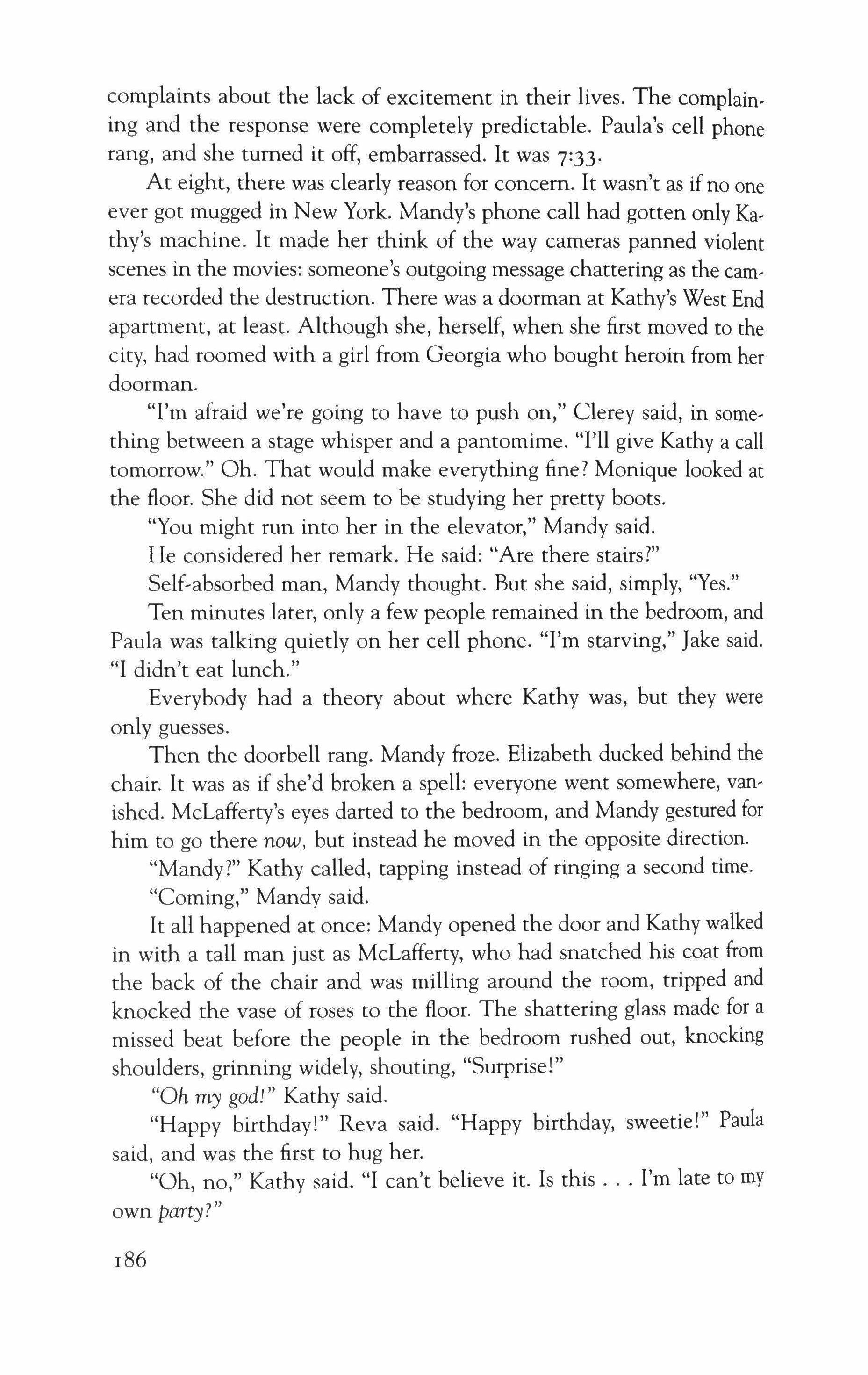
complaints about the lack of excitement in their lives. The complaining and the response were completely predictable. Paula's cell phone rang, and she turned it off, embarrassed. It was 7:33.
At eight, there was clearly reason for concern. It wasn't as if no one ever got mugged in New York. Mandy's phone call had gotten only Kathy's machine. It made her think of the way cameras panned violent scenes in the movies: someone's outgoing message chattering as the camera recorded the destruction. There was a doorman at Kathy's West End apartment, at least. Although she, herself, when she first moved to the city, had roomed with a girl from Georgia who bought heroin from her doorman.
"I'm afraid we're going to have to push on," Clerey said, in something between a stage whisper and a pantomime. "I'll give Kathy a call tomorrow." Oh. That would make everything fine? Monique looked at the floor. She did not seem to be studying her pretty boots.
"You might run into her in the elevator," Mandy said.
He considered her remark. He said: "Are there stairs?"
Self-absorbed man, Mandy thought. But she said, simply, "Yes."
Ten minutes later, only a few people remained in the bedroom, and Paula was talking quietly on her cell phone. "I'm starving," Jake said. "I didn't eat lunch."
Everybody had a theory about where Kathy was, but they were only guesses.
Then the doorbell rang. Mandy froze. Elizabeth ducked behind the chair. It was as if she'd broken a spell: everyone went somewhere, vanished. McLafferty's eyes darted to the bedroom, and Mandy gestured for him to go there now, but instead he moved in the opposite direction.
"Mandy?" Kathy called, tapping instead of ringing a second time.
"Coming," Mandy said.
It all happened at once: Mandy opened the door and Kathy walked in with a tall man just as McLafferty, who had snatched his coat from the back of the chair and was milling around the room, tripped and knocked the vase of roses to the floor. The shattering glass made for a missed beat before the people in the bedroom rushed out, knocking shoulders, grinning widely, shouting, "Surprise!"
"Oh my god!" Kathy said.
"Happy birthday!" Reva said. "Happy birthday, sweetie!" Paula said, and was the first to hug her.
"Oh, no," Kathy said. "I can't believe it. Is this I'm late to my own party?"
186
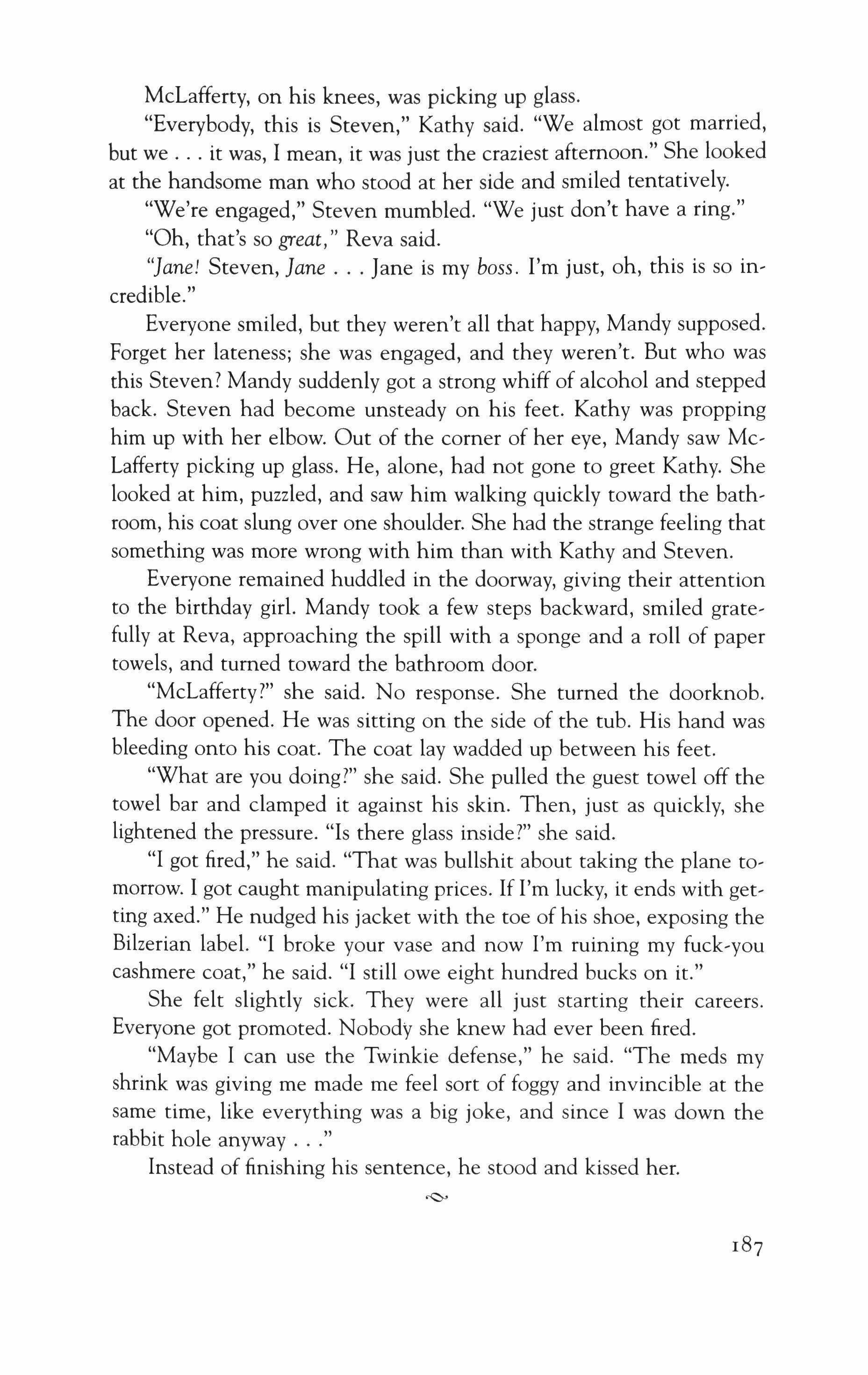
McLafferty, on his knees, was picking up glass.
"Everybody, this is Steven," Kathy said. "We almost got married, but we it was, I mean, it was just the craziest afternoon." She looked at the handsome man who stood at her side and smiled tentatively.
"We're engaged," Steven mumbled. "We just don't have a ring."
"Oh, that's so great," Reva said.
"Jane! Steven, Jane Jane is my boss. I'm just, oh, this is so incredible."
Everyone smiled, but they weren't all that happy, Mandy supposed. Forget her lateness; she was engaged, and they weren't. But who was this Steven? Mandy suddenly got a strong whiff of alcohol and stepped back. Steven had become unsteady on his feet. Kathy was propping him up with her elbow. Out of the comer of her eye, Mandy saw MeLafferty picking up glass. He, alone, had not gone to greet Kathy. She looked at him, puzzled, and saw him walking quickly toward the bathroom, his coat slung over one shoulder. She had the strange feeling that something was more wrong with him than with Kathy and Steven.
Everyone remained huddled in the doorway, giving their attention to the birthday girl. Mandy took a few steps backward, smiled gratefully at Reva, approaching the spill with a sponge and a roll of paper towels, and turned toward the bathroom door.
"McLafferty?" she said. No response. She turned the doorknob. The door opened. He was sitting on the side of the tub. His hand was bleeding onto his coat. The coat lay wadded up between his feet.
"What are you doing?" she said. She pulled the guest towel off the towel bar and clamped it against his skin. Then, just as quickly, she lightened the pressure. "Is there glass inside?" she said.
"I got fired," he said. "That was bullshit about taking the plane tomorrow. I got caught manipulating prices. If I'm lucky, it ends with getting axed." He nudged his jacket with the toe of his shoe, exposing the Bilzerian label. "I broke your vase and now I'm ruining my fuck-you cashmere coat," he said. "I still owe eight hundred bucks on it."
She felt slightly sick. They were all just starting their careers. Everyone got promoted. Nobody she knew had ever been fired.
"Maybe I can use the Twinkie defense," he said. "The meds my shrink was giving me made me feel sort of foggy and invincible at the same time, like everything was a big joke, and since I was down the rabbit hole anyway "
Instead of finishing his sentence, he stood and kissed her.
�
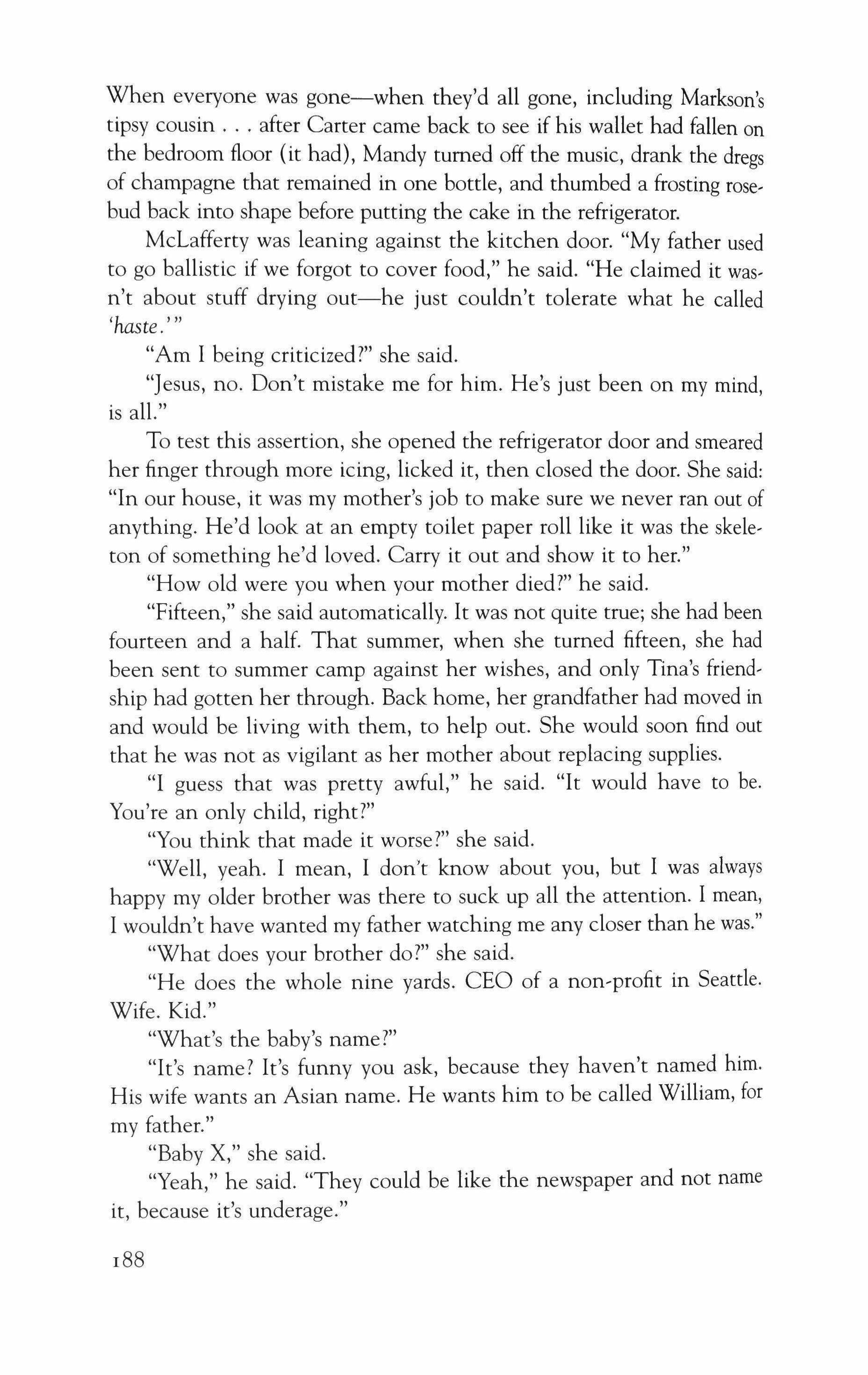
When everyone was gone-when they'd all gone, including Markson's tipsy cousin after Carter came back to see if his wallet had fallen on the bedroom floor (it had), Mandy turned off the music, drank the dregs of champagne that remained in one bottle, and thumbed a frosting rosebud back into shape before putting the cake in the refrigerator.
McLafferty was leaning against the kitchen door. "My father used to go ballistic if we forgot to cover food," he said. "He claimed it wasn't about stuff drying out-he just couldn't tolerate what he called 'haste.'"
"Am I being criticized?" she said.
"Jesus, no. Don't mistake me for him. He's just been on my mind, is all."
To test this assertion, she opened the refrigerator door and smeared her finger through more icing, licked it, then closed the door. She said: "In our house, it was my mother's job to make sure we never ran out of anything. He'd look at an empty toilet paper roll like it was the skeleton of something he'd loved. Carry it out and show it to her."
"How old were you when your mother died?" he said.
"Fifteen," she said automatically. It was not quite true; she had been fourteen and a half. That summer, when she turned fifteen, she had been sent to summer camp against her wishes, and only Tina's friendship had gotten her through. Back home, her grandfather had moved in and would be living with them, to help out. She would soon find out that he was not as vigilant as her mother about replacing supplies.
"I guess that was pretty awful," he said. "It would have to be. You're an only child, right?"
"You think that made it worse?" she said.
"Well, yeah. I mean, I don't know about you, but I was always happy my older brother was there to suck up all the attention. I mean, I wouldn't have wanted my father watching me any closer than he was."
"What does your brother do?" she said.
"He does the whole nine yards. CEO of a non-profit in Seattle. Wife. Kid."
"What's the baby's name?"
"It's name? It's funny you ask, because they haven't named him. His wife wants an Asian name. He wants him to be called William, for my father."
"Baby X," she said.
"Yeah," he said. "They could be like the newspaper and not name it, because it's underage."
188
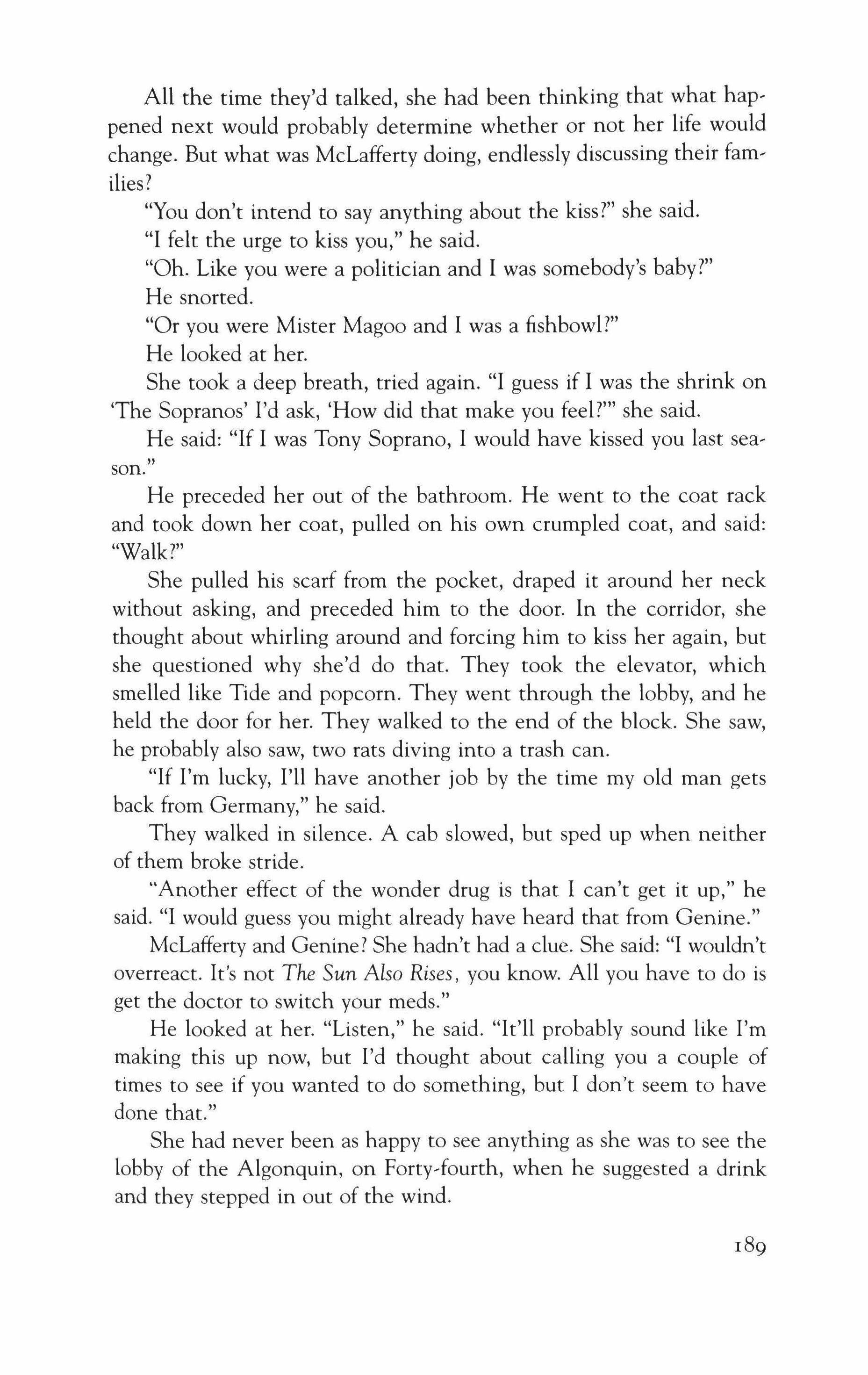
All the time they'd talked, she had been thinking that what happened next would probably determine whether or not her life would change. But what was McLafferty doing, endlessly discussing their families?
"You don't intend to say anything about the kiss?" she said.
"I felt the urge to kiss you," he said.
"Oh. Like you were a politician and I was somebody's baby?"
He snorted.
"Or you were Mister Magoo and I was a fishbowl?"
He looked at her.
She took a deep breath, tried again. "I guess if I was the shrink on 'The Sopranos' I'd ask, 'How did that make you feel?'" she said.
He said: "If I was Tony Soprano, I would have kissed you last season.
He preceded her out of the bathroom. He went to the coat rack and took down her coat, pulled on his own crumpled coat, and said: "Walk?"
She pulled his scarf from the pocket, draped it around her neck without asking, and preceded him to the door. In the corridor, she thought about whirling around and forcing him to kiss her again, but she questioned why she'd do that. They took the elevator, which smelled like Tide and popcorn. They went through the lobby, and he held the door for her. They walked to the end of the block. She saw, he probably also saw, two rats diving into a trash can.
"If I'm lucky, I'll have another job by the time my old man gets back from Germany," he said.
They walked in silence. A cab slowed, but sped up when neither of them broke stride.
"Another effect of the wonder drug is that I can't get it up," he said. "I would guess you might already have heard that from Genine."
McLafferty and Genine? She hadn't had a clue. She said: "I wouldn't overreact. It's not The Sun Also Rises, you know. All you have to do is get the doctor to switch your meds."
He looked at her. "Listen," he said. "It'll probably sound like I'm making this up now, but I'd thought about calling you a couple of times to see if you wanted to do something, but I don't seem to have done that."
She had never been as happy to see anything as she was to see the lobby of the Algonquin, on Forty-fourth, when he suggested a drink and they stepped in out of the wind.
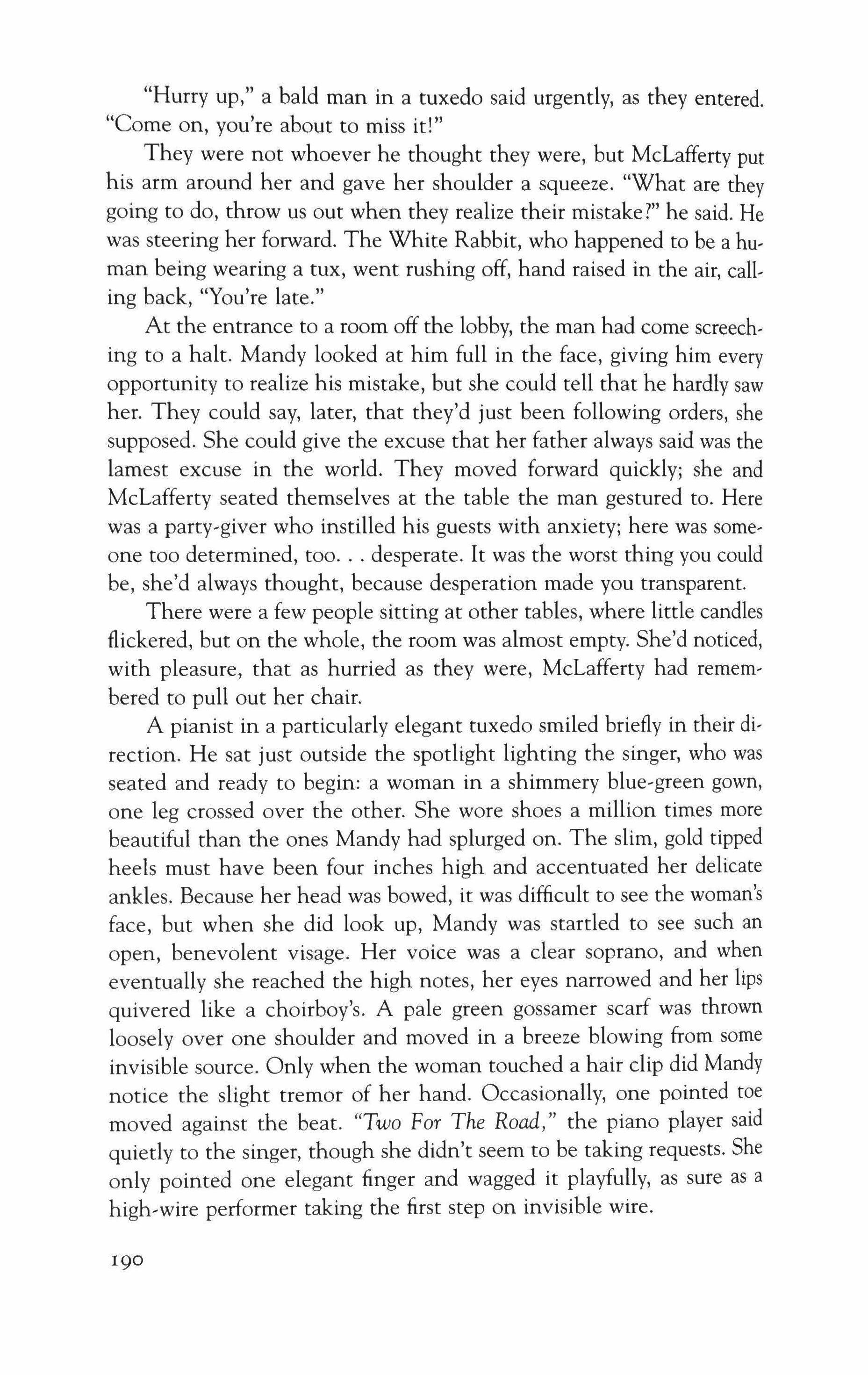
"Hurry up," a bald man in a tuxedo said urgently, as they entered. "Come on, you're about to miss it!"
They were not whoever he thought they were, but McLafferty put his arm around her and gave her shoulder a squeeze. "What are they going to do, throw us out when they realize their mistake?" he said. He was steering her forward. The White Rabbit, who happened to be a human being wearing a tux, went rushing off, hand raised in the air, calling back, "You're late."
At the entrance to a room off the lobby, the man had come screeching to a halt. Mandy looked at him full in the face, giving him every opportunity to realize his mistake, but she could tell that he hardly saw her. They could say, later, that they'd just been following orders, she supposed. She could give the excuse that her father always said was the lamest excuse in the world. They moved forward quickly; she and McLafferty seated themselves at the table the man gestured to. Here was a party-giver who instilled his guests with anxiety; here was someone too determined, too desperate. It was the worst thing you could be, she'd always thought, because desperation made you transparent.
There were a few people sitting at other tables, where little candles flickered, but on the whole, the room was almost empty. She'd noticed, with pleasure, that as hurried as they were, McLafferty had remembered to pull out her chair.
A pianist in a particularly elegant tuxedo smiled briefly in their direction. He sat just outside the spotlight lighting the singer, who was seated and ready to begin: a woman in a shimmery blue-green gown, one leg crossed over the other. She wore shoes a million times more beautiful than the ones Mandy had splurged on. The slim, gold tipped heels must have been four inches high and accentuated her delicate ankles. Because her head was bowed, it was difficult to see the woman's face, but when she did look up, Mandy was startled to see such an open, benevolent visage. Her voice was a clear soprano, and when eventually she reached the high notes, her eyes narrowed and her lips quivered like a choirboy's. A pale green gossamer scarf was thrown loosely over one shoulder and moved in a breeze blowing from some invisible source. Only when the woman touched a hair clip did Mandy notice the slight tremor of her hand. Occasionally, one pointed toe moved against the beat. "Two For The Road," the piano player said quietly to the singer, though she didn't seem to be taking requests. She only pointed one elegant finger and wagged it playfully, as sure as a high-wire performer taking the first step on invisible wire.
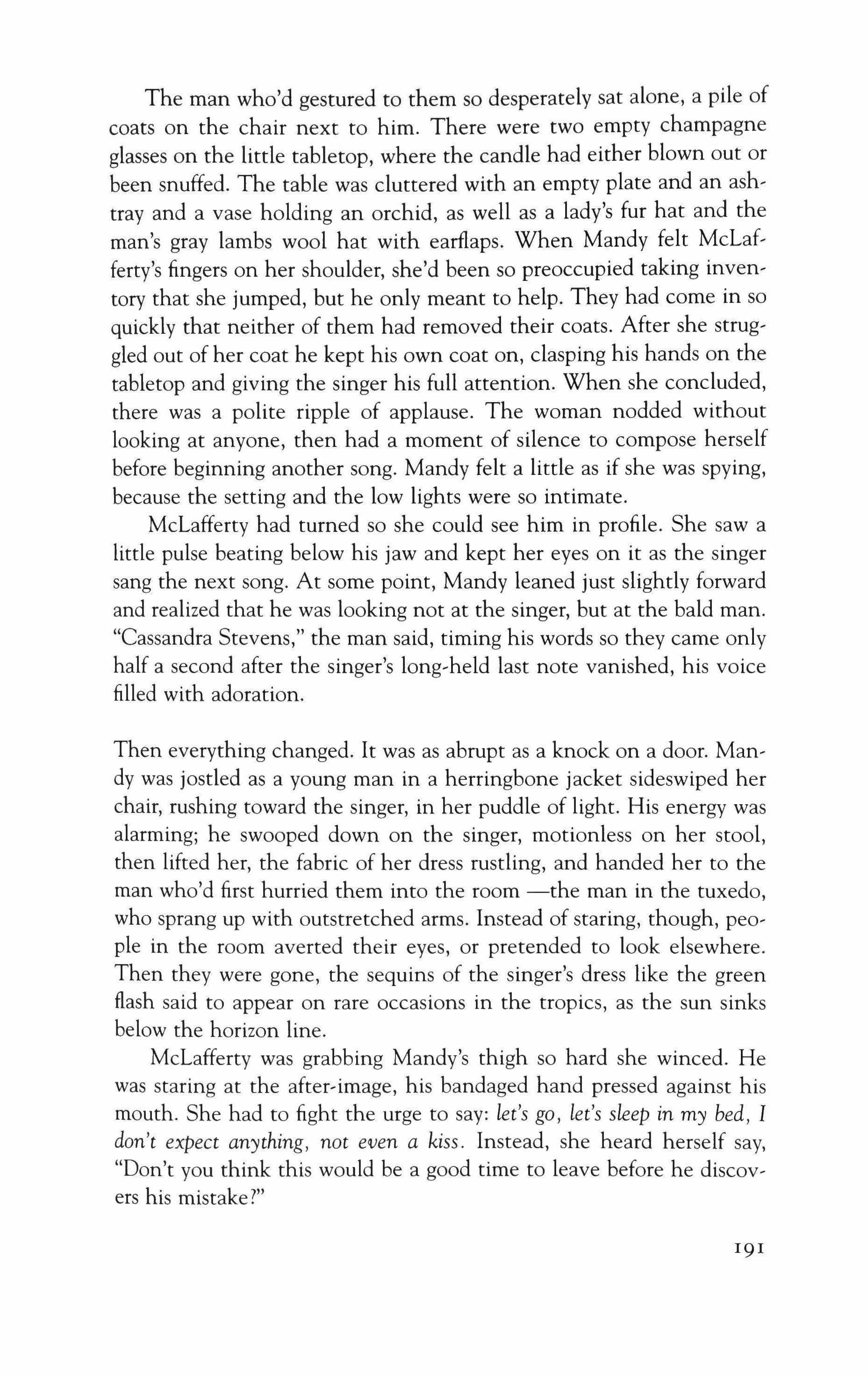
The man who'd gestured to them so desperately sat alone, a pile of coats on the chair next to him. There were two empty champagne glasses on the little tabletop, where the candle had either blown out or been snuffed. The table was cluttered with an empty plate and an ashtray and a vase holding an orchid, as well as a lady's fur hat and the man's gray lambs wool hat with earflaps. When Mandy felt Mcl.afferry's fingers on her shoulder, she'd been so preoccupied taking inventory that she jumped, but he only meant to help. They had come in so quickly that neither of them had removed their coats. After she struggled out of her coat he kept his own coat on, clasping his hands on the tabletop and giving the singer his full attention. When she concluded, there was a polite ripple of applause. The woman nodded without looking at anyone, then had a moment of silence to compose herself before beginning another song. Mandy felt a little as if she was spying, because the setting and the low lights were so intimate.
McLafferty had turned so she could see him in profile. She saw a little pulse beating below his jaw and kept her eyes on it as the singer sang the next song. At some point, Mandy leaned just slightly forward and realized that he was looking not at the singer, but at the bald man. "Cassandra Stevens," the man said, timing his words so they came only half a second after the singer's long-held last note vanished, his voice filled with adoration.
Then everything changed. It was as abrupt as a knock on a door. Mandy was jostled as a young man in a herringbone jacket sideswiped her chair, rushing toward the singer, in her puddle of light. His energy was alarming; he swooped down on the singer, motionless on her stool, then lifted her, the fabric of her dress rustling, and handed her to the man who'd first hurried them into the room -the man in the tuxedo, who sprang up with outstretched arms. Instead of staring, though, people in the room averted their eyes, or pretended to look elsewhere. Then they were gone, the sequins of the singer's dress like the green flash said to appear on rare occasions in the tropics, as the sun sinks below the horizon line.
McLafferty was grabbing Mandy's thigh so hard she winced. He was staring at the after-image, his bandaged hand pressed against his mouth. She had to fight the urge to say: let's go, let's sleep in my bed, I don't expect anything, not even a kiss. Instead, she heard herself say, "Don't you think this would be a good time to leave before he discovers his mistake?"
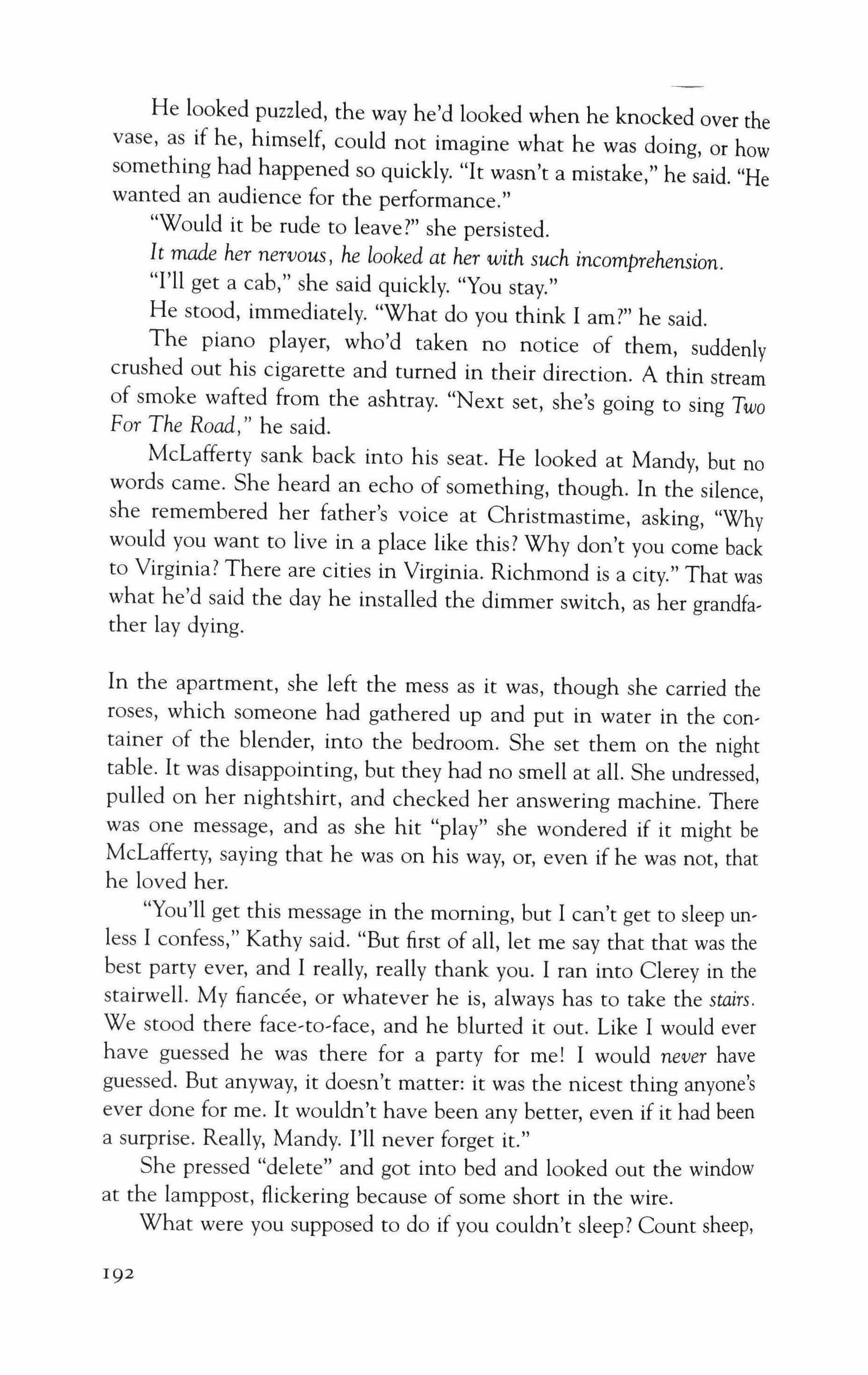
He looked puzzled, the way he'd looked when he knocked over the vase, as if he, himself, could not imagine what he was doing, or how something had happened so quickly. "It wasn't a mistake," he said. "He wanted an audience for the performance."
"Would it be rude to leave?" she persisted. It made her nervous, he looked at her with such incomprehension. "I'll get a cab," she said quickly. "You stay."
He stood, immediately. "What do you think I am?" he said.
The piano player, who'd taken no notice of them, suddenly crushed out his cigarette and turned in their direction. A thin stream of smoke wafted from the ashtray. "Next set, she's going to sing Two For The Road," he said.
McLafferty sank back into his seat. He looked at Mandy, but no words came. She heard an echo of something, though. In the silence, she remembered her father's voice at Christmastime, asking, "Why would you want to live in a place like this? Why don't you come back to Virginia? There are cities in Virginia. Richmond is a city." That was what he'd said the day he installed the dimmer switch, as her grandfa ther lay dying.
In the apartment, she left the mess as it was, though she carried the roses, which someone had gathered up and put in water in the container of the blender, into the bedroom. She set them on the night table. It was disappointing, but they had no smell at all. She undressed, pulled on her nightshirt, and checked her answering machine. There was one message, and as she hit "play" she wondered if it might be McLafferty, saying that he was on his way, or, even if he was not, that he loved her.
"You'll get this message in the morning, but I can't get to sleep unless I confess," Kathy said. "But first of all, let me say that that was the best party ever, and I really, really thank you. I ran into Clerey in the stairwell. My fiancee, or whatever he is, always has to take the stairs. We stood there face-to-face, and he blurted it out. Like I would ever have guessed he was there for a party for me! I would never have guessed. But anyway, it doesn't matter: it was the nicest thing anyone's ever done for me. It wouldn't have been any better, even if it had been a surprise. Really, Mandy. I'll never forget it."
She pressed "delete" and got into bed and looked out the window at the lamppost, flickering because of some short in the wire. What were you supposed to do if you couldn't sleep? Count sheep,
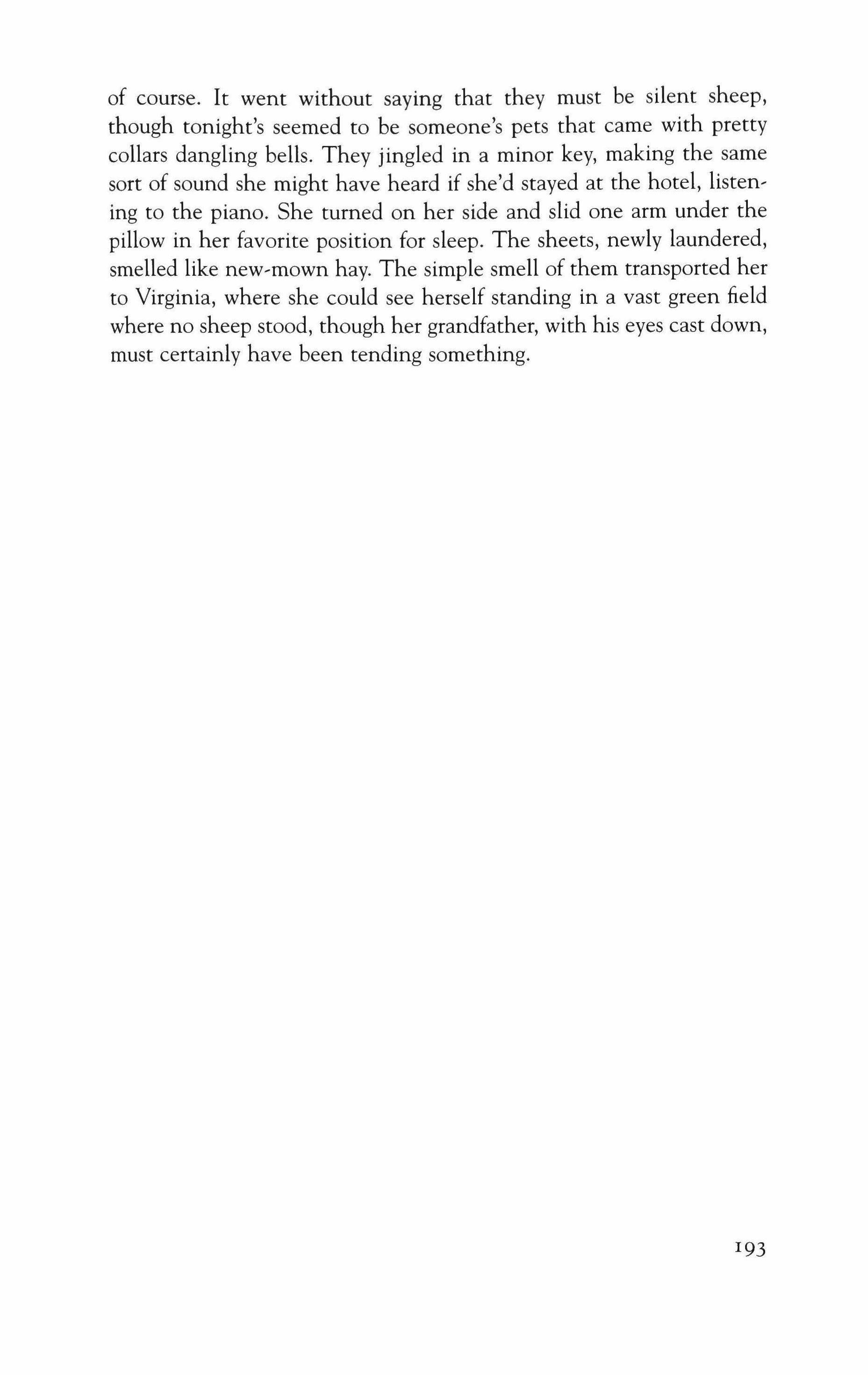
of course. It went without saying that they must be silent sheep, though tonight's seemed to be someone's pets that came with pretty collars dangling bells. They jingled in a minor key, making the same sort of sound she might have heard if she'd stayed at the hotel, listening to the piano. She turned on her side and slid one arm under the pillow in her favorite position for sleep. The sheets, newly laundered, smelled like new-mown hay. The simple smell of them transported her to Virginia, where she could see herself standing in a vast green field where no sheep stood, though her grandfather, with his eyes cast down, must certainly have been tending something.
I93
Jane Hirshfield
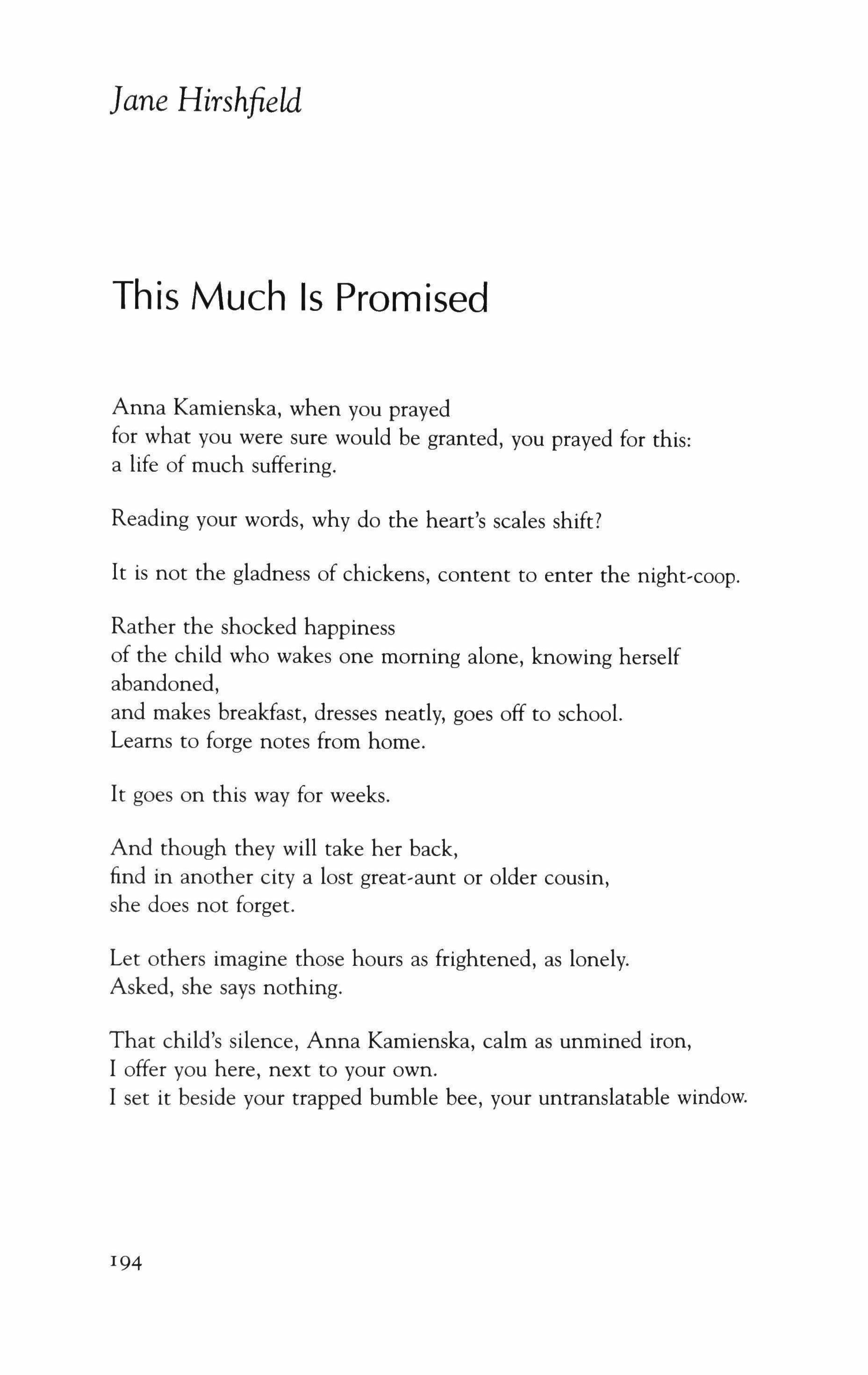
This Much Is Promised
Anna Kamienska, when you prayed for what you were sure would be granted, you prayed for this: a life of much suffering.
Reading your words, why do the heart's scales shift?
It is not the gladness of chickens, content to enter the night-coop.
Rather the shocked happiness of the child who wakes one morning alone, knowing herself abandoned, and makes breakfast, dresses neatly, goes off to school. Learns to forge notes from home.
It goes on this way for weeks.
And though they will take her back, find in another city a lost great-aunt or older cousin, she does not forget.
Let others imagine those hours as frightened, as lonely. Asked, she says nothing.
That child's silence, Anna Kamienska, calm as unmined iron, I offer you here, next to your own. I set it beside your trapped bumble bee, your untranslatable window.
194
Articulation: An Assay
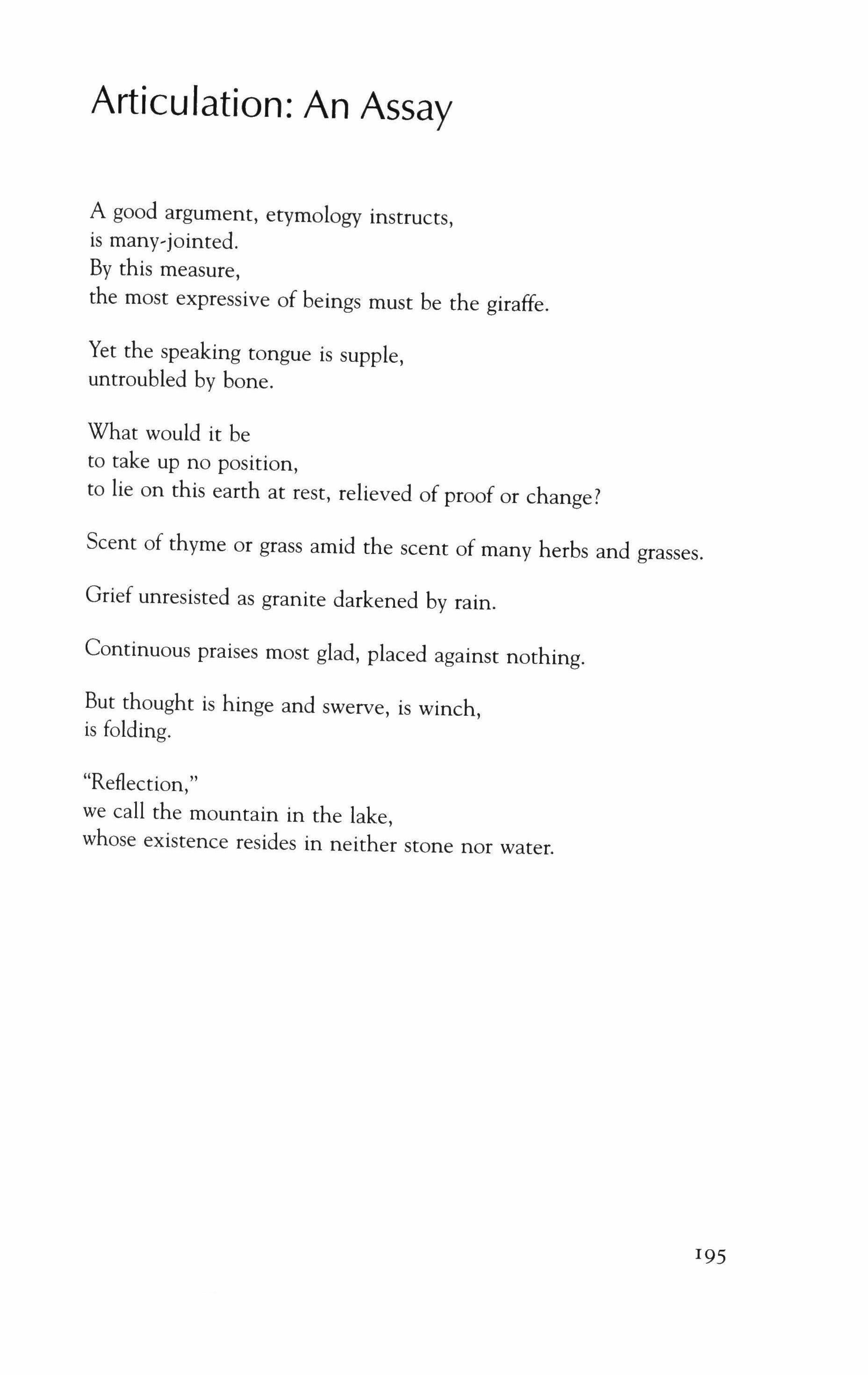
A good argument, etymology instructs, is many-jointed. By this measure, the most expressive of beings must be the giraffe.
Yet the speaking tongue is supple, untroubled by bone.
What would it be to take up no position, to lie on this earth at rest, relieved of proof or change?
Scent of thyme or grass amid the scent of many herbs and grasses.
Grief unresisted as granite darkened by rain.
Continuous praises most glad, placed against nothing.
But thought is hinge and swerve, is winch, is folding.
"Reflection,"
we call the mountain in the lake, whose existence resides in neither stone nor water.
195
Alissa Valles
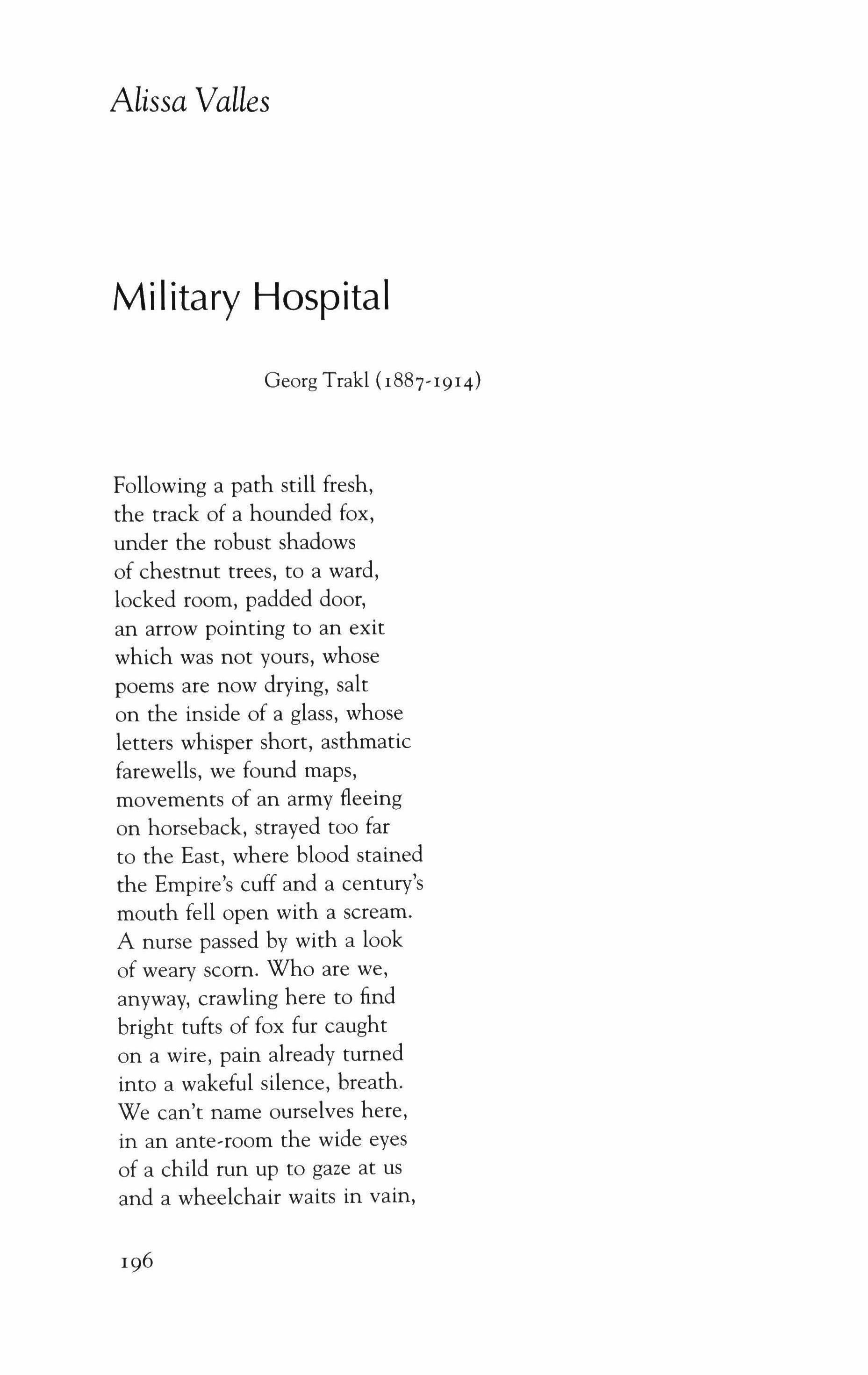
Military Hospital
Following a path still fresh, the track of a hounded fox, under the robust shadows of chestnut trees, to a ward, locked room, padded door, an arrow pointing to an exit which was not yours, whose poems are now drying, salt on the inside of a glass, whose letters whisper short, asthmatic farewells, we found maps, movements of an army fleeing on horseback, strayed too far to the East, where blood stained the Empire's cuff and a century's mouth fell open with a scream. A nurse passed by with a look of weary scorn. Who are we, anyway, crawling here to find bright tufts of fox fur caught on a wire, pain already turned into a wakeful silence, breath. We can't name ourselves here, in an ante-room the wide eyes of a child run up to gaze at us and a wheelchair waits in vain,
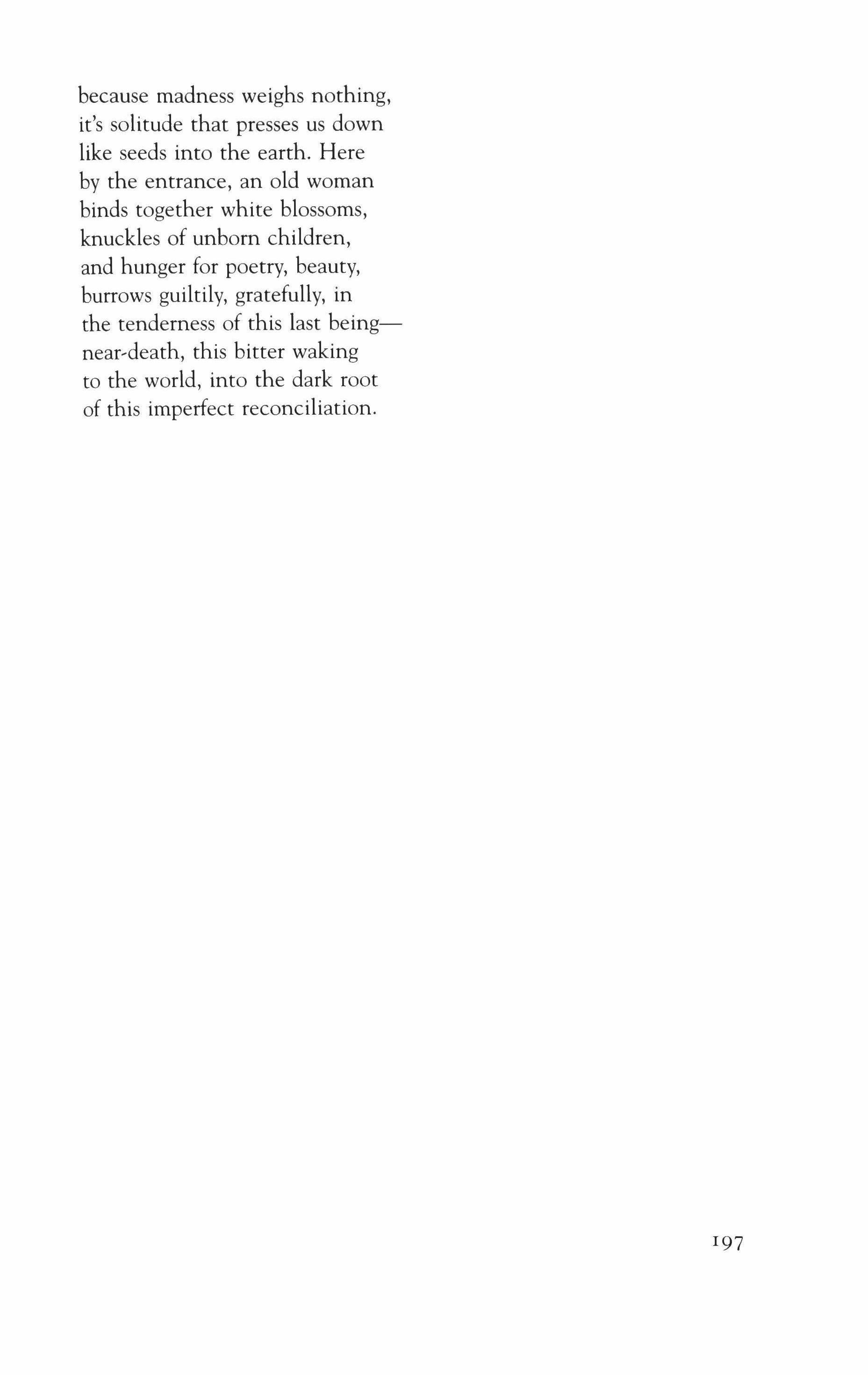
because madness weighs nothing, it's solitude that presses us down like seeds into the earth. Here by the entrance, an old woman binds together white blossoms, knuckles of unborn children, and hunger for poetry, beauty, burrows guiltily, gratefully, in the tenderness of this last beingnear-death, this bitter waking to the world, into the dark root of this imperfect reconciliation.
197
Plague House
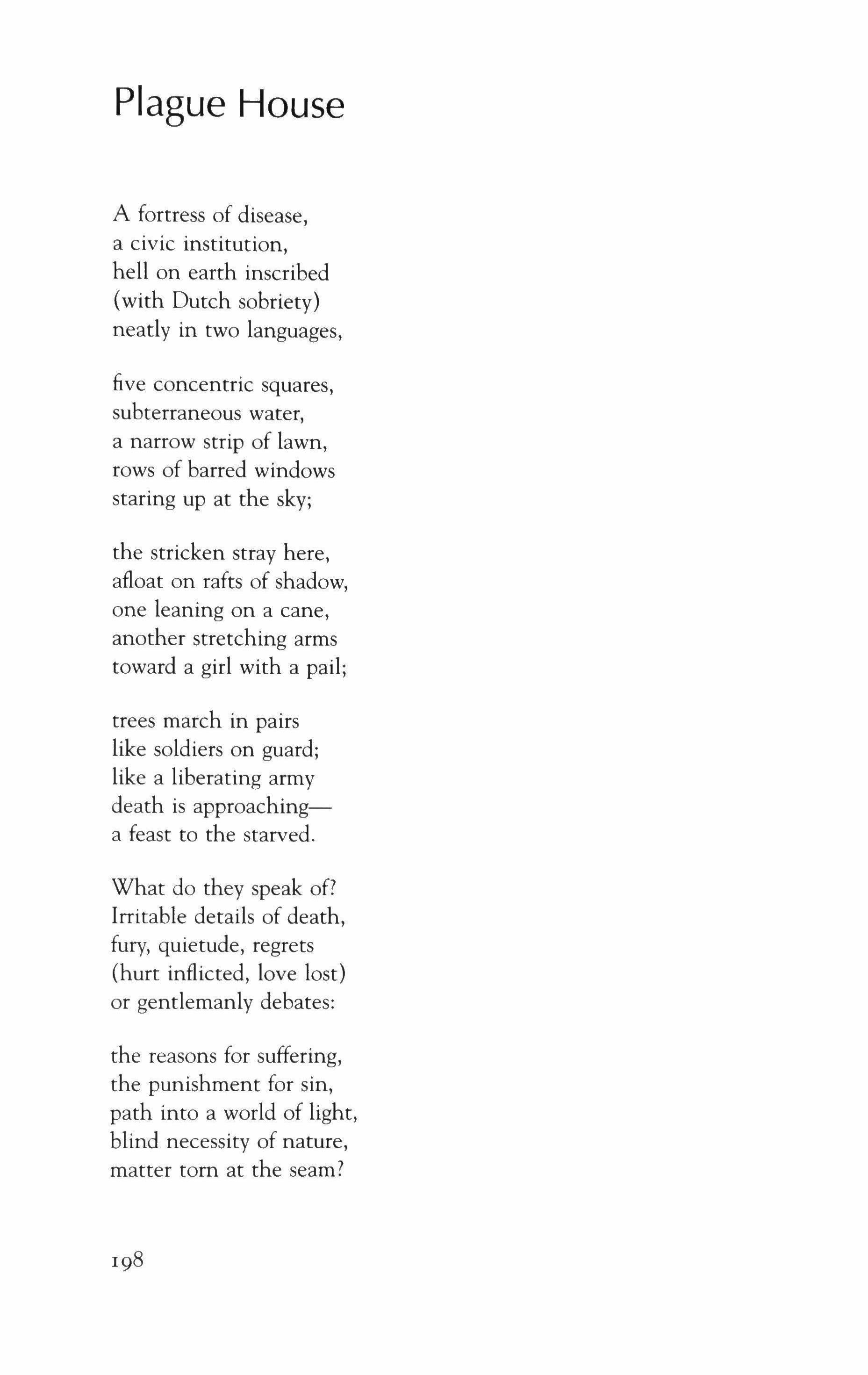
A fortress of disease, a civic institution, hell on earth inscribed (with Dutch sobriety) neatly in two languages, five concentric squares, subterraneous water, a narrow strip of lawn, rows of barred windows staring up at the sky; the stricken stray here, afloat on rafts of shadow, one leaning on a cane, another stretching arms toward a girl with a pail; trees march in pairs like soldiers on guard; like a liberating army death is approachinga feast to the starved.
What do they speak of?
Irritable details of death, fury, quietude, regrets (hurt inflicted, love lost) or gentlemanly debates: the reasons for suffering, the punishment for sin, path into a world of light, blind necessity of nature, matter tom at the seam?
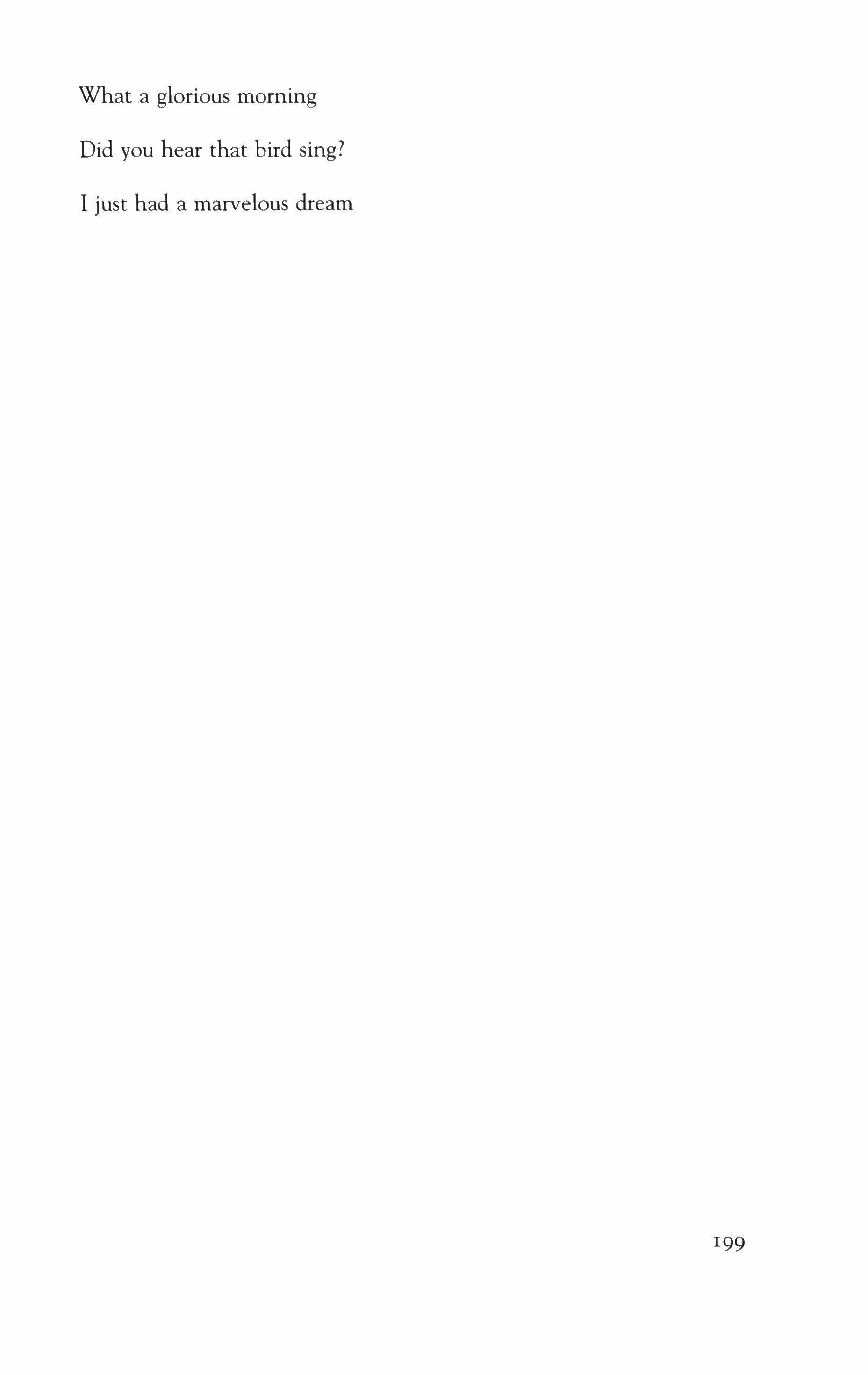
What
a glorious morning
Did you hear that bird sing?
I just had a marvelous dream
199
John Bensko
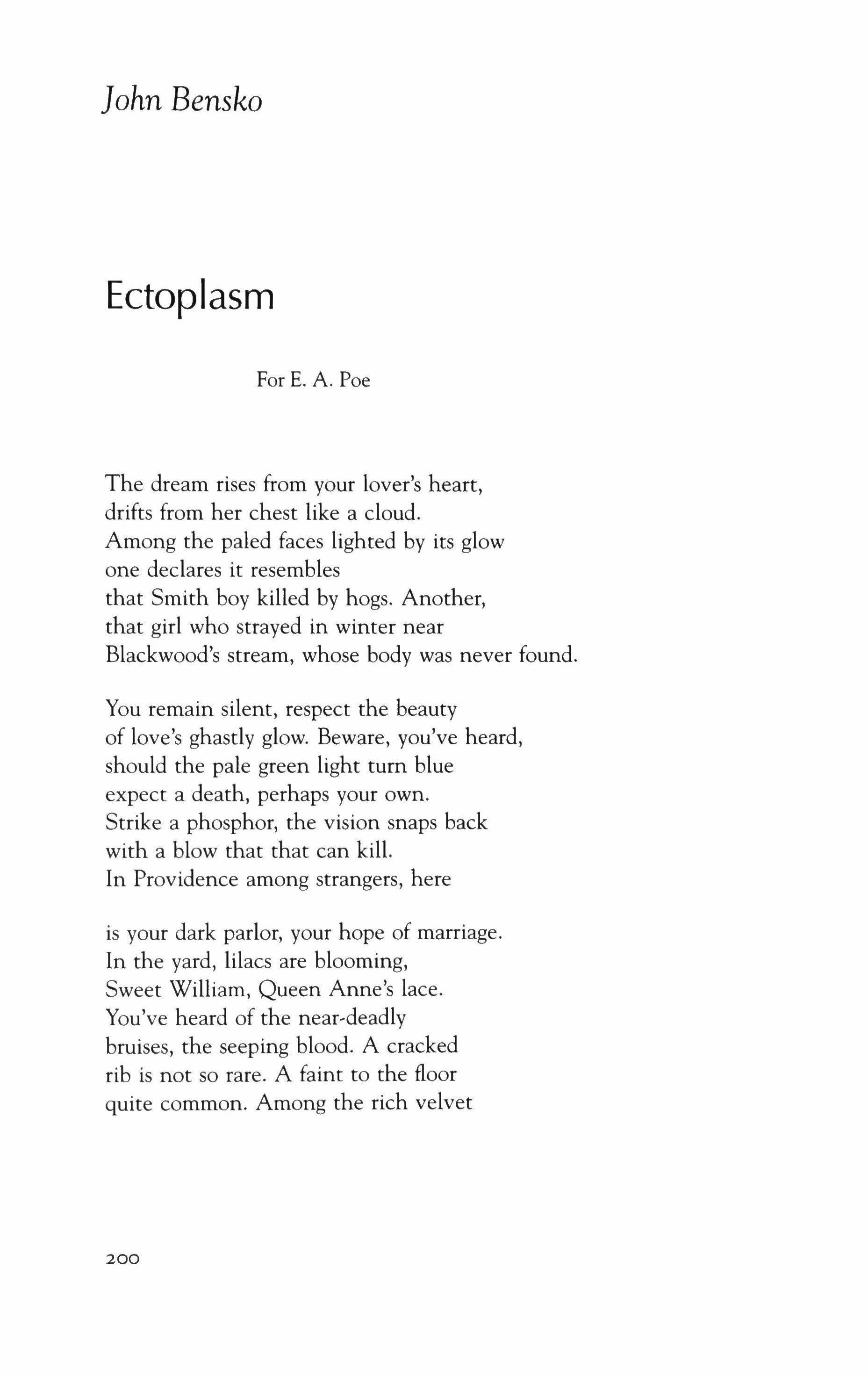
Ectoplasm
For E. A. Poe
The dream rises from your lover's heart, drifts from her chest like a cloud. Among the paled faces lighted by its glow one declares it resembles that Smith boy killed by hogs. Another, that girl who strayed in winter near Blackwood's stream, whose body was never found.
You remain silent, respect the beauty of love's ghastly glow. Beware, you've heard, should the pale green light tum blue expect a death, perhaps your own. Strike a phosphor, the vision snaps back with a blow that that can kill. In Providence among strangers, here is your dark parlor, your hope of marriage. In the yard, lilacs are blooming, Sweet William, Queen Anne's lace. You've heard of the near-deadly bruises, the seeping blood. A cracked rib is not so rare. A faint to the floor quite common. Among the rich velvet
200
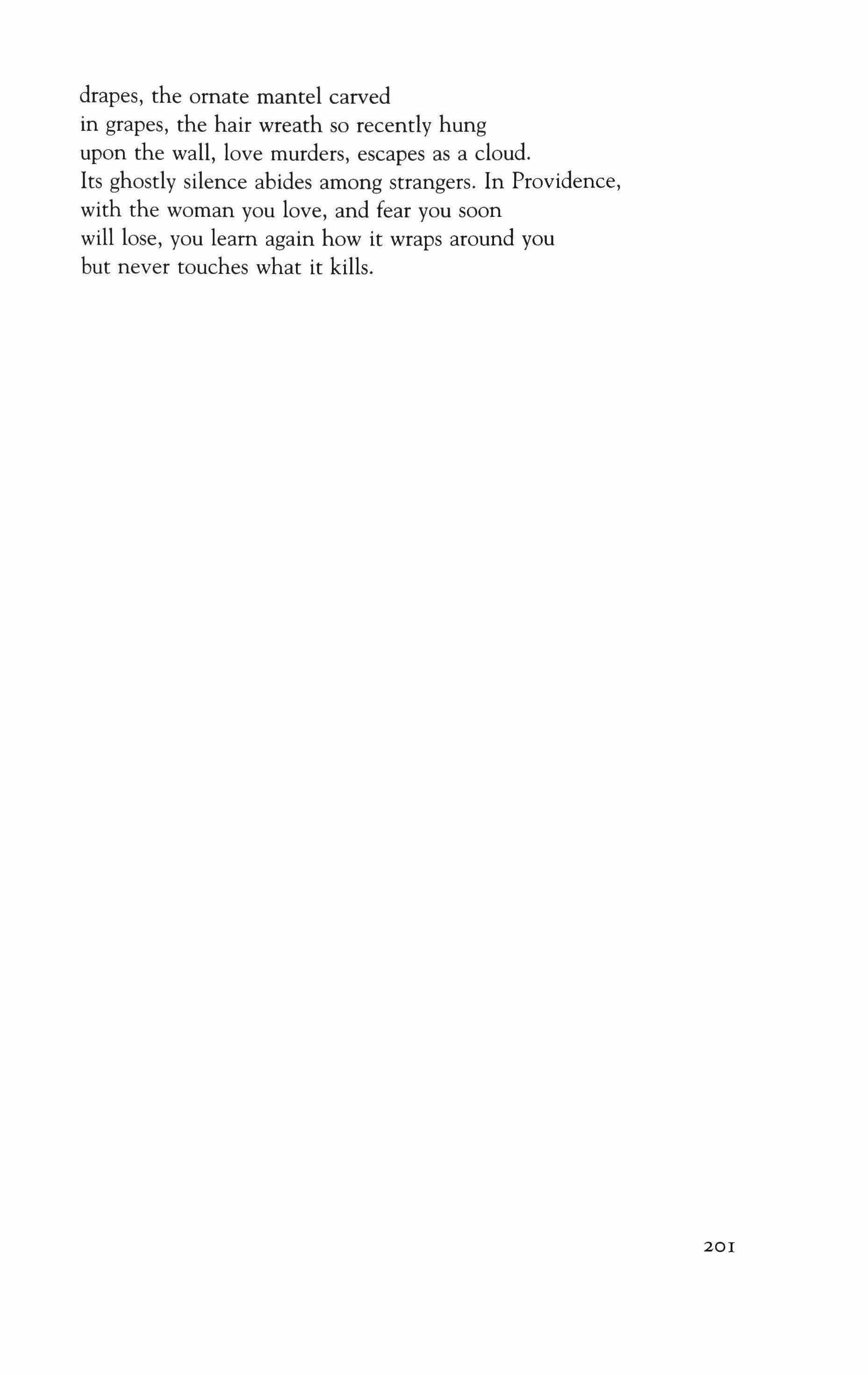
drapes, the ornate mantel carved in grapes, the hair wreath so recently hung upon the wall, love murders, escapes as a cloud. Its ghostly silence abides among strangers. In Providence, with the woman you love, and fear you soon will lose, you learn again how it wraps around you but never touches what it kills.
201
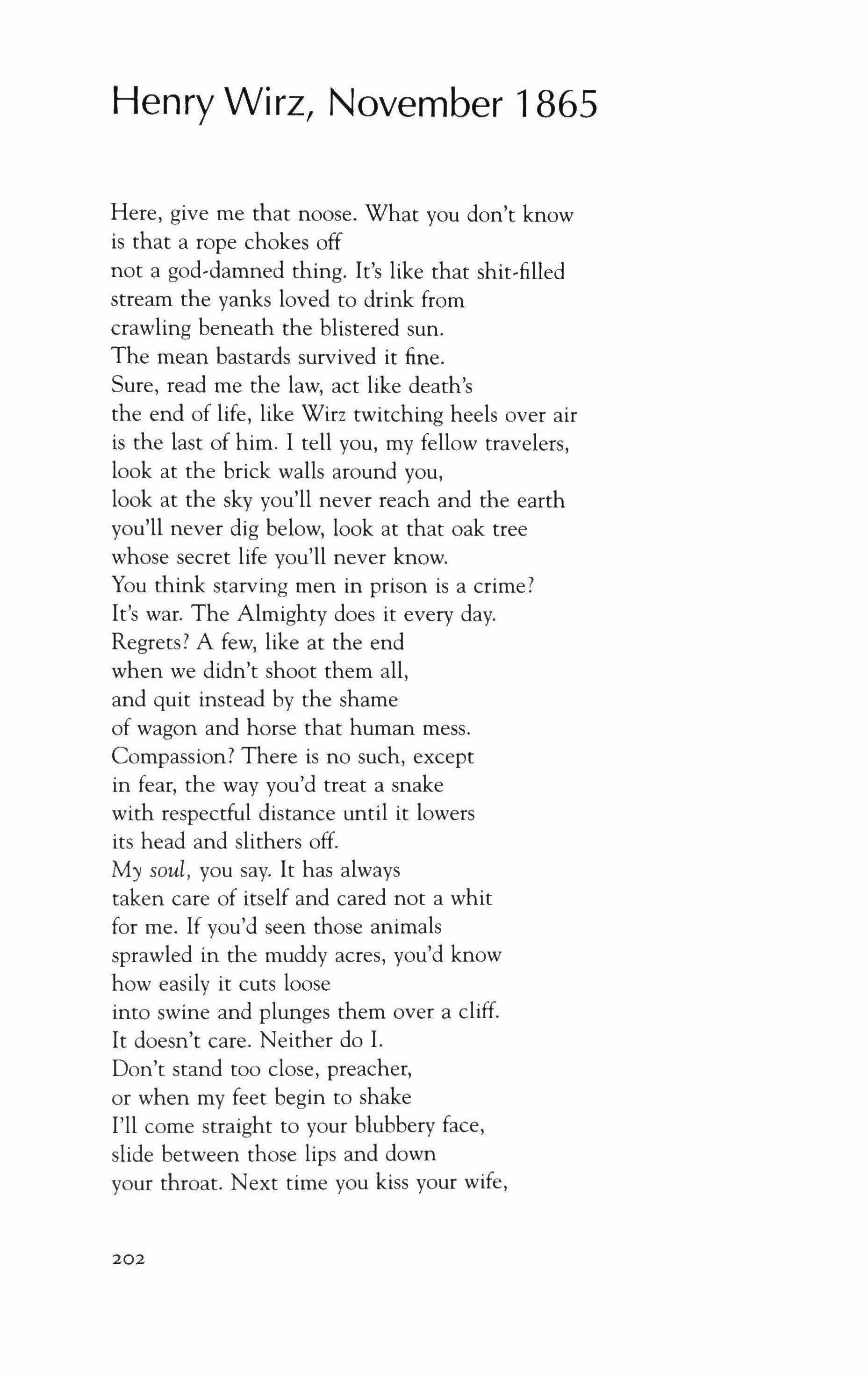
Henry
Wirz, November 1865
Here, give me that noose. What you don't know is that a rope chokes off not a god-damned thing. It's like that shit-filled stream the yanks loved to drink from crawling beneath the blistered sun. The mean bastards survived it fine. Sure, read me the law, act like death's the end of life, like Wirz twitching heels over air is the last of him. I tell you, my fellow travelers, look at the brick walls around you, look at the sky you'll never reach and the earth you'll never dig below, look at that oak tree whose secret life you'll never know. You think starving men in prison is a crime? It's war. The Almighty does it every day. Regrets? A few, like at the end when we didn't shoot them all, and quit instead by the shame of wagon and horse that human mess. Compassion? There is no such, except in fear, the way you'd treat a snake with respectful distance until it lowers its head and slithers off.
My soul, you say. It has always taken care of itself and cared not a whit for me. If you'd seen those animals sprawled in the muddy acres, you'd know how easily it cuts loose into swine and plunges them over a cliff. It doesn't care. Neither do I. Don't stand too close, preacher, or when my feet begin to shake I'll come straight to your blubbery face, slide between those lips and down your throat. Next time you kiss your wife,
202

there I'll be. Don't think a rope will finish Wirz. I've taken too many with me before to give up now.
203
Kindred Spirits
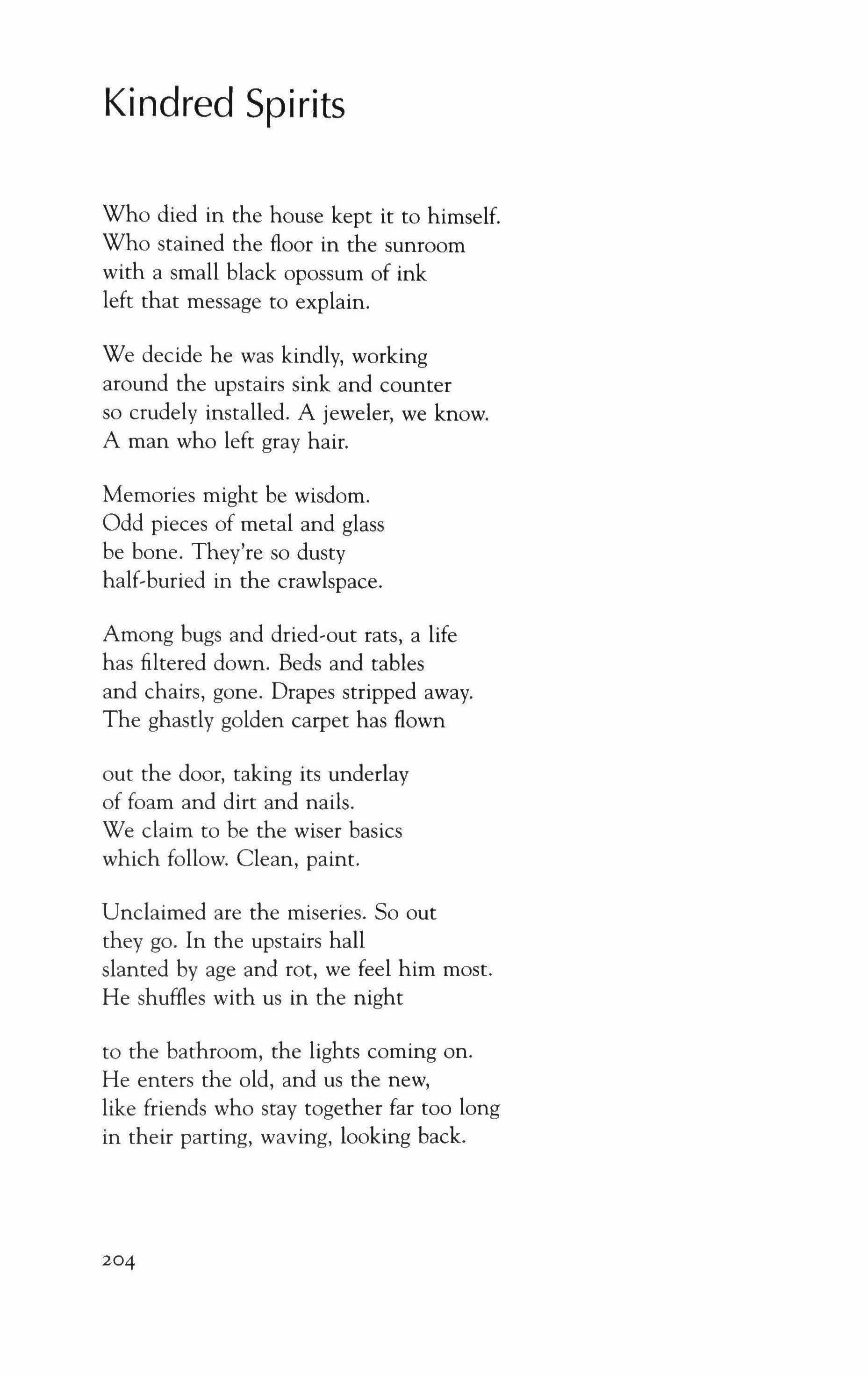
Who died in the house kept it to himself. Who stained the floor in the sunroom with a small black opossum of ink left that message to explain.
We decide he was kindly, working around the upstairs sink and counter so crudely installed. A jeweler, we know. A man who left gray hair.
Memories might be wisdom. Odd pieces of metal and glass be bone. They're so dusty half-buried in the crawlspace.
Among bugs and dried-out rats, a life has filtered down. Beds and tables and chairs, gone. Drapes stripped away. The ghastly golden carpet has flown
out the door, taking its underlay of foam and dirt and nails.
We claim to be the wiser basics which follow. Clean, paint.
Unclaimed are the miseries. So out they go. In the upstairs hall slanted by age and rot, we feel him most. He shuffles with us in the night
to the bathroom, the lights coming on. He enters the old, and us the new, like friends who stay together far too long in their parting, waving, looking back.
204
Cats under the Shed
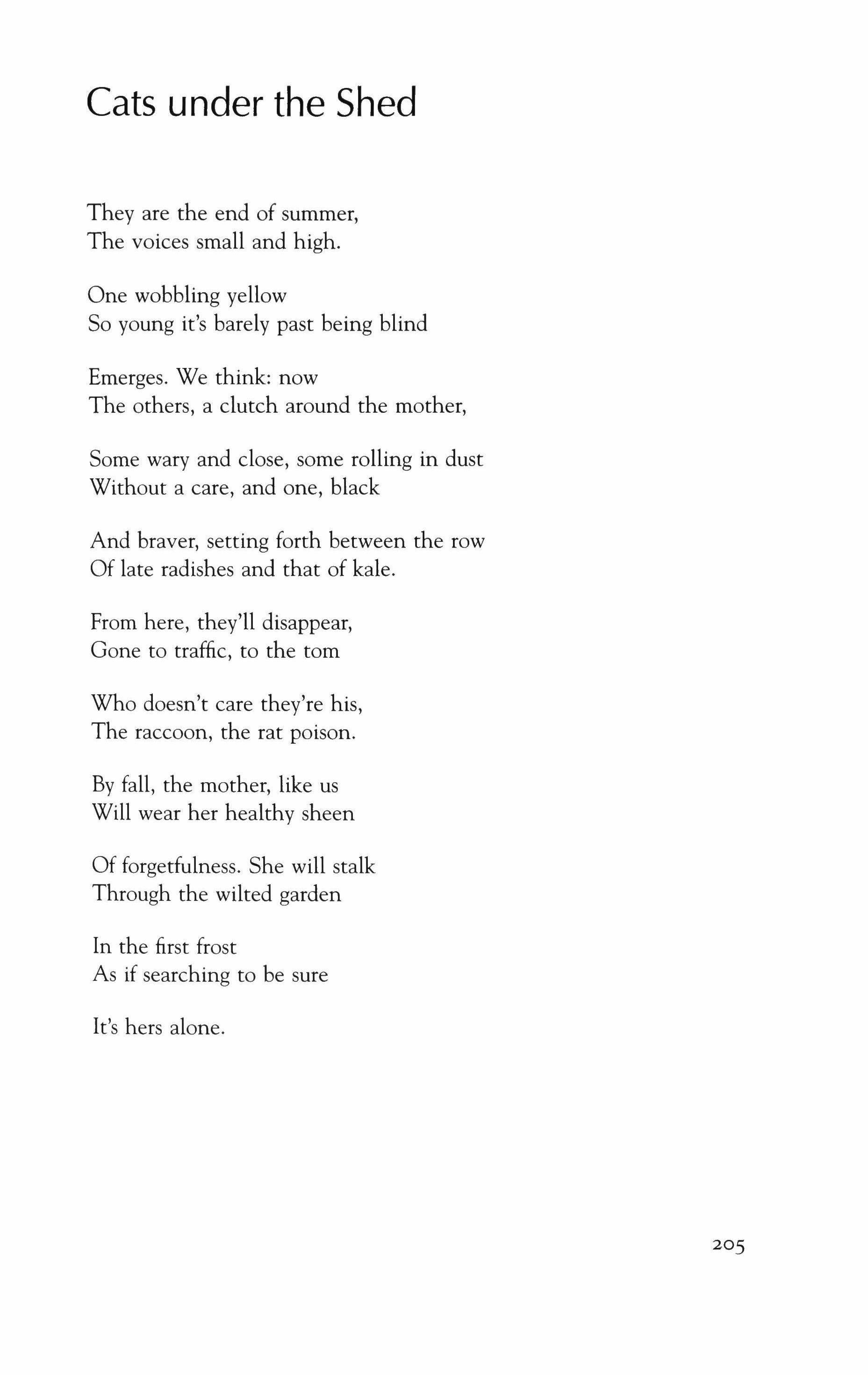
They are the end of summer, The voices small and high.
One wobbling yellow
So young it's barely past being blind
Emerges. We think: now
The others, a clutch around the mother,
Some wary and close, some rolling in dust
Without a care, and one, black
And braver, setting forth between the row Of late radishes and that of kale.
From here, they'll disappear, Gone to traffic, to the tom
Who doesn't care they're his, The raccoon, the rat poison.
By fall, the mother, like us
Will wear her healthy sheen
Of forgetfulness. She will stalk Through the wilted garden
In the first frost
As if searching to be sure
It's hers alone.
205
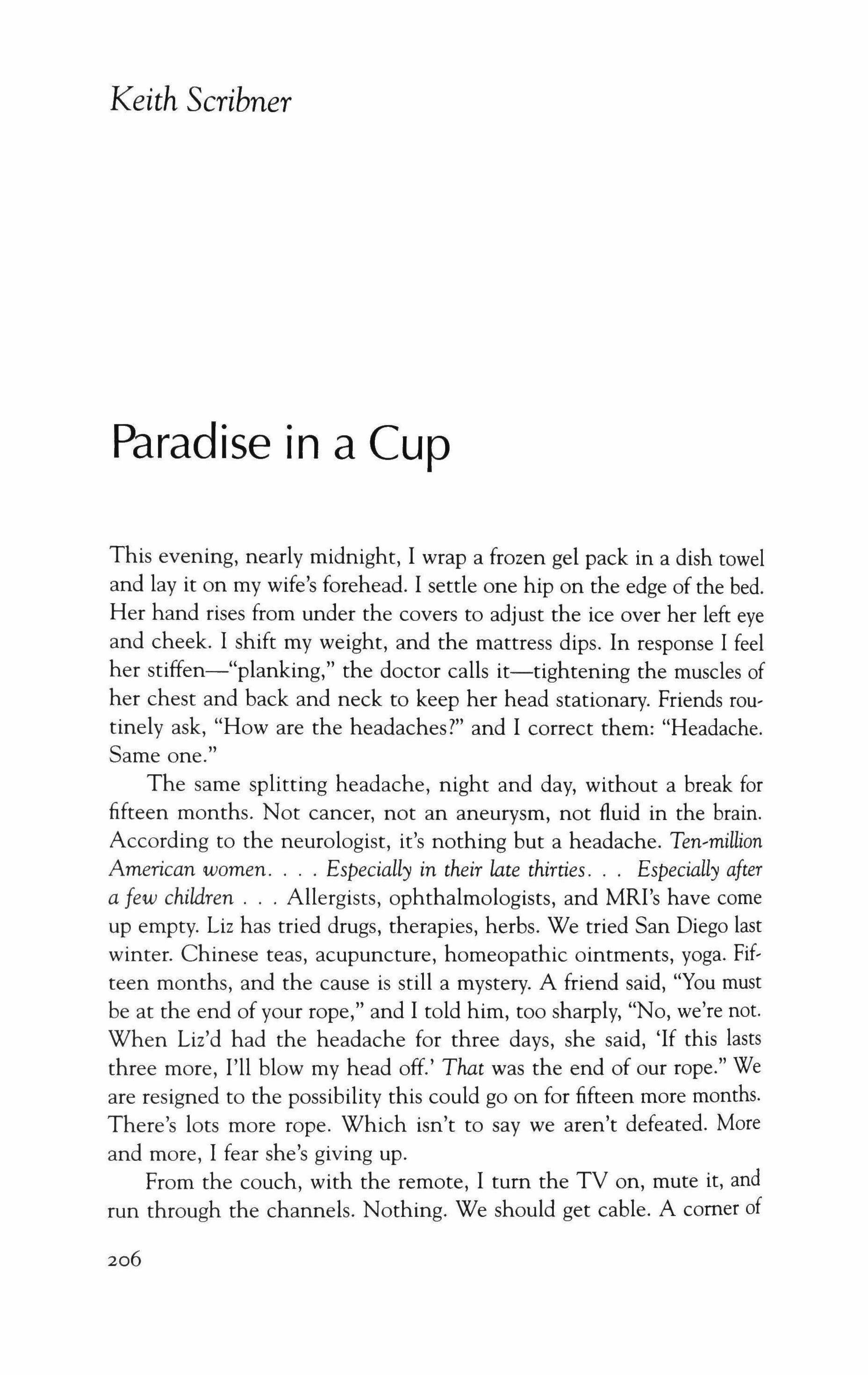
Paradise in a Cup
This evening, nearly midnight, I wrap a frozen gel pack in a dish towel and lay it on my wife's forehead. I settle one hip on the edge of the bed. Her hand rises from under the covers to adjust the ice over her left eye and cheek. I shift my weight, and the mattress dips. In response I feel her stiffen-"planking," the doctor calls it-tightening the muscles of her chest and back and neck to keep her head stationary. Friends routinely ask, "How are the headaches?" and I correct them: "Headache. Same one."
The same splitting headache, night and day, without a break for fifteen months. Not cancer, not an aneurysm, not fluid in the brain. According to the neurologist, it's nothing but a headache. Ten-million American women Especially in their late thirties. Especially after a few children Allergists, ophthalmologists, and MRI's have come up empty. Liz has tried drugs, therapies, herbs. We tried San Diego last winter. Chinese teas, acupuncture, homeopathic ointments, yoga. Fifteen months, and the cause is still a mystery. A friend said, "You must be at the end of your rope," and I told him, too sharply, "No, we're not. When Liz'd had the headache for three days, she said, 'If this lasts three more, I'll blow my head off.' That was the end of our rope." We are resigned to the possibility this could go on for fifteen more months. There's lots more rope. Which isn't to say we aren't defeated. More and more, I fear she's giving up.
From the couch, with the remote, I tum the TV on, mute it, and run through the channels. Nothing. We should get cable. A comer of
Keith Scribner
206
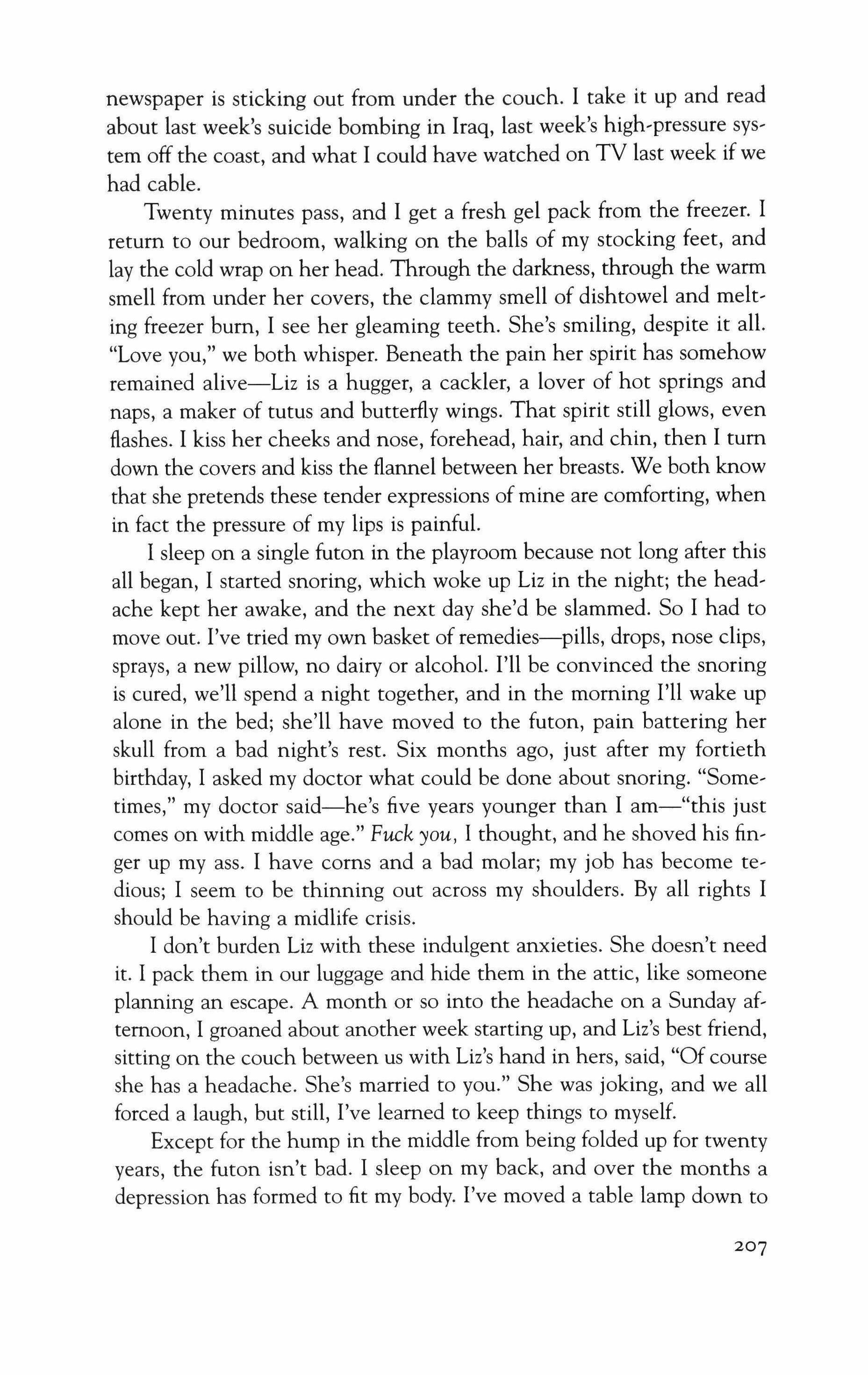
newspaper is sticking out from under the couch. I take it up and read about last week's suicide bombing in Iraq, last week's high-pressure system off the coast, and what I could have watched on TV last week if we had cable.
Twenty minutes pass, and I get a fresh gel pack from the freezer. I return to our bedroom, walking on the balls of my stocking feet, and lay the cold wrap on her head. Through the darkness, through the warm smell from under her covers, the clammy smell of dishtowel and melting freezer burn, I see her gleaming teeth. She's smiling, despite it all. "Love you," we both whisper. Beneath the pain her spirit has somehow remained alive-Liz is a hugger, a cackler, a lover of hot springs and naps, a maker of tutus and butterfly wings. That spirit still glows, even flashes. I kiss her cheeks and nose, forehead, hair, and chin, then I turn down the covers and kiss the flannel between her breasts. We both know that she pretends these tender expressions of mine are comforting, when in fact the pressure of my lips is painful.
I sleep on a single futon in the playroom because not long after this all began, I started snoring, which woke up Liz in the night; the headache kept her awake, and the next day she'd be slammed. So I had to move out. I've tried my own basket of remedies-pills, drops, nose clips, sprays, a new pillow, no dairy or alcohol. I'll be convinced the snoring is cured, we'll spend a night together, and in the morning I'll wake up alone in the bed; she'll have moved to the futon, pain battering her skull from a bad night's rest. Six months ago, just after my fortieth birthday, I asked my doctor what could be done about snoring. "Sometimes," my doctor said-he's five years younger than I am-"this just comes on with middle age." Fuck you, I thought, and he shoved his finger up my ass. I have corns and a bad molar; my job has become tedious; I seem to be thinning out across my shoulders. By all rights I should be having a midlife crisis.
I don't burden Liz with these indulgent anxieties. She doesn't need it. I pack them in our luggage and hide them in the attic, like someone planning an escape. A month or so into the headache on a Sunday afternoon, I groaned about another week starting up, and Liz's best friend, sitting on the couch between us with Liz's hand in hers, said, "Of course she has a headache. She's married to you." She was joking, and we all forced a laugh, but still, I've learned to keep things to myself.
Except for the hump in the middle from being folded up for twenty years, the futon isn't bad. I sleep on my back, and over the months a depression has formed to fit my body. I've moved a table lamp down to
207
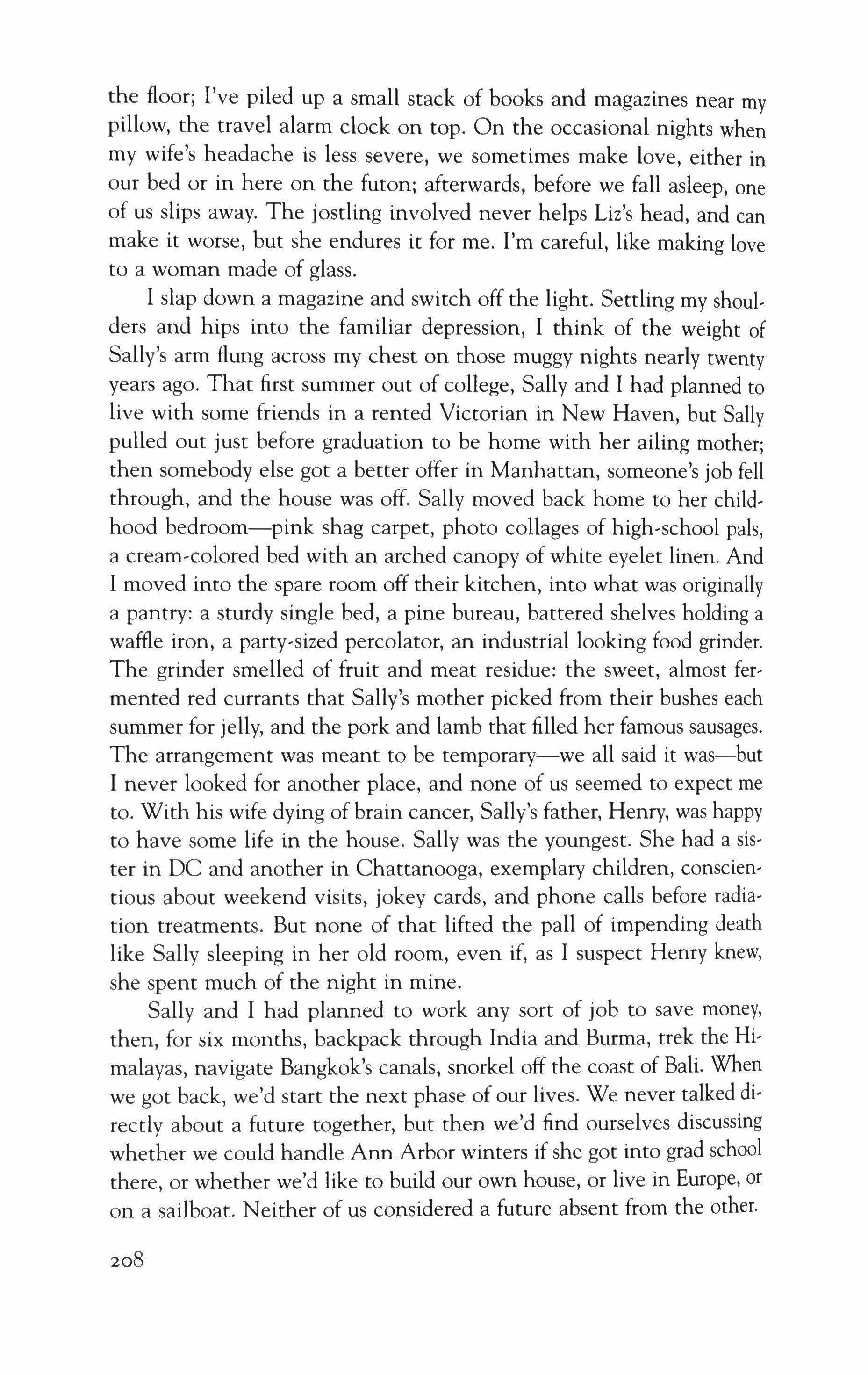
the floor; I've piled up a small stack of books and magazines near my pillow, the travel alarm clock on top. On the occasional nights when my wife's headache is less severe, we sometimes make love, either in our bed or in here on the futon; afterwards, before we fall asleep, one of us slips away. The jostling involved never helps Liz's head, and can make it worse, but she endures it for me. I'm careful, like making love to a woman made of glass.
I slap down a magazine and switch off the light. Settling my shoulders and hips into the familiar depression, I think of the weight of Sally's arm flung across my chest on those muggy nights nearly twenty years ago. That first summer out of college, Sally and I had planned to live with some friends in a rented Victorian in New Haven, but Sally pulled out just before graduation to be home with her ailing mother; then somebody else got a better offer in Manhattan, someone's job fell through, and the house was off. Sally moved back home to her childhood bedroom-pink shag carpet, photo collages of high-school pals, a cream-colored bed with an arched canopy of white eyelet linen. And I moved into the spare room off their kitchen, into what was originally a pantry: a sturdy single bed, a pine bureau, battered shelves holding a waffle iron, a party-sized percolator, an industrial looking food grinder. The grinder smelled of fruit and meat residue: the sweet, almost fermented red currants that Sally's mother picked from their bushes each summer for jelly, and the pork and lamb that filled her famous sausages. The arrangement was meant to be temporary-we all said it was-but I never looked for another place, and none of us seemed to expect me to. With his wife dying of brain cancer, Sally's father, Henry, was happy to have some life in the house. Sally was the youngest. She had a sister in DC and another in Chattanooga, exemplary children, conscientious about weekend visits, jokey cards, and phone calls before radiation treatments. But none of that lifted the pall of impending death like Sally sleeping in her old room, even if, as I suspect Henry knew, she spent much of the night in mine.
Sally and I had planned to work any sort of job to save money, then, for six months, backpack through India and Burma, trek the Himalayas, navigate Bangkok's canals, snorkel off the coast of Bali. When we got back, we'd start the next phase of our lives. We never talked directly about a future together, but then we'd find ourselves discussing whether we could handle Ann Arbor winters if she got into grad school there, or whether we'd like to build our own house, or live in Europe, or on a sailboat. Neither of us considered a future absent from the other.
208
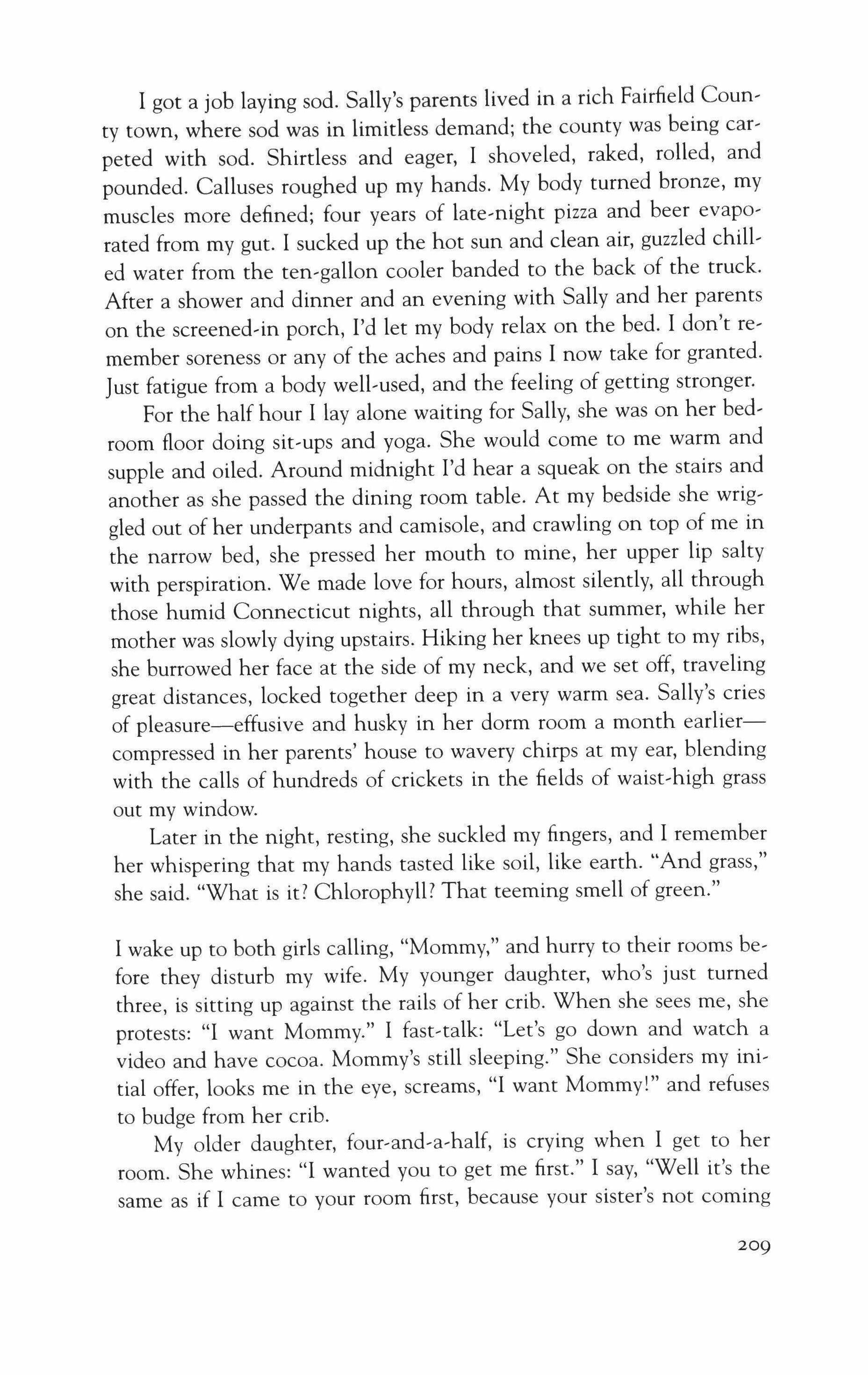
I got a job laying sod. Sally's parents lived in a rich Fairfield County town, where sod was in limitless demand; the county was being carpeted with sod. Shirtless and eager, I shoveled, raked, rolled, and pounded. Calluses roughed up my hands. My body turned bronze, my muscles more defined; four years of late-night pizza and beer evaporated from my gut. I sucked up the hot sun and clean air, guzzled chilled water from the ten-gallon cooler banded to the back of the truck. After a shower and dinner and an evening with Sally and her parents on the screened-in porch, I'd let my body relax on the bed. I don't re
member soreness or any of the aches and pains I now take for granted. Just fatigue from a body well-used, and the feeling of getting stronger.
For the half hour I lay alone waiting for Sally, she was on her bedroom floor doing sit-ups and yoga. She would come to me warm and supple and oiled. Around midnight I'd hear a squeak on the stairs and another as she passed the dining room table. At my bedside she wriggled out of her underpants and camisole, and crawling on top of me in the narrow bed, she pressed her mouth to mine, her upper lip salty with perspiration. We made love for hours, almost silently, all through those humid Connecticut nights, all through that summer, while her mother was slowly dying upstairs. Hiking her knees up tight to my ribs, she burrowed her face at the side of my neck, and we set off, traveling great distances, locked together deep in a very warm sea. Sally's cries of pleasure-effusive and husky in her dorm room a month earliercompressed in her parents' house to wavery chirps at my ear, blending with the calls of hundreds of crickets in the fields of waist-high grass out my window.
Later in the night, resting, she suckled my fingers, and I remember her whispering that my hands tasted like soil, like earth. "And grass," she said. "What is it? Chlorophyll? That teeming smell of green."
I wake up to both girls calling, "Mommy," and hurry to their rooms before they disturb my wife. My younger daughter, who's just turned three, is sitting up against the rails of her crib. When she sees me, she protests: "I want Mommy." I fast-talk: "Let's go down and watch a video and have cocoa. Mommy's still sleeping." She considers my initial offer, looks me in the eye, screams, "I want Mommy!" and refuses to budge from her crib.
My older daughter, four-and-a-half, is crying when I get to her room. She whines: "I wanted you to get me first." I say, "Well it's the same as if I came to your room first, because your sister's not coming
209
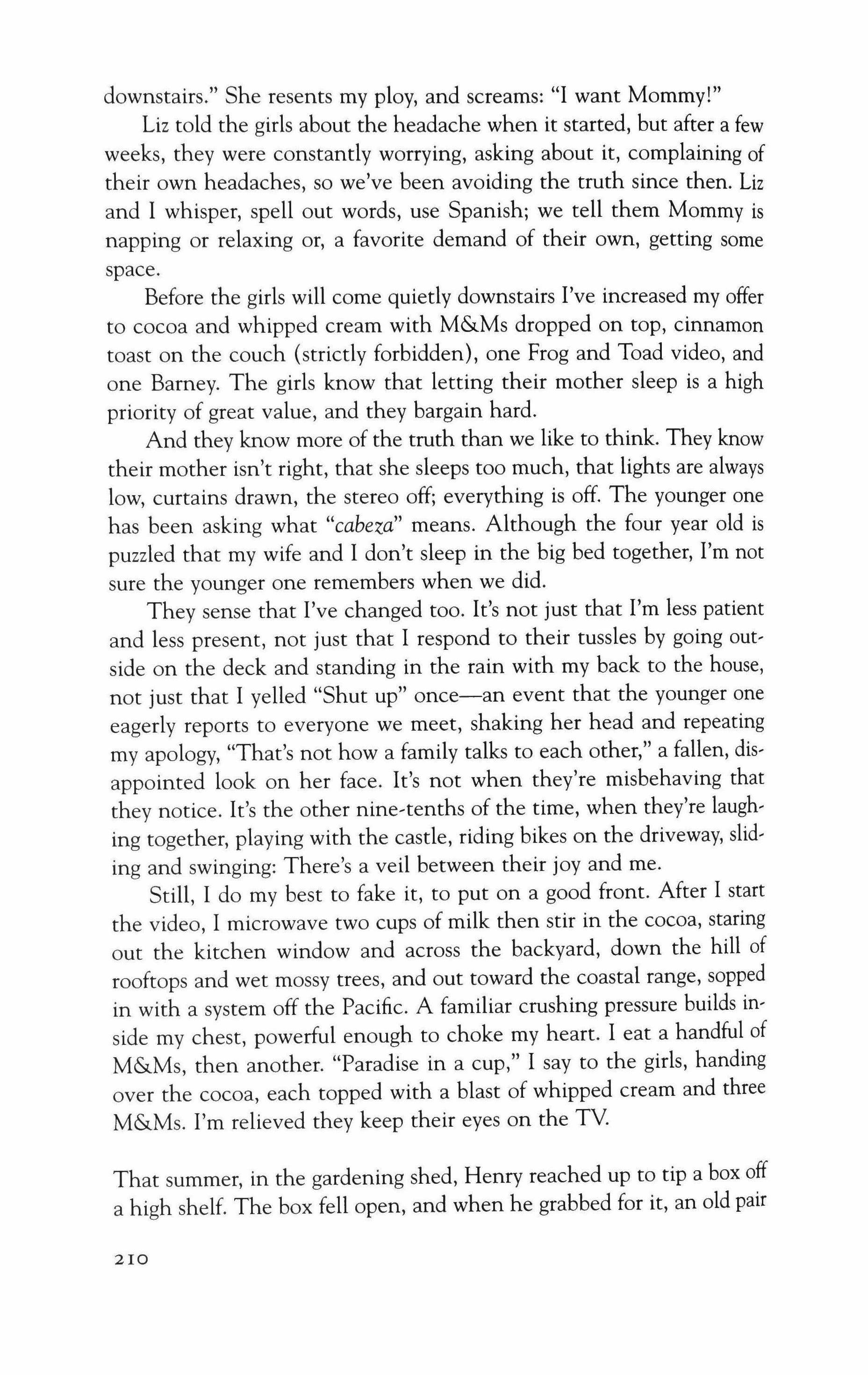
downstairs." She resents my ploy, and screams: "I want Mommy!"
Liz told the girls about the headache when it started, but after a few weeks, they were constantly worrying, asking about it, complaining of their own headaches, so we've been avoiding the truth since then. Liz and I whisper, spell out words, use Spanish; we tell them Mommy is napping or relaxing or, a favorite demand of their own, getting some space.
Before the girls will come quietly downstairs I've increased my offer to cocoa and whipped cream with M&Ms dropped on top, cinnamon toast on the couch (strictly forbidden), one Frog and Toad video, and one Barney. The girls know that letting their mother sleep is a high priority of great value, and they bargain hard.
And they know more of the truth than we like to think. They know their mother isn't right, that she sleeps too much, that lights are always low, curtains drawn, the stereo off; everything is off. The younger one has been asking what "cabeza" means. Although the four year old is puzzled that my wife and I don't sleep in the big bed together, I'm not sure the younger one remembers when we did.
They sense that I've changed too. It's not just that I'm less patient and less present, not just that I respond to their tussles by going outside on the deck and standing in the rain with my back to the house, not just that I yelled "Shut up" once-an event that the younger one eagerly reports to everyone we meet, shaking her head and repeating my apology, "That's not how a family talks to each other," a fallen, disappointed look on her face. It's not when they're misbehaving that they notice. It's the other nine-tenths of the time, when they're laughing together, playing with the castle, riding bikes on the driveway, sliding and swinging: There's a veil between their joy and me.
Still, I do my best to fake it, to put on a good front. After I start the video, I microwave two cups of milk then stir in the cocoa, staring out the kitchen window and across the backyard, down the hill of rooftops and wet mossy trees, and out toward the coastal range, sopped in with a system off the Pacific. A familiar crushing pressure builds inside my chest, powerful enough to choke my heart. I eat a handful of M&Ms, then another. "Paradise in a cup," I say to the girls, handing over the cocoa, each topped with a blast of whipped cream and three M&Ms. I'm relieved they keep their eyes on the TV.
That summer, in the gardening shed, Henry reached up to tip a box off a high shelf. The box fell open, and when he grabbed for it, an old pair
210
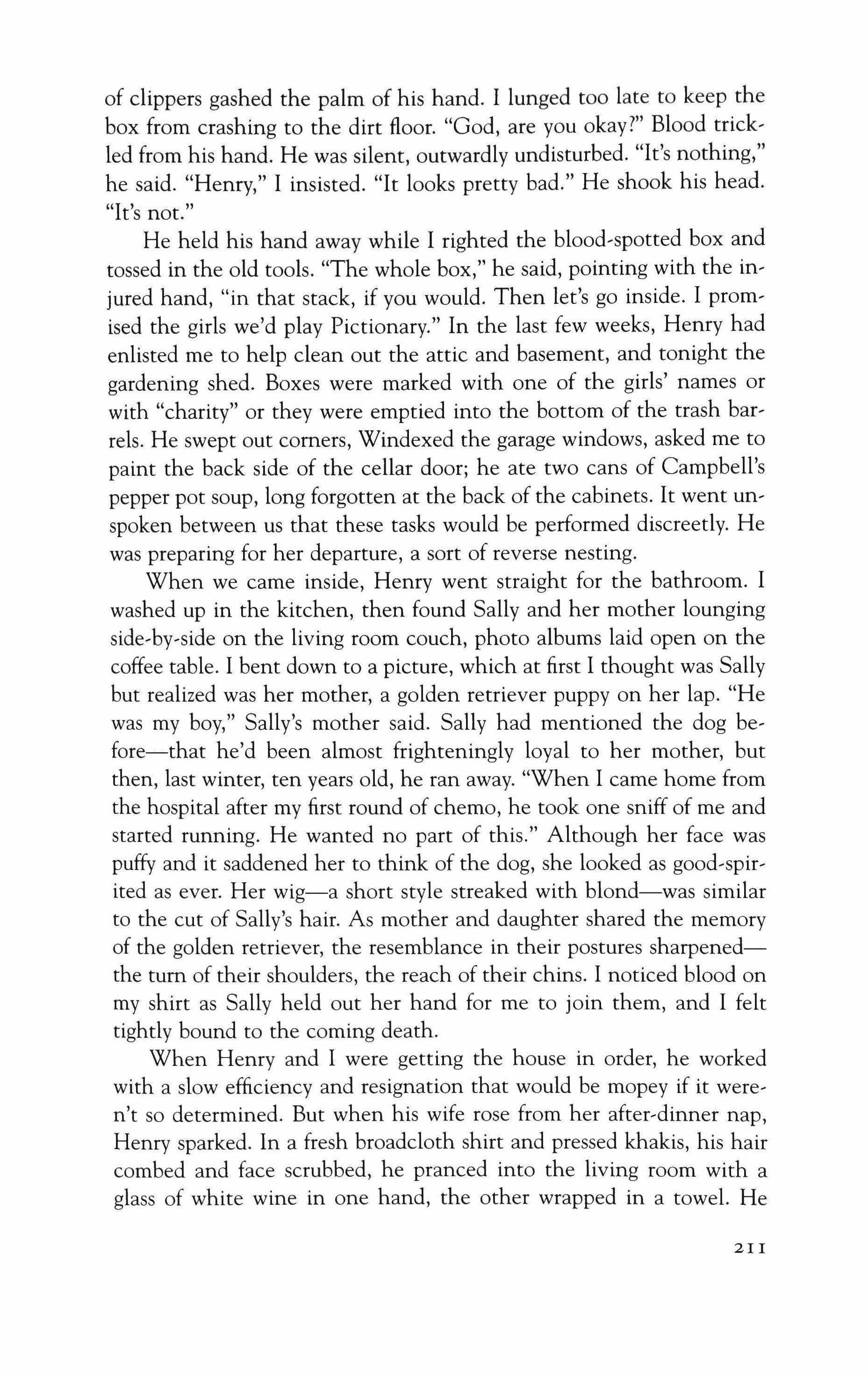
of clippers gashed the palm of his hand. I lunged too late to keep the box from crashing to the dirt floor. "God, are you okay?" Blood trickled from his hand. He was silent, outwardly undisturbed. "It's nothing," he said. "Henry," I insisted. "It looks pretty bad." He shook his head. "It's not."
He held his hand away while I righted the blood-spotted box and tossed in the old tools. "The whole box," he said, pointing with the injured hand, "in that stack, if you would. Then let's go inside. I promised the girls we'd play Pictionary." In the last few weeks, Henry had enlisted me to help clean out the attic and basement, and tonight the gardening shed. Boxes were marked with one of the girls' names or with "charity" or they were emptied into the bottom of the trash barrels. He swept out comers, Windexed the garage windows, asked me to paint the back side of the cellar door; he ate two cans of Campbell's pepper pot soup, long forgotten at the back of the cabinets. It went unspoken between us that these tasks would be performed discreetly. He was preparing for her departure, a sort of reverse nesting.
When we came inside, Henry went straight for the bathroom. I washed up in the kitchen, then found Sally and her mother lounging side-by-side on the living room couch, photo albums laid open on the coffee table. I bent down to a picture, which at first I thought was Sally but realized was her mother, a golden retriever puppy on her lap. "He was my boy," Sally's mother said. Sally had mentioned the dog before-that he'd been almost frighteningly loyal to her mother, but then, last winter, ten years old, he ran away. "When I came home from the hospital after my first round of chemo, he took one sniff of me and started running. He wanted no part of this." Although her face was puffy and it saddened her to think of the dog, she looked as good-spirited as ever. Her wig-a short style streaked with blond-was similar to the cut of Sally's hair. As mother and daughter shared the memory of the golden retriever, the resemblance in their postures sharpenedthe tum of their shoulders, the reach of their chins. I noticed blood on my shirt as Sally held out her hand for me to join them, and I felt tightly bound to the coming death.
When Henry and I were getting the house in order, he worked with a slow efficiency and resignation that would be mopey if it weren't so determined. But when his wife rose from her after-dinner nap, Henry sparked. In a fresh broadcloth shirt and pressed khakis, his hair combed and face scrubbed, he pranced into the living room with a glass of white wine in one hand, the other wrapped in a towel. He
2II
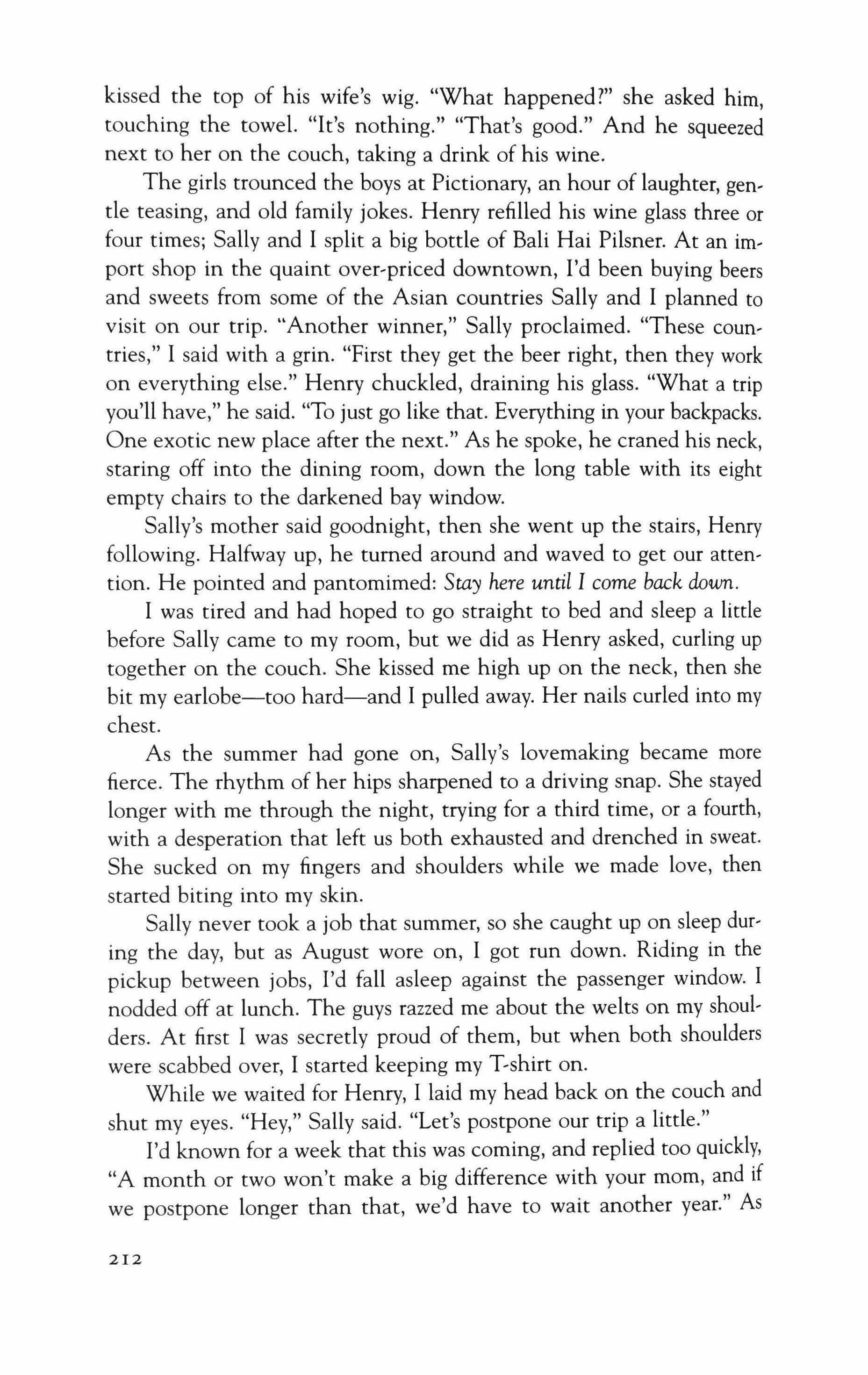
kissed the top of his wife's wig. "What happened?" she asked him, touching the towel. "It's nothing." "That's good." And he squeezed next to her on the couch, taking a drink of his wine.
The girls trounced the boys at Pictionary, an hour of laughter, gentle teasing, and old family jokes. Henry refilled his wine glass three or four times; Sally and I split a big bottle of Bali Hai Pilsner. At an import shop in the quaint over-priced downtown, I'd been buying beers and sweets from some of the Asian countries Sally and I planned to visit on our trip. "Another winner," Sally proclaimed. "These countries," I said with a grin. "First they get the beer right, then they work on everything else." Henry chuckled, draining his glass. "What a trip you'll have," he said. "To just go like that. Everything in your backpacks. One exotic new place after the next." As he spoke, he craned his neck, staring off into the dining room, down the long table with its eight empty chairs to the darkened bay window.
Sally's mother said goodnight, then she went up the stairs, Henry following. Halfway up, he turned around and waved to get our attention. He pointed and pantomimed: Stay here until I come back down.
I was tired and had hoped to go straight to bed and sleep a little before Sally came to my room, but we did as Henry asked, curling up together on the couch. She kissed me high up on the neck, then she bit my earlobe-too hard-and I pulled away. Her nails curled into my chest.
As the summer had gone on, Sally's lovemaking became more fierce. The rhythm of her hips sharpened to a driving snap. She stayed longer with me through the night, trying for a third time, or a fourth, with a desperation that left us both exhausted and drenched in sweat. She sucked on my fingers and shoulders while we made love, then started biting into my skin.
Sally never took a job that summer, so she caught up on sleep during the day, but as August wore on, I got run down. Riding in the pickup between jobs, I'd fall asleep against the passenger window. I nodded off at lunch. The guys razzed me about the welts on my shoulders. At first I was secretly proud of them, but when both shoulders were scabbed over, I started keeping my 'Tshirr on.
While we waited for Henry, I laid my head back on the couch and shut my eyes. "Hey," Sally said. "Let's postpone our trip a little."
I'd known for a week that this was coming, and replied too quickly, "A month or two won't make a big difference with your mom, and if we postpone longer than that, we'd have to wait another year." As
212
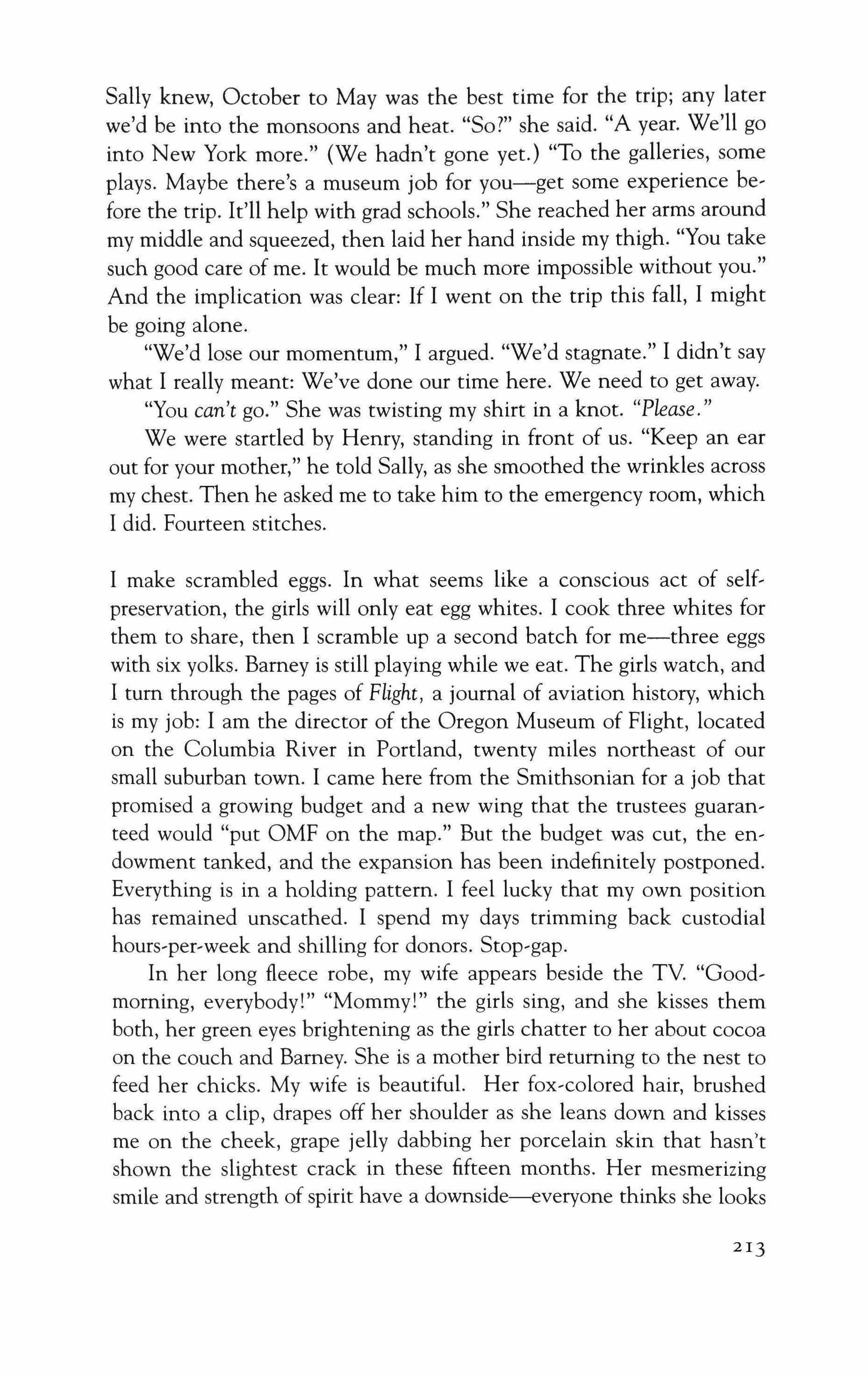
Sally knew, October to May was the best time for the trip; any later we'd be into the monsoons and heat. "So?" she said. "A year. We'll go into New York more." (We hadn't gone yet.) "To the galleries, some plays. Maybe there's a museum job for you-get some experience before the trip. It'll help with grad schools." She reached her arms around my middle and squeezed, then laid her hand inside my thigh. "You take such good care of me. It would be much more impossible without you." And the implication was clear: If I went on the trip this fall, I might be going alone.
"We'd lose our momentum," I argued. "We'd stagnate." I didn't say what I really meant: We've done our time here. We need to get away.
"You can't go." She was twisting my shirt in a knot. "Please."
We were startled by Henry, standing in front of us. "Keep an ear out for your mother," he told Sally, as she smoothed the wrinkles across my chest. Then he asked me to take him to the emergency room, which I did. Fourteen stitches.
I make scrambled eggs. In what seems like a conscious act of selfpreservation, the girls will only eat egg whites. I cook three whites for them to share, then I scramble up a second batch for me-three eggs with six yolks. Barney is still playing while we eat. The girls watch, and I tum through the pages of Flight, a journal of aviation history, which is my job: I am the director of the Oregon Museum of Flight, located on the Columbia River in Portland, twenty miles northeast of our small suburban town. I came here from the Smithsonian for a job that promised a growing budget and a new wing that the trustees guaranteed would "put OMF on the map." But the budget was cut, the endowment tanked, and the expansion has been indefinitely postponed. Everything is in a holding pattern. I feel lucky that my own position has remained unscathed. I spend my days trimming back custodial hours-per-week and shilling for donors. Stop-gap.
In her long fleece robe, my wife appears beside the TV. "Goodmorning, everybody!" "Mommy!" the girls sing, and she kisses them both, her green eyes brightening as the girls chatter to her about cocoa on the couch and Barney. She is a mother bird returning to the nest to feed her chicks. My wife is beautiful. Her fox-colored hair, brushed back into a clip, drapes off her shoulder as she leans down and kisses me on the cheek, grape jelly dabbing her porcelain skin that hasn't shown the slightest crack in these fifteen months. Her mesmerizing smile and strength of spirit have a downside-everyone thinks she looks
213
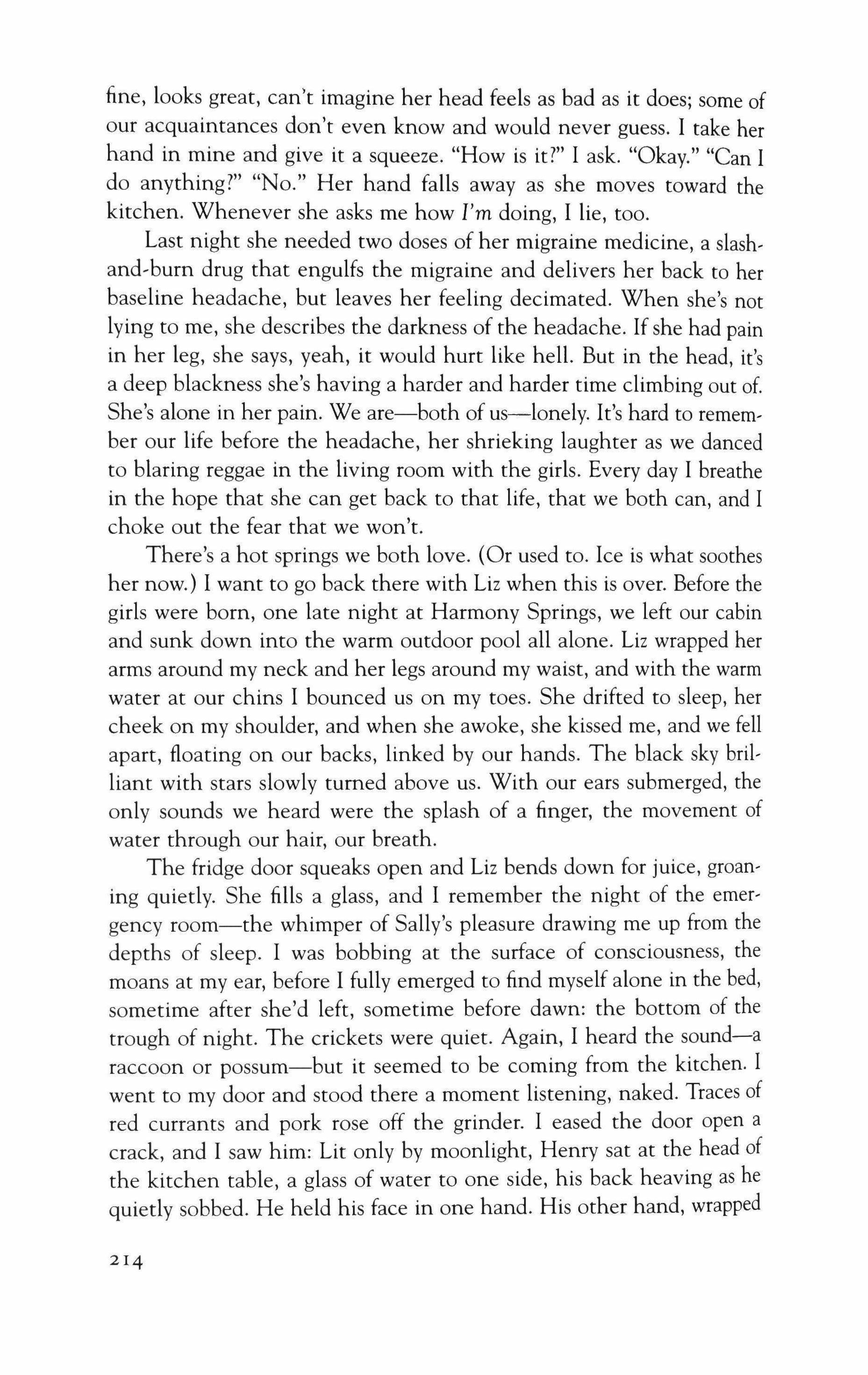
fine, looks great, can't imagine her head feels as bad as it does; some of our acquaintances don't even know and would never guess. I take her hand in mine and give it a squeeze. "How is it?" I ask. "Okay." "Can I do anything?" "No." Her hand falls away as she moves toward the kitchen. Whenever she asks me how I'm doing, I lie, too.
Last night she needed two doses of her migraine medicine, a slashand-burn drug that engulfs the migraine and delivers her back to her baseline headache, but leaves her feeling decimated. When she's not lying to me, she describes the darkness of the headache. If she had pain in her leg, she says, yeah, it would hurt like hell. But in the head, it's a deep blackness she's having a harder and harder time climbing out of. She's alone in her pain. We are-both of us-lonely. It's hard to remember our life before the headache, her shrieking laughter as we danced to blaring reggae in the living room with the girls. Every day I breathe in the hope that she can get back to that life, that we both can, and I choke out the fear that we won't.
There's a hot springs we both love. (Or used to. Ice is what soothes her now.) I want to go back there with Liz when this is over. Before the girls were born, one late night at Harmony Springs, we left our cabin and sunk down into the warm outdoor pool all alone. Liz wrapped her arms around my neck and her legs around my waist, and with the warm water at our chins I bounced us on my toes. She drifted to sleep, her cheek on my shoulder, and when she awoke, she kissed me, and we fell apart, floating on our backs, linked by our hands. The black sky brilliant with stars slowly turned above us. With our ears submerged, the only sounds we heard were the splash of a finger, the movement of water through our hair, our breath.
The fridge door squeaks open and Liz bends down for juice, groaning quietly. She fills a glass, and I remember the night of the emergency room-the whimper of Sally's pleasure drawing me up from the depths of sleep. I was bobbing at the surface of consciousness, the moans at my ear, before I fully emerged to find myself alone in the bed, sometime after she'd left, sometime before dawn: the bottom of the trough of night. The crickets were quiet. Again, I heard the sound-a raccoon or possum-but it seemed to be coming from the kitchen. I went to my door and stood there a moment listening, naked. Traces of red currants and pork rose off the grinder. I eased the door open a crack, and I saw him: Lit only by moonlight, Henry sat at the head of the kitchen table, a glass of water to one side, his back heaving as he quietly sobbed. He held his face in one hand. His other hand, wrapped
214
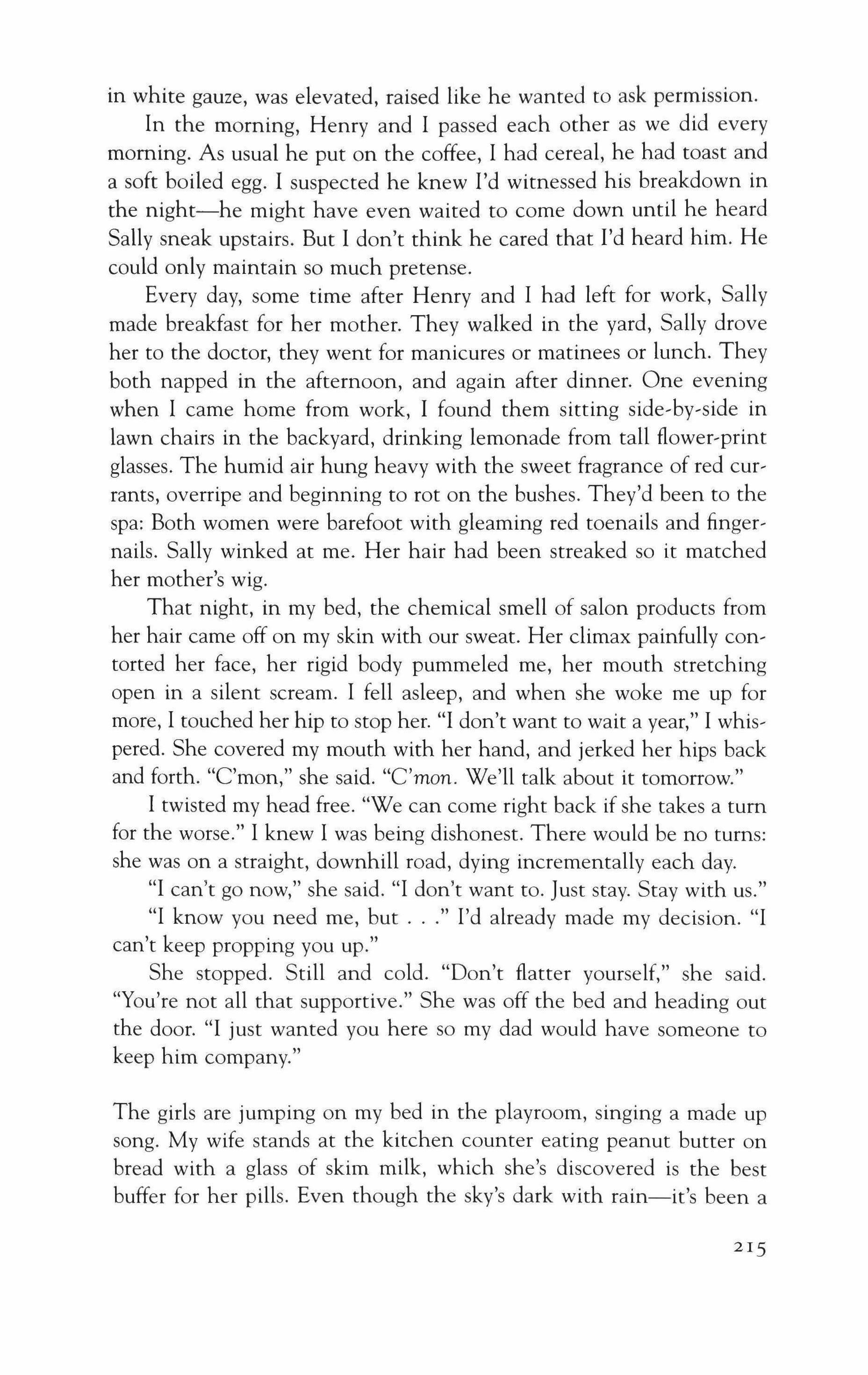
in white gauze, was elevated, raised like he wanted to ask permission.
In the morning, Henry and I passed each other as we did every morning. As usual he put on the coffee, I had cereal, he had toast and a soft boiled egg. I suspected he knew I'd witnessed his breakdown in the night-he might have even waited to come down until he heard Sally sneak upstairs. But I don't think he cared that I'd heard him. He could only maintain so much pretense.
Every day, some time after Henry and I had left for work, Sally made breakfast for her mother. They walked in the yard, Sally drove her to the doctor, they went for manicures or matinees or lunch. They both napped in the afternoon, and again after dinner. One evening when I came home from work, I found them sitting side-by-side in lawn chairs in the backyard, drinking lemonade from tall flower-print glasses. The humid air hung heavy with the sweet fragrance of red currants, overripe and beginning to rot on the bushes. They'd been to the spa: Both women were barefoot with gleaming red toenails and fingernails. Sally winked at me. Her hair had been streaked so it matched her mother's wig.
That night, in my bed, the chemical smell of salon products from her hair came off on my skin with our sweat. Her climax painfully contorted her face, her rigid body pummeled me, her mouth stretching open in a silent scream. I fell asleep, and when she woke me up for more, I touched her hip to stop her. "I don't want to wait a year," I whispered. She covered my mouth with her hand, and jerked her hips back and forth. "C'mon," she said. "C'mon. We'll talk about it tomorrow."
I twisted my head free. "We can come right back if she takes a turn for the worse." I knew I was being dishonest. There would be no turns: she was on a straight, downhill road, dying incrementally each day.
"I' "h'd "I d J S' h can t go now, s e sal. on t want to. ust stay. tay Wit us. "I know you need me, but I'd already made my decision. "I can't keep propping you up."
She stopped. Still and cold. "Don't flatter yourself," she said. "You're not all that supportive." She was off the bed and heading out the door. "I just wanted you here so my dad would have someone to keep him company."
The girls are jumping on my bed in the playroom, singing a made up song. My wife stands at the kitchen counter eating peanut butter on bread with a glass of skim milk, which she's discovered is the best buffer for her pills. Even though the sky's dark with rain-it's been a
215
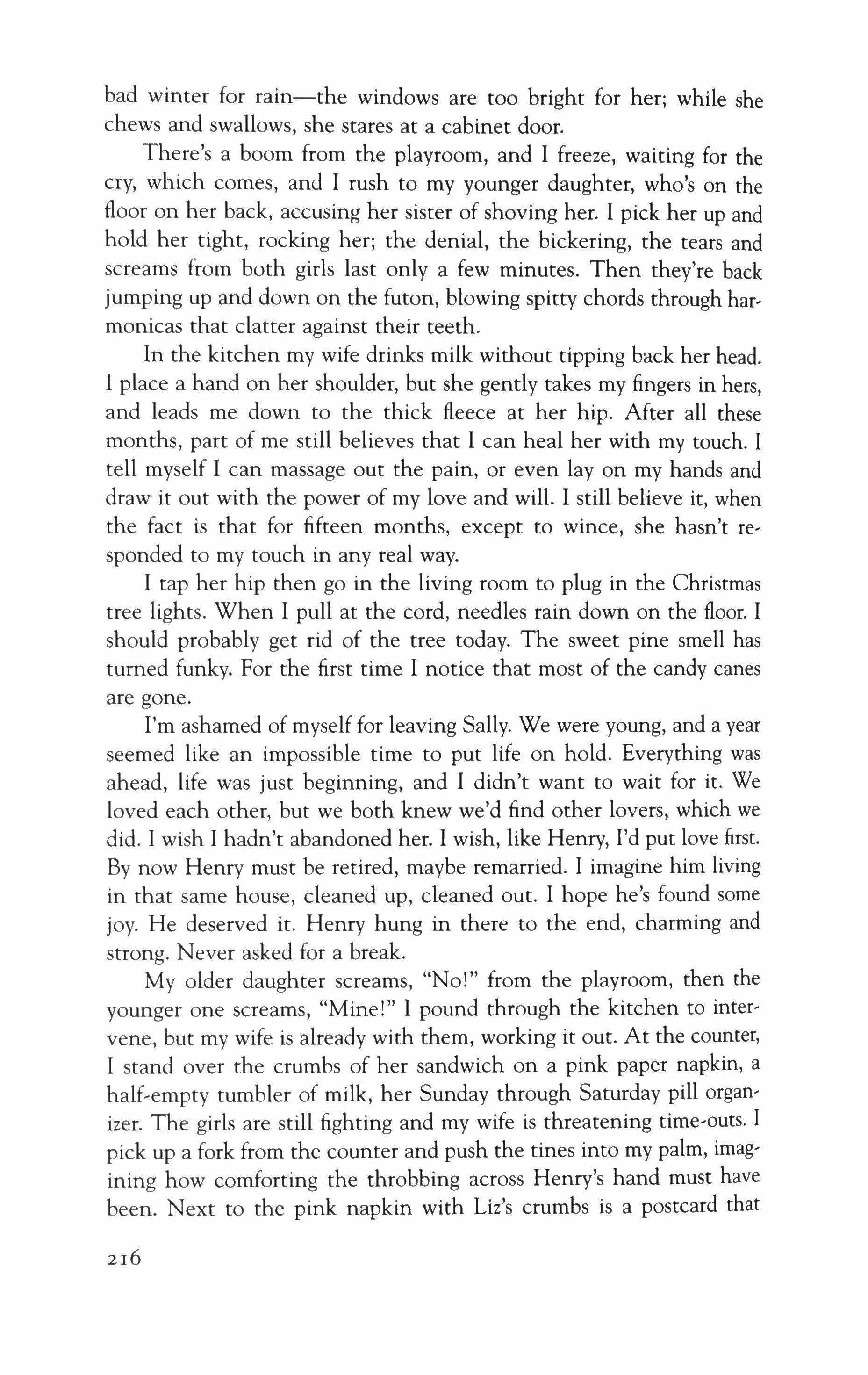
bad winter for rain-the windows are too bright for her; while she chews and swallows, she stares at a cabinet door.
There's a boom from the playroom, and I freeze, waiting for the cry, which comes, and I rush to my younger daughter, who's on the floor on her back, accusing her sister of shoving her. I pick her up and hold her tight, rocking her; the denial, the bickering, the tears and screams from both girls last only a few minutes. Then they're back jumping up and down on the futon, blowing spitty chords through harmonicas that clatter against their teeth.
In the kitchen my wife drinks milk without tipping back her head. I place a hand on her shoulder, but she gently takes my fingers in hers, and leads me down to the thick fleece at her hip. After all these months, part of me still believes that I can heal her with my touch. I tell myself I can massage out the pain, or even lay on my hands and draw it out with the power of my love and will. I still believe it, when the fact is that for fifteen months, except to wince, she hasn't responded to my touch in any real way.
I tap her hip then go in the living room to plug in the Christmas tree lights. When I pull at the cord, needles rain down on the floor. I should probably get rid of the tree today. The sweet pine smell has turned funky. For the first time I notice that most of the candy canes are gone.
I'm ashamed of myself for leaving Sally. We were young, and a year seemed like an impossible time to put life on hold. Everything was ahead, life was just beginning, and I didn't want to wait for it. We loved each other, but we both knew we'd find other lovers, which we did. I wish I hadn't abandoned her. I wish, like Henry, I'd put love first. By now Henry must be retired, maybe remarried. I imagine him living in that same house, cleaned up, cleaned out. I hope he's found some joy. He deserved it. Henry hung in there to the end, charming and strong. Never asked for a break.
My older daughter screams, "No!" from the playroom, then the younger one screams, "Mine!" I pound through the kitchen to intervene, but my wife is already with them, working it out. At the counter, I stand over the crumbs of her sandwich on a pink paper napkin, a half-empty tumbler of milk, her Sunday through Saturday pill organizer. The girls are still fighting and my wife is threatening time-outs. I pick up a fork from the counter and push the tines into my palm, imagining how comforting the throbbing across Henry's hand must have been. Next to the pink napkin with Liz's crumbs is a postcard that
216
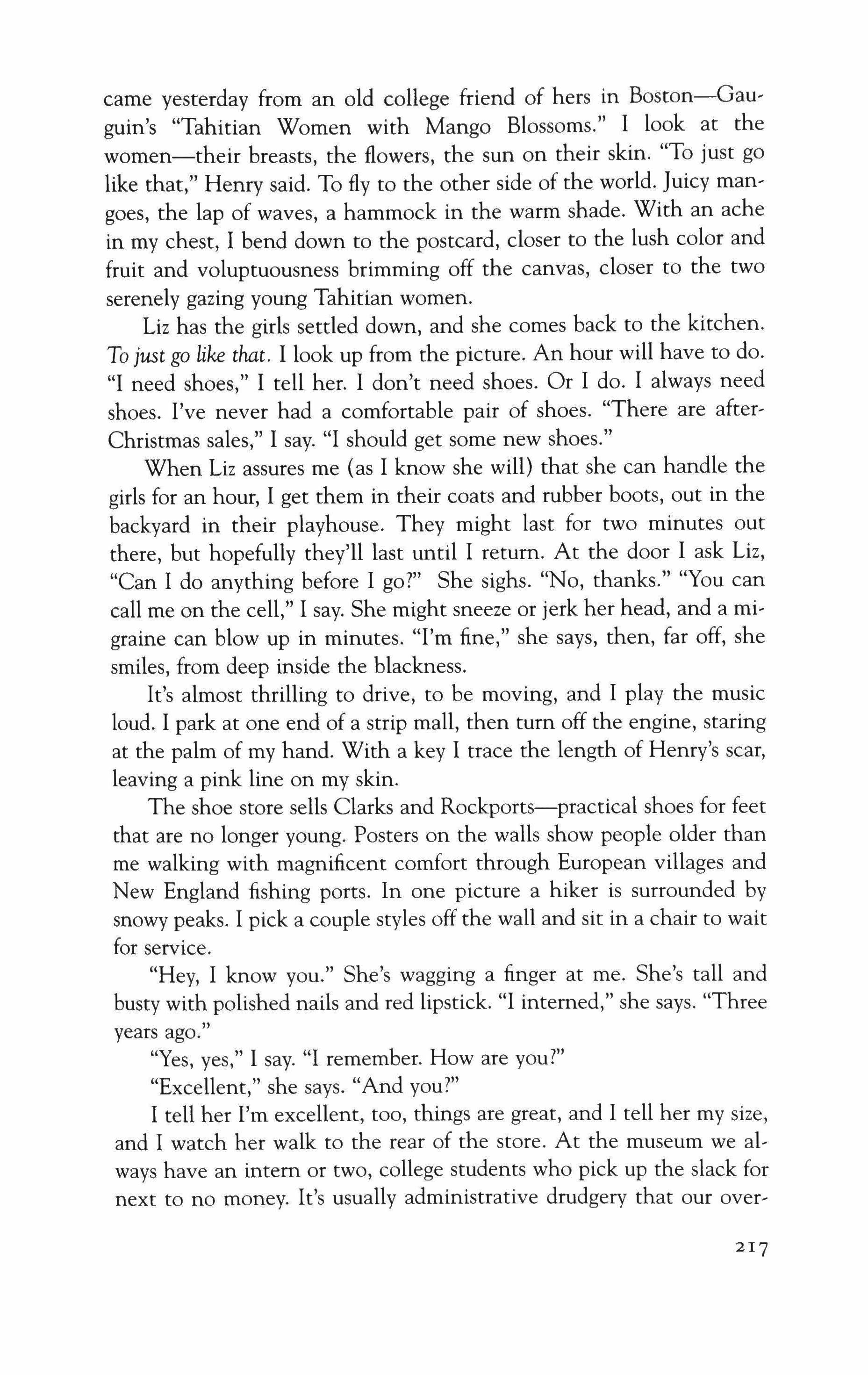
came yesterday from an old college friend of hers in Boston-Gauguin's "Tahitian Women with Mango Blossoms." I look at the women-their breasts, the flowers, the sun on their skin. "To just go like that," Henry said. To fly to the other side of the world. Juicy mangoes, the lap of waves, a hammock in the warm shade. With an ache in my chest, I bend down to the postcard, closer to the lush color and fruit and voluptuousness brimming off the canvas, closer to the two serenely gazing young Tahitian women.
Liz has the girls settled down, and she comes back to the kitchen. To just go like that. I look up from the picture. An hour will have to do. "I need shoes," I tell her. I don't need shoes. Or I do. I always need shoes. I've never had a comfortable pair of shoes. "There are afterChristmas sales," I say. "I should get some new shoes."
When Liz assures me (as I know she will) that she can handle the girls for an hour, I get them in their coats and rubber boots, out in the backyard in their playhouse. They might last for two minutes out there, but hopefully they'll last until I return. At the door I ask Liz, "Can I do anything before I go?" She sighs. "No, thanks." "You can call me on the cell," I say. She might sneeze or jerk her head, and a migraine can blow up in minutes. "I'm fine," she says, then, far off, she smiles, from deep inside the blackness.
It's almost thrilling to drive, to be moving, and I play the music loud. I park at one end of a strip mall, then turn off the engine, staring at the palm of my hand. With a key I trace the length of Henry's scar, leaving a pink line on my skin.
The shoe store sells Clarks and Rockports-practical shoes for feet that are no longer young. Posters on the walls show people older than me walking with magnificent comfort through European villages and New England fishing ports. In one picture a hiker is surrounded by snowy peaks. I pick a couple styles off the wall and sit in a chair to wait for service.
"Hey, I know you." She's wagging a finger at me. She's tall and busty with polished nails and red lipstick. "I interned," she says. "Three years ago."
"Yes, yes," I say. "I remember. How are you?"
"Excellent," she says. "And you?"
I tell her I'm excellent, too, things are great, and I tell her my size, and I watch her walk to the rear of the store. At the museum we always have an intern or two, college students who pick up the slack for next to no money. It's usually administrative drudgery that our over-
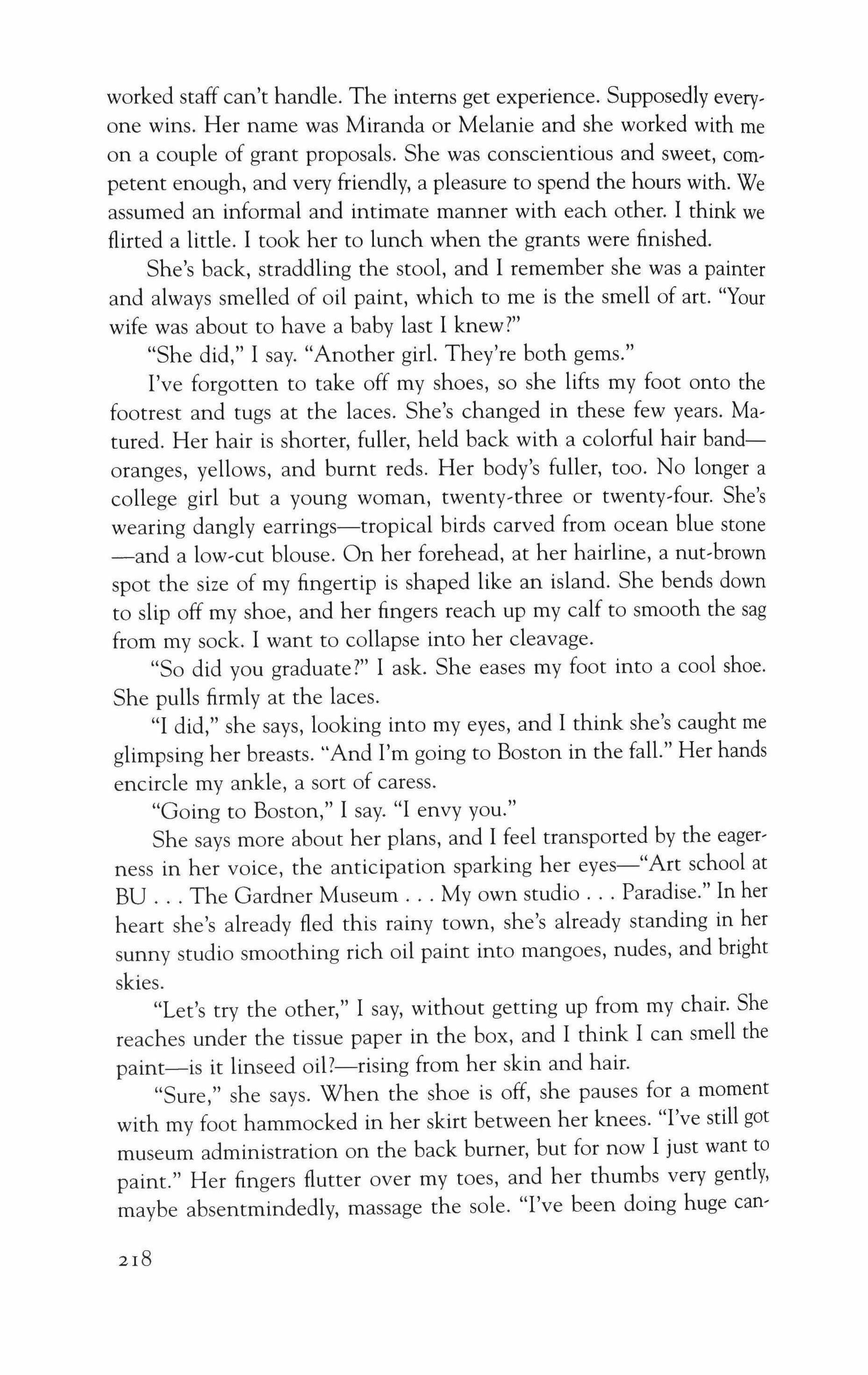
worked staff can't handle. The interns get experience. Supposedly everyone wins. Her name was Miranda or Melanie and she worked with me on a couple of grant proposals. She was conscientious and sweet, competent enough, and very friendly, a pleasure to spend the hours with. We assumed an informal and intimate manner with each other. I think we flirted a little. I took her to lunch when the grants were finished.
She's back, straddling the stool, and I remember she was a painter and always smelled of oil paint, which to me is the smell of art. "Your wife was about to have a baby last I knew?"
"She did," I say. "Another girl. They're both gems."
I've forgotten to take off my shoes, so she lifts my foot onto the footrest and tugs at the laces. She's changed in these few years. Matured. Her hair is shorter, fuller, held back with a colorful hair bandoranges, yellows, and burnt reds. Her body's fuller, too. No longer a college girl but a young woman, twenty-three or twenty-four. She's wearing dangly earrings-tropical birds carved from ocean blue stone -and a low-cut blouse. On her forehead, at her hairline, a nut-brown spot the size of my fingertip is shaped like an island. She bends down to slip off my shoe, and her fingers reach up my calf to smooth the sag from my sock. I want to collapse into her cleavage.
"So did you graduate?" I ask. She eases my foot into a cool shoe. She pulls firmly at the laces.
"I did," she says, looking into my eyes, and I think she's caught me glimpsing her breasts. "And I'm going to Boston in the fall." Her hands encircle my ankle, a sort of caress.
"Going to Boston," I say. "I envy you."
She says more about her plans, and I feel transported by the eagerness in her voice, the anticipation sparking her eyes-"Art school at BU The Gardner Museum My own studio Paradise." In her heart she's already fled this rainy town, she's already standing in her sunny studio smoothing rich oil paint into mangoes, nudes, and bright skies.
"Let's try the other," I say, without getting up from my chair. She reaches under the tissue paper in the box, and I think I can smell the paint-is it linseed oil?-rising from her skin and hair.
"Sure," she says. When the shoe is off, she pauses for a moment with my foot hammocked in her skirt between her knees. "I've still got museum administration on the back burner, but for now I just want to paint." Her fingers flutter over my toes, and her thumbs very gently, maybe absentmindedly, massage the sole. "I've been doing huge can-
218
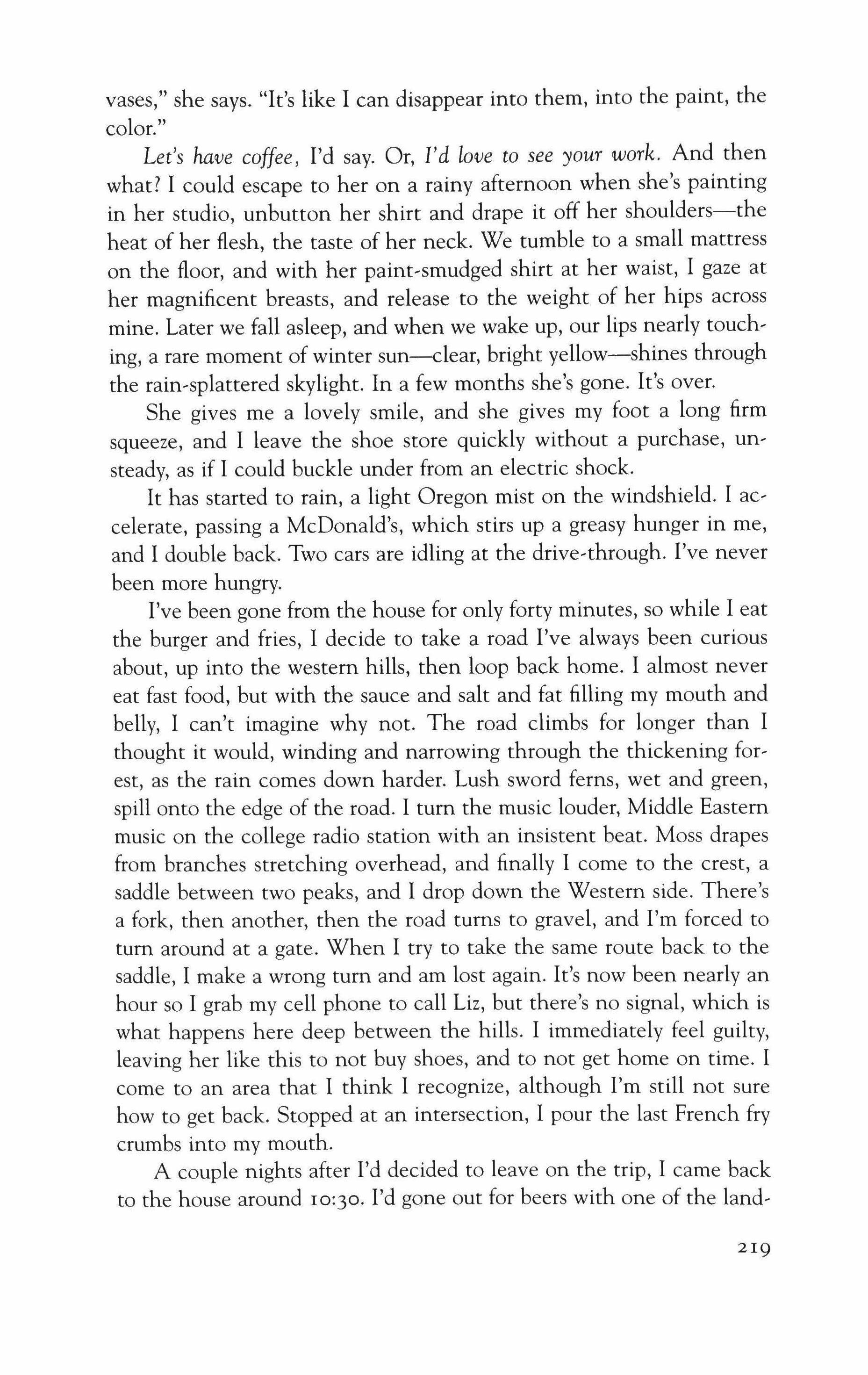
vases," she says. "It's like I can disappear into them, into the paint, the color."
Let's have coffee, I'd say. Or, 1'd love to see your work. And then what? I could escape to her on a rainy afternoon when she's painting in her studio, unbutton her shirt and drape it off her shoulders-the heat of her flesh, the taste of her neck. We tumble to a small mattress on the floor, and with her paint-smudged shirt at her waist, I gaze at her magnificent breasts, and release to the weight of her hips across mine. Later we fall asleep, and when we wake up, our lips nearly touching, a rare moment of winter sun-clear, bright yellow-shines through the rain-splattered skylight. In a few months she's gone. It's over.
She gives me a lovely smile, and she gives my foot a long firm squeeze, and I leave the shoe store quickly without a purchase, un� steady, as if I could buckle under from an electric shock.
It has started to rain, a light Oregon mist on the windshield. I accelerate, passing a McDonald's, which stirs up a greasy hunger in me, and I double back. Two cars are idling at the drive-through. I've never been more hungry.
I've been gone from the house for only forty minutes, so while I eat the burger and fries, I decide to take a road I've always been curious about, up into the western hills, then loop back home. I almost never eat fast food, but with the sauce and salt and fat filling my mouth and belly, I can't imagine why not. The road climbs for longer than I thought it would, winding and narrowing through the thickening forest, as the rain comes down harder. Lush sword ferns, wet and green, spill onto the edge of the road. I turn the music louder, Middle Eastern music on the college radio station with an insistent beat. Moss drapes from branches stretching overhead, and finally I come to the crest, a saddle between two peaks, and I drop down the Western side. There's a fork, then another, then the road turns to gravel, and I'm forced to turn around at a gate. When I try to take the same route back to the saddle, I make a wrong turn and am lost again. It's now been nearly an hour so I grab my cell phone to call Liz, but there's no signal, which is what happens here deep between the hills. I immediately feel guilty, leaving her like this to not buy shoes, and to not get home on time. I come to an area that I think I recognize, although I'm still not sure how to get back. Stopped at an intersection, I pour the last French fry crumbs into my mouth.
A couple nights after I'd decided to leave on the trip, I came back to the house around IO:30. I'd gone out for beers with one of the land-
219
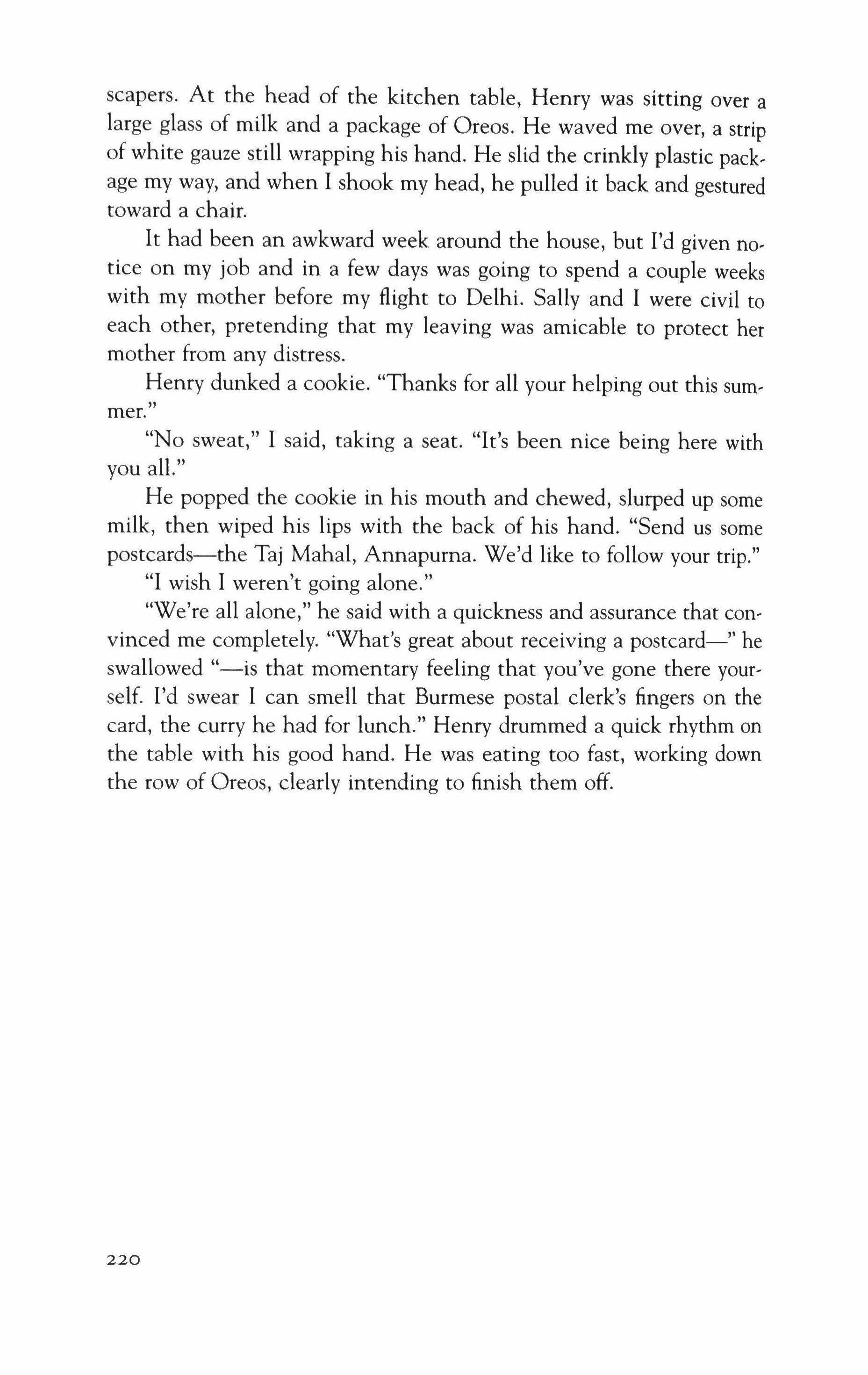
scapers. At the head of the kitchen table, Henry was sitting over a large glass of milk and a package of Oreos. He waved me over, a strip of white gauze still wrapping his hand. He slid the crinkly plastic package my way, and when I shook my head, he pulled it back and gestured toward a chair.
It had been an awkward week around the house, but I'd given notice on my job and in a few days was going to spend a couple weeks with my mother before my flight to Delhi. Sally and I were civil to each other, pretending that my leaving was amicable to protect her mother from any distress.
Henry dunked a cookie. "Thanks for all your helping out this sum" mer.
"No sweat," I said, taking a seat. "It's been nice being here with you all."
He popped the cookie in his mouth and chewed, slurped up some milk, then wiped his lips with the back of his hand. "Send us some postcards-the Taj Mahal, Annapurna. We'd like to follow your trip."
"I wish I weren't going alone."
"We're all alone," he said with a quickness and assurance that convinced me completely. "What's great about receiving a postcard-" he swallowed "-is that momentary feeling that you've gone there yourself. I'd swear I can smell that Burmese postal clerk's fingers on the card, the curry he had for lunch." Henry drummed a quick rhythm on the table with his good hand. He was eating too fast, working down the row of Oreos, clearly intending to finish them off.
220
Stephen Dobyns
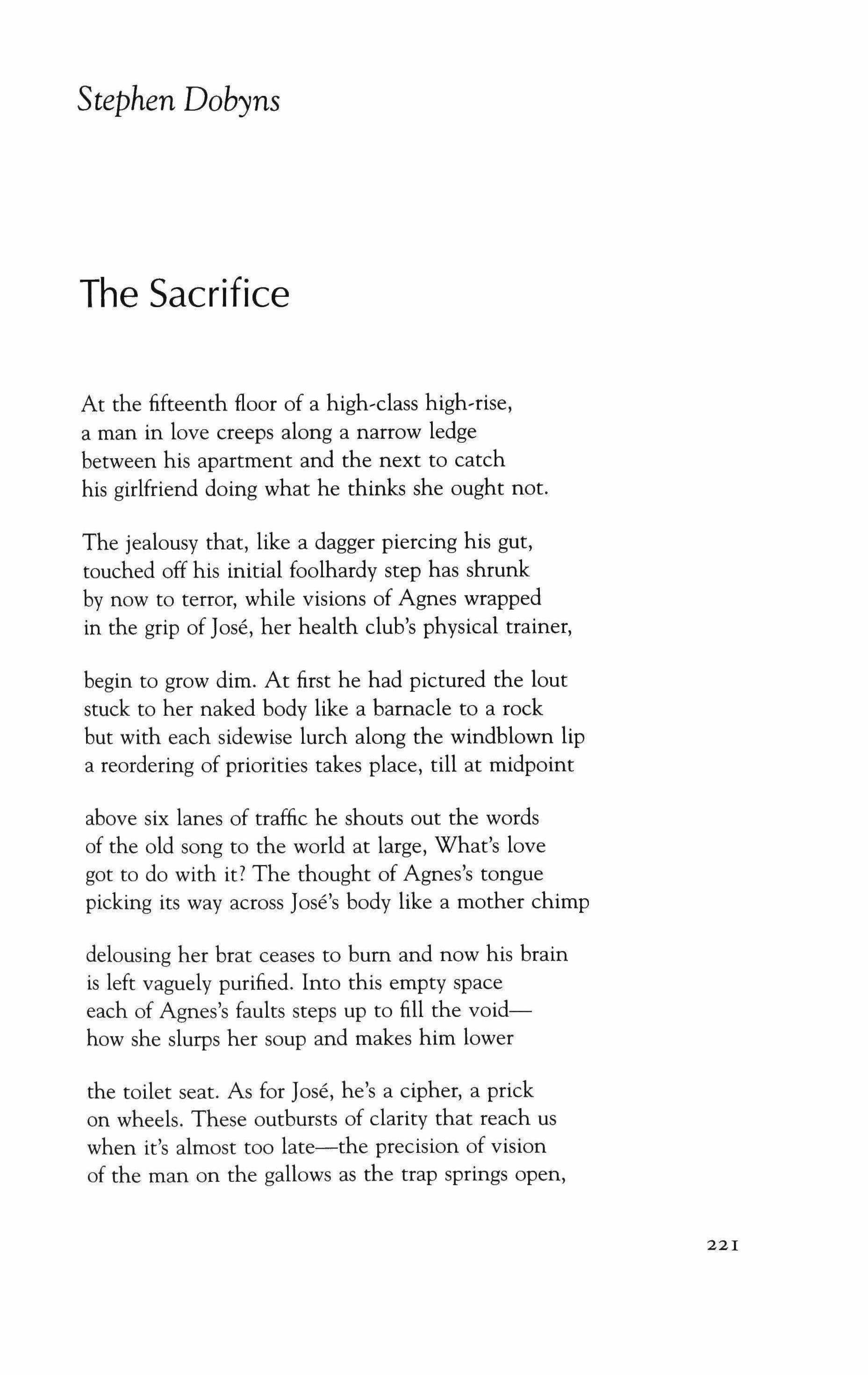
The Sacrifice
At the fifteenth floor of a high-class high-rise, a man in love creeps along a narrow ledge between his apartment and the next to catch his girlfriend doing what he thinks she ought not.
The jealousy that, like a dagger piercing his gut, touched off his initial foolhardy step has shrunk by now to terror, while visions of Agnes wrapped in the grip of Jose, her health club's physical trainer,
begin to grow dim. At first he had pictured the lout stuck to her naked body like a barnacle to a rock but with each sidewise lurch along the windblown lip a reordering of priorities takes place, till at midpoint
above six lanes of traffic he shouts out the words of the old song to the world at large, What's love got to do with it? The thought of Agnes's tongue picking its way across Jose's body like a mother chimp
delousing her brat ceases to burn and now his brain is left vaguely purified. Into this empty space each of Agnes's faults steps up to fill the voidhow she slurps her soup and makes him lower
the toilet seat. As for Jose, he's a cipher, a prick on wheels. These outbursts of clarity that reach us when it's almost too late-the precision of vision of the man on the gallows as the trap springs open,
221
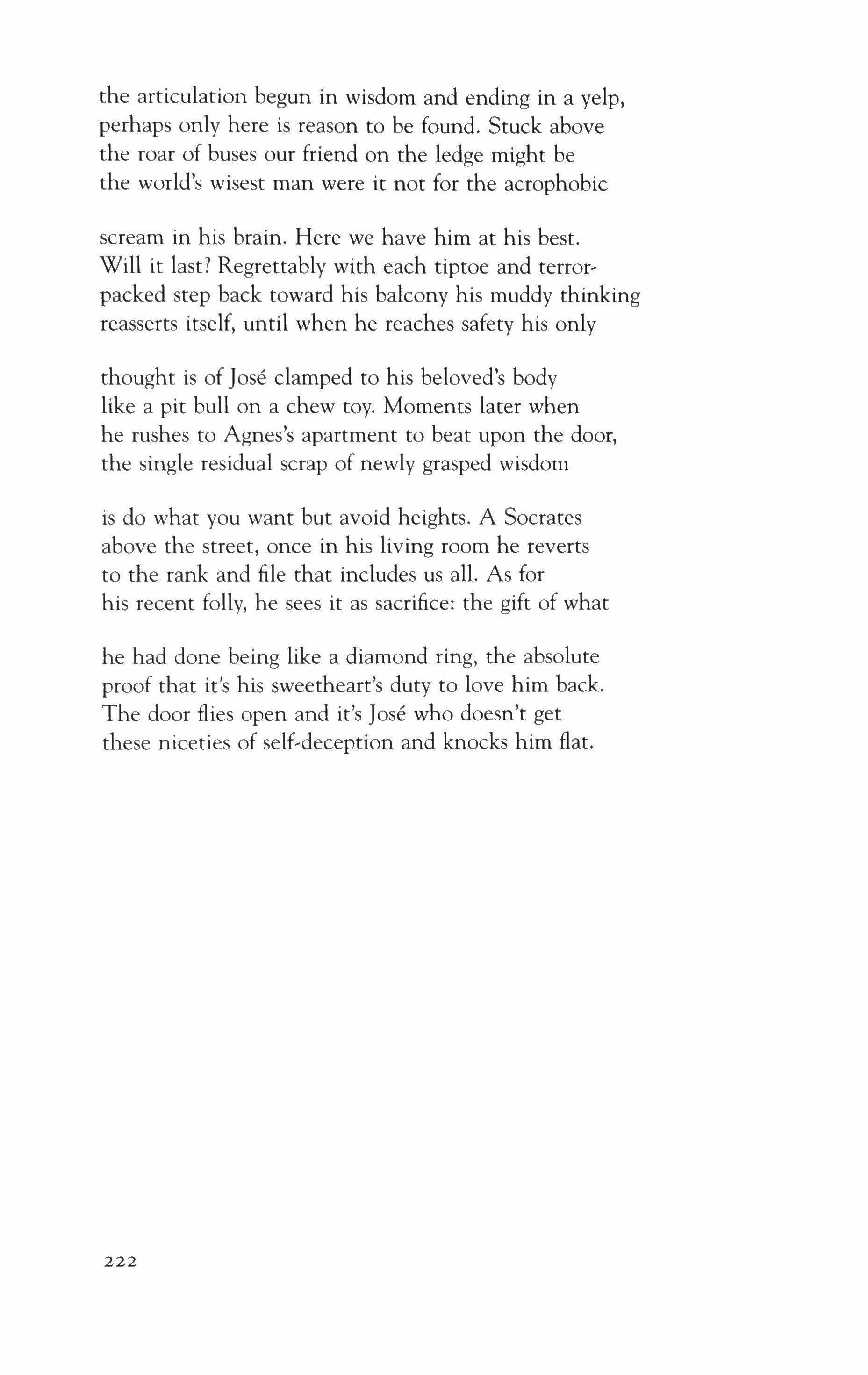
the articulation begun in wisdom and ending in a yelp, perhaps only here is reason to be found. Stuck above the roar of buses our friend on the ledge might be the world's wisest man were it not for the acrophobic
scream in his brain. Here we have him at his best. Will it last? Regrettably with each tiptoe and terrorpacked step back toward his balcony his muddy thinking reasserts itself, until when he reaches safety his only
thought is of Jose clamped to his beloved's body like a pit bull on a chew toy. Moments later when he rushes to Agnes's apartment to beat upon the door, the single residual scrap of newly grasped wisdom
is do what you want but avoid heights. A Socrates above the street, once in his living room he reverts to the rank and file that includes us all. As for his recent folly, he sees it as sacrifice: the gift of what he had done being like a diamond ring, the absolute proof that it's his sweetheart's duty to love him back. The door flies open and it's Jose who doesn't get these niceties of self-deception and knocks him flat.
222
Three Christs ofYpsilanti
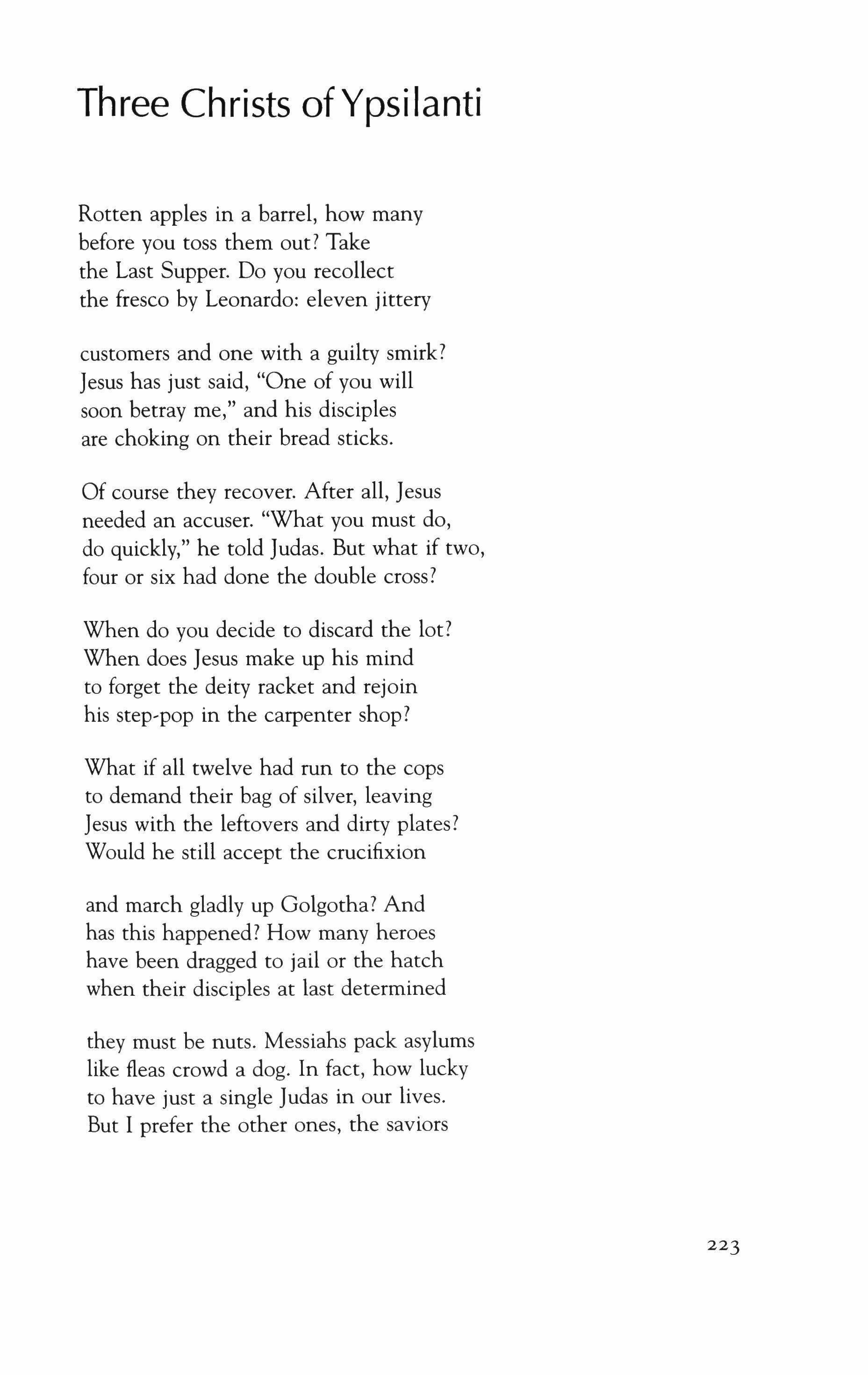
Rotten apples in a barrel, how many before you toss them out? Take the Last Supper. Do you recollect the fresco by Leonardo: eleven jittery customers and one with a guilty smirk? Jesus has just said, "One of you will soon betray me," and his disciples are choking on their bread sticks.
Of course they recover. After all, Jesus needed an accuser. "What you must do, do quickly," he told Judas. But what if two, four or six had done the double cross?
When do you decide to discard the lot? When does Jesus make up his mind to forget the deity racket and rejoin his step-pop in the carpenter shop?
What if all twelve had run to the cops to demand their bag of silver, leaving Jesus with the leftovers and dirty plates? Would he still accept the crucifixion and march gladly up Golgotha? And has this happened? How many heroes have been dragged to jailor the hatch when their disciples at last determined they must be nuts. Messiahs pack asylums like fleas crowd a dog. In fact, how lucky to have just a single Judas in our lives. But I prefer the other ones, the saviors
223
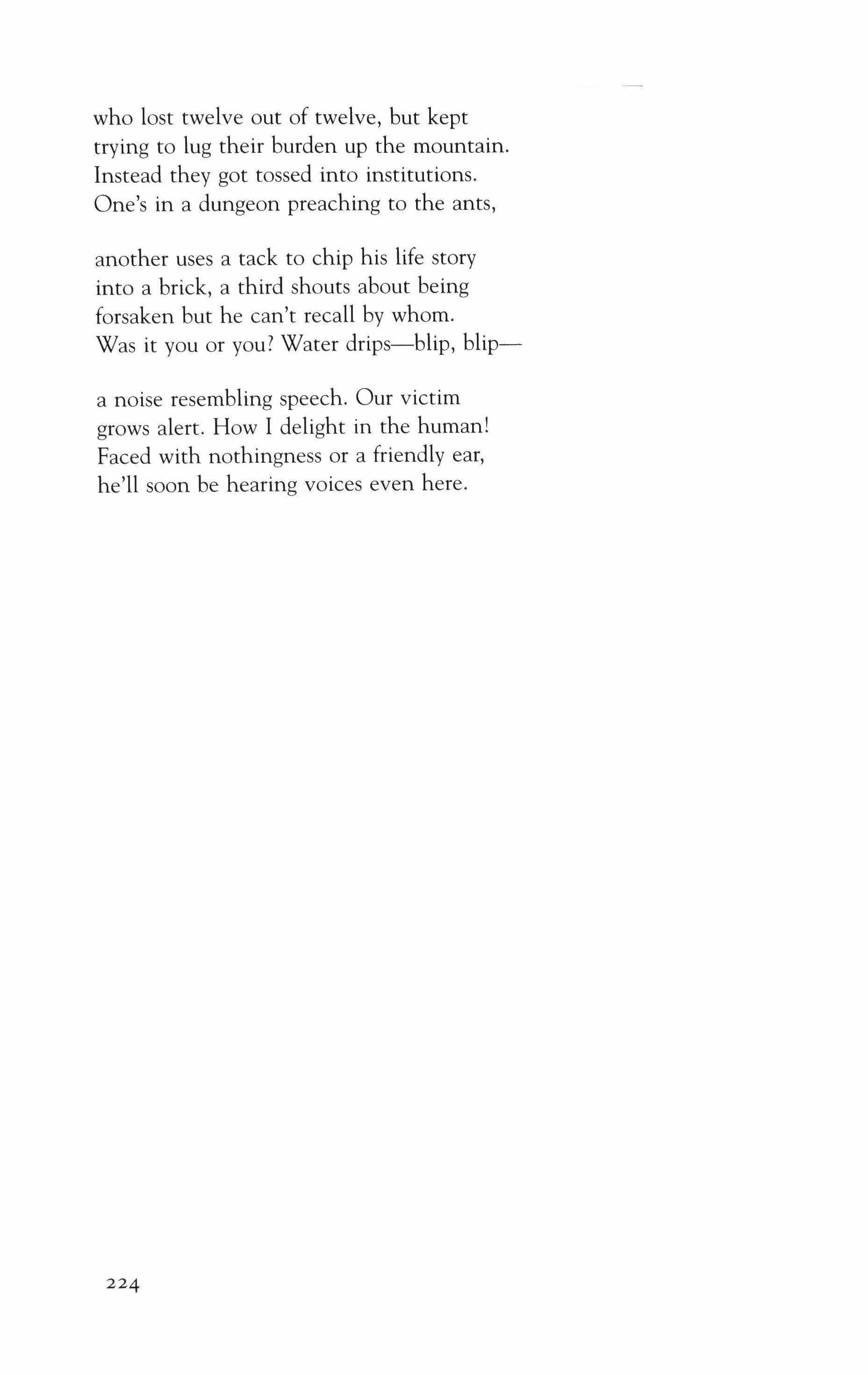
who lost twelve out of twelve, but kept trying to lug their burden up the mountain. Instead they got tossed into institutions. One's in a dungeon preaching to the ants, another uses a tack to chip his life story into a brick, a third shouts about being forsaken but he can't recall by whom. Was it you or you? Water drips-blip, blip-
a noise resembling speech. Our victim grows alert. How I delight in the human! Faced with nothingness or a friendly ear, he'll soon be hearing voices even here.
224
Thomas the Doubter's Irrefutable Chink
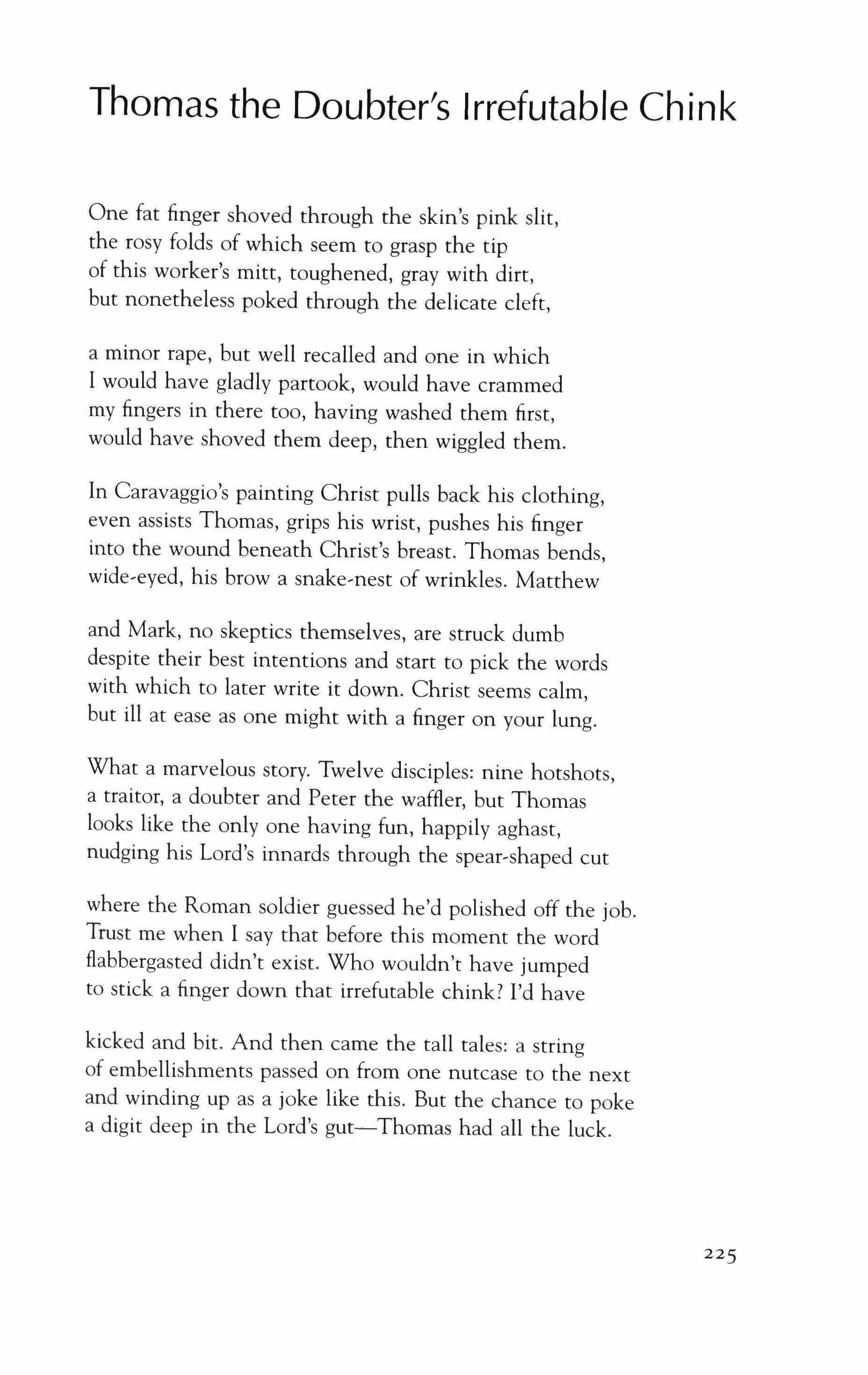
One fat finger shoved through the skin's pink slit, the rosy folds of which seem to grasp the tip of this worker's mitt, toughened, gray with dirt, but nonetheless poked through the delicate cleft,
a minor rape, but well recalled and one in which I would have gladly partook, would have crammed my fingers in there too, having washed them first, would have shoved them deep, then wiggled them.
In Caravaggio's painting Christ pulls back his clothing, even assists Thomas, grips his wrist, pushes his finger into the wound beneath Christ's breast. Thomas bends, wide-eyed, his brow a snake-nest of wrinkles. Matthew
and Mark, no skeptics themselves, are struck dumb despite their best intentions and start to pick the words with which to later write it down. Christ seems calm, but ill at ease as one might with a finger on your lung.
What a marvelous story. Twelve disciples: nine hotshots, a traitor, a doubter and Peter the waffler, but Thomas looks like the only one having fun, happily aghast, nudging his Lord's innards through the spear-shaped cut
where the Roman soldier guessed he'd polished off the job. Trust me when I say that before this moment the word flabbergasted didn't exist. Who wouldn't have jumped to stick a finger down that irrefutable chink? I'd have kicked and bit. And then came the tall tales: a string of embellishments passed on from one nutcase to the next and winding up as a joke like this. But the chance to poke a digit deep in the Lord's gut-Thomas had all the luck.
225
Jane Shore Gelato
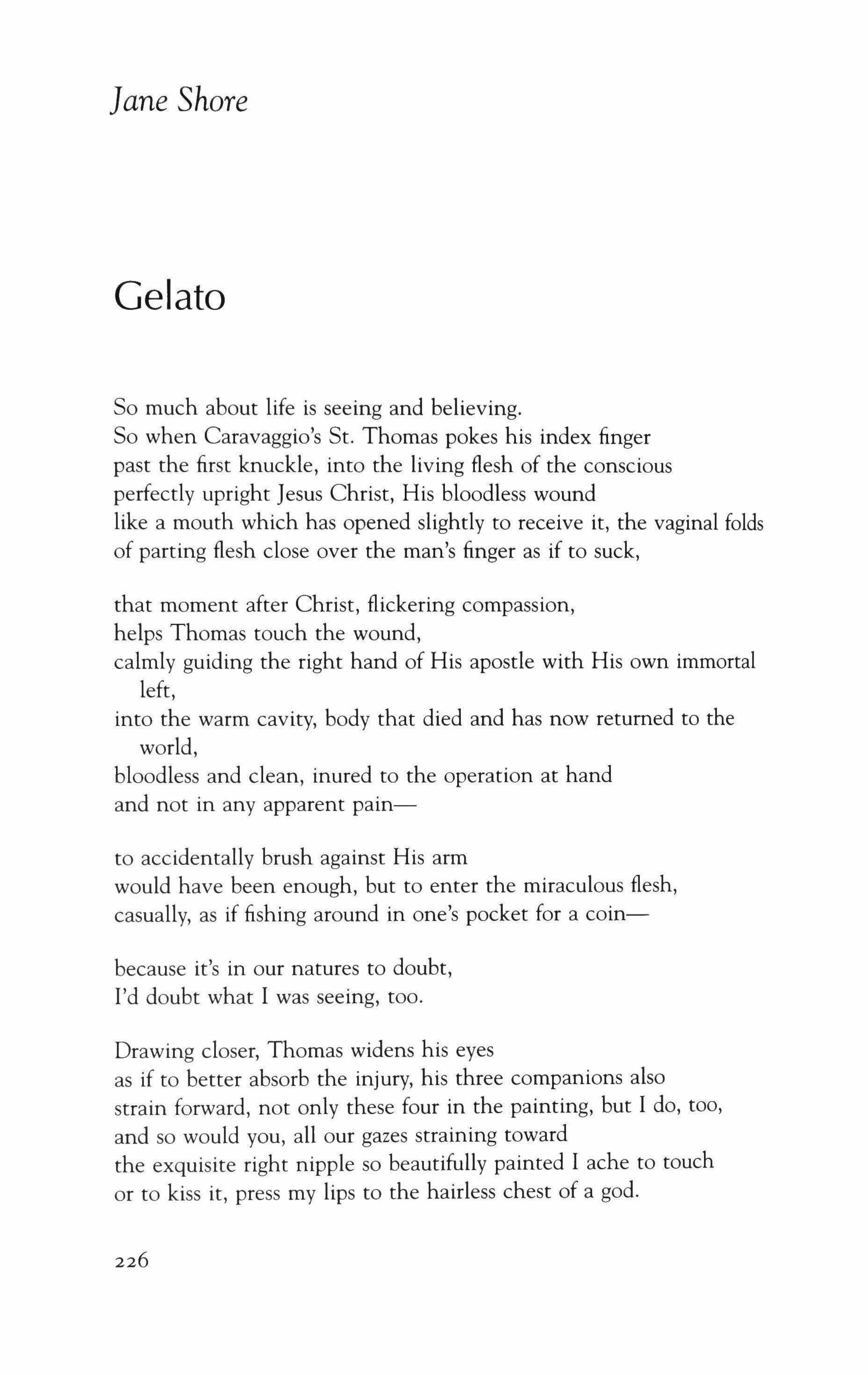
So much about life is seeing and believing. So when Caravaggio's St. Thomas pokes his index finger past the first knuckle, into the living flesh of the conscious perfectly upright Jesus Christ, His bloodless wound like a mouth which has opened slightly to receive it, the vaginal folds of parting flesh close over the man's finger as if to suck,
that moment after Christ, flickering compassion, helps Thomas touch the wound, calmly guiding the right hand of His apostle with His own immortal left, into the warm cavity, body that died and has now returned to the world,
bloodless and clean, inured to the operation at hand and not in any apparent pain-
to accidentally brush against His arm would have been enough, but to enter the miraculous flesh, casually, as if fishing around in one's pocket for a coin-
because it's in our natures to doubt, I'd doubt what I was seeing, too.
Drawing closer, Thomas widens his eyes as if to better absorb the injury, his three companions also strain forward, not only these four in the painting, but I do, too, and so would you, all our gazes straining toward the exquisite right nipple so beautifully painted I ache to touch or to kiss it, press my lips to the hairless chest of a god.
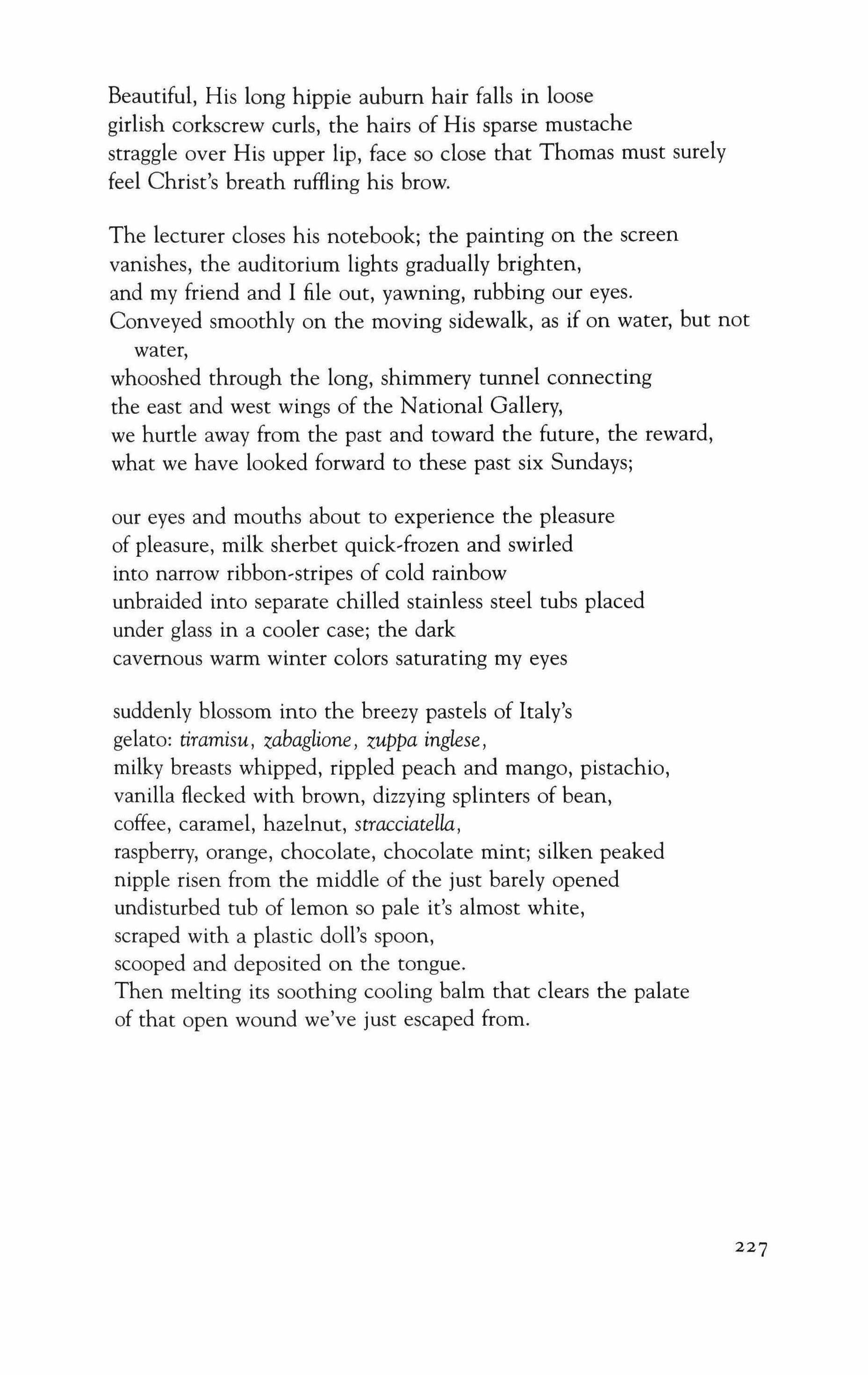
Beautiful, His long hippie auburn hair falls in loose girlish corkscrew curls, the hairs of His sparse mustache straggle over His upper lip, face so close that Thomas must surely feel Christ's breath ruffling his brow.
The lecturer closes his notebook; the painting on the screen vanishes, the auditorium lights gradually brighten, and my friend and I file out, yawning, rubbing our eyes. Conveyed smoothly on the moving sidewalk, as if on water, but not water, whooshed through the long, shimmery tunnel connecting the east and west wings of the National Gallery, we hurtle away from the past and toward the future, the reward, what we have looked forward to these past six Sundays;
our eyes and mouths about to experience the pleasure of pleasure, milk sherbet quick-frozen and swirled into narrow ribbon,stripes of cold rainbow unbraided into separate chilled stainless steel tubs placed under glass in a cooler case; the dark cavernous warm winter colors saturating my eyes
suddenly blossom into the breezy pastels of Italy's gelato: tiramisu, zabaglione, zuppa inglese, milky breasts whipped, rippled peach and mango, pistachio, vanilla flecked with brown, dizzying splinters of bean, coffee, caramel, hazelnut, stracciatella, raspberry, orange, chocolate, chocolate mint; silken peaked nipple risen from the middle of the just barely opened undisturbed tub of lemon so pale it's almost white, scraped with a plastic doll's spoon, scooped and deposited on the tongue. Then melting its soothing cooling balm that clears the palate of that open wound we've just escaped from.
227
Ellen Bryant Voigt
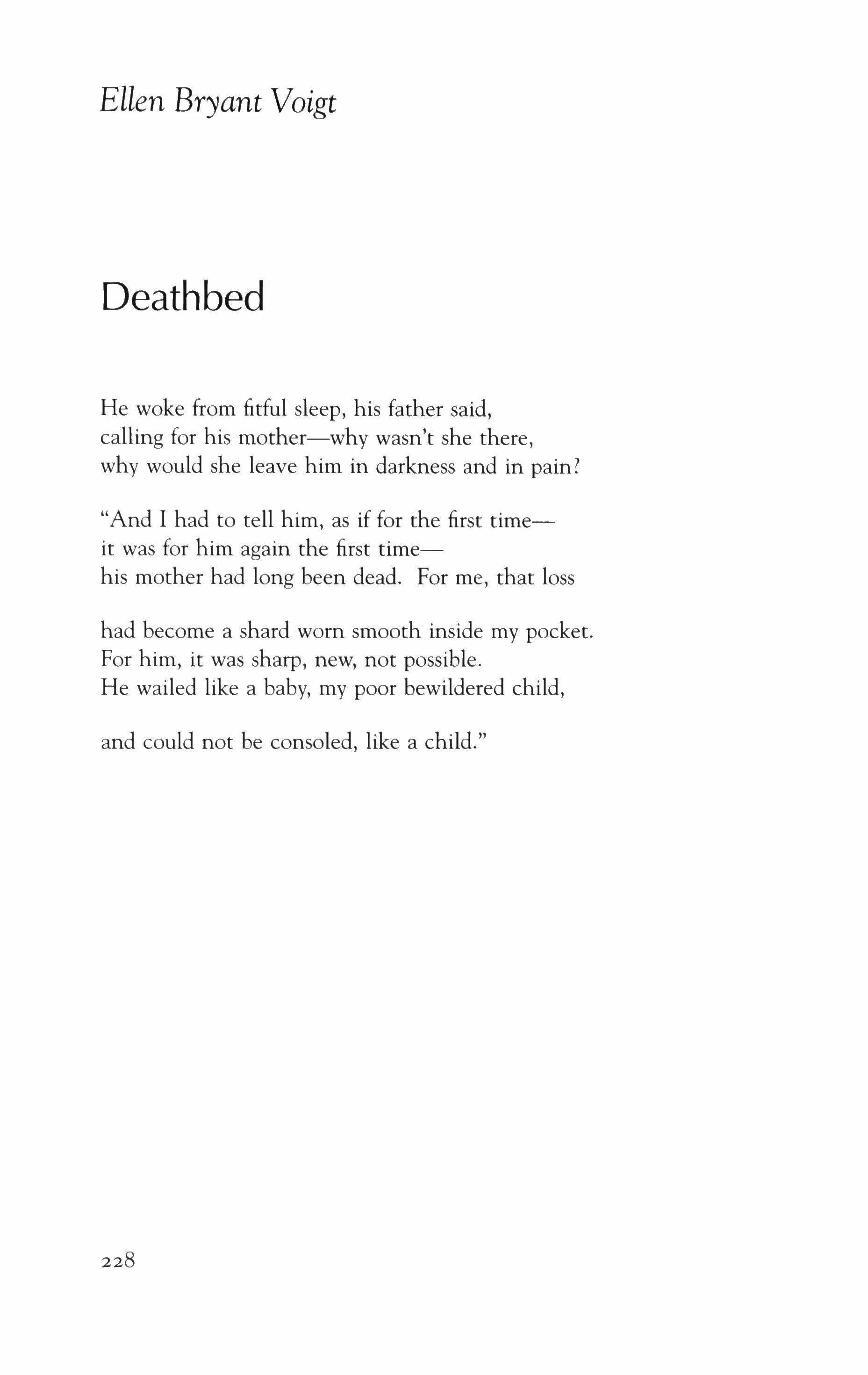
Deathbed
He woke from fitful sleep, his father said, calling for his mother-why wasn't she there, why would she leave him in darkness and in pain?
"And I had to tell him, as if for the first timeit was for him again the first timehis mother had long been dead. For me, that loss had become a shard worn smooth inside my pocket. For him, it was sharp, new, not possible. He wailed like a baby, my poor bewildered child, and could not be consoled, like a child."
The Hive
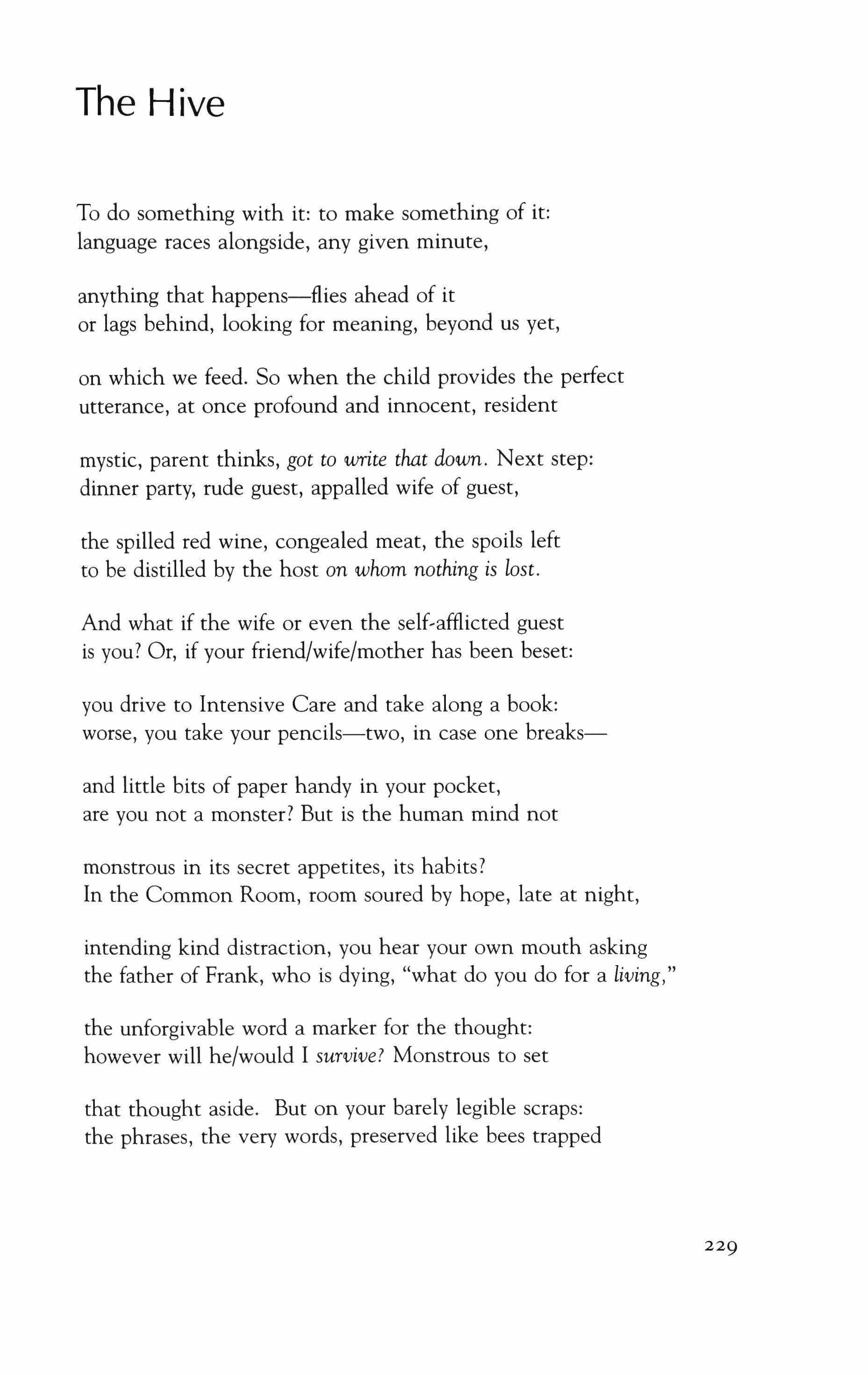
To do something with it: to make something of it: language races alongside, any given minute, anything that happens-flies ahead of it or lags behind, looking for meaning, beyond us yet, on which we feed. So when the child provides the perfect utterance, at once profound and innocent, resident mystic, parent thinks, got to write that down. Next step: dinner party, rude guest, appalled wife of guest, the spilled red wine, congealed meat, the spoils left to be distilled by the host on whom nothing is lost.
And what if the wife or even the self-afflicted guest is you? Or, if your friend/wife/mother has been beset: you drive to Intensive Care and take along a book: worse, you take your pencils-two, in case one breaksand little bits of paper handy in your pocket, are you not a monster? But is the human mind not monstrous in its secret appetites, its habits? In the Common Room, room soured by hope, late at night, intending kind distraction, you hear your own mouth asking the father of Frank, who is dying, "what do you do for a living," the unforgivable word a marker for the thought: however will he/would I survive? Monstrous to set that thought aside. But on your barely legible scraps: the phrases, the very words, preserved like bees trapped
229
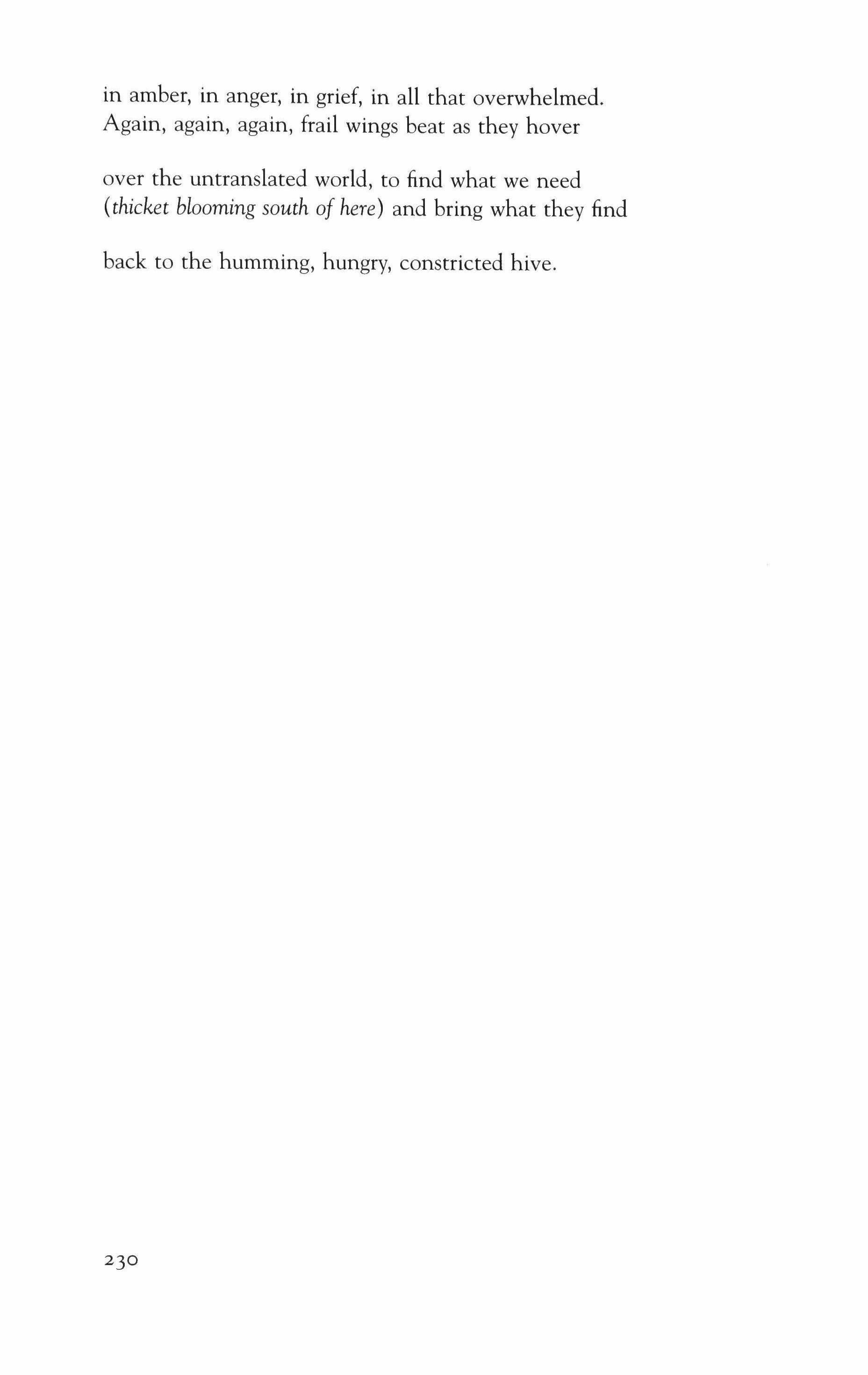
in amber, in anger, in grief, in all that overwhelmed. Again, again, again, frail wings beat as they hover
over the untranslated world, to find what we need (thicket blooming south of here) and bring what they find back to the humming, hungry, constricted hive.
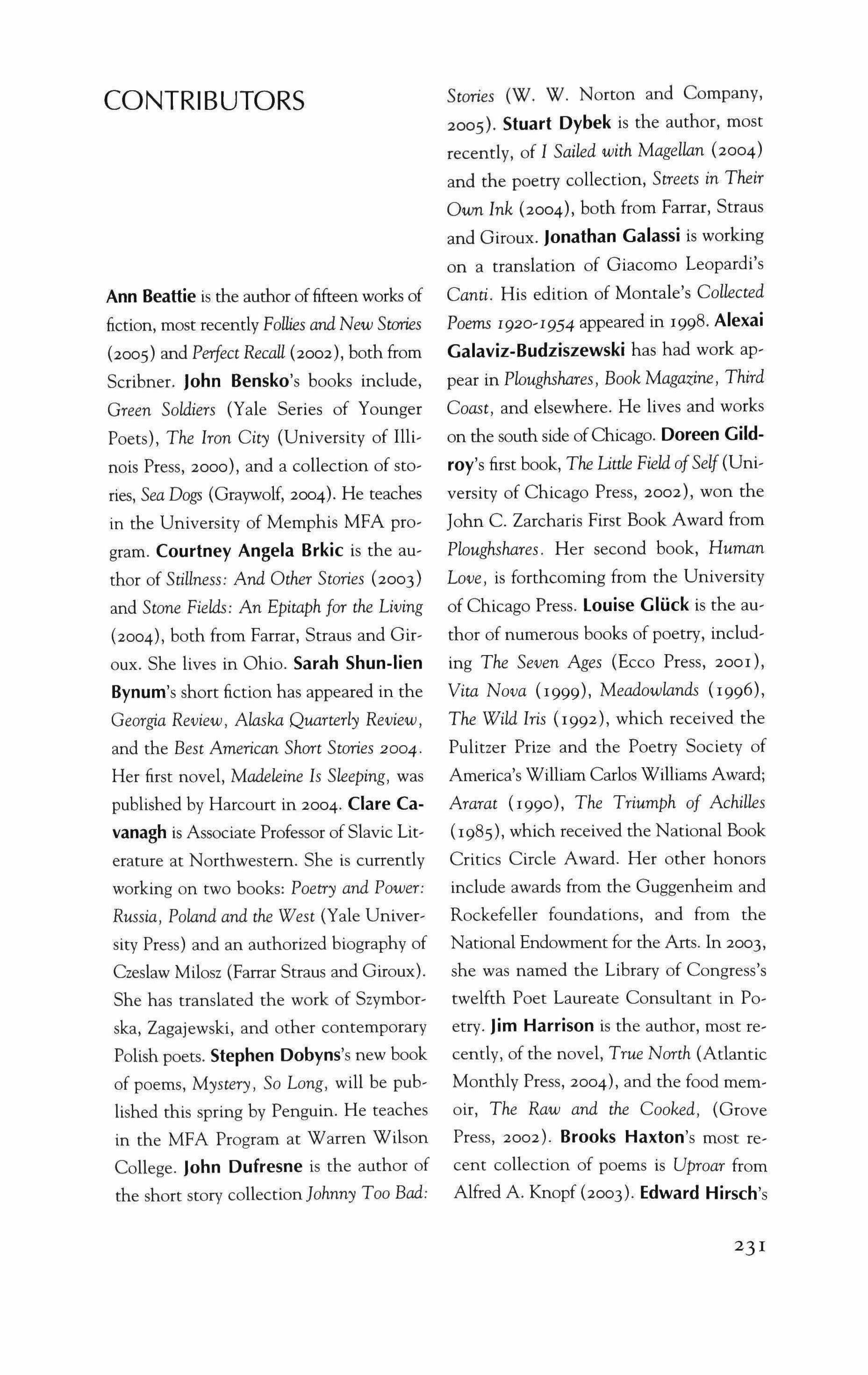
Ann Beattie is the author offifteen works of fiction, most recently Follies and New Stories (2005) and Perfect RecaU (2002), both from Scribner. John Bensko's books include, Green Soldiers (Yale Series of Younger Poets), The Iron City (University of Illinois Press, 2000), and a collection of stories, Sea Dogs (Graywolf, 2004). He teaches in the University of Memphis MFA program. Courtney Angela Brkic is the author of Stillness: And Other Stories (2003) and Stone Fields: An Epitaph for the Living (2004), both from Farrar, Straus and Giroux. She lives in Ohio. Sarah Shun-lien Bynum's short fiction has appeared in the Georgia Review, Alaska Quarterly Review, and the Best American Short Stories 2004. Her first novel, Madeleine Is Sleeping, was published by Harcourt in 2004. Clare Cavanagh is Associate Professor of Slavic literature at Northwestern. She is currently working on two books: Poetry and Power: Russia, Poland and the West (Yale University Press) and an authorized biography of Czeslaw Milosz (Farrar Straus and Giroux). She has translated the work of Szymborska, Zagajewski, and other contemporary Polish poets. Stephen Dobyns's new book of poems, Mystery, So Long, will be published this spring by Penguin. He teaches in the MFA Program at Warren Wilson College. John Dufresne is the author of the short story collection Johnny Too Bad:
Stories (W. W. Norton and Company, 2005). Stuart Dybek is the author, most recently, of I Sailed with Magellan (2004) and the poetry collection, Streets in Their Own Ink (2004), both from Farrar, Straus and Giroux. Jonathan Galassi is working on a translation of Giacomo Leopardi's Canti. His edition of Montale's Collected Poems I920-I954 appeared in I998. Alexai Galaviz-Budziszewski has had work appear in Ploughshares, Book Magazine, Third Coast, and elsewhere. He lives and works on the south side ofChicago. Doreen Gildroy's first book, The Little Field ofSelf(University of Chicago Press, 2002), won the John C. Zarcharis First Book Award from Ploughshares. Her second book, Human Love, is forthcoming from the University of Chicago Press. Louise Gluck is the author of numerous books of poetry, including The Seven Ages (Ecco Press, 200 I), Vita Nova (I999), Meadowlands (1996), The Wild Iris (1992), which received the Pulitzer Prize and the Poetry Society of America's William Carlos Williams Award; Ararat (I990), The Triumph of Achilles (1985), which received the National Book Critics Circle Award. Her other honors include awards from the Guggenheim and Rockefeller foundations, and from the National Endowment for the Arts. In 2003, she was named the Library of Congress's twelfth Poet Laureate Consultant in Poetry. Jim Harrison is the author, most recently, of the novel, True North (Atlantic Monthly Press, 2004), and the food memoir, The Raw and the Cooked, (Grove Press, 2002). Brooks Haxton's most recent collection of poems is Uproar from Alfred A. Knopf (2003). Edward Hirsch's 231
CONTRIBUTORS
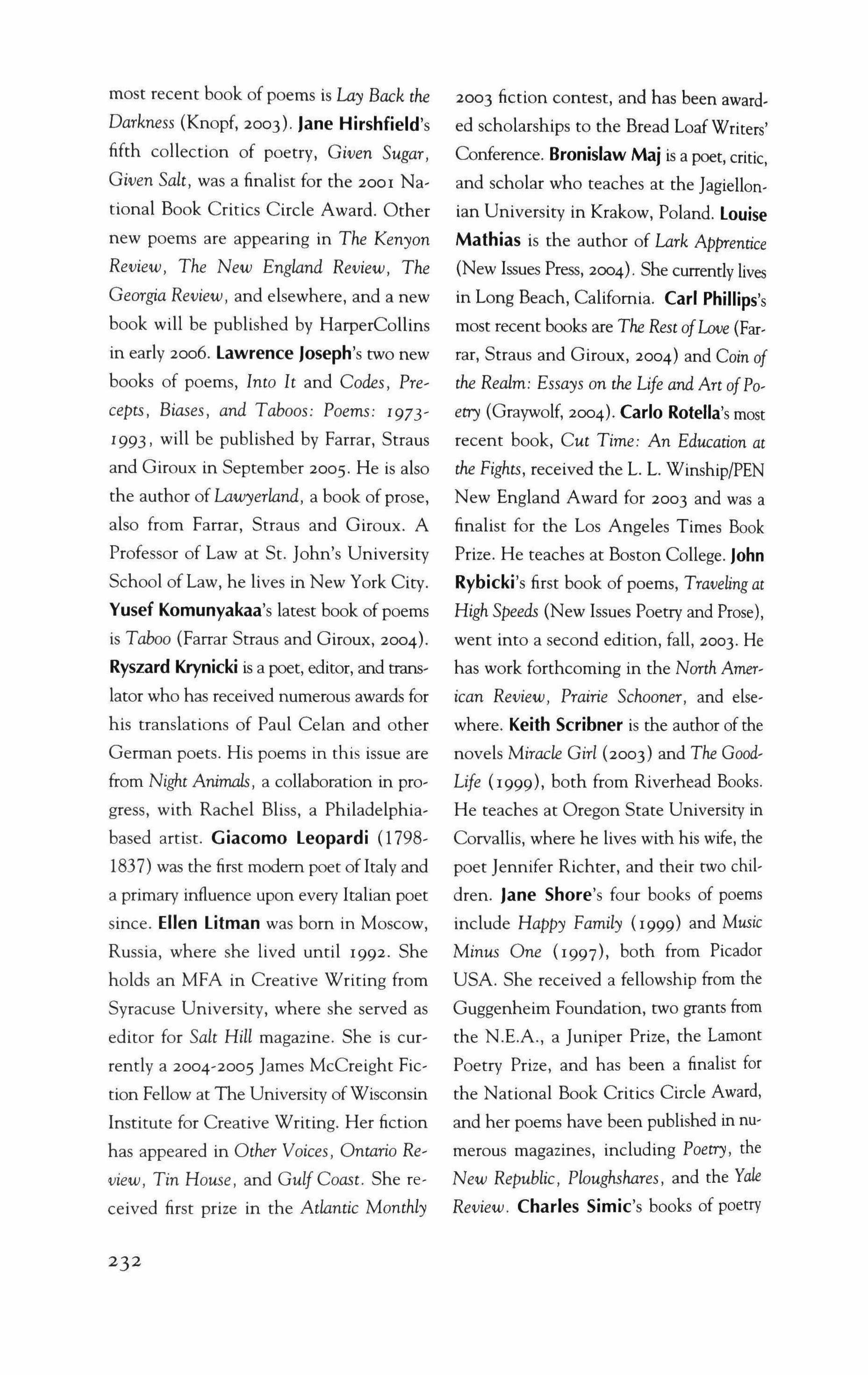
most recent book of poems is Lay Back the Darkness (Knopf, 2003). Jane Hirshfield's fifth collection of poetry, Given Sugar, Given Salt, was a finalist for the 2001 National Book Critics Circle Award. Other new poems are appearing in The Kenyon Review, The New England Review, The Georgia Review, and elsewhere, and a new book will be published by HarperCollins in early 2006. Lawrence Joseph's two new books of poems, Into It and Codes, Precepts, Biases, and Taboos: Poems: 19731993, will be published by Farrar, Straus and Giroux in September 2005. He is also the author of Lawyerland, a book of prose, also from Farrar, Straus and Giroux. A Professor of Law at St. John's University School ofLaw, he lives in New York Ciry. Yusef Komunyakaa's latest book of poems is Taboo (Farrar Straus and Giroux, 2004).
Ryszard Krynicki is a poet, editor, and translator who has received numerous awards for his translations of Paul Celan and other German poets. His poems in this issue are from Night Animals, a collaboration in progress, with Rachel Bliss, a Philadelphiabased artist. Giacomo Leopardi (17981837) was the first modem poet of Italy and a primary influence upon every Italian poet since. Ellen Litman was born in Moscow, Russia, where she lived until 1992. She holds an MFA in Creative Writing from Syracuse University, where she served as editor for Salt Hill magazine. She is currentlya 2004-2005 James McCreight Fiction Fellow at The Universiry of Wisconsin Institute for Creative Writing. Her fiction has appeared in Other Voices, Ontario Review, Tin House, and Gulf Coast. She received first prize in the Atlantic Monthly
2003 fiction contest, and has been awarded scholarships to the Bread Loaf Writers' Conference. Bronislaw Maj is a poet, critic, and scholar who teaches at the [agiellonian Universiry in Krakow, Poland. Louise Mathias is the author of Lark Apprentice (New Issues Press, 2004). She currently lives in Long Beach, California. Carl Phillips's most recent books are The Rest ofLove (Farrar' Straus and Giroux, 2004) and Coin of the Realm: Essays on the Life and Art ofPoetry (Graywolf, 2004). Carlo Rotella's most recent book, Cut Time: An Education at the Fights, received the L. L. Winship/PEN New England Award for 2003 and was a finalist for the Los Angeles Times Book Prize. He teaches at Boston College. John Rybicki's first book of poems, Traveling at High Speeds (New Issues Poetry and Prose), went into a second edition, fall, 2003. He has work forthcoming in the North American Review, Prairie Schooner, and elsewhere. Keith Scribner is the author of the novels Miracle Girl (2003) and The GoodLife (1999), both from Riverhead Books. He teaches at Oregon State University in Corvallis, where he lives with his wife, the poet Jennifer Richter, and their two children. Jane Shore's four books of poems include Happy Family (1999) and Music Minus One (1997), both from Picador USA. She received a fellowship from the Guggenheim Foundation, two grants from the N.E.A., a Juniper Prize, the Lamont Poetry Prize, and has been a finalist for the National Book Critics Circle Award, and her poems have been published in numerous magazines, including Poetry, the New Republic, Ploughshares, and the Yale Review. Charles Simic's books of poetry
232
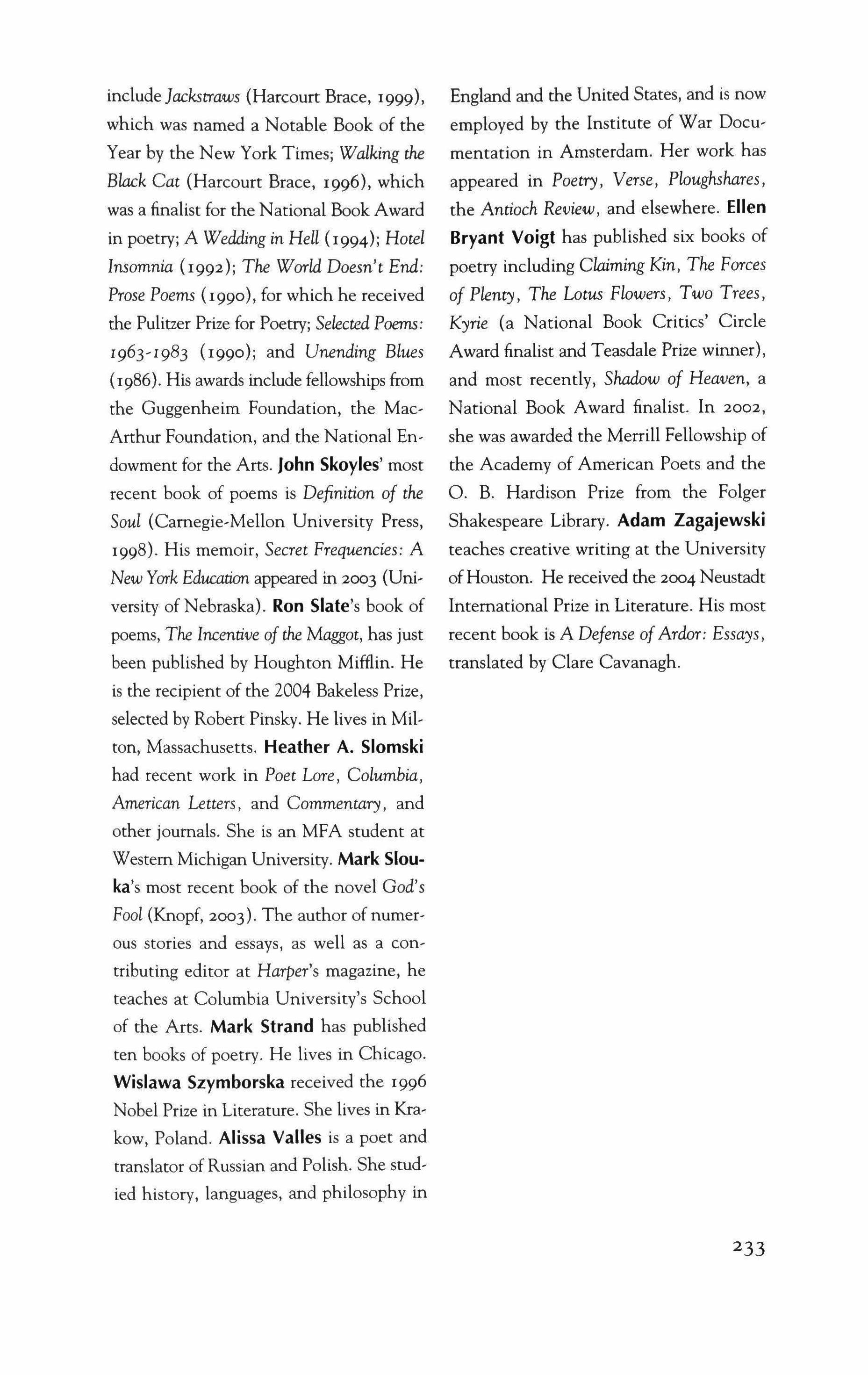
include Jackstraws (Harcourt Brace, 1999), which was named a Notable Book of the Year by the New York Times; Walking the Black Cat (Harcourt Brace, 1996), which was a finalist for the National Book Award in poetry; A Wedding in Hell (1994); Hotel Insomnia (1992); The World Doesn't End: Prose Poems (1990), for which he received the Pulitzer Prize for Poetry; Selected Poems: 1963-1983 (1990); and Unending Blues (1986). His awards include fellowships from the Guggenheim Foundation, the MacArthur Foundation, and the National Endowment for the Arts. John Skoyles' most recent book of poems is Definition of the Soul (Carnegie-Mellon University Press, 1998). His memoir, Secret Frequencies: A New York Education appeared in 2003 (University of Nebraska). Ron Slate's book of poems, The Incentive of the Maggot, has just been published by Houghton Mifflin. He is the recipient of the 2004 Bakeless Prize, selected by Robert Pinsky. He lives in Milton, Massachusetts. Heather A. Slomski had recent work in Poet Lore, Columbia, American Letters, and Commentary, and other journals. She is an MFA student at Western Michigan University. Mark Slouka's most recent book of the novel God's Fool (Knopf, 2003). The author of numerous stories and essays, as well as a contributing editor at Harper's magazine, he teaches at Columbia University's School of the Arts. Mark Strand has published ten books of poetry. He lives in Chicago. Wislawa Szymborska received the 1996 Nobel Prize in Literature. She lives in Krakow, Poland. Alissa Valles is a poet and translator ofRussian and Polish. She studied history, languages, and philosophy in
England and the United States, and is now employed by the Institute of War Documentation in Amsterdam. Her work has appeared in Poetry, Verse, Ploughshares, the Antioch Review, and elsewhere. Ellen Bryant Voigt has published six books of poetry including Claiming Kin, The Forces of Plenty, The Lotus Flowers, Two Trees, Kyrie (a National Book Critics' Circle Award finalist and Teasdale Prize winner), and most recently, Shadow of Heaven, a National Book Award finalist. In 2002, she was awarded the Merrill Fellowship of the Academy of American Poets and the O. B. Hardison Prize from the Folger Shakespeare Library. Adam Zagajewski teaches creative writing at the University of Houston. He received the 2004 Neustadt International Prize in Literature. His most recent book is A Defense ofArdor: Essays, translated by Clare Cavanagh.
233
Subscriptions
Three issues per year. Individuals: one year $24; two years $44; life $600. Institutions: one year $36; two years $68. Overseas: $5 per year additional. Price of back issues varies. Sample copies $5. Address correspondence and subscriptions to TriQuarterly, Northwestern University, 629 Noyes St., Evanston, IL 60208-4210. Phone (847) 491-7614.
Submissions
The editors invite submissions of fiction, poetry and literary essays, which must be postmarked between October I and March 3 I; manuscripts postmarked between April I and September 30 will not be read. No manuscripts will be returned unless accompanied by a stamped, self-addressed envelope. All manuscripts accepted for publication become the property of TriQuarterly, unless otherwise indicated.
Reprints
Reprints of issues 1-17 of TriQuarterly are available in full format from Kraus Reprint Company, Route 100, Millwood, NY 10546, and all issues in microfilm from University Microfilms International, 300 North Zeeb Road, Ann Arbor, MI 48106.
Indexing
TriQuarterly is indexed in the Humanities Index (H. W. Wilson Co.), the American Humanities Index (Whitson Publishing Co.), Historical Abstracts, MLA, EBSCO Publishing (Peabody, MA) and Information Access Co. (Foster Ciry, CAl.
Distributors
Our national distributors to retail trade are Ingram Periodicals (La Vergne, TN); B. DeBoer (Nutley, NJ); Ubiquity (Brooklyn, NY); Armadillo (Los Angeles, CAl.
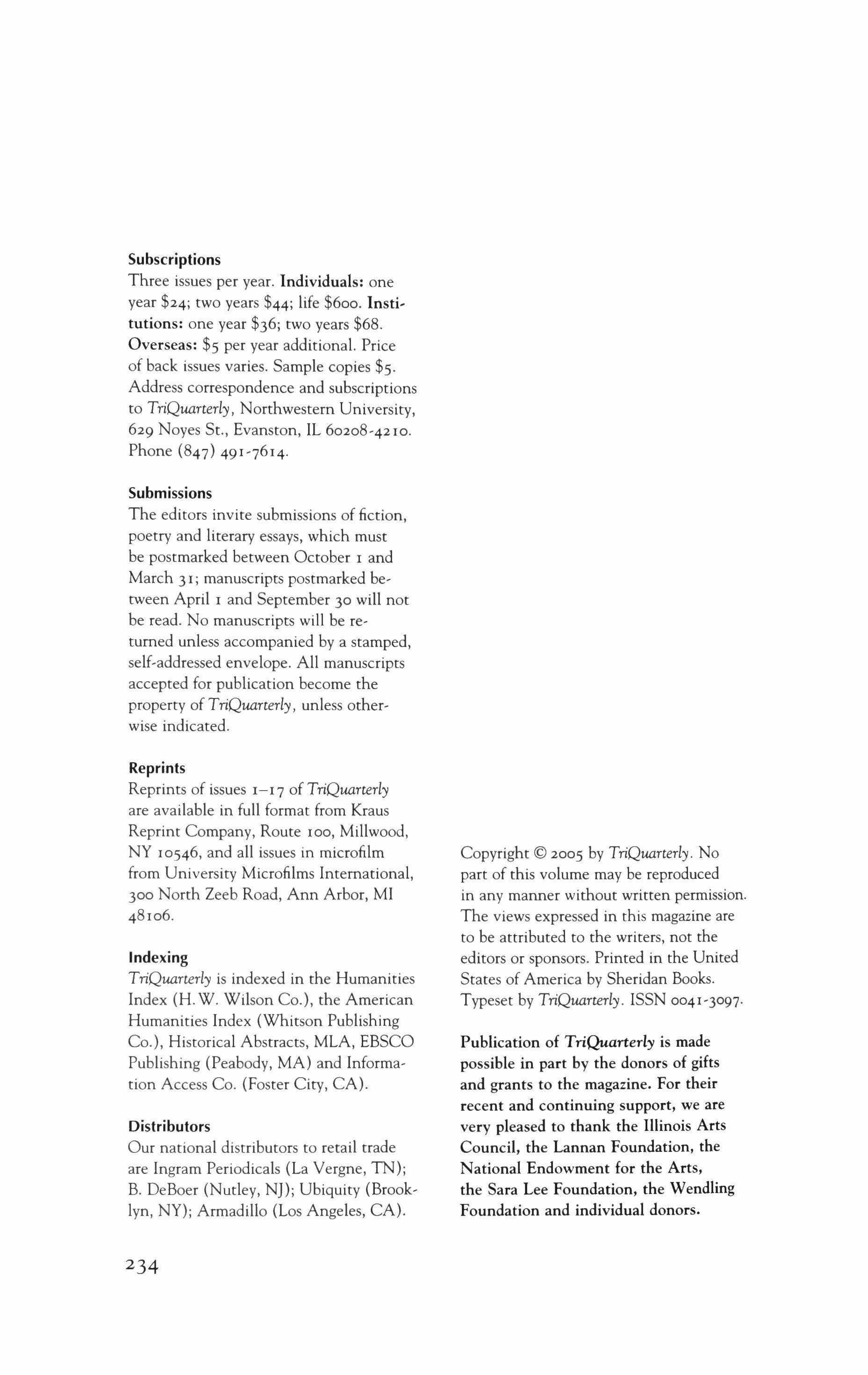
Copyright © 2005 by TriQuarterly. No part of this volume may be reproduced in any manner without written permission. The views expressed in this magazine are to be attributed to the writers, not the editors or sponsors. Printed in the United States of America by Sheridan Books. Typeset by TriQuarterly. ISSN 0041-3097.
Publication of TriQuarterly is made possible in part by the donors of gifts and grants to the magazine. For their recent and continuing support, we are very pleased to thank the lllinois Arts Council, the Lannan Foundation, the National Endowment for the Arts, the Sara Lee Foundation, the Wendling Foundation and individual donors.
234
Washington and Lee University
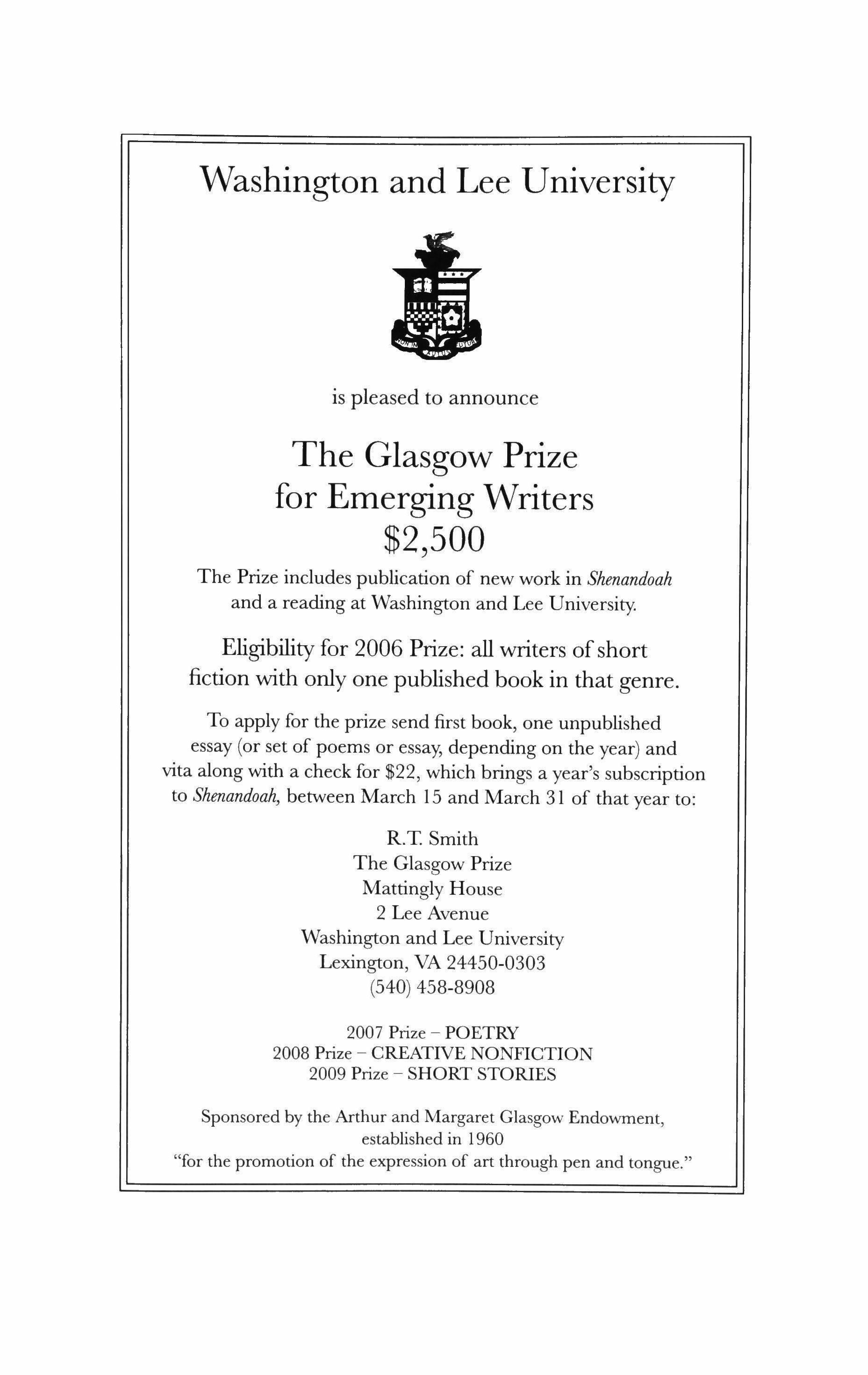
is pleased to announce
The Glasgow Prize for Emerging Writers $2,500
The Prize includes publication of new work in Shenandoah and a reading at Washington and Lee University.
Eligibility for 2006 Prize: all writers ofshort fiction with only one published book in that genre.
To apply for the prize send first book, one unpublished essay (or set of poems or essay, depending on the year) and vita along with a check for $22, which brings a year's subscription to Shenandoah, between March 15 and March 31 of that year to:
R.T. Smith
The Glasgow Prize Mattingly House 2 Lee Avenue
Washington and Lee University Lexington, VA 24450-0303 (540) 458-8908
2007 Prize - POETRY
2008 Prize - CREATIVE NONFICTION
2009 Prize - SHORT STORIES
Sponsored by the Arthur and Margaret Glasgow Endowment, established in 1960 "for the promotion of the expression of art through pen and tongue."
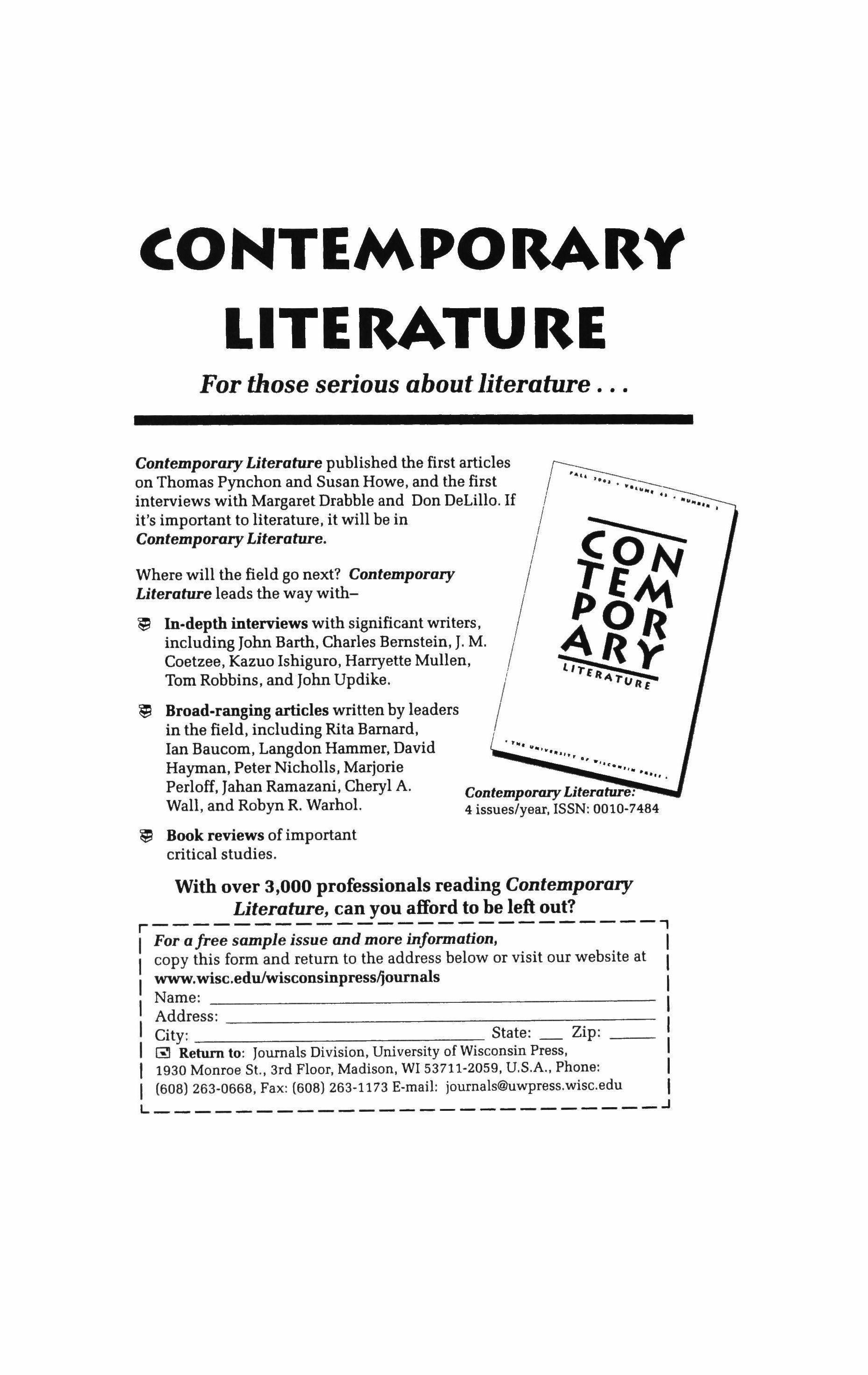
CONTEMPORARY LITERATURE
For those serious aboutliterature
Contemporary Literature published the first articles � on Thomas Pynchon and Susan Howe. and the first I interviews with Margaret Drabble and Don DeLillo. If I ••••• it's important to literature. it will be in
Contemporary Literature.
Where will the field go next? Contemporary
Literature leads the way with-
� In-depth interviews with significant writers.
including John Barth. Charles Bernstein. J. M.
Coetzee, Kazuo Ishiguro, Harryette Mullen.
Tom Robbins. and John Updike.
� Broad-ranging articles written by leaders in the field. including Rita Barnard. Ian Baucom. Langdon Hammer. David Hayman. Peter Nicholls. Marjorie Perloff. Jahan Rarnazani, Cheryl A. Wall. and Robyn R. Warhol.
� Book reviews of important critical studies.
With over 3,000 professionals reading Contemporary Literature, can you afford to be left out?
I For a free sample issue and more information, I I copy this form and return to the address below or visit our website at I I www.wisc.edulwisconsinpressljournals I
I Name: I Address: I City: State: Zip: I I @ Return to: Journals Division. University of Wisconsin Press. I I 1930 Monroe si.. 3rd Floor. Madison. WI 53711-2059, U.S.A .• Phone: I I (608) 263-0668. Fax: (608) 263-1173 E-mail: journals@uwpress.wisc.edu I L J
I.........___
I �EO A,
.'�
p Ai
/ 0 R
A b �
�'T
/' "T£II�
I
r-------------------------,
DELILLO FIEDLER GASS PYNCHON
University of Delaware Press Collections on Contemporary Masters
UNDERWORDS
Perspectives on Don DeLillo's Underworld
Edited by Joseph Dewey, Steven G. Kellman, and Irving Malin
Essays by Jackson R. Bryer, David Cowart, Kathleen Fitzpatrick, Joanne Gass, Paul Gleason, Donald J. Greiner, Robert McMinn, Thomas Myers, Ira Nadel, Carl Ostrowski, Timothy L. Parrish, Marc Singer, and David Yetter
$39.50
INTO THE TUNNEL
Readings of Gass's Novel
Edited by Steven G. Kellman and Irving Malin
Essays by Rebecca Goldstein, Donald J. Greiner, Brooke Horvath, Marcus Klein, Jerome Klinkowitz, Paul Maliszewski, James McCourt, Arthur Saltzman, Susan Stewart, and Heide Ziegler
$35.00
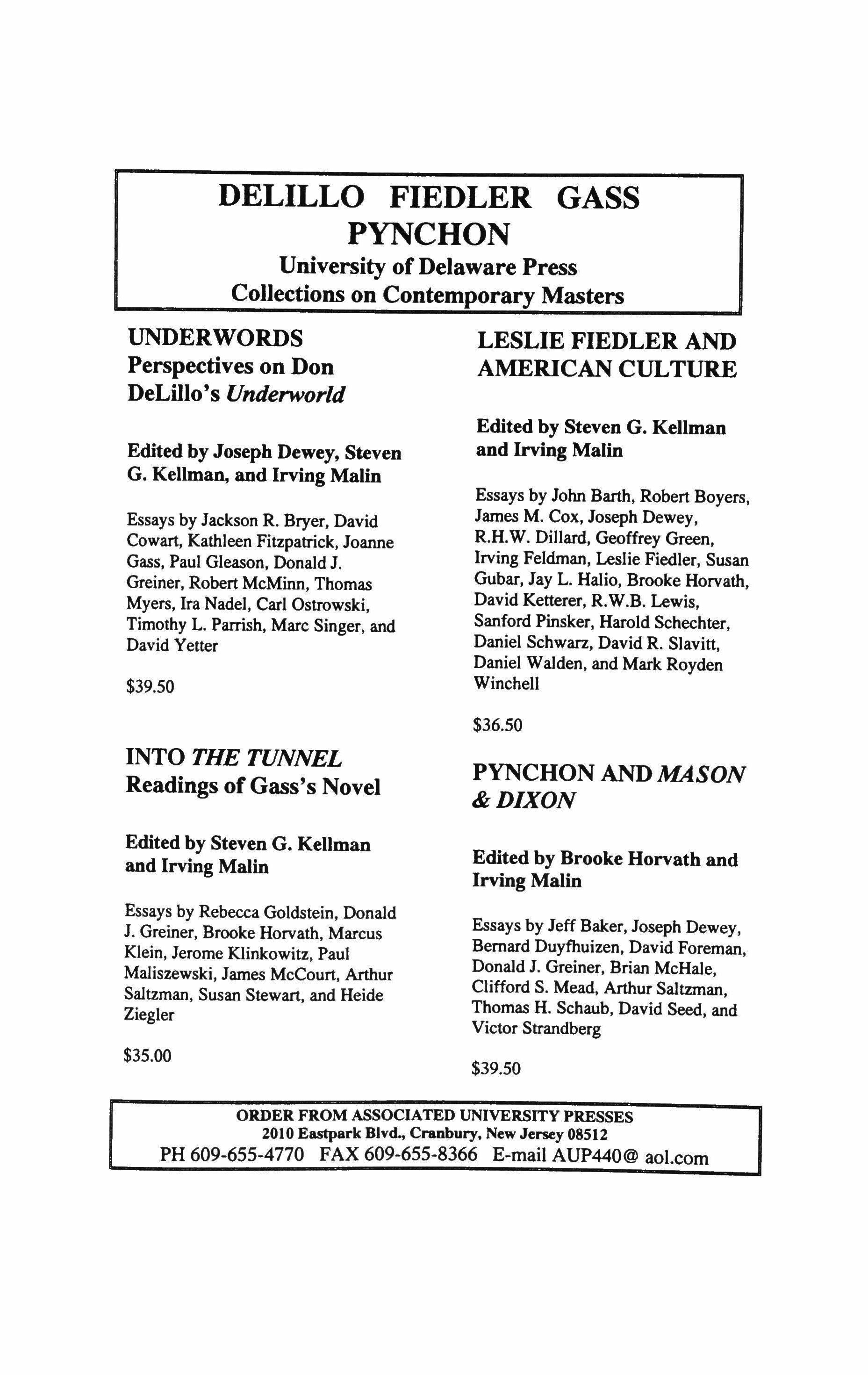
LESLIE FIEDLER AND AMERICAN CULTURE
Edited by Steven G. Kellman and Irving Malin
Essays by John Barth, Robert Boyers, James M. Cox, Joseph Dewey, R.H.W. Dillard, Geoffrey Green, Irving Feldman, Leslie Fiedler, Susan Gubar, Jay L. Halio, Brooke Horvath, David Ketterer, R.W.B. Lewis, Sanford Pinsker, Harold Schechter, Daniel Schwarz, David R. Slavitt, Daniel Walden, and Mark Royden Winchell
$36.50
PYNCHON AND MASON & DIXON
Edited by Brooke Horvath and Irving Malin
Essays by Jeff Baker, Joseph Dewey, Bernard Duyfhuizen, David Foreman, Donald J. Greiner, Brian McHale Clifford S. Mead, Arthur Saltzma'n Thomas H. Schaub, David Seed, �d Victor Strandberg
$39.50
ORDER FROM ASSOCIATED UNIVERSITY PRESSES 2010 Eastpark Blvd., Cranbury, New Jersey 08512 PH 609-655-4770 FAX 609-655-8366 E-mail AUP440@ aol.com
SHENANDOAH
THE WASHINGTON AND LEE UNIVERSITY REVIEW
SHENA DOAH
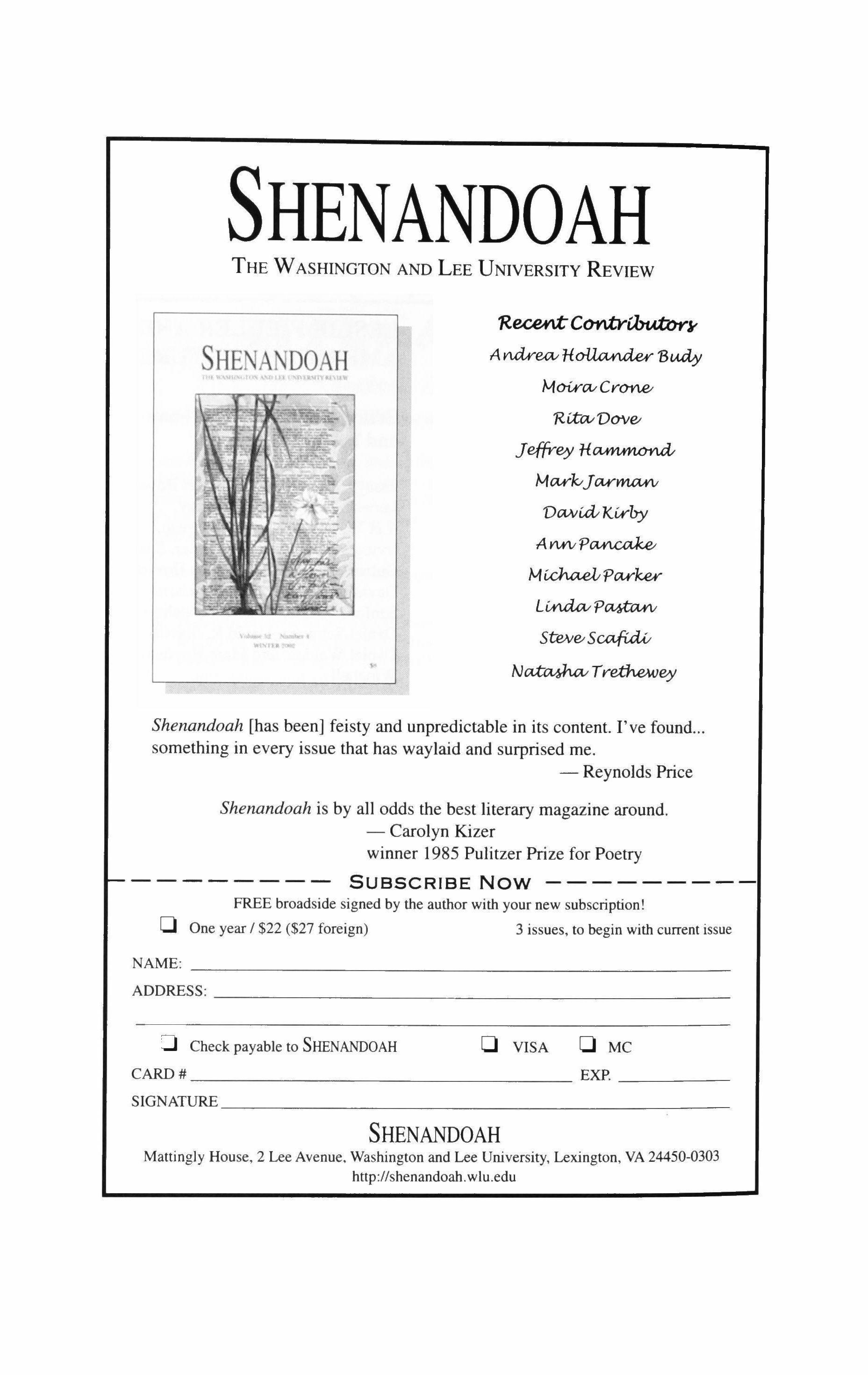
ReGe+'ItConb"ibu.mr", A rtd,ve<N TioUa..n.de¥ 13�
Mau-CNCy-one,'RIXCNVOVet
Jef{Y10' Ti�
MIM"1vJ1M"ma-t'V
VCN\IUi-Ku-by AY\NItP� M�PIM"k.e¥ L�P�
SWvetscu..{UU N� Ty-ethewl0'
Shenandoah [has been] feisty and unpredictable in its content. I've found something in every issue that has waylaid and surprised me. Reynolds Price
Shenandoah is by all odds the best literary magazine around. Carolyn Kizer winner 1985 Pulitzer Prize for Poetry
SUBSCRIBE Now
FREE broadside signed by the author with your new subscription!
o One year I $22 ($27 foreign) 3 issues, to begin with current issue
NAME:
ADDRESS: :J Check payable to SHENANDOAH 0 VISA 0 MC CARD# EXP.
SIGNATURE
Mattingly House, 2 Lee Avenue. Washington and Lee University, Lexington, VA 24450-0303 http://shenandoah.wlu.edu
SHENANDOAH
River Teeth: AJournal ofNonfiction Narrative
Edited by Dan Lehman andJoe Mackall
The UniversityofNebraska Press is proud to announce that we have taken over the publication ofRiver Teeth.
River Teeth is committed to exploring human experience in all its variety.
Combining the best creative nonfictionnarrative reportage, essay, and memoir with critical essays - River Teeth examines and illuminates this emerging genre.
Forthcoming Table ofContents
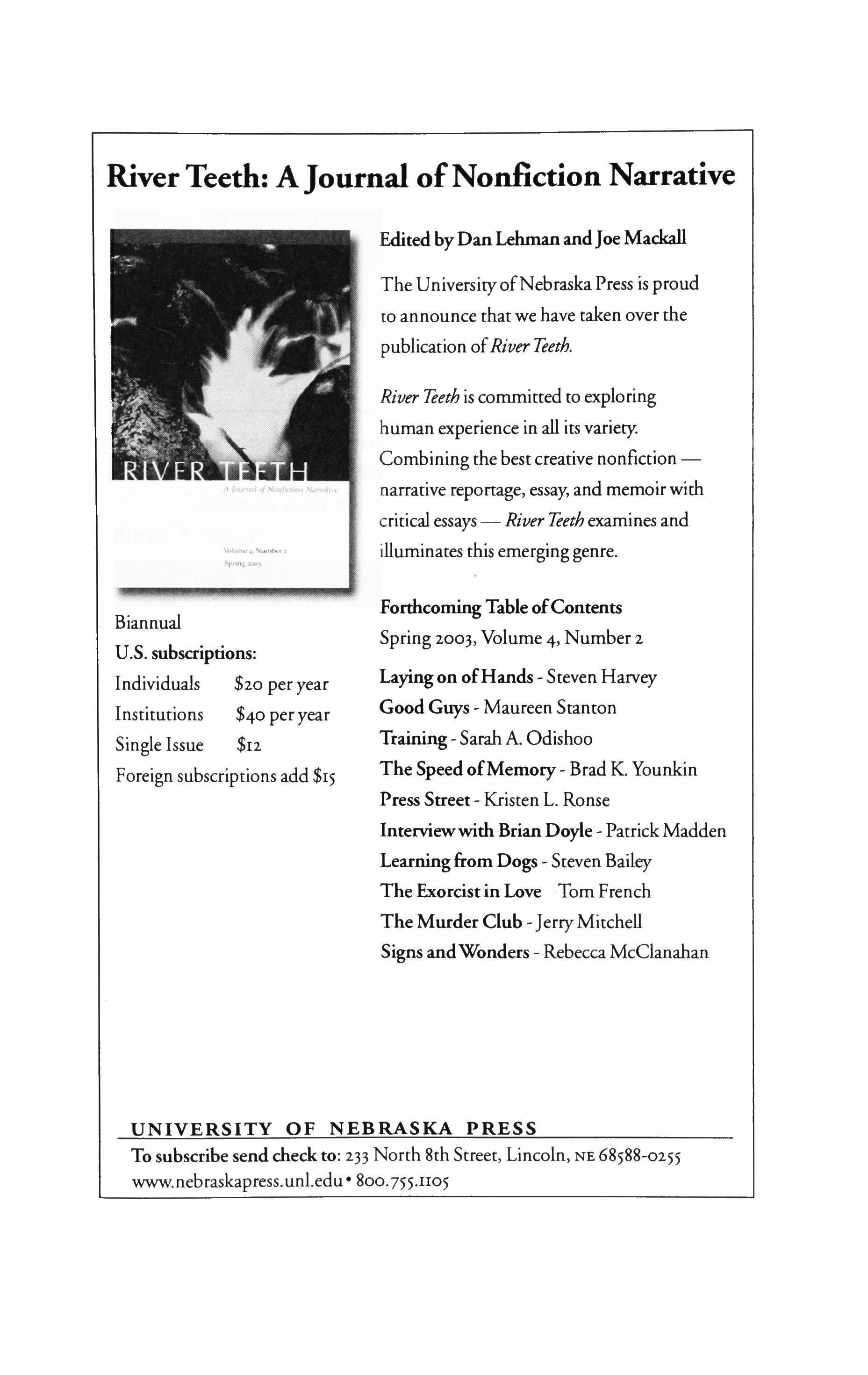
Biannual
U.S. subscriptions:
Individuals
Institutions
$20 per year
$40 per year
Single Issue $12
Foreign subscriptions add $15
Spring 2003, Volume 4, Number 2
Laying on ofHands - Steven Harvey
Good Guys - Maureen Stanton
Training - Sarah A. Odishoo
The Speed ofMemory - Brad K Younkin
Press Street - Kristen L. Ronse
Interviewwith Brian Doyle - Patrick Madden
Learning from Dogs - Steven Bailey
The Exorcist in Love Tom French
The Murder Club - jerryMitchell
Signs andWonders - Rebecca McClanahan
UNIVERSITY OF NEBRASKA PRESS
To subscribe send check to: 233 North 8th Street, Lincoln, NE 68588-0255 www.nebraskapress.unl.edu· 800.75PI05
\"!Ufl""� """,m,,. "1'n"lt.1:l�·\
"What a wealth of accomplishment! This book, this selection of poems and translations, is no less than essential."
-Hayden Carruth

Revealing the full breadth of Hamill's poetic genius, this extraordinary collection brings together the best work from his thirteen books of original poetry and from his numerous critically acclaimed works of translation, as well as a number of new, previously unpublished poems.
* Shambhala Publications
To order call (888) 424-2329 or visit www.shambhala.com

Louise Gluck
Sarah Shun-lien Bynum
Charles Simic
Yusef Komunyakaa
John Dufresne
Edward Hirsch
Mark Strand
John Rybicki
Courtney Angela Brkic
Louise Mathias
Mark Slouka
Carl Phillips
Doreen Gildroy
Brooks Haxton
Heather A Slomski
Giacomo Leopardi
Translated from the Italian by Jonathan Galassi
Ellen Litman
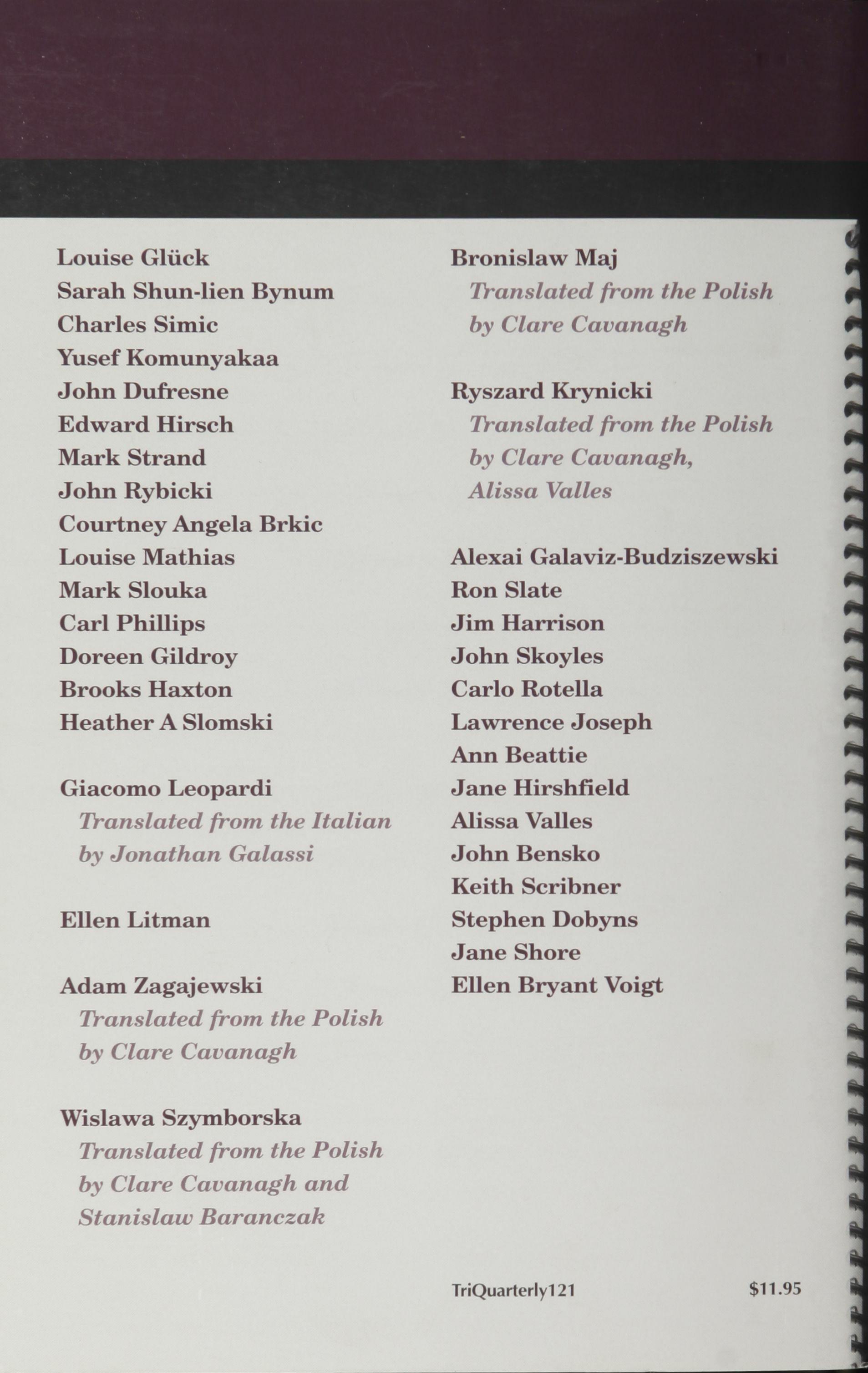
Adam Zagajewski
Translated from the Polish by Clare Cavanagh
Wislawa Szymborska
Translated from the Polish by Clare Cavanagh and Stanislaw Baranczak
Bronislaw Maj
Translated from the Polish by Clare Cavanagh
Ryszard Krynicki
Translated from the Polish by Clare Cavanagh, Alissa Valles
Alexai Galaviz-Budziszewski
Ron Slate
Jim Harrison
John Skoyles
Carlo Rotella
Lawrence Joseph
Ann Beattie
Jane Hirshfield
Alissa Valles
John Bensko
Keith Scribner
Stephen Dobyns
Jane Shore
Ellen Bryant Voigt
TriQuarterly121 $11.95



















































































































































































































































